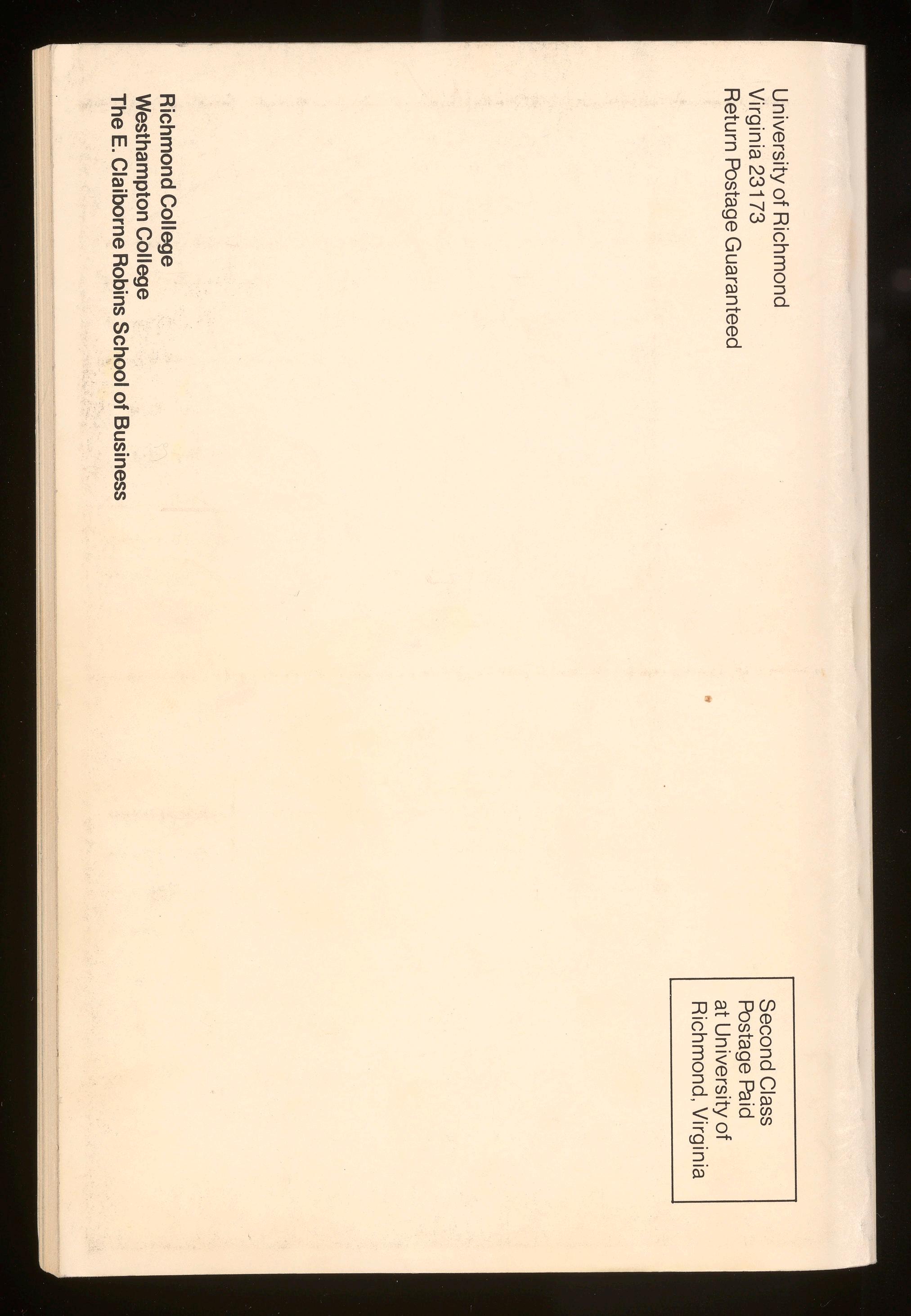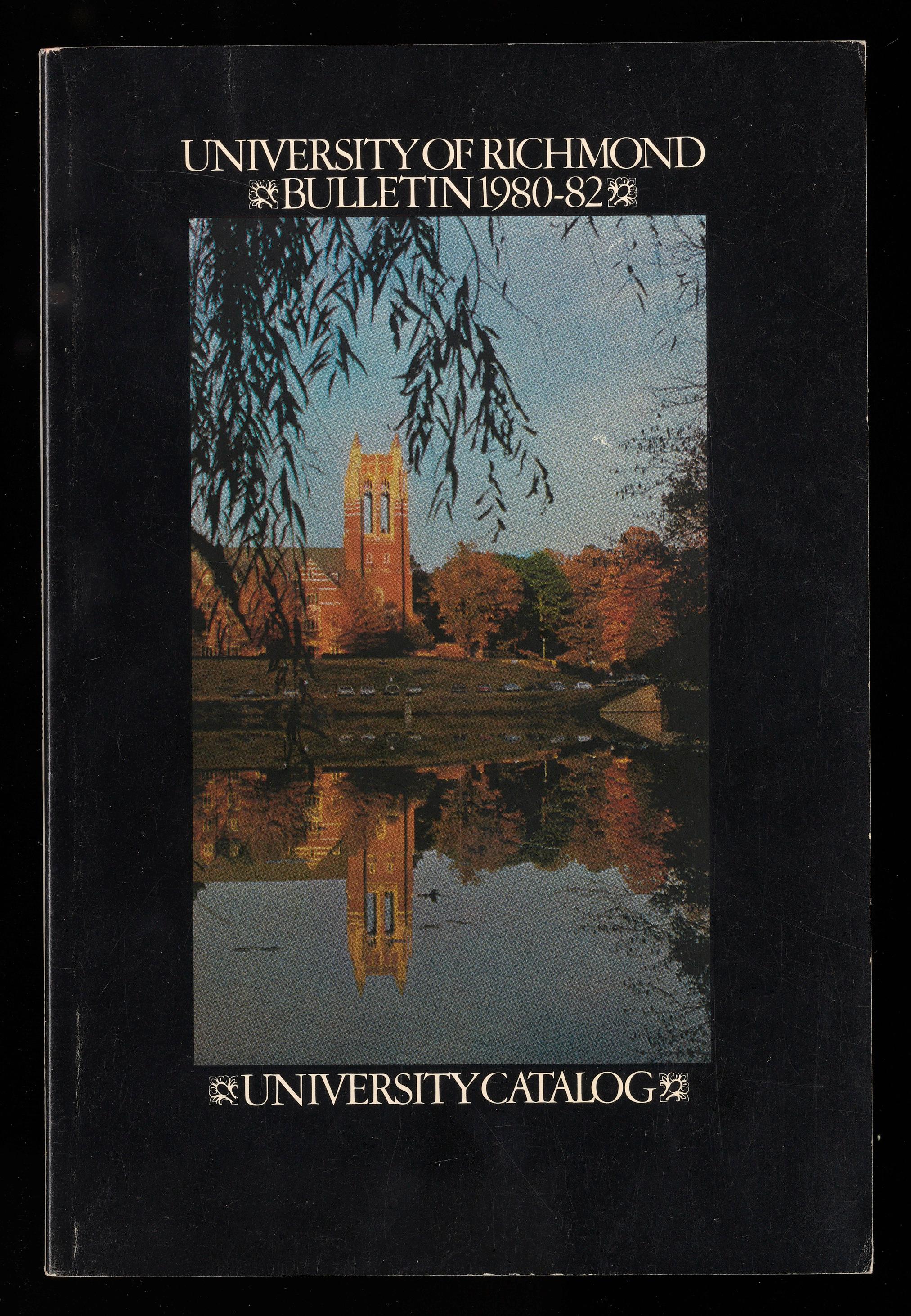

Universityof RichmondBulletin
Volume LXXX:11April 15, 1980 Number 3
USPS652-160
Second-classpostage paid by University of Richmond, Virginia 23173. Publishedby the University of Richmondfour times a year; once in February,once in March and twice in April.
Non-DiscriminationPolicy
The University of Richmonddoes not discriminate on the basis of sex, religion, age, handicap, race, color or national origin. Any inquiries regarding the University' s policies in these areas should be directed to the Office of the Vice Presidentfor Student Affairs, University of Richmond, Virginia 23173 Telephone: (804) 285-6464.
Disclaimer
The contents of this bulletin represent the most current information available at the time of publication. However, during the period of time covered by this bulletin, it is reasonableto expect changes to be made with respect to this information without prior notice Thus, the provisions of this bulletin are not to be regardedas an irrevocable contract between the University(or any of its colleges) and the student.
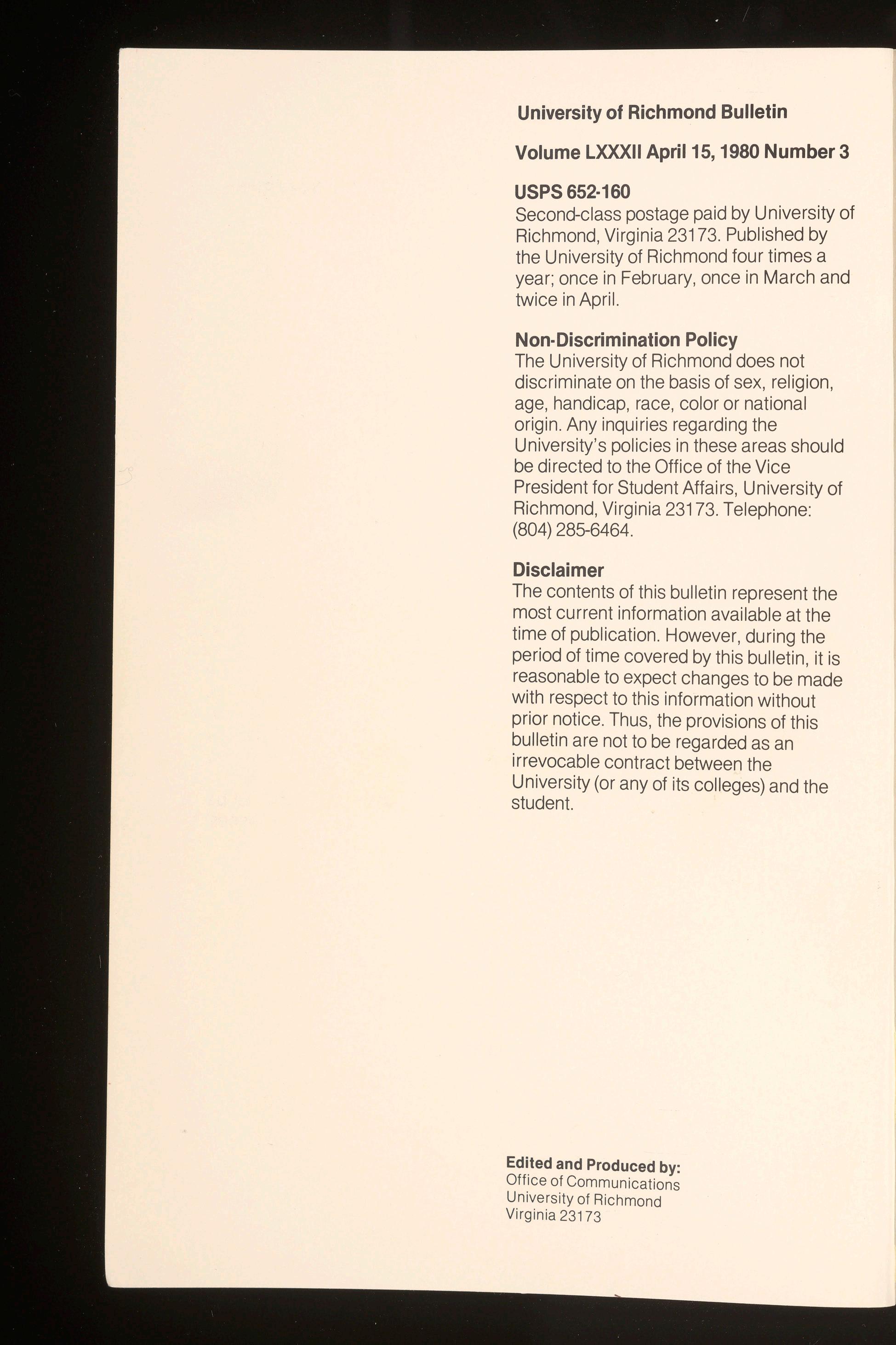
Edited and Produced by: Offic e of Communi ca ti ons Un iversity of Richmo nd Virgini a 23 173
Universityof Richmond
Founded 1830
Richmond College
Westhampton College
The E. Claiborne Robins School of Business
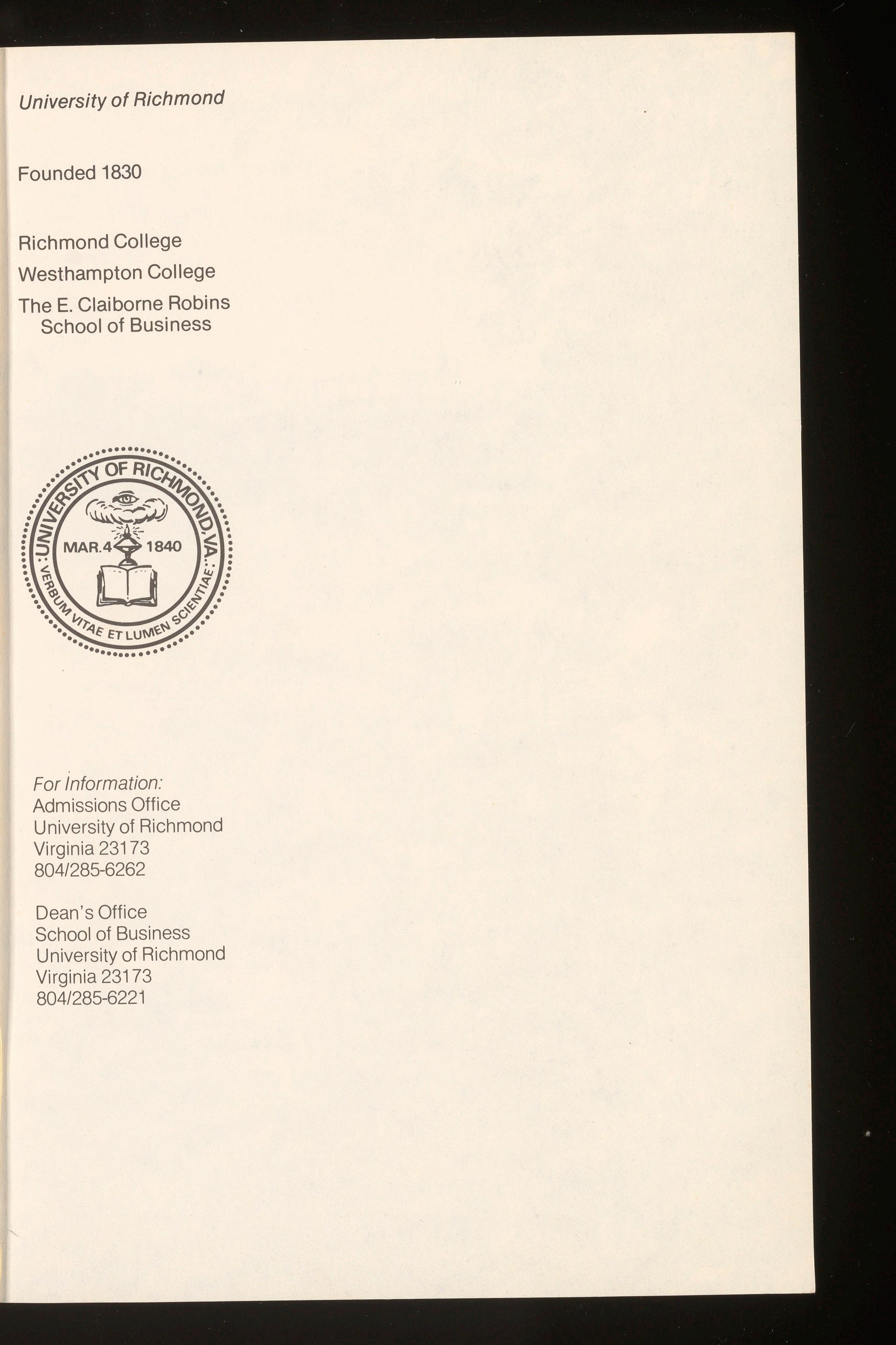
For Information : Admissions Office
University of Richmond Virginia 23173
804/285-6262
Dean's Office
School of Business
University of Richmond Virginia 23173
804/285-6221
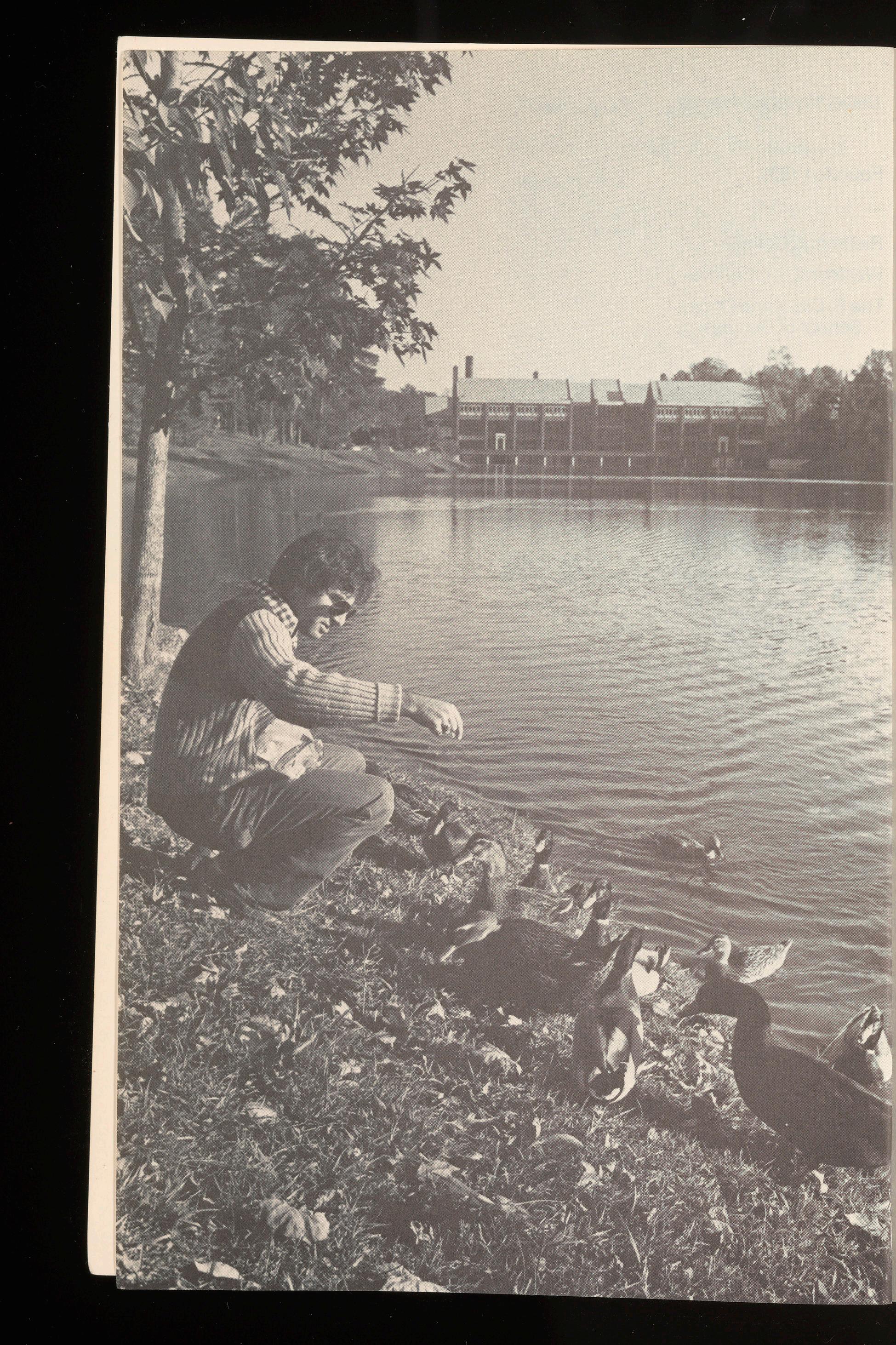
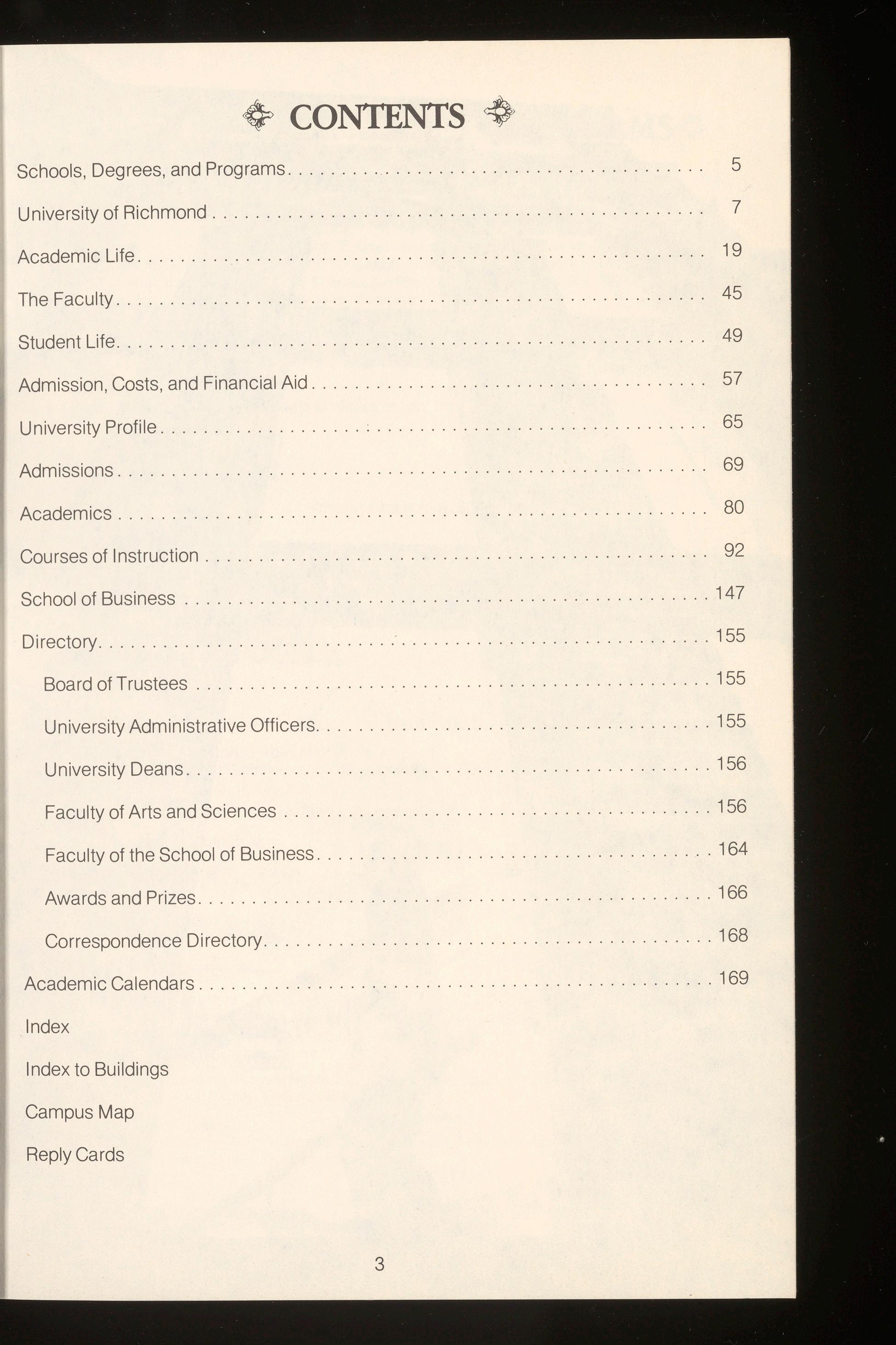

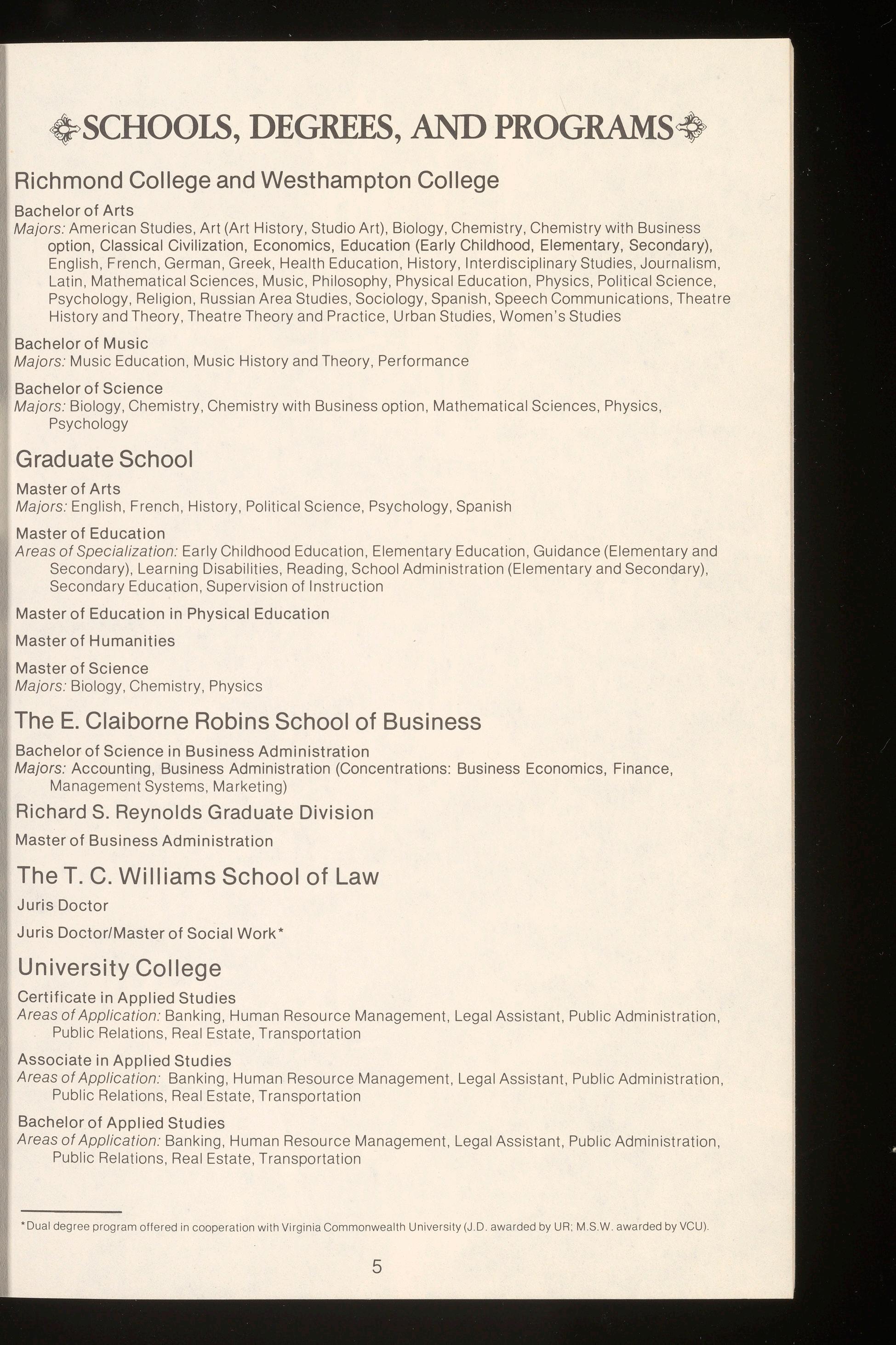
DEGREES,AND
Richmond College and Westhampton College
Bachelor of Arts
Majors: American Studies, Art (Art History , Studio Art), Biology, Chemistry, Chemistry with Business option, Classical Civilization, Economics, Education (Early Childhood, Elementary, Secondary), English, French , German, Greek, Health Education, History, Interdisciplinary Studies, Journalism, Latin , Mathematical Sciences, Music, Philosophy, Physical Education, Physics, Political Science, Psychology, Religion, Russian Area Studies, Sociology, Spanish, Speech Communications, Theatre History and Theory, Theatre Theory and Practice, Urban Studies, Women's Studies
Bachelor of Music
Majors: Music Education, Music History and Theory, Performance
Bachelor of Science
Majors: Biology, Chemistry, Chemistry with Business option, Mathematical Sciences, Physics, Psychology
Graduate School
Master of Arts
Majors: English, French, History, Political Science , Psychology, Spanish
Master of Education
Areas of Specialization: Early Childhood Education, Elementary Education, Guidance (Elementary and Secondary), Learning Disabilities, Reading, School Administration (Elementary and Secondary), Secondary Education, Supervision of Instruction
Master of Education in Physical Education
Master of Humanities
Master of Science
Majors. Biology, Chemistry, Physics
The E. Claiborne Robins School of Business
Bachelor of Science in Business Administration
Majors: Accounting, Business Administration (Concentrations: Business Economics, Finance, Management Systems , Marketing)
Richard S. Reynolds Graduate Division
Master of Business Administration
The T. C. Williams School of Law
Juris Doctor
Juris Doctor/Master of Social Work*
University
College
Certificate in Applied Studies
Areas of Application. Banking, Human Resource Management, Legal Assistant, Public Administration, Public Relations, Real Estate, Transportation
Associate in Applied Studies
Areas of Application: Banking, Human Resource Management, Legal Assistant, Public Administration, Public Relations, Real Estate, Transportation
Bachelor of Applied Studies
Areas of Application. Banking , Human Resource Management, Legal Assistant, Public Administration, Public Relations, Real Estate, Transportation
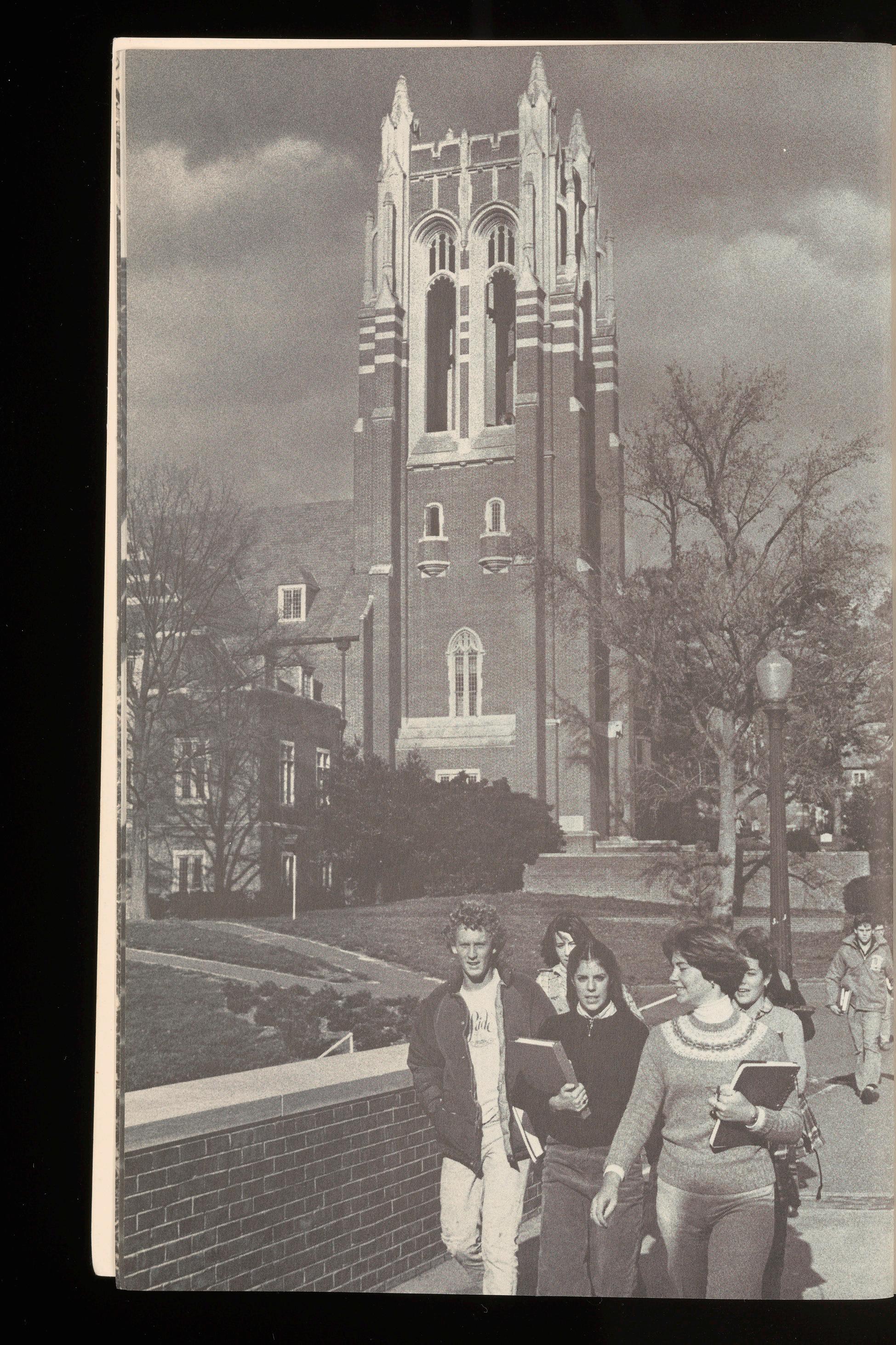
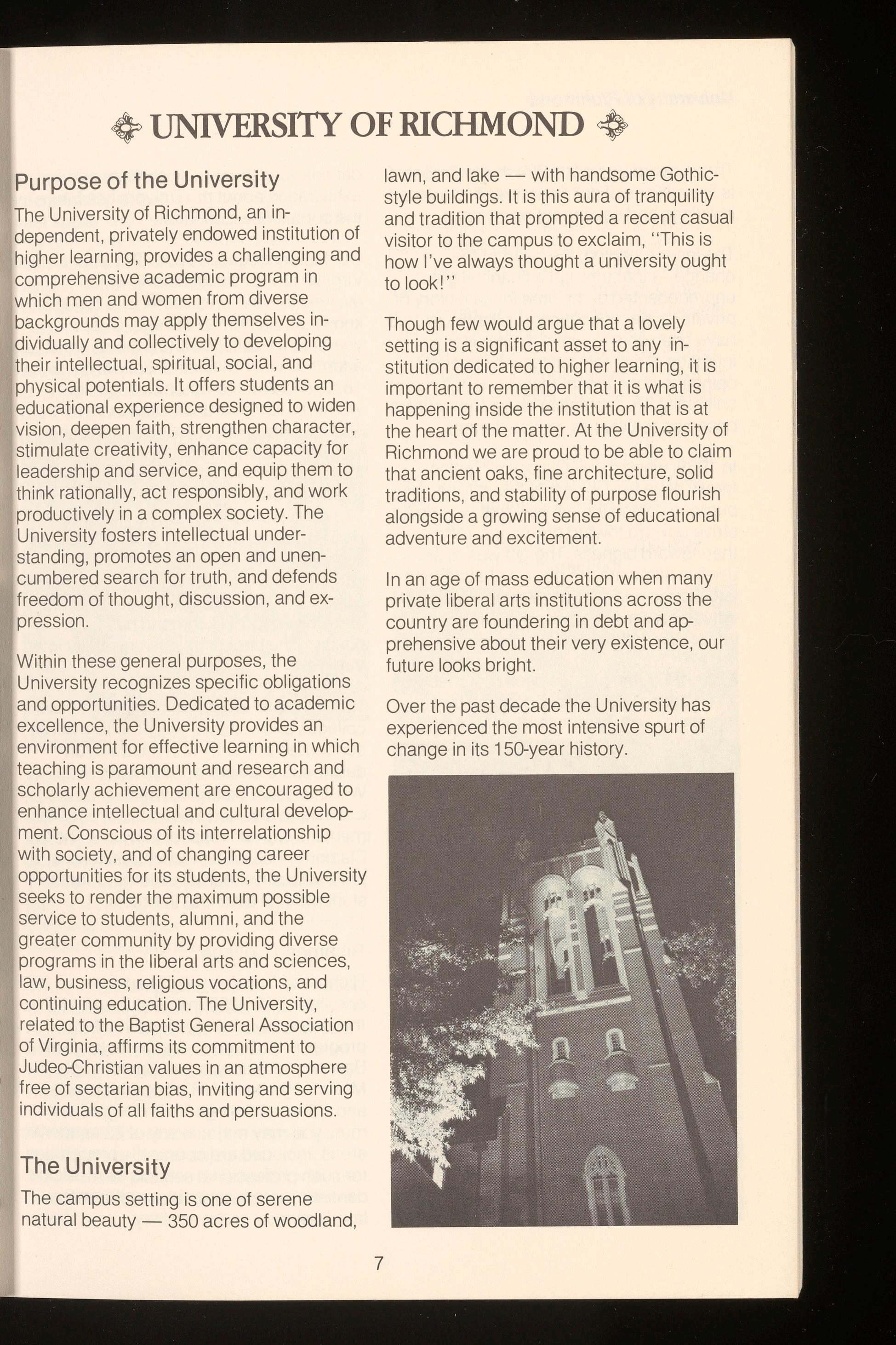
UNIVERSITYOFRICHMOND
Purposeof the University
The University of Richmond, an independent. privately endowed institution of higher learning, provides a challenging and comprehensive academic program in which men and women from diverse backgrounds may apply themselves individually and collectively to developing their intellectual , spiritual , social , and physical potentials. It offers students an educational experience designed to widen vision , deepen faith , strengthen character , stimulate creativity, enhance capacity for leadership and service, and equip them to think rationally , act responsibly , and work productively in a complex society. The University fosters intellectual understanding , promotes an open and unencumbered search for truth , and defends freedom of thought. discussion , and expression
Within these general purposes, the University recognizes specific obligations and opportunities Dedicated to academic excellence , the University provides an environment for effective learning in which teaching is paramount and research and scholarly achievement are encouraged to enhance intellectual and cultural development. Conscious of its interrelationship with society, and of changing career opportunities for its students, the University seeks to render the maximum possible service to students , alumni, and the greater community by providing diverse programs in the liberal arts and sciences, law , business , religious vocations , and continuing education. The University , related to the Baptist General Association of Virginia , affirms its commitment to Judeo-Christian values in an atmosphere free of sectarian bias, inviting and serving individuals of all faiths and persuasions
The University
The campus setting is one of serene natural beauty -350 acres of woodland,
lawn, and lake -with handsome Gothicstyle buildings . It is this aura of tranquility and tradition that prompted a recent casual visitor to the campus to exclaim, "This is how I've always thought a university ought to look! "
Though few would argue that a lovely setting is a significant asset to any institution dedicated to higher learning , it is important to remember that it is what is happening inside the institution that is at the heart of the matter At the University of Richmond we are proud to be able to claim that ancient oaks, fine architecture, solid traditions , and stability of purpose flourish alongside a growing sense of educational adventure and excitement.
In an age of mass education when many private liberal arts institutions across the country are foundering in debt and apprehensive about their very existence , our future looks bright.
Over the past decade the University has experienced the most intensive spurt of change in its 150-year history.
Universityof Richmond
The outward sign of this fresh new impetus is the millions of dollars invested in new buildings and equipment on campus
The inner meaning , the heart of the change , is that through a financial gift unprecedented at the time in the history of private higher educational philanthropy , we have been able to retain the pleasant intimacy of a small college while developing the educational resources of a major university. Our optimism about the futu re is based on realities as well as dreams
In 1969, when the E Claiborne Robins family gave the University $50 million , the purpose behind the gift was that we should strive upward toward greatness, rather than toward bigness. The gift was to be used to stimulate the pursuit of academic excellence and humane values in an era of educational mass production with its implications of mediocrity.
Since 1969, the gift has been matched with an additional $50 million , donated by friends, alumni , businesses , and faun-
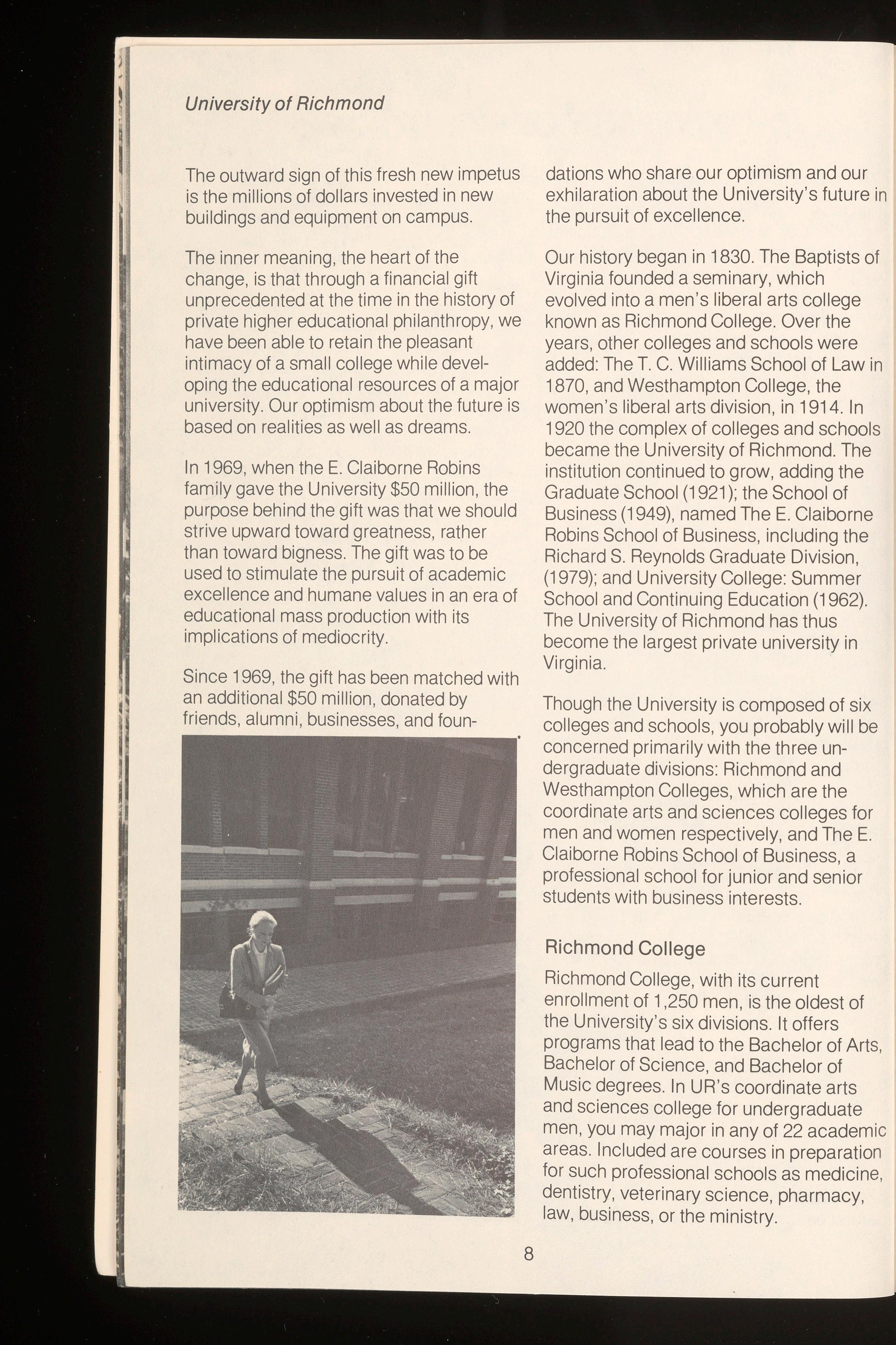
dations who share our optimism and our e x hilaration about the University's future in the pursuit of excellence
Our history began in 1830. The Baptists of Virginia founded a seminary, which evolved into a men ' s liberal arts college known as Richmond College. Over the years, other colleges and schools were added: The T. C Williams School of Law in 1870, and Westhampton College , the women's liberal arts division, in 1914 In 1920 the complex of colleges and schools became the University of Richmond. The institution continued to grow, adding the Graduate School (1921 ); the School of Business (1949) , named The E Claiborne Robins School of Business , including the Richard S. Reynolds Graduate Division, (1979); and University College: Summer School and Continuing Education (1962) The University of Richmond has thus become the largest private university in Virginia
Though the University is composed of six colleges and schools , you probably will be concerned primarily with the three undergraduate divisions : Richmond and Westhampton Colleges, which are the coordinate arts and sciences colleges for men and women respectively , and The E. Claiborne Robins School of Business , a professional school for junior and senior students with business interests.
RichmondCollege
Richmond College , with its current enrollment of 1,250 men , is the oldest of the University's six divisions. It offers programs that lead to the Bachelor of Arts , Bachelor of Science, and Bachelor of Music degrees. In UR ' s coordinate arts and sciences college for undergraduate men, you may major in any of 22 academi c areas. Included are courses in preparation for such professional schools as medicine , dentistry , veterinary science, pharmacy, law, business , or the ministry
Equally extensive is the diversity of cocurricular activities on campus and the vast social and cultural opportunities of the City of Richmond. More than one-third of Richmond's students belong to one of 11 national fraternity chapters. For the athletically minded (and more than twothirds of the student body participate in at least one sport), the $10 million Robins Center provides the most modern facilities for physical education, and intercollegiate and intramural athletics.
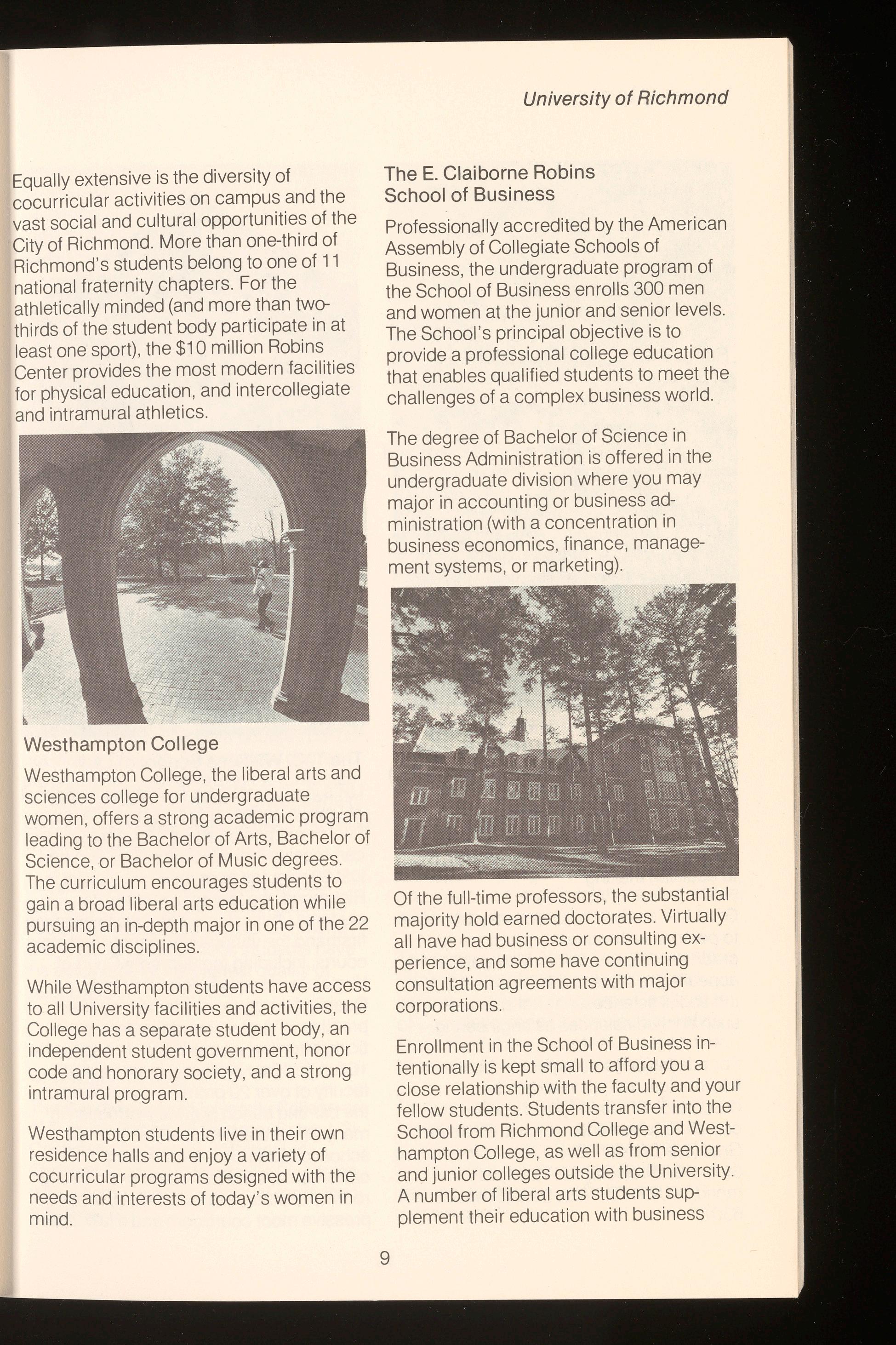
WesthamptonCollege
Westhampton College, the liberal arts and sciences college for undergraduate women, offers a strong academic program leading to the Bachelor of Arts, Bachelor of Science, or Bachelor of Music degrees. The curriculum encourages students to gain a broad liberal arts education while pursuing an in-depth major in one of the 22 academic disciplines.
While Westhampton students have access to all University facilities and activities, the College has a separate student body, an independent student government, honor code and honorary society, and a strong intramural program.
Westhampton students live in their own residence halls and enjoy a variety of cocurricular programs designed with the needs and interests of today's women in mind.
Universityof Richmond
The E. Claiborne Robins School of Business
Professionally accredited by the American Assembly of Collegiate Schools of Business, the undergraduate program of the School of Business enrolls 300 men and women at the junior and senior levels. The School's principal objective is to provide a professional college education that enables qualified students to meet the challenges of a complex business world.
The degree of Bachelor of Science in Business Administration is offered in the undergraduate division where you may major in accounting or business administration (with a concentration in business economics, finance, management systems, or marketing).
Of the full-time professors, the substantial majority hold earned doctorates. Virtually all have had business or consulting experience, and some have continuing consultation agreements with major corporations.
Enrollment in the School of Business intentionally is kept small to afford you a close relationship with the faculty and your fellow students. Students transfer into the School from Richmond College and Westhampton College, as well as from senior and junior colleges outside the University. A number of liberal arts students supplement their education with business

Universityof Richmond
courses, a process which often proves advantageous in their search for jobs.
But indirectly -and sometimes directly -the three other schools of the University open avenues which contribute to the quality of the education you receive as an undergraduate.
RichardS. ReynoldsGraduateDivision of Business
The Master of Business Administration (M.B.A.) degree program is a part-time course of study offered in the evenings and designed primarily to serve the needs of the business community in the Richmond metropolitan area. The program is offered through the Richard S. Reynolds Graduate Division of The E. Claiborne Robins School of Business. It is coordinated by the business school's graduate faculty and administered by the director of the M.B.A. program.
The M.B.A. is a comprehensive program that provides the professional foundation necessary for advancement to the higher levels of management in a profit or nonprofit organization. Included in the program are subjects required for responsible management, with emphasis on analytical techniques, both quantitative and qualitative in nature, and their importance to decision making.
Graduate study in business may be useful to persons with various undergraduate or graduate degrees, but may be particularly appealing to those with concentrations in the social sciences, natural sciences, and such applied sciences as engineering.
For admission requirements, application information, and a more detailed description of the M.B.A. program and course requirements, consult: Director, Graduate Division, TheE. ClaiborneRobins School of Business, Universityof Richmond, VA 23173. Telephone(804)2856301.
The T. C. Williams School of Law
UR's law school, The T. C. Williams School of Law, is necessarily selective. Because total enrollment is about 415, each student can receive individual attention. Located just 20 minutes from the State Capitol in Richmond, the law school offers its students unusual opportunities to examine firsthand the various city, county and state courts, including the Supreme Court of Virginia and some federal district courts. Qualified third-year students may even practice in Virginia courts under a practicing attorney's supervision. In addition to 16 full-time law professors, an adjunct faculty of over 20 prominent members of the bar and bench provide instruction in many of the elective courses. The law school building contains modern classrooms, seminar rooms and meeting rooms for student organizations, an impressive moot courtroom and a law library
with a capacity for 130,000 volumes. Construction of a new library wing is under way and is expected to be completed by 1981. The law school, offering courses leading to the Juris Doctor degree, is in its second century of service to the Commonwealth and to the nation.
GraduateSchool
The Graduate School, with about 200 fulland part-time students, offers programs leading to the Master of Arts degree in English, French , history, political science, psychology, and Spanish; the Master of Science degree in biology, chemistry, and physics; the Master of Education degree in school administration, supervision of instruction, reading, elementary education N-K-3 and 4-7, physical education, and learning disabilities. In addition, the Graduate School offers the interdisciplinary Master of Humanities degree.
Students holding undergraduate degrees who wish to take graduate courses but do not intend to enroll in a graduate degree program may matriculate in the Graduate School as special students Under certain conditions undergraduate seniors may also enroll in graduate-level courses.
Because most of the Graduate School faculty is drawn from the undergraduate Faculty of Arts and Sciences, Richmond and Westhampton College students have the advantage of the highest quality of instruction.
UniversityCollege
The five divisions of University College are 1) Evening School, 2) Summer School, 3) Continuing Education, 4) School of Christian Studies, 5) Women's Programs, with a combined population of more than 8,500 people. 11
Universityof Richmond
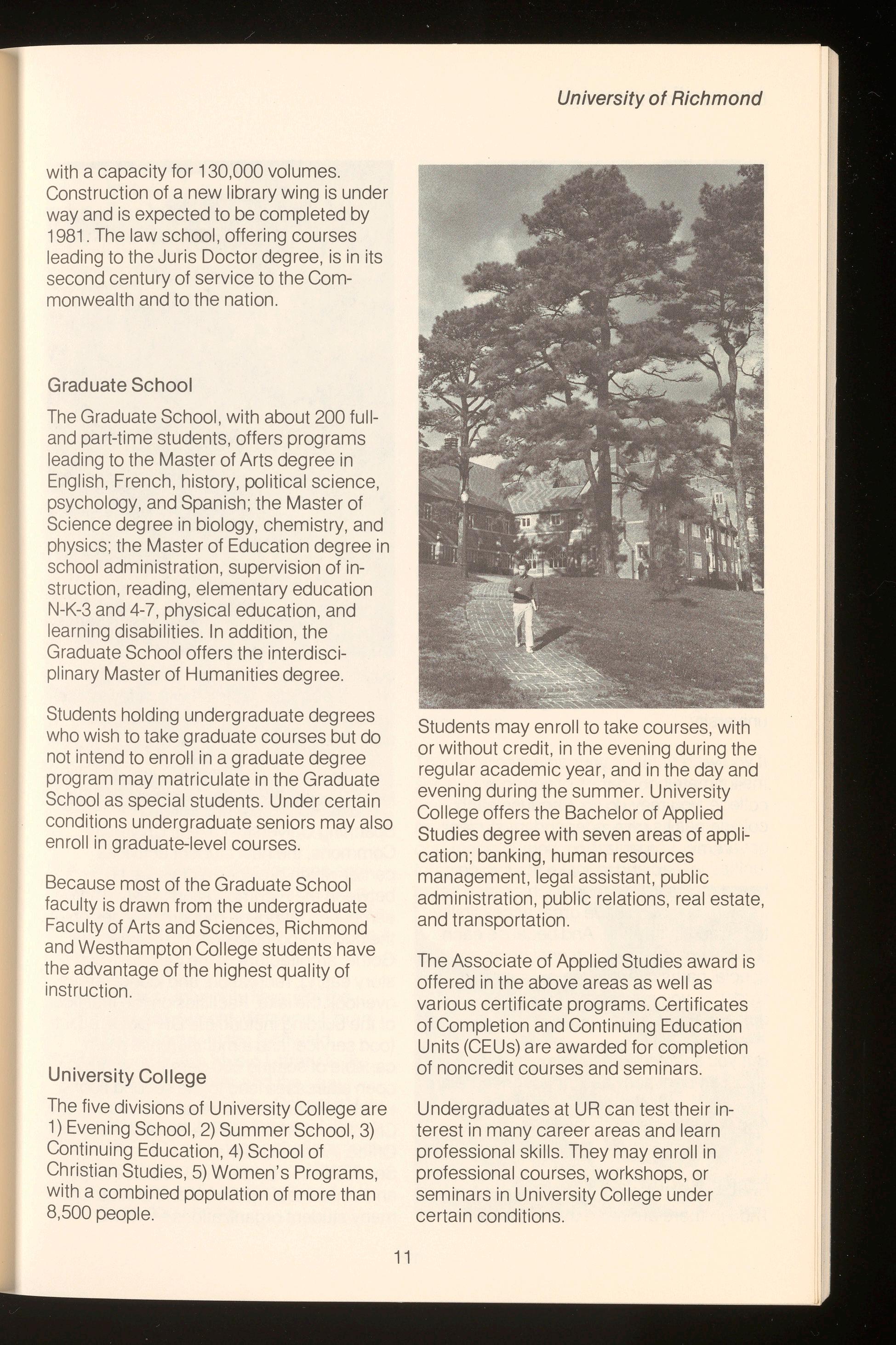
Students may enroll to take courses, with or without credit, in the evening during the regular academic year, and in the day and evening during the summer. University College offers the Bachelor of Applied Studies degree with seven areas of application; banking, human resources management, legal assistant, public administration, public relations, real estate, and transportation.
The Associate of Applied Studies award is offered in the above areas as well as various certificate programs. Certificates of Completion and Continuing Education Units (CEUs) are awarded for completion of noncredit courses and seminars.
Undergraduates at UR can test their interest in many career areas and learn professional skills. They may enroll in professional courses, workshops, or seminars in University College under certain conditions.
Universityof Richmond
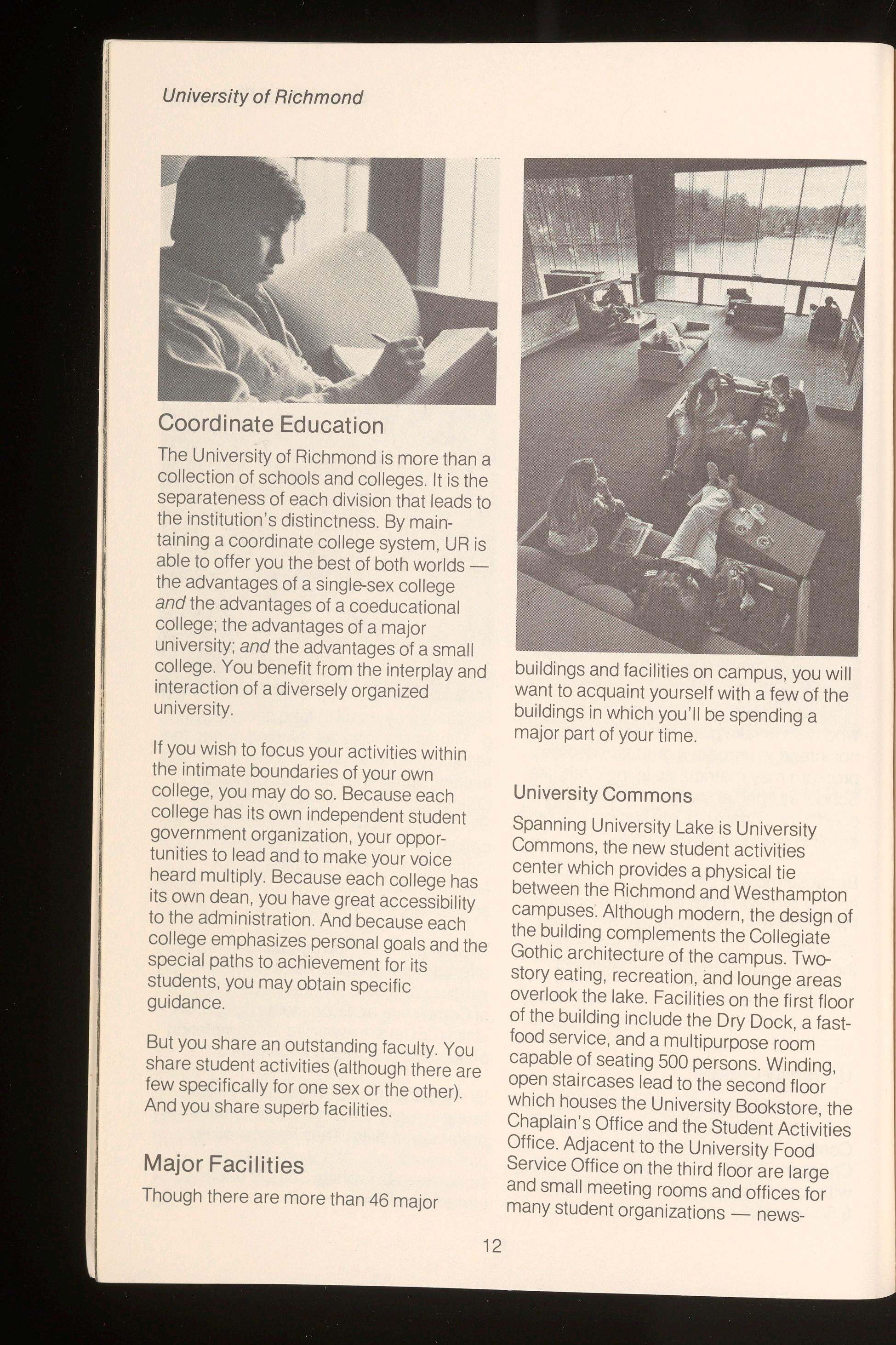
Coordinate Education
The University of Richmond is more than a collection of schools and colleges It is the separateness of each division that leads to the institution ' s distinctness. By main- taining a coordinate college system , UR is able to offer you the best of both worlds - the advantages of a single-se x college and the advantages of a coeducational college; the advantages of a major university ; and the advantages of a small college You benefit from the interplay and interaction of a diversely organized university
If you wish to focus your activities within the intimate boundaries of your own college , you may do so . Because each college has its own independent student government organization , your oppor- tunities to lead and to make your voice heard multiply Because each college has its own dean , you have great accessibility to the administration . And because each college emphasizes personal goals and the special paths to achievement for its students , you may obtain specific guidance
But you share an outstanding faculty. You share student activities (although there are few specifically for one sex or the other) And you share superb facilities.
Major Facilities
Though there are more than 46 major
buildings and facilities on campus , you wi ll want to acquaint yourself with a few of the buildings in which you ' ll be spending a major part of your time.
UniversityCommons
Spanning University Lake is University Commons , the new student activities center which provides a physical tie between the Richmond and Westhampton campuses. Although modern, the design of the building complements the Collegiate Gothic architecture of the campus. Two- story eating , recreation , and lounge areas overlook the lake Facilities on the first floor of the building include the Dry Dock, a fast- food service , and a multipurpose room capable of seating 500 persons . Winding, open staircases lead to the second floor which houses the University Bookstore , the Chaplain ' s Office and the Student Activities Office Adjacent to the University Food Service Office on the third floor are large and small meeting rooms and offices for many student organizations -news-
paper, yearbook, FM radio station, University Student Union and student governments. The Commons is a constant center of activity; many of its facilities are booked by some groups months in advance.
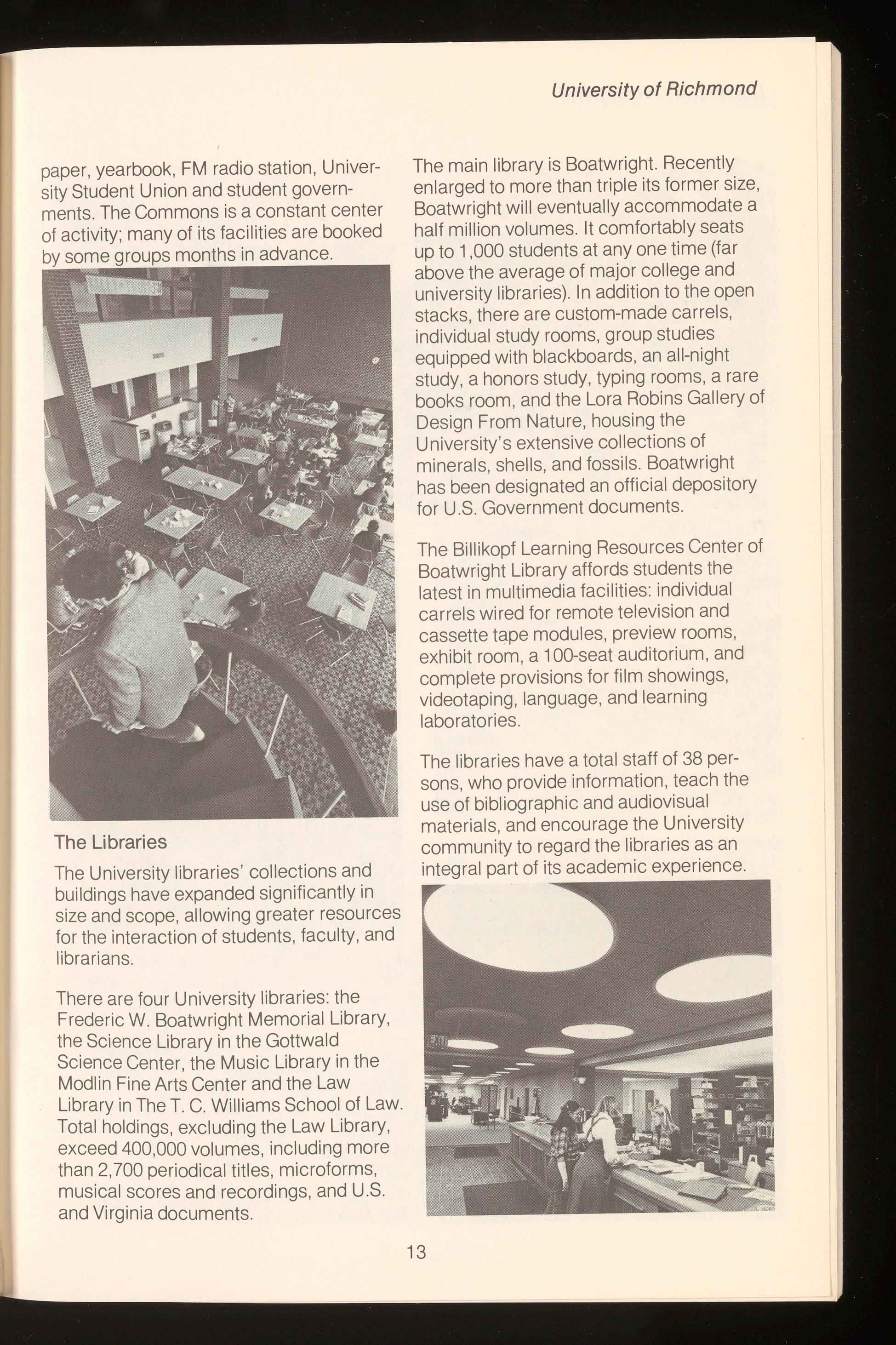
The Libraries
The University libraries' collections and buildings have expanded significantly in size and scope, allowing greater resources for the interaction of students, faculty, and librarians.
There are four University libraries: the Frederic W. Boatwright Memorial Library, the Science Library in the Gottwald Science Center, the Music Library in the Modlin Fine Arts Center and the Law Library in The T. C. Williams School of Law. Total holdings, excluding the Law Library, exceed 400,000 volumes, including more than 2,700 periodical titles, microforms, musical scores and recordings, and U.S. and Virginia documents.
Universityof Richmond
The main library is Boatwright. Recently enlarged to more than triple its former size, Boatwright will eventually accommodate a half million volumes. It comfortably seats up to 1,000 students at any one time (far above the average of major college and university libraries). In addition to the open stacks, there are custom-made carrels, individual study rooms, group studies equipped with blackboards, an all-night study, a honors study, typing rooms, a rare books room, and the Lora Robins Gallery of Design From Nature, housing the University's extensive collections of minerals, shells, and fossils. Boatwright has been designated an official depository for U.S. Government documents.
The Billikopf Learning Resources Center of Boatwright Library affords students the latest in multimedia facilities: individual carrels wired for remote television and cassette tape modules, preview rooms, exhibit room, a 100-seat auditorium, and complete provisions for film showings, videotaping, language, and learning laboratories.
The libraries have a total staff of 38 persons, who provide information, teach the use of bibliographic and audiovisual materials, and encourage the University community to regard the libraries as an integral part of its academic experience.
13
Universityof Richmond
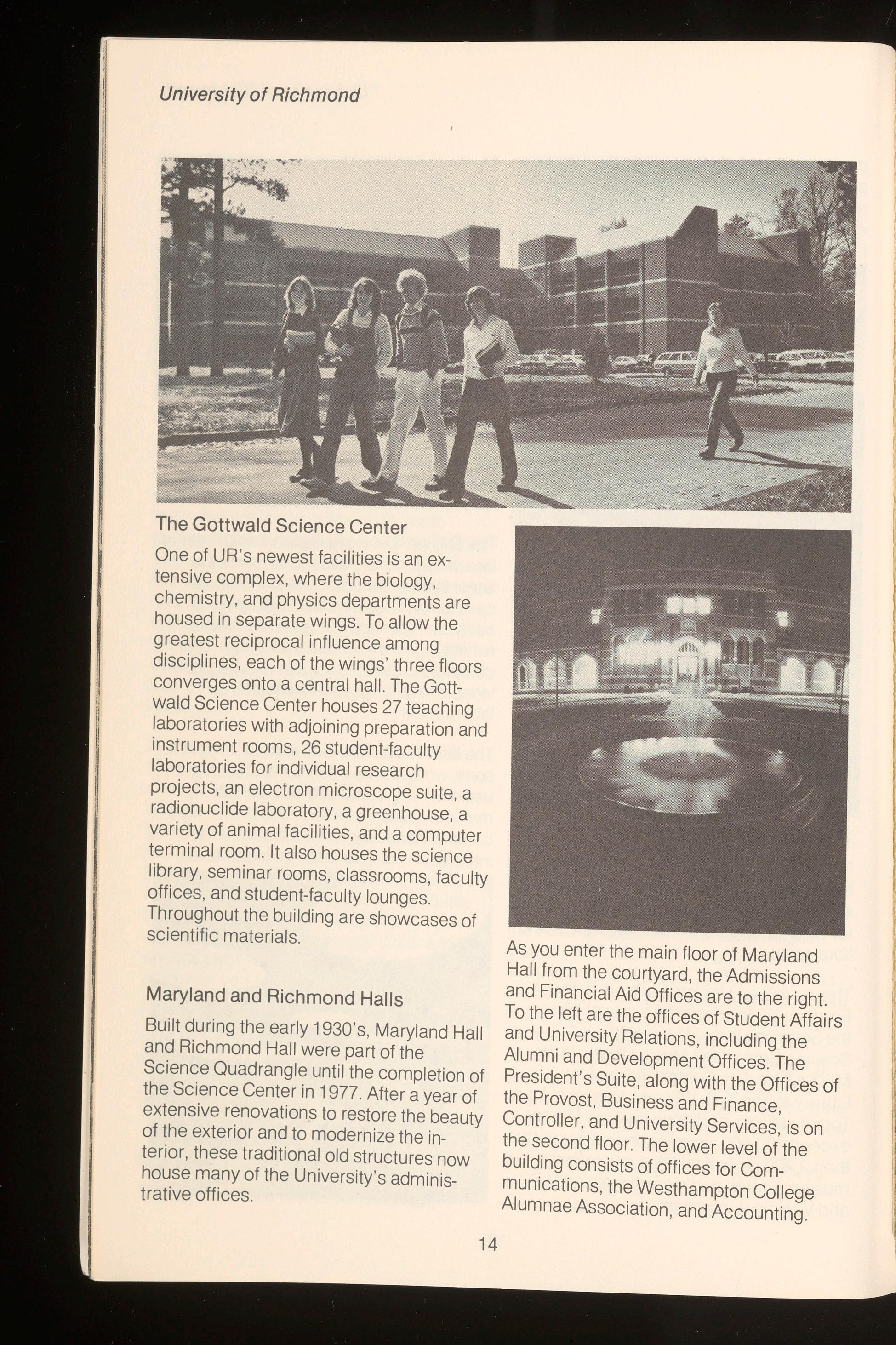
One of UR's newest facilities is an extensive complex, where the biology, chemistry, and physics departments are housed in separate wings. To allow the greatest reciprocal influence among disciplines, each of the wings' three floors converges onto a central hall. The Gottwald Science Center houses 27 teaching laboratories with adjoining preparation and instrument rooms, 26 student-faculty laboratories for individual research projects, an electron microscope suite, a radionuclide laboratory, a greenhouse, a variety of animal facilities, and a computer terminal room. It also houses the science library, seminar rooms, classrooms, faculty offices, and student-faculty lounges.
Throughout the building are showcases of scientific materials.
Marylandand RichmondHalls
Built during the early 1930's, Maryland Hall and Richmond Hall were part of the Science Quadrangle until the completion of the Science Center in 1977. After a year of extensive renovations to restore the beauty of the exterior and to modernize the interior, these traditional old structures now house many of the University's adminis- trative offices.
14
As you enter the main floor of Maryland Hall from the courtyard, the Admissions and Financial Aid Offices are to the right. To the left are the offices of Student Affairs and University Relations, including the Alumni and Development Offices. The President's Suite, along with the Offices of the Provost, Business and Finance, Controller, and University Services, is on the second floor. The lower level of the building consists of offices for Communications, the Westhampton College Alumnae Association, and Accounting.
Universityof Richmond
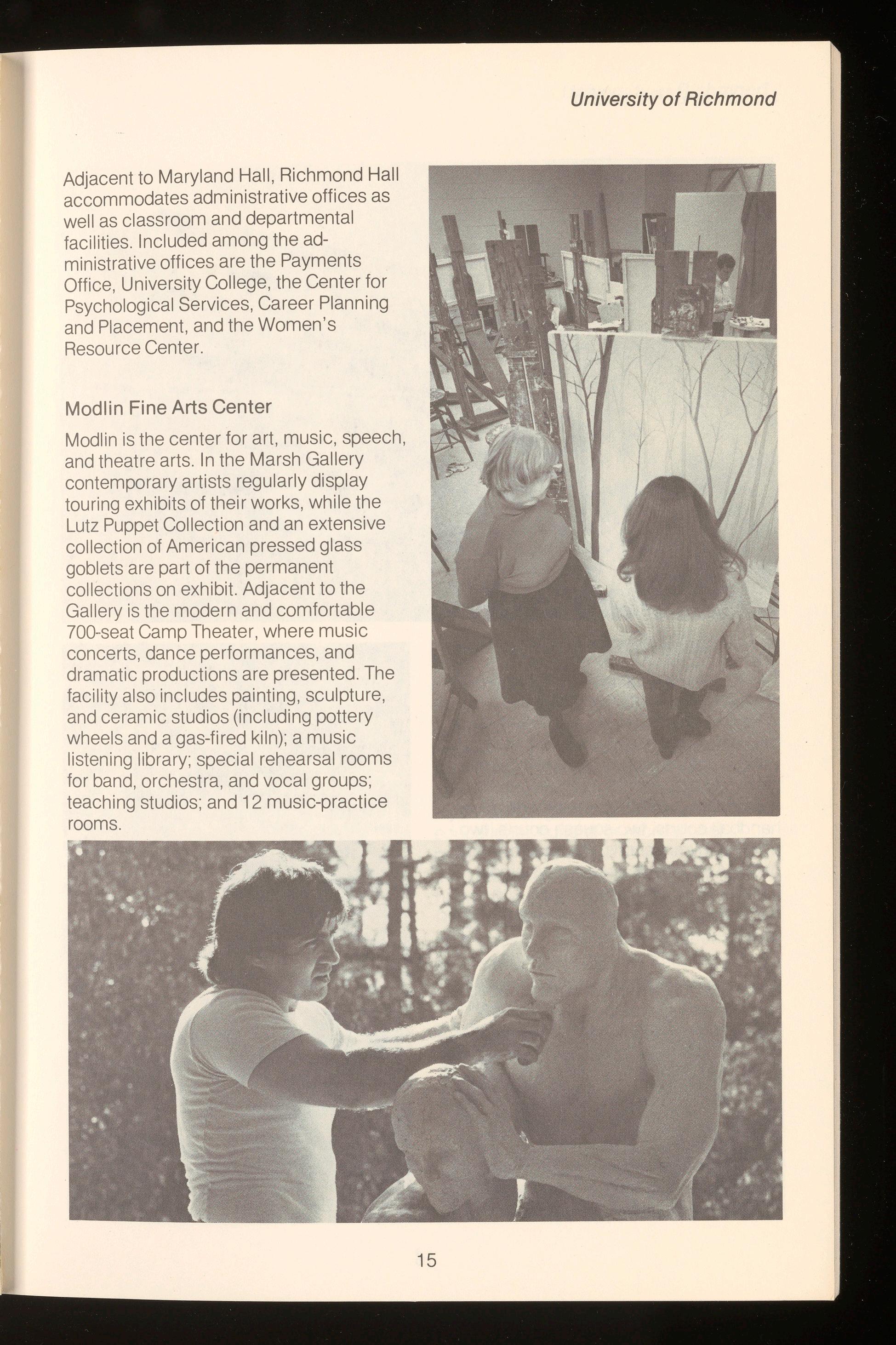
Adjacent to Maryland Hall, Richmond Hall accommodates administrative offices as well as classroom and departmental facilities. Included among the administrative offices are the Payments Office, University College, the Center for Psychological Services, Career Planning and Placement, and the Women's Resource Center.
Modlin Fine Arts Center
Modlin is the center for art, music, speech, and theatre arts. In the Marsh Gallery contemporary artists regularly display touring exhibits of their works, while the Lutz Puppet Collection and an extensive collection of American pressed glass goblets are part of the permanent collections on exhibit. Adjacent to the Gallery is the modern and comfortable 700-seat Camp Theater, where music concerts, dance performances, and dramatic productions are presented. The facility also includes painting, sculpture, and ceramic studios (including pottery wheels and a gas-fired kiln); a music listening library; special rehearsal rooms for band, orchestra, and vocal groups; teaching studios; and 12 music-practice rooms.
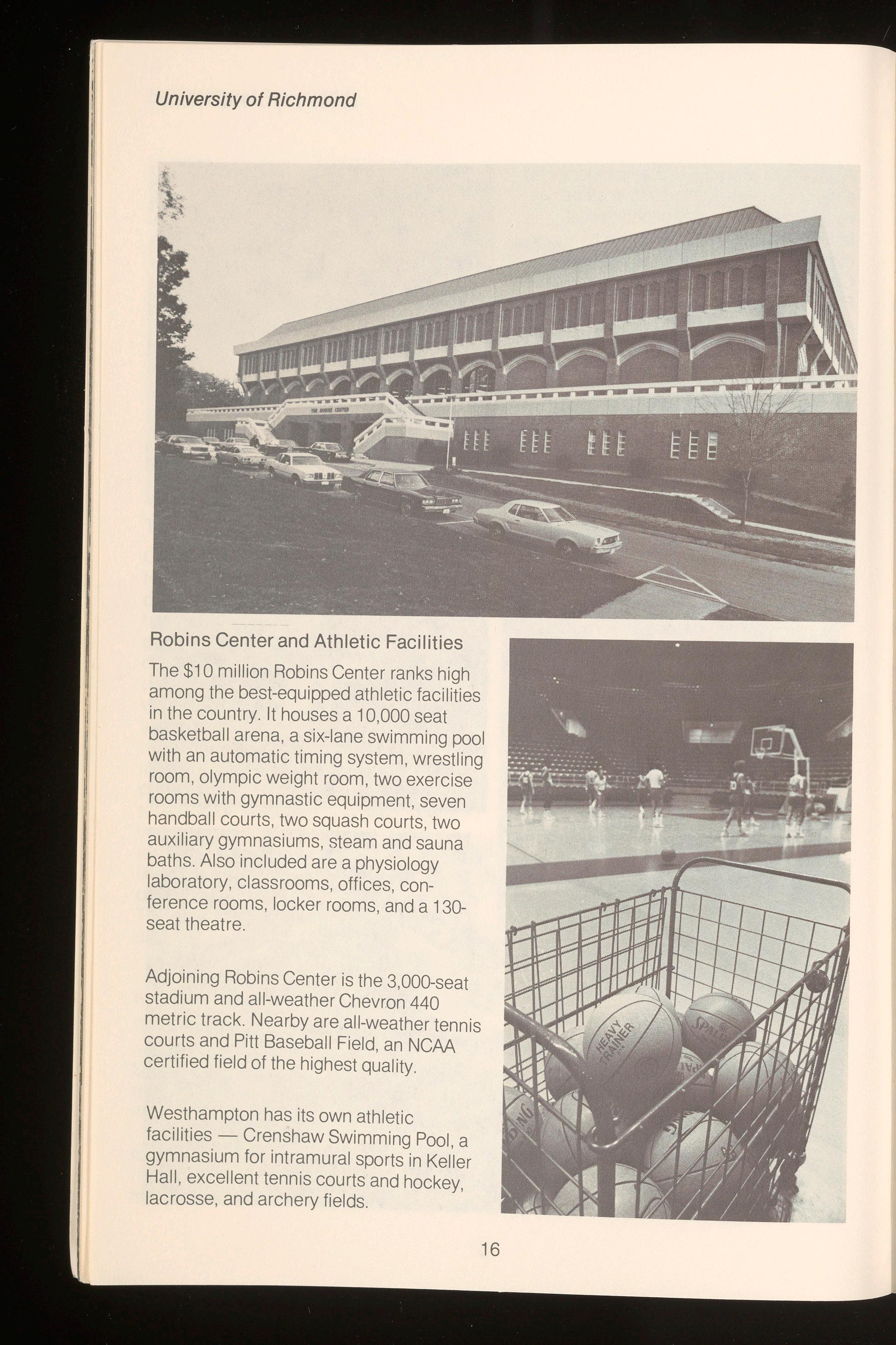
RobinsCenter and Athletic Facilities
The $1 0 million Robins Center ranks high among the best-equipped athletic facilities in the country. It houses a 10,000 seat basketball arena, a six-lane swimming pool with an automatic timing system, wrestling room, olympic weight room, two exercise rooms with gymnastic equipment, seven handball courts, two squash courts, two auxiliary gymnasiums, steam and sauna baths. Also included are a physiology laboratory, classrooms, offices, conference rooms, locker rooms, and a 130seat theatre.
Adjoining Robins Center is the 3,000-seat stadium and all-weather Chevron 440 metric track. Nearby are all-weather tennis courts and Pitt Baseball Field, an NCAA certified field of the highest quality.
Westhampton has its own athletic facilities -Crenshaw Swimming Pool, a gymnasium for intramural sports in Keller Hall, excellent tennis courts and hockey, lacrosse, and archery fields.
City of Richmond
Although the University of Richmond is a complete community in itself -with a full range of cultural , social, and recreational opportunities on its own campus -we would be remiss not to mention the advantages of the University's location.
Richmond, with a metropolitan population of a half million , is the capital of Virginia Traditionally the cultural center of the South, it is a major financial, business and industrial center. Not only do some students find part-time or summer employment in the city, but many decide to remain in Richmond after graduation.
Because UR is situated just inside the western city limits, you are only 15-20 minutes from downtown Richmond. For easy access, public transportation comes to the main gate of the campus. During the year , the Virginia Museum of Fine Arts presents programs in theatre, dance, chamber music and applied art. The Richmond Symphony has an outstanding concert series. Popular musical and
Universityof Richmond
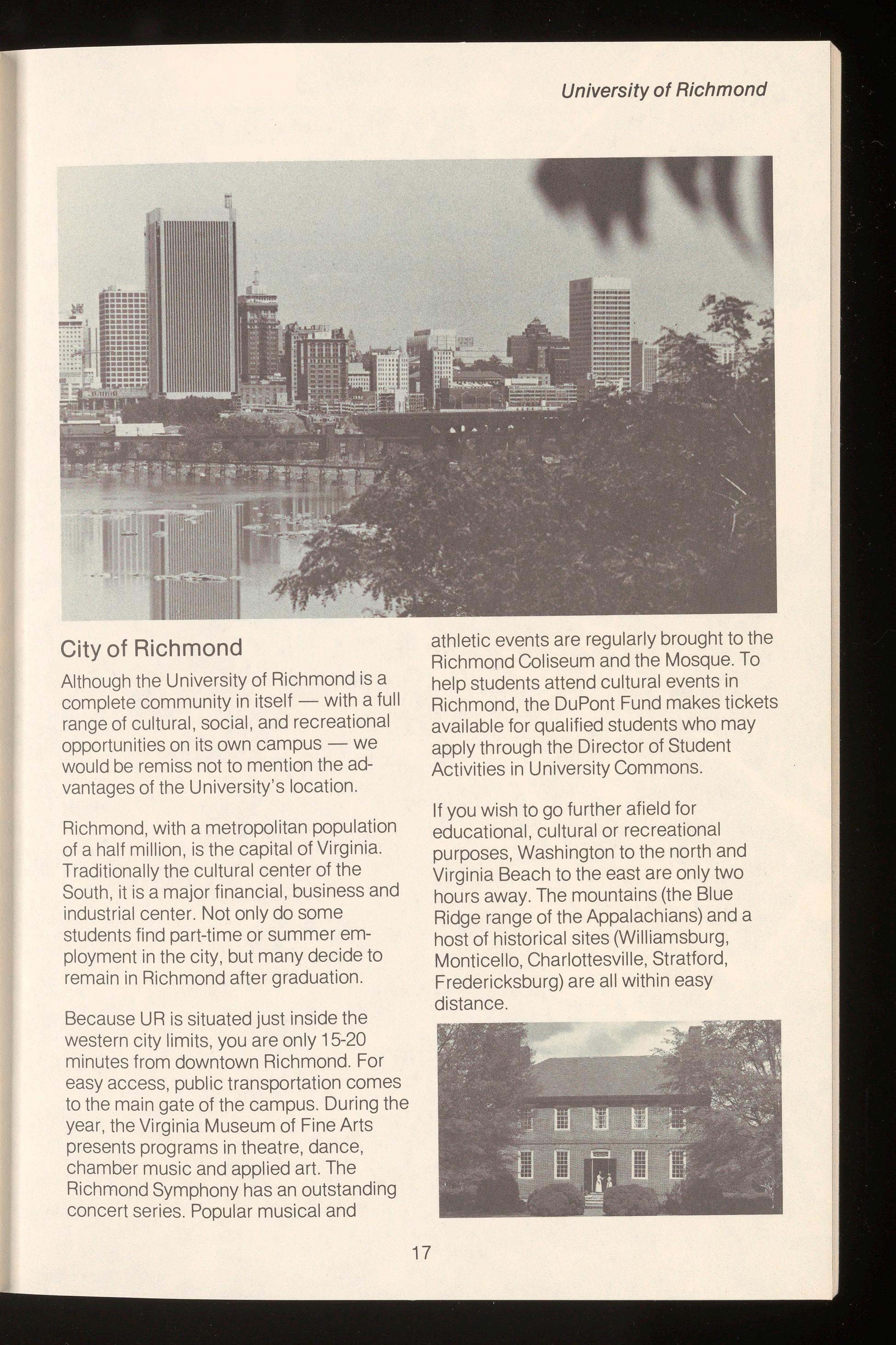
athletic events are regularly brought to the Richmond Coliseum and the Mosque. To help students attend cultural events in Richmond, the DuPont Fund makes tickets available for qualified students who may apply through the Director of Student Activities in University Commons.
If you wish to go further afield for educational, cultural or recreational purposes , Washington to the north and Virginia Beach to the east are only two hours away. The mountains (the Blue Ridge range of the Appalachians) and a host of historical sites (Williamsburg, Monticello, Charlottesville, Stratford, Fredericksburg) are all within easy distance
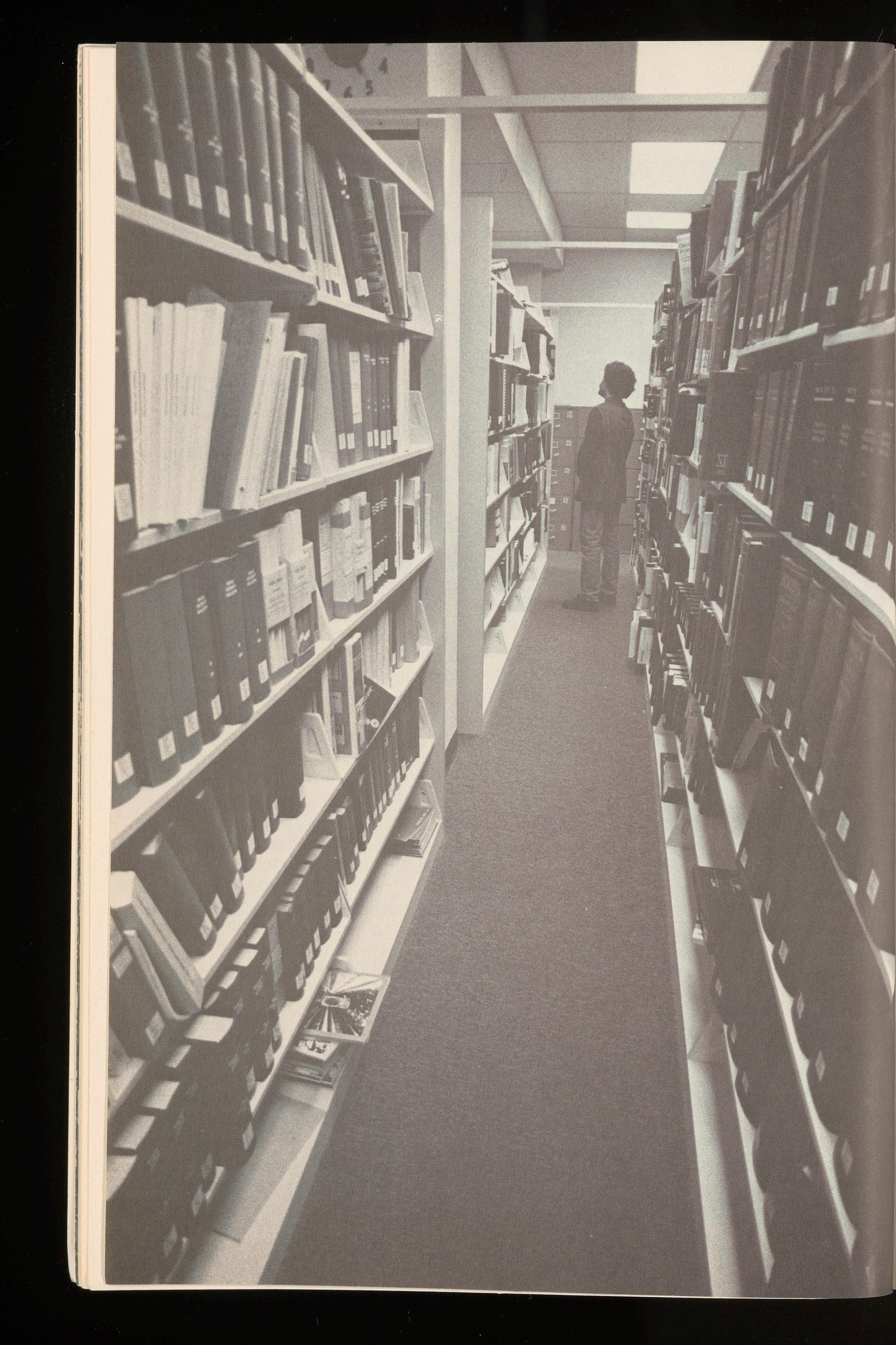
ACADEMIC LIFE
Westhampton and Richmond Colleges are four-year liberal arts and sciences institutions . The E. Claiborne Robins School of Business for juniors and seniors requires that entering students have two years of college education with a liberal arts background .
In the last decade , there was much debate over the value of a liberal arts education. This is not uncommon, for such debate historically takes place every time the country undergoes a period of economic recession -and subsides rapidly when the country experiences an economic upswing
Time has proved , however, that for most persons a liberal arts education is the best education Some professions -medicine, law, theology-ask that you have a liberal arts education before starting specialization
Because a sound liberal arts education teaches you to think, to reason, to make judgments, it greatly increases your career flexibility and mobility . Recent studies suggest that today's college student will change fields of work from four to seven times during a lifetime.
But whatever your eventual profession or career, you will advance faster and further if you are able to juxtapose your lifework in relation to the whole of society . Relationships are more clearly evident if you have the broad base of knowledge engendered by a liberal arts education.
Some people weigh the value of higher education only in terms of professional success If you study an issue of Who's Who,the large percentage of these men and women who have based their success on a liberal arts education will become apparent.
ingredients: breadth and depth of knowledge. You acquire breadth by taking courses in humanities and arts, social sciences, natural sciences, and health and physical education You acquire depth of knowledge by concentrating (usually in your last two years) in a single area of study. For specific course listings, see pages 65-69.
Fields of Concentration
Richmond and Westhampton Colleges offer the following fields of concentration:
Area Studies
American Studies
Classical Civilization
Russian Area Studies
Urban Studies
Women ' s Studies
Art
Art History
Studio Art
Biology
Chemist ry
Classical Studies
Economics
Education
Early Childhood
Elementary
Secondary
English
Health Education
History
Interdisciplinary Studies
Journalism
Mathematical.Sciences
Modern Foreign Languages
French German
Spanish
Music
Music Education
Music History and Theory
Performance
Philosophy
Physical Education
Physics
Political Science
Psychology
Religion
Sociology
Speech Communication
Theatre Arts
Other courses of study include :
Military Science
Italian
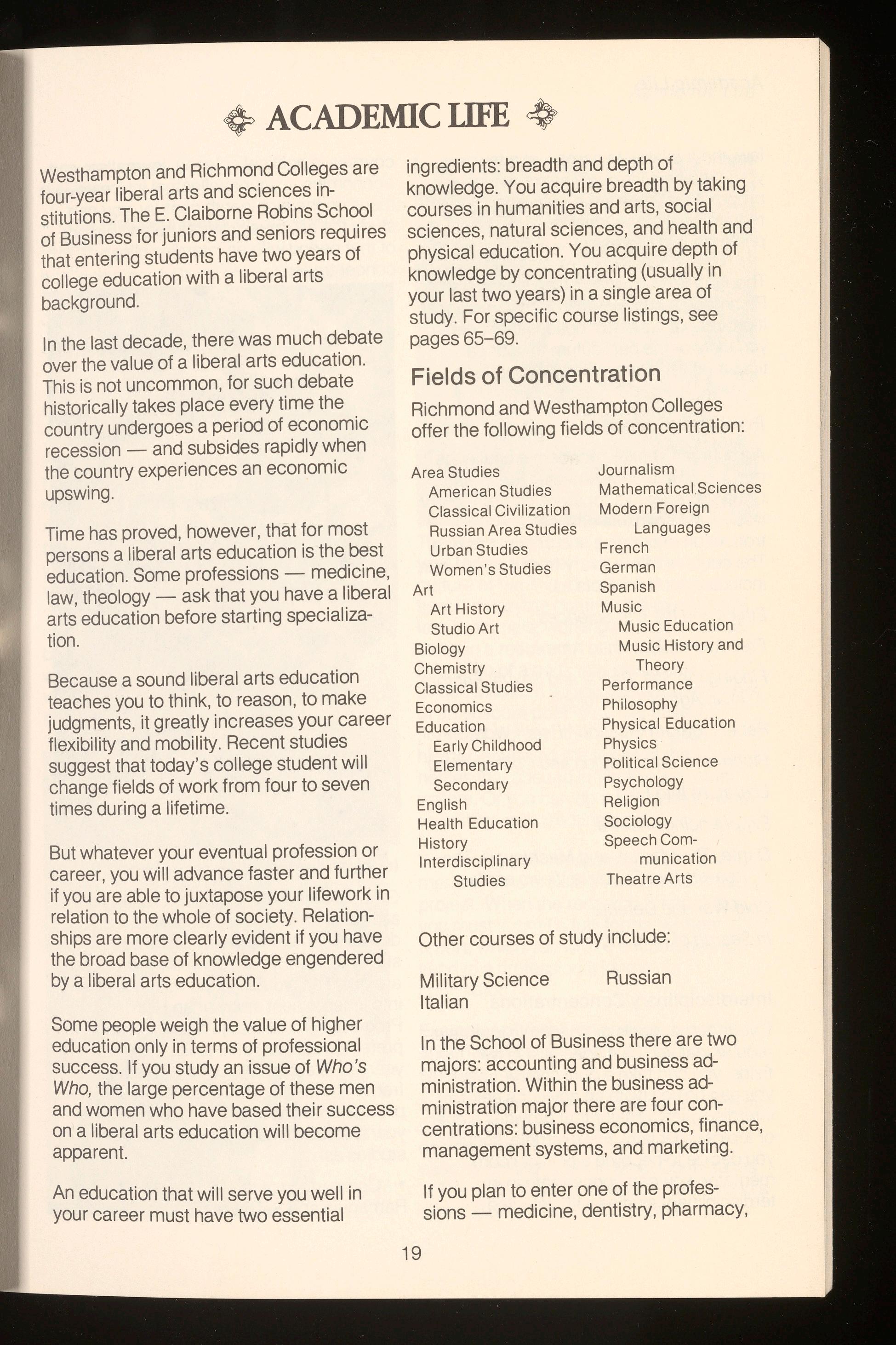
Russian
In the School of Business there are two majors : accounting and business administration Within the business administrat ion major there are four concentrations : business economics, finance, management systems , and marketing.
An education that will serve you well in your career must have two essential 19
If you plan to enter one of the professions -medicine, dentistry, pharmacy,
law, the ministry, to name just a fewyour faculty advisor will help you plan a program that meets the entrance requirementsfor admissionto a postgraduate professionalschool.
Though the foundationof the Universityof Richmond's curriculum is highly traditional, it provides a variety of options that enable you to tailor the curriculum to your particular goals, interests,and capabilities.
Freshmen Colloquia
A freshman seeking academic challenge may enroll in a one-semesterFreshman Colloquium.With a focus on contemporary issues,the colloquia serve as an introduction to creative and critical thinking. The courses offered vary from year to year, including such subjects as:
Ethics and the Life Sciences
Freedom of Dissent in America
Finding the Self: Racial and SexualFactors in an Age of Technology
Rebels, Reformers,and "Real" Women
Richmond: Preservationand Conservation
Literature Into Film
Experiencing Theatre
Dante, The Idealist, and Machiavelli, The Realist: Two Opposite Viewsof Man
Cold War and Detente
In
Search of King Arthur
Interdisciplinary Concentrations
If your career goals or academic interests require that you be a specialist in two fields, you can take a dual concentrationor you can design (with an advisor's help)an interdisciplinary major that providesa dual or topical specialty. For example,should you decide to become a political commentator, you can concentrate in interdisciplinary studies with selected
courses in political science, journalism and economics. If your intellectual interests focus on the eighteenth century, you can study the art, music, literature and history of that period with an interdisciplinary concentration.
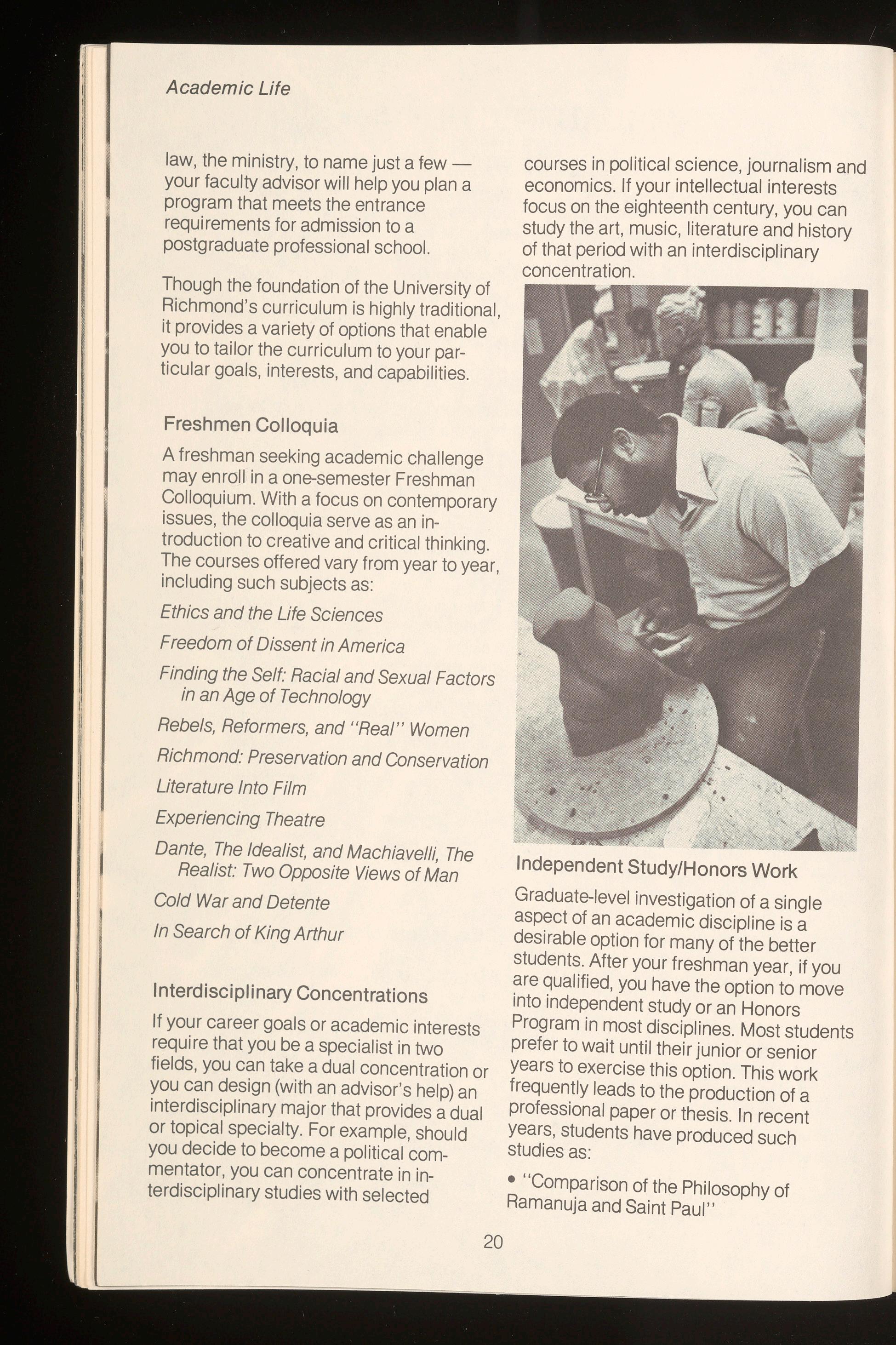
IndependentStudy/Honors Work
Graduate-levelinvestigationof a single aspect of an academic discipline is a desirable option for many of the better students.After your freshman year, if you are qualified,you have the option to move into independentstudy or an Honors Program in most disciplines. Most students prefer to wait until their junior or senior years to exercise this option. This work frequently leads to the production of a professionalpaper or thesis. In recent years, students have produced such studies as:
• "Comparison of the Philosophyof Ramanujaand Saint Paul"
20
• "Rehabilitation vs. Punishment in Prisons"
• "The History of Religious Struggle in Russia"
• "Cervantes: A Study of His Exemplary Novels and their Relevance to Twentieth Century Philosophy and Literature"
• " The Vision of Aldous Huxley"
UndergraduateResearchProgram
The University of Richmond is one of the few institutions of higher education in the United States that has undergraduate research funds available in any field of research. If you show aptitude for research, your professors will encourage you to apply for an undergraduate research grant. These funds from research grants help to provide the materials necessary in your work Your project may be a brainstorm of your own, a project in which you and a faculty member are working jointly, or some aspect of a project that is part of a faculty member's ongoing research .
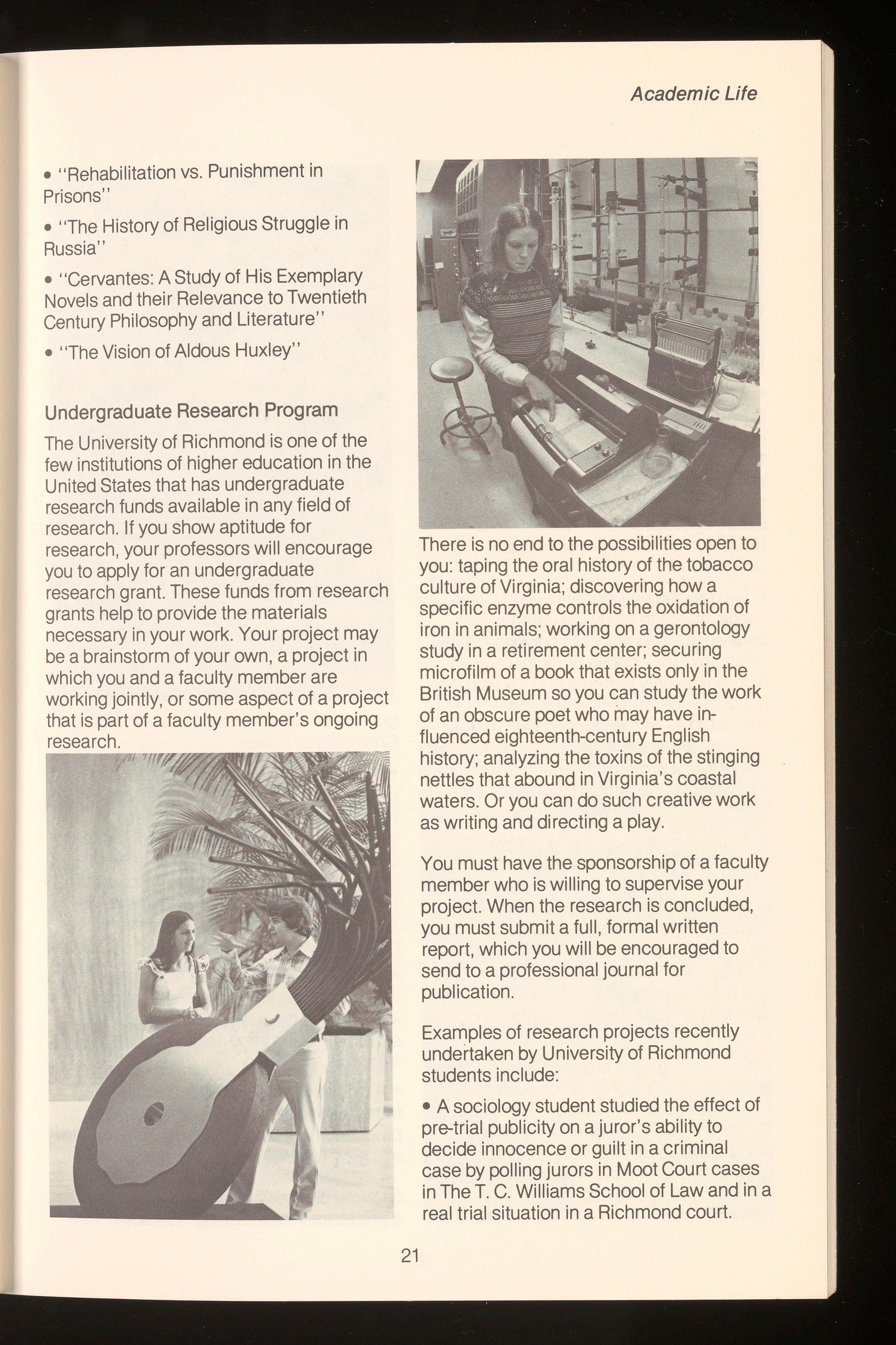
There is no end to the possibilities open to you: taping the oral history of the tobacco culture of Virginia; discovering how a specific enzyme controls the oxidation of iron in animals; working on a gerontology study in a retirement center; securing microfilm of a book that exists only in the British Museum so you can study the work of an obscure poet who may have influenced eighteenth-century English history; analyzing the toxins of the stinging nettles that abound in Virginia's coastal waters Or you can do such creative work as writing and directing a play.
You must have the sponsorship of a faculty member who is willing to supervise your project. When the research is concluded, you must submit a full, formal written report, which you will be encouraged to send to a professional journal for publication.
Examples of research projects recently undertaken by University of Richmond students include :
• A sociology student studied the effect of pre-trial publicity on a juror's ability to decide innocence or guilt in a criminal case by polling jurors in Moot Court cases in The T. C. Williams School of Law and in a real trial situation in a Richmond court.
• A history student studiedthe role of Sir EdwardCoke and Sir ThomasWentworth in the framing of the Petitionof Right in 1628, a major factor in the outbreakof civil war in Englandin 1642. In additionto the resourcesof the BoatwrightLibrary,she used the collections of Widenerand HoughtonLibrariesat Harvardand Yale Universities
• Two psychologystudentsused a testtaking analogto study the difference in behavioramong studentscopingwith test situations.They chose participantswith different anxiety patternsand, by using reward for performance in a test, simulated -in a controlledway -the stress of a real test situation Their findings resulted in a professionalpaper that was presentedat the annual meetingof the SoutheasternPsychologicalConvention.
• A music student analyzedth~ secular choral works of RalphVaughanWilliams (1872-1958), an Englishcomposer. His work included harmonic, melodic, rhythmic, and textural studies, as well as relationshipsof the music to the text. He also identifiedthe traditionalfolk melodies and lyrics used by VaughanWilliamsand analyzedthe composer's treatmentof them.
• A physics student studiedthe changesin optical propertiesof semiconductor materials exposedto bursts of laser light. This study provided informationon the electrical propertiesof the materials responsiblefor the changesinducedby laser excitation His paper, co-authored with ProfessorR. Wayne Major,was
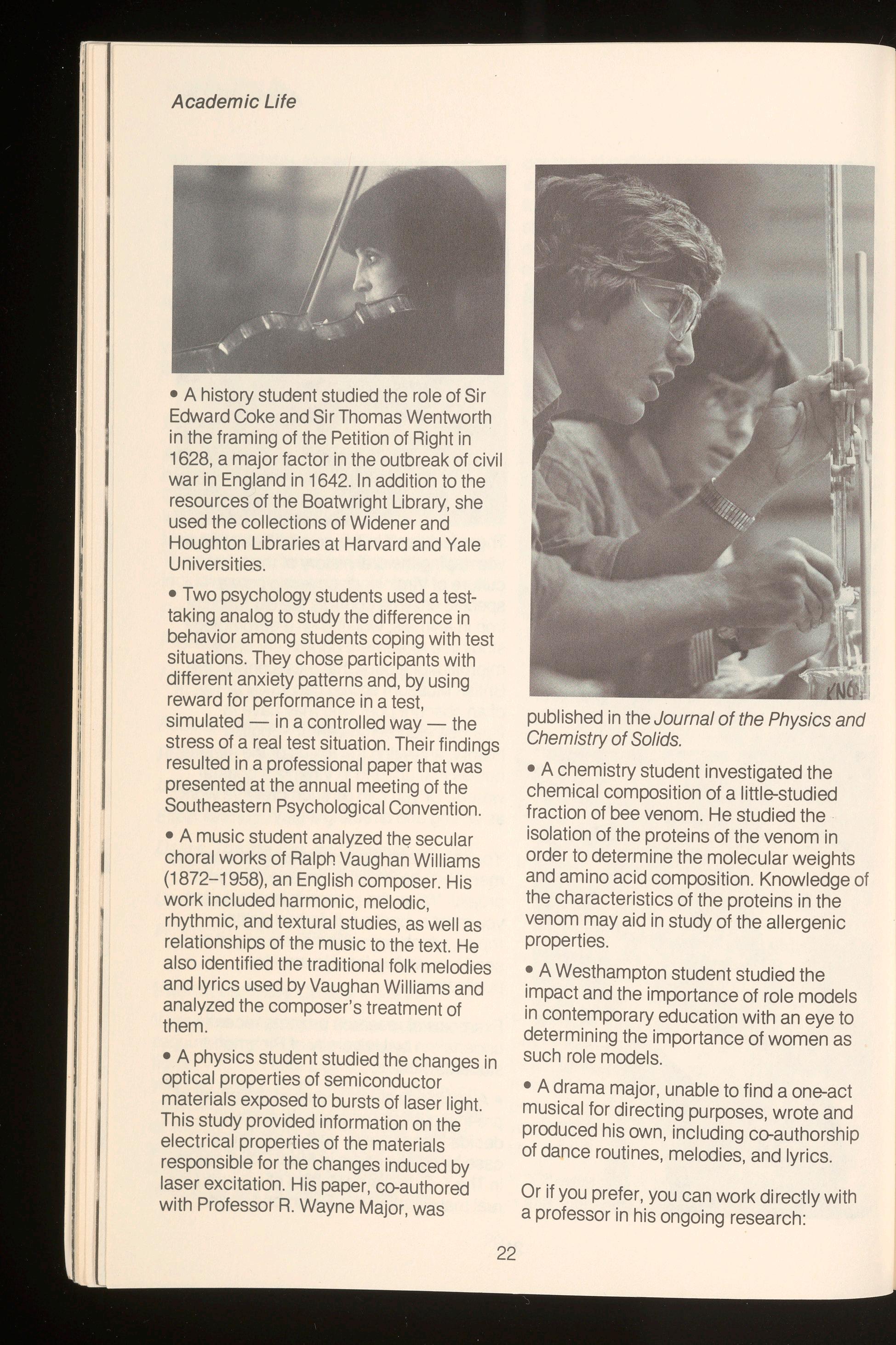
publishedin the Journal of the Physics and Chemistryof Solids.
• A chemistry student investigatedthe chemical composition of a little-studied fraction of bee venom. He studied the isolationof the proteins of the venom in order to determine the molecular weights and amino acid composition. Knowledgeof the characteristics of the proteins in the venom may aid in study of the allergenic properties.
• A Westhamptonstudent studied the impact and the importance of role models in contemporaryeducation with an eye to determiningthe importance of women as such role models.
• A drama major, unable to find a one-act musical for directing purposes,wrote and produced his own, including cerauthorship of dance routines, melodies, and lyrics
Or if you prefer, you can work directly with a professor in his ongoing research:
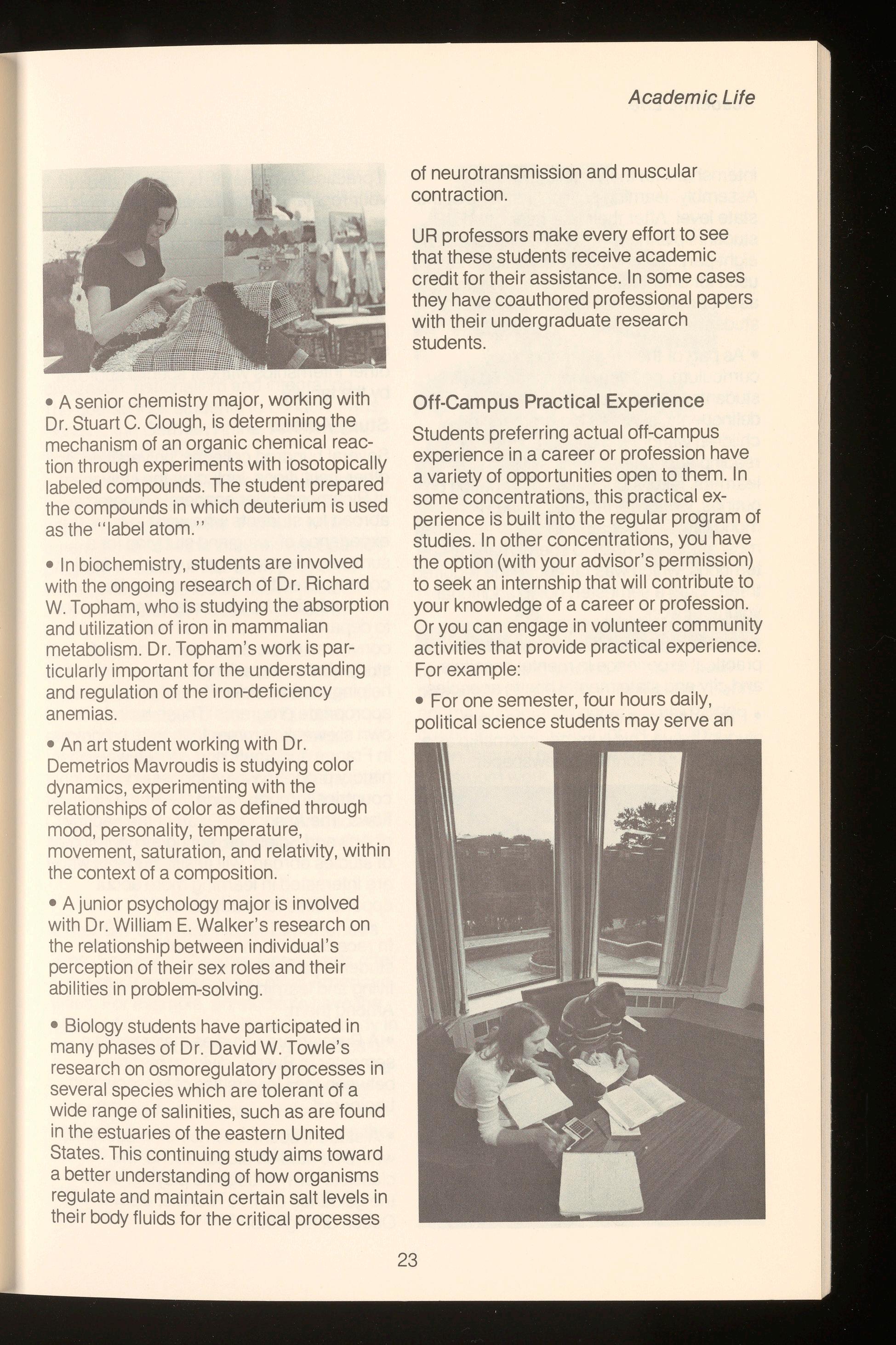
• A senior chemistry major, working with Dr. Stuart C. Clough, is determining the mechanism of an organic chemical reaction through experiments with iosotopically labeled compounds. The student prepared the compounds in which deuterium is used as the "label atom."
• In biochemistry, students are involved with the ongoing research of Dr. Richard W . Topham, who is studying the absorption and utilization of iron in mammalian metabolism. Dr Topham's work is particularly important for the understanding and regulation of the iron-deficiency anemias
• An art student working with Dr Demetrios Mavroudis is studying color dynamics, experimenting with the relationships of color as defined through mood, personality, temperature, movement, saturation, and relativity, within the context of a composition.
• A junior psychology major is involved with Dr. William E. Walker's research on the relationship between individual's perception of their sex roles and their abilities in problem-solving.
• Biology students have participated in many phases of Dr. David W. Towle's research on osmoregulatory processes in several species which are tolerant of a wide range of salinities, such as are found in the estuaries of the eastern United States This continuing study aims toward a better understanding of how organisms regulate and maintain certain salt levels in their body fluids for the critical processes
of neurotransmission and muscular contraction.
UR professors make every effort to see that these students receive academic credit for their assistance. In some cases they have coauthored professional papers with their undergraduate research students
Off-CampusPracticalExperience
Students preferring actual off-campus experience in a career or profession have a variety of opportunities open to them In some concentrations, this practical experience is built into the regular program of studies. In other concentrations, you have the option (with your advisor's permission) to seek an internship that will contribute to your knowledge of a career or profession. Or you can engage in volunteer community activities that provide practical experience. For example:
• For one semester, four hours daily, political science students may serve an
internshipwith the Virginia General Assembly, learning politics firsthand at the state level.After their internship,two UR students planned,wrote and producedan eight-partmultimedia presentationthat is used for orientation for future interns and as a learning tool for faculty and other students.
• As part of their regular sociology curriculum, one year more than 50 UR students volunteeredto work with juvenile delinquents,serve as big brothers to children without a male parent, teach readingand mathematics skills to slow learners,take youngsterson probationon outings, work with inmates of the Richmond City Jail. Because of the experience most students chose to spend many afternoons,which was far above the required three hours a semester, doing additional volunteer work
• Psychologystudents may acquire practical experience in mental hospitals and city and state mental health agencies
• Preparingfor a career in journalism,a student served his summer internshipas a reporter for a Richmond newspaper.
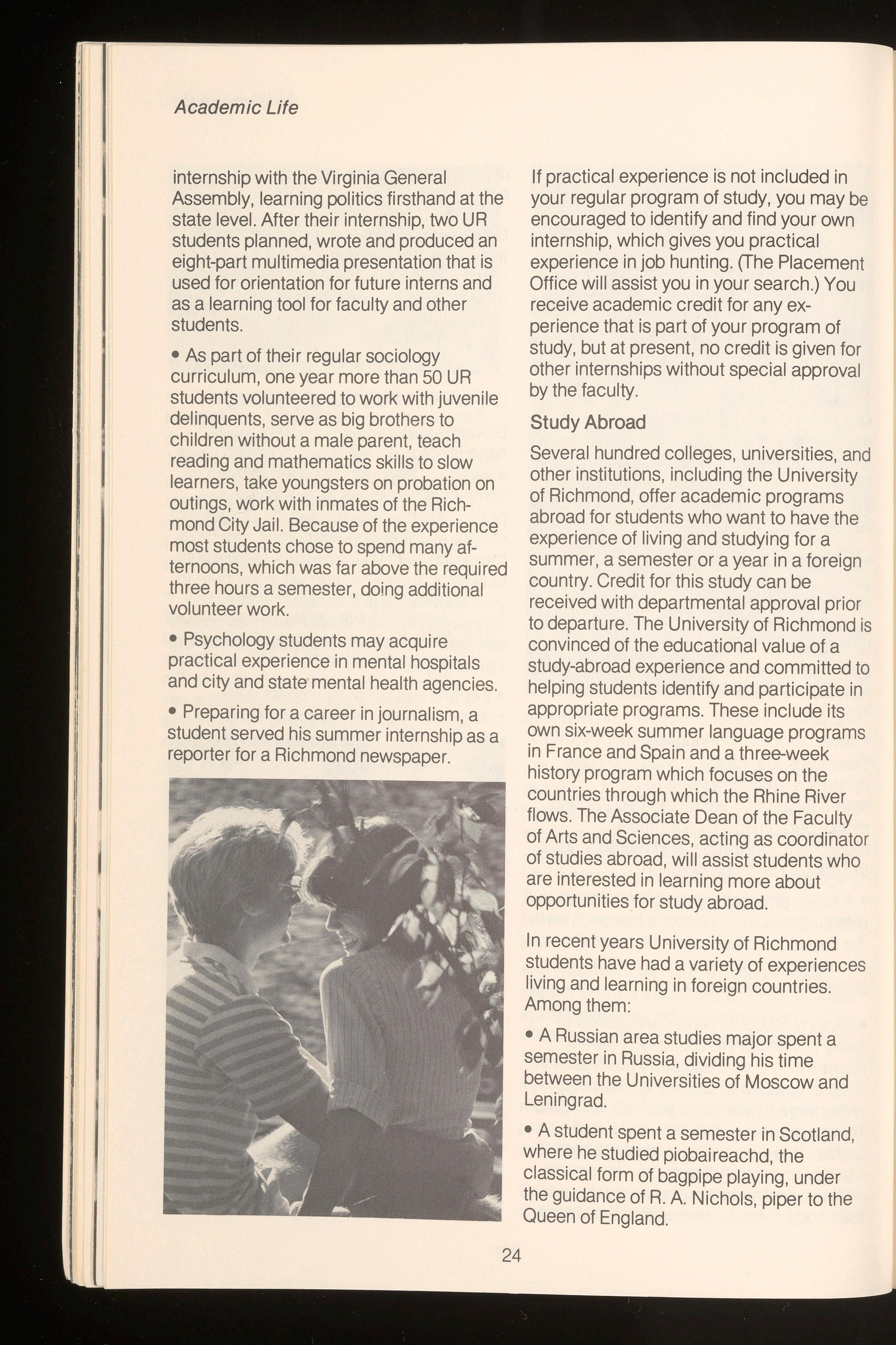
If practical experience is not included in your regular program of study, you may be encouragedto identify and find your own internship,which gives you practical experience in job hunting. (The Placement Office will assist you in your search.) You receive academic credit for any experience that is part of your program of study, but at present, no credit is given for other internshipswithout special approval by the faculty.
StudyAbroad
Several hundred colleges, universities, and other institutions, including the University of Richmond,offer academic programs abroad for students who want to have the experienceof living and studying for a summer, a semester or a year in a foreign country. Credit for this study can be receivedwith departmental approval prior to departure.The University of Richmond is convinced of the educational value of a study-abroadexperience and committed to helping students identify and participate in appropriate programs These include its own six-weeksummer language programs in France and Spain and a three-week history program which focuses on the countries through which the Rhine River flows. The Associate Dean of the Faculty of Arts and Sciences, acting as coordinator of studies abroad, will assist students who are interested in learning more about opportunitiesfor study abroad.
In recent years University of Richmond students have had a variety of experiences living and learning in foreign countries. Among them:
• A Russianarea studies major spent a semester in Russia,dividing his time between the Universities of Moscow and Leningrad.
• A student spent a semester in Scotland, where he studied piobaireachd, the classical form of bagpipe playing, under the guidance of R. A. Nichols, piper to the Queen of England.
• An Englishmajor spent her junior year at the HarlaxtonStudy Centre in Lincolnshire, England
• A group of UR students spent six weeks of summer study in Greece and Egypt underan instructor in classical studies.
• Two history professors gave an intensive study tour covering two powerful and disparatetrends in modern European civilization:nationalism and integration. The course took students to London, Paris, Geneva,the German Rhine,Amsterdam, Strasbourg,and Kain.
• Several University of Richmond students participatedin the UR-sponsoredsummer program in La Rochelle, France, while others enrolled in the UR summer Spanish program in Salamanca Both programs were directed and led by native speakers who are regular UR faculty members
Experiencesabroad, of course, are not limited solely to study. The University Choir and Schola Cantorum went on a threeweek summer tour of Central Europe, singing in Basel, St. Moritz, Salzburg, Vienna, Innsbruck, and Prague.The highlightof the tour was a performance of Bach's Mass in B Minor, with the Prague ChamberOrchestra under the direction of Neville Marriner, internationally renowned British conductor.
OtherOff-CampusTravel Experiences
From time to time, some departments offer short study experiences in other American cities For example, art students have the option of a week of faculty-directed study in the galleries, museums, and art studios of New York City; theatre arts majors spent a week studying contemporary Broadway and off-Broadwaydrama; political science studentsspent several days observing the Senate,House of Representatives,and some of the federal departments in Washington . Summer school students learnedthe mechanics of television and
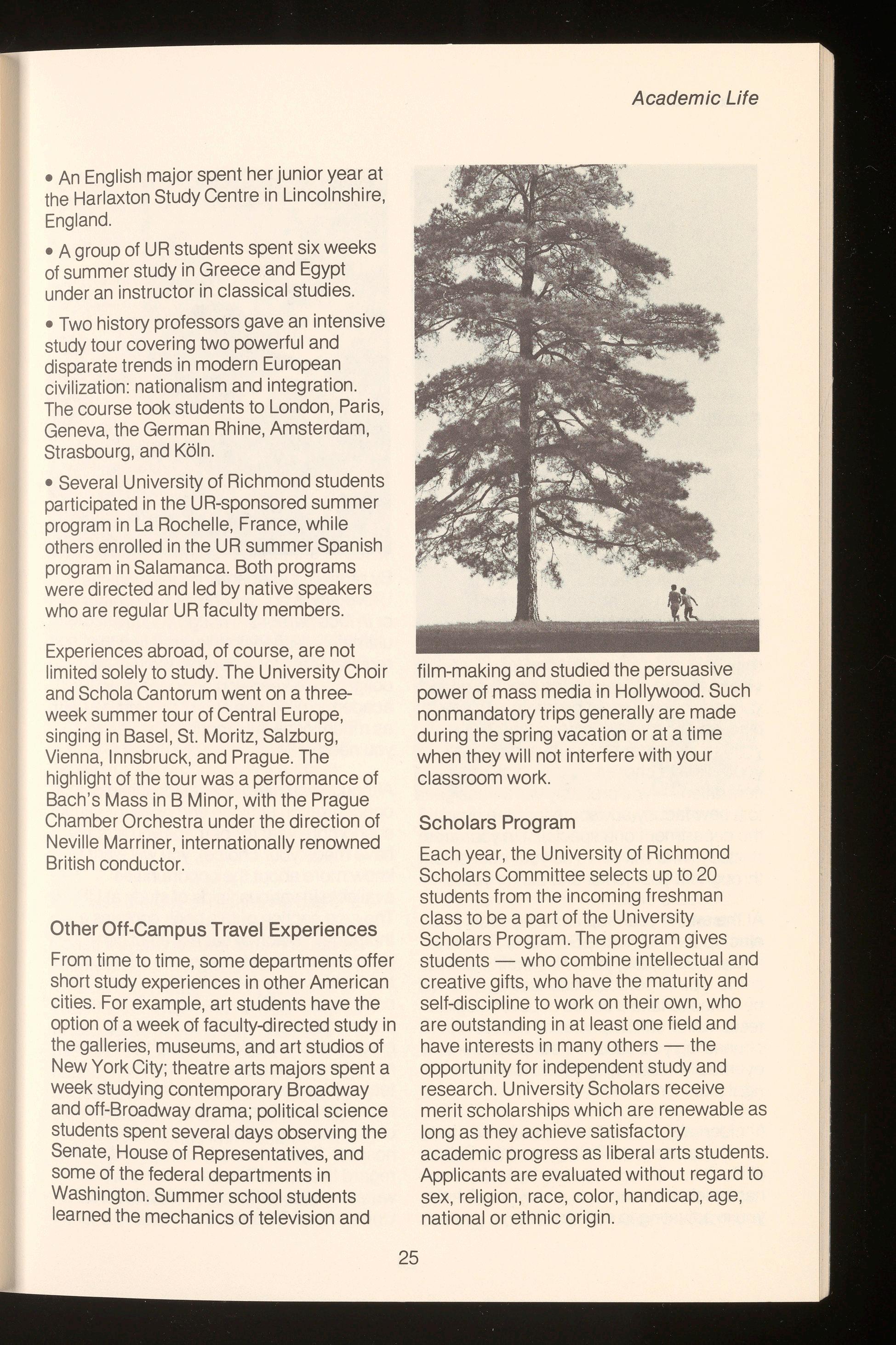
film-making and studied the persuasive power of mass media in Hollywood Such nonmandatory trips generally are made during the spring vacation or at a time when they will not interfere with your classroom work.
ScholarsProgram
Each year, the University of Richmond Scholars Committee selects up to 20 students from the incoming freshman class to be a part of the University Scholars Program The program gives students -who combine intellectual and creative gifts, who have the maturity and self-disciplineto work on their own, who are outstanding in at least one field and have interests in many others -the opportunity for independent study and research. University Scholars receive merit scholarships which are renewable as long as they achieve satisfactory academic progress as liberal arts students Applicants are evaluated without regard to sex, religion, race, color, handicap, age, national or ethnic origin.
FacultyAdvisors
Before entering college, you will be assigned to a faculty advisor. During your first week on campus, your advisor will help you plan your program and answer any questions you may have about academic life. From that point on, you should see your advisor regularly for assistance in any academic, career planning, or personal adjustment problems. Occasionally, your counselor may hold informal gatherings for all advisees. At the close of each grading period your advisor will meet privately with you to discuss academic progress. At the end of your sophomore year -by which time you will have chosen your field of concentration -you probably will be assigned to a new faculty advisor, either the head of the department or a specialist in your area of study, who will serve as your counselor throughout your junior and senior years.
At the end of your sophomore year, if you elect to transfer to the School of Business and are accepted, you will benefit from the same type of personal counseling. You will be asked to take a series of psychological tests, which will help your advisor in counseling you about career plans -and eventually in assisting you to locate the right job.
(Incidentally, in addition to faculty advisors, both Westhampton College and the School of Business have senior student advisors, hand-picked upperclassmen who will help you in adjusting to college life.)

By providing academic counseling, the University is not serving as Big Brotheror in loco parentis.Though you are ultimately responsible for meeting the requirements for a degree, we feel an obligation to keep you apprised of your academic progress and to provide you with as much, or as little, counsel as you feel you need.
Although you need not select a field of concentration until the end of your sophomore year (or perhaps you already have made your choice), you will want to know more about the opportunities available in various fields of study at UR. The next section of this book contains a thumbnail sketch of each area of concentration. In most cases, you will be able to identify your interest by the name of the concentration. But not always. For example, perhaps you wish to become a medical technologist. Although UR does not offer a concentration in medical technology per se, you can take all the necessary studies preparatory to your year of clinical experience at an approved hospital. If you have any questions to ask in regard to a specific academic field, please write or call the Director of Admissions, University of Richmond.
RICHMOND COLLEGE AND WESTHAMPTON COLLEGE
AreaStudies
The Universitypresently offers students the opportunityto pursue interests in five major areas of a cross-disciplinary nature. Designedfor the individual desiring to integratevarious diverse course offerings into a broad perspective, choice may be madeof American Studies, Urban Studies, ClassicalCivilization,Women's Studies, and RussianArea Studies Courses leading to concentration in any one of these five areaswill be selected by the student in consultationwith advisors.
Eachof the five areas is under the direction of a special committee of faculty drawn from disciplinesappropriate to it. Students interestedin the possibility of concentration in one of the mentioned areas should approachthe Area Studies Director or a memberof the Area Studies Committee. The University's commitment to this dimensionof human inquiry is founded uponthe assumption that students accepted for the programs will receive rigorousinstruction with well-defined focus
Art
Becausethe City of Richmond has one of the largest art communities on the East Coast,it is only natural for UR to have a qualityprogram in art. UR is fortunate to be locatedwithin easy driving distance to Washington,D C , and Norfolk, Virginia, where some of the finest museums in this part of the country are located. The Virginia Museumin Richmond houses the South's largestart library and is impressive in its exhibitionsand other related activities. Thesefacilities add immeasurably to the UR art program.
As an art student, you may concentrate in either art history or studio art. Art
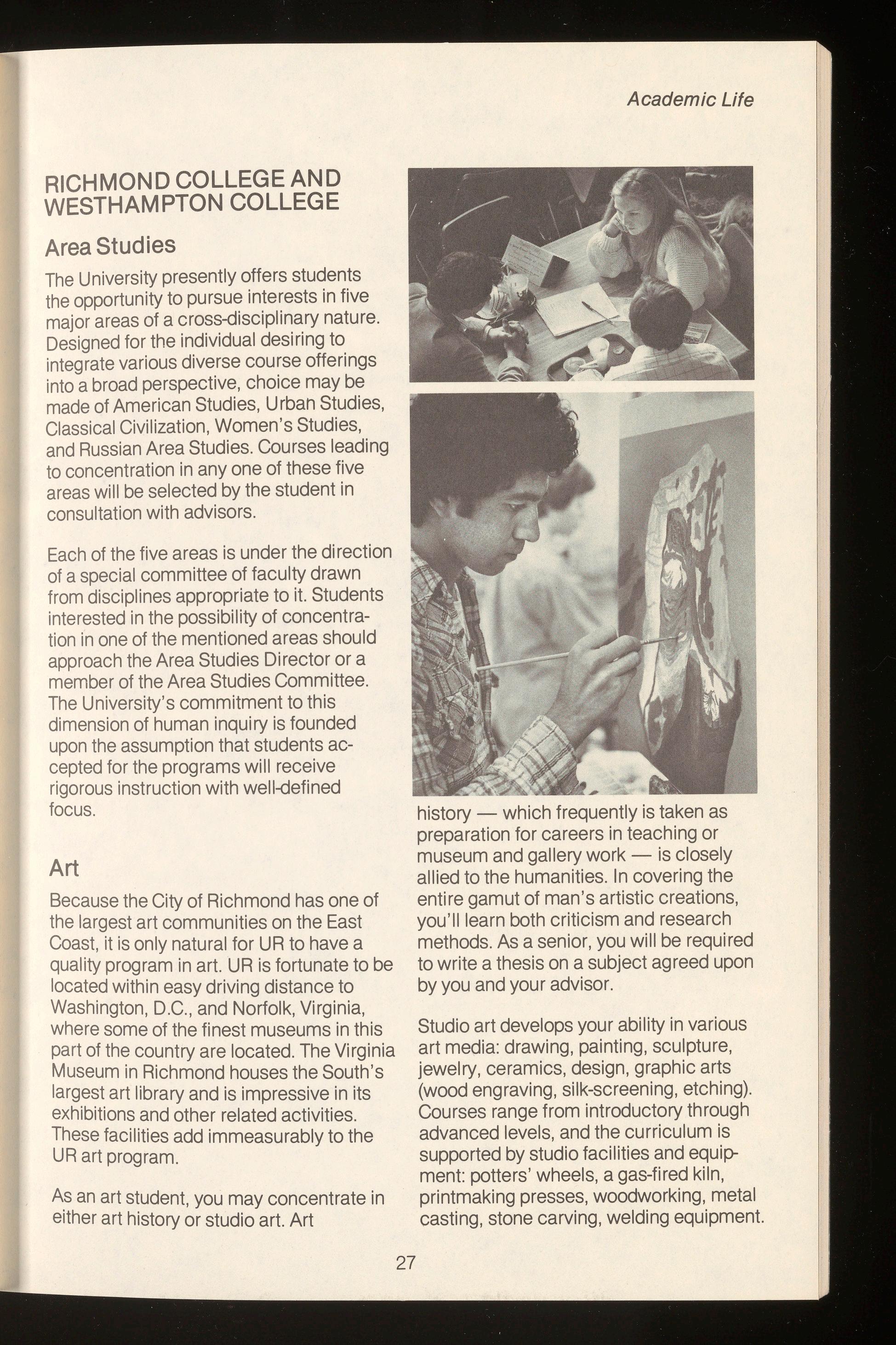
history -which frequently is taken as preparation for careers in teaching or museum and gallery work -is closely allied to the humanities. In covering the entire gamut of man's artistic creations, you'll learn both criticism and research methods. As a senior, you will be required to write a thesis on a subject agreed upon by you and your advisor.
Studio art develops your ability in various art media: drawing, painting, sculpture, jewelry, ceramics, design, graphic arts (wood engraving, silk-screening,etching). Courses range from introductory through advanced levels, and the curriculum is supported by studio facilities and equipment: potters' wheels, a gas-fired kiln, printmaking presses, woodworking, metal casting, stone carving, welding equipment.
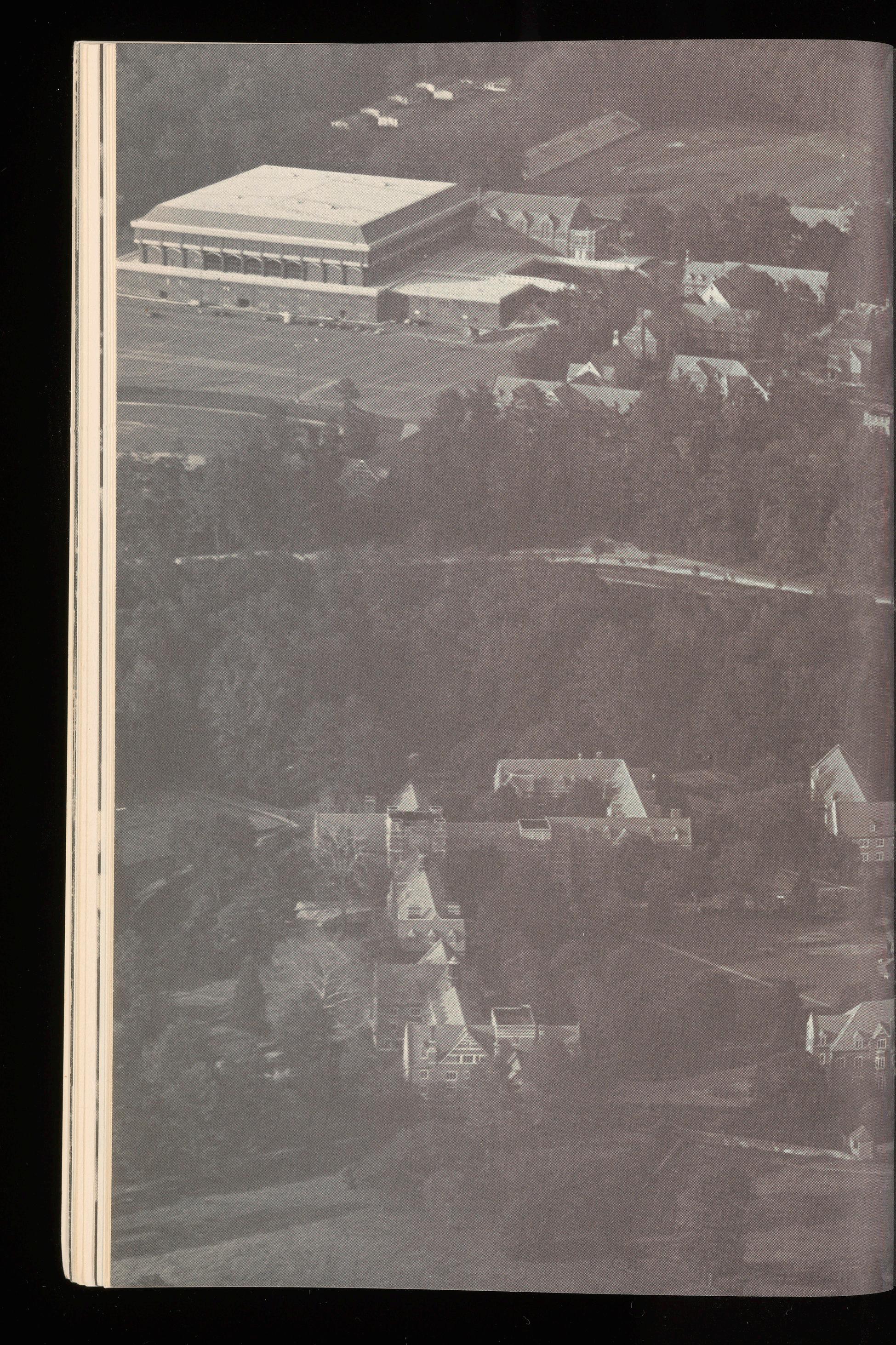

Academic Life
You will work w ithin the creative surroundingsof the Modlin FineArts Center,where studiosand classroomsare located. The Marsh Gallery in the Center has regularlychangingexhibitionswhich bring a variety of art to the campus, and in the Center's Camp Theaterplays,concerts, and lectures are presentedduring the year
The Organizationof Art Awareness(OM) , organizedby art students, offers practical experiencefor studentsto participatein lectures and exhibitions
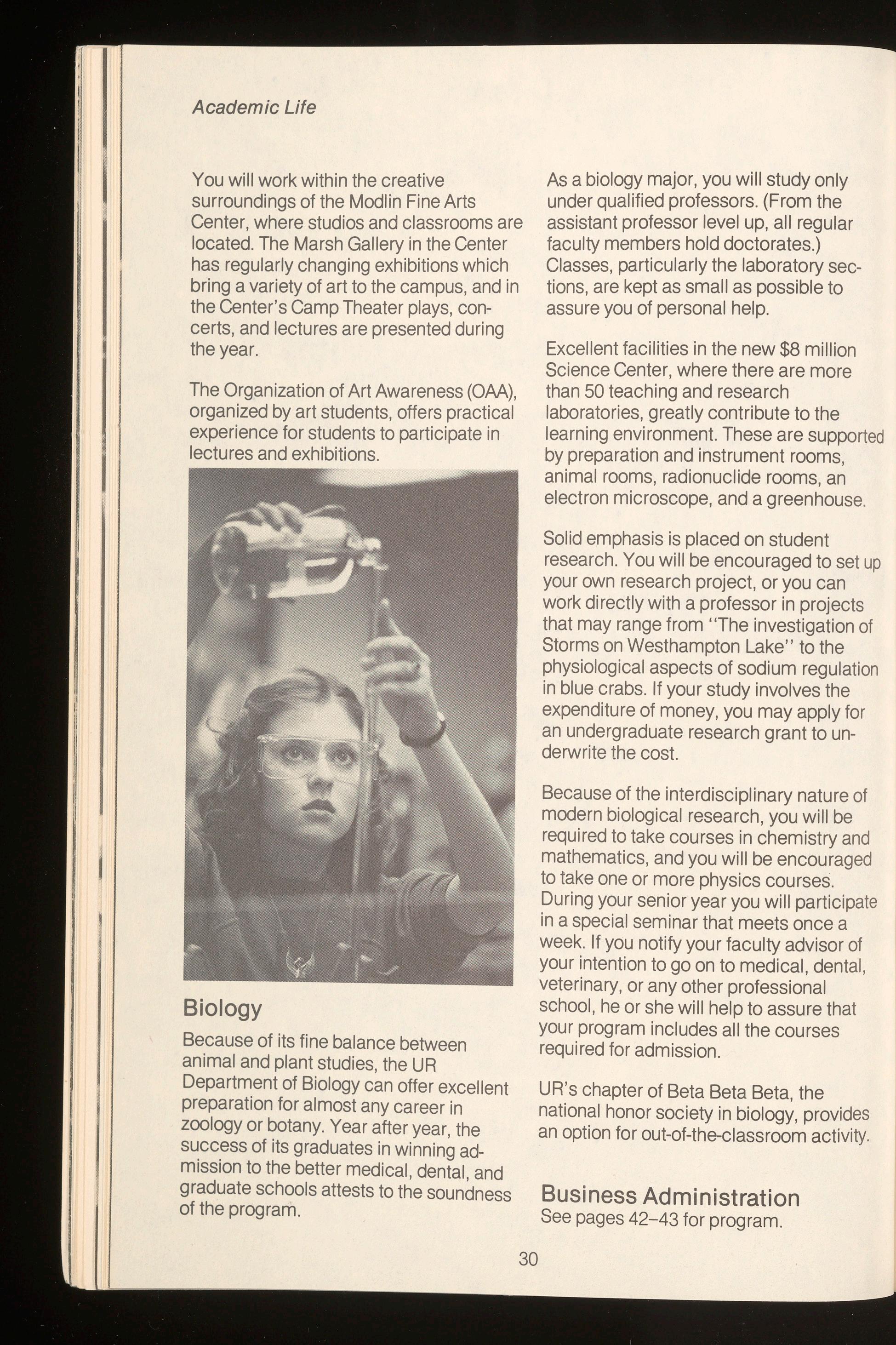
Biology
Because of its fine balance between animal and plant studies,the UR Departmentof Biologycan offer excellent preparationfor almost any career in zoologyor botany. Year after year, the success of its graduatesin winningadmission to the better medical,dental,and graduate schools attests to the soundness of the program.
As a biology major, you will study only under qualified professors (From the assistantprofessor level up, all regular faculty members hold doctorates.) Classes, particularly the laboratory sections, are kept as small as possible to assureyou of personal help
Excellentfacilities in the new $8 million Science Center,where there are more than 50 teaching and research laboratories , greatly contribute to the learningenvironment.These are supported by preparationand instrument rooms, animal rooms, radionuclide rooms, an electron microscope, and a greenhouse
Solid emphasis is placed on student research You will be encouraged to set up your own research project, or you can work directly with a professor in projects that may range from "The investigationof Storms on Westhampton Lake" to the physiologica l aspects of sodium regulation in blue crabs. If your study involves the expenditureof money, you may apply for an undergraduateresearch grant to underwrite the cost.
Becauseof the interdisciplinary nature of modern biological research, you will be requiredto take courses in chemistry and mathematics,and you will be encouraged to take one or more physics courses During your senior year you will participate in a special seminar that meets once a week. If you notify your faculty advisor of your intentionto go on to medical, dental, veterinary,or any other professional school, he or she will help to assure that your program includes all the courses requiredfor admission.
UR's chapter of Beta Beta Beta, the national honor society in biology, provides an option for out-of-the-classroomactivity.
BusinessAdministration
See pages 42-43 for program.
Academic Life
Chemistry
As a chemistry major, you can work toward a B.S.degree (the normal path for those who wish to go on to graduate school}, a BA degree (the usual path for those who wish to go on to medical school, dental school,or teach high school chemistry), or you can work toward either a B.S or a B.A. with a businessoption. (The last option was cited in Chemicaland EngineeringNews for expandingthe job opportunities for chemistrygraduates.)
In a sequence devised to meet your individualgoals, you will move through the variousaspects of organic, physical, analytical,bio and inorganic chemistry Naturally,your career goals will play an importantpart in your choice of electives. In your fourth year you will participate in a seniorseminar.
All chemistry classes and laboratories are taught in UR's new Gottwald Science Center,a well-equippedacademic installation.Major instruments include a nuclear magnetic resonance spectrometer, a mass spectrometer, UV-visible spectrophotometers,infrared spectrophotometers,a spectrofluorometer, atomic absorption spectrophotometers, gas liquid chromatographs and computer terminals.Although UR offers a master's degree in chemistry, equipment is not reservedfor the use of graduate students or professors.Undergraduate students routinelyuse these instruments.
As in other sciences, chemistry students are encouragedto engage in independent research,and the new Science Center providesspace reserved just for this endeavor.Funds to support these research projects are available.The chemistry program is accredited by the American ChemicalSociety, and the University has a chapter of Gamma Sigma Epsilon, the nationalchemistry honor society, and a StudentAffiliate Chapter of the American
Chemical Society. Because Richmond is a major chemical center, you will have an opportunity to gain a firsthand understanding of industrial chemistry.
ClassicalStudies
Study of the classics not only involves a study of the language and literature of ancient Greece and Rome, but includes the study of art, archeology, history, philosophy, religion -the total culture of the ancient world.

If you elect to major in classical studies, you will be required to have at least 24 semester hours of Greek or Latin above the intermediate level. In your senior year, you will either complete a project or take a comprehensive examination.
In addition to courses in Greek and Latin, classical studies offers a number of courses taught in English -courses treating Mediterranean art, archeology, history, literature, and mythology. Courses
in other disciplines -art history, philosophy,religion,literature, history - supplementand complementthe offerings in classical studies.
In your junior year, you may elect to take advantageof UR's study abroadoption to acquire a firsthand knowledgeof the art and archeologyof the ancient world
Campusactivities add to your classroom studies. Both OedipusRexand Lysistrata have been staged by the University Players,and Eta Sigma Phi,the classics honor society, welcomes qualified students.
Economics
For some reason,the study of economics has a dry-as-dustreputation.In reality, economics is one of the most exciting of all studies because it is totally concernedwith you and me, our future and our options At the moment, the entire world is concerned with the economics of oil -how it may change the balanceof power,what substitute form of energy can be found for it, whether you will haveto pay $2 for a gallon of gas
Becauseeconomics is concerned with the utilizationof our resources -which range from land to manpower -and because man is just awakeningto how limited our resourcesare, this career field is expandingeach year About half of all economistsfind jobs with business and industry;another quarter enter teaching; and most of the final quarter are in govern- ment service. But many economics majors enter noneof these fields; they use the study as an adjunct in such professions as law, journalism,ecology, urban planning.
At UR,economics courses are taught in the School of Business.They range from Principlesof Economicsto Econometrics , PublicFinanceand Labor Economics. Many of our economics majors carry a double major -teaming economics with political science, sociology, or business administration .
Education
At the Universityof Richmond you can preparefor a teaching career in early childhoodeducation(preschool and kindergartenthrough grade 3), elementary education(grades4 through 7), or secondaryeducation(grades 8 through 12) If you meet the requirementsfor the State ApprovedProgram,you will be qualifiedfor the Virginia CollegiateProfessionalCertificate. Because of a reciprocityagreement,approximately twothirds of the states in this country will honor your Virginiacertification.
The academic program a student pursues will dependupon the area selected for a major Elementaryeducation is a major in the Divisionof Arts and Sciences. Candidates desiringsecondary education certification must major in the academic area they desire to teach. In addition to completingan academic major, students will take requiredcourses offered by the Departmentof Education.Regardlessof a student's major, he/shewill be required to
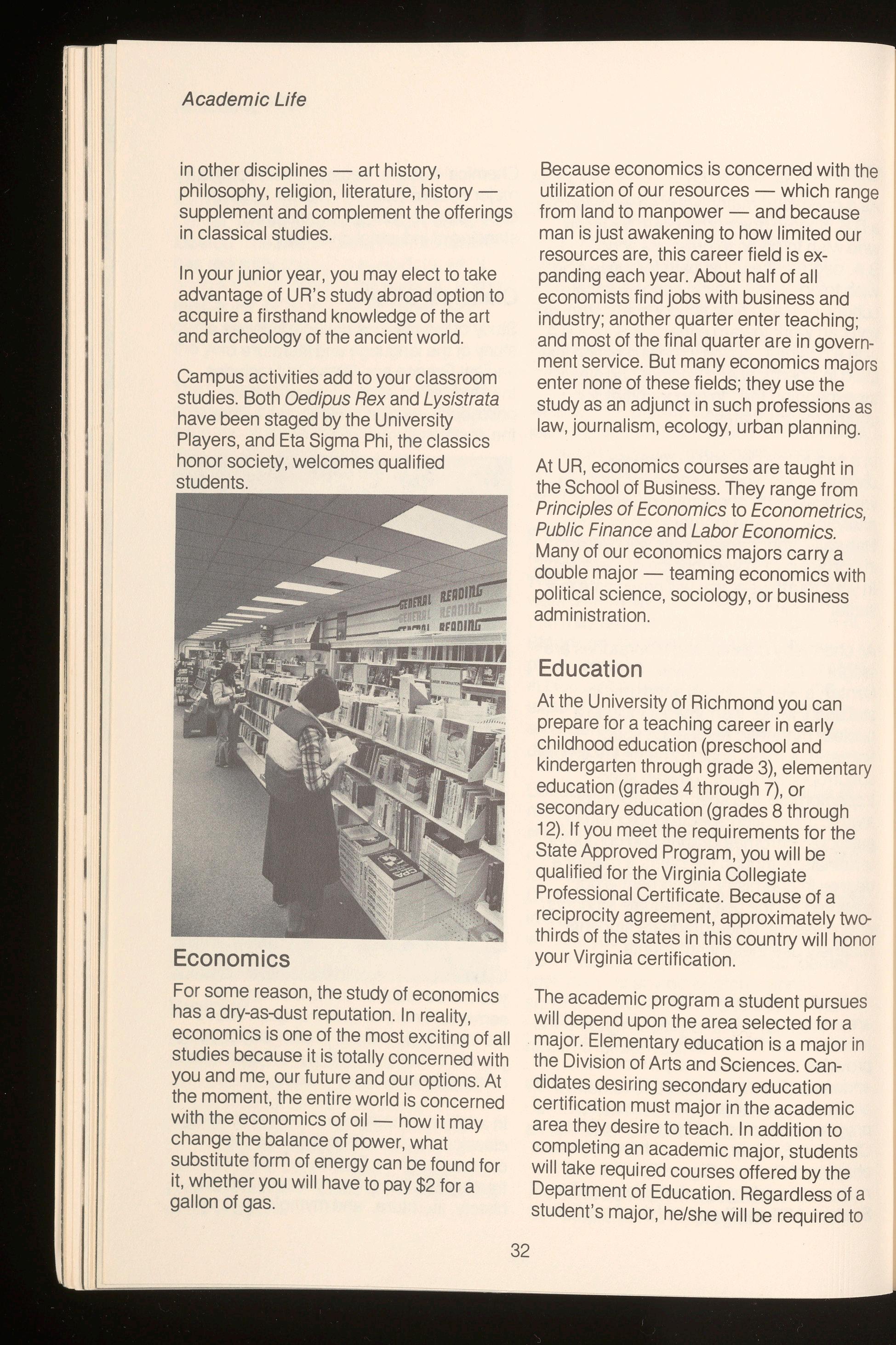
have a professional semester in the senior year which includes specific education courses and a field experience (practice teaching).
In addition to its undergraduate programs, UR offers the Master of Education degree in such fields as early childhood education elementary education, secondary educa-' tion, administration, guidance, reading, learning disabilities, supervision and physical education. The professors who teach undergraduate courses also teach in these graduate programs
Although the national studies of teacher supply and demand report a general decline in public school enrollments education graduates are well receiv~d by school systems in the surrounding areas. The Career Planning and Placement Office has been very helpful in seeking employment opportunities for students completing certification requirements.
On campus , the Student Education Association is a professional organization for students who plan to teach. Several executive officers of the Virginia SEA have come from UR. Kappa Delta Pi, a national honor society for both undergraduate and graduate students in education, has had a chapter at UR since 1955.
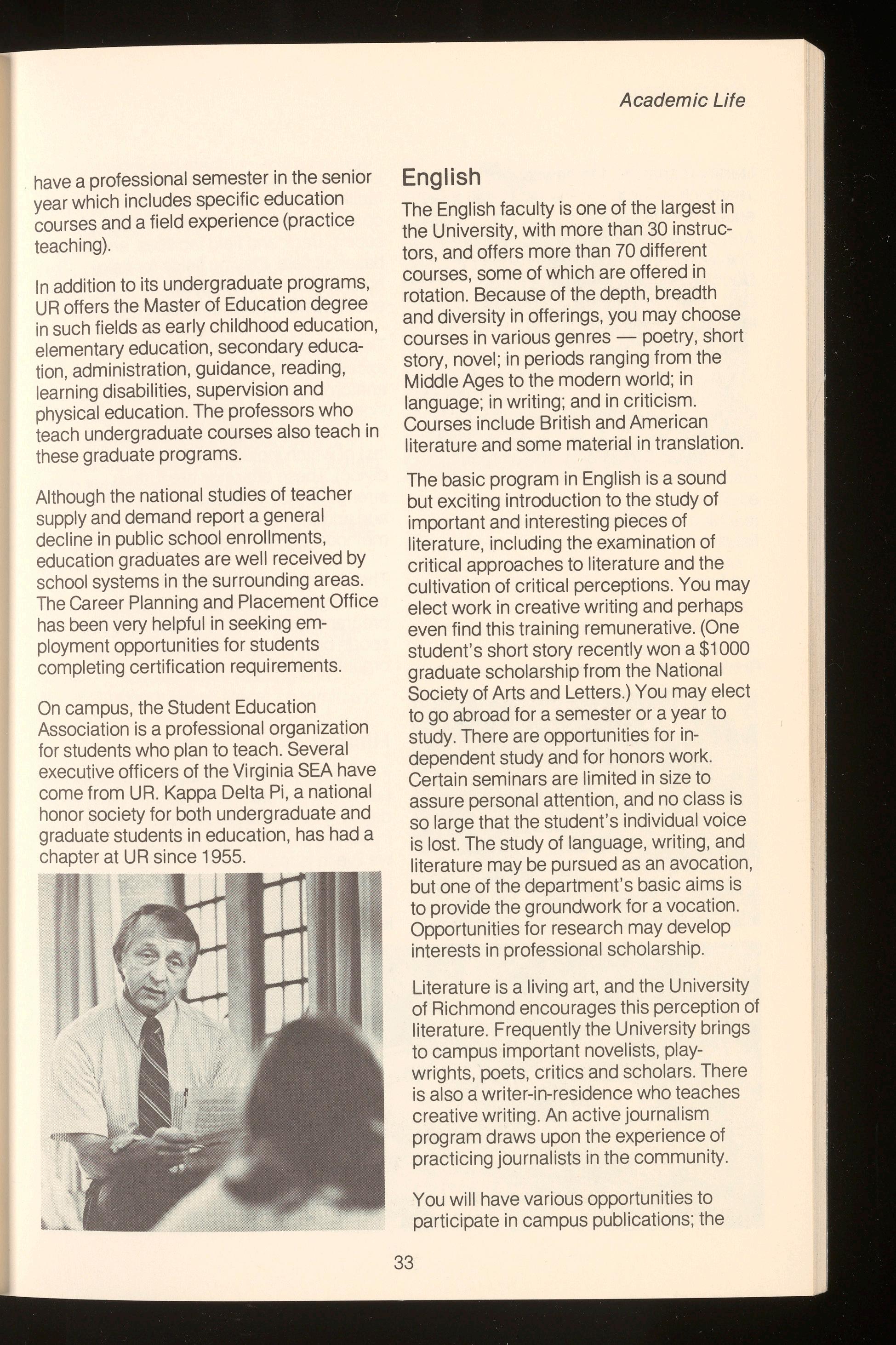
Academic Life
English
The English faculty is one of the largest in the University, with more than 30 instructors, and offers more than 70 different courses, some of which are offered in rotation. Because of the depth, breadth and diversity in offerings, you may choose courses in various genres -poetry, short story, novel; in periods ranging from the Middle Ages to the modern world; in language; in writing; and in criticism. Courses include British and American literature and some material in translation.
The basic program in English is a sound ~ut exciting introduction to the study of important and interesting pieces of literature, including the examination of critical approaches to literature and the cultivation ?fcritical perceptions. You may elect work 1ncreative writing and perhaps even find this training remunerative. (One student's short story recently won a $1000 graduate scholarship from the National Society of Arts and Letters.) You may elect to go abroad for a semester or a year to study. There are opportunities for independent study and for honors work. Certain seminars are limited in size to assure personal attention, and no class is so large that the student's individual voice i~ lost. The study of language, writing, and literature may be pursued as an avocation but one of the department's basic aims is ' to provide the groundwork for a vocation ?pportun_ities for research may develop interests 1nprofessional scholarship.
Lite~ature is a living art, and the University ~f Richmond encourages this perception of literature. ~requently the University brings to ?ampus important novelists, playwrights, poets, critics and scholars. There is also a writer-in-residence who teaches creative writing. An active journalism program draws upon the experience of practicing journalists in the community.
You will have various opportunities to participate in campus publications; the
literary magazine,the newspaperand the yearbook -and also the radio stationencourage studentwork. The EnglishClub, Areopagus(the honorarysociety),the SherwoodAndersonSociety and the DouglasSouthall Freeman Literaryand Debate Society create a climate for both learning and social activities.
Health and PhysicalEducation
In health and physical education,your major concentration can take one of two directions:(1) secondaryand elementary teaching/coachingcertification in health education or physical education;(2) nonteaching, which leadsto careers in allied fields.
The health and physical educationfacilities for men and women are located in Robins Center, Millhiser Gymnasium,and Keller Hall. Departmentalfaculty offices are in RobinsCenter and Keller Hall.
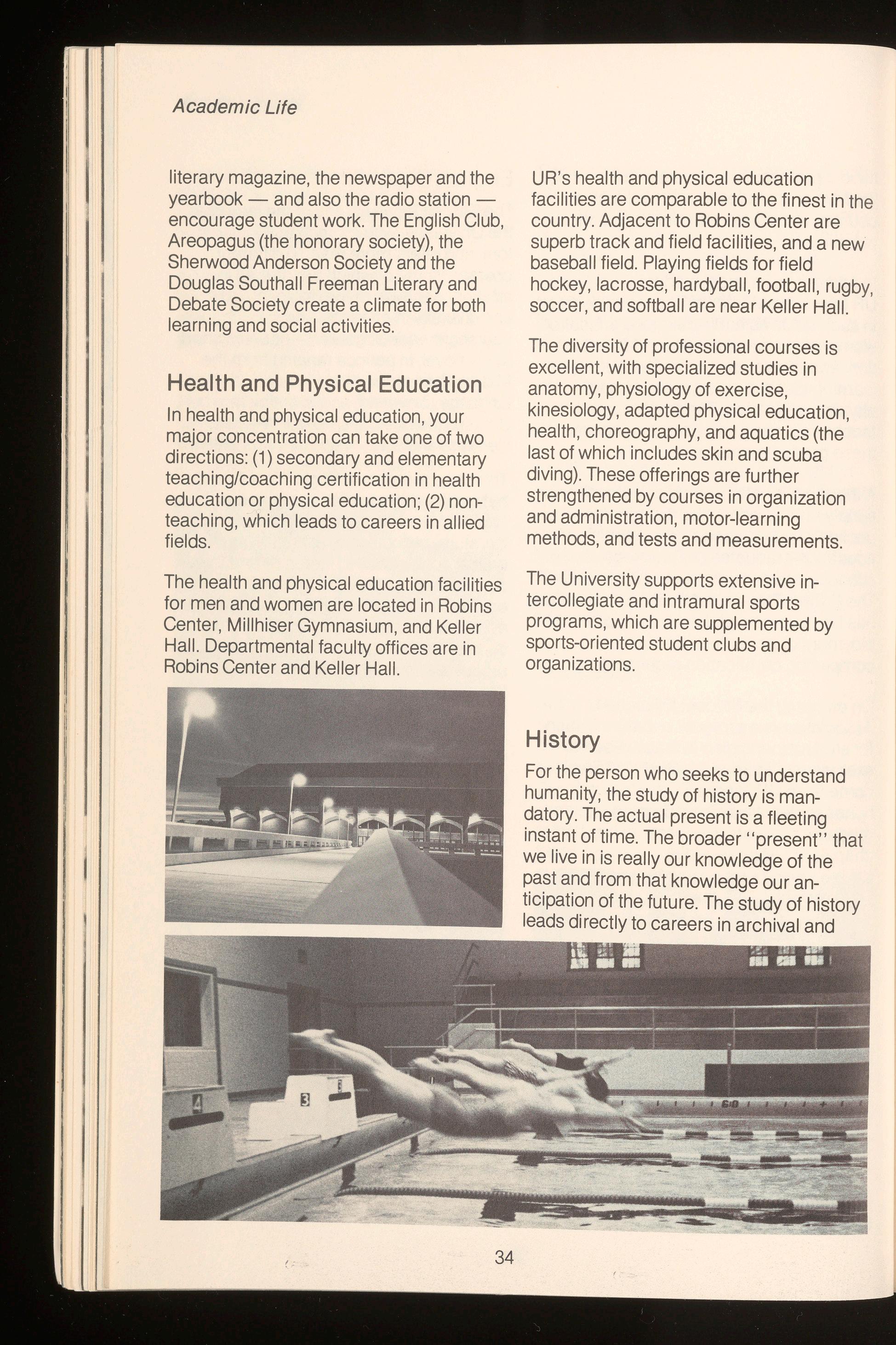
UR's health and physical education facilities are comparable to the finest in the country. Adjacent to RobinsCenter are superbtrack and field facilities, and a new baseballfield. Playingfields for field hockey, lacrosse, hardyball,football, rugby, soccer, and softball are near Keller Hall.
The diversity of professionalcourses is excellent,with specializedstudies in anatomy,physiologyof exercise, kinesiology , adapted physical education, health,choreography,and aquatics (the last of which includes skin and scuba diving).These offerings are further strengthenedby courses in organization and administration,motor-learning methods,and tests and measurements.
The Universitysupports extensive intercollegiateand intramural sports programs,which are supplemented by sports-orientedstudent clubs and organizations.
History
For the personwho seeks to understand humanity,the study of history is mandatory.The actual present is a fleeting instant of time. The broader "present" that we live in is really our knowledge of the past and from that knowledge our anticipation of the future. The study of history leads directly to careers in archival and
museumwork and teaching; it is a natural foundation for law, government, journalism, library science, and a variety of other careers
At the Universityof Richmond, courses in history span all time periods, from Babylon to Watergate, and represent geographically almost all areas of the globe, although British, Russian,and U.S. history are emphasized Historical philosophies, ideologies and intellectual movements, diplomatic and church history are offered. Thereare honors and independentstudy courses The primary objectives are to help you to think critically, to learn and communicate more effectively, to acquire techniquesof historical inquiry, and to help give you that breadth of knowledge required to be truly educated.
Classes tend to be a combination of lecture, discussion, research, and study trips.A superb library collection provides necessary supplemental reading and research opportunities Because Virginia is a major seat of American history and is c lose to the nation' s capital, rich local and area resourcesare available During the year, t he University brings speakers to campus -scholars who can add to your understandingand challenge you to further study of the past. Recent speakers included Gordon Wright of Stanford University, Geoffrey Barraclough, distinguished medieval historian, and Alden T. Vaughan, a noted historian of Colonial America. The University has a chapter of the national history honorary society, Phi Alpha Theta
InterdisciplinaryStudies
Today, more and more professions and careers require you to be a specialist in more than one field. For example, an environmentaleconomist must be a specialist in the sciences (chemistry, biology, ecology)and in the social sciences (economics).For this reason, UR makes it possiblefor you to create a major that
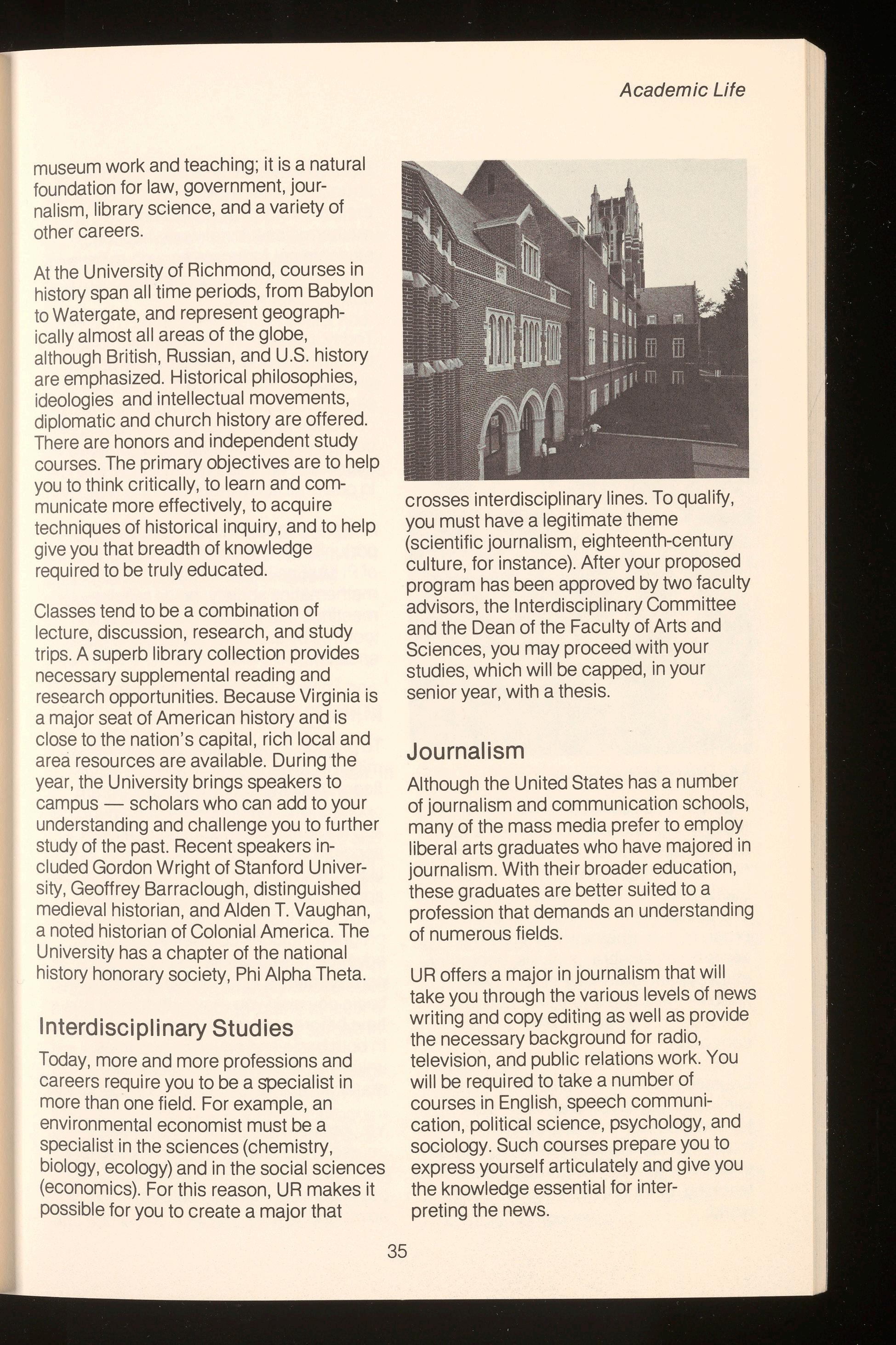
crosses interdisciplinary lines. To qualify, you must have a legitimate theme (scientific journalism, eighteenth-century culture, for instance). After your proposed program has been approved by two faculty advisors, the InterdisciplinaryCommittee and the Dean of the Faculty of Arts and Sciences, you may proceed with your studies, which will be capped, in your senior year, with a thesis
Journalism
Although the United States has a number of journalism and communication schools, many of the mass media prefer to employ liberal arts graduates who have majored in journalism With their broader education, these graduates are better suited to a profession that demands an understanding of numerous fields
UR offers a major in journalism that will take you through the various levels of news writing and copy editing as well as provide the necessary background for radio, television, and public relationswork. You will be required to take a number of courses in English, speech communication, political science, psychology, and sociology Such courses prepare you to express yourself articulately and give you the knowledge essential for interpreting the news.
You will have ample opportunityto perfect your skills on campus and off by working on the campus newspaper , literary magazine, or yearbook. The radiostation, WDCE-FM,is staffed by studentswho do the engineeringprogramming,announcingand There is an active chapter of the Society of CollegiateJournalists(a national honoraryjournalism society) And if you wish on-the-jobexperience, you may serve a summer internshipon a news- paper or with a radio or TV station The PlacementOffice and the journalism instructors will help as much as possibleto get you leadsto such a position, but it will be up to you to get the job
Becausethe quality of mathematics instruction varies so widely in high schools, the Universitymaintains a unique mathematicstutorial workshop for students not fortunate enough to have as sound a foundation as necessary for college-levelwork
MathematicalSciences
Mathematicsprovides useful modelsfor the physical and social sciences and for the world of business.Other disciplines,in fact, are finding such models increasingly useful and, in some instances,essential. The Universityof Richmondoffers a program in mathematicswhich en- compassesalgebra, analysis, geometry, statistics and computer science and enablesthe student to select options needed in his particular field of con- centration.
Courses rangefrom elementaryto advanced levels. If you choose to work toward a BA or B.S. degree in mathematics, you may designa program to prepare yourselffor graduateschool,for teaching, or for enteringthe business world
Today, use of the computer is fundamental to both pure and applied mathematics. To give you an understandingof the ap- plicationsof the computer and a facility in computer languages, UR has courses in computer programming, and you have full access to terminals which in turn link you to powerful computers
At advanced levels,you have the opportunity for independentstudy A chapter of Pi Mu Epsilon,the national honorary mathematics society, holds regular meetingsthat include discussions and lectures by students, faculty, and guest speakers.
MilitaryScience
To provide a foundationfor civilian and military careers, the Army ReserveOf- ficers' TrainingCorps (ROTC)program concentrateson principles of management and leadership . Graduates are eligible for appointmentas second lieutenants in the U.S Army Reserves;qualified seniors may apply for commissions in the Regular Army. This leadership/management program includes courses in basic and advancedmilitary science. No military commitment is incurred while you are in basic courses; you may withdraw at any time before entering the advanced course. In both basic and advanced courses, uniforms, necessarytextbooks, and materials are furnished without cost to you.
You normallyenroll in the advanced course in the final two years of college A monthlysubsistenceallowance of $100 per academic month is paid while in the advancedcourse.

Betweenyour junior and senior years, you are requiredto spend six weeks in a military camp where you apply the principles and theories you have learned in the classroom.You will receive approximately $500for camp attendance
Army ROTCoffers a variety of social and professionalactivities on campus. Scabbardand Blade is the Advanced CourseNational Honor Fraternity, open to men and women The Richmond Rangers providesadventure training such as mountaineering,rappellingand orienteering. Many members of the University's rifle team are ROTCstudents
All students in Army ROTCmay compete for scholarshipsthat pay the full cost of tuition, textbooks, lab fees, and other expenses .
ModernForeign Languages
The Department of Modern Foreign Languagesoffers a comprehensive program, which includes courses in language, literature,and civilization. Majors are offered in French, German, and Spanish In addition,there are courses in Italian and Russianlanguage(through the 201-202 third-yearlevel}and courses in Italian and Russianliterature (in Englishtranslation). Thereare also courses (taught in English} relatedto linguistics, civilization, and foreign languageteaching
As a student majoring in modern foreign language , you will be strongly encouraged by your faculty advisor to spend at least a semesteror a summer of study abroad in the appropriateforeign country. The Departmentof Modern Foreign Languages offers summer-studyabroad programs in French and Spanish The French program, located in La Rochelle at the lnstitut des EstudesFrancaises,offers a variety of courses ranging from French 103-104and 201-202to independentstudy at the 300 and 500 levels. The Spanish program,
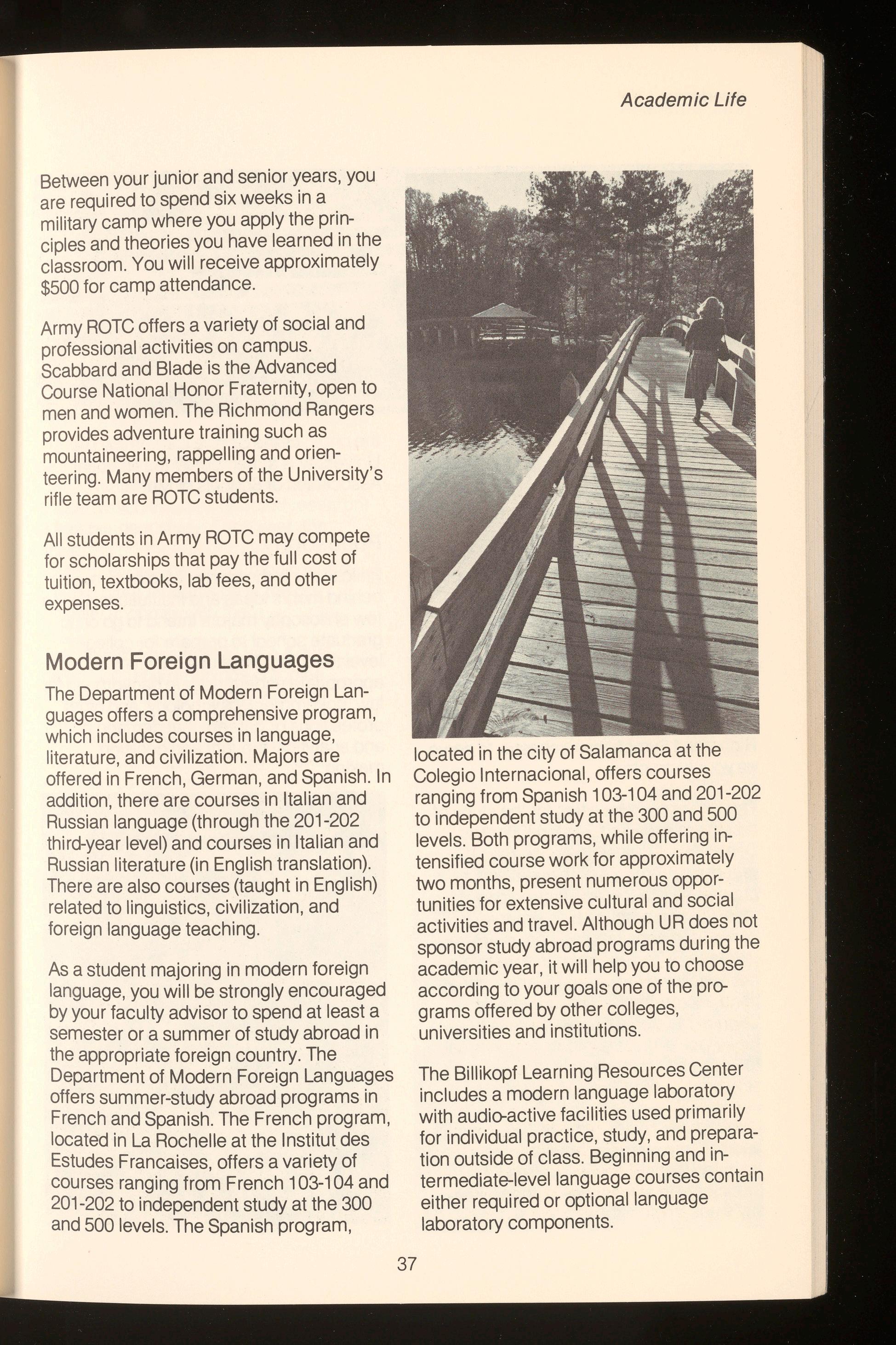
located in the city of Salamanca at the Colegio Internacional, offers courses ranging from Spanish 103-104and 201-202 to independentstudy at the 300 and 500 levels. Both programs, while offering intensified course work for approximately two months, present numerous opportunities for extensive cultural and social activities and travel. Although UR does not sponsor study abroad programs during the academic year, it will help you to choose according to your goals one of the programs offered by other colleges, universities and institutions.
The Billikopf Learning ResourcesCenter includes a modern language laboratory with audio-active facilities used primarily for individual practice, study, and preparation outside of class. Beginning and intermediate-level language courses contain either required or optional language laboratory components.
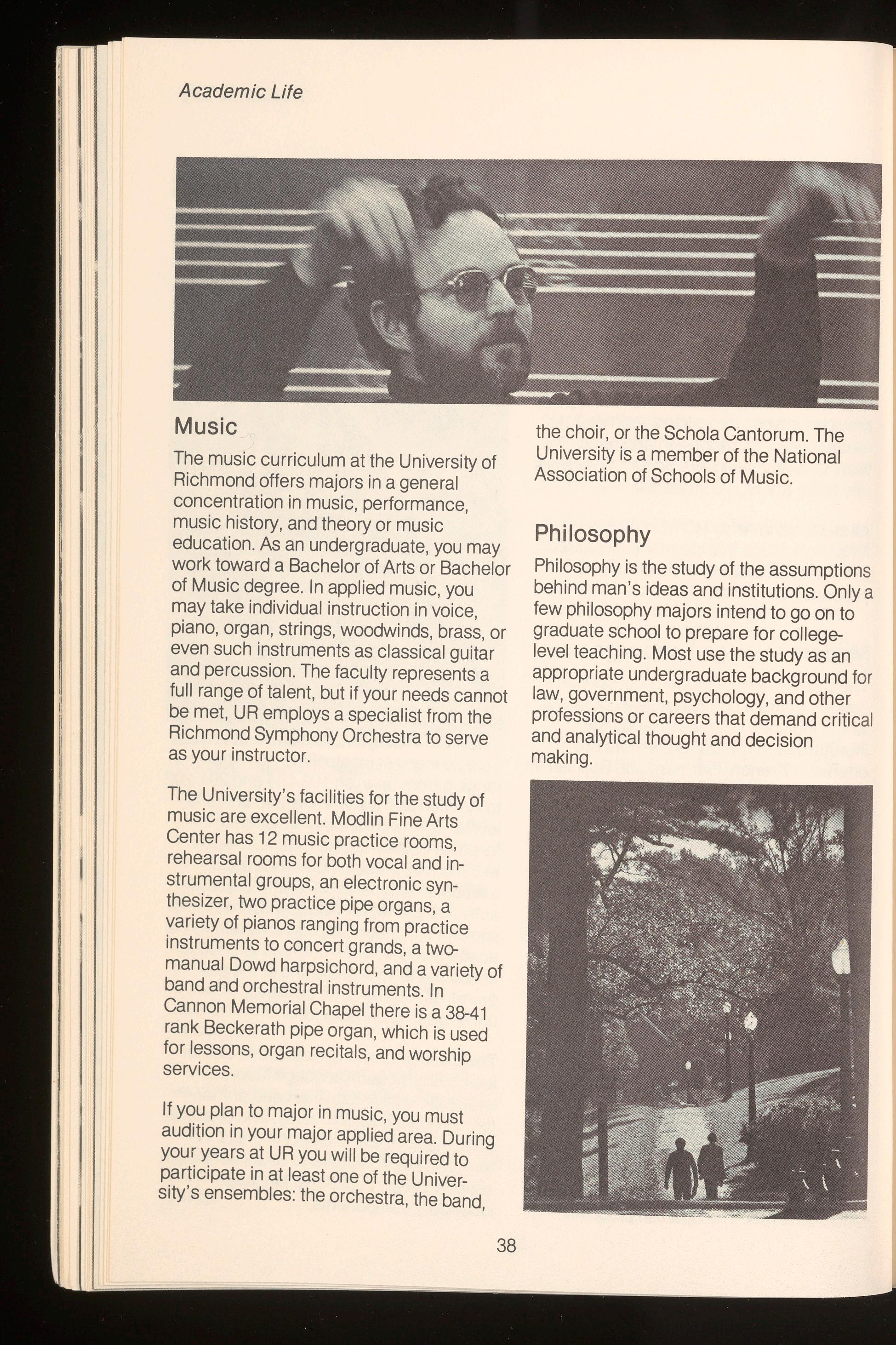
Music
The music curriculum at the Universityof Richmondoffers majors in a general concentration in music, performance, music history, and theory or music education.As an undergraduate,you may work toward a Bachelor of Arts or Bachelor of Music degree. In applied music, you may take individual instruction in voice, piano, organ, strings, woodwinds,brass,or even such instrumentsas classical guitar and percussion. The faculty representsa full range of talent, but if your needs cannot be met, UR employs a specialistfrom the RichmondSymphonyOrchestra to serve as your instructor.
The University's facilities for the study of music are excellent. Modlin Fine Arts Center has 12 music practice rooms, rehearsal rooms for both vocal and instrumental groups, an electronic synthesizer, two practice pipe organs,a variety of pianos rangingfrom practice instruments to concert grands,a twomanual Dowd harpsichord,and a variety of band and orchestral instruments. In Cannon Memorial Chapelthere is a 38-41 rank Beckerath pipe organ, which is used for lessons,organ recitals, and worship services.
If you plan to major in music, you must audition in your major appliedarea. During your years at UR you will be requiredto participate in at least one of the University's ensembles:the orchestra,the band,
the choir, or the Schola Cantorum. The University is a member of the National Association of Schools of Music.
Philosophy
Philosophyis the study of the assumptions behind man's ideas and institutions. Only a few philosophymajors intend to go on to graduate school to prepare for collegelevel teaching. Most use the study as an appropriate undergraduate background for law, government, psychology, and other professionsor careers that demand critical and analytical thought and decision making
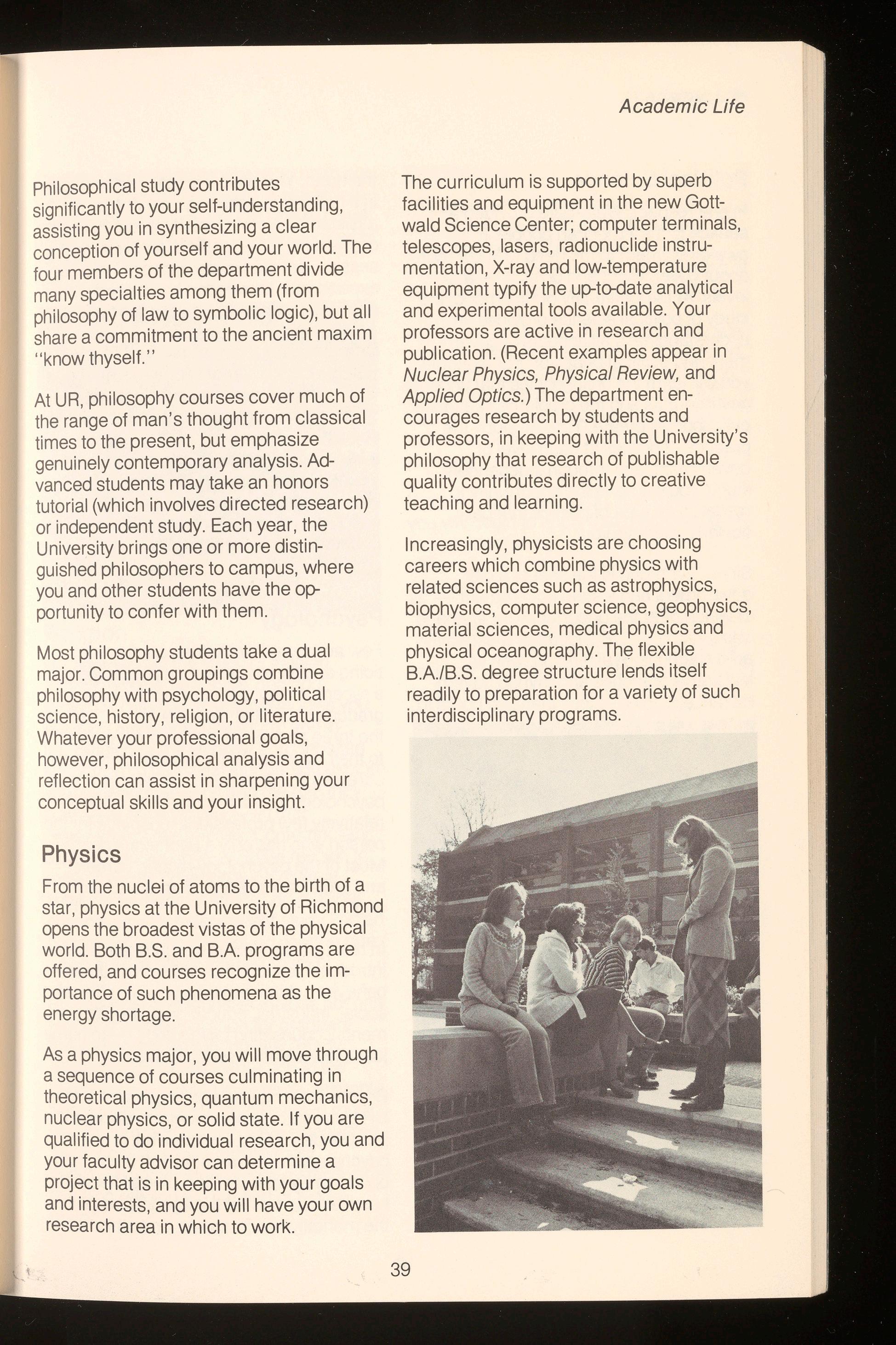
Philosophicalstudy contributes significantlyto your self-understanding, assistingyou in synthesizinga clear conceptionof yourself and your world The four members of the department divide manyspecialties among them (from philosophyof law to symbolic logic), but all sharea commitment to the ancient maxim "know thyself "
At UR, philosophycourses cover much of the rangeof man's thought from classical times to the present, but emphasize genuinelycontemporary analysis. Advancedstudents may take an honors tutorial(which involvesdirected research) or independentstudy. Each year, the Universitybrings one or more distinguishedphilosophersto campus, where you and other students have the opportunityto confer with them.
Most philosophystudents take a dual major Common groupings combine philosophywith psychology, political science,history, religion, or literature. Whateveryour professional goals, however,philosophicalanalysis and reflectioncan assist in sharpening your conceptualskills and your insight.
Physics
Fromthe nuclei of atoms to the birth of a star, physics at the University of Richmond opensthe broadest vistas of the physical world. Both B.S and BA programs are offered,and courses recognize the importanceof such phenomena as the energyshortage.
As a physics major, you will move through a sequenceof courses culminating in theoreticalphysics, quantum mechanics, nuclearphysics, or solid state. If you are qualifiedto do individual research, you and your faculty advisor can determine a project that is in keeping with your goals and interests,and you will have your own researcharea in which to work.
The curriculum is supported by superb facilities and equipment in the new Gottwald Science Center; computer terminals, telescopes, lasers, radionuclide instrumentation, X-ray and low-temperature equipment typify the up-tcxlate analytical and experimental tools available.Your professors are active in research and publication. (Recent examples appear in Nuclear Physics,PhysicalReview,and Applied Optics.) The department encourages research by students and professors, in keeping with the University's philosophythat research of publishable quality contributes directly to creative teaching and learning.
Increasingly, physicists are choosing careers which combine physics with related sciences such as astrophysics, biophysics, computer science, geophysics, material sciences, medical physics and physical oceanography.ThE;lflexible B.A./B.S.degree structure lends itself readily to preparation for a variety of such interdisciplinary programs.
PoliticalScience
In one respect,Watergateprovideda service to the American people: it awakenedthem to the need to know more about governmentand politics - at all levels.At the Universityof Richmond,the study of political science providesan understandingof all aspects of government and political behavior.For example, you will learn the philosophiesthat underlie governmentsand the problemsthat those philosophiescreate. You will study the practice of politics at each level of government,and through independent study, you will have the opportunityto research an area of politics that particularly interestsyou.
Since Richmondis the seat of a city governmentand a state government- all of which offer the opportunityfor firsthand observation- UR's location is especially advantageous.Washington,with its legislativebranches and myriad governmental agencies, is less than two hours to
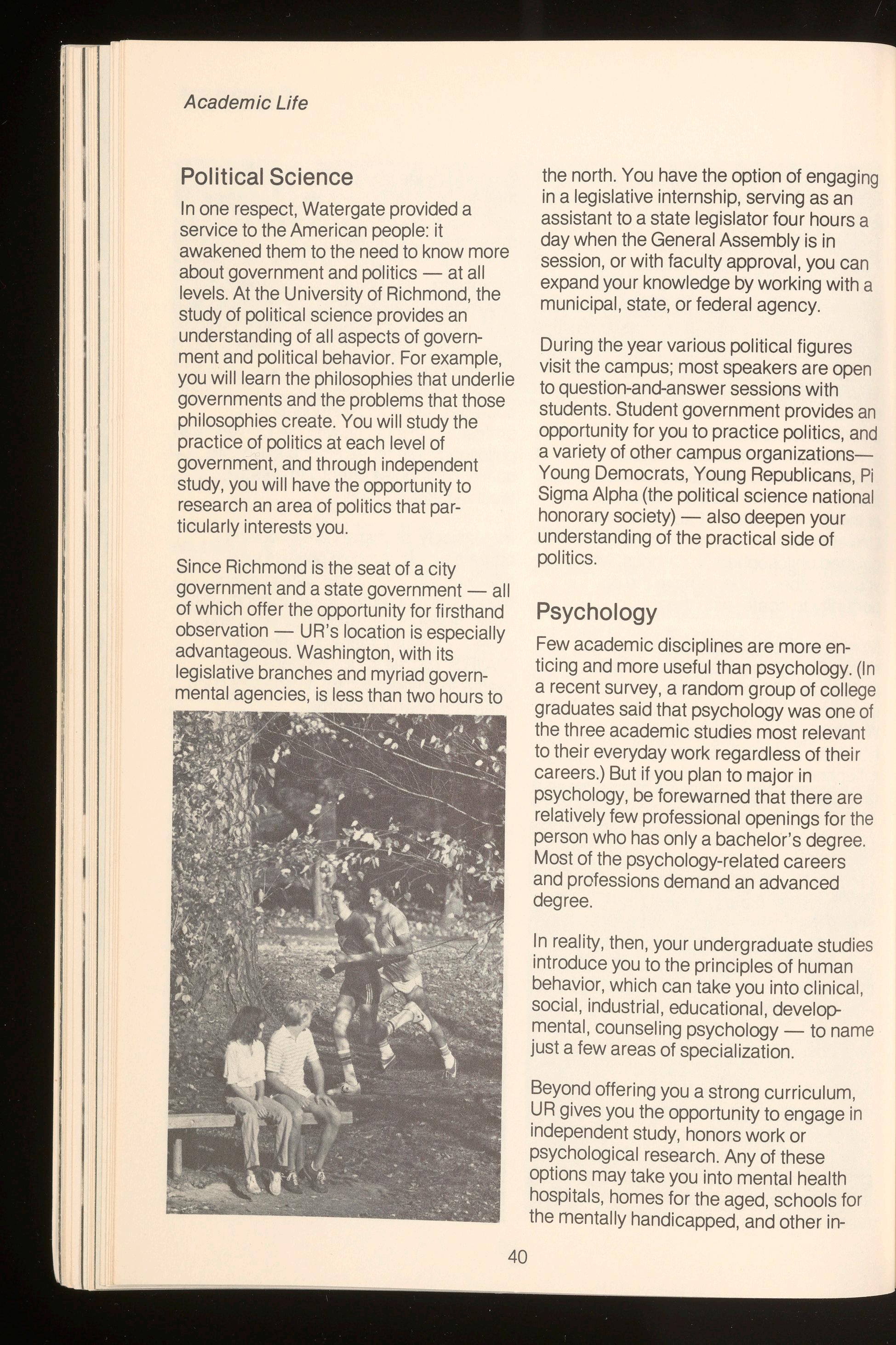
the north. You have the option of engaging in a legislativeinternship, serving as an assistant to a state legislator four hours a day when the General Assembly is in session,or with faculty approval, you can expandyour knowledge by working with a municipal, state, or federal agency.
During the year various political figures visit the campus; most speakers are open to question-and-answersessions with students. Student government provides an opportunityfor you to practice politics, and a variety of other campus organizationsYoung Democrats, Young Republicans,Pi Sigma Alpha (the political science national honorarysociety) - also deepen your understandingof the practical side of politics.
Psychology
Few academic disciplines are more enticing and more useful than psychology.(In a recent survey, a random group of college graduatessaid that psychology was one of the three academic studies most relevant to their everydaywork regardless of their careers ) But if you plan to major in psychology,be forewarned that there are relativelyfew professionalopenings for the personwho has only a bachelor's degree Most of the psychology-relatedcareers and professionsdemand an advanced degree
In reality,then, your undergraduate studies introduceyou to the principles of human behavior,which can take you into clinical, social, industrial,educational, developmental, counseling psychology - to name just a few areas of specialization.
Beyondoffering you a strong curriculum , UR gives you the opportunity to engage in independentstudy, honors work or psychological research.Any of these options may take you into mental health hospitals, homes for the aged, schools for the mentally handicapped,and other in-
stitutionsand agencies where you can put the theory and methodology of classroom work to practical test. Psi Chi (the national honorsociety) helps you to keep abreast of what is happeningprofessionally in psychology.
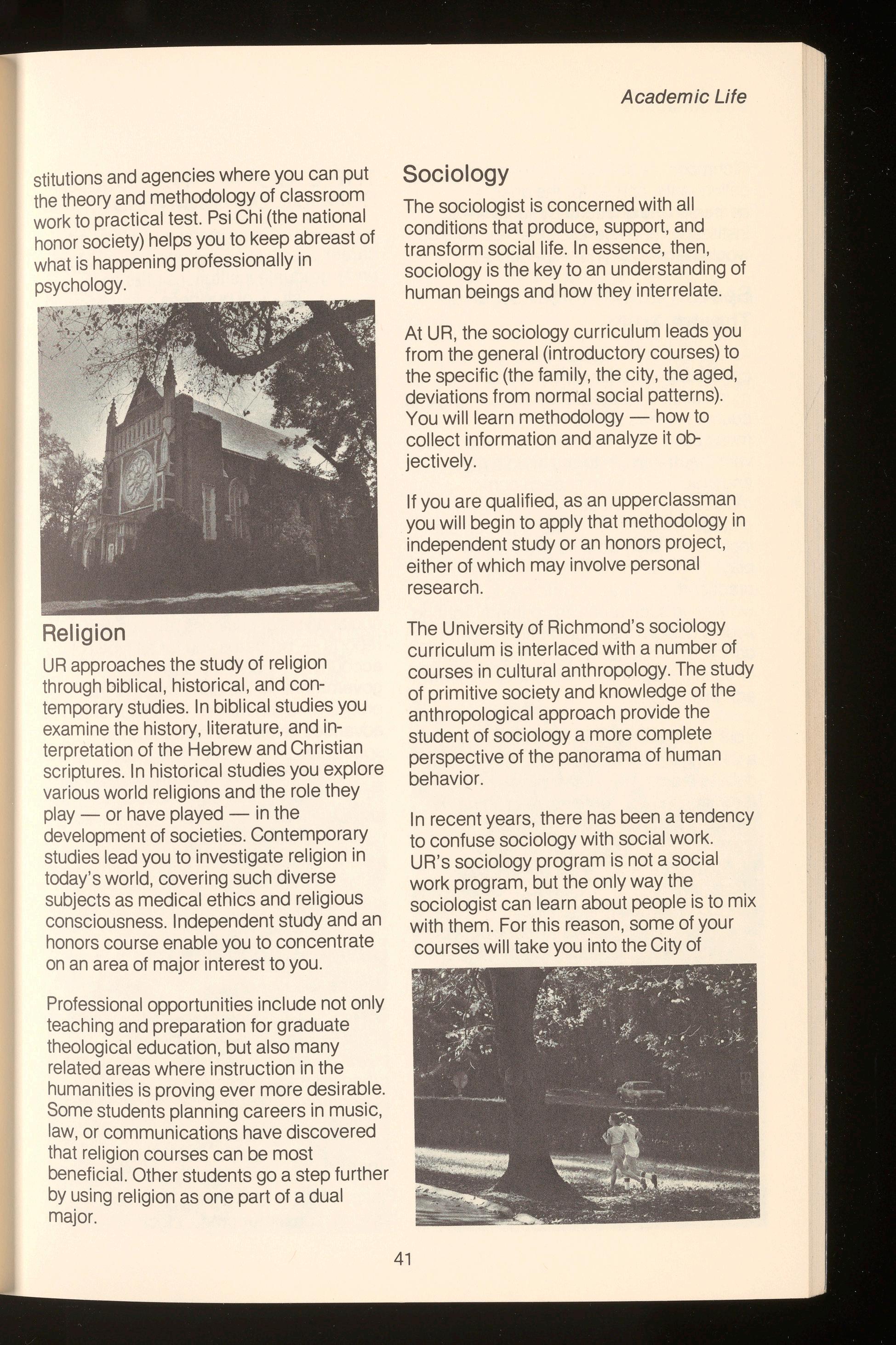
Religion
UR approachesthe study of religion through biblical, historical, and contemporarystudies. In biblical studies you examinethe history, literature, and interpretation of the Hebrew and Christian scriptures.In historical studies you explore variousworld religions and the role they play - or have played -in the developmentof societies. Contemporary studieslead you to investigate religion in today's world, covering such diverse subjectsas medical ethics and religious consciousness.Independentstudy and an honorscourse enable you to concentrate on an area of major interest to you
Professionalopportunities include not only teachingand preparation for graduate theologicaleducation, but also many relatedareas where instruction in the humanitiesis proving ever more desirable. Somestudents planning careers in music, law, or communications have discovered that religioncourses can be most beneficial.Other students go a step further by using religion as one part of a dual major.
Sociology
The sociologist is concerned with all conditions that produce, support, and transform social life. In essence, then, sociology is the key to an understandingof human beings and how they interrelate.
At UR, the sociology curriculum leads you from the general (introductory courses) to the specific (the family, the city, the aged, deviations from normal social patterns). You will learn methodology-how to collect information and analyze it objectively.
If you are qualified, as an upperclassma~ you will begin to apply that methodology 1n independentstudy or an honors proJect, either of which may involve personal research
The University of Richmond's sociology curriculum is interlaced with a number of courses in cultural anthropology.The study of primitive society and knowledge of the anthropological approach provide the student of sociology a more complete perspective of the panorama of human behavior.
In recent years, there has been a tendency to confuse sociology with social work. UR's sociology program is not a social work program, but the only way th~ . sociologist can learn about people 1sto mix with them. For this reason, some of your courses will take you into the City of

Richmond -to learning centers for delinquents,homes for the aged, area centers in the ghetto community -to institutionsand agencies that normally would be outside your experience
SpeechCommunicationand TheatreArts
As a major in this department, you may concentrate in either speech communication or in theatre arts. A full range of courses covers speech as a communication and persuasiontool and deals with theatre arts in terms of both theory and practice. In both speech communication and theatre arts, you may engage in independentstudy (which can include creative work such as writing a play). In theatre arts, you may register for a practicum to get academic credit for working in such areas as costume, lighting, scenic design, make-up,acting, theatre dance, choreography,technical theatre, directing, stage management,and theatre administration.
Your classroom work is complementedby a variety of cocurricular activities.The UR debate team participates in intercollegiate forensics tournamentsand has a fine record. Each year the departmentand the University Players(the student drama group) present four major productions. Plays range from classics such as Oedipus Rex to contemporaryworks such as The Sign in SidneyBrustein's Window.Major productions are staged in the modern,700seat Camp Theater,while student-directed shorter plays are presentedin the rustic Quonset Hut Studio.
THE E. CLAIBORNE ROBINS SCHOOL OF BUSINESS
Few fields offer as many and as varied career possibilities as business, and few undergraduateinstitutions offer as intensive a study of business administration as the University of Richmond. As a student in The E. Claiborne Robins School of Business,you will be required to major in one of two areas: accounting or business administration. Within the business administration major, you may concentrate in businesseconomics, finance, management systems, or marketing. The M.B.A.is available through the Richard S. ReynoldsGraduate Division of the businessschool.
Accounting
Accounting -the study of the preparation and analysis of business records and reports -prepares you for all types of accounting: public, management, government.At the completion of the program, which ranges from elementary to advanced levels and includes such specialties as tax accounting, auditing, and information systems, you are prepared to sit for the Certified Public Accountant (CPA) and Certified Management Accountant (CMA)exams. In addition, many accounting students obtain practical experience by working part time for local accounting firms .
BusinessAdministration
BusinessEconomics
Economics is concerned with the utilization of our resources -from land to manpower. Courses within the concentration range from Principlesof Economics to Econometrics,Public Finance, and Labor Economics.
Finance
Finance can lead to a variety of careers: banking,consumer credit, stock
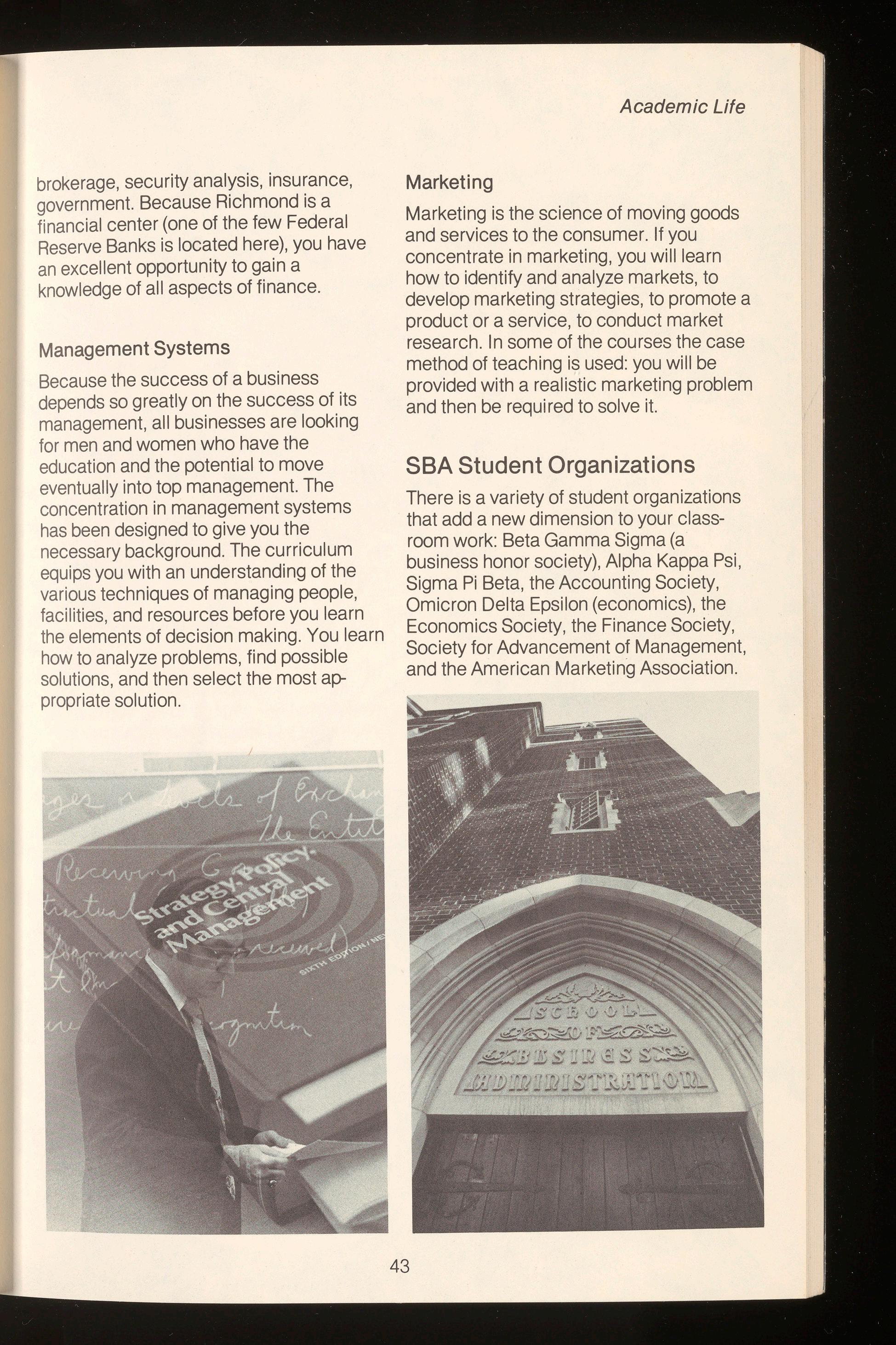
brokerage,security analysis, insurance, government.Because Richmond is a financialcenter (one of the few Federal ReserveBanks is located here), you have an excellent opportunity to gain a knowledgeof all aspects of finance.
ManagementSystems
Becausethe success of a business dependsso greatly on the success of its management,all businessesare looking for men and women who have the educationand the potential to move eventuallyinto top management.The concentrationin management systems has been designedto give you the necessarybackground.The curriculum equipsyou with an understandingof the varioustechniques of managing people, facilities,and resources before you learn the elementsof decision making. You learn how to analyze problems, find possible solutions,and then select the most appropriatesolution.
Marketing
Marketing is the science of moving goods and services to the consumer. If you concentrate in marketing, you will learn how to identify and analyze markets, to develop marketing strategies, to promote a product or a service, to conduct market research. In some of the courses the case method of teaching is used: you will be provided with a realistic marketing problem and then be required to solve it.
SBA Student Organizations
There is a variety of student organizations that add a new dimension to your classroom work: Beta Gamma Sigma (a b~sines~honor society), Alpha Kappa Psi, S1g~a P1Beta, the Accounting Society, Omicron Delta Epsilon(economics),the Economics Society, the Finance Society Society for Advancement of Manageme~t, and the American Marketing Association.
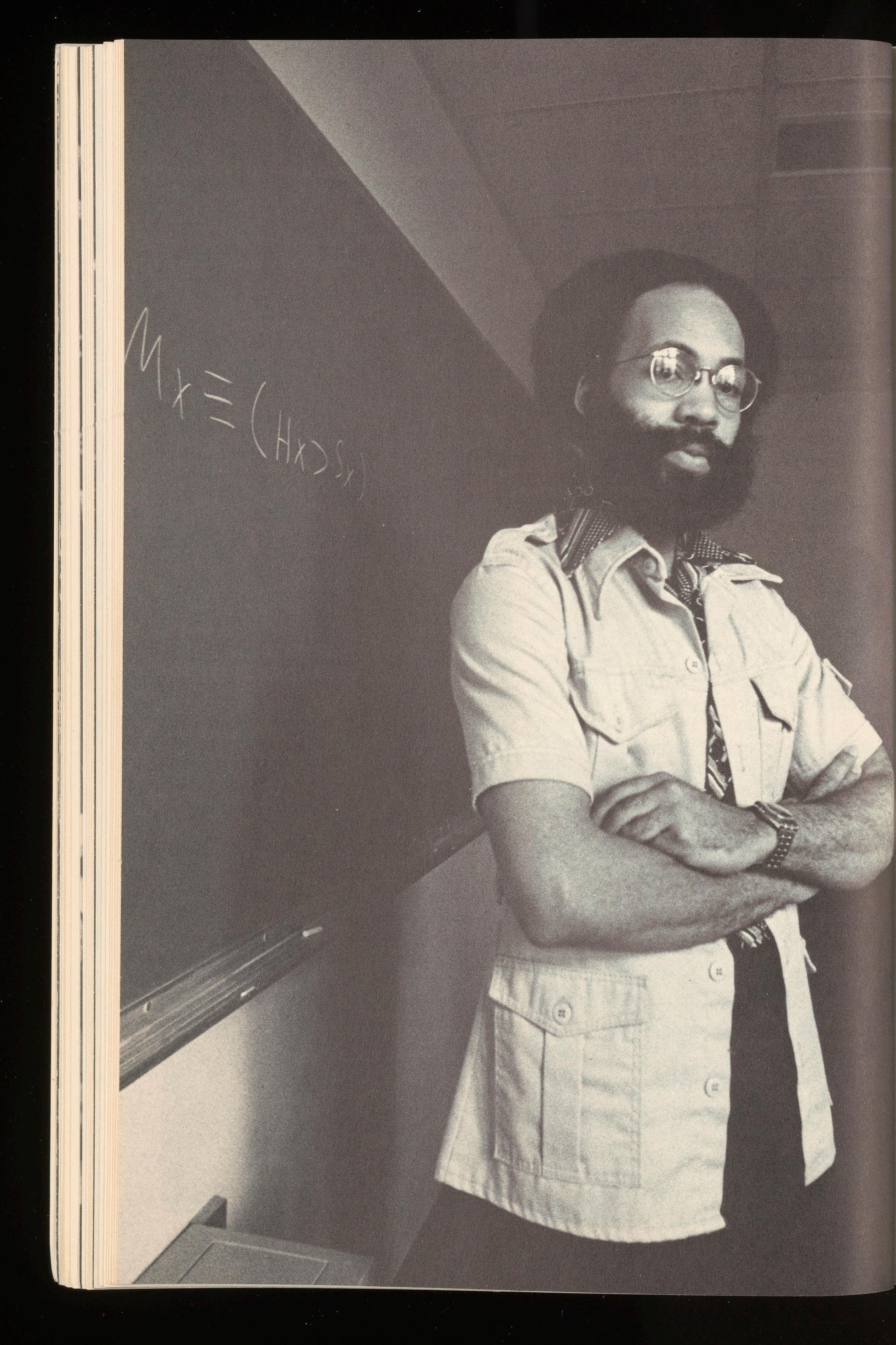

TI-IEFACULTY
As you look into college~,~ou_wil_lsee that thereis a great deal of s1m1lanty1nmost undergraduatecourses. Furthermore, you mayfind that the textbooks used in the mostprestigiousuniversities are th~ same as those used in many of the lesser institutions.What, then makes the difference in the quality of your education?
Oneof the most important answers to this is -the faculty. It is the professor who useshis particular expertise to interpret what is in the textbooks and the supplementaryreading. It is the professor who stimulatesand motivates you to think along pathsyou never dreamed of. It is the sensitive,humane professor who knows just when you need a compliment -and whenyou need a good sharp jolt to make you realizeyour potential.
Whenan institution has approximately 200 full-timeprofessors and 120 part-time instructors,as the University of Richmond has,it is difficult to generalize about the faculty.They are of all ages -from a few yearsout of graduate school to a year from retirement.Though they are a diverse groupof scholars, they do have certain characteristicsin common.
Theyare student oriented.
At UR there is a tradition that professors are availablewhenever you need them. Eachhas regular office hours, and you are welcome to stop by and talk over your academicor personal problems. This is the qualityof professor-studentinteraction that we are interested in at UR You will also find faculty members at campus concerts, lecturesand sports events; perhaps even playingon a softball or volleyball team. You can sit and talk with them in the Dry Dock (the UniversityCommons informal eating place)or in one of the lounges of the Commons.On occasion, they are even to be met in the residence halls, where some of them are guest speakers. In this giveand-takeenvironment,you get to know
your faculty more intimately, and as a result, you realize that you have no reason to feel uneasy about keeping a more formal appointment in a professor's office.
Theyare studentsof their own disciplines.
One measure of faculty quality is the number of terminal degrees held Over 78 percent of UR's faculty hold the Ph.D. But a more solid measure is the extent to which each faculty member continues to improve his or her professional qualifications. At UR virtually all teachers are members of one or more professional associations. They serve as officers or board members, editing or contributing to professionaljournals, attending national professional meetings. The University has a sabbatical leave policy which enables tenured professors to spend one year in study for every six years in the classroom UR professors are engaged in research, and regularly publish their findings. A sampling of their professional expertise and scholarship follows.
The Faculty
• Dr. Joan L. Bak, assistantprofessorof history, is engagedin a study of the origins of modern corporatism in Brazil.Corporatist political structures are a central feature of the military regimesthat have emerged in LatinAmerican countries since the early '60's. Dr Bak's earlier studies suggest that an explanationof the growth of corporatism lies in the strong linkage between policies of social control and the growth of economic interventionby an activist state. With support from the UR Faculty ResearchCommittee,she is preparing several paperswhich revise accepted interpretationsof Brazil's 1930 revolutionand her major 20th-century political figure, GetulioVargas.
• Dr. RaymondF. Hilliard,assistant professor of English,was the invitedguest speaker at a FolgerShakespeareLibrary Colloquiumin the fall of 1979as a result of his recently publishedstudies of structure and meaning in eighteenth-centuryBritish fiction. He is now working to expandhis research in eighteenth-centuryfiction into a book on the subject of his Folgertalk His
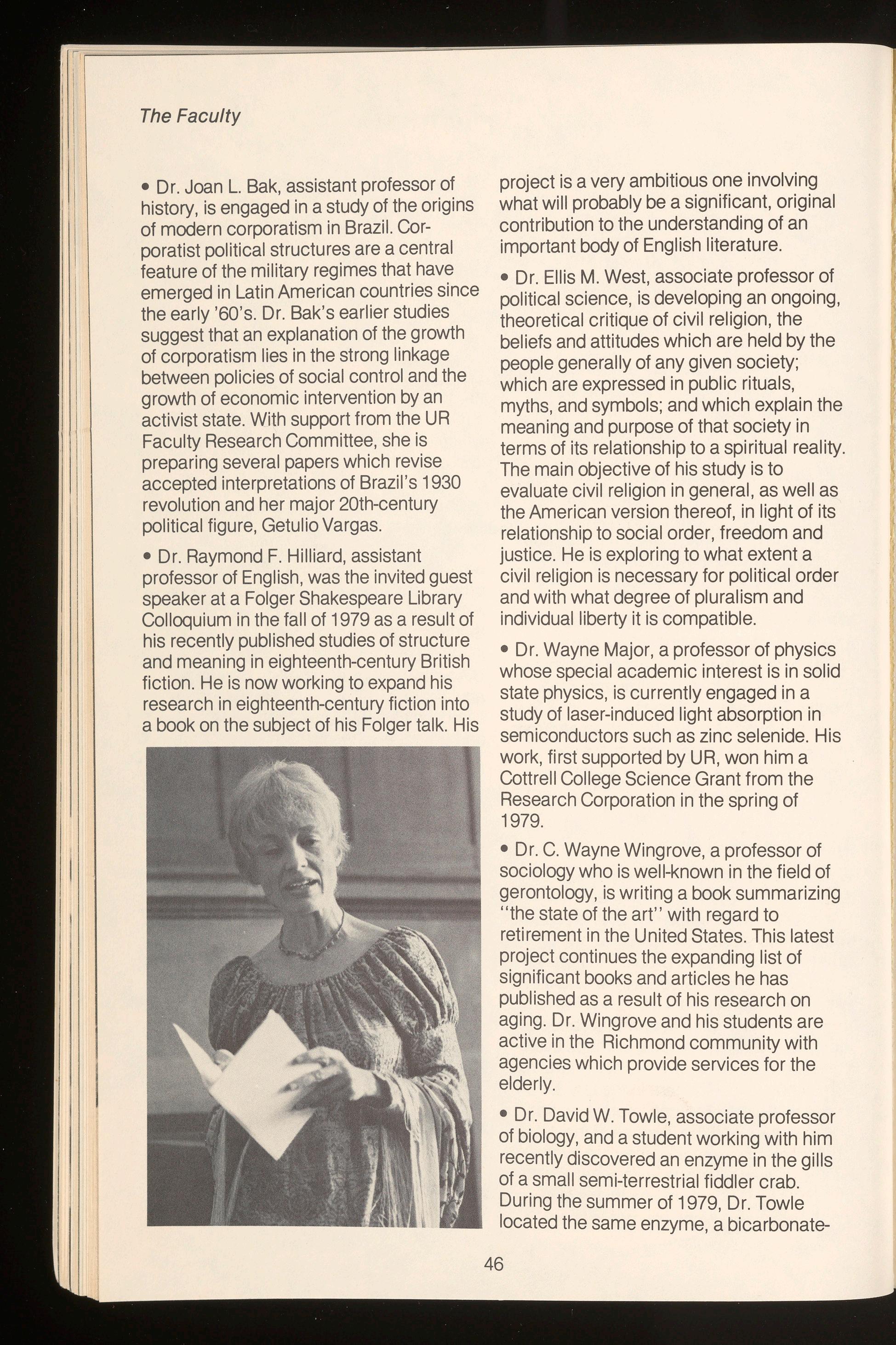
project is a very ambitio~s involv!n~ what will probably be a s1grnf1cant,original contribution to the understandingof an important body of English literature.
• Dr Ellis M West, associate professor of political science, is developing an ongoing, theoretical critique of civil religion, the beliefs and attitudes which are held by the people generallyof any given society; which are expressed in public rituals, myths, and symbols; and which explain the meaningand purpose of that society in terms of its relationshipto a spiritual reality. The main objective of his study is to evaluate civil religion in general, as well as the American version thereof, in light of its relationshipto social order, freedom and justice. He is exploring to what extent a civil religion is necessary for political order and with what degree of pluralism and individualliberty it is compatible.
• Dr. Wayne Major, a professor of physics whose special academic interest is in solid state physics, is currently engaged in a study of laser-inducedlight absorption in semiconductorssuch as zinc selenide. His work, first supported by UR, won him a Cottrell CollegeScience Grant from the ResearchCorporation in the spring of 1979.
• Dr. C Wayne Wingrove, a professor of sociologywho is well-known in the field of gerontology,is writing a book summarizing "the state of the art" with regard to retirement in the United States. This latest project continues the expanding list of significant books and articles he has publishedas a result of his research on aging. Dr. Wingrove and his students are active in the Richmond community with agencieswhich provide services for the elderly
• Dr. David W. Towle, associate professor of biology,and a student working with him recently discovered an enzyme in the gills of a small semi-terrestrialfiddler crab. During the summer of 1979, Dr. Towle located the same enzyme, a bicarbonate-
The Faculty
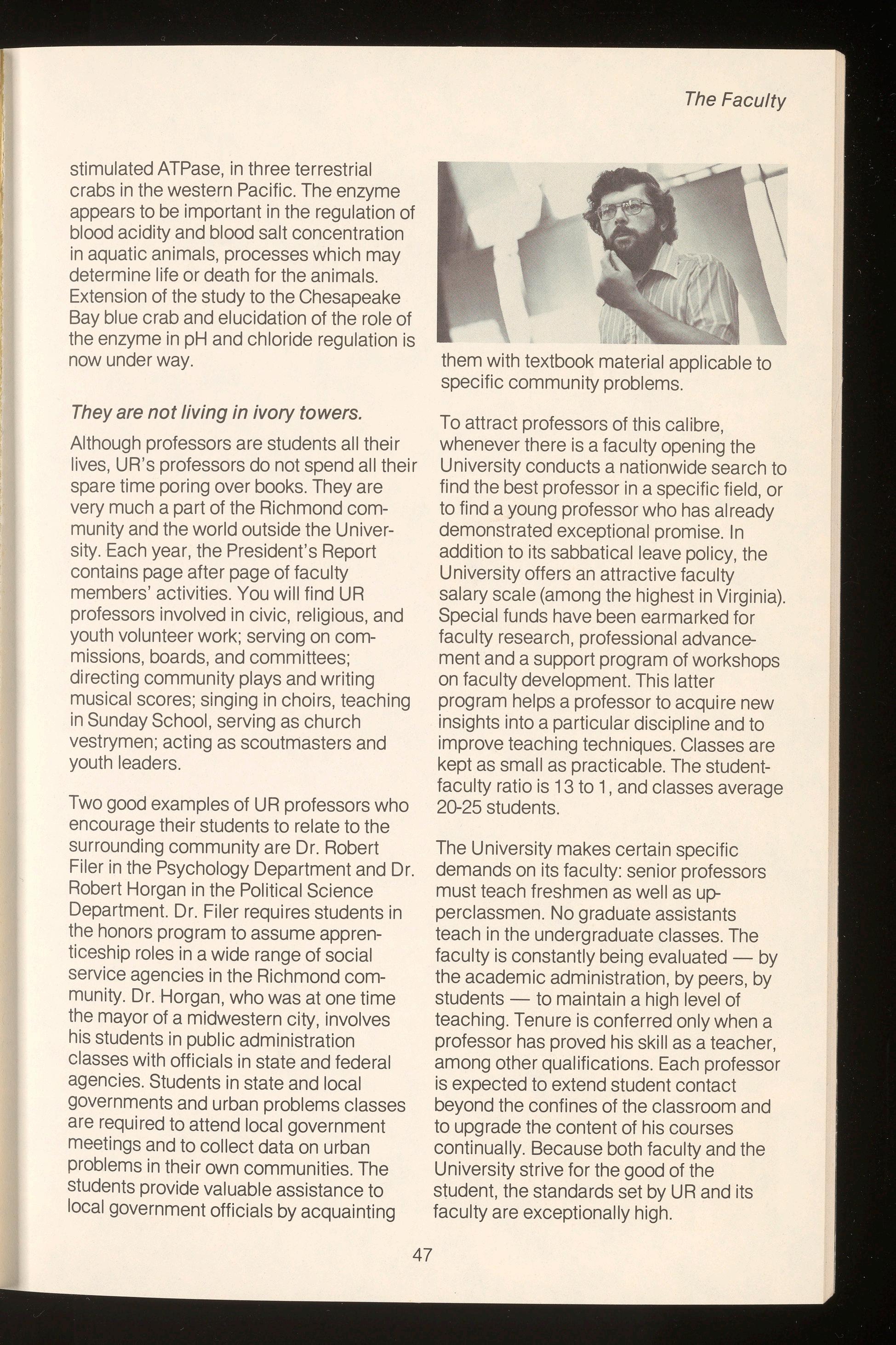
stimulated ATPase, in three terrestrial crabs in the western Pacific The enzyme appears to be important in the regulation of blood acidity and blood salt concentration in aquatic animals, processes which may determine life or death for the animals. Extension of the study to the Chesapeake Bay blue crab and elucidation of the role of the enzyme in pH and chloride regulation is now under way
Theyare not living in ivorytowers.
Although professors are students all their lives, UR's professors do not spend all their spare time poring over books They are very much a part of the Richmond community and the world outside the University Each year, the President's Report contains page after page of faculty members' activities. You will find UR professors involved in civic, religious, and youth volunteer work; serving on commissions, boards, and committees; directing community plays and writing musical scores; singing in choirs , teaching in Sunday School , serving as church vestrymen; acting as scoutmasters and youth leaders .
Two good examples of UR professors who encourage their students to relate to the surrounding community are Dr Robert Filer in the Psychology Department and Dr . Robert Horgan in the Political Science Department. Dr. Filer requires students in the honors program to assume apprenticeship roles in a wide range of social service agencies in the Richmond community Dr Horgan , who was at one time the mayor of a midwestern city, involves his students in public administration classes with officials in state and federal agencies. Students in state and local governments and urban problems classes are required to attend local government meetings and to collect data on urban problems in their own communities . The students provide valuable assistance to local government officials by acquainting
them with textbook material applicable to specific community problems.
To attract professors of this calibre, whenever there is a faculty opening the University conducts a nationwide search to find the best professor in a specific field, or to find a young professor who has already demonstrated exceptional promise . In addition to its sabbatical leave policy, the University offers an attractive faculty salary scale (among the highest in Virginia). Special funds have been earmarked for faculty research, professional advancement and a support program of workshops on faculty development. This latter program helps a professor to acquire new insights into a particular discipline and to improve teaching techniques Classes are kept as small as practicable . The studentfaculty ratio is 13 to 1, and classes average 20-25 students.
The University makes certain specific demands on its faculty: senior professors must teach freshmen as well as upperclassmen. No graduate assistants teach in the undergraduate classes The faculty is constantly being evaluated - by the academic administration, by peers, by students - to maintain a high level of teaching . Tenure is conferred only when a professor has proved his skill as a teacher, among other qualifications. Each professor is expected to extend student contact beyond the confines of the classroom and to upgrade the content of his courses continually Because both faculty and the University strive for the good of the student , the standards set by UR and its faculty are exceptionally high.
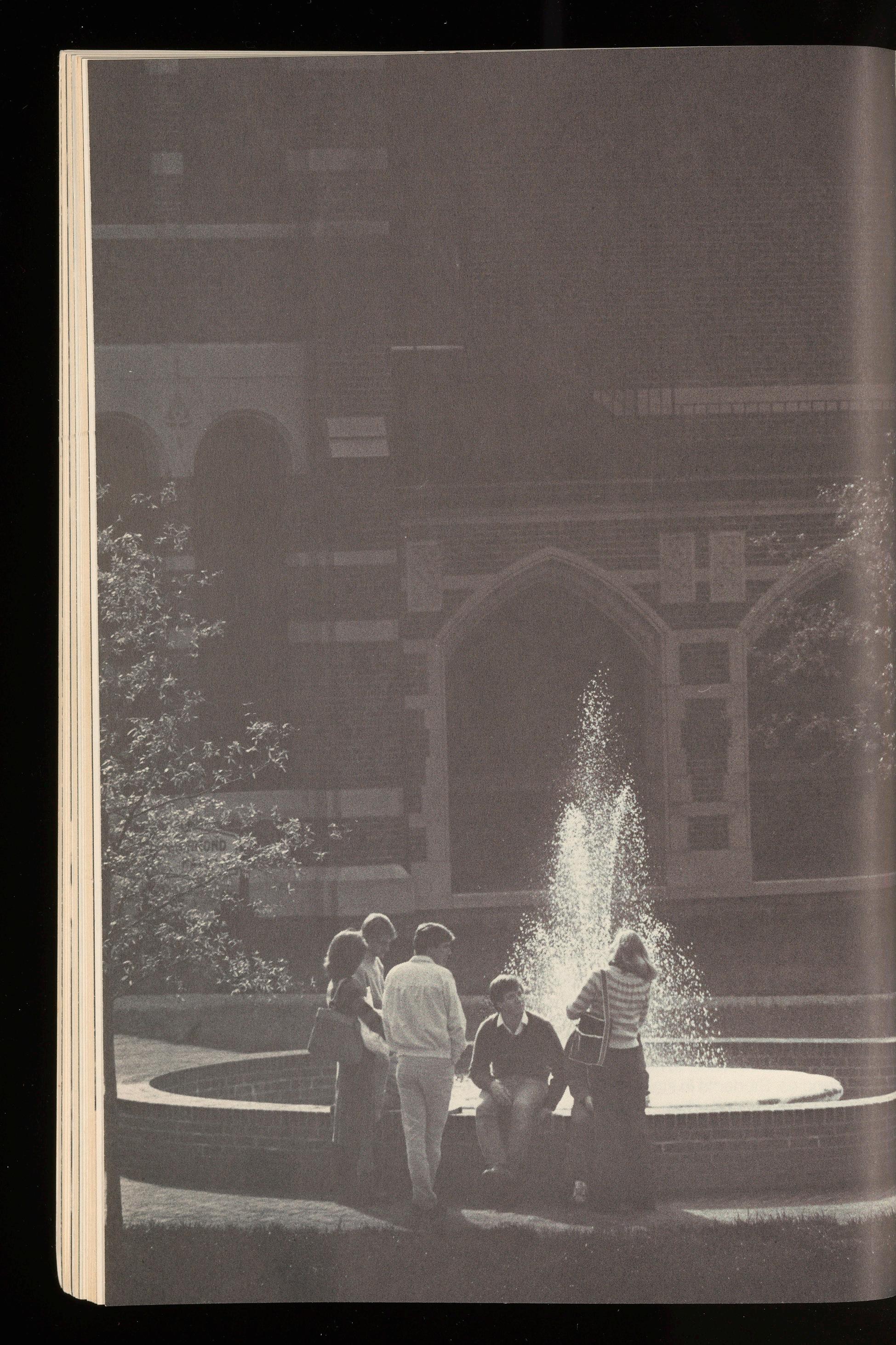
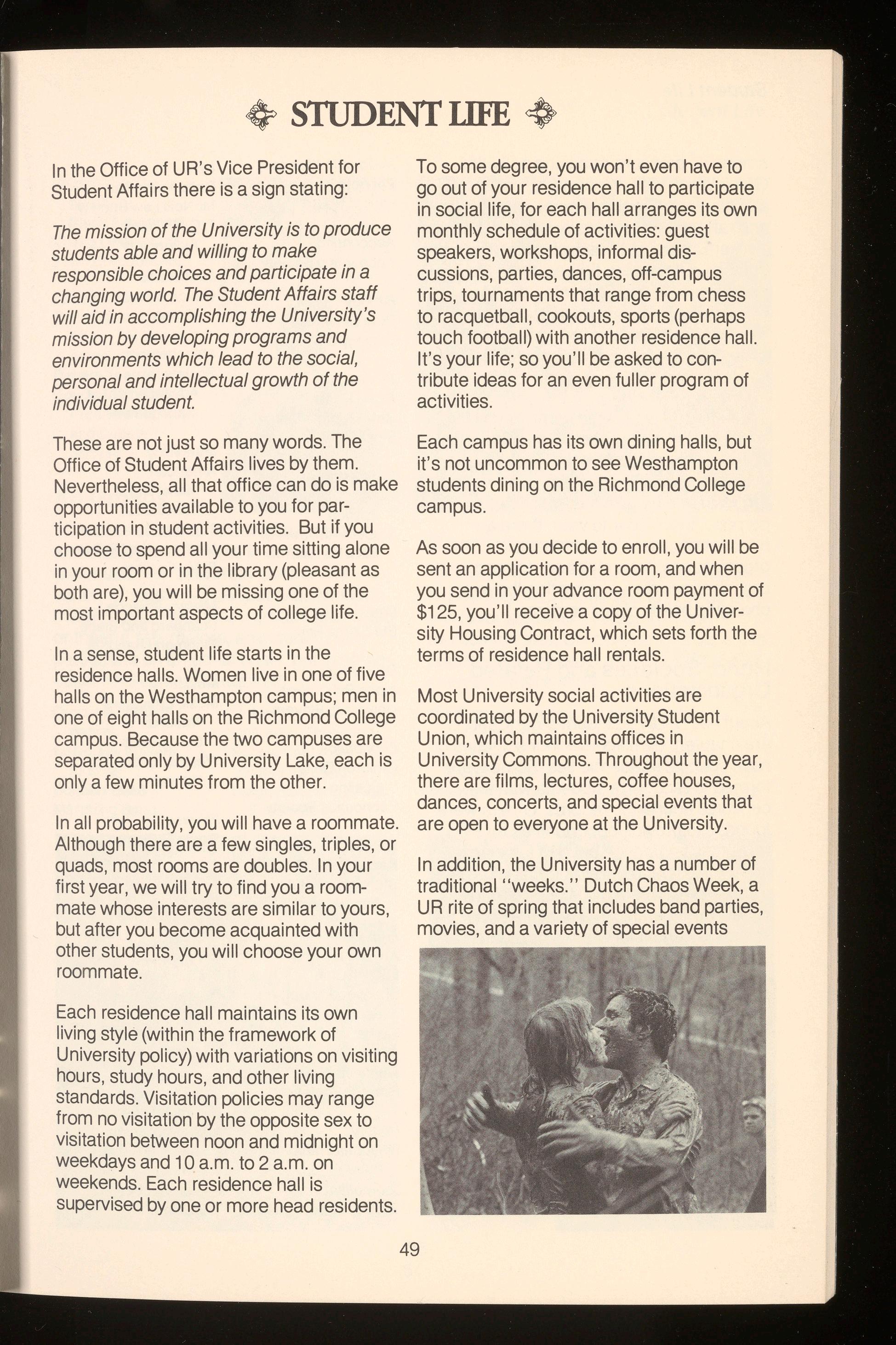
STUDENTLIFE
In the Office of UR's Vice Presidentfor StudentAffairs there is a sign stating:
Themissionof the Universityis to produce studentsable and willing to make responsiblechoices and participate in a changingworld. TheStudentAffairs staff will aid in accomplishing the University's missionby developingprograms and environmentswhich lead to the social, personaland intellectual growth of the individualstudent.
These are not just so many words. The Office of Student Affairs lives by them
Nevertheless , all that office can do is make opportunitiesavailable to you for participation in student activities But if you choose to spend all your time sitting alone in your room or in the library (pleasant as both are), you will be missing one of the most important aspects of college life.
In a sense, student life starts in the residencehalls. Women live in one of five halls on the Westhampton campus; men in one of eight halls on the Richmond College campus Because the two campuses are separatedonly by University Lake, each is only a few minutes from the other
In all probability, you will have a roommate
Althoughthere are a few singles, triples, or quads, most rooms are doubles. In your first year, we will try to find you a roommate whose interests are similar to yours, but after you become acquainted with other students, you will choose your own roommate
Each residence hall maintains its own living style (within the framework of Universitypolicy) with variations on visiting hours, study hours, and other living standards.Visitation policies may range from no visitation by the opposite sex to visitation between noon and midnight on weekdaysand 1Oa.m. to 2 a.m on weekends.Each residence hall is supervisedby one or more head residents
To some degree, you won't even have to go out of your residence hall to participate in social life, for each hall arranges its own monthly schedule of activities: guest speakers, workshops, informal discussions, parties, dances, off-campus trips, tournaments that range from chess to racquetball, cookouts, sports (perhaps touch football) with another residence hall. It's your life; so you'll be asked to contribute ideas for an even fuller program of activities.
Each campus has its own dining halls, but it's not uncommon to see Westhampton students dining on the Richmond College campus
As soon as you decide to enroll, you w ill be sent an application for a room, and when you send in your advance room payment of $125, you'll receive a copy of the University Housing Contract, which sets forth the terms of residence hall rentals.
Most University social activities are coordinated by the University Student Union, which maintains offices in University Commons Throughout the year, there are films , lectures, coffee houses, dances, concerts, and special events that are open to everyone at the University
In addition, the University has a number of traditional "weeks ." Dutch Chaos Week, a UR rite of spring that includes band parties, movies, and a variety of special events
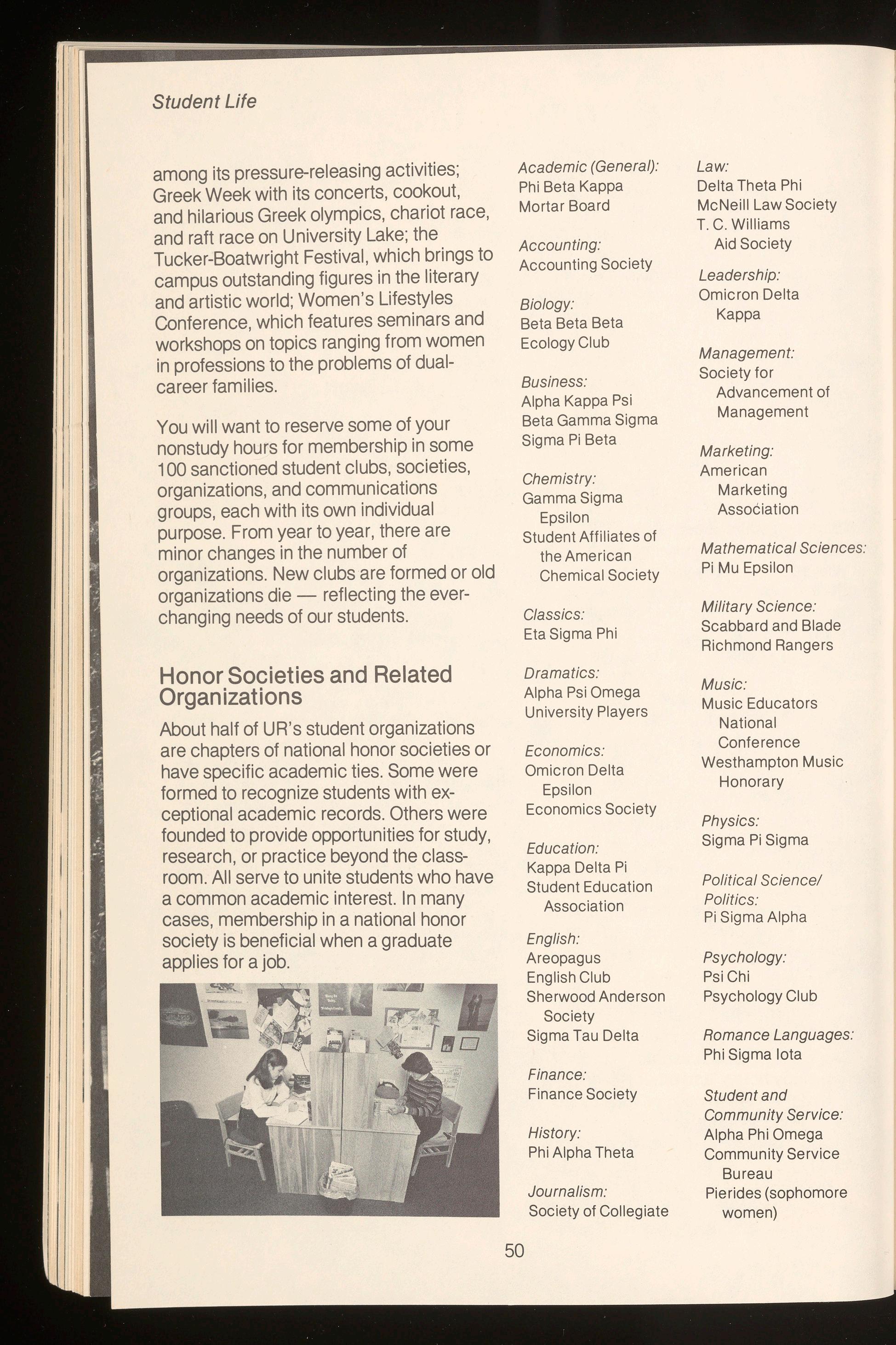
Student Life
among its pressure-releasingactivities; Greek Week with its concerts, cookout, and hilariousGreek olympics, chariot race, and raft race on UniversityLake;the Tucker-BoatwrightFestival,which brings to campus outstandingfigures in the literary and artistic world; Women's Lifestyles Conference, which features seminars and workshopson topics rangingfrom women in professionsto the problemsof dualcareer families.
You will want to reservesome of your nonstudyhours for membershipin some 100 sanctionedstudent clubs, societies, organizations , and communications groups,each with its own individual purpose From year to year, there are minor changes in the number of organizations.New clubs are formed or old organizationsdie -reflectingthe everchanging needsof our students
HonorSocietiesand Related Organizations
About half of UR's studentorganizations are chapters of nationalhonor societies or have specific academic ties. Some were formed to recognizestudentswith exceptionalacademic records Others were foundedto provideopportunitiesfor study, research,or practice beyondthe classroom.All serve to unite studentswho have a common academic interest. In many cases, membershipin a nationalhonor society is beneficialwhen a graduate appliesfor a job
Academic (General): Phi Beta Kappa Mortar Board
Accounting : Accounting Society
Biology : Beta Beta Beta
Ecology Club
Business : Alpha Kappa Psi Beta Gamma Sigma Sigma Pi Beta
Chemistry : Gamma Sigma Epsilon
Student Affiliates of the American Chemical Society
Classics: Eta Sigma Phi
Dramatics: Alpha Psi Omega University Players
Economics : Omicron Delta Epsilon Economics Society
Education: Kappa Delta Pi Student Education Association
English: Areopagus English Club Sherwood Anderson Society
Sigma Tau Delta
Finance: Finance Society
History: Phi Alpha Theta
Journalism : Society of Collegiate
Law: Delta Theta Phi
Mc Neill Law Society
T. C. Williams Aid Society
Leadership : Omicron Delta Kappa
Management: Society for Advancement of Management
Marketing : American Marketing Association
Mathematical Science s: Pi Mu Epsilon
Military Science: Scabbard and Blade
Richmond Rangers
Music: Music Educators National Conference Westhampton Music Honorary
Physics: Sigma Pi Sigma
Political Science !
Politics : Pi Sigma Alpha
Psychology : Psi Chi
Psychology Club
Romance Languages : Phi Sigma Iota
Student and Community Service: Alpha Phi Omega Community Service Bureau
Pie rides (sophomore women)
Student Life
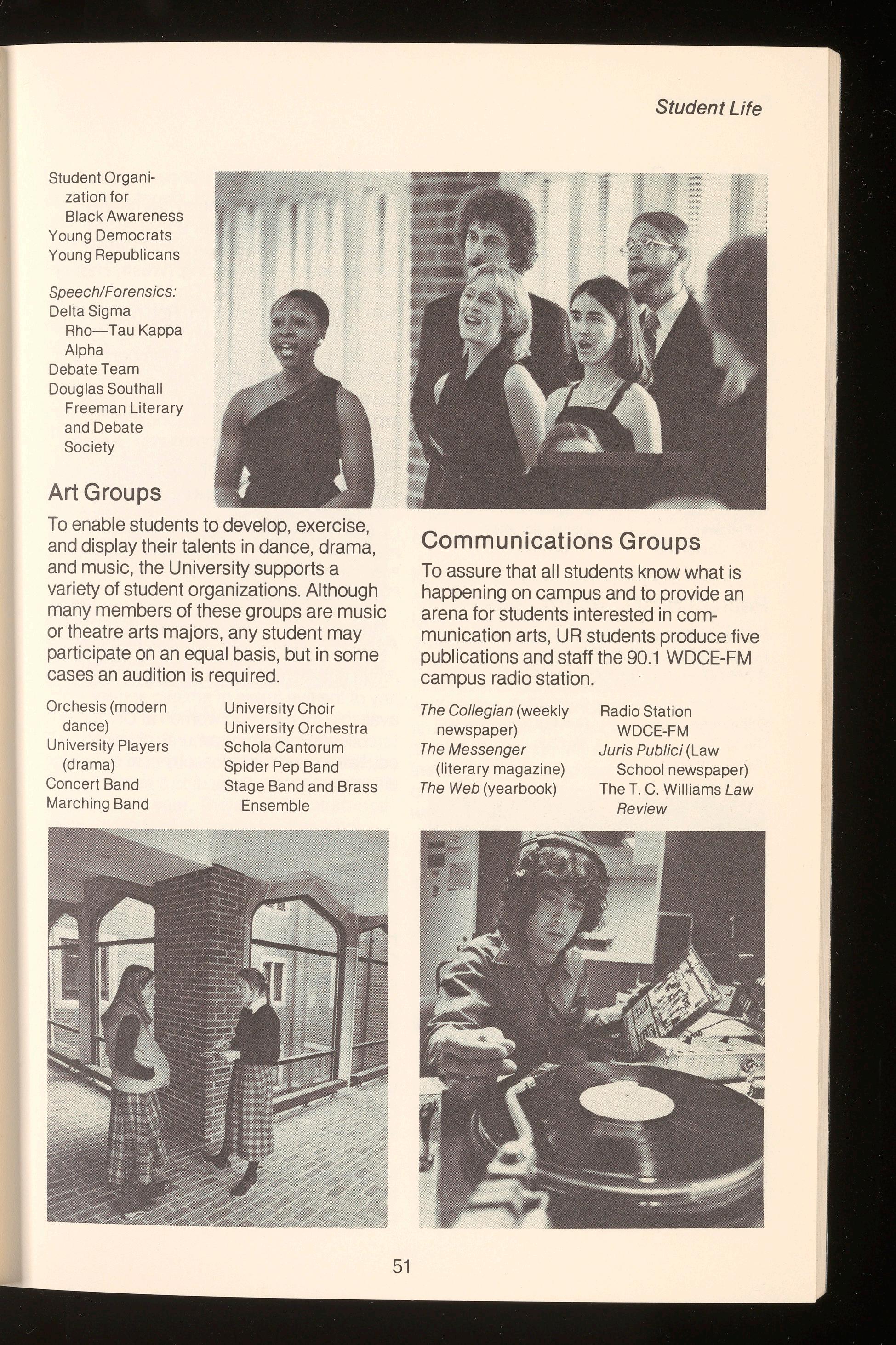
Student Organization for Black Awareness
Young Democrats
Young Republicans
Speech/Forensics:
Delta Sigma
Rho-Tau Kappa
Alpha
Debate Team
Douglas Southall
Freeman Literary and Debate
Society
Art Groups
To enable students to develop, exercise, and display their talents in dance, drama, and music, the University supports a variety of student organizations Although many members of these groups are music or theatre arts majors, any student may participate on an equal basis, but in some cases an audition is required.
Orchesis (modern dance)
University Players (drama)
Concert Band
Marching Band
University Choir
University Orchestra
Schola Cantorum
Spider Pep Band
Stage Band and Brass Ensemble
Communications Groups
To assure that all students know what is happening on campus and to provide an arena for students interested in communication arts, UR students produce five publications and staff the 90.1 WDCE-FM campus radio station.
The Collegian (weekly newspaper)
The Messenger (literary magazine)
The Web (yearbook)
Radio Station WDCE-FM
Juris Publici (Law School newspaper)
The T. C. Williams Law Review
Student Life
ReligiousOrganizations
Presentingopportunitiesfor fellowship, study,and/orsocial service,there are denominationaland nondenominationalor interdenominationalreligiousclubs on campus.
Denominational:
Baptist Student Union
Hillel Club (Jewish)
Lutheran Club
Newman Club (Catholic)
Orthodox Fellowship
Westminster Fellowship (Presbyterian)
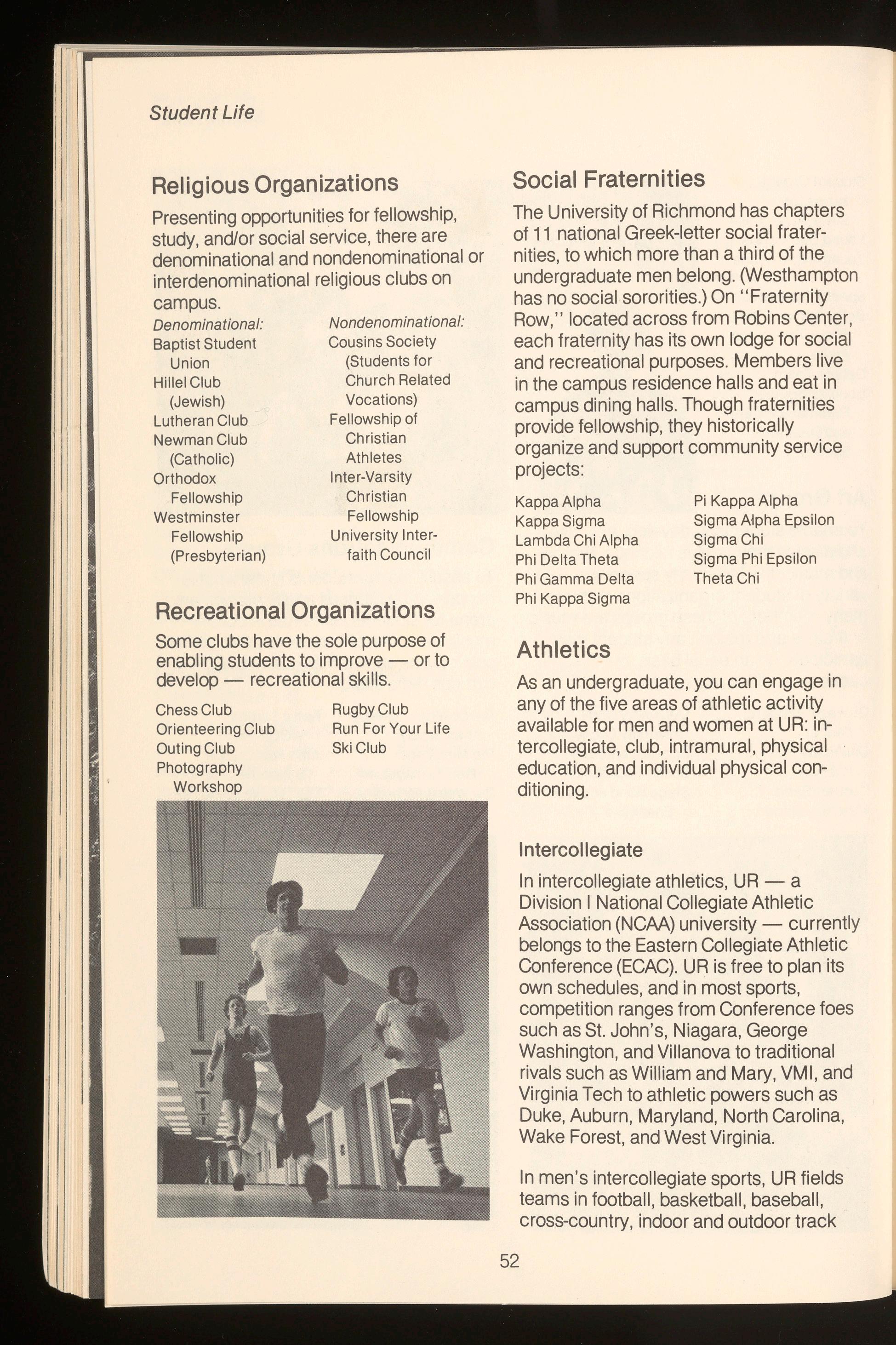
Nondenominational:
Cousins Society (Students for Church Related Vocations)
Fellowship of Christian Athletes
Inter-Varsity Christian Fellowship
University Interfaith Council
RecreationalOrganizations
Someclubs havethe sole purposeof enablingstudentsto improve- or to develop- recreationalskills.
Chess Club
Orienteering Club
Outing Club Photography Workshop
Rugby Club Run For Your Life Ski Club
Social Fraternities
The Universityof Richmondhas chapters of 11 nationalGreek-lettersocial fraternities,to which more than a third of the undergraduatemen belong.(Westhampton has no social sororities.)On "Fraternity Row," located across from RobinsCenter, each fraternity has its own lodge for social and recreationalpurposes.Members live in the campus residencehalls and eat in campus dining halls.Thoughfraternities providefellowship,they historically organizeand support community service projects:
Kappa Alpha
Kappa Sigma
Lambda Chi Alpha
Phi Delta Theta
Phi Gamma Delta
Phi Kappa Sigma
Athletics
Pi Kappa Alpha
Sigma Alpha Epsilon
Sigma Chi
Sigma Phi Epsilon
Theta Chi
As an undergraduate,you can engage in any of the five areas of athletic activity availablefor men and women at UR: intercollegiate,club, intramural, physical education,and individualphysical conditioning.
Intercollegiate
In intercollegiateathletics, UR - a DivisionI NationalCollegiateAthletic Association(NCAA)university - currently belongsto the EasternCollegiateAthletic Conference(ECAC).UR is free to plan its own schedules,and in most sports, competitionrangesfrom Conferencefoes such as St. John's, Niagara,George Washington,and Villanovato traditional rivalssuch as William and Mary, VMI, and VirginiaTech to athletic powers such as Duke,Auburn, Maryland,North Carolina, Wake Forest,and West Virginia.
In men's intercollegiatesports, UR fields teams in football, basketball,baseball, cross-country,indoorand outdoor track
and field, golf, soccer, swimming and water polo, tennis, riflery, and wrestling. (Incidentally,women who have the ability may compete for a place on some men's intercollegiateteams.)
WesthamptonCollege,a member of the NationalAssociation for Intercollegiate Athleticsfor Women, fields intercollegiate teams in basketball,field hockey, lacrosse, swimmingand diving, tennis, crosscountry/track,and synchronizedswimming.
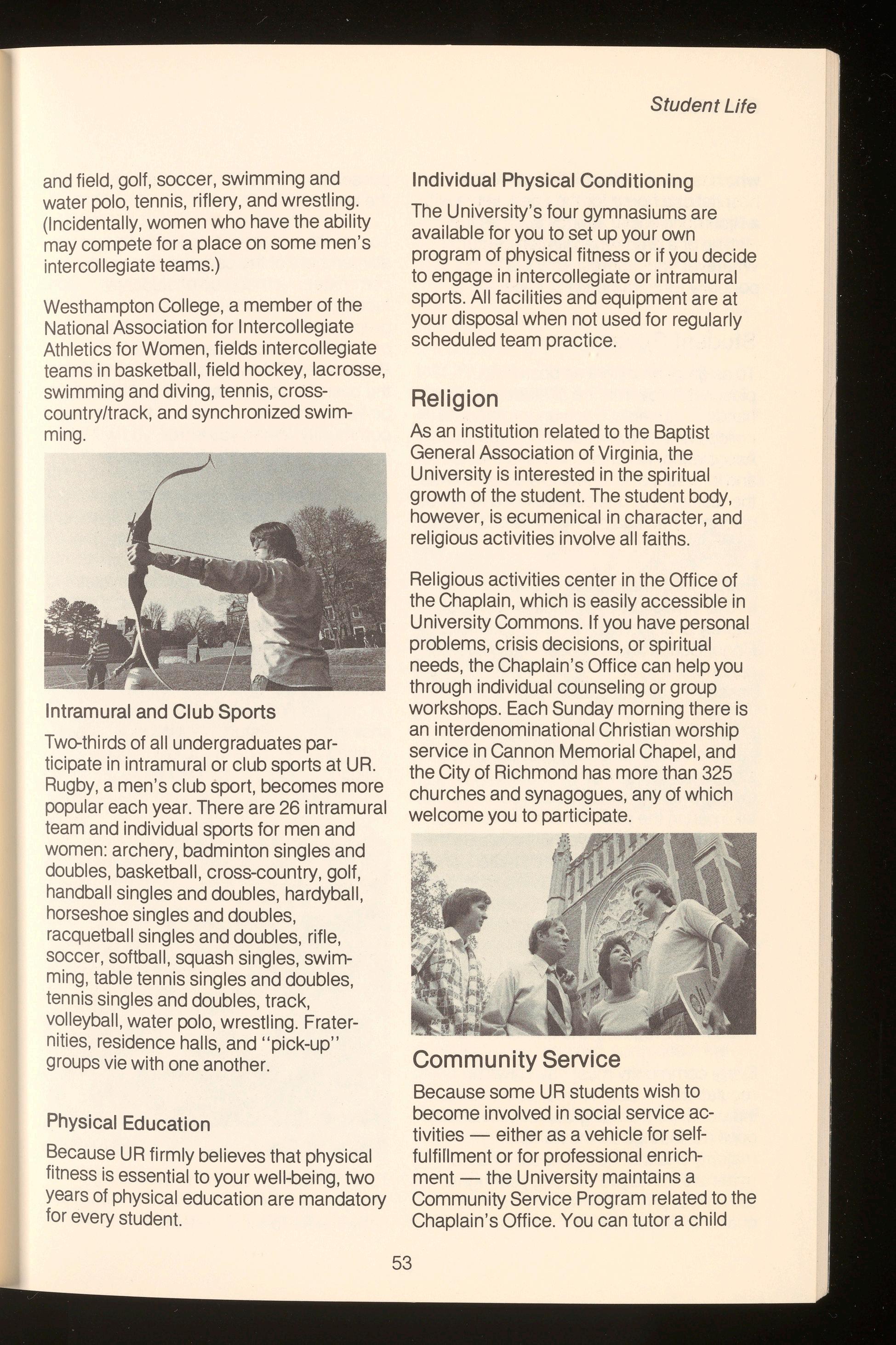
Intramural and Club Sports
Two-thirdsof all undergraduatesparticipate in intramural or club sports at UR. Rugby,a men's club sport, becomes more populareach year. There are 26 intramural team and individualsports for men and women: archery, badminton singles and doubles,basketball,cross-country,golf, handballsingles and doubles, hardyball, horseshoesingles and doubles, racquetballsingles and doubles, rifle, soccer, softball, squash singles, swimming, table tennis singles and doubles, tennissinglesand doubles, track, volleyball,water polo, wrestling. Fraternities, residencehalls, and "pick-up" groupsvie with one another.
PhysicalEducation
BecauseUR firmly believes that physical fitness is essentialto your well-being,two years of physical education are mandatory for every student.
Student Life
IndividualPhysicalConditioning
The University's four gymnasiums are available for you to set up your own program of physical fitness or if you decide to engage in intercollegiateor intramural sports. All facilities and equipment are at your disposal when not used for regularly scheduled team practice.
Religion
As an institution related to the Baptist GeneralAssociation of Virginia,the University is interested in the spiritual growth of the student.The student body, however, is ecumenical in character, and religiousactivities involve all faiths.
Religiousactivities center in the Office of the Chaplain,which is easily accessible in UniversityCommons. If you have personal problems, crisis decisions, or spiritual needs, the Chaplain's Office can help you through individualcounselingor group workshops. Each Sunday morning there is an interdenominationalChristian worship service in Cannon Memorial Chapel,and the City of Richmond has more than 325 churches and synagogues,any of which welcome you to participate.
Community Service
Because some UR students wish to become involved in social service activities -either as a vehicle for selffulfillment or for professionalenrichment -the University maintains a Community Service Program related to the Chaplain's Office. You can tutor a child
Student Life
who has readingdisabilities,work in a hospitalor a home for the aged, seNe with a Richmondsocial agency such as the Hotline or a drug rehabilitationcenter. Whateveryour interest,there is an opportunity for community seNice.
StudentGovernment
To as great an extent as possible,UR places the governanceof students in the hands of students.Each undergraduate college has its own StudentGovernment Association,which respondsto the needs and interests of its specific students.Thus, the residentsof one college need never be discriminatedagainst by the residentsof another college
Each college has its own HonorCouncil and its own Judicial Council -composed entirely of students.As a rule, violationsof Honor Codes and of student standardsof conduct are judged -and sentences passed -by these bodies.
Students not only govern themselves,but participate in the operationof the University. When the University is seekingnew faculty members,students in some cases, take part in the evaluationof candidates Everythird semesteryou will evaluatethe professorsunderwhom you studied,and sometimesyour appraisalwill become part of the overall evaluationthat determines the contract renewaland grants of tenure of current faculty. Studentssit -and vote -on such committees of the Board of Trusteesas Developmentand University Relations,BusinessManagement , Academic Program,and StudentAffairs.
Every community must have laws or regulations-both to guaranteethat one individual(or a small group of individuals} does not infringe on the rights of the majority and that no individual'shuman rights are damaged.Among your rights is the right to privacy.Any entry of living quarters, offices, lockers,or examinationof
possessionsmust be in accordance with the law
To provide a clear-cut code of conduct for all members of the campus community, a committee -made up of students, faculty, administrators, and trusteesprepared a Policy Statementon Standards of Conduct,Penaltiesand Disciplinary Procedures.This statement has become the basis for disciplinary action that must be taken with any member of the campus community. When you enroll, you will be provided a copy to study thoroughly.
Now for a few quick answers. Drugs? Forbidden.Alcoholic beverages?Specific guidelines limit the use and regulate the consumption of such beverages on campus. Automobiles and motorcycles? Yes -provided they are registered with the University,an Automobile Permit Fee of $20 is paid, you abide by the regulations regardingthe use of the vehicle and (as a resident freshman) there is parking space on campus You will find more complete answers in your student handbookor by writing to the Office of the Dean of the College.
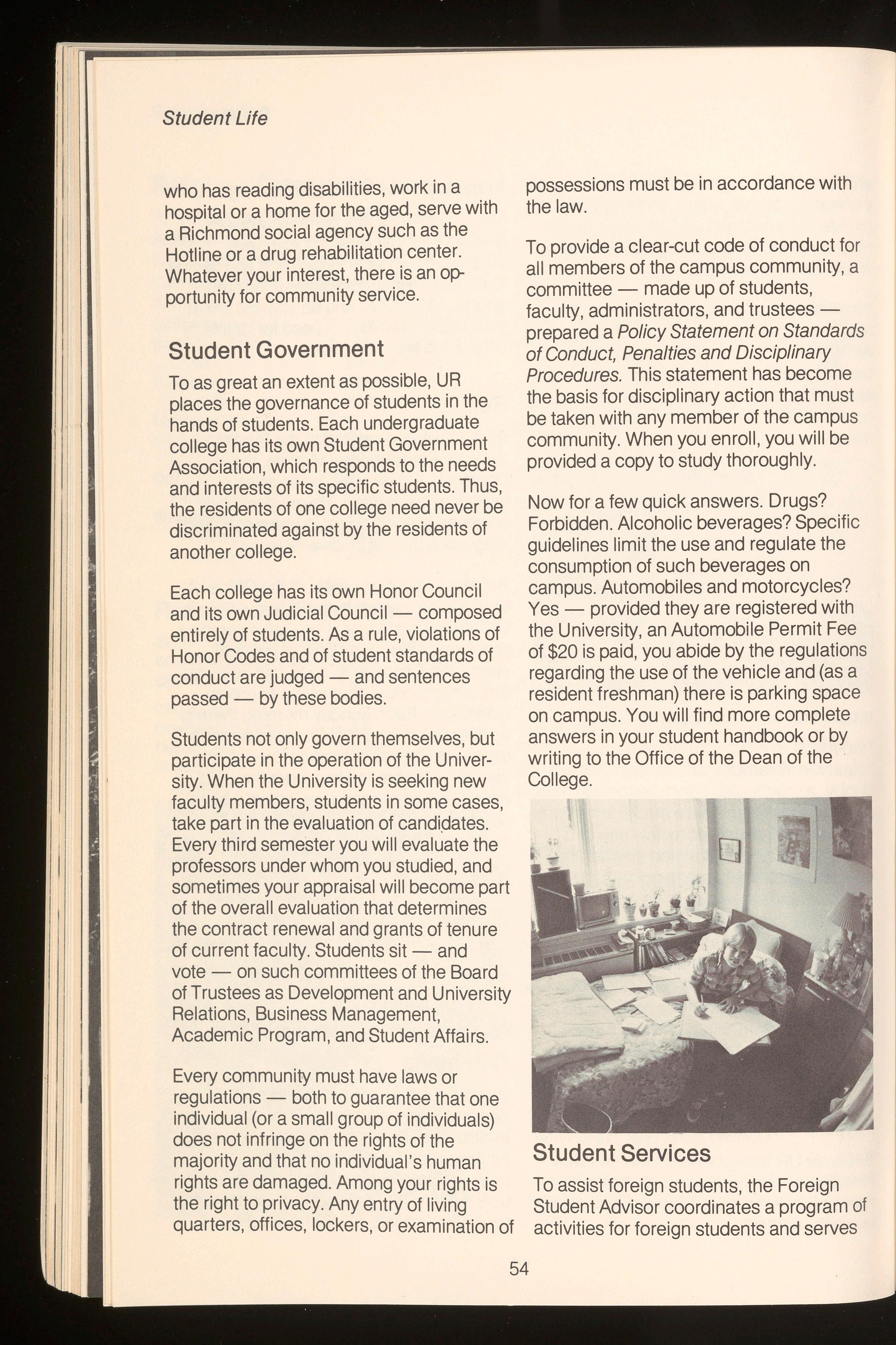
Student
Services
To assist foreign students, the Foreign StudentAdvisor coordinates a program of activities for foreign students and seNes
as the official person to complete required UnitedStates Immigration forms for students.A program of orientation is conductedat the opening of the fall semester;a hospitality committee extends hospitalityto foreign students; an InternationalRelationsClub provides social and cultural activities; personal and academic counseling or referral are providedby the Foreign Student Advisor if such services are appropriate.
In additionto the academic and religious counselingservices already mentioned, there is a UniversityCenter for PsychologicalServices, staffed by professional psychologists.The staff is interested in helpingyou to adjust to the challenges, stresses,and opportunities that exist on campus,whether your problems are academic,vocational, personal, or emotional.

Therealso is an Office of Career Planning and Placement.Should you still be searchingfor the right career or profession
(and almost half of all college students are undecided about their career goals when they enter college}, this office will help you to identify your skills, values, and interests; show you how to set long-rangegoals; introduce you to creative ways to approach the working world. If you are seeking parttime employment during the school year or the summer, or if you wish a summer internship, the Placement Office will help you in your search Naturally, seniors and alumni can turn to the Placement Office for help in their job searches, and each year more than 200 businesses,industries,and schools send representativesto campus to interview job candidates.
Because UR is interested in your continuing good health, the University maintains a 22-bed infirmary. It is under the direction of the University physician and a staff of three resident nurses who are on duty around the clock. The cost of infirmary rooms and medical attention given on campus by the University medical staff is included as part of your fee. If prescription drugs, laboratory services, or medical consultation is required, such costs are billed separately.
The University is fully prepared to take care of ordinary illnesses and accidents, but if your problem is beyond the scope of our facilities, you will be taken to the nearest hospital Gustfour miles from campus}, and your parents will be notified at once.
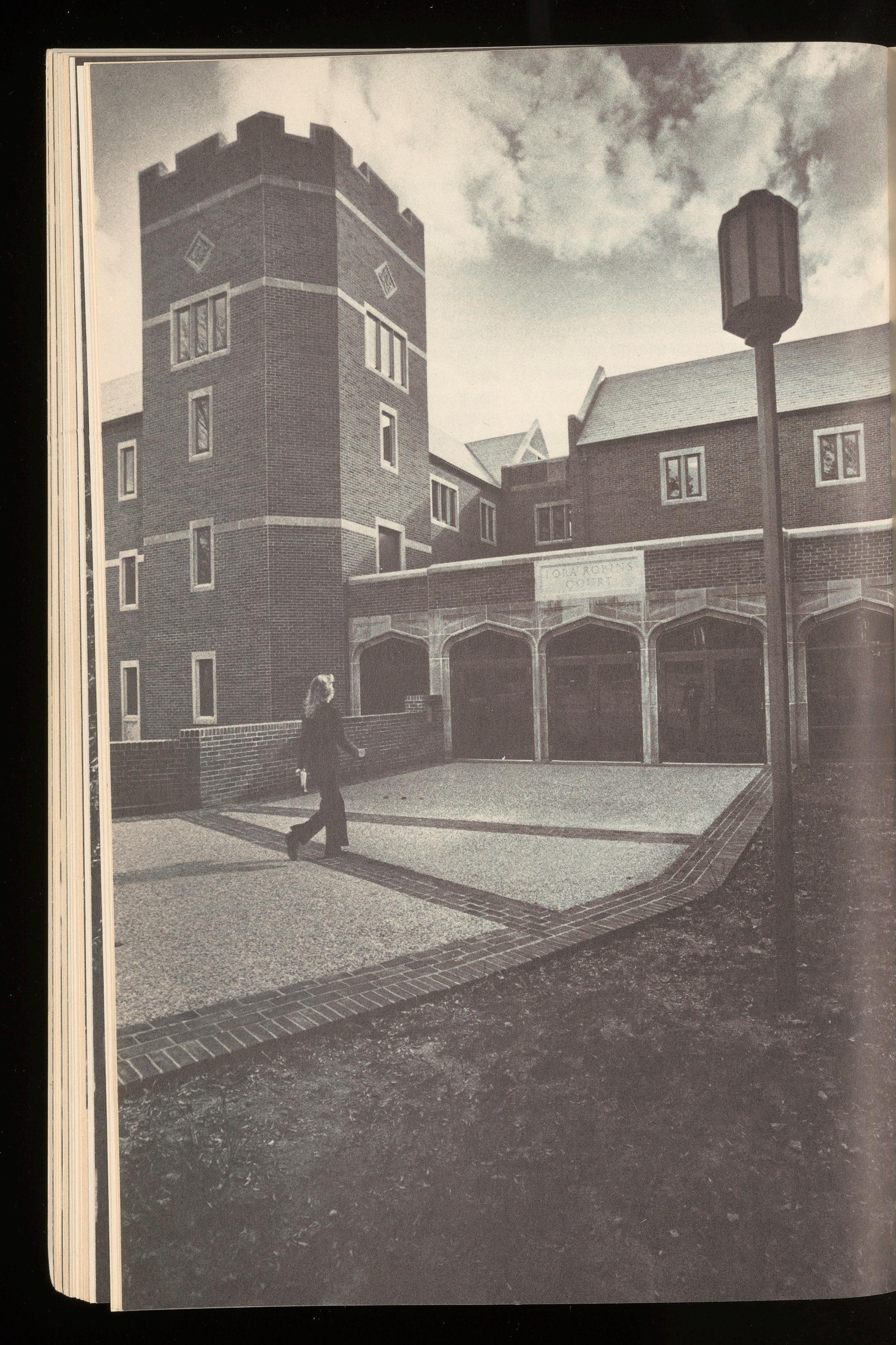
4} ADMISSION
One of the problems in presenting an authentic picture of the University of Richmond is that some prospective students - reading of its superior faculty, handsome facilities and diverse cocurricular activities ·- might readily dismiss UR as an unaffordable institution.
Today, no college education is inexpensive. However, the same financial support from alumni and friends that helps us construct new buildings, install new equipment, and retain eminent professors at UR, also helps us to keep tuition costs down. (Our students actually pay only about 70 percent of the true cost of their education.) We enjoy excellent endowment. Our emphasis on strict financial planning enables us to make the most of it so when your costs are computed you receive maximum benefits both educationally and financially.
For the year 1980-81, basic annual costs of attending UR are:*
Tuition
$4,100.00 Room (depending on residence hall) 775.00- $ 900.00 Board (depending on meal plan)
Total basic costs
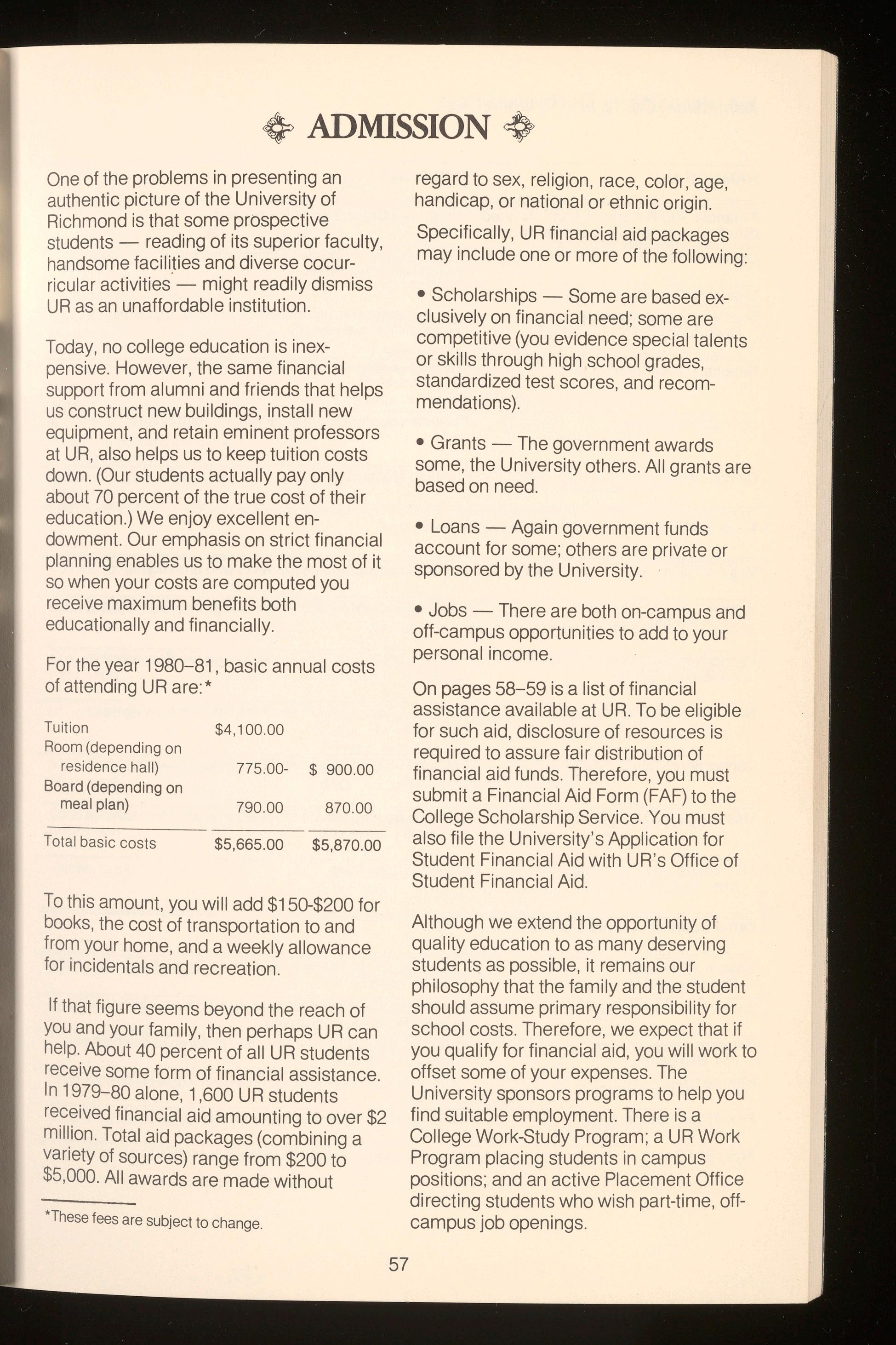
$5,665.00
$5,870.00
To this amount, you will add $150-$200 for books, the cost of transportation to and from your home, and a weekly allowance for incidentals and recreation.
If that figure seems beyond the reach of you and your family, then perhaps UR can help. About 40 percent of all UR students receive some form of financial assistance. In 1979-80 alone, 1,600 UR students received financial aid amounting to over $2 mill_ion.Total aid packages (combining a variety of sources) range from $200 to $5,000. All awards are made without
*These fees are subject to change.
regard to sex, religion, race, color, age, handicap, or national or ethnic origin. Specifically, UR financial aid packages may include one or more of the following:
• Scholarships - Some are based exclusively on financial need; some are competitive (you evidence special talents or skills through high school grades, standardized test scores, and recommendations).
• Grants - The government awards some, the University others. All grants are based on need.
• Loans - Again government funds account for some; others are private or sponsored by the University.
• Jobs - There are both on-campus and off-campus opportunities to add to your personal income.
On pages 58-59 is a list of financial assistance available at UR. To be eligible for such aid, disclosure of resources is required to assure fair distribution of financial aid funds. Therefore, you must submit a Financial Aid Form (FAF) to the College Scholarship Service. You must also file the University's Application for Student Financial Aid with UR's Office of Student Financial Aid.
Although we extend the opportunity of quality education to as many deserving students as possible, it remains our philosophy that the family and the student should assume primary responsibility for school costs. Therefore, we expect that if you qualify for financial aid, you will work to offset some of your expenses. The University sponsors programs to help you find suitable employment. There is a College Work-Study Program; a UR Work Program placing students in campus positions; and an active Placement Office directing students who wish part-time, offcampus job openings.
Admission, Costs, and Financial Aid
ELIGIBILITY
NAME OF AID
Financial Aid Programs Administered through the University of Richmond (Student must apply yearly for financial aid)
Cousins Grants
University Grants
Supplemental Educational Opportunity Grants (S E O.G.)
National Direct Student Loan
College Work-Study
Campus Work
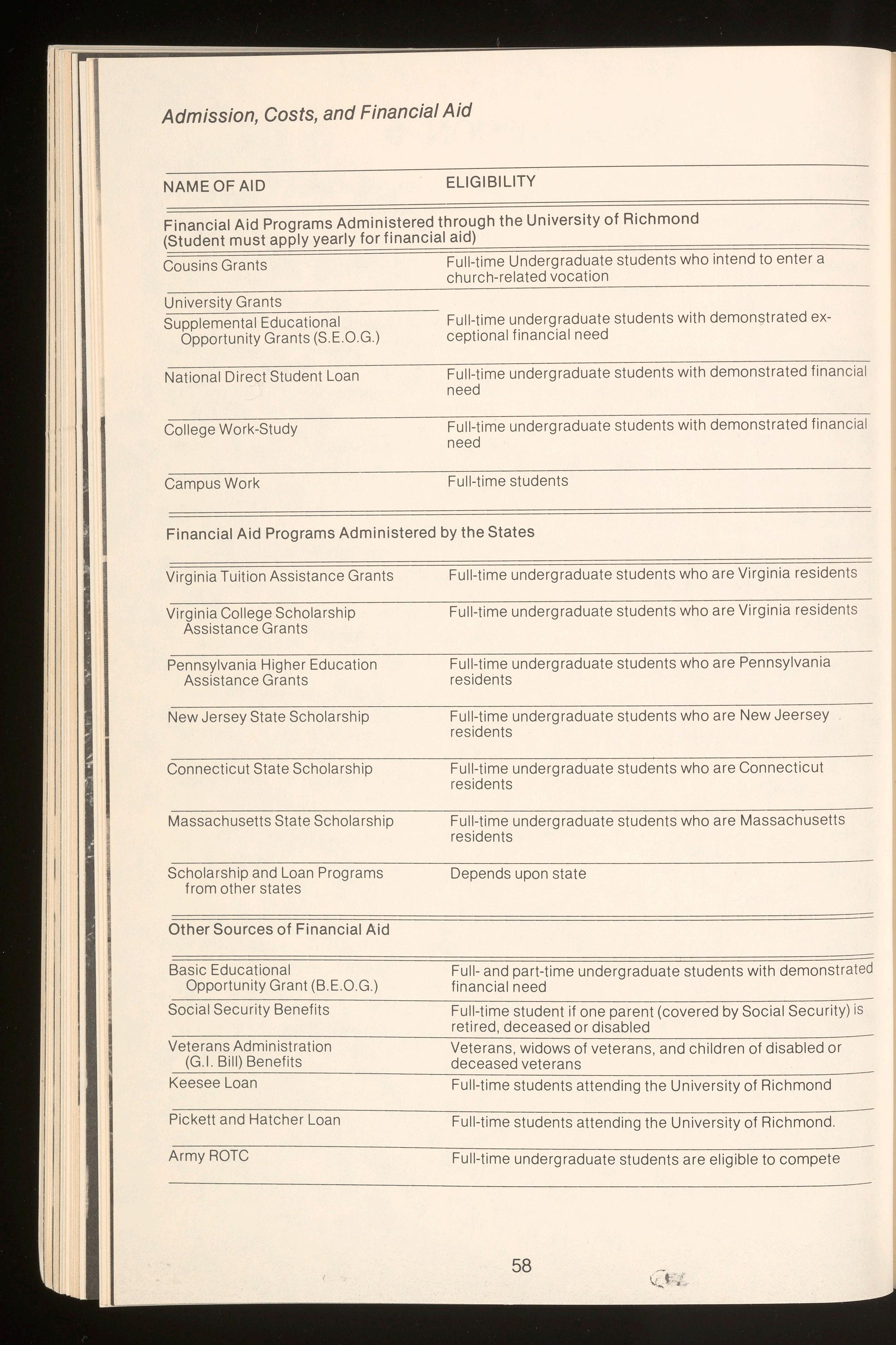
Full-time Undergraduate students who intend to enter a church-related vocation
Full-time undergraduate students with demonstrated exceptional financial need
Full-time undergraduate students with demonstrated financia l need
Full-time undergraduate students with demonstrated finan cial need
Full-time students
Financial Aid Programs Administered by the States
Virginia Tuition Assistance Grants
Virginia College Scholarship Assistance Grants
Pennsylvania Higher Education Assistance Grants
New Jersey State Scholarship
Connecticut State Scholarship
Massachusetts State Scholarship
Scholarship and Loan Programs from other states
Other Sources of Financial Aid
Basic Educational Opportunity Grant (B E O G )
Social Security Benefits
Veterans Administration (G I Bill) Benefits
Keesee Loan
Pickett and Hatcher Loan
Army ROTC
Full-time undergraduate students who are Virginia resident s
Full-time undergraduate students who are Virginia resident s
Full-time undergraduate students who are Pennsylvania residents
Full-time undergraduate students who are New Jeersey residents
Full-time undergraduate students who are Connecticut residents
Full-time undergraduate students who are Massachusetts residents
Depends upon state
Full-and part-time undergraduate students with demonstra t ed financial need
Full-time student if one parent (covered by Socia l Security) is retired, deceased or disab led
Veterans , widows of veterans , and children of disabled or deceased veterans
Full-time students attend ing the Univers ity of Richmond
Full-time students attending the University of Richmond.
Full-time undergraduate students are eligible to compete
FINANCIAL VALUE
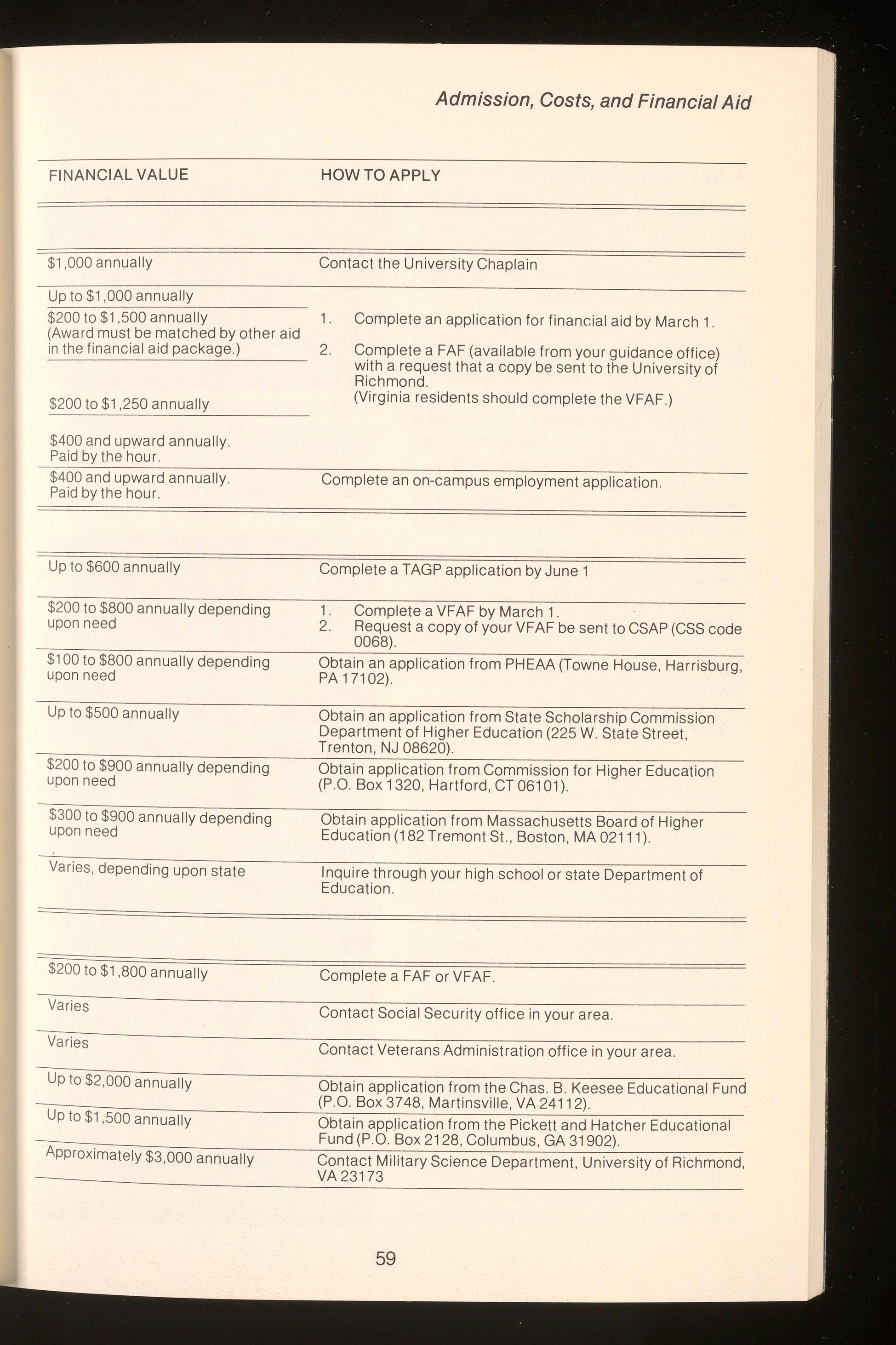
Admission, Costs, and FinancialAid
HOW TO APPLY
$1 ,000 annually
Up to $1 ,000 annually
$200 to $1,500 annually
Contact the University Chaplain
1. Complete an application for financial aid by March 1.
(Award must be matched by other aid in the financial aid package.) 2.
$200 to $1,250 annually
$400 and upward annually. Paid by the hour.
$400 and upward annually. Paid by the hour.
Up to $600 annually
$200 to $800 annually depending upon need
$100 to $800 annually depending upon need
Up to $500 annually
$200 to $900 annually depending upon need
$300 to $900 annually depending upon need
Varies , depending upon state
Complete a FAF (available from your guidance office) with a request that a copy be sent to the University of Richmond.
(Virginia residents should complete the VFAF.)
Complete an on-campus employment application.
Complete a TAGP application by June 1
1. Complete a VFAF by March 1.
2. Request a copy of your VFAF be sent to CSAP (CSS code 0068).
Obtain an application from PHEAA (Towne House, Harrisburg, PA17102)
Obtain an application from State Scholarship Commission Department of Higher Education (225 W. State Street, Trenton, NJ 08620).
Obtain application from Commission for Higher Education (P.O Box 1320, Hartford, CT 06101 ).
Obtain application from Massachusetts Board of Higher Education (182 Tremont St., Boston, MA02111).
Inquire through your high school or state Department of Education.
$200 to $1 ,800 annually
Varies
Varies
Up to $2,000 annually
Up to $1,500 annual ly
Approximately $3,000 annua lly
Complete a FAF or VFAF.
Contact Social Security office in your area.
Contact Veterans Administration office in your area.
Obtain application from the Chas. B. Keesee Educational Fund (P.O Box 3748, Martinsville, VA24112).
Obtain app lication from the Pickett and Hatcher Educational Fund (P.O. Box 2128, Columbus, GA 31902)
Contact Military Science Department, University of Richmond, VA 23173
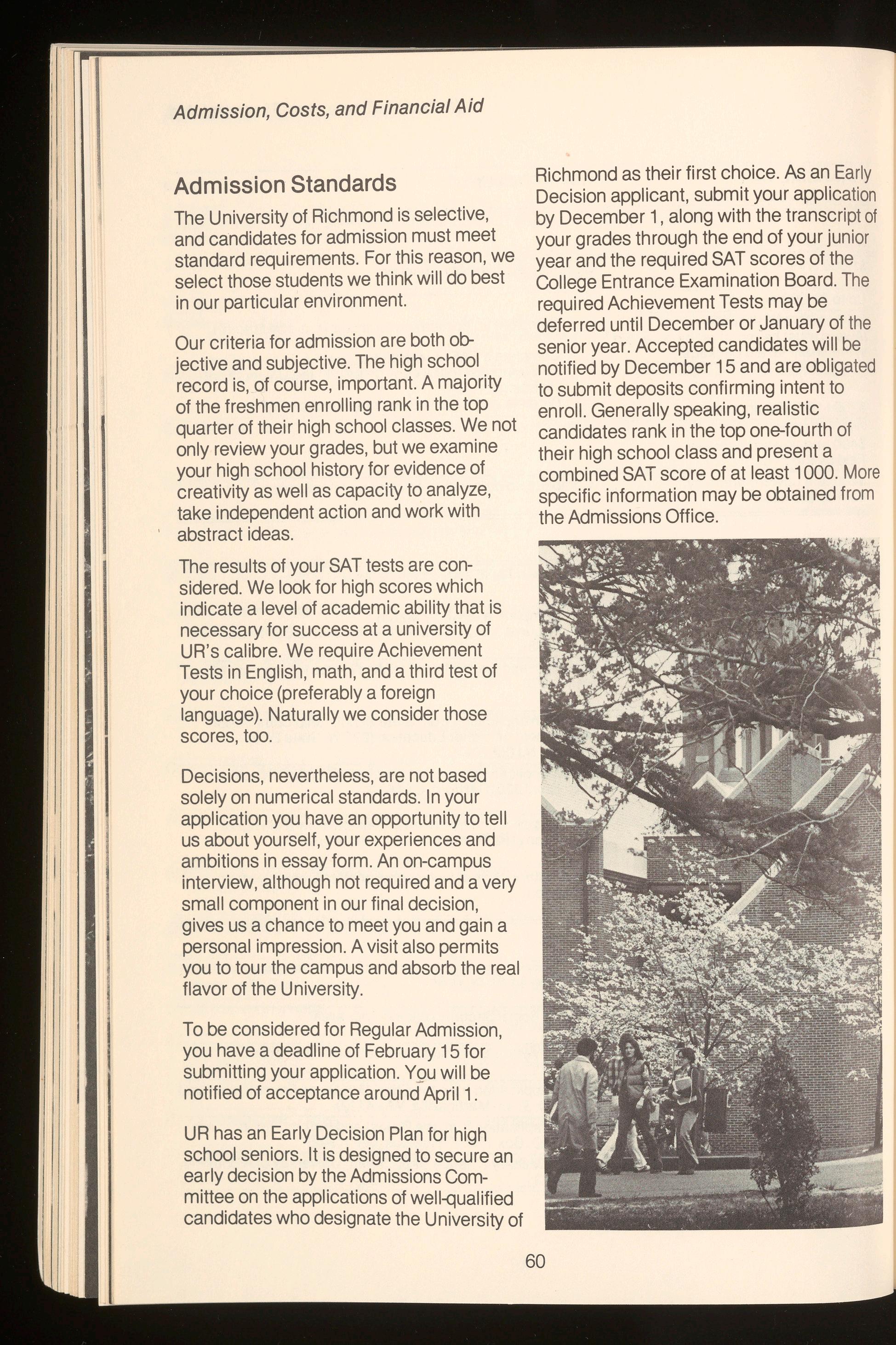
Admission, Costs, and Financial Aid
AdmissionStandards
The Universityof Richmondis selective, and candidatesfor admissionmust meet standard requirements . For this reason,we select those studentswe think will do best in our particular environment.
Our criteria for admissionare both objective and subjective. The high sch~I . record is, of course, important.A maJority of the freshmen enrolling rank in the top quarter of their high school classes.We not only review your grades,but we examine your high school history for evidenceof creativity as well as capacity to analyze, take independentaction and work with abstract ideas.
The results of your SATtests are considered.We look for high scores which indicate a level of academic ability that is necessaryfor success at a universityof UR's calibre We requireAchievement Tests in English,math, and a third test of your choice (preferablya foreign language).Naturallywe consider those scores, too.
Decisions,nevertheless , are not based solely on numerical standards In your applicationyou have an opportunityto tell us about yourself,your experiencesand ambitions in essay form. An on-campus interview, althoughnot requiredand a very small component in our final decision, gives us a chance to meet you and gain a personal impression A visit also permits you to tour the campus and absorb the real flavor of the University.
To be consideredfor RegularAdmission, you have a deadlineof February15 for submitting your application Y9u will be notified of acceptance aroundApril 1.
UR has an Early Decision Planfor high school seniors. It is designedto secure an early decision by the AdmissionsCommittee on the applicationsof well-qualified candidates who designatethe Universityof
Richmond as their first choice. As an Early Decision applicant, submit your application by December 1, along with the transcript of your grades through the end of your junior year and the required SAT scores of the College Entrance Examination Board. The requiredAchievement Tests may be deferred until December or January of the senior year Accepted candidates will be notified by December 15 and are obligated to submit deposits confirming intent to enroll. Generally speaking, realistic candidates rank in the top one-fourth of their high school class and present a combined SATscore of at least 1000. More specific information may be obtained from the Admissions Office.
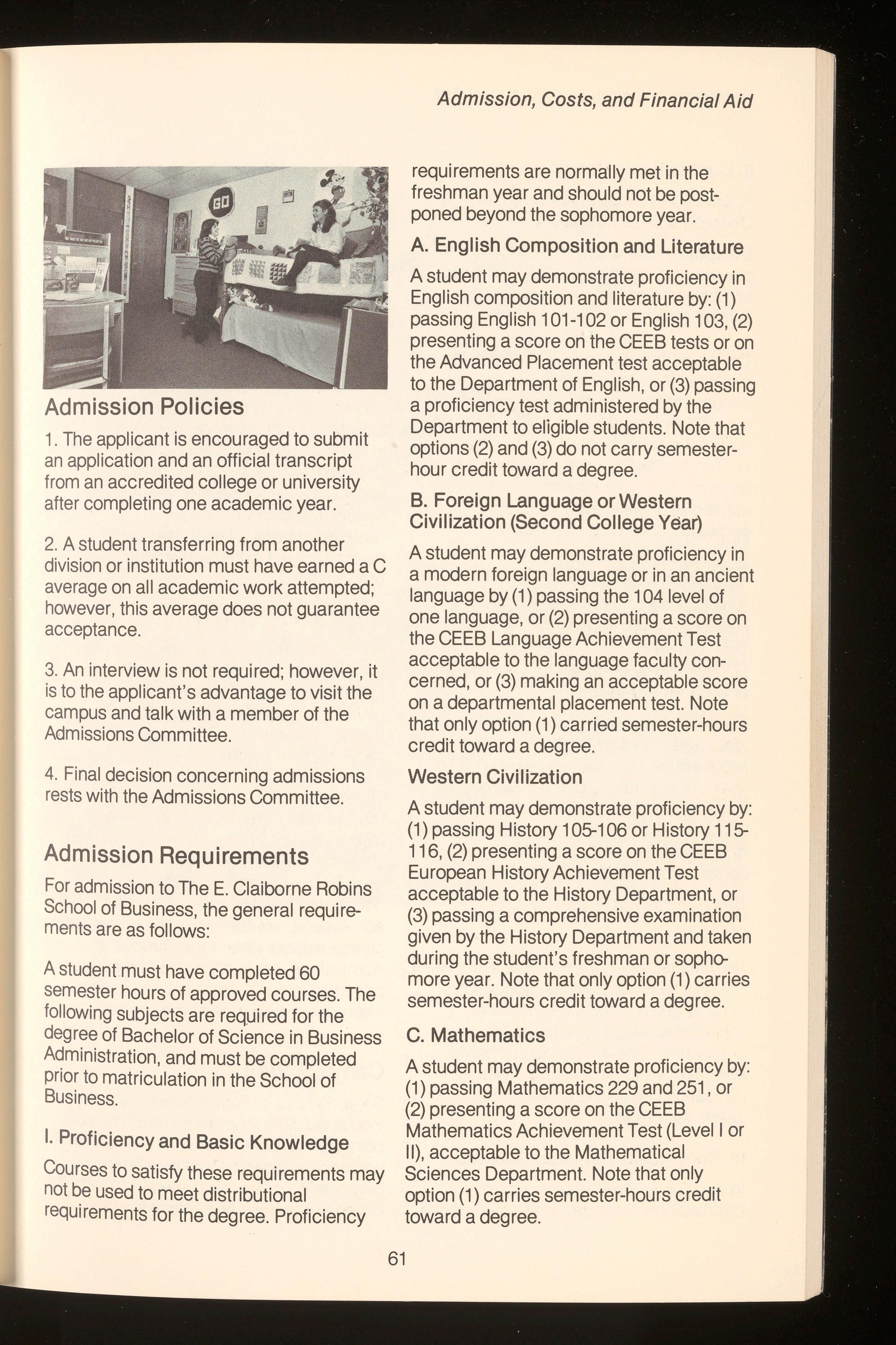
AdmissionPolicies
1 The applicant is encouraged to submit an applicationand an official transcript from an accredited college or university after completingone academic year.
2. A studenttransferring from another divisionor institution must have earned a C averageon all academic work attempted; however,this average does not guarantee acceptance
3. An interviewis not required; however, it is to the applicant's advantageto visit the campusand talk with a member of the AdmissionsCommittee.
4. Finaldecision concerning admissions restswith the AdmissionsCommittee.
Admission Requirements
Foradmissionto The E. Claiborne Robins Schoolof Business,the general requirementsare as follows:
A studentmust have completed 60 semesterhours of approved courses The followingsubjects are required for the degreeof Bachelor of Science in Business Administration,and must be completed priorto matriculation in the School of Business.
I. Proficiencyand Basic
Knowledge
Coursesto satisfy these requirementsmay not be usedto meet distributional requirementsfor the degree Proficiency
Admission, Costs, and FinancialAid
requirementsare normally met in the freshman year and should not be postponed beyond the sophomoreyear
A. EnglishCompositionand Literature
A student may demonstrate proficiency in Englishcomposition and literature by: (1) passing English 101-102or English103,(2) presenting a score on the CEEBtests or on the Advanced Placementtest acceptable to the Department of English, or (3) passing a proficiency test administeredby the Department to eligible students. Note that options (2) and (3) do not carry semesterhour credit toward a degree.
B. ForeignLanguageor Western Civilization(SecondCollegeYear)
A student may demonstrate proficiency in a modern foreign languageor in an ancient languageby (1) passing the 104 level of one language,or (2) presentinga score on the CEEB LanguageAchievementTest acceptable to the languagefaculty concerned, or (3) making an acceptable score on a departmental placement test. Note that only option (1) carried semester-hours credit toward a degree.
Western Civilization
A student may demonstrate proficiency by: (1) passing History 105-106or History 115116, (2) presenting a score on the CEEB European History AchievementTest acceptable to the History Department,or (3) passing a comprehensiveexamination given by the History Department and taken during the student's freshman or sophomore year. Note that only option (1) carries semester-hourscredit toward a degree.
C. Mathematics
A student may demonstrate proficiency by: (1) passing Mathematics 229 and 251, or (2) presenting a score on the CEEB Mathematics Achievement Test (Level I or II), acceptable to the Mathematical Sciences Department. Note that only option (1) carries semester-hourscredit toward a degree
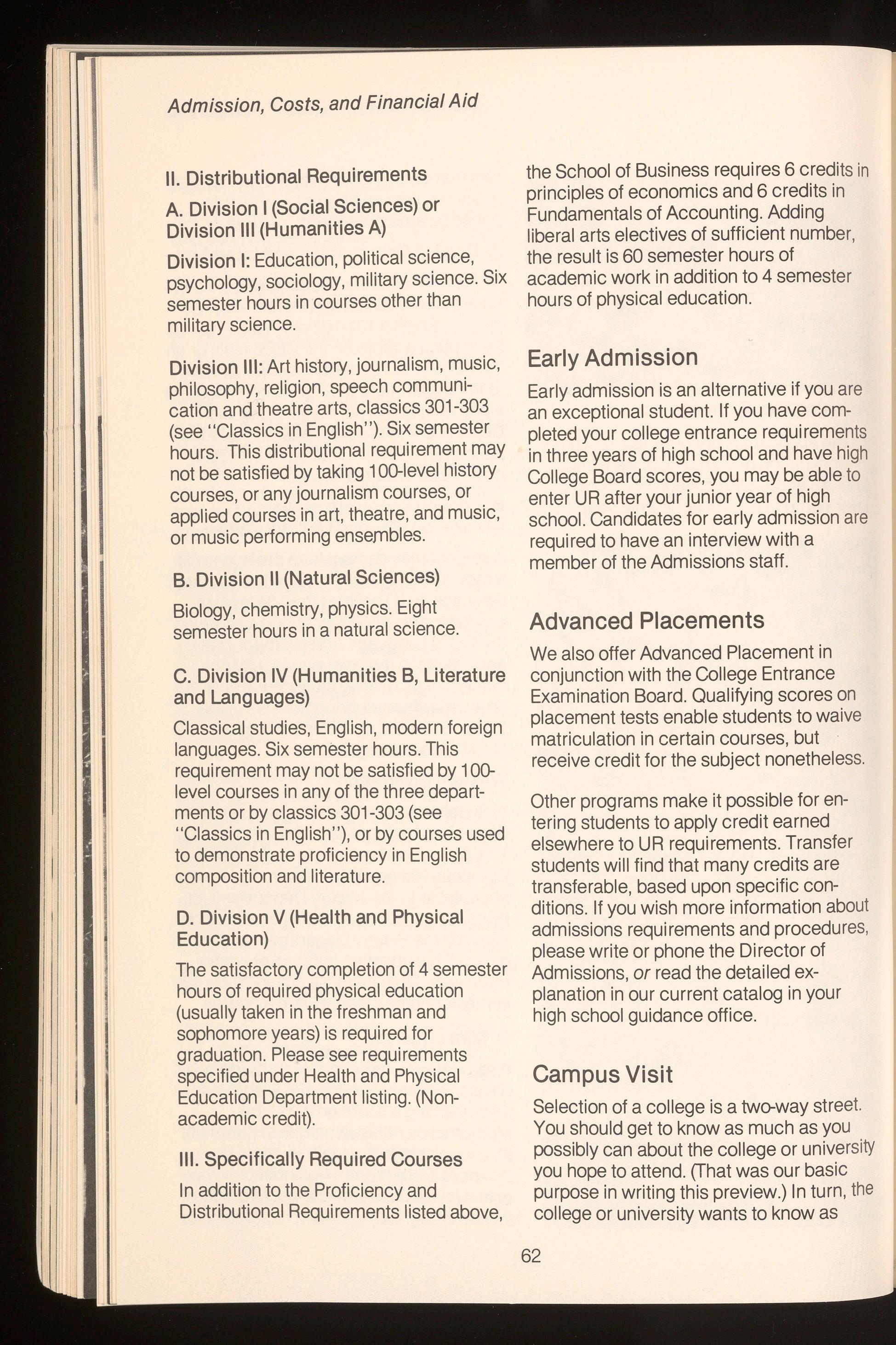
II. DistributionalRequirements
A. DivisionI (Social Sciences)or DivisionIll (HumanitiesA)
DivisionI: Education,political science, psychology,sociology,military science. Six semester hours in courses other than military science
DivisionIll: Art history, journalism, music, philosophy, religion,speech communication and theatre arts, classics 301-303 (see "Classics in English").Si~ semester hours. This distributionalrequirementmay not be satisfied by taking 1DO-levelhistory courses, or any journalism courses, or applied courses in art, theatre, and music, or music performingensembles.
B. DivisionII (NaturalSciences)
Biology,chemistry, physics. Eight semester hours in a natural science.
C. DivisionIV (HumanitiesB, Literature and Languages)
Classical studies,English,modern foreign languages Six semester hours.This requirementmay not be satisfied by 100level courses in any of the three departments or by classics 301-303(see "Classics in English"},or by courses used to demonstrateproficiency in English compositionand literature
D. DivisionV (Healthand Physical Education)
The satisfactory completionof 4 semester hours of requiredphysical education (usuallytaken in the freshman and sophomoreyears) is requiredfor graduation.Pleasesee requirements specified under Health and Physical EducationDepartment listing.(Nonacademic credit).
Ill. SpecificallyRequiredCourses
In additionto the Proficiencyand DistributionalRequirementslisted above,
the School of Business requires 6 credits in principles of economics and 6 credits in Fundamentalsof Accounting. Adding liberal arts electives of sufficient number, the result is 60 semester hours of academic work in addition to 4 semester hours of physical education.
EarlyAdmission
Early admission is an alternative if you are an exceptional student. If you have completed your college entrance requirements in three years of high school and have high College Board scores, you may be able to enter UR after your junior year of high school. Candidatesfor early admission are requiredto have an interview with a member of the Admissions staff.
Advanced Placements
We also offer Advanced Placement in conjunction with the College Entrance ExaminationBoard. Qualifying scores on placement tests enable students to waive matriculation in certain courses, but receive credit for the subject nonetheless.
Other programs make it possible for entering students to apply credit earned elsewhere to UR requirements.Transfer students will find that many credits are transferable,based upon specific conditions. If you wish more information about admissions requirements and procedures, please write or phone the Director of Admissions,or read the detailed explanation in our current catalog in your high school guidance office.
CampusVisit
Selection of a college is a two-way street. You should get to know as much as you possibly can about the college or university you hope to attend. (Thatwas our basic purpose in writing this preview.) In turn, the college or university wants to know as
muchaboutyou as possible. (And that is the reasonfor the information we request on our application)
Perhapsyou are one of those persons who can best form an opinion by seeing the collegefor yourself. Although a campus visit is not mandatoryfor admission to UR, 1tmaybe a good idea for you to pay us a ~isit.Be sure to make your arrangements madvance . Let us know whether - in additionto talking to an admissions ~ounselor-you wish to speak with a financialaid counselor talk with an athletic coachor the director df one of our student
Admission, Costs, and FinancialAid
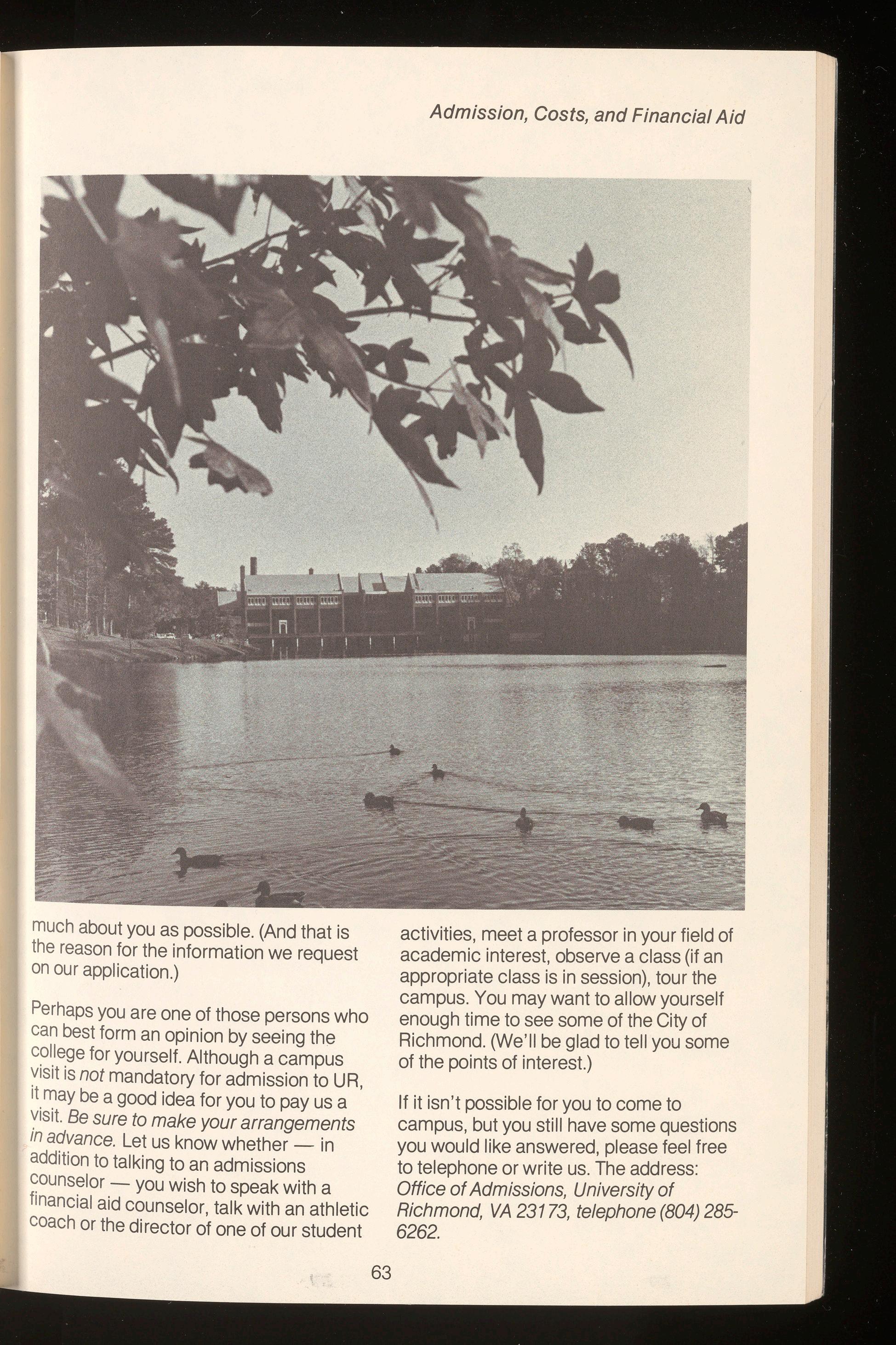
activities, meet a professor in your field of academic interest, observe a class (if an appropriate class is in session),tour the campus. You may want to allow yourself enough time to see some of the City of Richmond.(We'll be glad to tell you some of the points of interest.)
If it isn't possible for you to come to campus, but you still have some questions you would like answered, please feel free to telephone or write us. The address: Office of Admissions, Universityof Richmond, VA23173, telephone(804)2856262.
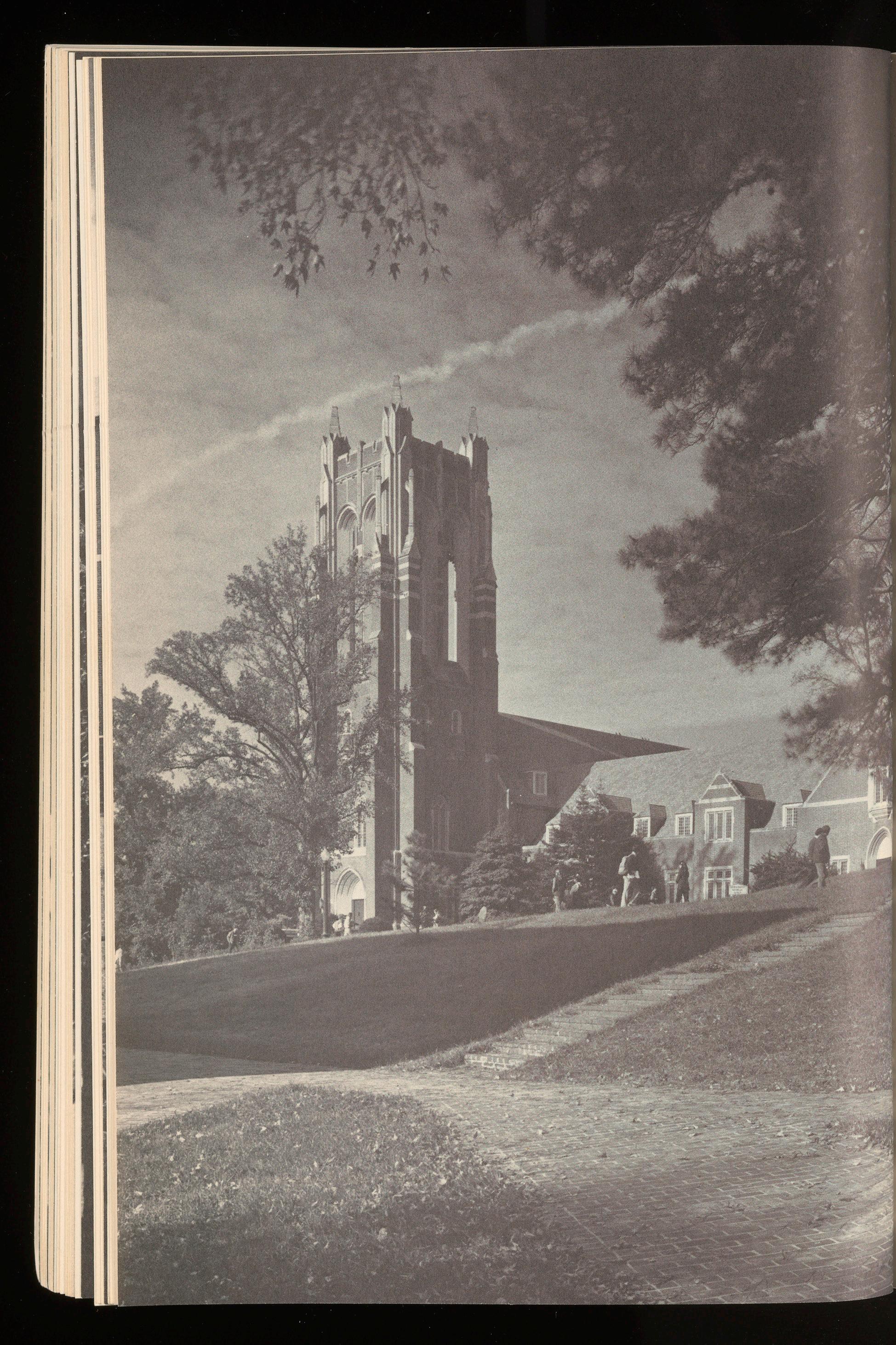

UNIVERSITY
The University of Richmond, founded in 1830 and with some 3,000 full-time students, is the largest private university in Virginia. UR accepts qualified students withoutregard to sex, religion, race, color, [)ationa l origin, or handicap.
Location
The University of Richmond is situated on the western outskirts of Richmond, Virginia, the state capital with a metropolitan population of 500 ,000. Richmond is two hours from Washington, D.C., one hour from Charlottesville and Williamsburg
Organization
The University is made up of six divisions: Richmond and Westhampton Colleges , liberal arts colleges for men and women respectively; The E. Claiborne Robins School of Business; The T. C. Williams School of Law ; Graduate School; and University College , which comprises UR's summer school and continuing education programs.
StudentBody
Richmond College enrolls 1 ,250 full-time male students; Westhampton, 1,000 female students; The E. Claiborne Robins School of Business , 300 men and women. Approximately 60 percent of all students are from out of state, and 80 percent live on campus.
Campus
T_heUniversity's 350-acre campus, located six miles west of the center of Richmond surrounds a 10-acre lake. Adding to the ' beauty of the campus are rolling hills , tall pines,_andmore than 46 major facilities, including the $1 0 million Robins Center for athletics; the $8 million Gottwald Science Center; a $4.5 million University Commons
(student center); Jenkins Greek Theater; Cannon Memorial Chapel ; Modlin Fine Arts Center (with the Camp Memorial Theater); Boatwright Memorial Library (to which a $4 million addition has been built); and the recently completed $4 million Lora Robins Court residence hall.
Academically, the University of Richmond adheres to the liberal arts tradition, seeking to provide sound learning and teaching, and opportunities in research for the intellectual development of its students and faculty.
Degree Programs
UR offers programs leading to the Associate of Applied Studies, Bachelor of Applied Studies, Bachelor of Arts, Bachelor of Science , Bachelor of Science in Business Administration, Bachelor of Music, Master of Arts, Master of Business Administration, Master of Education, Master of Education in Physical Education, Master of Humanities, Master of Science, and Juris Doctor.

UniversityProfile
Majors Offered
UR students may major in accounting, American studies , art (art history and studio art) , biology , business administration , chemistry , classical civilization , classical studies , economics , education (early childhood , elementary , and secondary) , English, health education , history, interdisciplinary studies , journalism , modern foreign languages (French , German , or Spanish) , music (music education, music history and theory , and performance), philosophy , physical education, physics , political science , psychology , religion , Russian area studies , sociology , speech communication , theatre history & theory , theatre theory and practice, and urban studies
Special Programs
Honors program , independent study , undergraduate research program , scholars program , creative writing program, Freshman Colloquia , interdisciplinary studies, study abroad , internships, degree credit for professional studies.
Accreditation
All colleges of UR are fully accredited by the Southern Association of Colleges and Schools and the Virginia State Board of Education The undergraduate program of The E. Claiborne Robins School of Business is accredited by the America n Assembly of Collegiate Schools of Business , and the School of Law by th e Association of American Law Schools
Honor Societies
More than 30 national and local honor societies , including Phi Beta Kappa and Beta Gamma Sigma , are represented at UR.
Faculty
The faculty includes 200 full-time and 120 part-time members. Of the full-time facul ty, 78 percent have earned doctorates. The student-faculty ratio is 14:1.
LibraryFacilities
The Boatwright Memorial Library cont ains about 340 ,000 volumes, 2 ,300 periodi cals, and complete microfiche capability The Billikopf Learning Resources Center of the Library includes a 100-seat auditorium and a large number of records, tapes, slide s, and microfilms. A wing of the Library houses the Virginia Baptist Historical Society , the archive of early church records . There is a science library in th e Gottwald Science Center , a music libr ary in the Modlin Fine Arts Center, and a law library in The T. C. Williams School of Law
Academic Calendar
UR operates on a semester system (August to May). A number of summer school sessions is offered .
ADMISSIONS
Although requirements for the liberal arts and sciences divisions -Richmond College and Westhampton College -are the same, there are totally different requirements for admission to The E. Claiborne Robins School of Business since an applicant must have completed the equivalent of two years of college work.*
The policy governing admission to all colleges and schools of the University of Richmond provides equal educational opportunity to qualified applicants without regard to sex, religion, race, color, age, handicap, ethnic or national origin.
Admission Requirements
Those seeking admission to Richmond College or Westhampton College must have completed 16 units of high school work, including four in English, three in college-preparatory mathematics, one in history, and one in laboratory science. Two years in one foreign language are strongly recommended. An applicant should have the high school guidance counselor send an official transcript of work completed, courses in progress, and the school's recommendation.
In addition, students, whose high school years have included work taken at a college or university or under the auspices of a college or university, must provide a brief statement describing the work, preferably from the high school guidance counselor. Also, an official transcript reporting the work must be sent from the sponsoring college or university directly to this institution.
All applicants must take the Scholastic Aptitude Tests, the English Achievement
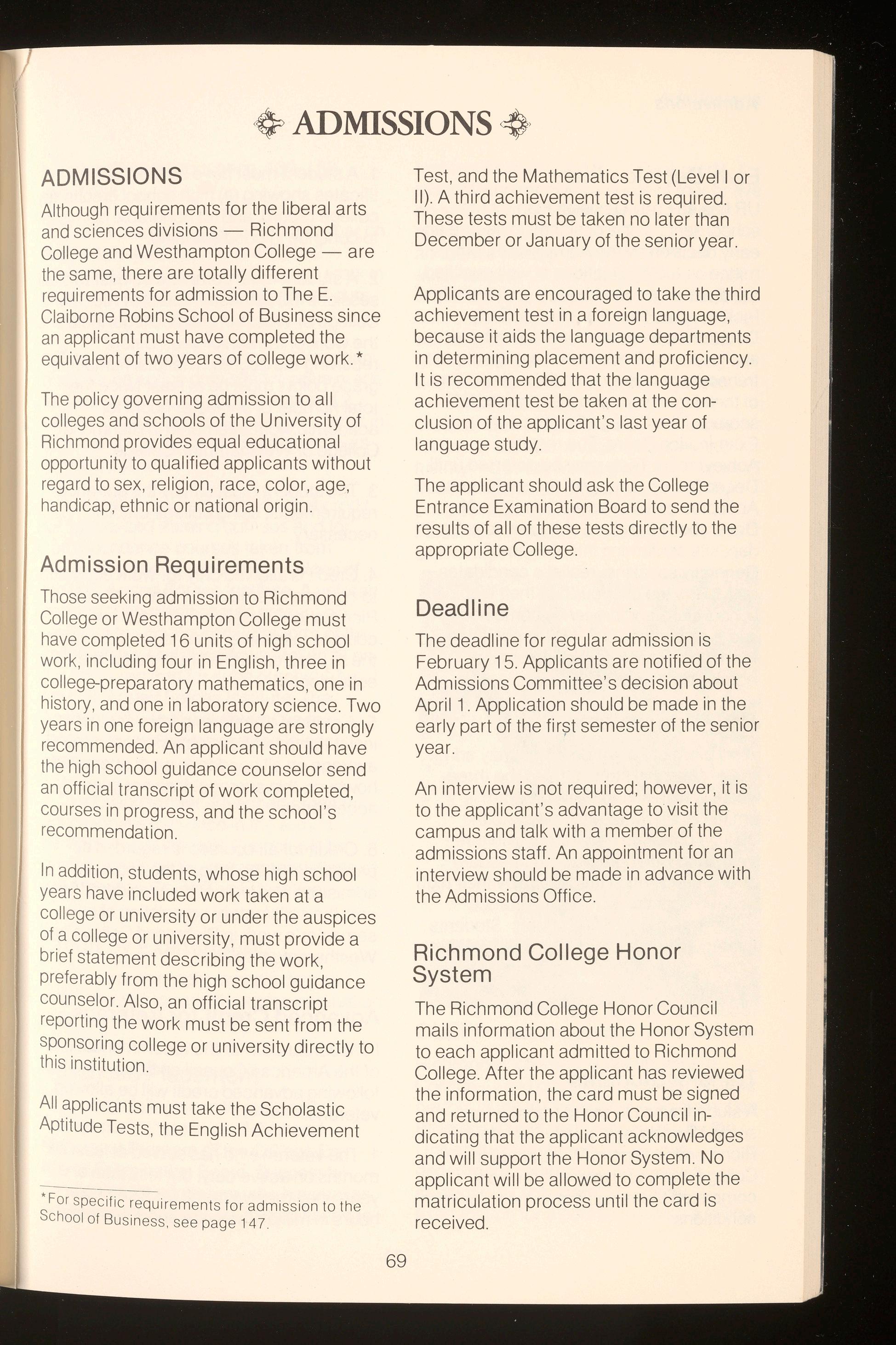
'For specific requirements for admission to the School of Business. see page 14 7.
Test, and the Mathematics Test (Level I or II). A third achievement test is required. These tests must be taken no later than December or January of the senior year.
Applicants are encouraged to take the third achievement test in a foreign language, because it aids the language departments in determining placement and proficiency. It is recommended that the language achievement test be taken at the conclusion of the applicant's last year of language study.
The applicant should ask the College Entrance Examination Board to send the results of all of these tests directly to the appropriate College.
Deadline
The deadline for regular admission is February 15. Applicants are notified of the Admissions Committee's decision about April 1. Application should be made in the early part of the fir?t semester of the senior year.
An interview is not required; however, it is to the applicant's advantage to visit the campus and talk with a member of the admissions staff. An appointment for an interview should be made in advance with the Admissions Office.
Richmond College Honor System
The Richmond College Honor Council mails information about the Honor System to each applicant admitted to Richmond College. After the applicant has reviewed the information, the card must be signed and returned to the Honor Council indicating that the applicant acknowledges and will support the Honor System. No applicant will be allowed to complete the matriculation process until the card is received.

Admissions
Early Decision Plan
UR has an Early Decision Plan for high school seniors. It is designed to secure an early decision by the Admissions Committee on the applications of well-qualified candidates who designate the University of Richmond as their first choice. Early Decision applicants should submit their application by December 1 along with the transcript of their grades through the end of their junior year and the required SAT scores of the College Entrance Examination Board. The required Achievement Tests may be deferred until December or January of the senior year. Accepted candidates will be notified by December 15 and are obligated to submit deposits confirming intent to enroll. Generally speaking, realistic candidates rank in the top one-fourth of their high school class and present a combined SAT score of at least 1000. More specific information may be obtained from the Admissions Office.
EarlyAdmission
A program of Early Admission may admit the exceptional student following three years in high school. This program is limited to students who complete the college entrance requirements in three years and 'who demonstrate unusually strong preparation for college by their high school record and College Entrance Examination Board test scores. Students interested in this program should write the Director of Admissions for further information. Early Admission applicants are required to have an interview with a member of the Admissions staff.
Transfer Students
A student who wishes to transfer from some other college or university to Richmond College or Westhampton College may receive credit for work completed there, subject to the following conditions:
1 . A student must have sent official certificates showing (a) high school credits , (b) college record, and (c) honorable dismissal to continue in good standing.
2. A student must complete at least two full sessions (60 semester hours) at Richmond College or Westhampton College, including the work of the senior year, before receiving the degree. The total number of grade points must be at least twice the total number of semester hours for academic work attempted in Richmond College or Westhampton College.
3. The student must satisfy the entrance requirements, using college credit if necessary.
4. Credit is allowed only for work equivalent to courses offered at the University of Richmond. Credit is not granted for courses taken in another college in which the student earned a grade below the equivalent of C.
5. A student transferring from another institution must have obtained at least a C average on all academic work attempted; however, this average does not guarantee acceptance.
6. Credit for all courses is regarded as provisional at the time of the applicant's admission and will not be considered final until the satisfactory completion of one semester's work in Richmond College or Westhampton College.
Advanced Credit for Veterans
In accordance with the recommendations of the American Council on Education, the following advanced credit will be allowed veterans:
1. The veteran who has served at least six months on active duty, but less than one year, shall receive credit for 2 semester hours in military science and 1 semester
hour for physical education , 130-150 sequence.
2. The veteran who has served one year on active duty s hall receive credit for 2 semester hours of 100-level course work in physica l education and 2 semester hours in milita ry science.
3. The v eteran who has served more than one y ear on active duty shall receive credit for 2 semester hours of 100-level and 2 semester hours of 200-level course work in phys ic al education and 4 semester hours in military science.
4. A v eteran may secure additional credit for specialized training courses and for co rrespondence courses taken from standard colleges under the auspices of the U .S. Armed Forces Institute. A veteran desiring such credit should present his reco rd e ither on the transcript form of the co llege in which the work was taken or on the fo rm prepared for such purposes by the U S Armed Forces Institute. The Academic Council will determine the amount of credit to be granted in each case
5. In a llow ing further advanced credit for ed ucational ex perience in the armed services, the Academic Council will be guided largely by the recommendations of the Am e rican Council on Education.
Credit by Examination
The max imum credit toward a degree w hic h may be earned through examination is 30 semester hours.
Advanced Placement
Ric hmond College and Westhampton College participate in the Advanced Placement Program of the College Entr anc e Ex amination Board Successful ca ndidates for admission who have taken Advanced Placement Tests may have the
Admissions
test results evaluated for college credit. A student who receives a score of four or five on an Advanced Placement Test recognized by the University of Richmond academic department concerned will automatically receive academic hours of credit which are applied as appropriate to curriculum requirements. Similarly, credit will be given for a score of three in most recognized examinations. In chemistry, English , and modern foreign languages , the concerned department may grant credit and/or certain exemptions after a review of the examination paper. In U.S. history, no credit will be given for a score of three. Information on current University policies relating to the Advanced Placement Program is available from the • University Registrar.
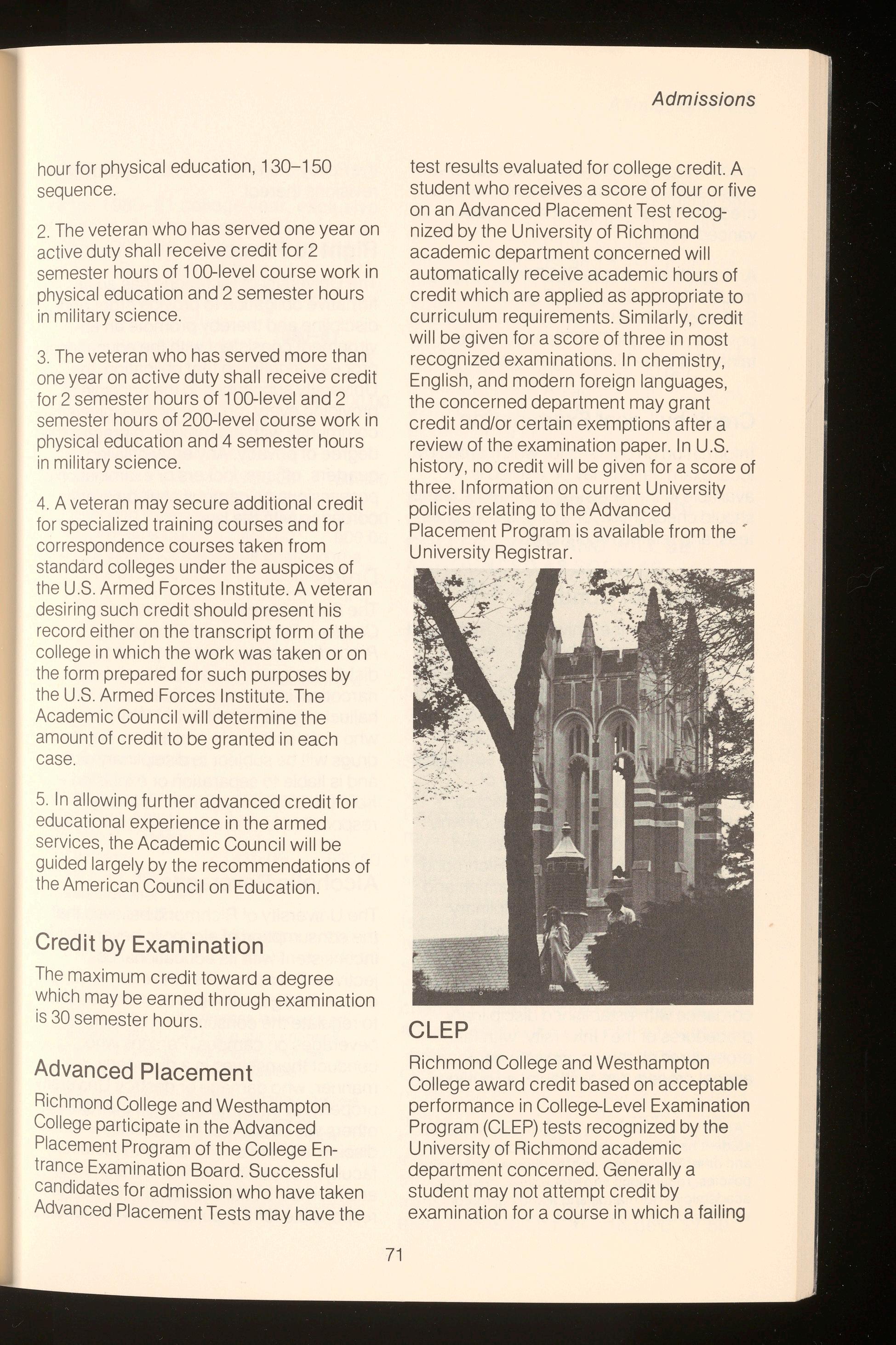
CLEP
Richmond College and Westhampton College award credit based on acceptable performance in College-Level Examination Program (CLEP) tests recognized by the University of Richmond academic department concerned. Generally a student may not attempt credit by examination for a course in which a failing
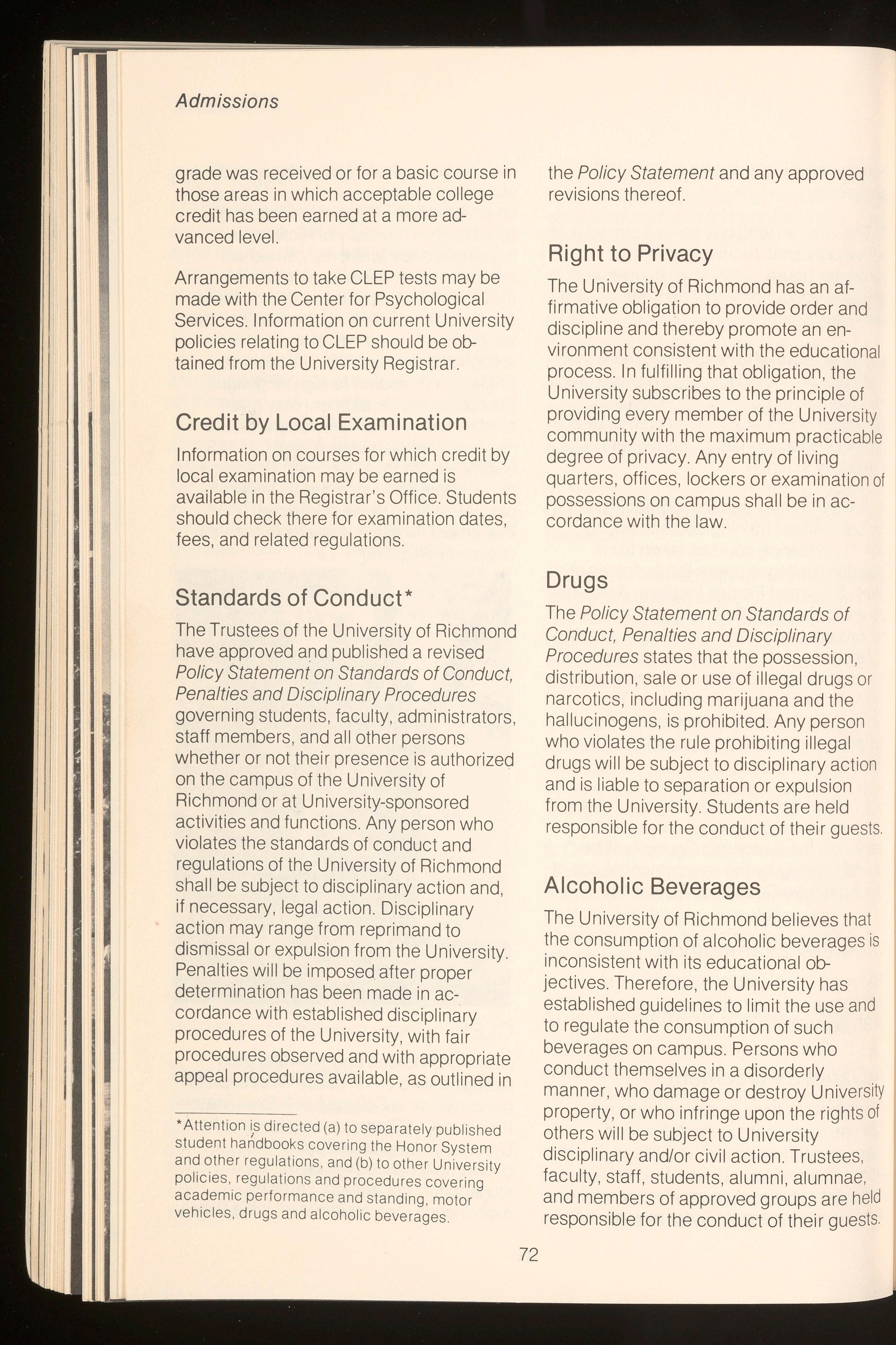
grade was received or for a basic course in those areas in which acceptable college credit has been earned at a more advanced level.
Arrangements to take CLEP tests may be made with the Center for Psychological Services. Information on current University policies relating to CLEP should be obtained from the University Registrar.
Credit by Local Examination
Information on courses for which credit by local examination may be earned is available in the Registrar's Office. Students should check there for examination dates, fees, and related regulations.
Standardsof Conduct*
The Trustees of the University of Richmond have approved and published a revised Policy Statementon Standardsof Conduct, Penaltiesand Disciplinary Procedures governing students, faculty, administrators, staff members, and all other persons whether or not their presence is authorized on the campus of the University of Richmond or at University-sponsored activities and functions. Any person who violates the standards of conduct and regulations of the University of Richmond shall be subject to disciplinary action and , if necessary, legal action. Disciplinary action may range from reprimand to dismissal or expulsion from the University. Penalties will be imposed after proper determination has been made in accordance with established disciplinary procedures of the University, with fair procedures observed and with appropriate appeal procedures available, as outlined in
* Attention i_sdirected (a) to separately published student handbooks covering the Honor System and other regulations, and (b) to other University policies, regulations and procedures covering academic performance and standing, motor vehicles, drugs and alcoholic beverages
the Policy Statement and any approved revisions thereof.
Right to Privacy
The University of Richmond has an affirmative obligation to provide order and discipline and thereby promote an environment consistent with the educational process. In fulfilling that obligation, the University subscribes to the principle of providing every member of the University community with the maximum practicable degree of privacy. Any entry of living quarters, offices, lockers or examination of possessions on campus shall be in accordance with the law.
Drugs
The Policy Statement on Standards of Conduct, Penalties and Disciplinary Procedures states that the possession , distribution, sale or use of illegal drugs or narcotics, including marijuana and the hallucinogens , is prohibited. Any person who violates the rule prohibiting illegal drugs will be subject to disciplinary action and is liable to separation or expulsion from the University. Students are held responsible for the conduct of their guests
Alcoholic Beverages
The University of Richmond believes that the consumption of alcoho lic beverages is inconsistent with its educational objectives Therefore , the University has established guidelines to limit the use and to regulate the consumption of such beverages on campus. Persons who conduct themselves in a disorderly manner, who damage or destroy University property, or who infringe upon the rights of others will be subject to University disciplinary and/or civil action. Trustees , facu lty, staff, students, alumni, a lumnae, and members of approved groups are held responsible for the conduct of their guests

Admissions/ Fees
FEES
For the 1980-81 college year , exclusive of specia l charges, fees 1 for Richmond College (RC), The E. Claiborne Robins School of Business (RSB), and Westhampton College (WC) are as follows:
1980-81 Semester Year
General Fee (12 to 19 hrs. per sem.) ..... $2,050.00 $4 , 100.00
Residence Halls (double occupancy, per studen t):
Air-conditioned rooms.
Non-air-conditioned rooms
Lora Robins Court. 450.00
Note All s in gle rooms will be charged at a rate $150.00 above the double room rate for that dormitory. All triples and quads wi ll be charged $25.00 per student less than the double room rate for that dormitory
Note: Information about a student accident and sickness insurance policy is available through the University Services Office
19 Meal Plan Mon. thru Fri. 3 meals per day ; Sat. and Sun.
Brunch and Dinner
14 Meal Plan Any of the above 19 Meal Plc:nmeals.
10 Meal Plan Any 1O meals between Mon Breakfast and Fri. Dinner.
Medical Fee2
'The University reserves the right to increase the fees listed herein and the charges for room and board if conditions should make such changes necessary or advisable. The changes will be announced as far in advance as feasib le.
'All single students not residi ng with their families or in a residence hall will be charged a $30 Medical Fee and will rece iv e the same medical attention and infirmary privileges as residence hall students. Students not regularly ea tin g in the Re_fectorywill be charged for meals while in the infirmary Services of the University physician will be available only in the infirmary.
These fees are for full-time students taking from 12 to 19 hours inclusive per semester and are payable at the Bursar's Office , one-half on the first Monday in August and one-half on the first Monday in December. Students entering for the second semester pay one-half of the regular charges Parttime students taking less than 12 hours will pay at the rate of $205.00 per semester hour . An additional charge of $205.00 will be made for each hour in excess of 19 hours carried in any semester.
FEES AND CHARGES WILL IN-
CREASE FOR THE 1981-82 COLLEGE YEAR AND WILL BE ANNOUNCED AS SOON AS POSSIBLE.
Meal Plans
The University offers three meal plans to students. Participation in one of the meal plan s is required for residence hall students.
Selection of Meal Plan
When you se lect a room during the Random Room Selection Process , you must also select the meal plan in which you wish to participate for the year. If a selection is not made , the full 19-meal board plan will be billed. The plan which is billed must be paid in full. During the two week Drop/Add period each term , students eligible to participate in optional meal plans will be allowed one change to their original selection. All adjustments in the cost of the board plan se lected will be done at the time of the change and a refund check will be requested for any overpayment resulting from a change in plan. Payment of any increase in cost resulting from a change in meal plans will be due at the time of the change The ID/Meal Card is nontransferable. If the ID/Meal Card is lost, there is a replacement charge of $7.50.
Admissions/Fee s
Plan Type
A. 19-Meal Plan -All freshman and sophomore students residing in the residence halls are required to participate in this plan. T his meal plan is also optional for juniors , seniors , law , and graduate students . Meal service for this plan includes three meals per day Monday through Friday: Saturday and Sunday service will be brunch and dinner.
Cost per semester. $435
Cost per year . . . . . . . . . $870
B. 14-Meal Plan -Optional meal plan selection for rising juniors , seniors , law , and graduate students Service includes any of the above 14 meals per week as described in the 19-Meal Plan
Cost per semester . . . . . . . . $415
Cost per year . . . $830
C 10-Meal Plan -Optional meal plan selection for rising juniors , seniors , law , and graduate students. Service includes any 10 meals between Monday breakfast and Friday dinner.
Cost per semester. .
Cost per year .
. $395
. $790
The identification of rising juniors and seniors will be based on the Fall Rank and Rating of the college year . If a student does not achieve junior status by the Fall session , an optional meal plan will not be authorized. Therefore , each student must evaluate his or her status before selecting a meal plan.
All meal plans are based and budgeted on the undergraduate calendar Meals will be served within the time frame of the undergraduate academic schedule .
Special Charges
Individual instruction in applied music, each (non-majors only) $250 Practice room for piano , organ , each (non-majors only). 15
Practice room for other instruments, voice , each (nonmajors only) . 1O
Fee for special examination , each .... . . .. 10
Fee for late registration (payable before matriculation) . . . 25
Fee for late payment . . . 25
Fee for changing room 1O
Fee for campus automobile permit per student , per year .1 • 20
Fee for each class change after registration period (adding or dropping class or section) . . . . 10
Fees are payable in advance by the semester , remittance being made by check drawn to University of Richmond . To avoid delay in matriculating , parents and students are urged to pay fees before the opening of the semester.
Students are not fully matriculated for either semester until satisfactory arrangements have been made for the fees for that semester and their full course of study and schedule of classes have been finally approved Students who fail to complete registration for the first semester by the close of business on the day before the first day of classe s will be charged a late registration fee of $25. Students who fail to make satisfactory arrangements for their first semester fees by the close of business on the day before the first day of classe s will be charged a late payment fee of $25 . Continuing students who fail to
' A ll automobiles, moto rcycles, a nd m o t o rb ikes ope rate d on t he ca mpus mu st be re gi ster ed with the Un ive rs ity. Stud ents mu st pay a Campu s Automobil e Pe rmit Fe e and mu st abide by the reg u lation s gov e rning the regi stration , use and park ing of th ese ve hicles. Student s residing offca mpus m ay obtain a permit to op e rate a motor ve hicle o n t he c ampu s upon payment of the appr opri a t e fe e. Campu s resident s who are sophomo res, junior s, or senior s may have and operate motor vehicles on the campus. Residenc e ha ll fre s hmen may have cars on the campus if spa ce permit s. Inquiries should be directed to th e d e an of the Coll e ge involved
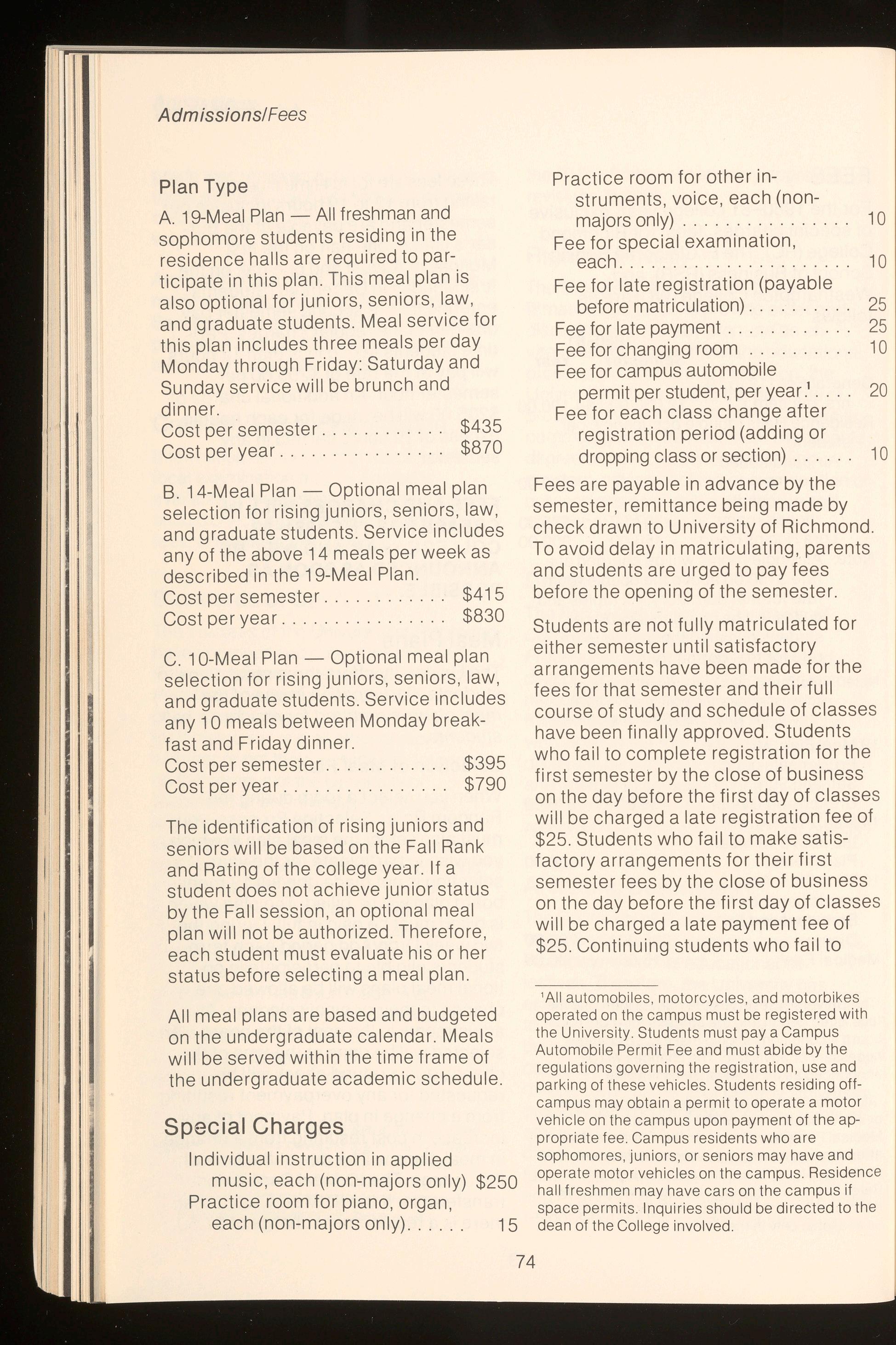
c omplete registration for the second semester by the close of business on t he registration day specified for students continuing in the spring, and new and re-admitted students who fail to c omplete registration for the second semester by the close of business on the day before the first day of classes will be charged a late registration fee of $25. All students who fail to make satisfactory arrangements for their second semester fees by the close of business on the day before the first day of classes will be charged a late payment fee of $25.
Advance Payments
In all divisions, $125 of the general fee must be paid in advance by all students. Current students must make this payment before preregistration in April 1980 f o r the fall semester New students must make this advance payment upon acceptance for admission . This payment will be credited on the first semester account of the student , but is not refundable if the student fails to matriculate.
Deferred Payments
The University does not offer a deferred payment plan; all accounts must be paid in full each semester as indicated earlier i n this section. However, in recognition of the substantial interest in deferred payments , we have arranged to make available the services of The Tuition Plan, Inc , one of several sound alternatives for financing a student's education. Many parents and students may prefer to arrange financing through their local banks or other sources , but those interested in The Tuition Plan , Inc. may get further information from the Bursar's Office upon request. There will be a mailing to all parents and students in June concerning this plan. Please
Admissions/Fees
complete whatever arrangements you choose early so that your account with the University may be settled in a timely manner.
No diploma is granted or credit given for the session ' s work until all charges have been satisfactorily settled. Failure to make a satisfactory financial arrangement will bar a student from taking final examinations
Refund Policy
Students are matriculated by semester. If a student withdraws or is dropped from the University for whatever cause , a refund of fees shall be made in accordance with the following schedule:
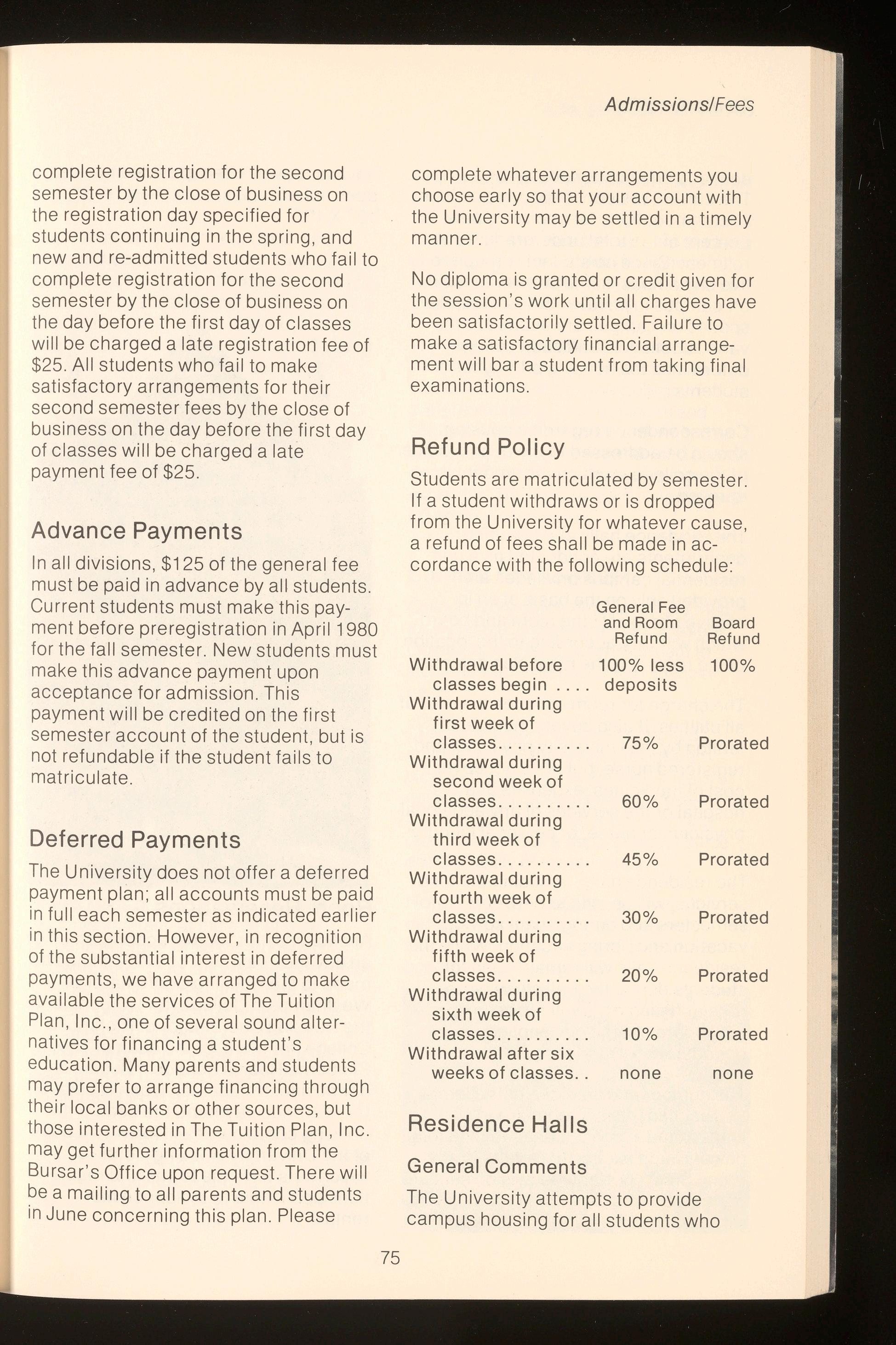
Withdrawal before classes begin Withdrawal during first week of classes .. . .... Withdrawal during second week of classes .... ... . .. Withdrawal during third week of classes . . .....
Withdrawal during fourth week of classes ... .....
Withdrawal during fifth week of classes . .. ...
Withdrawal during sixth week of classes . Withdrawal after six weeks of classes .
Residence Halls
General Comments
General Fee and Room Board Refund Refund 100% less 100% deposits
75% Prorated
60% Prorated
45% Prorated
30% Prorated
20% Prorated
10% Prorated
none none
The University attempts to provide campus housing for all students who
Admissions/Fees
desire to be accommodated on campus. The current resident capacity provides accommodations for approximately 80 percent of the total undergraduate enrollment. Since no student is required to live on campus , some choose to reside off campus in private homes. Housing spaces on campus are allotted to the various colleges , and each college determines the housing priority for its students.
Correspondence regarding housing should be addressed to the dean's office of the college in which the student is enrolled.
The residence halls and boarding departments are conducted as a unit; residential campus privileges are provided only on the basis of an inclusive charge for the room and board which will vary according to the location of the room and the meal plan selected.
The charge for room includes the cost of all utilities. It also covers medical attention by the University physician and registered nurse , but does not cover cost of medicines, expenses at a hospital or the services of any additional physician or nurse , or personal laundry.
The residence halls , including the food services , will be closed between semesters and during Thanksgiving vacation and Spring vacation. While the residence halls will remain open for students during the Fall study period, regular dining halls will not be in operation (board charge does not cover these periods).
The number and type of electric lamps and appliances in a room are to be limited , and in no instance may the total power rating exceed 650 watts in any room. Small, portable television sets are permitted in residence hall rooms. Small refrigerators approved by the resident
advisor may be used provided the size does not exceed approximately 18" X 18"X18".

Room Reservations
Applications for rooms , accompanied by an advance payment of $125, should be made to the Housing Coordinator of Westhampton College (for women) , or to the Housing Coordinator of Richmond College (for men) , or the dean of The E. Claiborne Robins School of Business (for business students). Upon receipt of this advance payment, the dean or the housing coordinator will forward a copy of the University Housing Contract, which sets forth the terms and regu lations applicable to residence hall rentals.
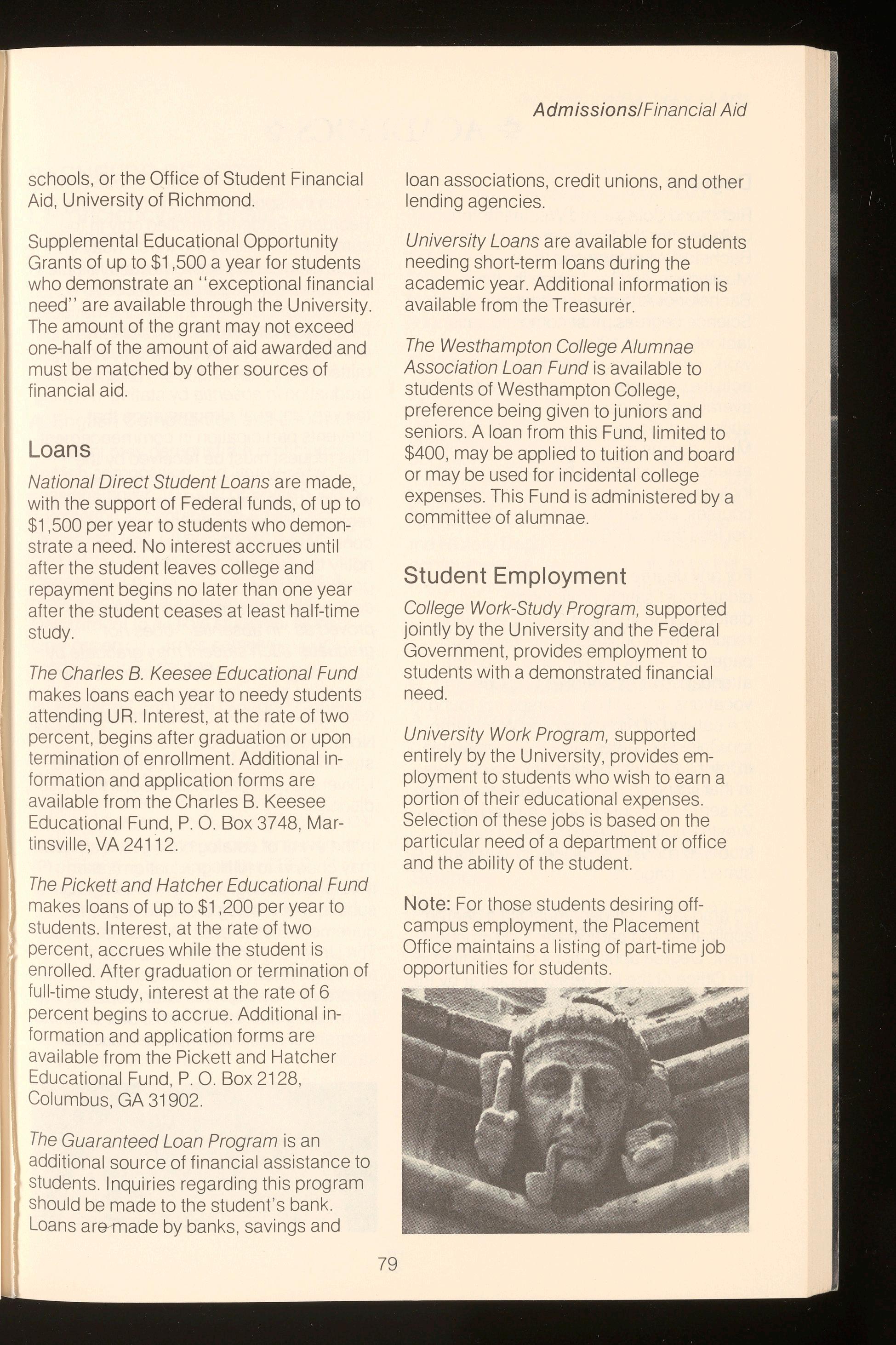
schools, or the Office of Student Financial Aid, University of Richmond.
Supplemental Educational Opportunity Grants of up to $1 ,500 a year for students who demonstrate an "exceptional financial need " are available through the University. The amount of the grant may not exceed one-half of the amount of aid awarded and must be matched by other sources of financial aid
Loans
National Direct Student Loans are made, w ith the support of Federal funds , of up to $ 1 ,500 per year to students who demonstrate a need. No interest accrues until after the student leaves college and repayment begins no later than one year after the student ceases at least half-time study.
The Charles B. Keesee Educational Fund makes loans each year to needy students attending UR. Interest, at the rate of two percent , begins after graduation or upon termination of enrollment. Additional information and application forms are available from the Charles B. Keesee Educational Fund, P. 0. Box 37 48, Mart insville, VA 24112.
The Pickett and Hatcher Educational Fund m akes loans of up to $1 ,200 per year to students. Interest , at the rate of two pe rcent , accrues while the student is enrolled. After graduation or termination of f ull-time study, interest at the rate of 6 pe rcent begins to accrue. Additional info rmation and application forms are available from the Pickett and Hatcher Educational Fund, P. 0 Box 2128 , Columbus , GA 31902.
The Guaranteed Loan Program is an additional source of financial assistance to students. Inquiries regarding this program should be made to the student's bank. Loans are,made by banks, savings and
Admissions/Financial Aid
loan associations , credit unions, and other lending agencies.
University Loans are available for students needing short-term loans during the academic year. Additional information is available from the Treasurer.
The Westhampton College Alumnae Association Loan Fund is available to students of Westhampton College, preference being given to juniors and seniors. A loan from this Fund, limited to $400, may be applied to tuition and board or may be used for incidental college expenses. This Fund is administered by a committee of alumnae.
Student Employment
College Work-Study Program , supported jointly by the University and the Federal Government, provides employment to students with a demonstrated financial need.
University Work Program, supported entirely by the University , provides employment to students who wish to earn a portion of their educational expenses Selection of these jobs is based on the particular need of a department or office and the ability of the student.
Note: For those students desiring offcampus employment , the Placement Office maintains a listing of part-time job opportunities for students.
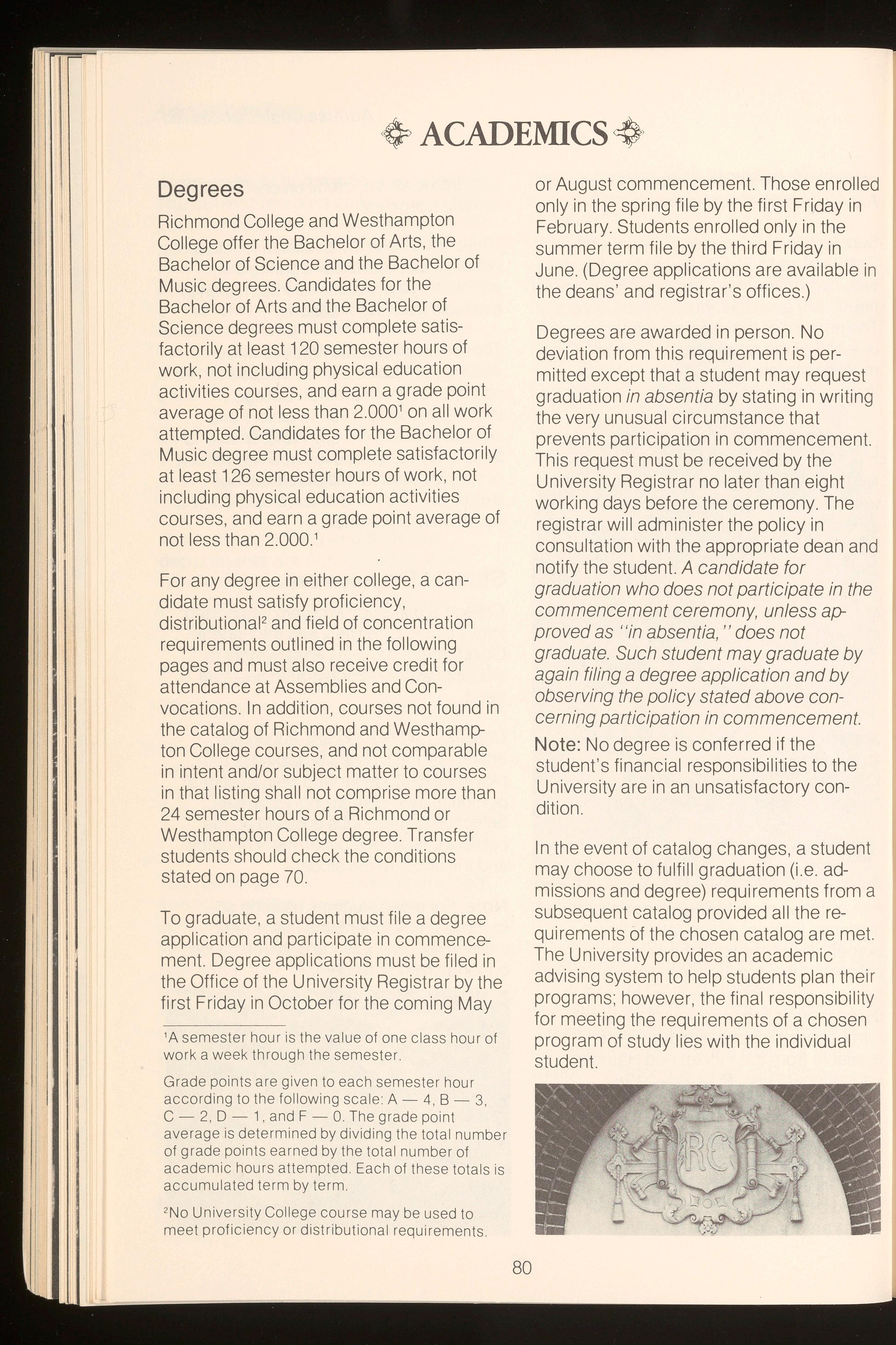
ACADEMICS4 ·
Degrees
Richmond College and Westhampton College offer the Bachelor of Arts, the Bachelor of Science and the Bachelor of Music degrees. Candidates for the Bachelor of Arts and the Bachelor of Science degrees must complete satisfactorily at least 120 semester hours of work, not including physical education activities courses, and earn a grade point average of not less than 2.000 1 on all work attempted. Candidates for the Bachelor of Music degree must complete satisfactorily at least 126 semester hours of work, not including physical education activities courses, and earn a grade point average of not less than 2.000. 1
For any degree in either college, a candidate must satisfy proficiency , distributional 2 and field of concentration requirements outlined in the following pages and must also receive credit for attendance at Assemblies and Convocations. In addition, courses not found in the catalog of Richmond and Westhampton College courses, and not comparable in intent and/or subject matter to courses in that listing shall not comprise more than 24 semester hours of a Richmond or Westhampton College degree. Transfer students should check the conditions stated on page 70.
To graduate, a student must file a degree application and participate in commencement. Degree applications must be filed in the Office of the University Registrar by the first Friday in October for the coming May
1 A semester hour is the value of one class hour of work a week through the semester
Grade points are given to each semester hour according to the following scale : A - 4 , B - 3 , C -2, D - 1 , and F -0 The grade point average is determined by dividing the total number of grade points earned by the total number of academic hours attempted. Each of these totals is accumulated term by term.
' No University College course may be used to meet proficiency or distributional requirements
or August commencement. Those enrolled only in the spring file by the first Friday in February. Students enrolled only in the summer term file by the third Friday in June. (Degree applications are available in the deans' and registrar's offices.)
Degrees are awarded in person. No deviation from this requirement is permitted except that a student may request graduation in absentia by stating in writing the very unusual circumstance that prevents participation in commencement. This request must be received by the University Registrar no later than eight working days before the ceremony. The registrar will administer the policy in consultation with the appropriate dean and notify the student. A candidate for graduation who does not participate in the commencement ceremony, unless approved as "in absentia, "does not graduate. Such student may graduate by again filing a degree application and by observing the policy stated above concerning participation in commencement.
Note: No degree is conferred if the student's financial responsibilities to the University are in an unsatisfactory condition.
In the event of catalog changes, a student may choose to fulfill graduation (i.e. admissions and degree) requirements from a subsequent catalog provided all the requirements of the chosen catalog are met . The University provides an academic advising system to help students plan their programs; however, the final responsibility for meeting the requirements of a chosen program of study lies with the individual student.

Academics/Bachelor of Arts
BACHELOR OF ARTS
I. Proficiency and Basic Knowledge
Courses to satisfy these requirements may not be used to meet the Distributional Requirements for the degree. Proficiency requirements are normally met in the freshman year and should not be postponed beyond the sophomore year.
A. English Composition and Literature
A student may demonstrate proficiency in English composition and literature by: (1) passing English 101-102 or English 103 or completing acceptably the Advanced Placement test, (2) presenting a score on the CEEB tests acceptable to the Department of English, or (3) passing a proficiency test administered by the Department to eligible students. Note: Only option (1) carries semester hours credit toward a degree.
B. Foreign Language (Second College Year)
In Richmond College and Westhampton College a student may demonstrate proficiency in a modern foreign language or in an ancient language by: (1) passing the 104 level of one language, or (2) presenting a score on the CEEB Language Achievement Test acceptable to the language faculty concerned, or (3) making an acceptable score on a departmental placement test. Note: Only option (1) carries semester hours credit toward a degree. Performance on Advanced Placement tests will be evaluated to determine the level of proficiency achieved.
C. Mathematical Sciences
In Richmond College and Westhampton College a student may demonstrate proficiency by: (1) passing Mathematics 252 or passing 6 semester hours in mathematics selected from courses 101,
102, 104, 151, 229, 251 and 252 or completing acceptably the Advanced Placement test, or (2) presenting a score on the CEEB Mathematics Achievement Test (Level I or 11),acceptable to the Department of Mathematical Sciences. Note: Only option (1) carries semester hours credit toward a degree.
D. Western Civilization
In Richmond College and Westhampton College a student may demonstrate proficiency by: (1) passing History 105-106 or History 115-116 or completing acceptably the Advanced Placement test, (2) presenting a score on the CEEB European History Achievement Test acceptable to the History Department, or (3) passing a comprehensive examination given by the History Department and taken during the student's freshman or sophomore year. Note: Only option (1) carries semester hours credit toward a degree.
II. Distributional Requirements
A. Division I (Social Sciences)
Economics, education, political science, psychology, sociology, military science. Six semester hours in courses other than military science.
B. Division II (Natural and Mathematical Sciences)
Biology, chemistry, physics, mathematical sciences. Eight semester hours in a natural science.
C. Division Ill (Humanities
A)
Art, history, journalism, music, philosophy, religion, speech communication and theatre arts, Classics 301-303 (see "Classics in English"). Six semester hours. This distributional requirement may not be satisfied by taking any courses in artstudio, History-100 level, journalism, music-applied (individual instruction), music-ensembles, or Theatre Arts-332 Practicum.
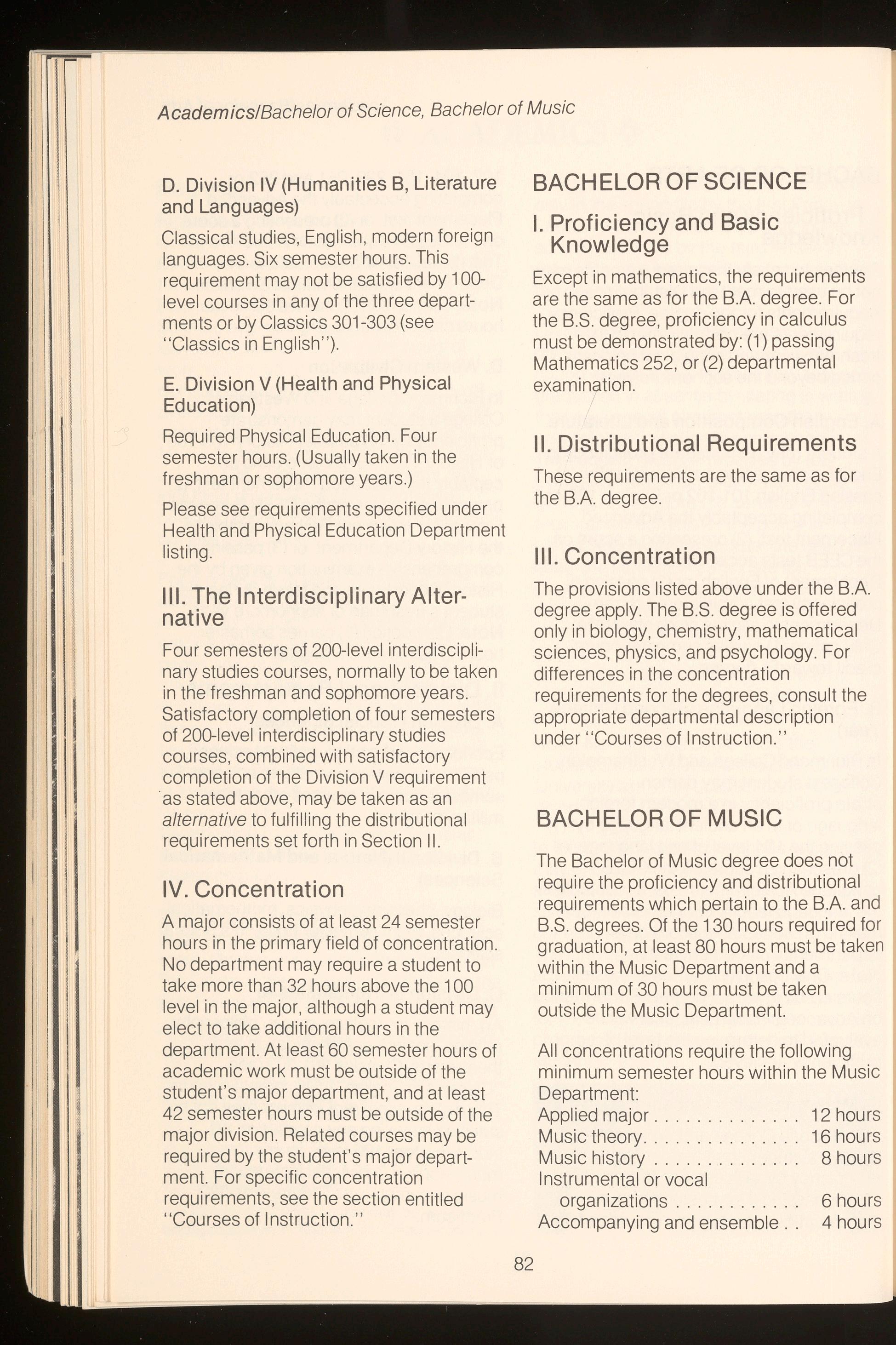
Academics/Bachelor of Science , Bachelor of Music
D. DivisionIV (Humanities B, Literature and Languages)
Classical studies , English, modern foreign languages. Six semester hours This requirement may not be satisfied by 100level courses in any of the three departments or by Classics 301-303 (see " Classics in English " )
E. DivisionV (Health and Physical Education)
Required Physical Education Four semester hours. (Usually taken in the freshman or sophomore years .)
Please see requirements specified under Health and Physical Education Department listing .
Ill. The Interdisciplinary Alternative
Four semesters of 200-level interdisciplinary studies courses , normally to be taken in the freshman and sophomore years. Satisfactory completion of four semesters of 200-level interdisciplinary studies courses, combined with satisfactory completion of the Division V requirement as stated above , may be taken as an alternative to fulfilling the distributional requirements set forth in Section II.
IV. Concentration
A major consists of at least 24 semester hours in the primary field of concentration . No department may require a student to take more than 32 hours above the 100 level in the major , although a student may elect to take additional hours in the department. At least 60 semester hours of academic work must be outside of the student's major department , and at least 42 semester hours must be outside of the major division. Related courses may be required by the student 's major department. For specific concentration requirements , see the section entitled " Courses of Instruction. "
BACHELOR OF SCIENCE
I. Proficiency and Basic Knowledge
Except in mathematics, the requirements are the same as for the BA degree. For the B S degree, proficiency in calculus must be demonstrated by : (1) passing Mathematics 252 , or (2) departmental examination.
II. Distributional Requirements
These requirements are the same as for the BA degree
Ill. Concentration
The provisions listed above under the BA degree apply The B.S. degree is offered only in biology , chemistry, mathematical sciences, physics , and psychology . For differences in the concentration requirements for the degrees, consult the appropriate departmental description under " Courses of Instruction ."
BACHELOR OF MUSIC
The Bachelor of Music degree does not require the proficiency and distributional requirements which pertain to the BA and B.S. degrees. Of the 130 hours required for graduation , at least 80 hours must be taken within the Music Department and a minimum of 30 hours must be taken outside the Music Department.
All concentrations require the following minimum semester hours within the Music Department: Applied major .. . . . . . . Music theory . . ... Music history ... . .. . .... . . . Instrumenta l or vocal 12 hours 16 hours 8 hours organizations . . . . 6 hours Accompanying and ensemble . . 4 hours
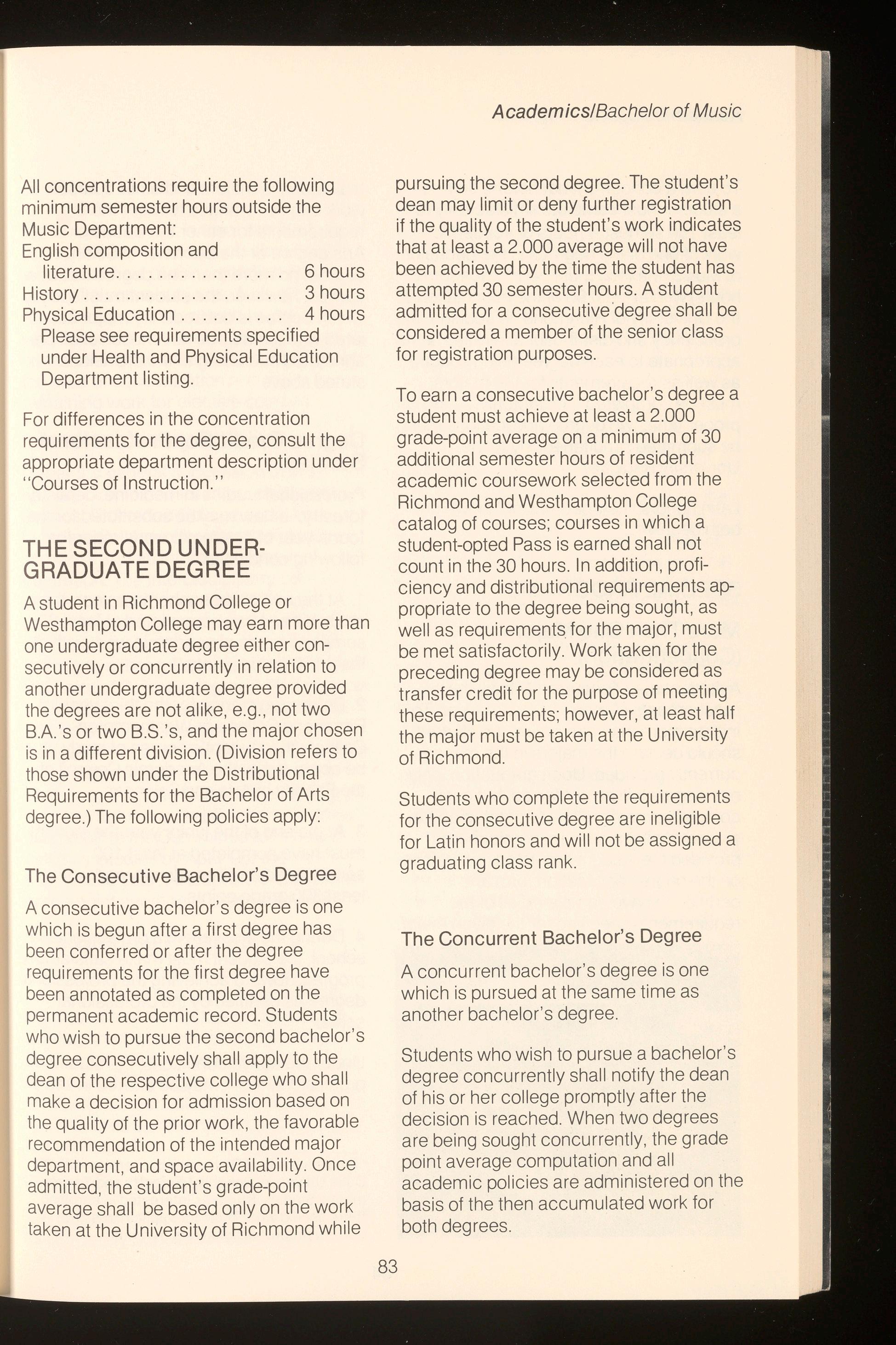
All concentrations require the following minimum semester hours outside the Music Department:
English composition and literature. . . . . . 6 hours
History. . . . . . 3 hours
Physical Education . . . . . . . . 4 hours
Please see requirements specified under Health and Physical Education Department listing.
For differences in the concentration requirements for the degree, consult the appropriate department description under " Courses of Instruction. "
THE SECOND UNDERGRADUATE DEGREE
A student in Richmond College or Westhampton College may earn more than one undergraduate degree either consecutively or concurrently in relation to another undergraduate degree provided the degrees are not alike , e.g., not two BA 's or two B S 's , and the major chosen is in a different division (Division refers to those shown under the Distributional Requirements for the Bachelor of Arts degree.) The following policies apply:
The Consecutive Bachelor's Degree
A c onsecutive bachelor ' s degree is one w hich is begun after a first degree has been conferred or after the degree requirements for the first degree have bee n annotated as completed on the permanent academic record. Students w ho wish to pursue the second bachelor ' s degree consecutively shall apply to the dean of the respective college who shall make a decision for admission based on t he quality of the prior work , the favorable rec ommendation of the intended major department, and space availability. Once admitted , the student's grade-point average shall be based only on the work taken at the University of Richmond while
Academics/Bachelor of Music
pursuing the second degree. The student's dean may limit or deny further registration if the quality of the student's work indicates that at least a 2.000 average will not have been achieved by the time the student has attempted 30 semester hours. A student admitted for a consecutive degree shall be considered a member of the senior class for registration purposes
To earn a consecutive bachelor's degree a student must achieve at least a 2.000 grade-point average on a minimum of 30 additional semester hours of resident academic coursework selected from the Richmond and Westhampton College catalog of courses ; courses in which a student-opted Pass is earned shall not count in the 30 hours. In addition, proficiency and distributional requirements appropriate to the degree being sought, as well as requirements for the major , must be met satisfactorily Work taken for the preceding degree may be considered as transfer credit for the purpose of meeting these requirements; however, at least half the major must be taken at the University of Richmond.
Students who complete the requirements for the consecutive degree are ineligible for Latin honors and will not be assigned a graduating class rank
The Concurrent Bachelor's Degree
A concurrent bachelor ' s degree is one which is pursued at the same time as another bachelor's degree.
Students who wish to pursue a bachelor ' s degree concurrently shall notify the dean of his or her college promptly after the decision is reached When two degrees are being sought concurrently , the grade point average computation and all academic policies are administered on the basis of the then accumulated work for both degrees .
To earn a concurrent bachelor's degree a student must complete satisfactorily at least 150 semester hours of academic work (if one of the degrees is the Bachelor of Music , the total must be 156 academic hours) with at least 90 of the hours taken at the University of Richmond. In addition , the proficiency and distributional requirements appropriate to each degree being sought , as well as requirements for the majors , must be completed satisfactorily At the proper time , two degree applications must be submitted simultaneously to the University Registrar.
Latin honors , if earned, will be shown on both degrees.
SPECIAL PROGRAMS
More Than One Major (Concentration)
A student may concurrently fulfill the requirements of more than one major To initiate more than one major , the student should declare the majors in the manner currently provided . Upon graduation , only one degree will be conferred, but each completed major will be annotated on the student's permanent academic record provided the student has listed the major on the degree application form and is certified to have completed all of the requirements specified for the given major .
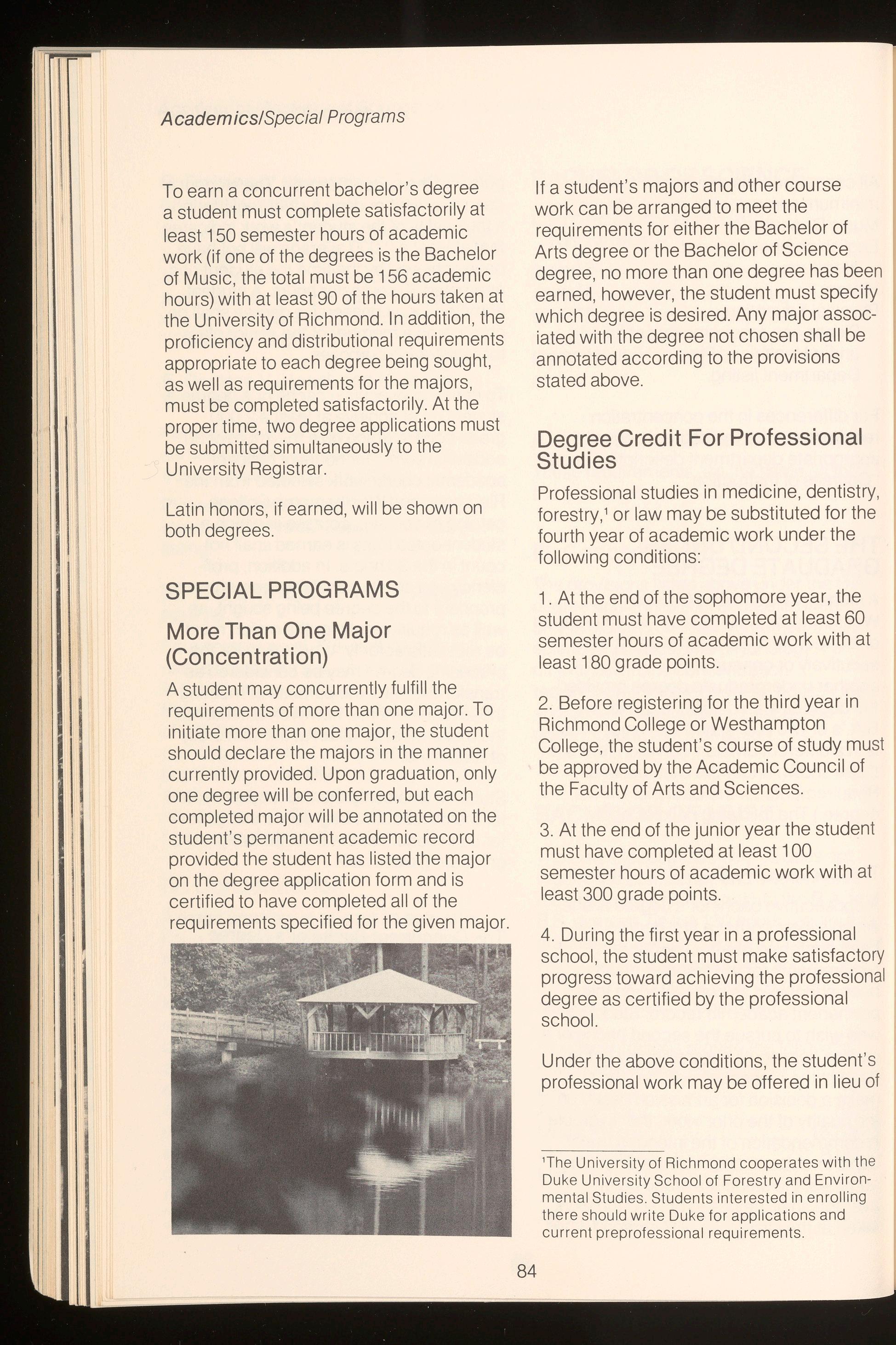
If a student's majors and other course work can be arranged to meet the requirements for either the Bachelor of Arts degree or the Bachelor of Science degree , no more than one degree has been earned , however , the student must specify which degree is desired. Any major associated with the degree not chosen shall be annotated according to the provisions stated above
Degree Credit For Professional Studies
Professional studies in medicine, dentistry , forestry , 1 or law may be substituted for the fourth year of academic work under the following conditions:
1 . At the end of the sophomore year , the student must have completed at least 60 semester hours of academic work with at least 180 grade points.
2. Before registering for the third year in Richmond College or Westhampton College, the student's course of study mu st be approved by the Academic Council of the Faculty of Arts and Sciences
3 . At the end of the junior year the studen t must have completed at least 100 semester hours of academic work with at least 300 grade points.
4. During the first year in a professional school , the student must make satisfacto ry progress toward achieving the profession al degree as certified by the professional school.
Under the above conditions , the student 's professional work may be offered in lieu of
' The Unive rsity of Richmond coop e rat es with the Duke Univer sity School of Fore stry and Environment a l Studi es. Student s int e res t ed in enrolling there should w rite Duke for application s and c urrent preprofes s ional requirements
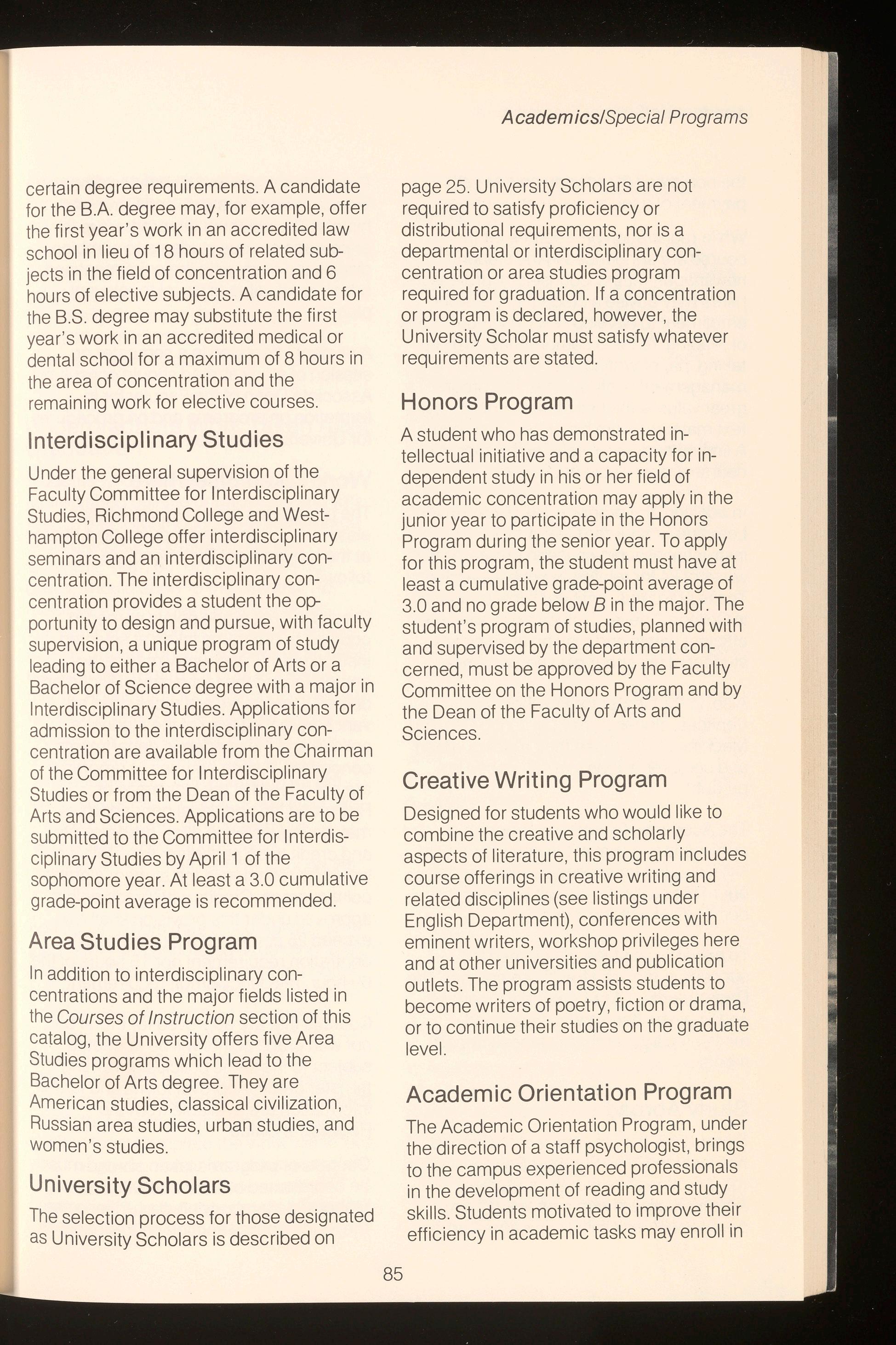
certain degree requirements. A candidate for the BA degree may, for example, offer the first year's work in an accredited law school in lieu of 18 hours of related subjects in the field of concentration and 6 hours of elective subjects. A candidate for the B.S. degree may substitute the first year's work in an accredited medical or dental school for a maximum of 8 hours in the area of concentration and the remaining work for elective courses.
InterdisciplinaryStudies
Under the general supervision of the Faculty Committee for Interdisciplinary Studies, Richmond College and Westhampton College offer interdisciplinary seminars and an interdisciplinary concentration The interdisciplinary concentration provides a student the opportunity to design and pursue, with faculty supervision, a unique program of study leading to either a Bachelor of Arts or a Bachelor of Science degree with a major in Interdisciplinary Studies. Applications for admission to the interdisciplinary concentration are available from the Chairman of the Committee for Interdisciplinary Studies or from the Dean of the Faculty of Arts and Sciences. Applications are to be submitted to the Committee for Interdisciplinary Studies by April 1 of the sophomore year. At least a 3.0 cumulative grade-point average is recommended.
Area Studies Program
In addition to interdisciplinary concentrations and the major fields listed in the Courses of Instruction section of this catalog, the University offers five Area Studies programs which lead to the Bachelor of Arts degree. They are American studies, classical civilization, Russian area studies, urban studies, and women's studies.
UniversityScholars
The selection process for those designated as University Scholars is described on
Academics/Special Programs
page 25. University Scholars are not required to satisfy proficiency or distributional requirements, nor is a departmental or interdisciplinary concentration or area studies program required for graduation. If a concentration or program is declared, however, the University Scholar must satisfy whatever requirements are stated.
Honors Program
A student who has demonstrated intellectual initiative and a capacity for independent study in his or her field of academic concentration may apply in the junior year to participate in the Honors Program during the senior year. To apply for this program, the student must have at least a cumulative grade-point average of 3.0 and no grade below B in the major. The student's program of studies, planned with and supervised by the department concerned, must be approved by the Faculty Committee on the Honors Program and by the Dean of the Faculty of Arts and Sciences.
Creative Writing Program
Designed for students who would like to combine the creative and scholarly aspects of literature, this program includes course offerings in creative writing and related disciplines (see listings under English Department), conferences with eminent writers, workshop privileges here and at other universities and publication outlets. The program assists students to become writers of poetry, fiction or drama, or to continue their studies on the graduate level.
Academic Orientation Program
The Academic Orientation Program, under the direction of a staff psychologist, brings to the campus experienced professionals in the development of reading and study skills. Students motivated to improve their efficiency in academic tasks may enroll in
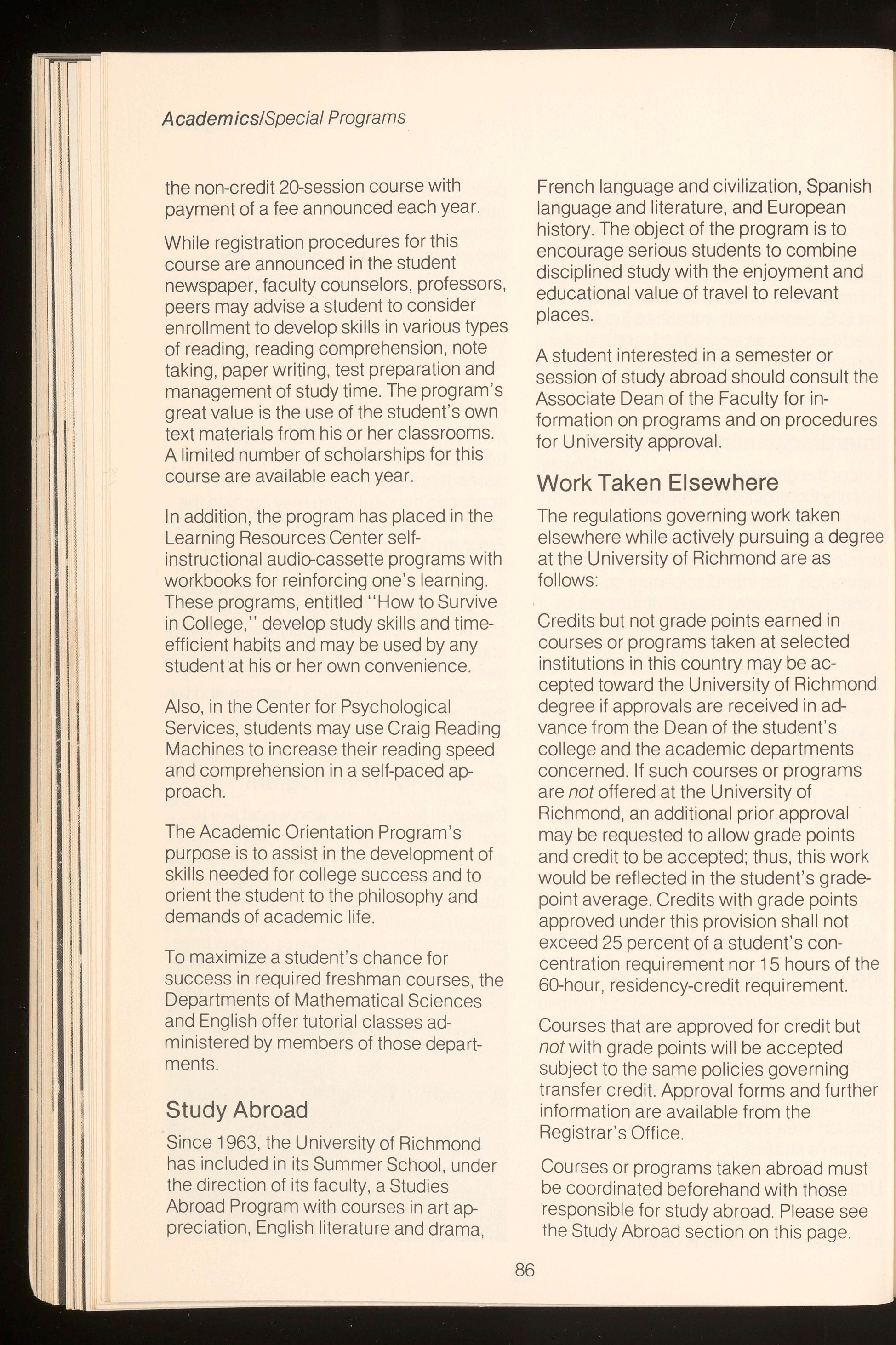
the non-credit 20-session course with payment of a fee announced each year.
While registration procedures for this course are announced in the student newspaper, faculty counselors, professors , peers may advise a student to consider enrollment to develop skills in various types of reading , reading comprehension, note taking , paper writing, test preparation and management of study time The program ' s great value is the use of the student's own text materials from his or her classrooms. A limited number of scholarships for this course are available each year
In addition, the program has placed in the Learning Resources Center selfinstructional audio-cassette programs with workbooks for reinforcing one's learning. These programs, entitled "How to Survive in College ," develop study skills and timeefficient habits and may be used by any student at his or her own convenience
Also, in the Center for Psychological Services , students may use Craig Reading Machines to increase their reading speed and comprehension in a self-paced approach.
The Academic Orientation Program 's purpose is to assist in the development of skills needed for college success and to orient the student to the philosophy and demands of academic life.
To maximize a student's chance for success in required freshman courses, the Departments of Mathematical Sciences and English offer tutorial classes administered by members of those departments
Study Abroad
Since 1963, the University of Richmond has included in its Summer School , under the direction of its faculty , a Studies Abroad Program with courses in art appreciation , English literature and drama ,
French language and civilization, Spanish language and literature, and European history. The object of the program is to encourage serious students to combine disciplined study with the enjoyment and educational value of travel to relevant places
A student interested in a semester or session of study abroad should consult the Associate Dean of the Faculty for information on programs and on procedures for University approval.
Work Taken Elsewhere
The regulations governing work taken elsewhere while actively pursuing a degre e at the University of Richmond are as follows :
Credits but not grade points earned in courses or programs taken at selected institutions in this country may be accepted toward the University of Richmond degree if approvals are received in advance from the Dean of the student's college and the academic departments concerned. If such courses or programs are not offered at the University of Richmond , an additional prior approval may be requested to allow grade points and credit to be accepted; thus, this work would be reflected in the student's gradepoint average. Credits with grade points approved under this provision shall not exceed 25 percent of a student's concentration requirement nor 15 hours of the 60 -hour , residency-credit requirement.
Courses that are approved for credit but not with grade points will be accepted subject to the same policies governing transfer credit. Approval forms and further information are available from the Registrar ' s Office.
Courses or programs taken abroad must be coordinated beforehand wit h those responsible for study abroad. Please see the Study Abroad section on this page
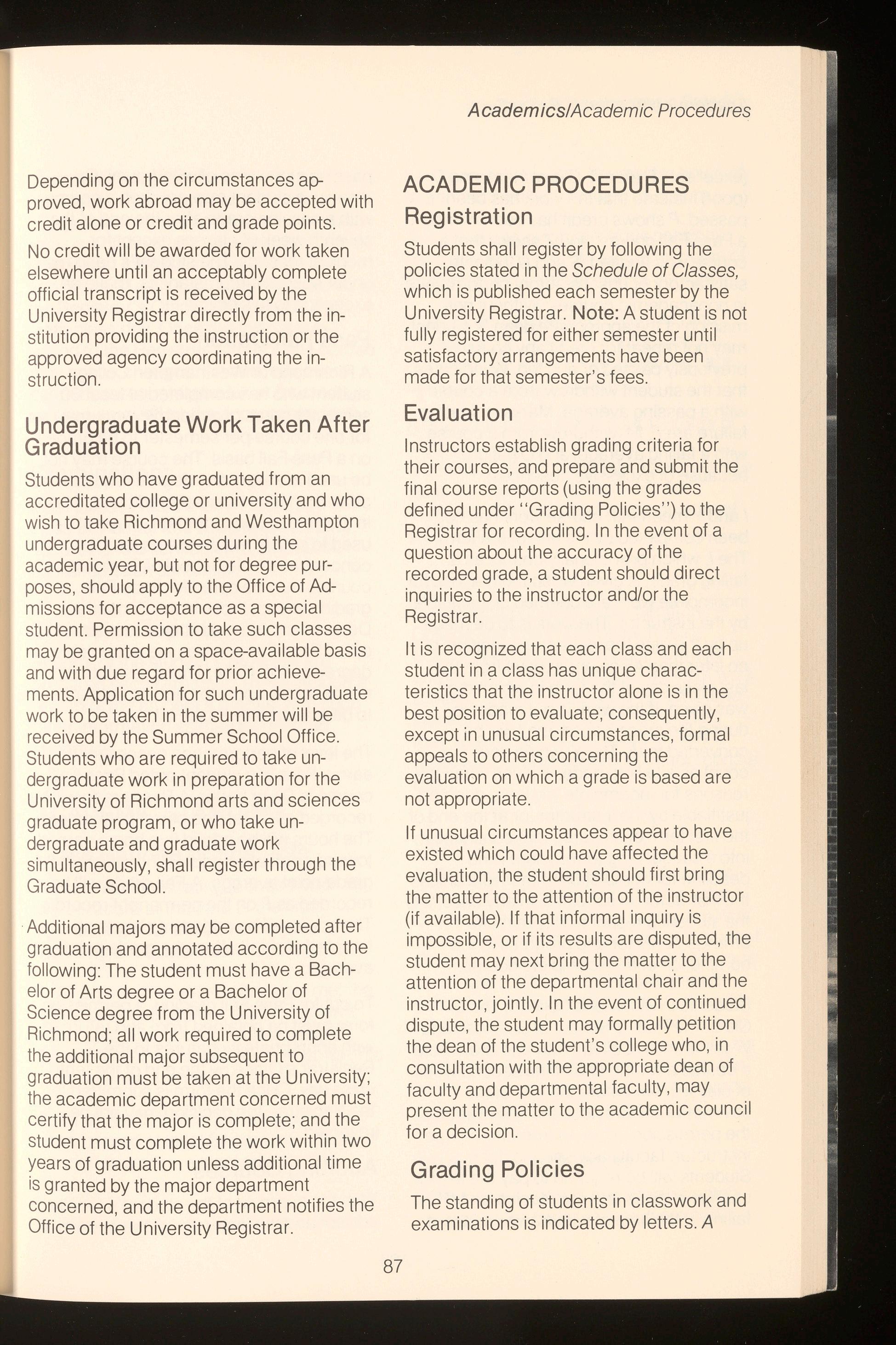
Depending on the circumstances approved , work abroad may be accepted with cre dit alone or credit and grade points . No c redit will be awarded for work taken elsewhere until an acceptably complete offi c ial transcript is received by the University Registrar directly from the inst itution providing the instruction or the approved agency coordinating th e instr uction
Undergraduate Work Taken After Graduation
Students who have graduated from an acc reditated college or university and who wish to ta ke Richmond and Westhampton undergraduate courses during the academic year , but not for degree purposes, should apply to the Office of Adm iss ions for acceptance as a special student. Permission to take such classes may be granted on a space-available bas is and with due regard for prior achievements . Application for such undergraduate wor k to be taken in the summer will be rece ived by the Summer School Offic e. Students who are required to take underg raduate work in preparation for the University of Richmond arts and sciences graduate program , or who take underg raduate and graduate work simultaneously , shall register through the Graduate School.
Additional majors may be completed aft e r graduation and annotated according to the fo llowing : The student must have a Bachelor of Arts degree or a Bachelor of Science degree from the University of Richmond; all work required to complete the additional major subsequent to graduation must be taken at the University ; the academic department concerned must cer tify that the major is complete ; and the student must complete the work within two yea rs of graduation unless additional time is g ranted by the major department co ncerned , and the department notifies the Offi c e of the University Registrar
Academics/Academic Procedure s
ACADEMIC PROCEDURES
Registration
Students shall register by following the policies stated in the Schedule of Classes, which is published each semester by the University Registrar Note:A student is not fully registered for either semester until satisfactory arrangements have been made for that semester's fees
Evaluation
Instructors establish grading criteria for their courses, and prepare and submit the final course reports (using the grades defined under " Grading Policies " ) to the Registrar for recording In the event of a question about the accuracy of the recorded grade , a student should direct inquiries to the instructor and/or the Registrar.
It is recognized that each class and each student in a class has unique characteristics that the instructor alone is in the best position to evaluate ; consequently , ex cept in unusual circumstances , formal appeals to others concerning the evaluation on which a grade is based are not appropriate.
If unusual circumstances appear to have ex isted which could have affected the evaluation , the student should first bring the matter to the attention of the instructor (if available) . If that informal inquiry is impossible , or if its results are disputed, the student may next bring the matter to the attention of the departmental chair and the instructor, jointly. In the event of continued dispute , the student may formally petition the dean of the student ' s college who , in consultation with the appropriate dean of faculty and departmental faculty , may present the matter to the academic council for a decision .
Grading Policies
The standing of students in classwork and examinations is indicated by letters. A
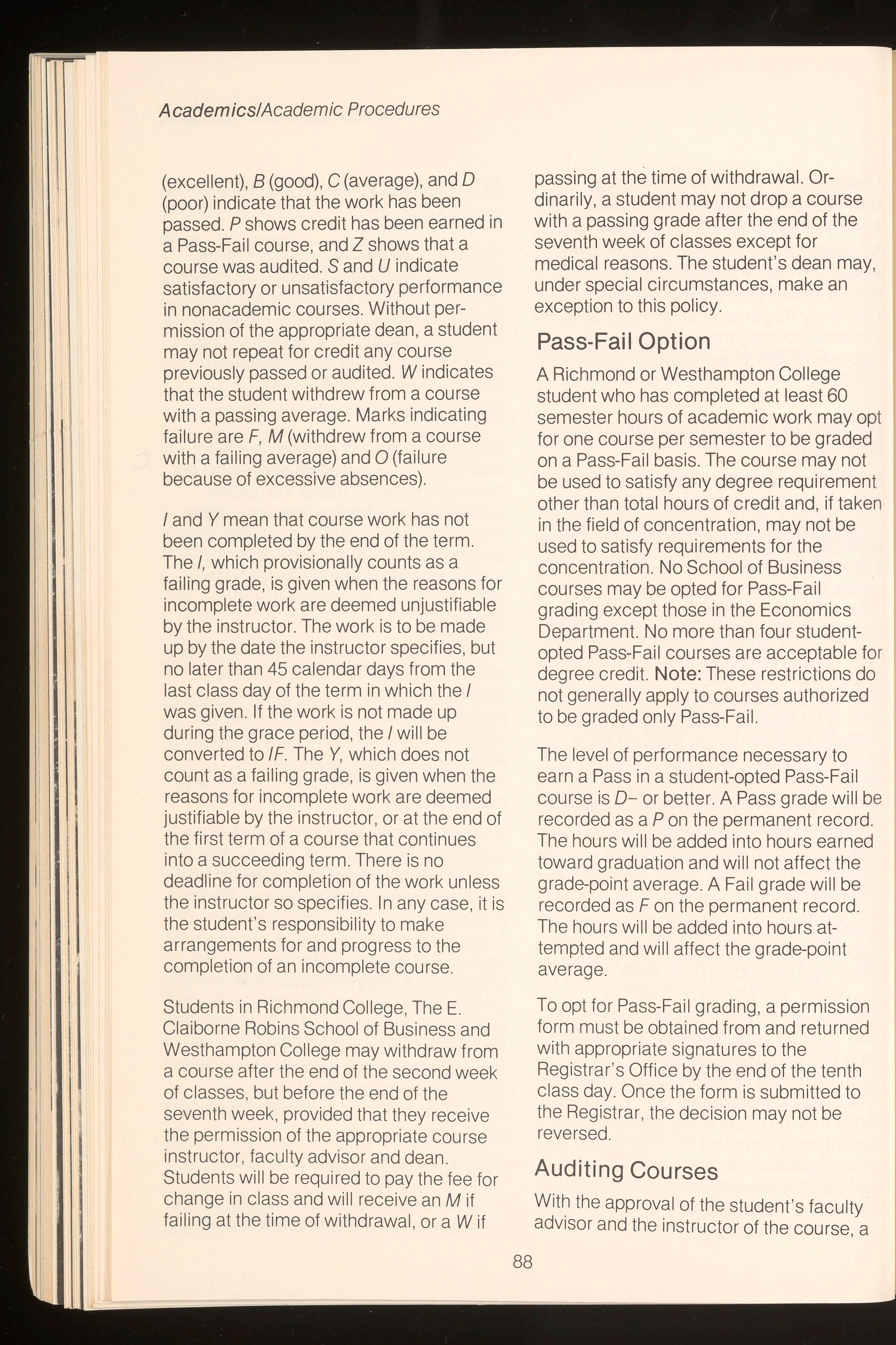
(excellent), B (good), C (average), and D (poor) indicate that the work has been passed. P shows credit has been earned in a Pass-Fail course, and Z shows that a course was audited. Sand U indicate satisfactory or unsatisfactory performance in nonacademic courses. Without permission of the appropriate dean, a student may not repeat for credit any course previously passed or audited. W indicates that the student withdrew from a course with a passing average. Marks indicating failure are F, M (withdrew from a course with a failing average) and O (failure because of excessive absences).
/ and Y mean that course work has not been completed by the end of the term. The /, which provisionally counts as a failing grade , is given when the reasons for incomplete work are deemed unjustifiable by the instructor. The work is to be made up by the date the instructor specifies, but no later than 45 calendar days from the last class day of the term in which the/ was given. If the work is not made up during the grace period , the/ will be converted to IF The Y, which does not count as a failing grade, is given when the reasons for incomplete work are deemed justifiable by the instructor , or at the end of the first term of a course that continues into a succeeding term. There is no deadline for completion of the work unless the instructor so specifies. In any case, it is the student's responsibility to make arrangements for and progress to the completion of an incomplete course.
Students in Richmond College , The E. Claiborne Robins School of Business and Westhampton College may withdraw from a course after the end of the second week of classes , but before the end of the seventh week , provided that they receive the permission of the appropriate course instructor, faculty advisor and dean. Students will be required to pay the fee for change in class and will receive an M if failing at the time of withdrawal, or a W if
passing at the time of withdrawal. Ordinarily, a student may not drop a course with a passing grade after the end of the seventh week of classes except for medical reasons. The student's dean may, under special circumstances, make an exception to this policy.
Pass-Fail Option
A Richmond or Westhampton College student who has completed at least 60 semester hours of academic work may opt for one course per semester to be graded on a Pass-Fail basis. The course may not be used to satisfy any degree requirement other than total hours of credit and, if taken in the field of concentration, may not be used to satisfy requirements for the concentration. No School of Business courses may be opted for Pass-Fail grading except those in the Economics Department. No more than four studentopted Pass-Fail courses are acceptable for degree credit. Note: These restrictions do not generally apply to courses authorized to be graded only Pass-Fail.
The level of performance necessary to earn a Pass in a student-opted Pass-Fail course is 0- or better. A Pass grade will be recorded as a Pon the permanent record. The hours will be added into hours earned toward graduation and will not affect the grade-point average. A Fail grade will be recorded as Fon the permanent record. The hours will be added into hours attempted and will affect the grade-point average.
To opt for Pass-Fail grading , a permission form must be obtained from and returned with appropriate signatures to the Registrar 's Office by the end of the tenth class day. Once the form is submitted to the Registrar , the decision may not be reversed.
Auditing Courses
With the approval of the student's faculty advisor and the instructor of the course, a
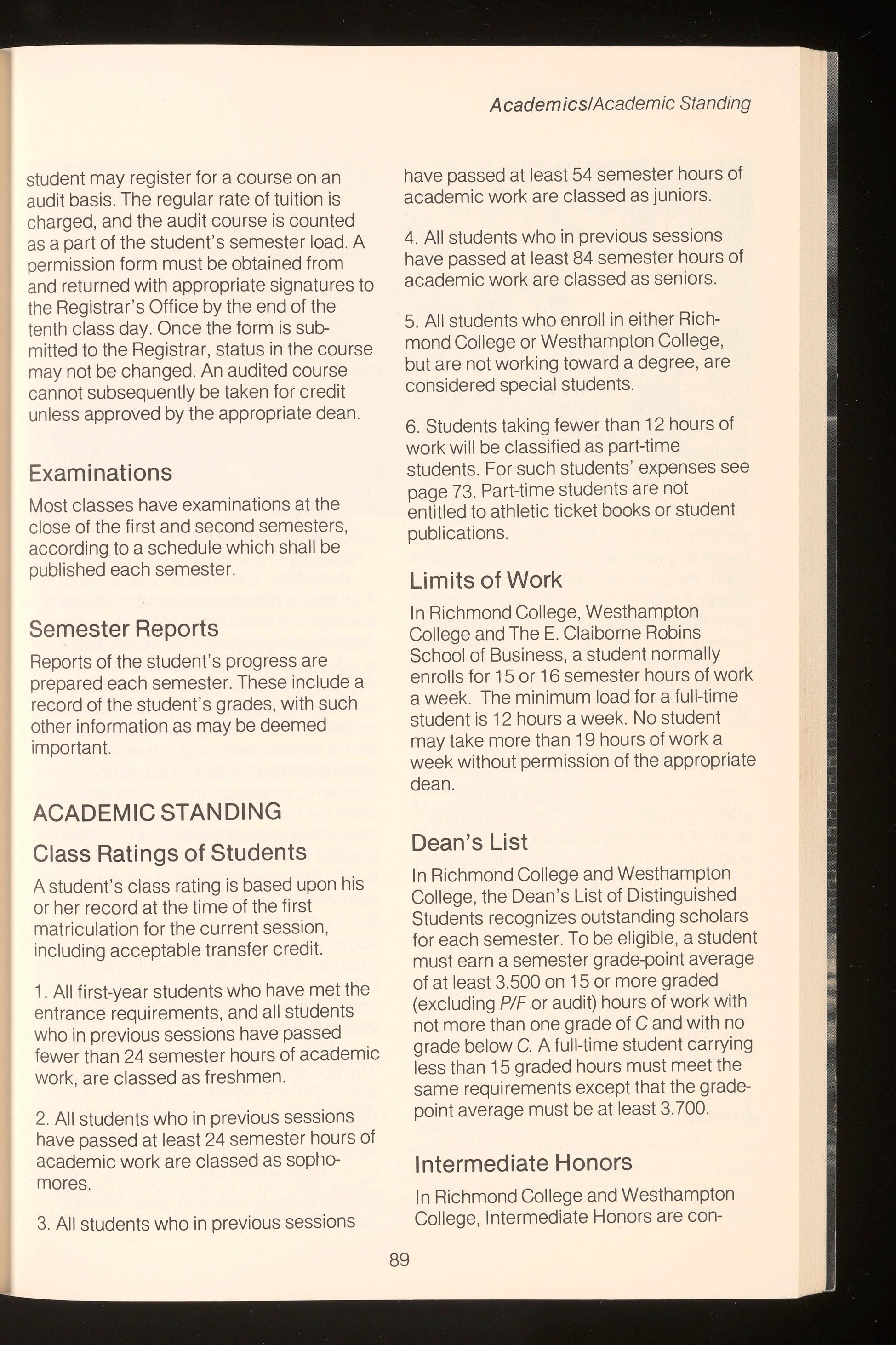
student may register for a course on an audit basis The regular rate of tuition is c harged , and the audit course is counted as a part of the student's semester load . A permission form must be obtained from and returned with appropriate signatures to th e Registrar ' s Office by the end of the te nth class day . Once the form is subm itted to the Registrar , status in the course may not be changed An audited course ca nnot subsequently be taken for credit unless approved by the appropriate dean
Examinations
Most classes have examinations at the c lose of the first and second semesters ac cording to a schedule which shall be' publ ished each semester
Semester Reports
Repo rt s of the student ' s progress are pre pared each semester These include a record of the student's grades , with such other information as may be deemed important.
ACADEMIC STANDING
C lass Ratings of Students
A student's class rating is based upon his o r her record at the time of the first matriculation for the current session, including acceptable transfer credit.
1. All first-year students who have met the entrance requirements , and all students w ho in previous sessions have passed fewer than 24 semester hours of academic w ork , are classed as freshmen.
2 . All students who in previous sessions have passed at least 24 semeste r hours of academic work are classed as sophomores
3. All students who in previous sessions
Academics/Academic Standing
have passed at least 54 semester hours of academic work are classed as juniors.
4 All students who in previous sessions have passed at least 84 semester hours of academic work are classed as seniors.
5 All students who enroll in either Richmond College or Westhampton College, but are not working toward a degree , are considered special students .
6. Students taking fewer than 12 hours of work will be classified as part-time students. For such students' expenses see page 73 : Part-time students are not entitled to athletic ticket books or student publications
Limits of Work
In Richmond College , Westhampton College and The E. Claiborne Robins School of Business, a student normally enrolls for 15 or 16 semester hours of work a week The minimum load for a full-time student is 12 hours a week. No student may take more than 19 hours of work a week without permission of the appropriate dean.
Dean's List
In Richmond College and Westhampton College , the Dean's List of Distinguished Students recognizes outstanding scholars for each semester To be eligible, a student must earn a semester grade-point average of at least 3.500 on 15 or more graded (ex cluding PIFor audit) hours of work with not more than one grade of C and with no grade below C. A full-time student carrying less than 15 graded hours must meet the same requirements except that the gradepoint average must be at least 3.700.
Intermediate Honors
In Richmond College and Westhampton College, Intermediate Honors are con-
ferred upon third-year students who, during their first two years at the University of Richmond, have completed at least 60 semester hours of academic work and have earned an average of at least three grade points for every hour attempted.
Degree With Honors (Latin Honors)
General academic honors of three ranks are awarded to members of the graduating classes on the basis of their grade-point averages on work completed at the University of Richmond. Cum /aude is awarded for an average of 3.200-3.499, magna cum /aude for 3.500-3.799, and sum ma cum /aude for 3.800-4.000. Beginning with the spring graduation in 1984, the Latin Honors grade-point average criterion for students graduating from Richmond College or Westhampton College will change so that cum /aude will be awarded for an average of 3.400-3.599, magna cum laude for 3.600-3.799, and sum ma cum /aude for 3.800-4.000.
Academic Good Standing
A student is expected to stay in good standing academically. Good standing is defined as earning at least two grade points for each academic hour attempted. Failure to maintain this standard will constitute academic deficiency.
Academic Deficiencies
Academic deficiencies in Richmond College and Westhampton College are of two types: academic warning and academic probation
Academic Warning
At any time when a student's overall gradepoint average falls below 2.000, the student will automatically be on academic warning A student on academic warning
should take active steps to improve academic performance.
Academic Probation
A student who falls below the following minimum accumulations of semester hours and grade-point average (g.p.a.) will be placed automatically on academic probation:
Freshmen (0-23.9 hours passed)
Sophomores (24-53.9 hours passed)
Juniors (54-83.9 hours passed)
Seniors (84 or more hours passed)

1.500 g.p.a
1.700 g.p.a.
1 .850 g.p.a.
2.000 g.p.a.
A student's hours passed and grade-point average are determined at the end of each grade-posting period. If at the end of a grade-posting period a student fails to meet the minimum applicable grade-point average stated above, the student will be placed on academic probation. If at the end of the second consecutive semester* of enrollment after being placed on academic probation, the student fails to meet the minimum standard based on hours then passed, the student shall be allowed to enroll for no more than 7 credit hours of academic work per regular semester or during an entire summer. Such a student has a maximum of 14 semester hours of work attempted in which to achieve the minimum requirement. Otherwise he or she will be suspended respectively from Richmond College or Westhampton College.
The above provisions notwithstanding, at the end of any semester, if a student's record reveals such significant deteri-
*Work taken during an entire summer, provided 12 hours or more are attempted, shall count as a regular semester.
oration in performance that extraordinary action is deemed appropriate by the dean, the student may be placed on probation, limited in credit hours of enrollment, or recommended for suspension from the college regardless of grade-point average.
The above provisions further notwithstanding, the dean, in circumstances which seem to warrant such action, may allow the student to continue as a full-time student on probation for a single additional semester.
Appeals of rulings associated with the administration of these regulations shall be directed to the Academic Council of the Faculty of Arts and Sciences.
Class Attendance Policy
Each student in Richmond College and Westhampton College is expected to attend all meetings of all classes and laboratory periods in the courses in which he or she is enrolled. However, the specific attendance policy in each course of study is to be determined by the instructor in the course. The specific attendance policy for each course will be announced and distributed to the students at the beginning of the course. Faculty members should
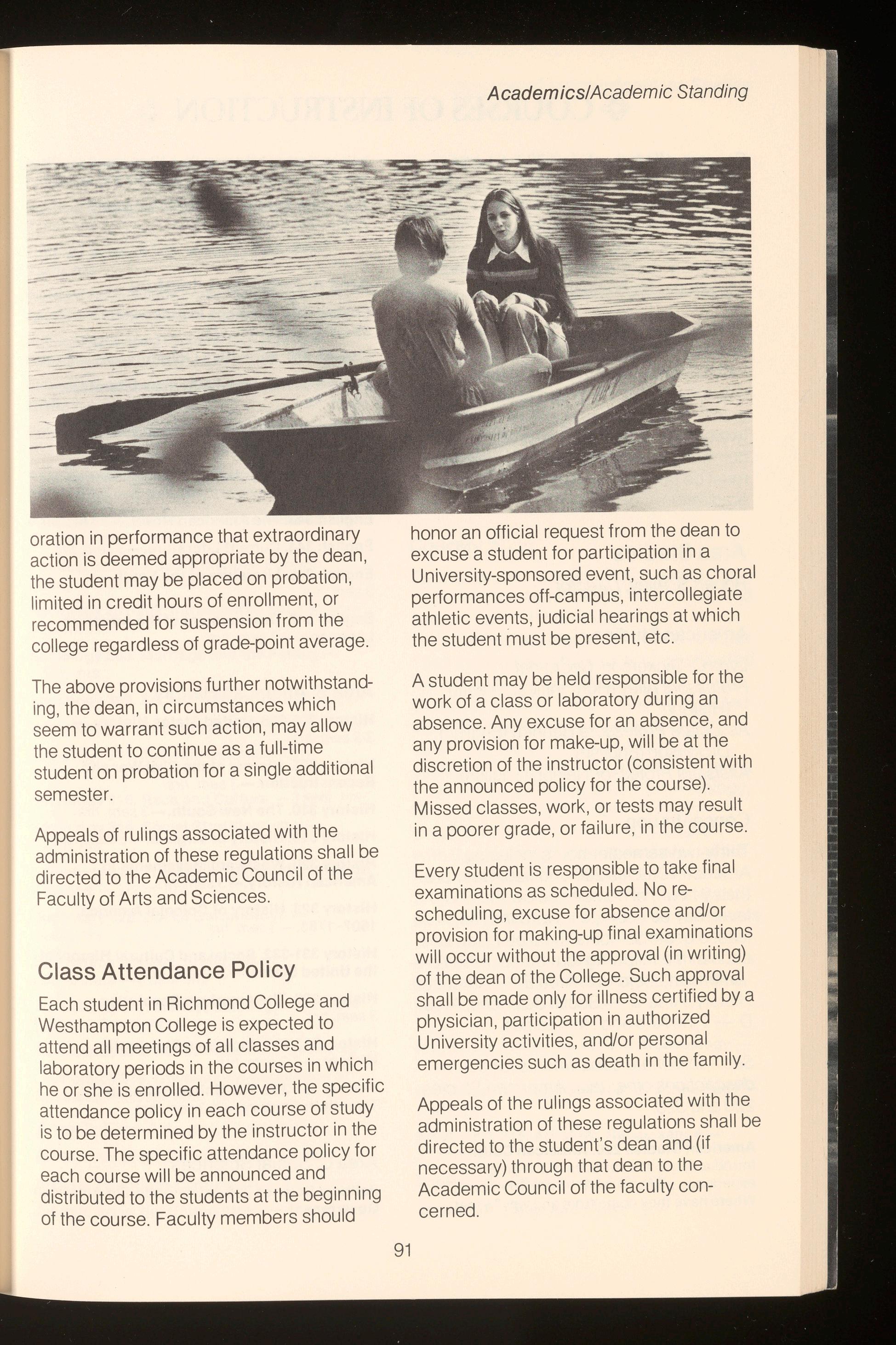
honor an official request from the dean to excuse a student for participation in a University-sponsored event, such as choral performances off-campus, intercollegiate athletic events, judicial hearings at which the student must be present, etc.
A student may be held responsible for the work of a class or laboratory during an absence. Any excuse for an absence, and any provision for make-up, will be at the discretion of the instructor (consistent with the announced policy for the course). Missed classes, work, or tests may result in a poorer grade, or failure, in the course.
Every student is responsible to take final examinations as scheduled. No rescheduling, excuse for absence and/or provision for making-up final examinations will occur without the approval (in writing) of the dean of the College. Such approval shall be made only for illness certified by a physician, participation in authorized University activities, and/or personal emergencies such as death in the family.
Appeals of the rulings associated with the administration of these regulations shall be directed to the student's dean and (if necessary) through that dean to the Academic Council of the faculty concerned.
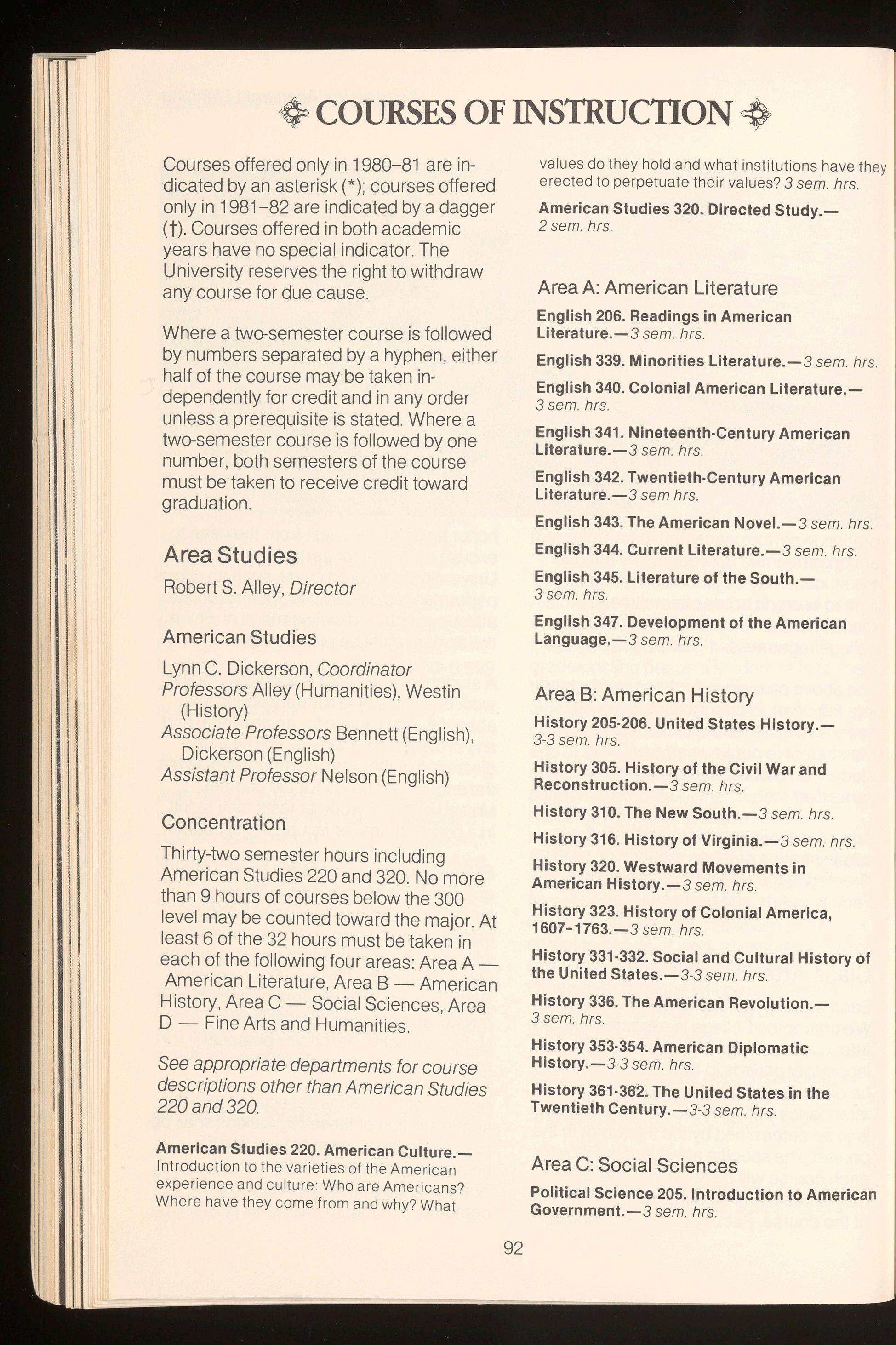
COURSESOFINS1RUCTION
Courses offered only in 1980-81 are indicated by an asterisk(*); courses offered only in 1981-82 are indicated by a dagger (t). Courses offered in both academic years have no special indicator. The University reserves the right to withdraw any course for due cause.
Where a two-semester course is followed by numbers separated by a hyphen, either half of the course may be taken independently for credit and in any order unless a prerequisite is stated. Where a two-semester course is followed by one number, both semesters of the course must be taken to receive credit toward graduation.
Area Studies
Robert S. Alley, Director
American Studies
Lynn C. Dickerson, Coordinator Professors Alley (Humanities), Westin (History)
Associate Professors Bennett (English), Dickerson (English)
Assistant Professor Nelson (English)
Concentration
Thirty-two semester hours including American Studies 220 and 320. No more than 9 hours of courses below the 300 level may be counted toward the major. At least 6 of the 32 hours must be taken in each of the following four areas: Area AAmerican Literature , Area B - American History, Area C - Social Sciences, Area D - Fine Arts and Humanities .
See appropriate departments for course descriptions other than American Studies 220and 320.
American Studies 220. American Culture.-
Introduction to the varieties of the American experience and culture: Who are Americans? Where have they come from and why? What
values do they hold and what institutions have the y erected to perpetuate their values? 3 sem. hrs.
American Studies 320. Directed Study.2 sem. hrs.
Area A: American Literature
English 206. Readings in American Literature.-3 sem. hrs.
English 339. Minorities Literature.-3 sem. hr s.
English 340. Colonial American Literature.3 sem. hrs.
English 341. Nineteenth-Century American Literature.-3 sem. hrs.
English 342. Twentieth-Century American Literature.-3 sem hrs.
English 343. The American Novel.-3 sem. hrs
English 344. Current Literature.-3 sem. hrs.
English 345. Literature of the South.3 sem. hrs.
English 347. Development of the American Language.-3 sem. hrs.
Area B: American History
History 205-206. United States History.3-3 sem. hrs.
History 305. History of the Civil War and Reconstruction.-3 sem. hrs.
History 310. The New South.-3 sem. hrs.
History 316. History of Virginia.-3 sem. hrs.
History 320. Westward Movements in American History.-3 sem. hrs.
History 323. History of Colonial America, 1607-1763.-3 sem. hrs.
History 331-332. Social and Cultural History of the United States.-3-3 sem. hrs.
History 336 . The American Revolulion.3 sem. hrs.
History 353-354. American Diplomatic History.-3-3 sem. hrs
History 361-382. The United States in the Twentieth Century.-3-3 sem. hrs.
Area C: Social Sciences
Political Science 205. Introduction to American Government.-3 sem. hrs.
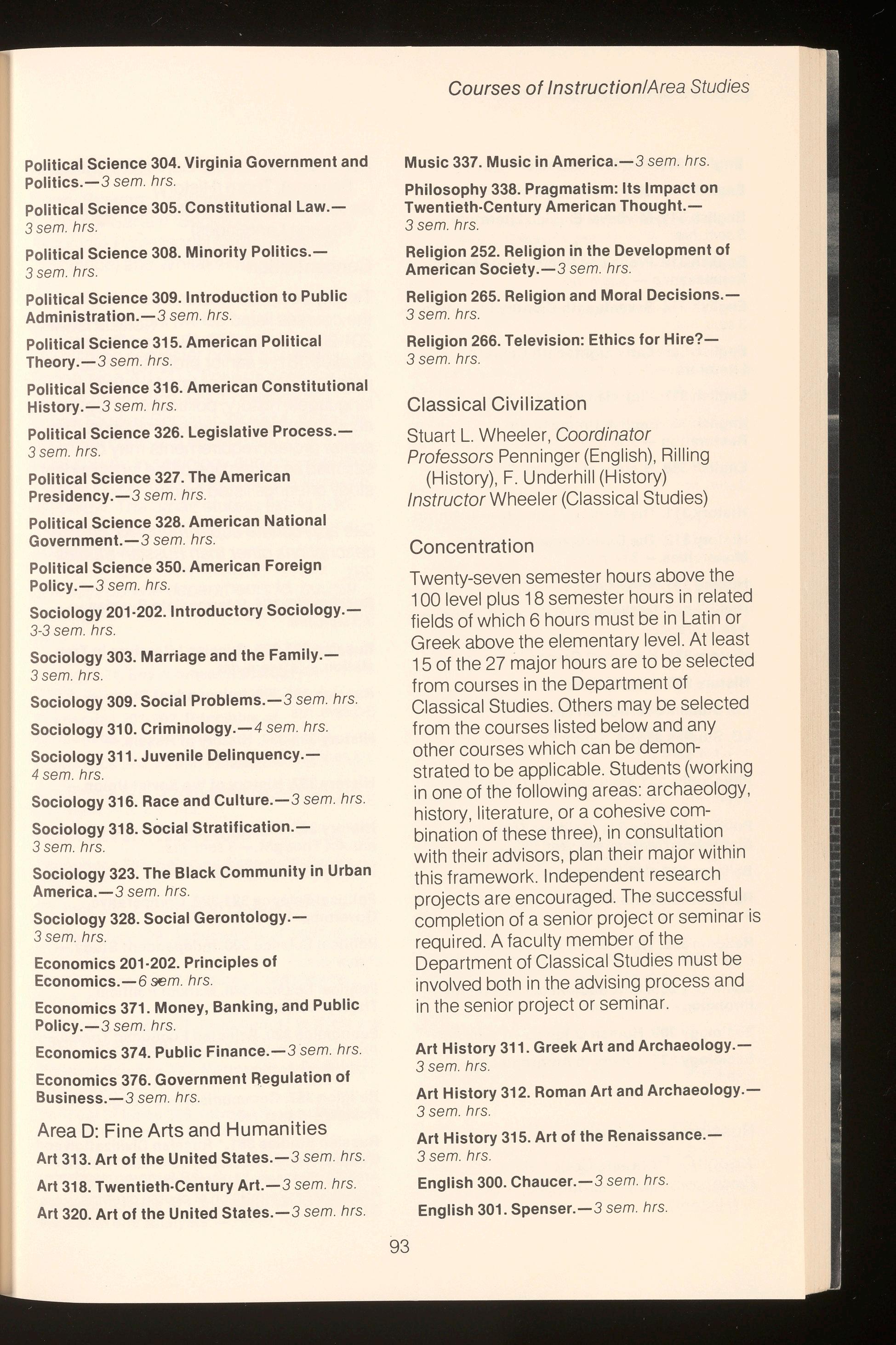
Political Science 304 Virginia Government and Politics.- 3 se m. hr s.
Political Science 305. Constitutional Law.3 sem. hr s.
Political Science 308 Minority Politics.3 sem. h rs.
Political Science 309. Introduction to Public Administration.- 3 se m hrs
Political Science 315 American Political Theory.- 3 se m hr s.
Political Science 316 . American Constitutional History.- 3 s e m. h rs.
Political Science 326. Legislative Process.3 sem. h r s.
Political Science 327. The American Presidency - 3 s em h rs.
Political Science 328. American National Government.-3 s em. hr s
Political Science 350. American Foreign Policy.- 3 se m hr s.
Sociology 201-202. Introductory Sociology.3-3 se m hr s.
Sociology 303. Marriage and the Family.3 sem. hr s.
Sociology 309. Social Problems.- 3 s em hr s.
Sociology 310. Criminology.- 4 se m. hr s
Sociology 311 . Juvenile Delinquency.4 sem. hr s.
Sociology 316. Race and Culture.-3 se m. hr s.
Sociology 318. Social Stratification.3 sem. hr s.
Sociology 323. The Black Community in Urban America.- 3 s em. hr s.
Sociology 328. Social Gerontology .3 se m hr s
Economics 201-202. Principles of Economics . -6 s,em. hr s.
Economics 371 . Money, Banking, and Public Policy.- 3 s em. hrs
Economics 374. Public Finance.- 3 s em . h r s.
Economics 376. Government Regulation of Business.- 3 s em. hr s.
Area D: Fine Arts and Humanities
Art 313. Art of the United States.- 3 sem hr s.
Art 318. Twentieth-Century Art.-3 s em h rs.
Art 320. Art of the United States - 3 s e m. hr s.
Courses of Instruction/Area Studies
Music 337. Music in America.-3 s em hrs.
Philosophy 338. Pragmatism: Its Impact on Twentieth-Century American Thought.3 s em. hrs.
Religion 252. Religion in the Development of American Society.- 3 s e m. hr s.
Religion 265. Religion and Moral Decisions .3 s em. hrs.
Religion 266. Television: Ethics for Hire?3 se m . h rs.
Classical Civilization
Stuart L Wheeler , Coordinator Professors Penninger (English), Rilling (History), F. Underhill (History) Instructor Wheeler (Classical Studies)
Concentration
Twenty-seven semester hours above the 100 level plus 18 semester hours in related fields of which 6 hours must be in Latin or Greek above the elementary level. At least 15 of the 27 major hours are to be selected from courses in the Department of Classical Studies. Others may be selected from the courses listed below and any other courses which can be demonstrated to be applicable Students (working in one of the following areas : archaeology , history , literature, or a cohesive combination of these three) , in consultation with their advisors , plan their major within this framework Independent research projects are encouraged. The successful completion of a senior project or seminar is required. A faculty member of the Department of Classical Studies must be involved both in the advising process and in the senior project or seminar .
Art History 311. Greek Art and Archaeology3 s e m. h rs.
Art History 312. Roman Art and Archaeology3 se m. hr s.
Art History 315. Art of the Renaissance.3 s e m. hr s.
English 300. Chaucer.- 3 s e m. h rs.
English 301. Spenser.- 3 sem. h rs.
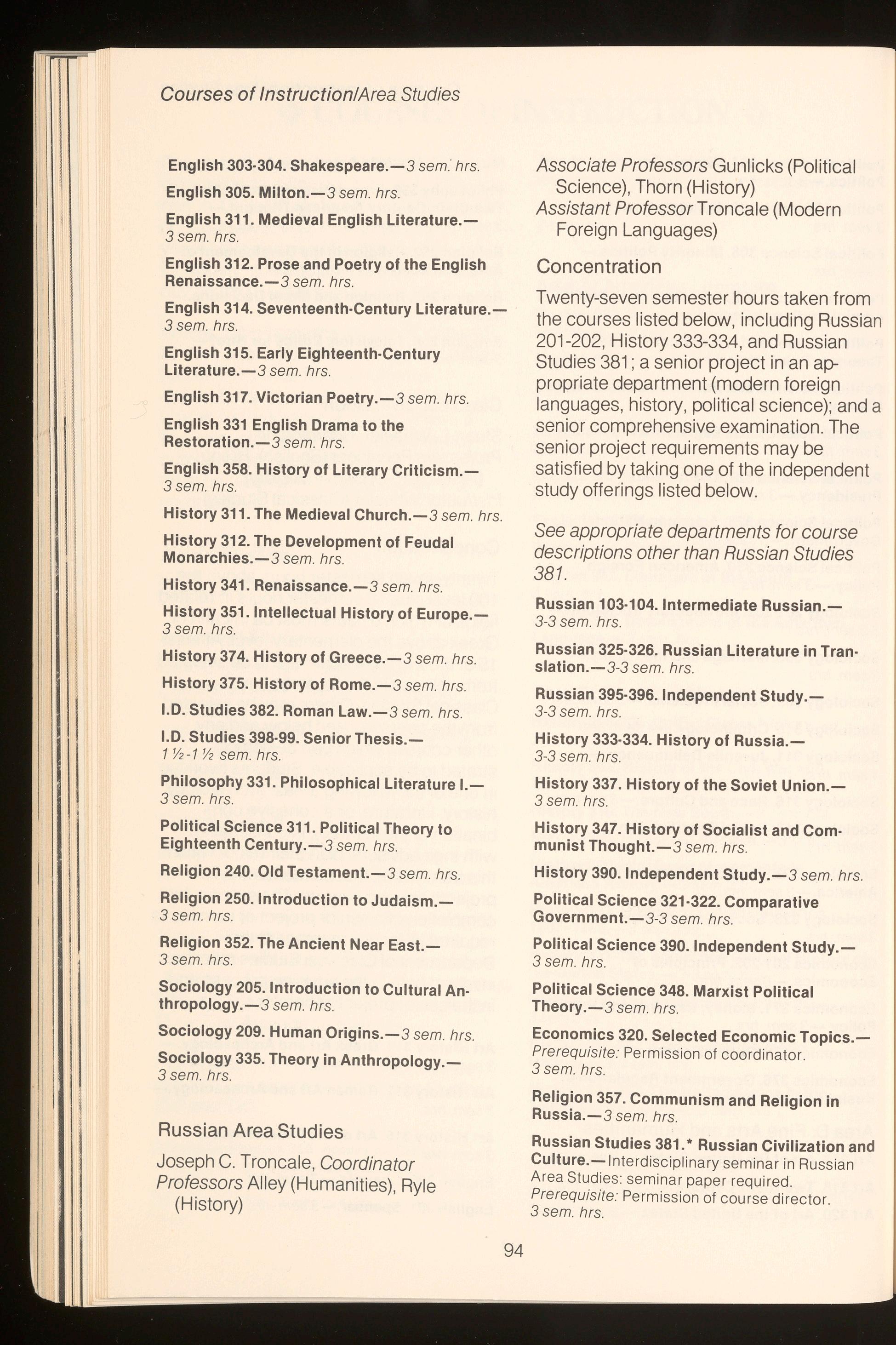
Courses of Instruction/Area Studies
English 303-304. Shakespeare.-3 sem. hrs.
English 305. Milton.-3 sem. hrs.
English 311. Medieval English Literature.3 sem. hrs.
English 312. Prose and Poetry of the English Renaissance.-3 sem. hrs.
English 314. Seventeenth-Century Literature.3 sem. hrs.
English 315. Early Eighteenth-Century Literature.-3 sem. hrs.
English 317. Victorian Poetry.-3 sem. hrs.
English 331 English Drama to the Restoration.-3 sem. hrs.
English 358. History of Literary Criticism.3 sem. hrs.
History 311. The Medieval Church.-3 sem. hrs
History 312. The Development of Feudal Monarchies.-3 sem. hrs.
History 341. Renaissance.-3 sem. hrs.
History 351. Intellectual History of Europe.3 sem. hrs.
History 374. History of Greece.-3 sem. hrs.
History 375. History of Rome.-3 sem. hrs.
I.D. Studies 382. Roman Law.-3 sem. hrs.
I.D. Studies 398-99. Senior Thesis.1 ½-1 ½ sem. hrs.
Philosophy 331. Philosophical Literature 1.3 sem. hrs.
Political Science 311. Political Theory to Eighteenth Century.-3 sem. hrs.
Religion 240. Old Testament.-3 sem. hrs.
Religion 250. Introduction to Judaism.3 sem. hrs.
Religion 352. The Ancient Near East.3 sem. hrs.
Sociology 205. Introduction to Cultural Anthropology.-3 sem. hrs.
Sociology 209. Human Origins.-3 sem. hrs.
Sociology 335. Theory in Anthropology.3 sem. hrs.
RussianArea Studies
Joseph C. Troncale, Coordinator
Professors Alley (Humanities), Ryle (History)
Associate Professors Gunlicks (Political Science), Thorn (History)
Assistant Professor Troncale (Modern Foreign Languages)
Concentration
Twenty-seven semester hours taken from the courses listed below, including Russian 201-202, History 333-334, and Russian Studies 381; a senior project in an appropriate department (modern foreign languages, history, political science); and a senior comprehensive examination. The senior project requirements may be satisfied by taking one of the independent study offerings listed below
See appropriate departments for course descriptions other than Russian Studies 381.
Russian 103-104. Intermediate Russian.3-3 sem. hrs.
Russian 325-326. Russian Literature in Translation.-3-3 sem. hrs
Russian 395-396. Independent Study.3-3 sem. hrs.
History 333-334. History of Russia.3-3 sem. hrs.
History 337. History of the Soviet Union.3 sem. hrs.
History 347. History of Socialist and Communist Thought . -3 sem. hrs
History 390. Independent Study.-3 sem. hrs
Political Science 321-322. Comparative Government.-3-3 sem. hrs
Political Science 390. Independent Study.3 sem. hrs.
Political Science 348. Marxist Political Theory.-3 sem. hrs.
Economics 320. Selected Economic Topics.Prerequisite: Permission of coordinator. 3 sem. hrs.
Religion 357. Communism and Religion in Russia.-3 sem. hrs.
Russian Studies 381. * Russian Civilization and Culture.-lnterdisciplinary seminar in Russian Area Studies: seminar paper required. Prerequisite: Permission of course director. 3 sem. hrs.

Courses of Instruction/AreaStudies
UrbanStudies
Henry Stewart. Coordinator (Sociology)
Professor Sartain (Sociology)
Associate Professors Horgan (Political Science) and Whitaker (Economics)
Concentration
Thirty-three semester hours including Economics 201-202, Political Science 303, 310, Mathematics 229, Sociology 301, Urban Studies Seminar 383-384 , plus one 300-level course in economics, one 300level course in sociology and one 300-level course in political science drawn from the list below. The urban studies listing also includes other courses supportive of this conce ntration.
See appropriate departments for course descriptions other than Urban Studies 383384.
Biology 221. Environmental Biology.3 sem. hrs.
Economics 201-202. Principles of Economics.-6 sem. hrs.
Economics 374. Public Finance.-3 sem. hrs.
Economics 376. Government Regulation of Business.-3 sem. hrs.
Economics 377. Labor Economics.-3 sem. hrs.
Economics 385. Selected Economic Topics3 sem. hrs.
Finance 360. Corporation Finance - 3 sem. hrs.
Mathematics 229. Applications of Statistics.3 sem. hrs.
Mathematics 297. Computer Programming 1.3 sem. hrs.
Political Science 207. Introduction to State and Local Government.-3 sem. hrs.
Political Science 303. Metropolitan Problems and Politics.-3 sem. hrs.
Political Science 309. Introduction to Public Administration.-3 sem. hrs.
Political Science 310. Public Administration: Intergovernmental Relations.-3 sem. hrs.
Political Science 371. Introduction to Political Research and Analysis.-3 sem. hrs.
Sociology 301. The City.-3 sem. hrs.
Sociology 315. Population.-3 sem. hrs.
Sociology 320. New Towns: A Study of Environmental Management.-3 sem. hrs.
Sociology 323. The Black Community in Urban America.-3 sem. hrs.
Sociology 325. Sociological Method.3 sem. hrs.
383-384 Urban Studies Senior Seminar.- Twosemester sem inar designed to integrate the Urban Studies Program. Topics: transportation, housing , public services, the future of urban areas, and architecture. Field experiences, internships, and guest lectures. 3-3 sem. hrs.
Women's Studies
Barbara Griffin, Coordinator (English)
Associate Professor Rohaly (Physical Education)
Assistant Professors Gauer (Education), Griffin (English), Hopkins (Psychology), Schneider (Biology), and Walker (Psychology)
Concentration
The Women 's Studies major at the University of Richmond will require successful completion of 32 hours of course work , including Women 's Studies 201-202 and 398.
Women's Studies 201. Self and Society: The Developing Woman (first semester).-Physica l, psychological, and social development of women with emphasis on confronting one's own identity and determining future directions. Team taught course. 3 sem. hrs.
Women's Studies 202. Self and Society: Women and their Cultural Tradition (second semester).-View of women in the western cultural tradition through the study of works by and about women in the humanistic disciplines. Team taught course. 3 sem. hrs.
Women's Studies 398. Independent Study.1-3 sem. hrs.
Twenty-four hours chosen from the following departmental course offerings. Of these 24 hours no more than 6 can be at the 100-level and no fewer than 12 shall be 300-level courses.
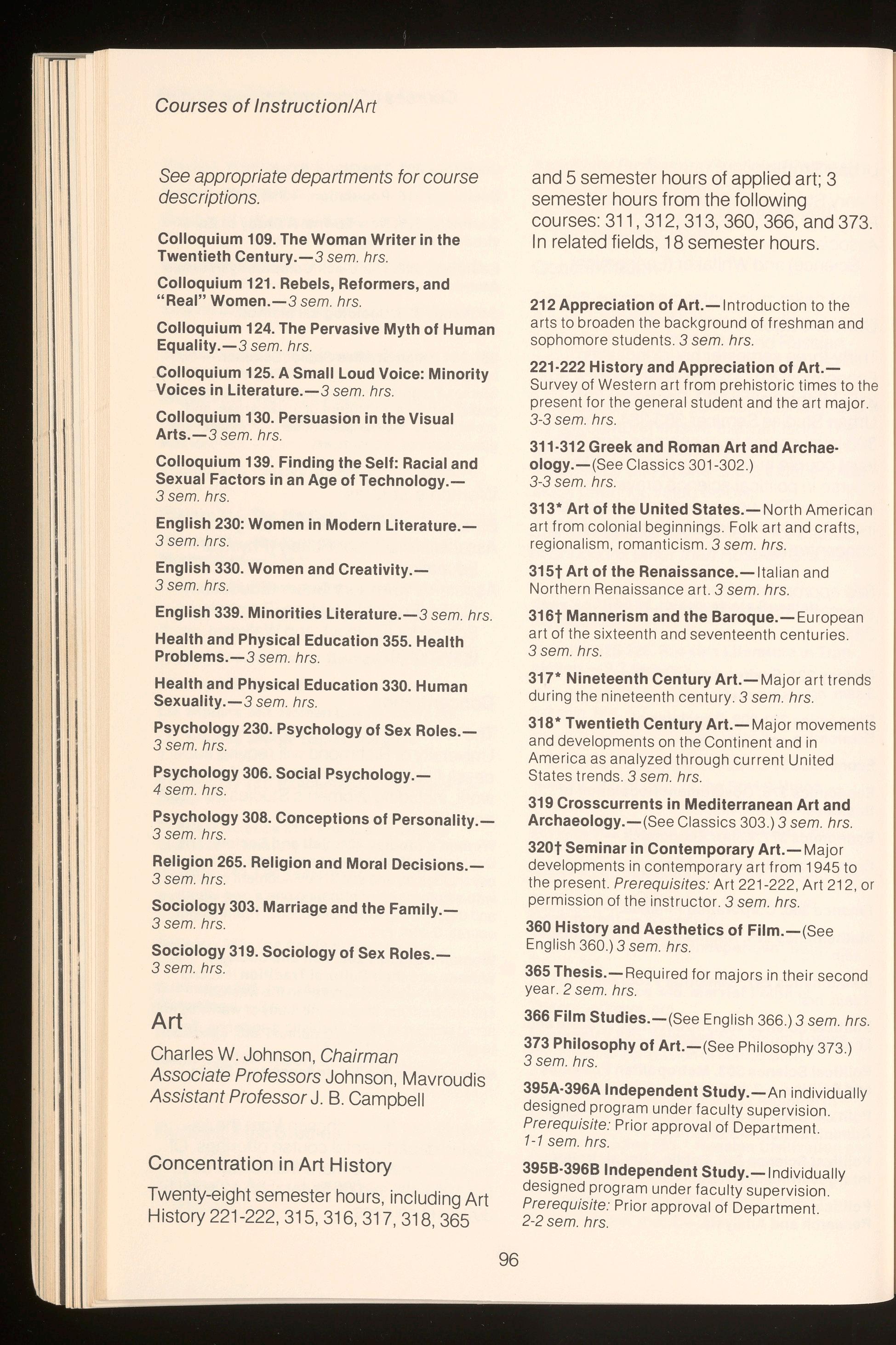
Courses of Instruction/Art
See appropriate departments for course descriptions.
Colloquium 109. The Woman Writer in the Twentieth Century.-3 sem. hrs.
Colloquium 121. Rebels, Reformers, and "Real" Women.-3 sem. hrs.
Colloquium 124. The Pervasive Myth of Human Equality.-3 sem. hrs.
Colloquium 125. A Small Loud Voice: Minority Voices in Literature.-3 sem. hrs
Colloquium 130. Persuasion in the Visual Arts.-3 sem. hrs
Colloquium 139. Finding the Self: Racial and Sexual Factors in an Age of Technology.3 sem. hrs.
English 230: Women in Modern Literature.3 sem. hrs.
English 330. Women and Creativity.3 sem. hrs.
English 339. Minorities Literature.-3 sem. hrs.
Health and Physical Education 355. Health Problems.-3 sem. hrs.
Health and Physical Education 330. Human Sexuality.-3 sem. hrs.
Psychology 230. Psychology of Sex Roles.3 sem. hrs.
Psychology 306. Social Psychology.4 sem. hrs.
Psychology 308. Conceptions of Personality.3 sem. hrs.
Religion 265. Religion and Moral Decisions.3 sem hrs.
Sociology 303. Marriage and the Family.3 sem. hrs.
Sociology 319. Sociology of Sex Roles.3 sem. hrs.
Art
Charles W. Johnson, Chairman
Associate Professors Johnson, Mavroudis
Assistant Professor J.B Campbell
Concentrationin Art History
Twenty-eight semester hours, including Art History 221-222, 315, 316, 317, 318, 365
and 5 semester hours of applied art; 3 semester hours from the following courses: 311, 312, 313, 360, 366, and 373. In related fields, 18 semester hours.
212 Appreciation of Art.-lntroduction to the arts to broaden the background of freshman and sophomore students. 3 sem. hrs.
221-222 History and Appreciation of Art.Survey of Western art from prehistoric times to the present for the general student and the art major 3-3 sem. hrs.
311-312 Greek and Roman Art and Archae• ology.-(See Classics 301-302.)
3-3 sem. hrs.
313* Art of the United States.-North American art from colonial beginnings. Folk art and crafts, regionalism, romanticism. 3 sem. hrs
315t Art of the Renaissance.- Italian and Northern Renaissance art. 3 sem. hrs.
316t Mannerism and the Baroque.-European art of the sixteenth and seventeenth centuries. 3 sem. hrs.
317* Nineteenth Century Art.-Major art trends during the nineteenth century. 3 sem. hrs.
318* Twentieth Century Art.-Major movement s and developments on the Continent and in America as analyzed through current United States trends. 3 sem. hrs.
319 Crosscurrents in Mediterranean Art and Archaeology.-(See Classics 303.) 3 sem. hrs.
320t Seminar in Contemporary Art.- Major developments in contemporary art from 1945 to the present. Prerequisites: Art 221-222 , Art 212 , or permission of the instructor. 3 sem hrs.
360 History and Aesthetics of Film.-(See English 360.) 3 sem. hrs.
365 Thesis.-Required for majors in their second year. 2 sem. hrs
366 Film Studies.-(See English 366.) 3 sem. hrs.
373 Philosophy of Art.-(See Philosophy 373 ) 3 sem. hrs.
395A-396A Independent Study.-An individually designed program under faculty supervision. Prerequisite: Prior approval of Department. 1-1 sem. hrs.
395B-396B Independent Study.- Individually designed program under faculty supervision. Prerequisite: Prior approval of Department. 2-2 sem. hrs.
395C-396C Independent Study.-An individually designed program under faculty supervision. Prerequisite: Prior approval of Department. 3-3 sem. hrs.

Concentrationin Studio Art
Thirty semester hours, including 24 semester hours in studio art and 6 semester hours in Art 221-222; in addition, 18 semester hours in related fields Any 300-level art history course will count toward related field concentration in studio art.
101-102 Elementary Drawing.-Drawing in various media from the living model, landscape, still life; composition. Four studio hours a week. 2-2 sem. hrs.
103-104 Introduction to Sculpture.- Theory and principles of three-dimensional design. Experimentation in various media. Six studio hours a week. 3-3 sem. hrs.
105-106 Introduction to Painting.- Techniques of oil and acrylic painting. Four studio hours a week. 3-3 sem. hrs.
107-108 Crafts.-lndividual projects adapted to c lassroom situations for exploration of twodimensional and three-dimensional media chosen fro m fabric design, banners, leather tooling, Egyptian paste jewelry , jewelry casting , procelain, slipcasting , wood-turning forms, enamelling and batik. 3-3 sem. hrs.
203-204 Intermediate Sculpture.-Continuation of Studio Art 103-104, with an application of t ec hniques in depth. Six studio hours a week. 3-3 sem. hrs.
205-206 Intermediate Painting.-Painting projects from figure, portrait , still life and landscape. Four studio hours a week. 3-3 sem. hrs.
207-208 Graphic Arts Workshop.-Projects in wood-blocks, silk-screen , photographic silkscr een, etching. Two lecture and two studio hours a week. 3-3 sem. hrs.
209 Visiting Artist Workshop.-Concentrated studio work taught by an established practicing artist in a chosen medium. 3 sem. hrs.
231-232 Principles of Design.-Applied theory and principles of basic design, composition, color, materials, and techniques. 3-3 sem. hrs.
233-234 Basic Principles of Three-Dimensional Design.- Theory and application of techniques
Courses of Instruction/Astronomy
and materials for structuring and building threedimensional art forms. 3-3 sem. hrs.
301-302 Advanced Painting.-Advanced projects in painting, with emphasis on individual creative expression. Eight studio hours a week. 4-4 sem. hrs.
303-304 Advanced Sculpture.-Continuation of 203-204. Emphasis on personal expression. Six studio hours a week. 3-3 sem. hrs.
305-306 Advanced Painting.-Continuation of Studio Art 301-302. Eight studio hours a week. 4-4 sem. hrs.
307-308 Graphic Arts Workshop.-Continuation of Studio Art 207-208. 3-3 sem. hrs.
331-332 Introduction to Ceramics.-Basic method of forming clay; coil, slab, potter's wheel. Basic glaze techniques and firing. Six studio hours a week. 3-3 sem. hrs.
333-334 Intermediate Ceramics.-Continuation of Studio Art 331-332. Emphasis on development of technique, individual experimentation with form and color. Six studio hours a week. 3-3 sem. hrs.
335-336 Advanced Ceramics.-Continuation of Studio Art 333-334, emphasizing advanced techniques and glaze chemistry. Six studio hours a week. 3-3 sem. hrs.
395A-396A Independent Study.-lndividually designed program under faculty supervision. Prerequisite: Prior approval of the Department. 1-1 sem. hrs.
395B-396B Independent Study.-lndividually designed program under faculty supervision. Prerequisite: Prior approval of the Department. 3-3 sem. hrs.
395C-396C Independent Study.-lndividually designed program under faculty supervision. Prerequisite: Prior approval of the Department. 3-3 sem. hrs.
395D-396D Independent Study.-I ndividually designed program under faculty supervision. Prerequisite: Prior approval of the Department. 4-4 sem. hrs.
Astronomy
101 Astronomy.-AII areas of astronomy from the nearby earth-moon system (tides, eclipses, etc.) through the solar system (sun , planets, comets, etc.) to the far reaches of the universe (the stars, their composition and evolution, galaxies, cosmology, etc.), and the instruments used in astronomy. The historical background of astronomy with emphasis on current theories, observations and topics of special interest.
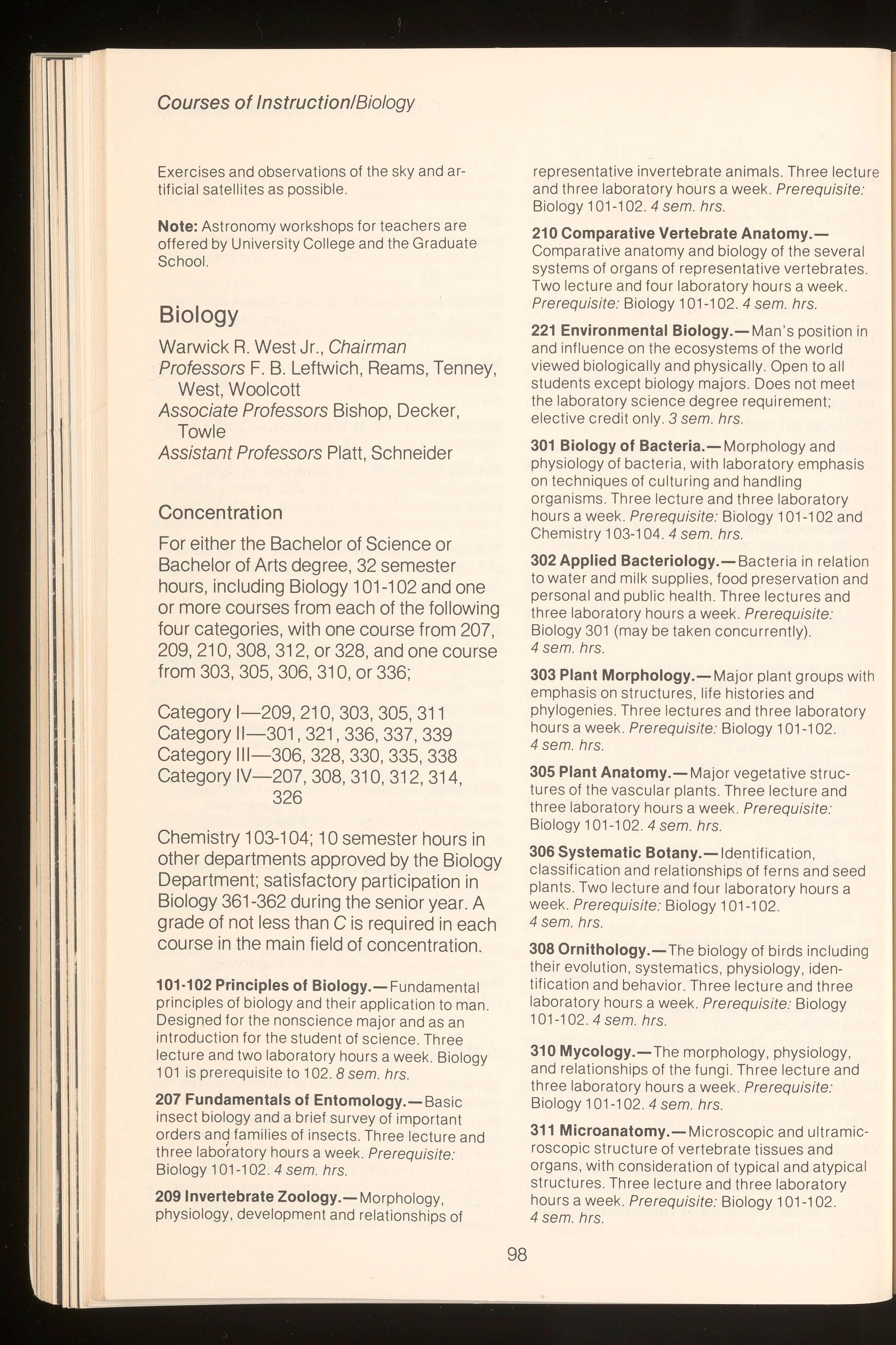
Coursesof Instruction/Biology
Exercises and observations of the sky and artificial satellites as possible.
Note: Astronomy workshops for teachers are offered by University College and the Graduate School.
Biology
Warwick R. West Jr., Chairman
Professors F. B. Leftwich , Reams, Tenney, West , Woolcott
Associate Professors Bishop, Decker, Towle
Assistant Professors Platt, Schneider
Concentration
For either the Bachelor of Science or Bachelor of Arts degree, 32 semester hours, including Biology 101-102 and one or more courses from each of the following four categories, with one course from 207, 209, 210, 308, 312 , or 328, and one course from 303, 305, 306,310, or 336;
Category 1-209, 210, 303, 305, 311
Category 11-301, 321, 336, 337, 339
Category 111-306, 328,330,335,338
Category IV-207, 308 , 310, 312, 314, 326
Chemistry 103-104; 10 semester hours in other departments approved by the Biology Department; satisfactory participation in Biology 361-362 during the senior year. A grade of not less than C is required in each course in the main field of concentration.
101-102 Principles of Biology.-Fundamental principles of biology and their application to man. Designed for the nonscience major and as an introduction for the student of science Three lecture and two laboratory hours a week Biology 101 is prerequisite to 102 8 sem hrs.
207 Fundamentals of Entomology.-Basic insect biology and a brief survey of important orders anq families of insects. Three lecture and three laboratory hours a week. Prerequisite: Biology 101-102. 4 sem. hrs.
209 Invertebrate Zoology.-Morphology, physiology , development and relationships of
representative invertebrate animals Three lectur e and three laboratory hours a week Prerequisite : Biology 101-102. 4 sem. hrs.
210 Comparative Vertebrate Anatomy.Comparative anatomy and biology of the several systems of organs of representative vertebrates Two lecture and four laboratory hours a week Prerequisite: Biology 101-102. 4 sem hrs
221 Environmental Biology.-Man 's position in and influence on the ecosystems of the world viewed biologically and physically Open to all students except biology majors Does not meet the laboratory science degree requirement ; elective credit only 3 sem. hrs
301 Biology of Bacteria.- Morphology and physiology of bacteria, with laboratory emphasis on techniques of culturing and handling organisms Three lecture and three laboratory hours a week Prerequisite: Biology 101-102 and Chemistry 103-104 4 sem. hrs
302 Applied Bacteriology.-Bacteria in relation to water and milk supplies , food preservation and personal and public health. Three lectures and three laboratory hours a week Prerequisite : Biology 301 (may be taken concurrently} 4 sem hrs
303 Plant Morphology.-Major plant groups with emphasis on structures, life histories and phylogenies. Three lectures and three laboratory hours a week Prerequisite: Biology 101-102. 4 sem. hrs
305 Plant Anatomy.-Major vegetative structures of the vascular plants. Three lecture and three laboratory hours a week. Prerequisite : Biology 101-102 4 sem. hrs.
306 Systematic Botany.- Identification , classification and relationships of ferns and seed plants Two lecture and four laboratory hours a week Prerequisite: Biology 101-102. 4 sem. hrs.
308 Ornithology.- The biology of birds including their evolution , systematics , physiology , identification and behavior. Three lecture and three laboratory hours a week. Prerequisite : Biology 101-102 4 sem hrs.
310 Mycology.- The morphology , physiology, and relationships of the fungi. Three lecture and three laboratory hours a week Prerequisite: Biology 101-102 4 sem hrs
311 Microanatomy.-Microscopic and ultramicroscopic structure of vertebrate tissues and organs, with consideration of typical and atypical structures. Three lecture and three laboratory hours a week Prerequisite: Biology 101-102. 4 sem. hrs.

312 Developmental Biology.-Embryogenesis of vertebrates and consideration of the developmental mechanics in regeneration, transplantation and experimental embryology. Three lecture and three laboratory hours a week. Prerequisite: Biology 101-102. 4 sem. hrs.
314 Genetics.-Analysis of experiments leading to an understanding of continuity and variation in populations, organisms, cells and viruses. Introduction to modern genetic research techniques. Three lecture and three laboratory hours a week. Prerequisites: Biology 101-102 and Chemistry 103-104. 4 sem. hrs.
321 Cell Physiology.-Biologic (21) and chemical processes operating in the living cells. Three lecture and three laboratory hours a week. Prerequisites: Biology 101-102 and Chemistry 103104 4 sem. hrs.
326 Parasitology.- The origin and nature of parasitism as presented by a study of the morphology, life histories, and host relationships of representative animal parasites. Three lecture and three laboratory hours a week. Prerequisite: Permission of instructor. 4 sem. hrs.
328 Systematic Vertebrate Zoology.Identification, classification and relationships of the vertebrates. Two lecture and four laboratory hours a week. Prerequisite: Biology 101-102. 4 sem. hrs.
330 Ecology.-lnterrelationship of organisms and the environment. Three lecture and three laboratory hours a week. Prerequisite: Biology 101-102. 4 sem. hrs.
335 Limnology.-Physical, chemical and biological properties of fresh waters. Three lecture and three laboratory hours a week. Prerequisites: Biology 101-102 and Chemistry 103-104. 4 sem. hrs.
336 Plant Physiology.- Basic plant functions including mineral nutrition, photosynthesis , translocation, respiration and growth. Three lecture and three laboratory hours a week. Prerequisites: Biology 101-102 and Chemistry 103104. 4 sem. hrs.
337 General Endocrinology.-lntroduction to chemical regulators in animals. Three lecture and three laboratory hours a week. Prerequisites: Biology 101-102 and Chemistry 103-104. 4 sem hrs.
338 Animal Behavior.-Comparative study of the development and functions of behavior mechanisms. Three lecture and three laboratory hours a week. Prerequisite: Biology 101-102. 4 sem. hrs.
339 Comparative Physiology.-Physiological and biochemical adaptions to the environment
Courses of Instruction/Chemistry
with emphasis on marine and estuarine animals. Three lecture and three laboratory hours a week. Prerequisites: Biology 101-102 and Chemistry 103104. 4 sem. hrs.
341-342 Public Health Laboratory Methods.Laboratory work provided by the Public Health Laboratory, City of Richmond, for a limited number of qualified biology majors selected by the joint staffs of the Public Health Laboratory and the University's Department of Biology. A minimum of one conference and 12 laboratory hours a week. 4-4 sem. hrs.
349-350 Biological Research Methods.-For students who, in the judgment of the biology staff, are qualified to undertake original research. One conference and four laboratory hours a week. 2-2 sem. hrs.
351 Special Topics.-Special course areas covered when sufficient interest. Considers subject matter not covered in other biology courses. Prerequisite: Biology 101-102.4 sem. hrs.
361-362 Seminar.-Graded on pass-fail basis and required of all seniors. Does not count in 32 hours needed for concentration. One meeting a week. 1-1 sem. hrs.
385 Scientific Illustrating.- Fundamentals of black and white photography and printing as applied to field and specimen photography, macrophotography, microphotography, and copy work of student-prepared graphs and figures. Two lecture hours a week: laboratory on individual basis. Prerequisite: Biology major at the junior level or above or by permission of instructor: access to a 35mm SLR camera. For elective credit only. 2 sem. hrs.
Chemistry
W. Allan Powell, Chairman Professors Gillespie, Powell, Worsham Associate Professors Mateer, Topham Assistant Professors Clough, Myers
Concentration
For the Bachelor of Arts degree, the chemistry major must take Chemistry 103104, 205-206,301, 307 and 4 additional semester hours in chemistry approved by the Department. Courses for the Bachelor of Science degree include Chemistry 103104, 205-206, 301, 309-310 and 4 additional hours in chemistry approved by the
Department. For either degree, 16 semester hours in related fields, including Physics 101-102 and additional semester hours approved by the Department must be completed . Two full years of either biology or physics are strongly recommended. For either degree, participation in a weekly seminar conducted by the staff and students is required during the senior year. A grade of not less than C is required in each course applied to the hours needed in the main field of concentration.
The Department, in cooperation with the School of Business, offers either the Bachelor of Arts degree or the Bachelor of Science degree in chemistry with a business option. For this program, the student must meet the chemistry requirements for either the Bachelor of Arts degree or the Bachelor of Science degree and take Economics 201-202, Accounting 301-302, Marketing 321, Management Systems 341, Finance 365, and 3 additional semester hours in business courses. The business courses may be applied toward the 8 semester hours of related work required in addition to Physics 101-102.
If students are to be certified by the Chemistry Department for meeting the minimum requirements for professional training of chemists, they must meet the requirements for the Bachelor of Science degree and in addition complete the following courses: Chemistry 302, 319, and 325; two years of German, French, or Russian are recommended. Economics 201-202 and Mathematics 253 and 303 are recommended.
103-104 Fundamentals of Chemistry.-
Principles of chemistry, including atomic and molecular structure, chemical bonding , the periodic table , the states of matter, reaction rates chemical equilibria, electrochemistry and energy · relationships. Systematic study of the families of elements. Laboratory work includes inorganic qualitative analysis. For science-oriented students, but may be taken by other interested persons. Meets requirement for the chemistry major and serves as a prerequisite for medical , 100
dental, or related studies. Three lecture and thr ee laboratory hours a week. Previous knowledge of chemistry not required. Prerequi s ites: High school algebra and geometry. 103 is prerequisite to 104. 8 sem. hrs.
105-106 Chemistry for Nonscience Majors .-
Principles and concepts of chemistry emphasizing their development, their relation s hip to the cultural environment , mutual influences between sc ience and society and consumer protection methods For nonscience majors. Will not meet requirements for medical or dental school nor serve as basis for further work in science. Three lectures and three laboratory hours a week. Chemistry 105 is prerequisite to 106. 8 sem. hrs.
205-206 Organic Chemistry.-Chemistry of the compounds of carbon, which is fundamental to an understanding of both chemistry and biology. Organic structure, nomenclature, reactions and reaction mechanisms of hydrocarbons examined first semester. Similar study of the organic compounds containing halogens, oxygen, nitrogen and sulfur , including those which form the fundamental building blocks of the macromolecules of living systems covered second semester. Three lecture and three laboratory hours a week. Prerequisite: Chemistry 103-104. Chemistry 205 is prerequisite to 206. 8 sem. hrs.
301 Analysis.- Principles, methods and techniques of gravimetric, volumetric, spectrophotometric, fluorometric, atomic absorption and potentiometric analysis. Two lecture and six laboratory hours a week. Prerequisite: Chemistry 103-104 4 sem. hrs.
302 Analysis 11.- Principles , methods and techniques of selected instrumental method s of analysis , emphasizing application of instrumental methods , as well as classical methods , to qualitative and quantitative analysis of organic compounds Two lecture and six laboratory hours a week. Prerequisite: Chemistry 205-206 and 301. 4 sem. hrs.
307 Physical Chemistry for the Life Sciences.-Selected principles of physical chemistry chosen for their applicability to biology and medicine , mathematical preparation as needed, gas laws , chemical thermodynamics, equilibria , electrolytes, electrochemical potentials , rates of chemical reactions, enzymes and macromolecules. Examples of biological systems for class and laboratory practice. Elementary computer programming included in laborator y sessions. Three lecture and three laboratory hours a week. Prerequisites: Chemistry 103-104 and Physics 101-102 (may be taken concurrently). 4 sem. hrs.
309-310 Physical Chemistry.-Principal laws and theories of chemistry-gas laws and kineti c
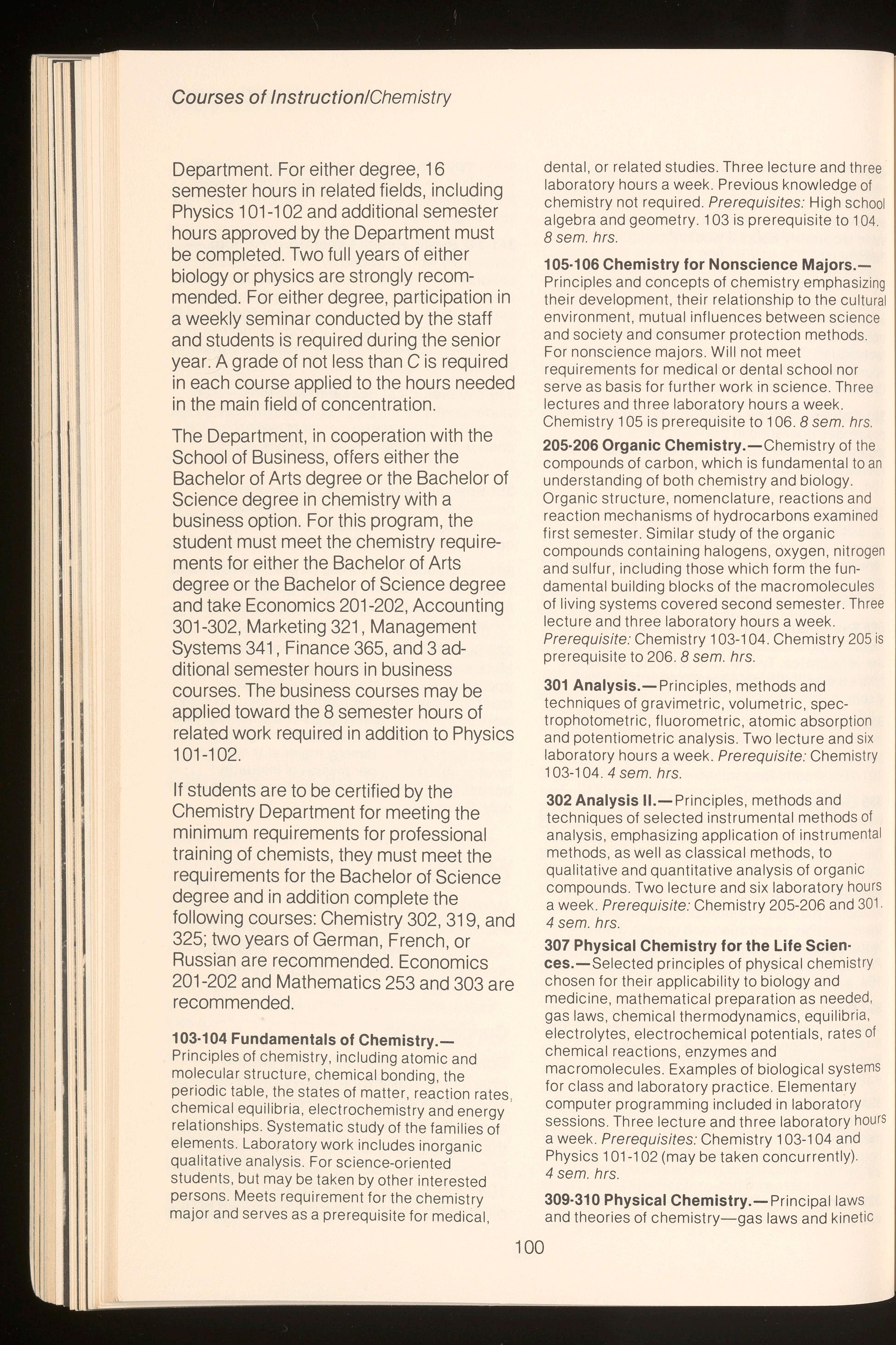
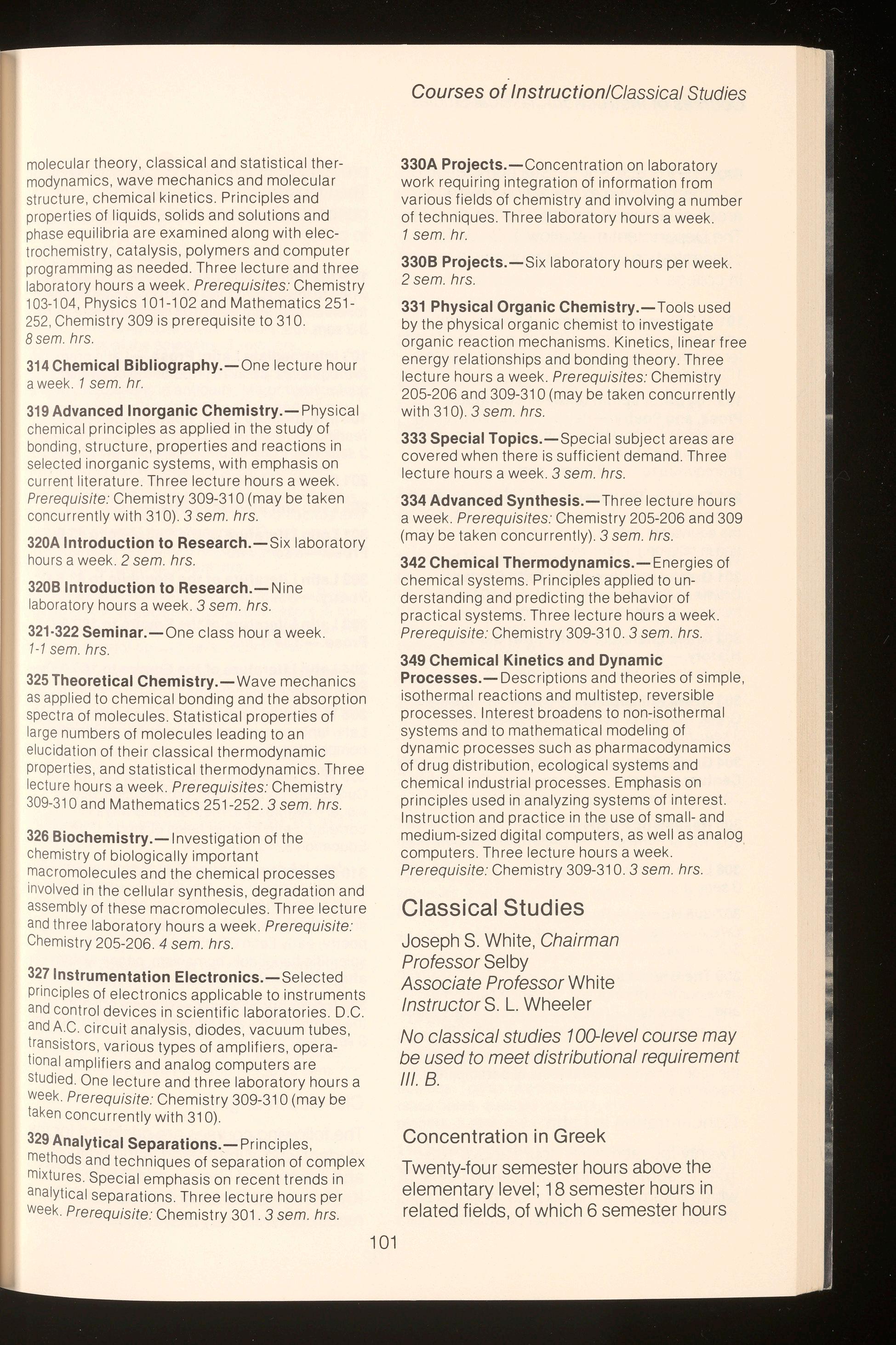
molecular theory , classical and statistical thermodynamics, wave mechanics and molecular structu re, c hemical kinetics. Principles and properti es of liquids , solids and solutions and phase equilibria are examined along with electrochemis try , catalysis , polymers and computer programming as needed. Three lecture and three laboratory hours a week. Prerequisites: Chemistry 103-104 , Physics 101-102 and Mathematics 251252, Chemi s try 309 is prerequisite to 31 O 8 sem. hrs.
314Chemical 8ibliography.-One lecture hour a week. 1 se m. hr.
319Advanced Inorganic Chemistry.-Phys ical chemica l principles as applied in the study of bond ing, structure , properties and reactions in selected inorganic systems , with emphasis on current literature. Three lecture hours a week Prerequisi te: Chemistry 309-31 O (may be taken concur re ntly with 310). 3 sem. hrs.
320AIntroduction to Research.-Six laboratory hours a we ek 2 sem hrs.
3208 Introduction to Research.- Nine laboratory hours a week. 3 sem. hrs.
321-322 Seminar.-One class hour a week. 1-1sem. h rs.
325Theoretical Chemistry.-Wave mechanics as applied to chemical bonding and the absorption spect ra of molecules. Statistical properties of large numbers of molecules leading to an elucidat ion of their classical thermodynamic properti es, and statistical thermodynamics. Three lecture ho ur s a week. Prerequisites: Chemistry 309-310 and Mathematics 251-252. 3 sem. hrs.
326 8i ochemistry.- Investigation of the chemist ry of biologically important macromolecules and the chemical processes involved in the cellular synthesis, degradation and assembly of these macromolecules. Three lecture and t hree laboratory hours a week. Prerequisite: Chemistr y 205-206. 4 sem. hrs.
327Instrumentation Electronics.-Selected principles of electronics applicable to instruments and control devices in scientific laboratories. D.C. andA.C. circuit analysis, diodes, vacuum tubes , transis to rs , various types of amplifiers , operational amplifiers and analog computers are studied One lecture and three laboratory hours a week Pr erequisite. Chemistry 309-310 (may be taken co ncurrently with 310).
329 Analytical Separations.-Principles, methods and techniques of separation of complex mixtures. Special emphasis on recent trends in analytica l separations. Three lecture hours per week. Prerequisite: Chemistry 301. 3 sem. hrs.
Courses of Instruction/Classical Studies
330A Projects.-Concentration on laboratory work requiring integration of information from various fields of chemistry and involving a number of techniques. Three laboratory hours a week. 1 sem. hr.
3308 Projects.-Six laboratory hours per week. 2 sem. hrs.
331 Physical Organic Chemistry . - Tools used by the physical organic chemist to investigate organic reaction mechanisms. Kinetics , linear free energy relationships and bonding theory. Three lecture hours a week. Prerequisites: Chemistry 205-206 and 309-31 O (may be taken concurrently with 310) 3 sem. hrs.
333 Special Topics.-Special subject areas are covered when there is sufficient demand. Three lecture hours a week. 3 sem. hrs.
334 Advanced Synthesis.-Three lecture hours a week. Prerequisites: Chemistry 205-206 and 309 (may be taken concurrently). 3 sem. hrs.
342 Chemical Thermodynamics.-Energies of chemical systems. Principle-s applied to understanding and predicting the behavior of practical systems. Three lecture hours a week. Prerequisite: Chemistry 309-310. 3 sem. hrs.
349 Chemical Kinetics and Dynamic Processes.-Descriptions and theories of simple , isothermal reactions and multistep, reversible processes. Interest broadens to non-isothermal systems and to mathematical modeling of dynamic processes such as pharmacodynamics of drug distribution , ecological systems and chemical industrial processes. Emphasis on principles used in analyzing systems of interest. Instruction and practice in the use of small-and medium-sized digital computers, as well as analog computers. Three lecture hours a week. Prerequisite: Chemistry 309-310. 3 sem. hrs.
Classical Studies
Joseph S. White, Chairman
Professor Selby
Associate Professor White
Instructor S. L. Wheeler
No classical studies 1OD-levelcourse may be used to meet distributional requirement Ill . B.
Concentration in Greek
Twenty-four semester hours above the elementary level ; 18 semester hours in related fields, of which 6 semester hours
Coursesof Instruction/Classical Studies
must be in Latin; successful completion of a comprehensive examination covering the areas of Greek studies or a senior project. The Department may allow 103-104 for concentration when the language is begun in college.
101-102 Elementary Greek.-College credit only when followed by Greek 103-104, or when offered for elective credit. Greek 101 is prerequisite to 102. 6 sem. hrs.
103-104 Introduction to Greek Literature, Prose, and Poetry.-Review of grammar, study of selections from Herodotus, Plato or Lucian and a play by Sophocles or Euripides. Greek 103 is prerequisite to 104. 3-3 sem. hrs.
203 The New Testament-New Testament in the original language. Prerequisites: Greek 103-104 or the equivalent. (May be included in a concentration in religion ) 3 sem. hrs.
301 Greek Literature of the Fifth Century: Drama.-Prerequisites: Greek 103-104 or permission of Department. 3 sem. hrs.
302 Greek Literature of the Fifth Century: History.-Prerequisites: Greek 103-104 or permission of Department. 3 sem. hrs.
303 Greek Philsophical Prose.-Prerequisites: Greek 103-104 or permission of Department. 3 sem. hrs.
304 Greek Orators and Historians of the Fourth Century and Later.-Prerequisites: Greek 103· 104 or permission of Department. 3 sem. hrs.
305 Hellenistic Poetry.-Prerequisites: Greek 103-104 or permission of Department. 3 sem. hrs.
306 Lyric Poetry.-Prerequisites: Greek 103-104. 3 sem. hrs.
307-308 Homer.-Readings from the Iliad and Odyssey. Prerequisites: Greek 103-104. 3-3 sem. hrs.
309 The Greek Language.-Historical development of language , advanced grammar , and composition Prerequisites: Elementary Latin and Greek 104 or the equivalent. 3 sem. hrs.
399 Independent Study.-Content adapted to t~e requirements and interests of participants. 3 sem. hrs
Concentration in Latin
Twenty-four semester hours above 103104, 18 semester hours in related fields, of which 6 semester hours must be in Greek; the successful completion of a com-
prehensive examination or a senior project. The Department may allow 103-104 for concentration when the language is begun in college.
101-102 Elementary Latin.-College credit only when followed by Latin 103-104 or when offered for elective credit. Latin 101 is prerequisite to 102 3-3 sem. hrs.
103 Intermediate Latin: Prose.-Latin grammar Prerequisites: Latin 101-102 or the equivalent. 3 sem. hrs .
104 Intermediate Latin: Poetry.-Selected readings. Prerequisite: Latin 103 or the equivalent. 3 sem. hrs
201 Survey of Latin Literature.-3 sem. hrs
202 Lyric and Elegiac Poetry.-3 sem. hrs.
301 Latin Literature of the Republic to 43 B.C.: Prose.-3 sem hrs.
302 Latin Literature of the Republic to 43 B.C.: Poetry.-3 sem. hrs.
303 Latin Literature of the Empire to 180 A.D.: Prose.-3 sem. hrs.
304 Latin Literature of the Empire to 180 A.D.: Poetry.-3 sem. hrs.
305 The Latin Language.-Development of the Latin language, advanced grammar, and prose composition. 3 sem. hrs.
306 The Teaching of High School Latin.Curriculum construction, organization, audiovisual materials and methods and ways to correlate Latin to other fields of study. (See Education 324.) 3 sem. hrs.
310 Selected Topics.- Topics of concern with in the area of Roman literature and history. Topic determined after consultation with interested students. Examples include biography, lyric poetry, early Latin Christian literature, the Latin scientific handbook, humanism, pagan writers after 180 A.O. 3 sem. hrs.
399 Independent Study.-Content adapted to the requirements and interests of the participan ts. 3 sem. hrs.
Classics in English
The following courses are designed for the student who is interested in the cultures and literature of Greece and Rome. Knowledge of Greek or Latin is not required. While they may not be used for
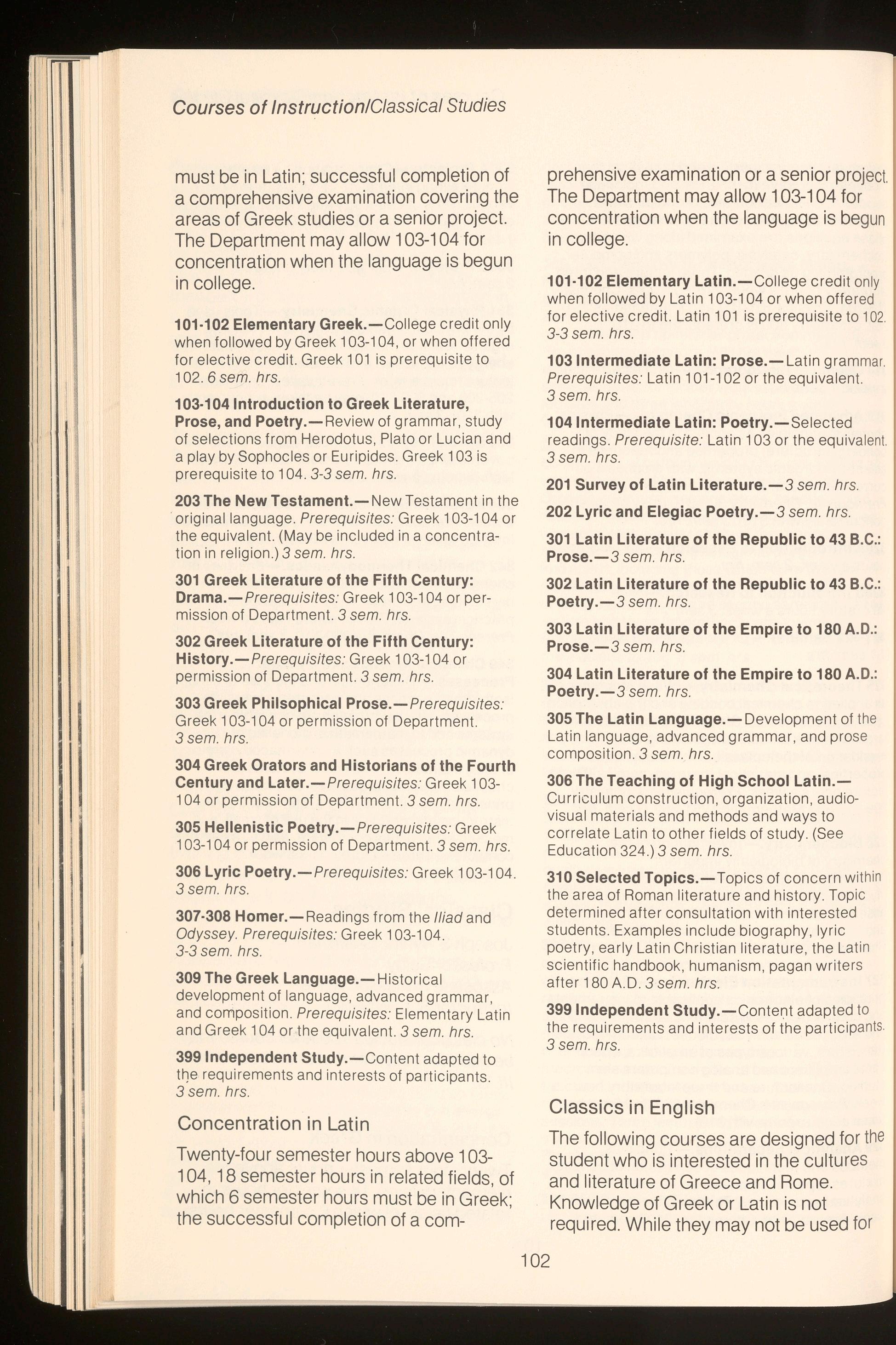
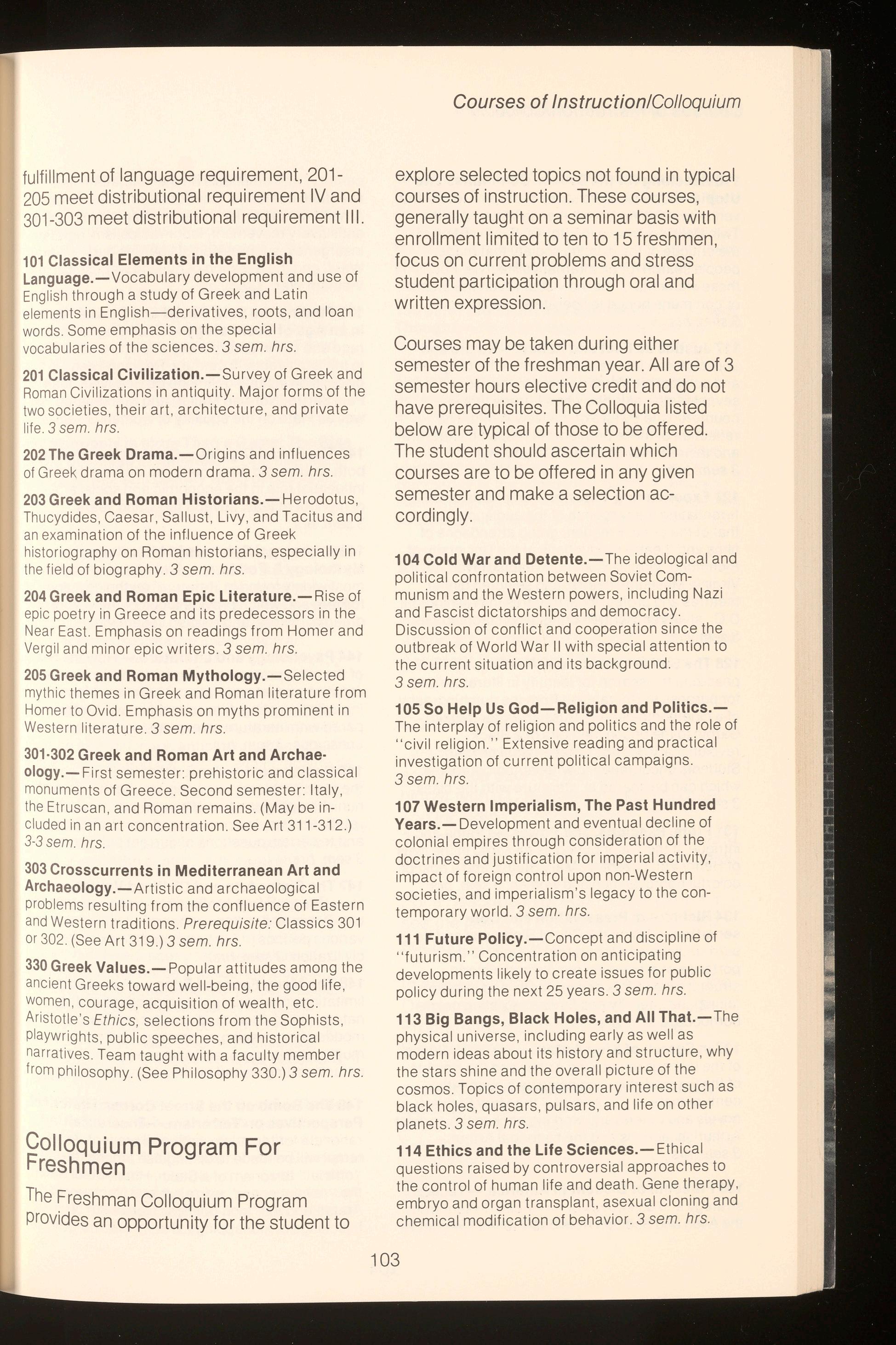
fulfillment of language requirement, 201205 meet distributional requirement IV and 301-303 meet distributional requirement Ill.
101 Classical Elements in the English Language.-Vocabulary development and use of Englishthrough a study of Greek and Latin elements in Engl is h-derivatives , roots, and loan words. Some emphasis on the special vocabularies of the sciences. 3 sem. hrs.
201 Classical Civilization . -Sur vey of Greek and RomanCivil iza tions in antiquity. Major forms of the two societies, their a rt , architecture, and privat e life. 3 sem. hrs.
202 The Greek Drama.-Origins and influences of Greek drama on modern drama. 3 sem. hrs.
203 Greek and Roman Historians.-Herodotus , Thucydides, Caesar, Sallust, Livy, and Tacitus and an exami nat ion of the influence of Greek historiography on Roman historians , especially in the field of biography. 3 sem. hrs.
204 Greek and Roman Epic Literature . -Rise of epic poet ry in Greece and its predecessors in the Near East. Emphasis on readings from Homer and Vergil and minor epic writers. 3 sem. hrs.
205 Greek and Roman Mythology.-Selected mythic themes in Greek and Roman literature from Homer to Ovid. Emphasi s on myths prominent in Western literature. 3 sem. hrs.
301-302Greek and Roman Art and Archaeology.-First semester: prehi s toric and classical monuments of Greece. Second semester: Italy , the Etruscan, and Roman remains. (May be included in an art concentration. See Art 311-312) 3-3 sem. hrs
303 Crosscurrents in Mediterranean Art and Archaeology.-Artistic and archaeological problems resulting from the confluence of Eastern and Western traditions. Prerequ isite: Classics 301 or 302. (See Art 319.) 3 sem. hrs.
330 Greek Values.-Popular attitudes among the ancient Greeks toward we ll-being , the good life, women, courage, acquisition of wealth, etc. Aristotle's Ethics, selections from the Sophists, playwrights, public speeches, and historical narratives. Team taught with a faculty member from philosophy. (See Philo sophy 330.) 3 sem. hrs.
ColloquiumProgram For Freshmen
The Freshman Colloquium Program
Providesan opportunity for the student to
Courses of Instruction/Colloquium
explore selected topics not found in typical courses of instruction. These courses, generally taught on a seminar basis with enrollment limited to ten to 15 freshmen, focus on current problems and stress student participation through oral and written expression
Courses may be taken during either semester of the freshman year. All are of 3 semester hours elective credit and do not have prerequisites. The Colloquia listed below are typical of those to be offered. The student should ascertain which courses are to be offered in any given semester and make a selection accordingly.
104 Cold War and Detente.-The ideological and political confrontation between Soviet Communism and the Western powers, including Nazi and Fascist dictatorships and democracy. Discussion of conflict and cooperation since the outbreak of World War II with special attention to the current situation and its background 3 sem. hrs.
105 So Help Us God-Religion and Politics.The interplay of religion and politics and the role of "c ivil religion." Extensive reading and practical investigation of current political campaigns. 3 sem. hrs.
107 Western Imperialism, The Past Hundred Years.-Development and eventual decline of colonial empires through consideration of the doctrines and justification for imperial activity, impact of foreign control upon non-Western societies, and imperialism's legacy to the contemporary world. 3 sem. hrs.
111 Future Policy.-Concept and discipline of " futurism. " Concentration on anticipating developments likely to create issues for public policy during the ne xt 25 years. 3 sem. hrs.
113 Big Bangs, Black Holes, and All That.- The physical universe, including early as well as modern ideas about its history and structure, why the stars shine and the overall picture of the cosmos. Topics of contemporary interest such as black holes, quasars, pulsars, and life on other planets. 3 sem. hrs.
114 Ethics and the Life Sciences.-Ethical questions ra ise d by controversial approaches to the control of human life and death. Gene therapy, embryo and organ transplant, asexual cloning and chemical modification of behavior. 3 sem. hrs.
Courses of Instruction/Colloquium
116 Reaching for the Dream: Communes and Utopia.-Comparative study of utopian ideas and ventures, ranging from the ancient world to the Twin Oaks commune in Virginia Examination of the critique of the existing society that made people search for an alternative lifestyle. Focus on those elements of the individual which the utopia or commune hoped to liberate and emphasize.
3 sem. hrs.
117 Justice as Fact and Fancy.-Nature and application of ju st ice Emphasis on the religious and political problems created in the sixteenth and seventeenth centuries when Europe first encountered the culture of the New World. The reflection of these problems in Hispanic literature and their relevance to modern society.
3 sem. hrs.
127 Experiencing Theatre -Emphasis on differentiating the response of the audience from that of the critic. Frequent group attendance of films and theatre production s at the University of Richmond , Virginia Commonwealth University, the Virginia Museum Theatre , and selected dinner theatres and professional theatres in Washington, D .C.; styles and written critiques on productions.
3 sem. hrs
128 The Self in Literature.-Readings emphasizing the search for identity in literature and for purpose in life , ranging from the autobiography of a nineteenth-century Russian writer (Maxim Garby) to the prison memoirs of a Black revolutionary (Eldrige Cli:,aver, Soul on Ice). Students encouraged to write autobiographies which can be shared as literature with the class. 3 sem. hrs
131 Plots, Passions, and Power.-Drama and intrigue of the Tudor period as mirrored in the lives of Henry VIII , Elizabeth , Mary Stuart, and a host of colorful non royal men and women. 3 sem. hrs.
134 Richmond: Preservation and Conservation.- Using the City of Richmond and its surroundings as a laboratory, a study of the importance of preserving our old and historic structures, districts and artifacts, and of maintaining the integrity and flavor of existing neighborhoods . 3 sem. hrs.
137 In Search of King Arthur -The persistence of the legends about King Arthur and the Knights of the Round Table , beginning with twentiethcentury material ("Camelot," the Mary Stewart novels and others) and working back to the earliest Arthurian legends and the historical Arthur. 3 sem. hrs.
138 Freedom of Dissent in America.-Tactics strategy and objectives of American dissent fro~ the Alien and Sedition Acts crisis to the twentieth
century, with emphasis on the nineteenth and twentieth centuries. Confrontations over First Amendment liberties in Jacksonian America, the antislavery movement , labor radicalism, agrarian insurgency , suppression of liberties during World War I, and the question of making war itself in the Vietnam War. 3 sem. hrs.
139 Finding the Self: Racial and Sexual Factors in an Age of Technology.-Changing roles of race and sex in determining who and what we are in the late twentieth century Readings and discussion including Simone de Beauvoir, Jean Paul Sartre, Norman Mailer, and Kierkegaard , as well as Plato on the equality of women. 3 sem. hrs.
142 The Social Crystal.-Crystalline materials, both natural and man-made, which have played an influential role in the economic and social affairs of men for at least several thousand years. 3 sem. hrs
143 Archetypal Symbols in Literature, Mythology & Folklore.-Archetypal symbols most widely found in literature , mythology , and folklore and which provide much of the vitality of dreams , history , and religion. 3 sem. hrs.
144 Psychology and Literature.-How the study of the mind promotes an understanding of artistic creation and interpretation. Multiple art form s, including painting, film and music, will be compared with literature as expressions of the unconscious. 3 sem. hrs.
145 Punishment-Guided discussion of some of the main problems revolving around the issu e of punishment by the law. Views of punishment as retribution, as deterrence, and as rehabilitatio n, and to certain questions of current public concern. 3 sem. hrs.
147 The Sister Arts and Civilized Values.- How literature, painting , architecture, and music serve to express and to define important values in various periods of European and American civilization. 3 sem. hrs.
148 The Many Faces of Eden.-Potentials and limitations of a variety of perspectives on the natural world. Study and active creation in such modes of expression as painting , poetry , lore, music, architecture, and science in relation to a natural setting visited by the class. 3 sem. hrs.
149 The Bomb on the Street Corner: Historical Perspectives on Terrorism.- Theoretical rationale for terrorism, past and present. An attempt will be made to distinguish among the "official" terrorism of a Stalin, Hitler, or ldi Amin, the "revolutionary" terrorism of a Nechaev or Arafat, and the "non-political" terrorism of hijackings or kidnappings. 3 sem. hrs.


150 Music and Values, Past and Present.Impact of social and aesthetic response upon music making in Western civilization since 1600. Consequent new roles for composer, performer , patron and audience to be observed. 3 sem. hrs.
151Eros and Understanding: Philosophical Reflections on Love and Sexuality.Philosoph ical treatments of the concept of eras. Emphasis on Plato and Marcuse, with additional reading in such authors as Kierkegaard , Freud, and Nie tz sche Topics include: the relationship between lov e and the beautiful ; the relationship between love and reason; Christianity and the demonic eroti c . 3 sem. hrs.
152Mo nopoly is More Than a Game: The Rise of Big Business in America.-Late nineteenth and early t w entieth century world of economic ideas and c orporate practices , and public response to tho s e ideas and practices 3sem hrs
153Yesterday's and Today's Tomorrows: The Artist as Futurist-A systematic study of visions of the fut u re a s manifested in the visual arts of Western c ulture , past and present. The s emester long course w ill s tudy painter s, sculptors , and architects w hose creative imagination as manifest ed in their works of art transcended inherited models and transformed them into expressions t hat lived and became the base from which othe r c reati v e minds took off in the future. Theartist w ill be studied not only as an innovator , but also as a v isionary, anticipating ideas that in some cases e x tend centuries beyond the artist ' s life 3 sem. hr s
154Man and Machine From James Watt to Megawatt-A s tudy of the advance of technology and its imp act on society in Europe and America from the mid-18th century to the present. 3sem. hrs
155 Heroic Ideals of the Past and Present.Examinat io ns of charact e rs and mythical patterns of action in literary works which reflect heroic values i n d iffer e nt ages. Ironic var iations of traditional vi ew s will be considered, along with reasons f or th e debasement of heroic models. Interests in t he role of women in heroic enterprises may al s o be introduced. Concluding attempts w i l l be made to form definitions of heroism ap propriate to the comple x conditions of modern l if e. 3 sem. hrs.
156Allegories for Life: Is It a Cave? A Garden? A Battle? A Game?- How allegory has been used in lit era tur e from Plato through the Bible , Dante's Infe rn o, and Spenser 's Faerie Queene , to Hesseand others in our own time. Each student will presen t some of his or her own views through allegory, ei ther as a paper or as a srort drama or TVprogra m 3 sem. hrs.
Courses of Instruction/Economics
157 The Uses and Abuse of Knowledge: What Is It Good For?-An exploration of the aims of education in terms of self , culture and society. Topics to be examined and discussed include: knowledge and understanding; meaning and truth; scientific knowledge; teaching , learning; selfknowledge. 3 sem. hrs.
158 Self-Fulfillment and Self - Denial in Western Thought-An examination of two apparently opposed, but historically equally prominent, standards for judging and guiding human action. The approach will be historical: the origins , development , and interaction of the varieties of arguments supporting each standard will be placed as far as possible in their social contexts. But the aim will be to reach beyond description toward an assessment of the validity of each s tandard or of the appropriate balance between them. Readings will include works of fiction as well as philosophical and theological texts. 3 sem. hrs.
Economics
D . A. Whitaker, Chairman Professors Edwards , Jung, Sanders Associate Professors Nicholson, Whitaker Assistant Professors Cone, Fraser
Concentration
Twenty-seven semester hours in economics courses numbered 200 or higher with a C average in these courses, and including Economics 201 , 202, 312 , 313 and Business Administration 391; and 18 semester hours in closely related fields.
For a description of economics courses , see the listing in the School of Business section , page 152.
In addition to the courses listed there, the Department participates in the Honors Program for Richmond College and Westhampton College.
Economics 200. Economics for Elementary Education -(Open to s tudents s eeking endorsement in Elementary Education K-3 and 4-7 ) Examination of the forces determining allocation and level of use of economic re source s; s om e att e ntion to current economic probl e ms 3 sem. hrs
388-389 Honors Course.-3-3 sem. hr s
Courses of Instruction/Education
Education
H. Bruce Cobbs, Chairman
Associate Professors Cobbs , Eicher
Assistant Professors Brown, Gauer
Concentration
(a) Early childhood education (N-K-3): 35 semester hours composed of 29 credit hours in the elementary education major and 6 credit hours of professional education. Includes Education 201 , 301, 302,303 , 304,326 , 331,339-K,350 , 351 and 357 ; (b) Elementary Education (4-7): 35 semester hours composed of 29 credit hours in the elementary education major and 6 credit hours of professional education. Includes Education 201 , 302, 303, 304, 306 , 326, 331 , 339-E, 350 , 351 or 352 and 357
In addition to the above , the following academic courses are required to meet the Virginia Approved Teacher Preparation Program leading to the Virginia Collegiate Professional Certificate : Economics, Geography , Speech , U.S. History, American Literature , Laboratory Science , Mathematics , Advanced Grammar , Health, Art , Music , and Physical Education
Students desiring to teach in the secondary school must have a major in an academic field and must take the following professional courses to meet requirements for the Virginia Approved Teacher Preparation Program leading to the Virginia Collegiate Professional Certificate : (Educ 201 , 323, 324, 326 or 332 and 339-S. Educ 339 should be taken for K-12 endorsement in Art, Music , and Physical Education.) In addition to the above , the following academic courses are required to meet the Virginia Approved Teacher Preparation Program leading to the Virginia Collegiate Professional Certificate : American History, Physical Education 355 , and Speech.
A grade point average of 2 .20 is a required
prerequisite to Supervised Teaching. No grade lower than C may be accepted in the field of concentration or in education courses.
Teacher Preparation and Certification
The Teacher Preparation Program at th e University of Richmond includes the preparation of teachers for three levels: early childhood (N-K-3); elementary (4-7); and secondary (8-12), with endorsements in certain academic areas.
Elementary education majors may obtain a second area of endorsement to permit K-7 certification by (a) completing one curriculum course and (b) having a stud ent teaching experience in the grade levels of the second endorsement. Students in secondary education seeking an additional endorsement should work closely with their faculty advisors in selecting appropriate courses to meet specific requirements.
The basic assumptions of each of the existing programs are that: (1) it is consistent with the overall goals and purpo ses of the institution ; (2) adequate support is given the program by administration , faculty and students; (3) close communit y relationships are fostered by the cooperative relationships developed between school systems and the University in th e observation and student teaching programs; (4) a Teacher Preparation Program is needed in order to meet the needs of our students as well as to supply qualified educational personnel to our democratic society .
The Teacher Preparation Program at th e University of Richmond is structured so as to develop the following specific objectives : (1) to orient students to the profes sion of education: its principles, foundations, obligations and opportunities; (2) to develop an understanding of the philosophical,
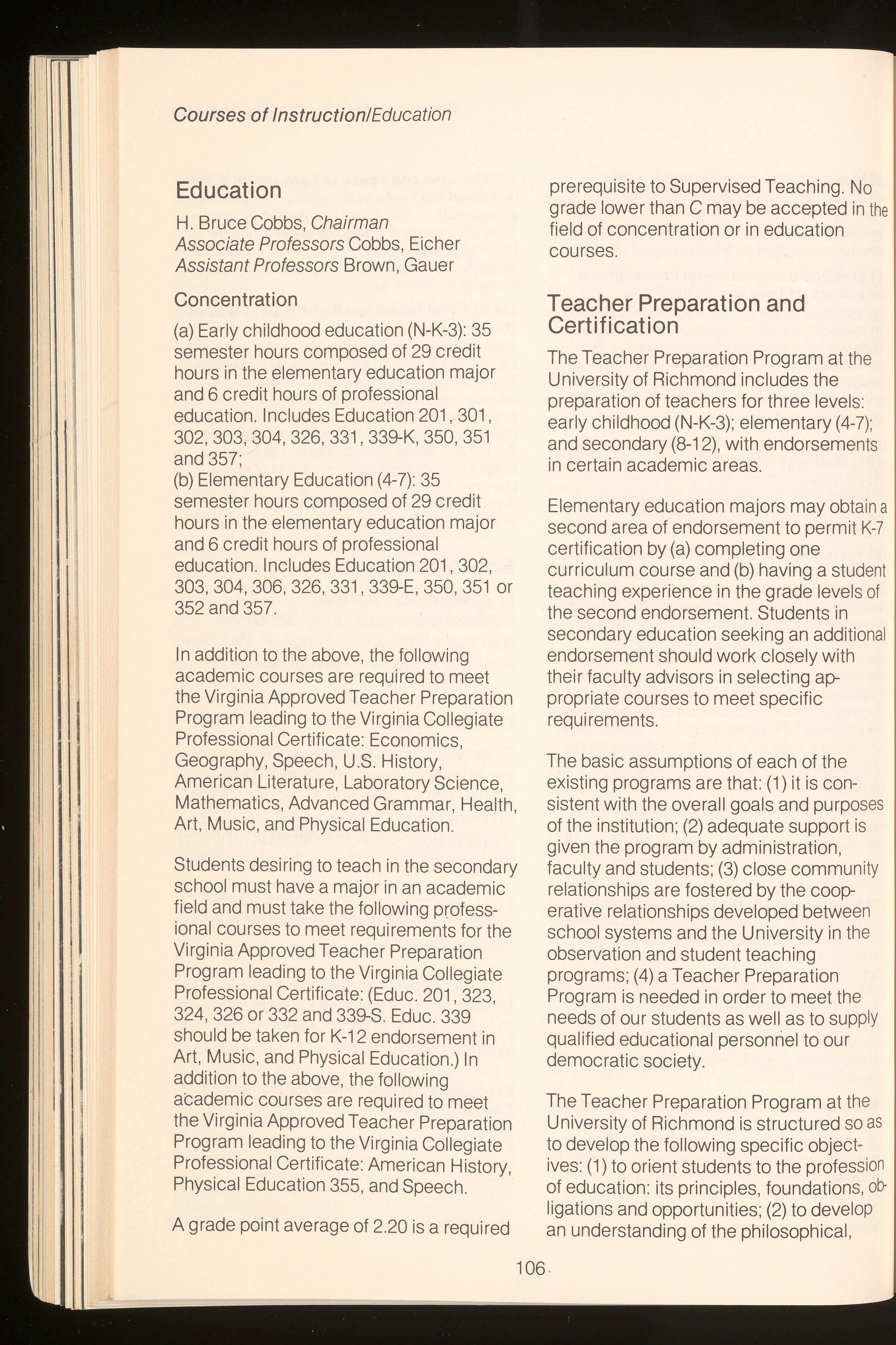
sociological, psychological, and historical foundations of education ; (3) to develop an understanding and appreciation of the school a nd its total program in American society.
State Approved Program of Teacher Education
The initial endorsement of an Approved Teacher Preparation Program of the Virginia State Board of Education was received in 1972 . Since that time , the Department of Education has been granted two 5-yea r periods of Approved Program status. Th e latest Approved Program recognit ion was gained in April of 1980 and will exte nd to May of 1985
The Appro v ed Program permits qualified institutions the rights and responsibilitie s to recomme nd candidates for initial certification . Graduates of approved programs enjoy a re ciprocity of certification with about tw o-thirds of the states.
EarlyChildhood
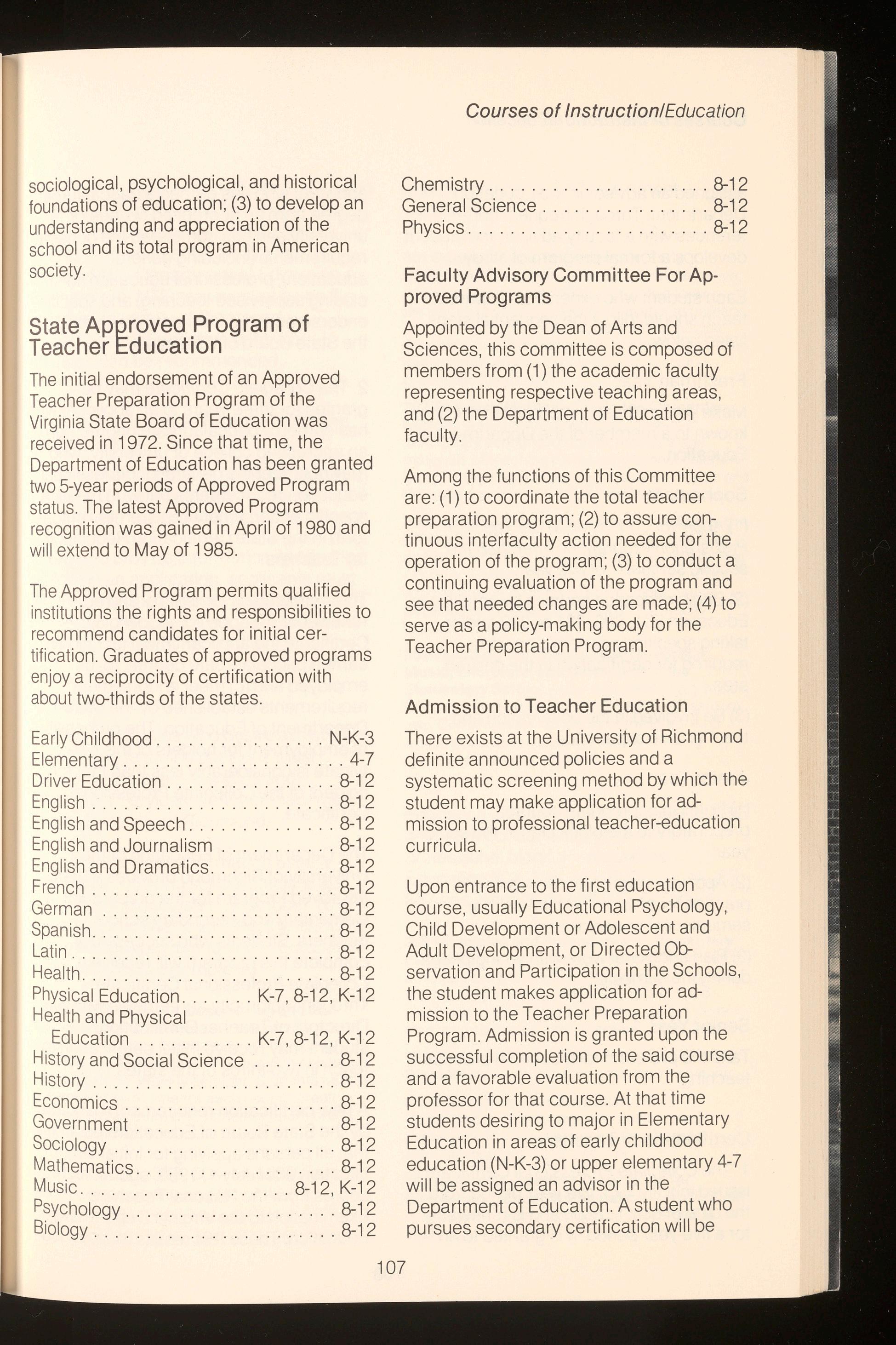
English a nd Speech
English a nd Journalism
English a nd Dramatics
French
8-12
8-12
8-12
8-12
8-12
. 8-12
Coursesof Instruction/Education
Chemistry
8-12
General Science ..... 8-12 Physics ........ 8-12
Faculty AdvisoryCommittee For ApprovedPrograms
Appointed by the Dean of Arts and Sciences , this committee is composed of members from (1) the academic faculty representing respect ive teaching areas, and (2) the Department of Education faculty.
Among the functions of this Committee are : (1) to coordinate the total teacher preparation program; (2) to assure continuous interfaculty action needed for the operation of the program ; (3) to conduct a continuing evaluation of the program and see that needed changes are made ; (4) to serve as a policy-making body for the Teacher Preparation Program .
Admissionto Teacher Education
There exists at the University of Richmond definite announced policies and a systematic screening method by which the studen t may make application for admission to p rofessional teacher -education curricula
German ............ 8-12 Spanish..
8-12
8-12
Health ...... 8-12
Physical Education K-7 8-12 K-12
Health and Phys ica·I
ion
. K-7, 8-12 , K-12
History an d Social Science 8-12
History ...... . 8-12
Economics . ... 8-12
Governmen t 8-12
Sociology . . 8-12
Mathema tics . . 8-12
Music ... ... .....
Psycho lo gy
Biology .
. 8-12 , K-12
8-12
. 8- 12
Upon entrance to the first education course , usually Educational Psychology , Child Development or Adolescent and Adult Development, or Directed Observation and Participation in the Schools , the student makes application for admission to the Teacher Preparation Program. Admi s sion is granted upon the successful completion of the said course and a favo rable evaluation from the professor for that course At that time students desiring to major in Elementary Education in areas of early childhood education (N-K-3) or upper elementary 4-7 will be assigned an advisor in the Department of Education A student who pursues secondary certification will be
Courses of Instruction/Education
assigned an advisor in the Education Department. Through frequent conferences with a faculty adviser, the student develops a formal program of study.
Each student who expects to prepare to teach should follow the sequential steps listed below:
FreshmanYear
Make your interest and possible intentions known to a member of the Department of Education.
SophomoreYear
(1) Apply for admission to the Teacher Preparation Program no later than the second semester of this year
(2) Begin education courses by enrolling in Education 201, 326, 331 or 332 and/or taking specified academic courses required for certification in the desired area.
(3) Be involved in the observation and teacher aide experience
JuniorYear
(1) Enroll in appropriate courses preparatory to the block plan in the senior year.
(2) Apply by March 1 for admission to practice teaching to be taken either semester of the senior year. ·
(3) Plan additional work with young people during the semester
Senior Year
Take the professionalblock with practice teaching.
Certificationof Teachers
1. The Collegiate Professional Certificate is issued initially for a five year period from the date of qualification and is renewable for a five-year period It is granted to an
applicant who has earned a baccalaureate degree from an accredited college or university and has completed the general requirements (including general education), professional education (including supervised teaching) and specific endorsement requirements prescribed by the State Board of Education
2. The Collegiate Certificate may be granted for three years to an applicant who has earned a baccalaureate degree from an accredited college or university, who may not meet the general or professional education requirements but who meets a specific endorsement requirement set forth in the State Certification Regulation for Teachers.
This certificate is temporary and nonrenewable To apply for a Collegiate Certificate the applicant must (a) hold an earned baccalaureate degree; (b) be employed and (c) meet endorsement requirements established by the State Department of Education The probability of employment for holders of this certificate is considerably less than that for holders of the Collegiate Professional Certificate.
The Department of Education of the University of Richmond provides a State Approved Program for the preparation of elementary and secondary school teachers. Students who successfully complete this program will receive a Collegiate ProfessionalCertificate. Through reciprocity agreements with State Directors of Teacher Certification , the student may receive initial certification to teach in two-thirds of the states.
A new certification requirement mandated by the State Board of Education requires that all persons applying for initial certification after July 1, 1980, submit test scores from the National Teachers Examination to the Virginia Department of Education. These test results must include
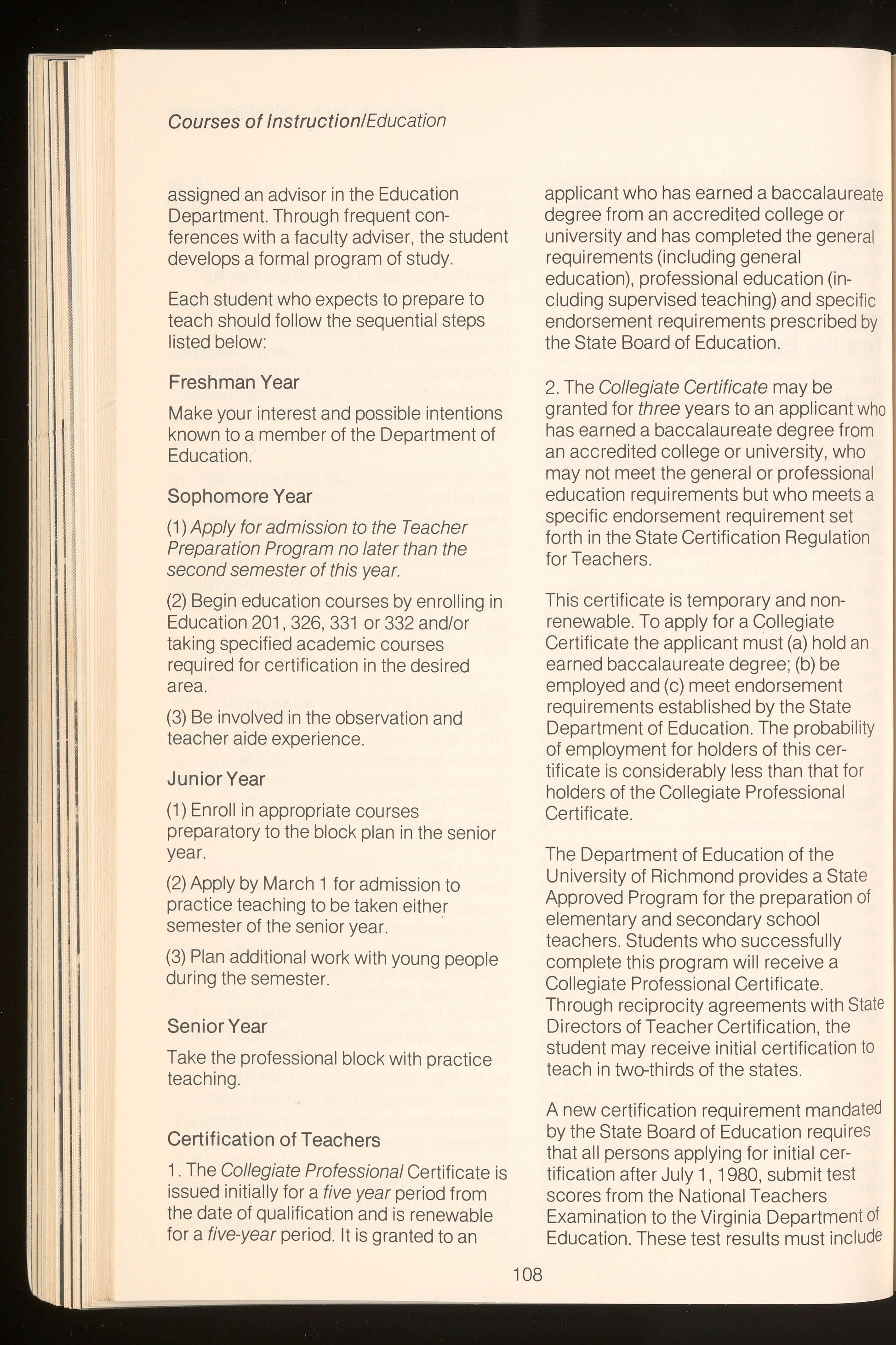

scoresof (a) the Common Examination and (b)an Area Examination for which one is seekingendorsement and is qualified. Scoresare to be sent directly to the VirginiaState Department of Education. Furthermore,NTE scores must be on file with the University of Richmond, Departmentof Education before certificationcan be recommended.
How to Apply For a Virginia Teaching Certificate
A senior may obtain the application forms fromthe University of Richmond Departmentof Education.
In order to provide information needed for actingon an application, applicants must registerwith the Career Planning and PlacementServices' Teacher Placement at the University of Richmond.
Teacher Placement Service
Degreecandidates who desire assistance in obtainingteaching positions must registerwith Career Planning and PlacementServices' Teacher Placement at the University of Richmond.
Inorder to provide information usually neededby inquiring school officials, applicantsshould register by October 10 of theacademic year (including the following summersession)during which graduation requirementsare completed.
201-202-203Directed Observation and Participation in the Schools . -Role of the classroom teacher in grades N-12 , including practical experience in interacting with children in a group setting. Weekly seminar. Students need a two-hour block of time f or each hour of credit desired A max imum of 3 semester hours credit maybe se lected from these courses.
Education301, 303, 304, and 339K are takenconcurrently as part of the professiona l block. Prerequisites: Education301, 326, 331, 350, 351, 357,
Courses of Instruction/Education
and permission of the Department. 1-2-3sem. hrs.
301 Principles and Procedures in Early Childhood Education.- The physical , cognitive , social and emotional needs , interests and experiences of ch ildren of kindergarten and primary age studied as the basis for developing suitab le programs and formulating criteria for the select ion and evaluation of materials and instructional practices. 3 sem. hrs.
302 Teaching Mathematics in the Elementary School.- Mathematics content relevant to elementary school curriculum; methods and materials of teaching elementary school children. Emphasis on developmental nature of children and the concreteness of learning needs. 3 sem. hrs.
303 Teaching Science and Social Studies in the Elementary School.- Topical areas, methods , and instructional aids appropr iate for the teaching of sc ience and social studies explored; practical experiences in developing and demonstrating activities employed. Emphasis on the inquiry process. 3 sem. hrs.
304 Teaching the Integrated Arts-Crafts, Music, Literature, and Movement in the Elementary School.- Development of art , music, literature, and movement activi tie s for classroom use. Contemporary concepts of the integrated a rt s, materials, and processes emphasizing creative expression. 2 sem. hrs.
Education courses 303, 304, 306 and 339E are taken concurrently as part of the professional block. Prerequisites:
Education 302, 326, 331, 350, 351, or 352, 357 and permission of the Department.
306 Principles and Procedures of Elementary Education.-Factors which influence curriculum development and implications of these factors in the learni ng-teaching processes. School and c lassroom organizat ional patterns, lesson planning , and classroom management. 3 sem. hrs.
310 Characteristics of Children with Learning Disabilities.-(See Psychology 31O.)3 sem. hrs
312-313-314 Independent Study in Education.-Special projects and practical experience in education programs. Weekly seminar required. 1-2-3 sem. hrs.
315 Remedial Teaching Techniques for Elementary School Mathematics.-Application of diagnostic techniques and use of remedial approaches and materials. 3 sem. hrs
Courses of Instruction/Education
322 The Exceptional Child.-(See Psychology 322.) 4 sem. hrs.
323 Principles of Secondary Education.Characteristics, objectives and scope of secondary education; its attempts to meet the needs of adolescents through administrative, curricular, and extra class activities; selected court decisions concerning education, especially tort liability of teacher's professional ethics. 3 sem. hrs.*
324 Teaching in the Secondary School.Instructional procedures, discipline, evaluation of pupil progress, participation in the total school program, community responsibilities, professional ethics, criterion-referenced evaluation, micro teaching using videotapes. 3 sem. hrs.*
326 Educational Psychology.-Problems in child development in relation to educational needs and school procedures, with emphasis on the learning process. Includes laboratory experience. Prerequisites: Introduction to Psychology. (See Psychology 326.) 4 sem. hrs.
329 Educational Sociology.-(See Sociology 329.) 3 sem. hrs.
331 Child Development.-(See Psychology 331 ) 4 sem. hrs.
332 Adolescent and Adult Development.-(See Psychology 332 ) 4 sem. hrs.
335 Tests and Measurements.-(See Psychology 335.) 4 sem. hrs.
337 Philosophy of Education.-Philosophical analysis of such concepts as "k nowledge ," "belief," "self," and "society" as applied and used in institutionalized learning. Philosophical systems of primary influence in American education emphasized. 3 sem. hrs.
339 Supervised Teaching.-Directed observation and experience in the classroom; weekly seminar. Written application to take this course must be submitted no later than March 1 of the year preceding this experience The application must be approved by the Department of Education. Students in Secondary Education also must have the approval of their academic department. Prerequisite: (for early childhood education) Education 301, 302, 303, 304; (for elementary education) Education 302, 303, 304.
*Content of Education 323 and 324 is offered in a concentrated combination course (first part of the semester) correlated with Educat ion 339-S (second part of the semester). Prerequisites: Education 326 or 332, and approval of the Department.
306; (for secondary education) Education 326 or 332, 323, and 324; also, a cumulative grade-point average of at least 2.200. 6 sem. hrs.
349 Reading in the Content Fields.-Readi ng content in elementary, middle, and secondary schools. Various reading improvement progra ms, reading tests, new strategies for teaching content, multimedia approach, working with reluctant readers. 3 sem. hrs.
350 The Teaching of Reading.-Reading readiness; techniques to develop basic skills in word analysis; comprehension skills; diagnos tic and remedial techniques; related communications skills. 3 sem. hrs.
351 Children's Literature.-A survey, with emphasis on contemporary material; the place of literature in a child's life; storytelling and creative dramatics; wide reading. 3 sem. hrs.
352 Adolescence and Literature.-(See English 349.) 3 sem. hrs.
355 Techniques of Teaching Children with Learning Disabilities.-Specific methods of dealing with children who have school difficulties in language, mathematics, writing and perceptual tasks; survey of current experimental efforts, interpretation of diagnostic reports, and informal methods teachers might use to diagnose and prescribe. 3 sem. hrs.
357 Diagnosis and Correction of Reading Difficulties.-Factors involved in reading deficiencies; emphasis on practical classroom procedures. 3 sem. hrs.
358 Classroom Management-Behavioral principles and procedures for reducing classroom problems of management or motivation and strengthening desired classroom behavior. Designed to assure teachers that every student can learn. Prerequisite: Psychology 101. 3 sem. hrs.
384 Education of the Disadvantaged Learner.Emphasis on cultural deprivation ; social-cultural forces influencing the functions of public schools; implications for a relevant curriculum. 3 sem. hrs.
386 The Open Classroom.-Strategies of learning centers and self-paced instruction in an informal setting; practices of the British primary schools as applied to an American setting; language experience , and interdisciplinary approach to reading instruction. 3 sem. hrs.
387 Seminar in Drug Education.-ln-depth analysis of drugs , the drug user, and drug-rela ted problems in our society. Emphasis on the teacher's role in assisting students in decisionmaking processes. (See Physical Education 387.) 3 sem. hrs.
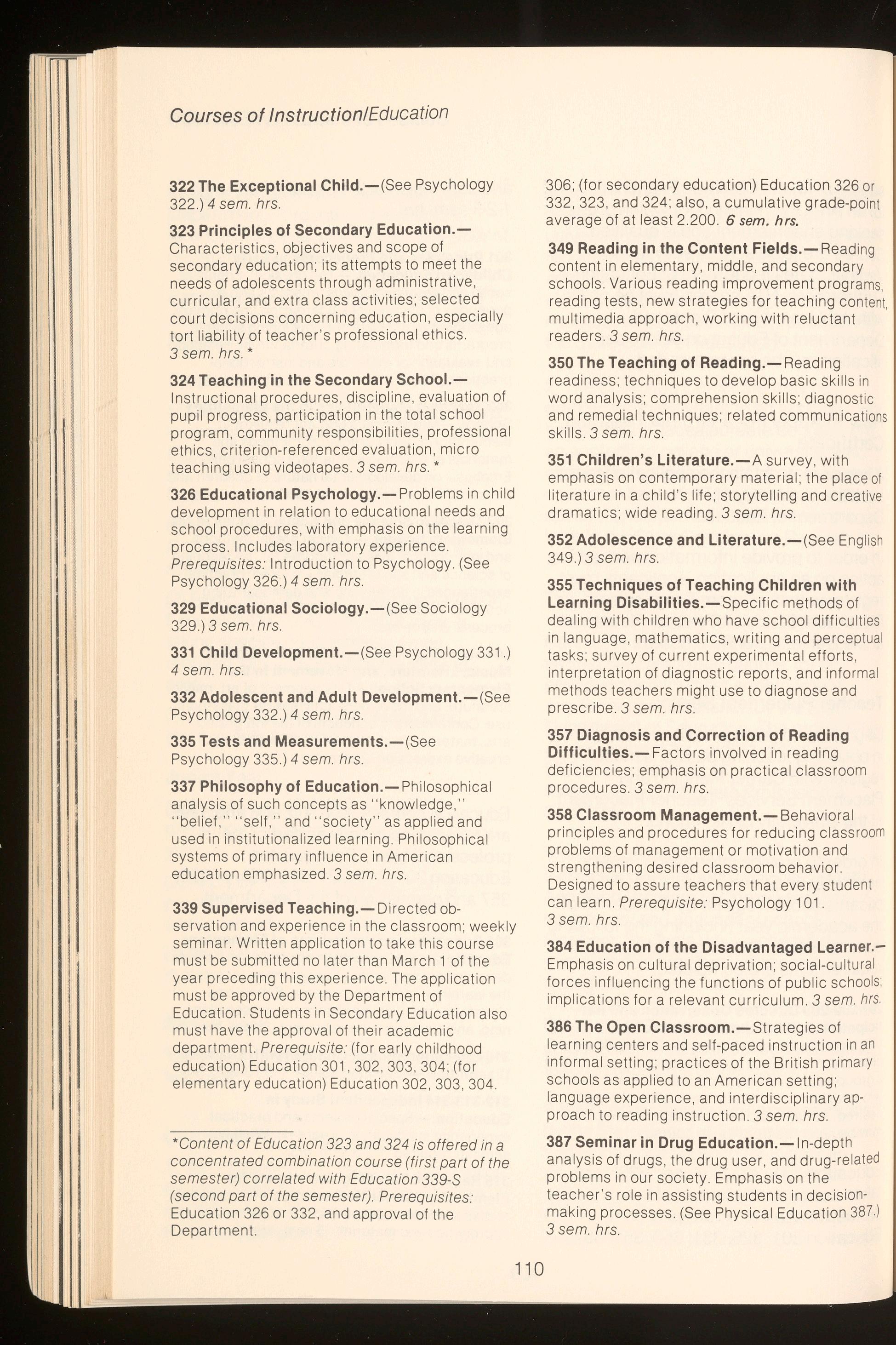

Coursesof Instruction/English
English
Welford D. Taylor, Chairman
ProfessorsBoggs, Brown, Christopher, Penninger, Taylor
AssociateProfessors Bennett, Dickerson, Duckworth, Gunter, Gurney, McMurtry, Oberg
AssistantProfessors Barza, Gregory, Griffin, Hilliard, Loxterman , MacAllister , Nelson, Waxman
Concentration
Thirty semester hours in English, including English 201 and 202 and 24 semester hours in English and philology courses above the 200 level , exclusive of English 350 and including 15 hours of courses from Group Band 3 semester hours in courses from Group C. The 15 hours from Group B must include 3 hours in a major figure and an additional 3 hours in British literature before 1800 (other than a major figure), 3 hours in British literature after 1800, and 3 hours in American literature Twenty-four semester hours in advanced English courses (300-level or above) must be passed with no grade lower than C.
Proficiency requirements in English composition and literature (see page 81) must be satisfied before other courses in the Department are taken. Six semester hours in 200-level English courses are prerequisite to all advanced English courses (specially qualified students may apply to the Chairman of the Department for written permission to take such courses concurrently).
NoEnglish 100-levelcourse may be used to meet distributional requirement Ill. B.
GroupA Courses
Freshmanand SophomoreCourses
101-102Introduction to Expository Writing.Reviewof grammar and mechanics , as needed;
study of rhetoric; practice in basic library research. Writing assignments ordinarily deal with literary subjects; English 101 is prerequisite to 102. 3-3 sem. hrs.
103 Introduction to Expository Writing.Accelerated work in the areas ordinarily covered by English 101-102. Enrollment by Departmental tests only (see page 81 ). 3 sem hrs.
201 Survey of British Literature.-Chronological study of British literature through 1800. 3 sem hrs.
202 Survey of British Literature -Chronological study of British literature after 1800. 3 sem hrs.
205 Selected Readings from Recent Literature in the English Language. - Ideological, moral, social, and aesthetic concerns of representative authors in the English-speaking community. 3 sem hrs.
206 Readings in American Literature.Overview of the major patterns of American literature. 3 sem. hrs.
207 Literature Relevant to Contemporary Issues.- Treatment of issues relevant to the contemporary student in the literature of Englishspeaking peoples, past, and present. 3 sem. hrs.
208 Major Intellectual Currents in Literary History.-Forms of literary expression as infiuenced by the development of ideas in Western culture. 3 sem hrs.
210 Film Studies . - The history of film in America, with attention to the major genres. 3 sem. hrs.
228 Readings in World Drama.-Representative plays, which illustrate traditions in the development of European drama, primarily from ancient to modern times. 3 sem. hrs.
229 Modern Novel.-Selected works of the twentieth century. 3 sem hrs.
230 Women in Modern Literature.- Modern woman's search for identity and struggle for selfrealization through a study of selected figures from nineteenth- and twentieth-century literature. 3 sem hrs.
231 Readings in Black Literature.-Selected works by Black writers include folklore, slave narratives, fiction, autobiography, poetry, and drama. Emphasis on the Black writer in America. 3 sem. hrs.
Group B Courses
Advanced LiteratureCourses (300-level)
300 Chaucer.- The Canterbury Tales, Troilus and Criseyde and the minor poems studied in the context of medieval life and thought. 3 sem. hrs.

Courses of Instruction/English
301 Spenser.- The Faerie Queen, The Shepheardes Calender and minor works. 3 sem. hrs.
303 Shakespeare.-Selected earlier works. 3 sem. hrs.
304 Shakespeare.-Selected later works. 3 sem. hrs.
305 Milton.-Paradise Lost and Samson Agonistes, with minor emphasis upon the short poems. 3 sem. hrs.
306 Later Eighteenth-Century Literature.- The major works of Johnson, Boswell , and their circle, with some attention to countercurrents in such writers as Cowper, Burns , and Paine (1760-1800). 3 sem. hrs.
311 Medieval English Literature.-Principally non-Chaucerian works, with some introduction to Middle English. 3 sem. hrs.
312 Prose and Poetry of the English Renaissance.-Si xteenth-centurywriters, including Skelton, Wyatt, Sidney, Spenser, Nashe, and Deloney. 3 sem. hrs.
314 Seventeenth-Century Literature.-Prose and poetry with an emphasis on John Donne and the Metaphysical School. 3 sem. hrs.
315 Early Eighteenth-Century Literature.Literary backgrounds and influences , major writers and major genres from 1660 to 1760.
3 sem. hrs.
316 The Romantic Movement-Works of Wordsworth, Coleridge, Byron, Shelley, and Keats. Some attention given to th e minor poets of the period. 3 sem. hrs.
317 Victorian Poetry.-Arnold , Tennyson , and Browning studied with some attention to minor poets of the period. 3 sem. hrs.
318 Nineteenth-Century Prose.-Representative essays by major Romantic and Victorian writers studied in relation to intellectual and social trends. 3 sem. hrs.
319 Twentieth-Century Poetry -British and American writers-Auden, Eliot, Frost, Hardy , Housman, Masefield, MacLeish, Robinson , Yeats, and other chosen poets. 3 sem. hrs.
320 Twentieth-Century Prose.-Faulkner , Joyce, D H. Lawrence , and other writers of fiction. 3 sem. hrs.
321 Eighteenth -Century British Novel.-Sur vey of the development of English prose fiction from the beginriing to the eighteenth century through Jane Austen. 3 sem. hrs.
322 Nineteenth-Century British Novel.- The English novel from Scott and the early twentieth century. 3 sem. hrs.
323 Twentieth-Century British Literature.Reflections of modern sensibility in fiction and poetry. 3 sem. hrs.
329 The Aesthetic Movement: From Romantic to Modern.-lmportant literary trends of the lat er nineteenth century related to the Aesthetic Movement, such as Pre-Raphaelitism , Symbolism, and Decadence. 3 sem. hrs.
331 English Drama to the Restoration.-Surve y covering the tropes to the closing of the theaters in 1642. 3 sem. hrs.
332 English Drama from the Restoration to 1900.-Emphasis on Restoration comedy, eighteenth-century sentimental drama, Romanti c lyrical drama , and Victorian transition. 3 sem. hrs.
334 Twentieth-Century British and American Drama.-Survey of such twentieth-century playwrights as Synge, O'Casey, Shaw, Eliot, Fry , Pinter , O'Neill, Saroyan, Wilder, Williams, Miller , and Albee. 3 sem. hrs.
335 Modern Drama.-From Ibsen to the present, including Strindberg, Checkhov, Pirandello , Brecht, O'Neill, and Shaw. 3 sem. hrs.
340 Colonial American Literature.-Literary approach to life and thought in early America. 3 sem. hrs.
341 Nineteenth-Century American Literature .Emphasis on intellectual currents in the poetry and prose of the nineteenth century. 3 sem. hrs.
342 Twentieth-Century American Literature.Development of literary form and thought from the American experience. 3 sem. hrs.
343 The American Novel.-Representative novels from the early nineteenth century to the present. 3 sem. hrs.
344 Current Literature.-Literature of the past 30 years with emphasis on post-war American writers and some influential foreign works. 3 sem. hrs.
345 Literature of the South.-Representative poetry and prose of the Southern states, with attention to cultural, social, and political backgrounds. 3 sem. hrs.
Group C Courses
Language, Writing, and Criticism
347 Development of the American Language.Historical developments and trends in vocabulary, phonology, geographical, and sociological dial ects of the American language. 3 sem. hrs.
351 Modern Grammar.-lntroduction to linguistics, including the theories and practices of structuralists and transformationalists. (Meets
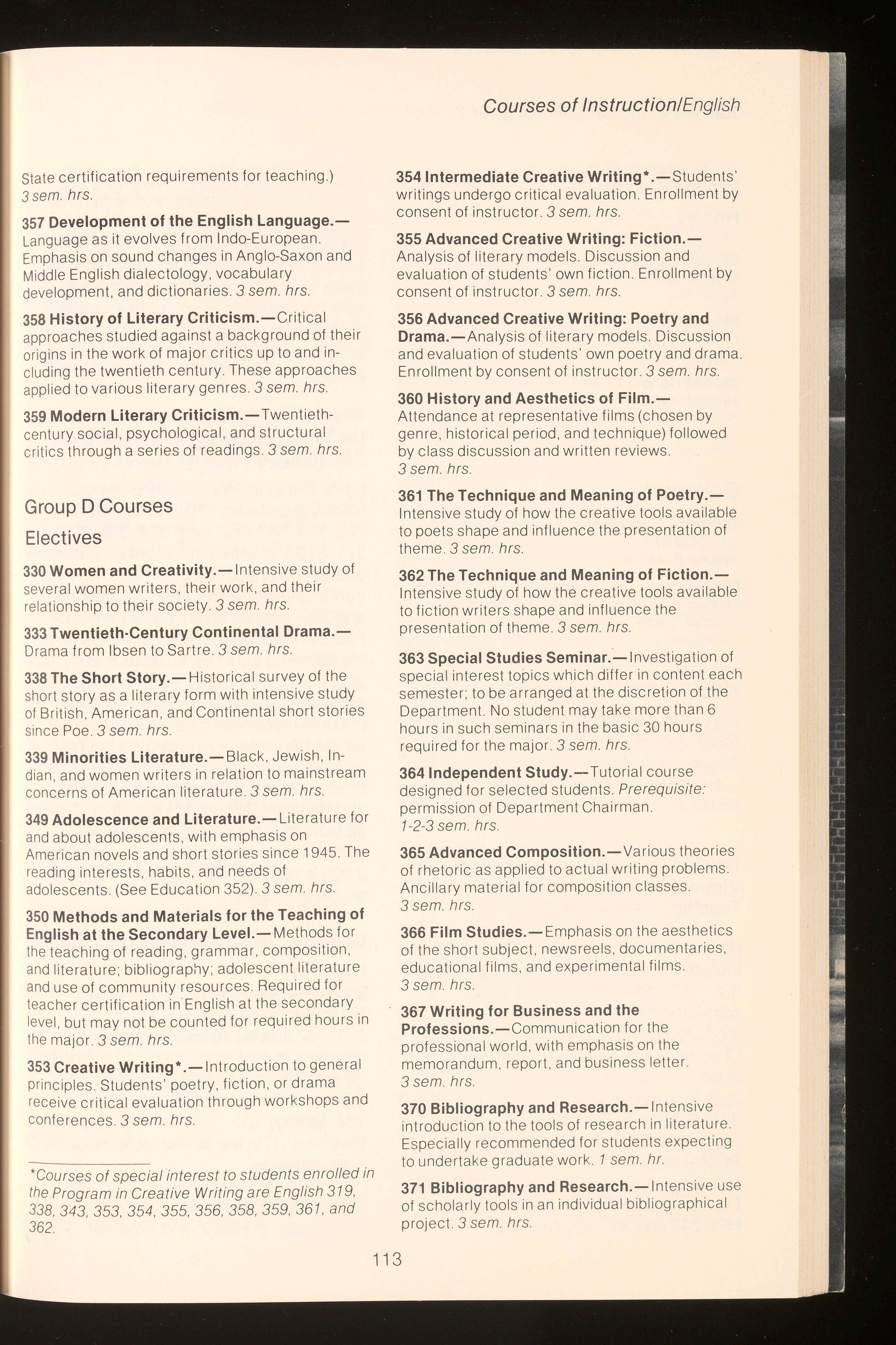
State cer t ifi ca ti o n requ i re m ents f or teach in g.) 3 sem. hrs.
357 Development of the English Language .Language as it ev ol ves from Inda- Europea n. Emphasis o n so und c ha nges in A nglo-Saxo n and Midd le Eng lish d ia lec t o logy, vocabula ry deve lopment, a nd d ict ionar ies 3 sem. hrs.
358 History of Literary Criticism - C riti ca l approaches stud ied against a b ackgro und of the i r origins in t he wo rk o f ma j or c ri tics u p to and including t he twe n tiet h century. T hese app roaches applied to va ri o u s lit erary ge nr es. 3 sem. h rs
359 Modern Literary Criticism.- Twe nt ie t hcentury social , psycho logica l , and structural c ritics throug h a series of read ings. 3 sem. hrs.
Group D Courses
Elect ives
330 Women and Creativity.-l ntensivestudy of several women writers , t hei r work, and the ir relationship t o t hei r society. 3 sem. hrs.
333 Twentieth -Century Continental Drama.Drama from Ibsen to Sartre 3 sem. hrs.
338 The Short Story.-H istorical survey of t he short s tory as a l iterary f or m wi t h inte nsive study of British, A mer ican, an d Conti nenta l sho rt stor ies since Poe. 3 sem. hrs.
339 Minorities Literature.-B lack, Jewish, Indian, a nd women w ri ters in relation to mains t ream concerns of A me ric an li tera t u re. 3 sem. hrs.
349 Adolescence and Literature . - Literature for and about ad olesce n ts, with emphasis on America n novels a nd sho r t sto ries si nce 1945. The reading in terests, hab it s. an d needs of ado lescents (See Education 352) 3 sem. hrs.
350 Methods and Materials for the Teaching of English at the Secondary Level.-M ethods for the teach in g o f read in g , g rammar, composition, and literature ; bibliography; adolescent li terature and use of community resources. Requ i red for teacher ce rtificat io n in English at the secondary level , but may no t be counted f or requ i red hour s in the major 3 sem. hrs.
353 Creative Writing* .-I ntroduction to general princ iples. Stud e n ts' poetry, fiction, o r d rama receive critica l eva lua ti on th ro ugh wo rks hops and conferences. 3 sem. hrs
*Courses of special in terest to students enrolled in the Program in Creative Writing are English 319 , 338, 343 353 , 354,355,356 , 358 , 3 5 9 , 361 , and 362
Courses of Instruction/ Engli sh
354 Intermediate Creative Writing* .- Stud e nt s' w riting s und ergo cr itic a l eval uati on Enro llme nt by co nse n t of ins tru c t o r . 3 sem. hr s
355 Advanced Creative Writing: Fiction.A na lys is of lit era ry mod e ls. Disc u ss io n and evalua t ion of stu d e nt s ' own f ic ti on . Enr ol lme nt by consen t of in st ruc t o r 3 sem. hrs.
356 Advanced Creative Writing: Poetry and Drama.- Ana lysis o f lit erary mo d e ls. Disc ussio n an d eval uatio n of s tud e n ts ' own p oe t ry a nd d ra m a. Enro llm e nt by co nse nt of ins t ructor. 3 sem. hrs.
360 History and Aesthetics of Film.A t tendance at re pr ese ntative f ilm s (c hosen by gen re, h istorical p e r iod , a nd techn ique) fo llowed by c lass di scuss ion an d wr it t en rev iews 3 sem. hrs.
361 The Technique and Meaning of Poetry.Inte nsive s tud y of how t he creative too ls ava ilab le to poets shape a nd inf lue nce t he pr esentation of t heme. 3 sem. hrs.
362 The Technique and Meaning of Fiction.Intens ive stu d y o f how t he c reat ive tools available to fic t io n w r iters s ha pe and in fl ue nce t he pr ese nt a tion o f th e m e. 3 sem. h rs.
363 Special Studies Seminar.-l nvestigation o f specia l in t e rest topics whic h dif f er in content each se m es t e r ; to be a rr a nged at the d iscret ion of t he Depa r t ment No s t ud e nt may t a ke mo re t ha n 6 hours in such semi nars in the basic 30 hours req ui red f or the major 3 sem. hrs.
364 Independent Study.- Tut o ri al course d es ig ned f or se lecte d st ude nt s. Prerequisite· permissio n of Departme n t Chair m a n 1-2-3 sem. hrs
365 Advanced Composition - Various t heories of rhe to ri c as app lied t o actua l w r iti ng p roble m s Anci llary material for compos itio n c lasses. 3 sem. hrs
366 Film Studies.-E mphasison the aest het ics of the short subject, newsree ls, d oc u menta r ies , educat iona l f il ms, and expe ri me n ta l f il ms. 3 sem. hrs
367 Writing for Business and the Professions.- Com m un icat ion f or t he professional wor ld , w it h emphasis on the memoran d um, report, and business letter. 3 sem. hrs
370 Bibliography and Research.-l ntens ive introduction to t he tools of research in li t erature. Espec ially recommended fo r students expecting to undertake graduate work 1 sem. hr.
371 Bibliography and Research . -l ntensive use of scholarly tools in an individual bibliographical pro j ect 3 sem. hrs
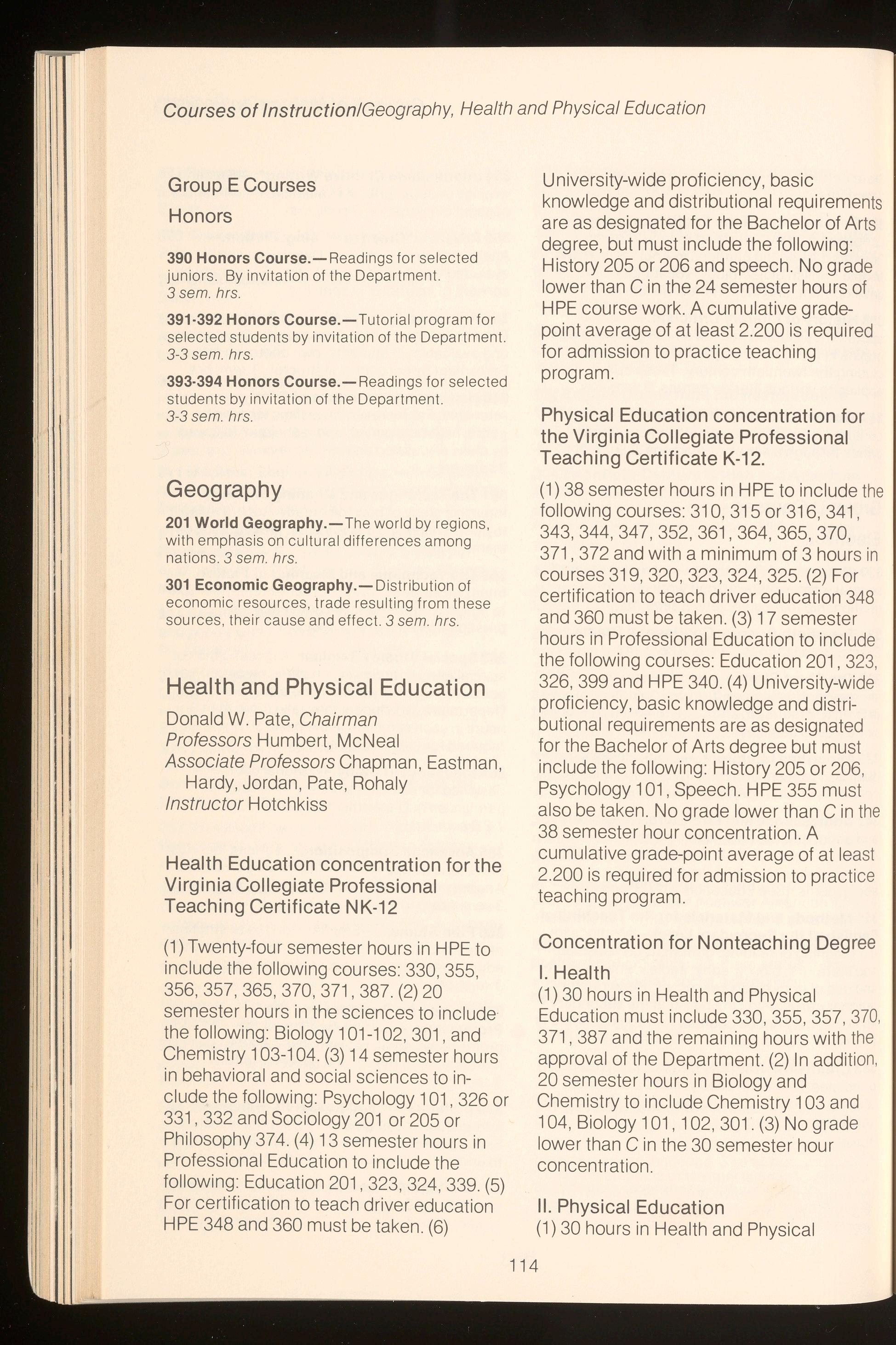
Group E Courses
Honors
390 Honors Course.-Readings for selected juniors. By invitation of the Department. 3 sem. hrs
391-392 Honors Course.-Tutorial program for selected students by invitation of the Department. 3-3 sem. hrs.
393-394 Honors Course.-Readings for selected students by invitation of the Department. 3-3 sem. hrs.
Geography
201 World Geography.- The world by regions , with emphasis on cultural differences among nations. 3 sem. hrs.
301 Economic Geography.-Distribution of economic resources , trade resulting from these sources , their cause and effect. 3 sem. hrs.
Health and Physical Education
Donald W. Pate, Chairman
Professors Humbert, McNeal
Associate Professors Chapman , Eastman, Hardy, Jordan, Pate, Rohaly Instructor Hotchkiss
Health Education concentration for the Virginia Collegiate Professional Teaching Certificate NK-12
(1) Twenty-four semester hours in HPE to include the following courses: 330 , 355 , 356,357,365 , 370,371,387.(2)20 semester hours in the sciences to include the following: Biology 101-102, 301, and Chemistry 103-104. (3) 14 semester hours in behavioral and social sciences to include the following: Psychology 101 , 326 or 331, 332 and Sociology 201 or 205 or Philosophy 374. (4) 13 semester hours in Professional Education to include the following Education 201, 323, 324 , 339. (5) For certification to teach driver education HPE 348 and 360 must be taken. (6)
University-wide proficiency, basic knowledge and distributional requirements are as designated for the Bachelor of Arts degree, but must include the following: History 205 or 206 and speech. No grade lower than C in the 24 semester hours of HPE course work. A cumulative gradepoint average of at least 2.200 is required for admission to practice teaching program.
Physical Education concentration for the Virginia Collegiate Professional Teaching Certificate K-12.
(1) 38 semester hours in HPE to include the following courses: 310 , 315 or 316, 341 , 343,344,347,352,361,364,365 , 370, 371, 372 and with a minimum of 3 hours in courses 319, 320, 323 , 324, 325. (2) For certification to teach driver education 348 and 360 must be taken. (3) 17 semester hours in Professional Education to include the following courses: Education 201, 323, 326 , 399 and HPE 340. (4) University-wide proficiency, basic knowledge and distributional requirements are as designated for the Bachelor of Arts degree but must include the following: History 205 or 206, Psychology 101, Speech. HPE 355 must also be taken. No grade lower than C in the 38 semester hour concentration. A cumulative grade-point average of at least 2.200 is required for admission to practice teaching program.
Concentration for Nonteaching Degree
I. Health
(1) 30 hours in Health and Physical Education must include 330, 355, 357 , 370, 371 , 387 and the remaining hours with the approval of the Department. (2) In addition , 20 semester hours in Biology and Chemistry to include Chemistry 103 and 104, Biology 101 , 102, 301. (3) No grade lower than C in the 30 semester hour concentration.
II. Physical Education
(1) 30 hours in Health and Physical

Education must include 343, 352, 355, 361, 365, 370, 371, 372 and the remaining hours with the approval of the Department. (2) In addition 18 semester hours in related fields, approved by Department Chairman. (3)No grade lower than C in the 30 semester hour concentration.
RequiredPhysical Education Courses forDistributional RequirementDivisionV.
For all bachelor's degrees (except Scholar's Program). Courses graded satisfactory-unsatisfactory : (1) successful completion of the departmental swim test or a course in swimming, (2) 4 semester hours of credit courses in required physical education; 1 hour in P.E. 100-129 and 1 hour in courses P.E. 130 or 150, 2 hours in courses P.E. 200-299. (Athletes who participate in intercollegiate athletics may substitute courses 021 through 048 for 200 level requirement.)
100 Beginning Swimming.-1 sem. hr .
101-129 Required Physical Education.Racquet sport and individual or team sport. 1sem. hr.
120 Special Individual Physical Education.Restricted and corrective activities. Admission only with approval of Department. May be taken in lieu of 100-129. 1 sem. hr.
130 Required Physical Education.Conditioning 1 sem. hr.
150 Special Individual Physical Education .Restricted and corrective activities. Admission only with approva l of Department. May be taken in lieu of PE 130 1 sem. hr.
200-299 Required Physical Education.Prerequisite. P.E . 100-129 , PE 130. 1-1 sem. hr.
229-230 Special Individual Physical Education.-Restricted and corrective activities. Admission only with approval of Department. May be taken in lieu of PE 200-299. 1-1 sem. hr.
Professional Courses
301 History and Techniques of Folk Dance.Taught on block plan during Fall I term Two laboratory hours a week. 1 sem. hr.
Courses of Instruction/History
302 Teaching and Advanced Techniques of Modern Dance.- I sem. hr.
303 Techniques of Swimming.- Theoretical and practical study of the techniques of teaching and coaching competitive swimming, synchronized swimming, and diving. Prerequisite· advanced lifesaving or permission of instructor. 2 sem. hrs.
304 Advanced Judo.-Advanced throwing, pinning, arm locking, and choking techniques as used in the sport of Judo. Teaching techniques and the Japanese language , as related to required Judo terminology. To challenge the student, male and female, in both the mental and physical capacities. The student will be eligible for promotion to the next rank by the United States Judo Association upon satisfactory completion of written and skill tests. Prerequisite: Beginning Judo 2 sem. hrs.
310 Outdoor Education.-An outdoor educational experience in a classroom and wi ld erness setting. It allows the student to gain skills in outdoor living , canoeing, orienteering, and rappelling. 2 sem. hrs.
313 Body Movements.-History and motivation of gestures along with the psychology of movement used to achieve a characterization. Two lecture hours and two laboratory hours a week. Prerequisite: Basic dance , acting course or permission of the instructor. 3 sem. hrs.
314 Analysis and Development of Choreography.- The basis of movement composition from elements of stage movement to expressive dance choreography in a historical, psychological and technical perspective. Prerequisite: Body movement , basic dance , or permission of the instructor 3 sem. hrs.
315 Movement Education for Primary Children.- Teaching methods and materials for the primary age group. Emphasis on the development of basic motor skills. 2 sem. hrs.
316 Movement Curriculum for Elementary Schools.-Selection of implementation of physical education curricular materials for grades K-6 , with appropriate methodology. 2 sem. hrs.
319 Theory of Coaching Interscholastic Football.- Techniques of the basic skills, offensive and defensive theories and practices and rules analysis applied to the secondary school level. 3 sem. hrs.
320 Theory of Coaching Interscholastic Track and Field Athletics.-Established teaching procedures and techniques at the secondary school level as a guide for the high school track coach. 3 sem. hrs.
323 Theory of Coaching Interscholastic Basketball.-Fundamental skills, team com-
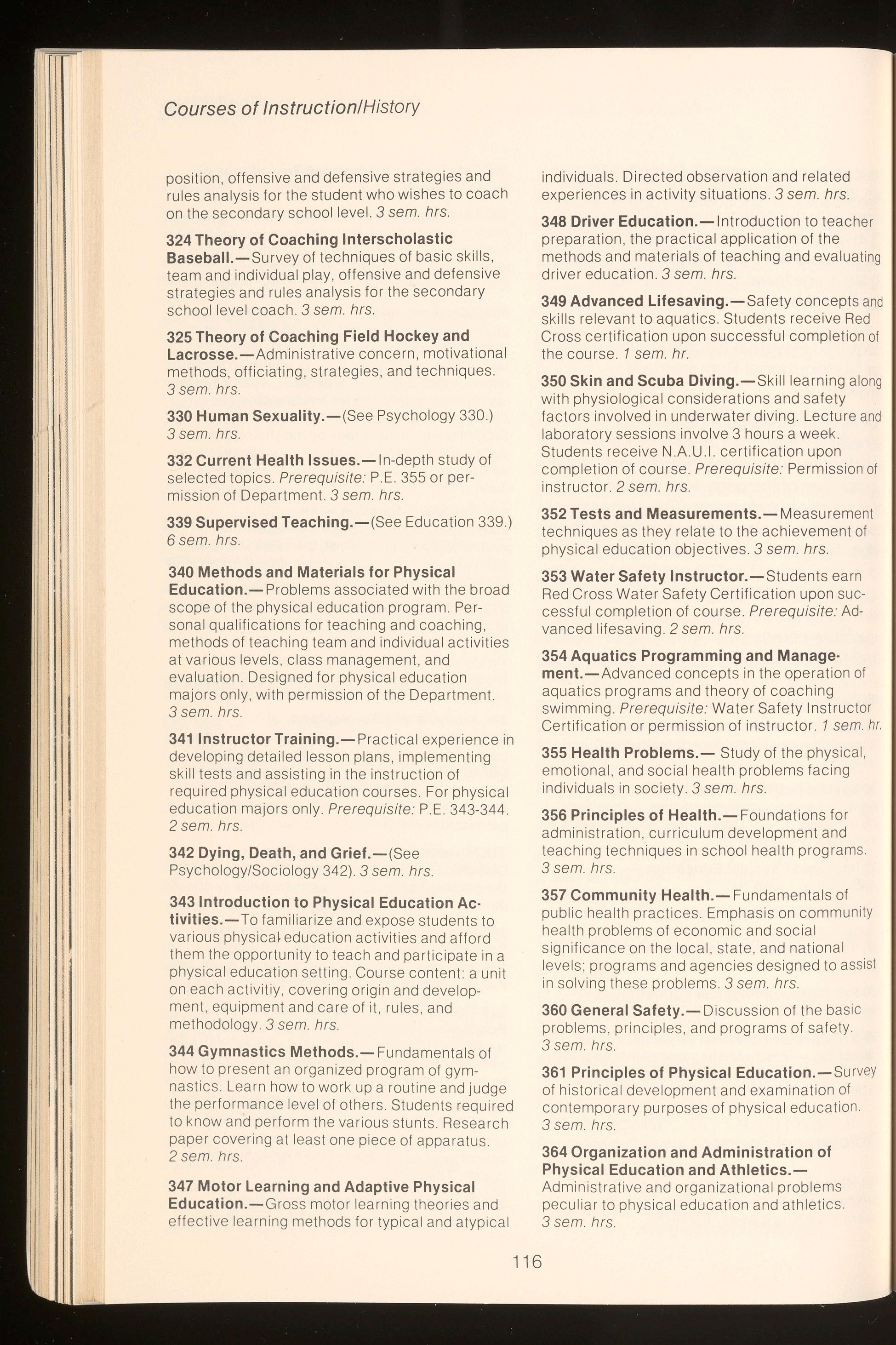
Courses of Instruction/History
position, offensive and defensive strategies and rules analysis for the student who wishes to coach on the secondary school level. 3 sem. hrs.
324 Theory of Coaching Interscholastic Baseball.-Survey of techniques of basic skil ls, team and individual play, offensive and defensive strategies and rules analysis for the secondary school level coach. 3 sem. hrs.
325 Theory of Coaching Field Hockey and Lacrosse.-Administrative concern, motivational methods, officiating, strategies, and techniques. 3 sem. hrs.
330 Human Sexuality.-(See Psychology 330.) 3 sem. hrs.
332 Current Health lssues.-ln-depth study of selected topics Prerequisite: P.E 355 or permission of Department. 3 sem. hrs.
339 Supervised Teaching.-(See Education 339) 6 sem. hrs.
340 Methods and Materials for Physical Education.- Problems associated with the broad scope of the physical education program Personal qualifications for teaching and coaching, methods of teaching team and individual activities at various levels, class management, and evaluation. Designed for physical education majors only, with permission of the Department. 3 sem. hrs.
341 Instructor Training.-Practical experience in developing detailed lesson plans, implementing skill tests and assisting in the instruction of required physical education courses. For physical education majors only. Prerequisite· P.E 343-344. 2 sem. hrs.
342 Dying, Death, and Grief.-(See Psychology/Sociology 342). 3 sem. hrs.
343 Introduction to Physical Education Activities.- To familiarize and expose students to various physica( education activities and afford them the opportunity to teach and participate in a physical education setting. Course content: a unit on each activitiy , covering origin and development , equipment and care of it, rules , and methodology. 3 sem. hrs.
344 Gymnastics Methods.-Fundamentals of how to present an organized program of gymnastics. Learn how to work up a routine and judge the performance level of others. Students required to know and perform the various stunts. Research paper covering at least one piece of apparatus. 2 sem. hrs.
347 Motor Learning and Adaptive Physical Education.-Gross motor learning theories and effective learning methods for typical and atypical
individuals . Directed observation and related experiences in activity situations. 3 sem. hrs.
348 Driver Education.- lntroductionto teacher preparation, the practical application of the methods and materials of teaching and evaluating driver education. 3 sem. hrs.
349 Advanced Lifesaving.-Safety concepts and skills relevant to aquatics. Students receive Red Cross certification upon successful comp letion of the course. 1 sem. hr.
350 Skin and Scuba Diving.-Skill learning along with physiological considerations and safety factors involved in underwater diving. Lecture and laboratory sessions involve 3 hours a week. Students receive NAU.I. certification upon completion of course. Prerequisite: Permission of instructor. 2 sem. hrs.
352 Tests and Measurements.- Measurement techniques as they relate to the achievement of physical education objectives. 3 sem. hrs.
353 Water Safety lnstructor.-Students earn Red Cross Water Safety Certification upon successful completion of course. Prerequisite: Advanced lifesaving. 2 sem. hrs.
354 Aquatics Programming and Management-Advanced concepts in the operation of aquatics programs and theory of coaching swimming Prerequisite: Water Safety Instructor Certification or permission of instructor. 1 sem. hr
355 Health Problems.- Study of the physical , emotional, and social health problems facing individuals in society 3 sem. hrs.
356 Principles of Health.- Foundations for administration, curriculum development and teaching techniques in school health programs. 3 sem. hrs.
357 Community Health.- Fundamentals of public health practices. Emphasis on communit y health problems of economic and social significance on the local , state, and national levels; programs and agencies designed to assist in solving these problems 3 sem. hrs.
360 General Safety.- Discussion of the basic problems, principles , and programs of safety. 3 sem. hrs.
361 Principles of Physical Education.-Survey of historical development and examination of contemporary purposes of physical education 3 sem. hrs.
364 Organization and Administration of Physical Education and Athletics.Administrative and organizational problems peculiar to physical education and athletics 3 sem. hrs.
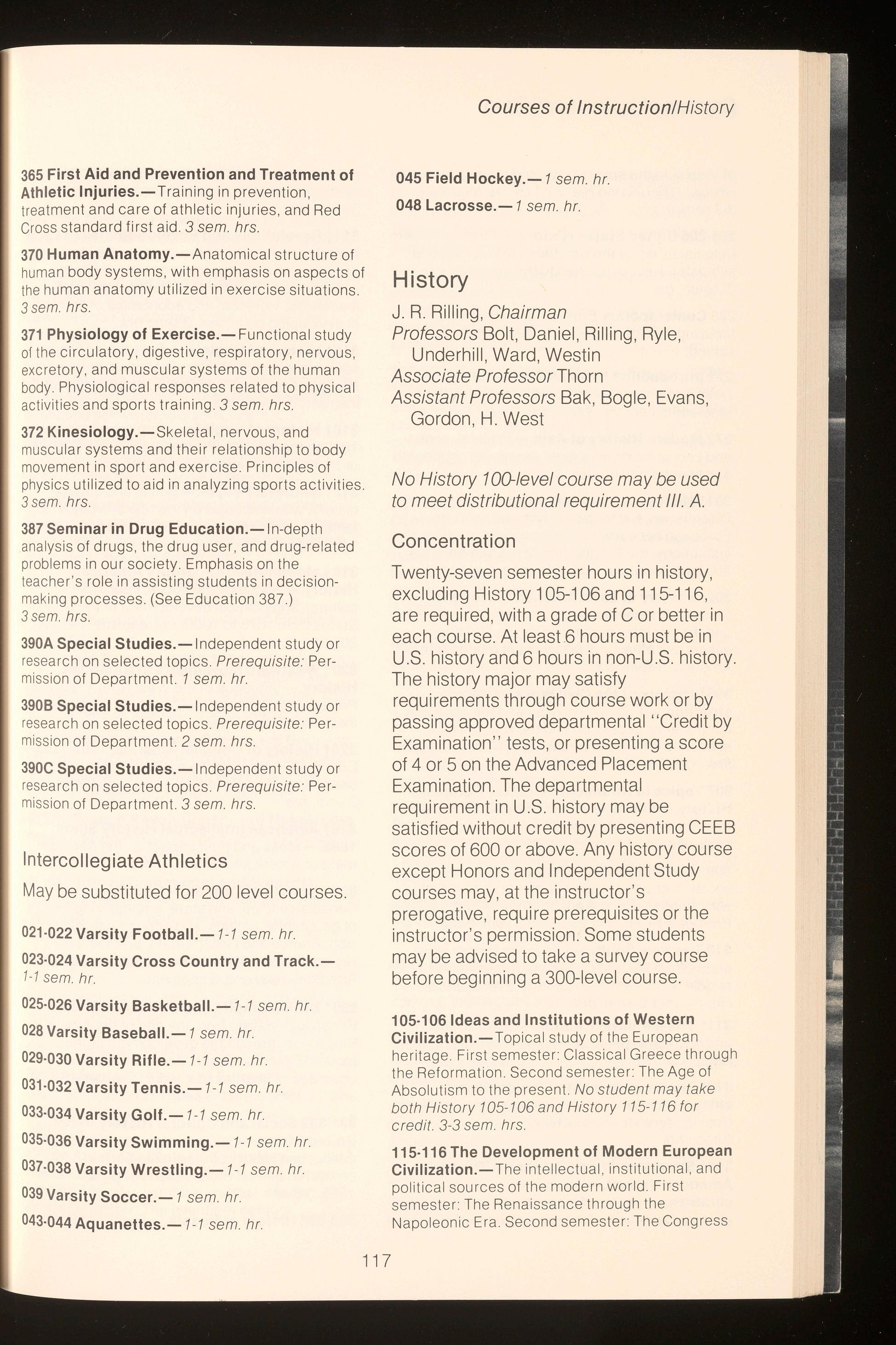
365 First Aid and Prevention and Treatment of Athletic Injuries.- Training in prevention, treatment and care of ath letic injuri es, and Red Cross standard first aid. 3 sem. hrs.
370 Human Anatomy . -Anatomical structu re of human body systems, with emp ha sis on aspec t s of the human anatomy utilized in exercise situations. 3 sem. hrs.
371 Physiology of Exercise.- Fun ctional study of the circulatory, digestive , respiratory, nervous, excretory, and muscular systems of the human body. Physiological responses related to physical activities and sports training 3 sem. hrs.
372 Kinesiology.-Skeletal, nervous, and muscular systems and their relationship to body movement in sport and exercise. Principles of physics utilized to aid in ana lyzing sports activities. 3 sem. hrs.
387Seminar in Drug Education.- In-depth analysis of drugs , the drug user , and drug-related problems in our society. Emphasis on the teacher's role in assisting students in decisionmaking processes. (See Education 387 ) 3sem. hrs.
390ASpecial Studies.- Independent study or research on selected topics Prerequisite. Permission of Department. 1 sem. hr.
390BSpecial Studies.- Independent study or research on selected topics. Prerequisite: Permission of Department. 2 sem. hrs.
390CSpecial Studies.- Independent study or research on selected topics. Prerequisite: Permission of Department. 3 sem. hrs.
Intercollegiate Athletics
May be substituted for 200 level courses.
021-022 Varsity Football.-/ -/ sem. hr.
023-024Varsity Cross Country and Track.I-/ sem. hr.
025-026Varsity Basketball.- /-/ sem. hr.
028Varsity Baseball.- / sem. hr.
029-030Varsity Rifle.- /- I sem. hr.
031-032Varsity Tennis.- I-/ sem. hr.
033-034Varsity Golf.- I-/ sem. hr.
035-036Varsity Swimming - /-/ sem. hr.
037-038Varsity Wrestling.-/-/ sem. hr.
039Varsity Soccer . - I sem. hr.
043-044Aquanettes.-1-/ sem. hr.
Courses of Instruction/History
045 Field Hockey.- I sem. hr.
048 Lacrosse.-/ sem. hr.
History
J R. Rilling , Chairman
Professors Bolt , Daniel , Rilling , Ryle, Underhill, Ward, Westin
Associate Professor Thorn
Assistant Professors Bak , Bogle , Evans , Gordon, H . West
No History 100-level course may be used to meet distributional requirement Ill. A.
Concentration
Twenty-seven semester hours in history , excluding History 105-106 and 115-116, are required, with a grade of C or better in each course. At least6 hours must be in U .S. history and 6 hours in non-U S. history. The history major may satisfy requirements through course work or by passing approved departmental ''Credit by Examination" tests, or presenting a score of 4 or 5 on the Advanced Placement Exa mination. The departmental requirement in U.S. history may be satisfied without credit by presenting CEEB scores of 600 or above. Any history course except Honors and Independent Study courses may , at the instructor 's prerogative, require prerequisites or the instructor's permission. Some students may be advised to take a survey course before beginning a 300-level course.
105-106 Ideas and Institutions of Western Civilization.- Topical study of the European heritage. First semester: Classical Greece through the Reformation. Second semester: The Age of Absolutism to the present. No student may take both History 105-106 and History 115-116 tor credit. 3-3 sem. hrs.
115-116 The Development of Modern European Civilization.- The intellectua l , in stitutional, and political sources of the modern world. First semester: The Renaissance through the Napoleonic Era. Second semester: The Congress
Courses of Instruction/History
of Vienna to the present. No student may take both History 105-106 and History 115-116 for credit. 3-3 sem. hrs.
205-206 United States History . -First semester: Colonial America through the Civil War. Second semester Reconstruction to the present. 3-3 sem. hrs.
228 Contemporary Problems.-Discussion focusing on current issues in their historical setting. 1 sem. hr.
271 Introduction to Asian Civilization.Development of Orienta l civilization up to the nineteenth century. 3 sem. hrs.
272 Modern History of Asia.-Political, social, and economic deve lopment during the nineteenth and twentieth centuries. 3 sem. hrs.
301 * History of Latin America to 1810.Discoveries, Native popu lation and cultures, European background, the conquest, transfer of institutions , the Enlightenment in Latin America, and background to independence. 3 sem. hrs.
302* History of Latin America Since 1810.Study of independence movements, their legacy and the interplay of personality, institutions, events and ideals in the making of modern Latin America. 3 sem. hrs.
305* History of the Civil War and Reconstruction.-Focus on slavery and the sectional controversy, secession and the war: political , economic and social problems of Reconstruction. Prerequisite History 205-206. 3 sem. hrs.
307 Topics in Nineteenth-Century European History.- Intensive study of historical problems from the period 1815 to 1914 , selected on the basis of student interest. 3 sem. hrs.
309* The Old South.-Political, economic, social, and cultural developments in the South, with emphasis on the period from 1790 to 1850. Prerequisite· History 205-206. 3 sem. hrs.
310 The New South.-Life in the former slave states from the end of Reconstruction to the middle of the twentieth century Prerequisite History 206. 3 sem. hrs.
311 t The Medieval Church.-Cultural, social, and political aspects of religious life in the Middle Ages. 3 sem. hrs.
312* The Development of Feudal Monarchies.-Political history and institutional change from the tenth to the fourteenth centuries. 3 sem. hrs.
313t Slavery and Race Relations: The Latin American Variant-Slavery and race in comparative perspective. Race mixture, economics of slavery, Catholic and Iberian influence , the myth of
racial democracy, race versus class, racial ideologies and the search for national identity 3 sem. hrs.
314t Revolutions and Revolutionaries in Latin America.-Revolutionary change: the causes, the process and the consequences in twentiethcentury Mexico, Cuba, and Bolivia. Ideologies, leadership, violence, and economics of revolution • in developing countries. 3 sem. hrs.
315t History of Virginia.-Political, economic , social, and cu lt ural history in Virginia before 1800. Prerequisite· History 205-206 or permission of instructor. 3 sem. hrs.
316t History of Virginia.-Virginia history from 1800 to the present. Prerequisite. History 205-206 or permission of instructor. 3 sem. hrs.
317* Medieval People.-Social and cultural history, with emphasis on the role of women , the family, and popular movements between 600 and 1400. 3 sem. hrs.
319 Late Nineteenth-Century American History.-Focus on the social, economic, cultura l , and political development of the United States from 1875 to 1900. Prerequisite. Histor y 205-206. 3 sem. hrs.
320* Westward Movements in American History.-lnfluence of the West from 1776-1893 Prerequisite· History 205-206 or permission of instructor. 3 sem. hrs.
323t History of Colonial America, 1607-1763.Colonial history from the earliest British settlements to the end of the French and Indian War 3 sem. hrs.
326t American Intellectual History Since 1865.-ldeas and their impact on the develo p· ment of American life. 3 sem. hrs.
328* History of Canada.-Development of Canadian society and state, emphasizing factors of geog raphy, politics, and econom ics; influ ences from France and Great Britain, problems of regionalism and nationalism, and CanadianAmerican relations. 3 sem. hrs.
330* British Empire and Commonwealth .British imperialism from the end of the Ameri can Revolution through the development of the modern Commonwealth. Areas of principal coverage will be Canada, India, Australia, Africa, and the Middle East. 3 sem. hrs
331-332 Social and Cultural History of the United States.-Social, religious, cultural, and intellectual history of the United States. First semester: before 1865: second semester: after 1865.3-3 sem. hrs.
333-334 History of Russia.-First semester
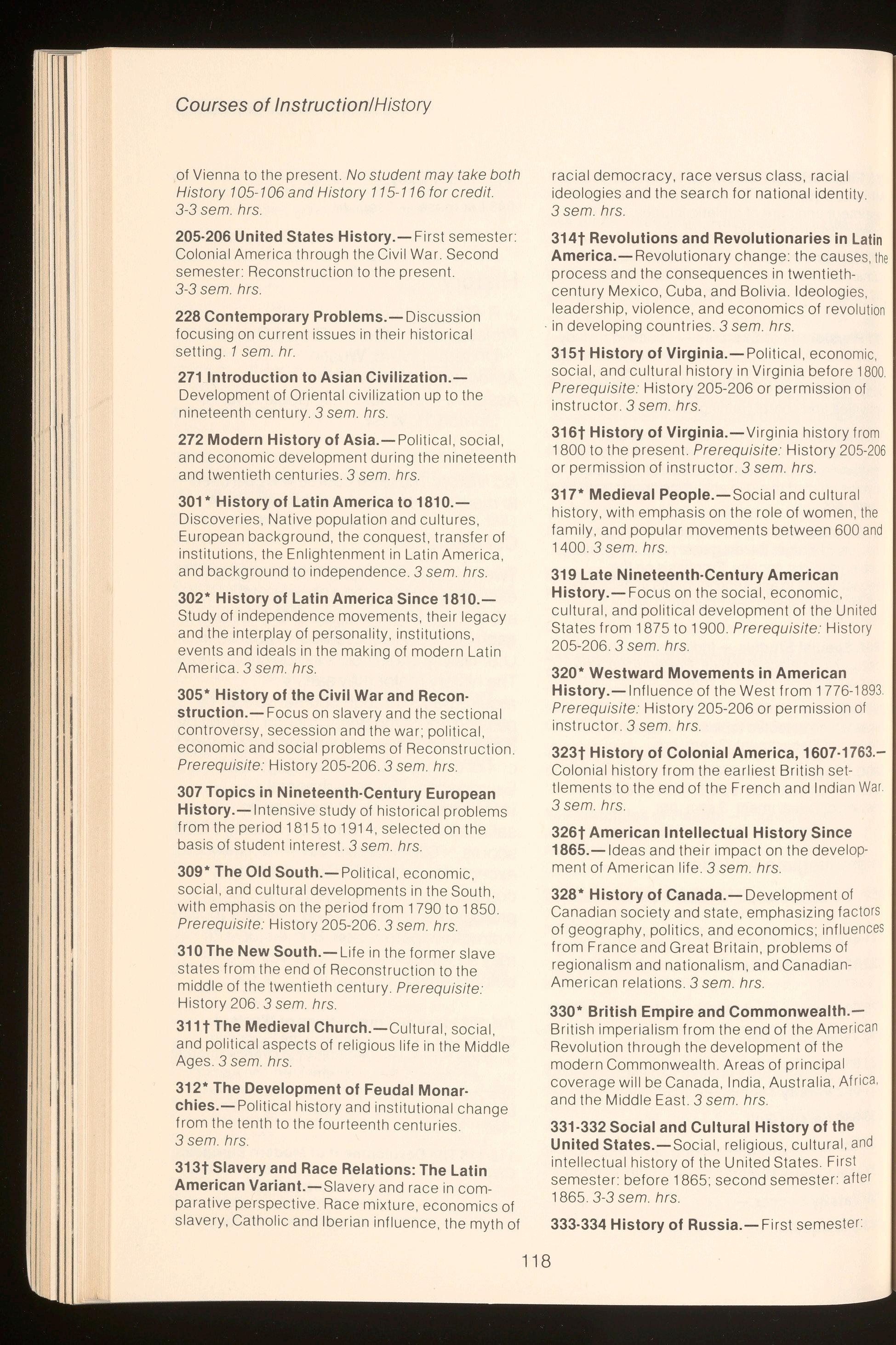
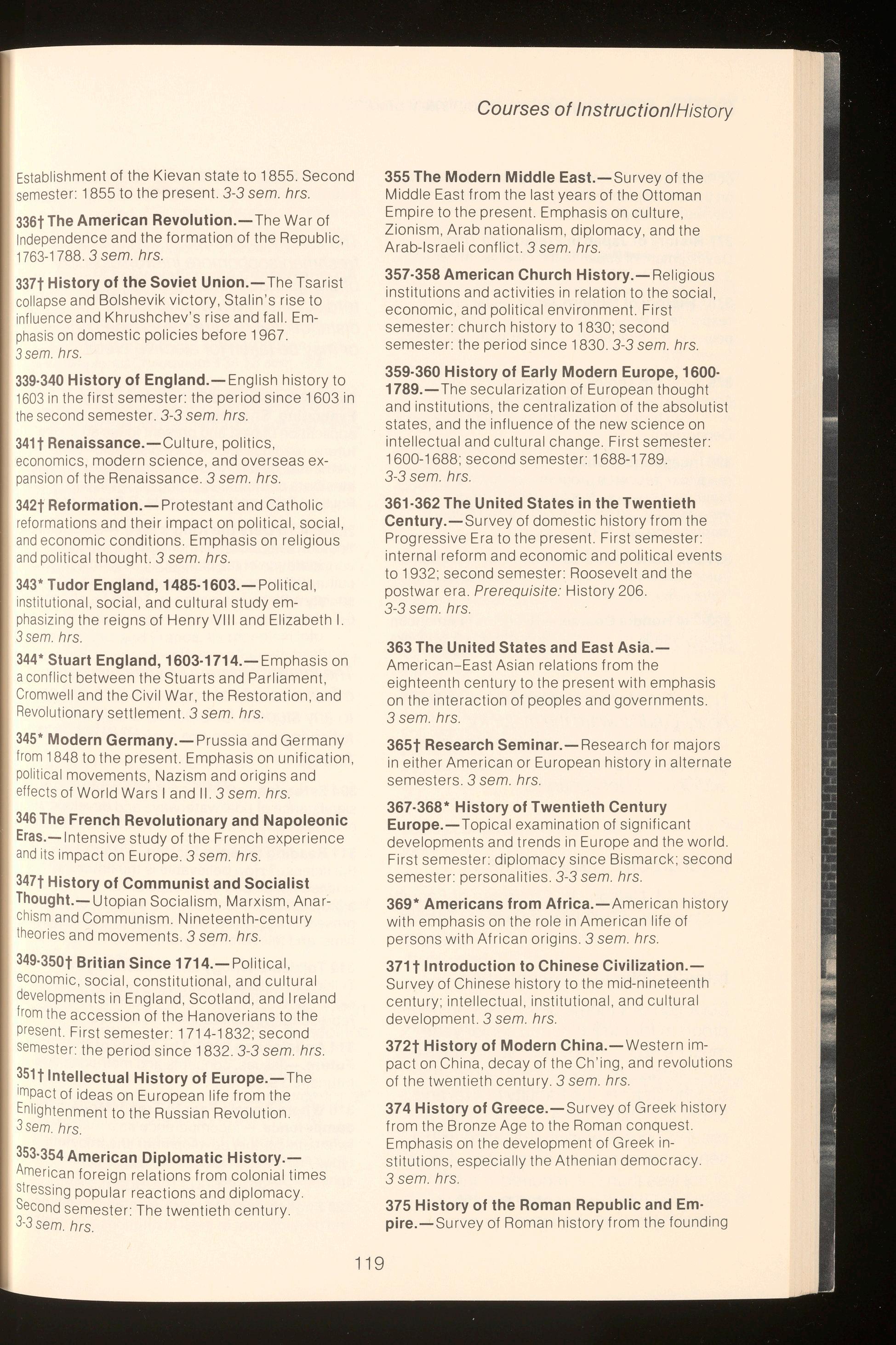
Establishment of the Kievan state to 1855. Second semester: 1855 to the present. 3-3 sem. hrs.
336t The American Revolution.- The War of Independence and the formation of the Republic, 1763-1788.3 sem. hrs.
337t History of the Soviet Union.- The Tsarist collapse and Bolshevik victory, Stalin's rise to influence and Khrushchev's rise and fall. Emphasison domestic policies before 1967. 3 sem. hrs.
339-340History of England.-English history to 1603in the first semester: the period since 1603 in the second semester. 3-3 sem. hrs.
341t Renaissance.-Cultu re, politics, economics, modern science, and overseas expansionof the Renaissance. 3 sem. hrs.
342t Reformation.-Protestant and Catholic reformations and their impact on political, social, and econom ic conditions. Emphasis on religious and political thought. 3 sem. hrs.
343*Tudor England, 1485-1603.-Political, institutional, social, and cultural study emphasizing the reigns of Henry VI 11and Elizabeth I. 3sem. hrs.
344* Stuart England, 1603-1714.-Emphasis on a conflict between the Stuarts and Parliament, Cromwell and the Civil War, the Restoration, and Revolutionary settlement. 3 sem. hrs.
345* Modern Germany.-Prussia and Germany from 1848 to the present. Emphasis on unification, political movements, Nazism and origins and effects of World Wars I and 11.3 sem. hrs.
346The French Revolutionary and Napoleonic Eras.-lntensive study of the French experience and its impact on Europe. 3 sem. hrs.
347t History of Communist and Socialist Thought-Utopian Socialism, Marxism, Anarchism and Communism. Nineteenth-century theories and movements. 3 sem. hrs.
349-350tBritian Since 1714.-Political, economic, social, constitutional, and cultural developments in England, Scotland, and I re land from the accession of the Hanoverians to the present. First semester: 1714-1832; second semester the period since 1832.3-3 sem. hrs.
351t Intellectual History of Europe.- The impact of ideas on European life from the Enlightenment to the Russian Revolution. 3sem. hrs.
353-354American Diplomatic History.American foreign relations from colonial times stressing popular reactions and diplomacy. Secondsemester: The twentieth century. 3-3sem. hrs.
Courses of Instruction/History
355 The Modern Middle East-Survey of the Middle East from the last years of the Ottoman Empire to the present. Emphasis on culture, Zionism, Arab nationalism , diplomacy, and the Arab-Israeli conflict. 3 sem. hrs.
357-358 American Church History.-Religious institutions and activities in relation to the social, economic, and political environment. First semester: church history to 1830; second semester: the period since 1830.3-3 sem. hrs.
359-360 History of Early Modern Europe, 16001789.- The secularization of European thought and institutions, the centralization of the absolutist states, and the influence of the new science on intellectual and cultural change. First semester: 1600-1688; second semester: 1688-1789. 3-3 sem. hrs.
361-362 The United States in the Twentieth Century.-Survey of domestic history from the Progressive Era to the present. First semester: internal reform and economic and political events to 1932; second semester: Roosevelt and the postwar era. Prerequisite: History 206. 3-3 sem. hrs.
363 The United States and East Asia.American-East Asian relations from the eighteenth century to the present with emphasis on the interaction of peoples and governments. 3 sem. hrs.
365t Research Seminar.-Research for majors in either American or European history in alternate semesters. 3 sem. hrs.
367-368* History of Twentieth Century Europe.- Topical examination of significant developments and trends in Europe and the world. First semester: diplomacy since Bismarck; second semester: personalities. 3-3 sem. hrs.
369* Americans from Africa.-American history with emphasis on the role in American life of persons with African origins. 3 sem. hrs.
371 t Introduction to Chinese Civilization.Survey of Chinese history to the mid-nineteenth century; intellectual, institutional, and cultural development. 3 sem. hrs.
372t History of Modern China.-Western impact on China, decay of the Ch'ing, and revolutions of the twentieth century. 3 sem. hrs.
374 History of Greece.-Survey of Greek history from the Bronze Age to the Roman conquest. Emphasis on the development of Greek institutions, especially the Athenian democracy. 3 sem. hrs.
375 History of the Roman Republic and Em• pire.-Survey of Roman history from the founding
Courses of Instruction/Interdi scip linary Studies
of Rome to the col lapse of the Empire Emphasis on the development of Roman institutions from city state to emp ir e. 3 sem. hrs.
377 History of Japan in Premodern Times.Development of Japan to the nineteenth century. 3 sem. hrs.
378* History of Modern Japan -J apan's response to Western pressures and rise to world power in the nineteenth and twentieth centuries 3 sem. hrs.
379 Selected Topics.-E xamples include American biography, the role o f women in American history a nd others as arranged by the Department. 1-3 sem. hrs.
390 Independent Study.- Individually designed reading or research program conducted under faculty supervision. Not for Honors credit. Prerequisites: 18 hours in history and Departmental approval. 1-3 sem. hrs.
391-392 Honors Course.-S eminar in English or European history; seminar in Unit ed St ates history 3-3 sem. hrs.
393-394 Honors Course.-R eadings in American hi s tory ; readings in European hi s tory 3-3 sem. hrs.
Note: The History Department grants 3 hours credit toward the major for departmentally approved Interdisciplinary Studies. See Colloquium Program for additional history courses.
Interdisciplinary Studies
Robert M. Nel son, Jr , Chairman of Faculty Committee for Interdisciplinary Studies.
Interdisciplinary Concentration
Selection of a theme plus an acceptable program for the junior and senior year must be approved by two faculty advisers , the Interdi sc iplin ary Studies Committee and the Dean of the Faculty of Arts and Sciences. Thirt y semester hours of applicable course work culminating with a senior thesi s must be completed A grade of not less than C is required in the 30 semester hours presented to fulfill the concentration (See page 85)
398-399 Senior Thesis -For s tudents in th e Int e rdisciplinary Concentration. 1 ½- 1 ½ sem hrs.
The following courses are typical of the freshman/sophomore interdisciplinary offerings. Each fulfills part of the interdisciplinary alternative to the distributional requirements (see page 82) or may be taken for elective credit.
201-202 Probing the Future: Inquiring, Evaluating, Shaping.-Anal ysis and practi cal appl ication o f past and present ideas about the future ; readings and lecture-discussion complemented by field and lab s tudi es. Team-tau ght by members of the Biology, Engli sh, Philosophy , and Political Science Departments. 6-7 sem. hrs.
203-204 To Defy the King's Men.-An attempt lo " put the self back together again" through a consideration of the biological , psychological , and cultural development of the individual in relation to society and the environme nt. Team-taught course . 6-7 sem. hrs.
The Interdisciplinary Studies program offers a variety of courses which are open to any student for elective credit only. The following courses are typical of the offerings.
304 Estuaries.-Biologi cal and cultural significance of tid al waterways and developm ent of an appropriate environmental ethic. 3 sem. hrs
311 Reading Science Fiction.-H ow accur ate is the science? How believabl e is th e fiction? Is science fiction only an escape or does it represent a projection for the future and a mirror of the present? Discussion of science-fiction literat ure, films, and television programs 3 sem. hrs.
312 Tolkien's Trilogy and Modern Myth.Tolkien 's works used as a vehicle for exploring significant myths , motifs, and cultural them es from representativ e civiliza ti ons. 3 sem. hrs.
314 Anticipating 2000: The Study of the Future.-l ssues, concepts and methodologi es ol futurism 3 sem. hrs.
316 Where Angels Fear to Tread: Modern In· competence.- Incompetence as a major force in twentieth-century development. In competent types analyzed in social, religious, and polit ical sphe re s. 3 sem. hrs.
328 English Legal History.-Sur vey of the rise and development of legal institutions and common
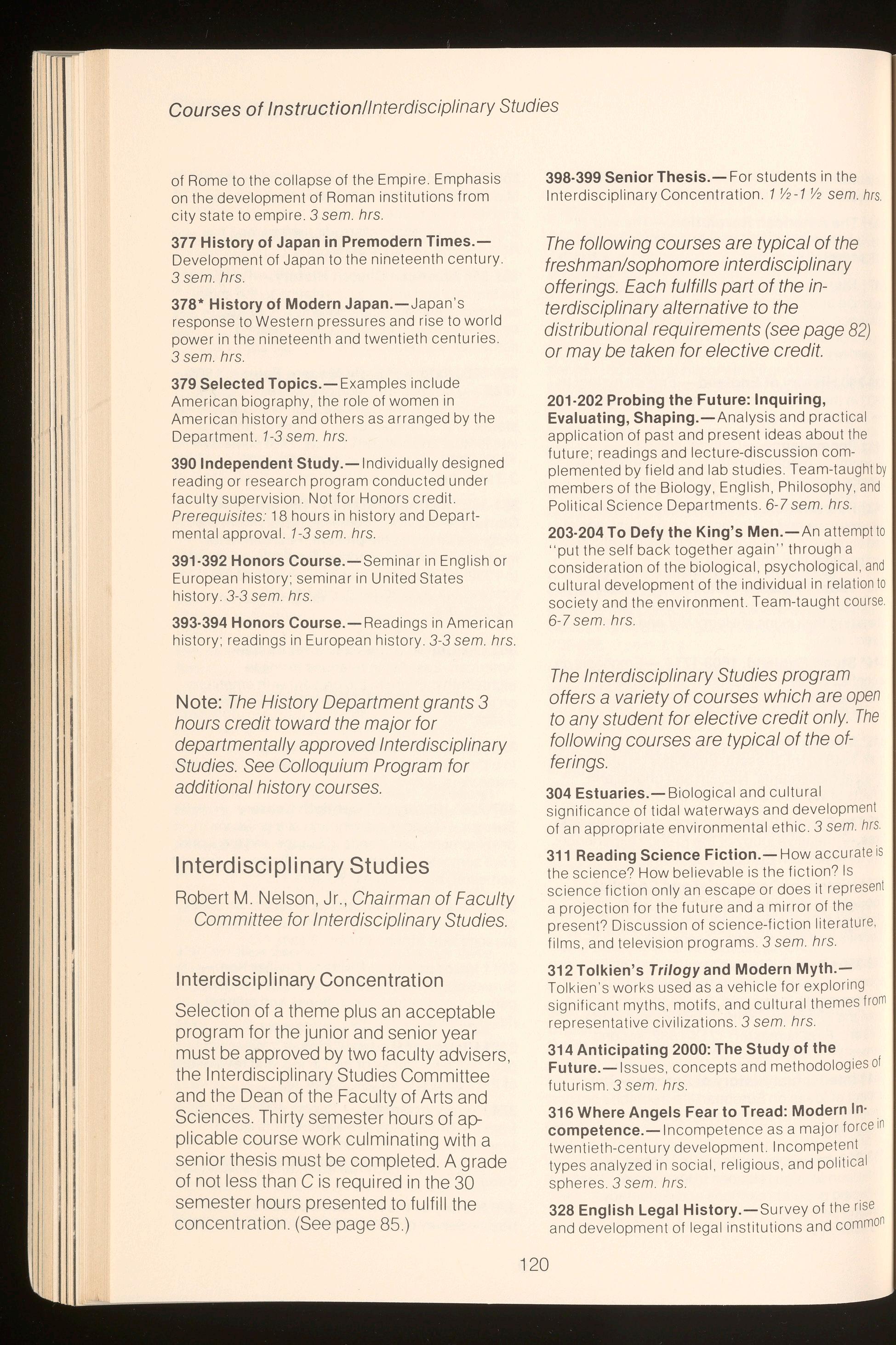

Courses of Instruction/Journalism, Mathematical Sciences
law in England from 1066 to about 1800. Focus on various legal aspects of the English constitution within this period. Designed to furnish an historical perspective for study of modern American legal andConstitutional problems. 2 sem. hrs.
330 Historic Preservation and Conservation: A Futurefor the Past-Preservation of old and historic struct ures , districts , artifacts; maintenance of the integrity and flavor of existing neighborhoods. (No credit given to students who havecomp leted Colloquium 134.) 3 sem. hrs.
364Texture of the Medieval World.-Urban and rural life in the Middle Ages: The people, the land, towns, churches and cathedrals, roads and rivers. 3 sem. hrs.
375 Law and Medicine.- Tort liability of the physician and the problems of abortion, artificial insemination, and voluntary sterilization. 2 sem. hrs.
382 Roman Law.-Rise and development of the Romanlaw from its beginnings in Republican Romethrough its development into a highly sophisticate d legal system during the Principate , its cod ification under Ju sti nian , it s revival in medieval Italy and France , its reception into Germany in the sixteenth to eighteenth centuries, and its spread into Latin America. 2 sem. hrs.
Journalism
Stephen P. Nash, Chairman Assistant Professor Nash
Part-time faculty members in journalism are employed from among area professionals
Nojournalism course may be used to meet distributional requirement Ill. A Concentration
Twenty-seven semester hours in journalism which must include Journalism 201202, 301-302, 303-304 and 305. In addition, 12 semester hours in English courses above English 101-102 are required. Journalism 201-202 is a prerequisite for all 300-level courses in Journalism, and should be completed in the sophomore year Also recommended are beginning courses in speech communication , political science, psychology, and soc iology.
201-202 News Writing.- News media history and practices. Provides basic news-writing experience. Journalism 201 is prerequisite to 202. 3-3 sem. hrs.
209-210 Radio and Television News.-News production techniques of radio and television. Second semester: television news. Students must meet radio and television laboratory requirements. Journalism 209 is prerequisite to 210. 3-3 sem. hrs.
301-302 Copy Editing.-Study and practice in copy reading , editing, fundamentals of makeup, picture selection and the libel laws. Must be taken in sequence. 6 sem. hrs.
303-304 Advanced News Writing.-Writing experience under actual working conditions. Coverage of city councils, boards of supervisors, courts , and legislative bodies Stories written on assignment and followed by individual and group conferences. May be taken out of sequence with permission of instructor. 6 sem. hrs.
305 Seminar.-Political, sociological, or ethical problem , with emphasis on research techniques and in-depth reporting. Required reading: history and development of journalism , current practices, newspaper law , and other aspects of news writing. 3 sem. hrs.
307-308 Public Relations.-Brief historical perspective on public relations - its philosophy and practices. Practical exercises: preparation of publicity and press releases, annual reports, employee publications, identity programs and speech writing. Must be taken in sequence. 6 sem. hrs.
353-354 Creative Writing.-(See English 353 and 354.) 3-3 sem. hrs.
Mathematical Sciences
Elizabeth B. Taylor, Chairman
Professors Atkins , Grable, Taylor
Associate Professors Bowen, Ducharme , Kent , Monk, Stokes
Assistant Professors Charlesworth , McLaughlin, Withers
No mathematical sciences course may be used to meet distributional requirement II.
Concentration
Thirty-two semester hours in mathematical sciences are required, including Math-

Courses of Instruction/Mathematical Sciences
ematics 251, 252 , 253 , 305 , 320 , and 398; and 15 additional semester hours at the 300 level. A grade of not less than C is required in each mathematical sciences course counted toward the concentration. In addition, the entire concentration program for each student must have departmental approval. For the Bachelor of Science degree , a student must complete six semester courses in natural sciences , including at least two semesters of science above the 100 level approved by the Department.
52 Plane Geometry.-Selected topics from Euclidean geometry. May be required of students who do not meet the mathematics entrance requirement Osem hrs
75 Intermediate Algebra.-Selected topics from high school algebra May be required of s tudents who do not meet the mathematic s entrance requirement. 0 sem hrs .
101 Introduction to Computer Programming and Applications.-Computer programming in BASIC language ; applications may include such topics as mathematics of finance and linear programming. Not open to students who have completed Mathematics 300 or who have 6 or more semester hours college credit in calculus. 3 sem. hrs.
102 Finite Mathematics.-Topics in finite mathematics designed to demonstrate the power of mathematical reasoning and some application s to natural and social sciences Not open to students who have 6 or more semester hours college credit in calculus 3 sem. hrs
104 Elementary Probability and Statistics.Probability sufficient to provide an introduction to statistics, descriptive statistics, binomial and normal distributions and hypothesis testing. Not open to students who have completed a statistics course at the college level. 3 sem . hrs.
151 Topics from Algebra, Trigonometry, and Analytic Geometry.-Properties of real numbers , functions , topics from analytic trigonometry and analytic geometry . 3 sem hrs
203 Mathematics of Finance.- Theory of interest and discount , annuities and amortization , sinking funds , bond valuation , depreciation and life insurance. Prerequisite : Mathematics 101 and 151 3 sem. hrs.
205 Mathematics for Elementary Education.Introduction to the abstract concept of number, numeration and the mathematical development of
number systems Mathematical concepts which are basic in the elementary school curriculum . Prerequisite: Sophomore standing or permission of instructor. 3 sem. hrs.
229-:30 Applications of Statistics.-
Introduction to statistical methods with applications selected from many areas. Major topi cs: sampling , hypothesis testing, regression and analy s is of variance . Optional use of the comput er facilitie s offers fle x ibility for students of varied backgrounds Prerequisites : 6 semester hours of mathematics at the 100 level or 3 semester hou rs of calculus numbered 251 or above. Not open to students who have completed a statistics cour se above the 100 level. Mathematics 229 is prerequisite to 230. 3-3 sem hrs.
251-252 Calculus I and IL-Differential and integral calculus of functions of one independent variable Prerequisite : Mathematics 151 or the equivalent. Mathematics 251 is prerequisite to 252 3-3 sem. hrs
253 Calculus 111.-Calculus of functions of several variables Prerequisite : Mathematics 25 2. 4 sem. hr s
300-301 Computer Science I and IL-Algorithm s and flowcharts The BASIC language , including f ile processing . Standard FORTRAN : subroutines and function subprograms Computers and computer systems Introduction to an assembly language. Data structures , including stacks , trees, and linked lists . Prerequisite: Calculus I or Philosophy 251 or permission of instructor Mathematics 300 is prerequisite to 301 3-3 sem. hrs.
302 Introduction to Modern Applications of Mathematics.-Applications of mathematics , principles of modeling , and topics from discrete mathematics. De s igned to enhance problemsolving ability. Prerequisite: Mathematics 253. 3 sem hrs
303 Differential Equations.- Methods of solution , existence and uniqueness theory, and the qualitative approach in determining behavior of solutions. Prerequisite: Mathematics 253 3 sem. hrs
305 Linear Algebra.-Vector spaces , matrices , systems of linear equations and linear transformations Prerequisite: Mathematics 252 3 sem hrs
306 Modern Algebra.-lntroduction to basic algebraic systems, including groups , rings , and fields Prerequisite: Mathematics 305. 3 sem . hr s.
311 Higher Geometry.-Synthetic and analytic projective geometry , groups of transformations , collineations and correlations, and the relationship of non-Euclidean to projective geometry. Prerequisite: Mathematics 305 or permission of instructor 3 sem. hrs.
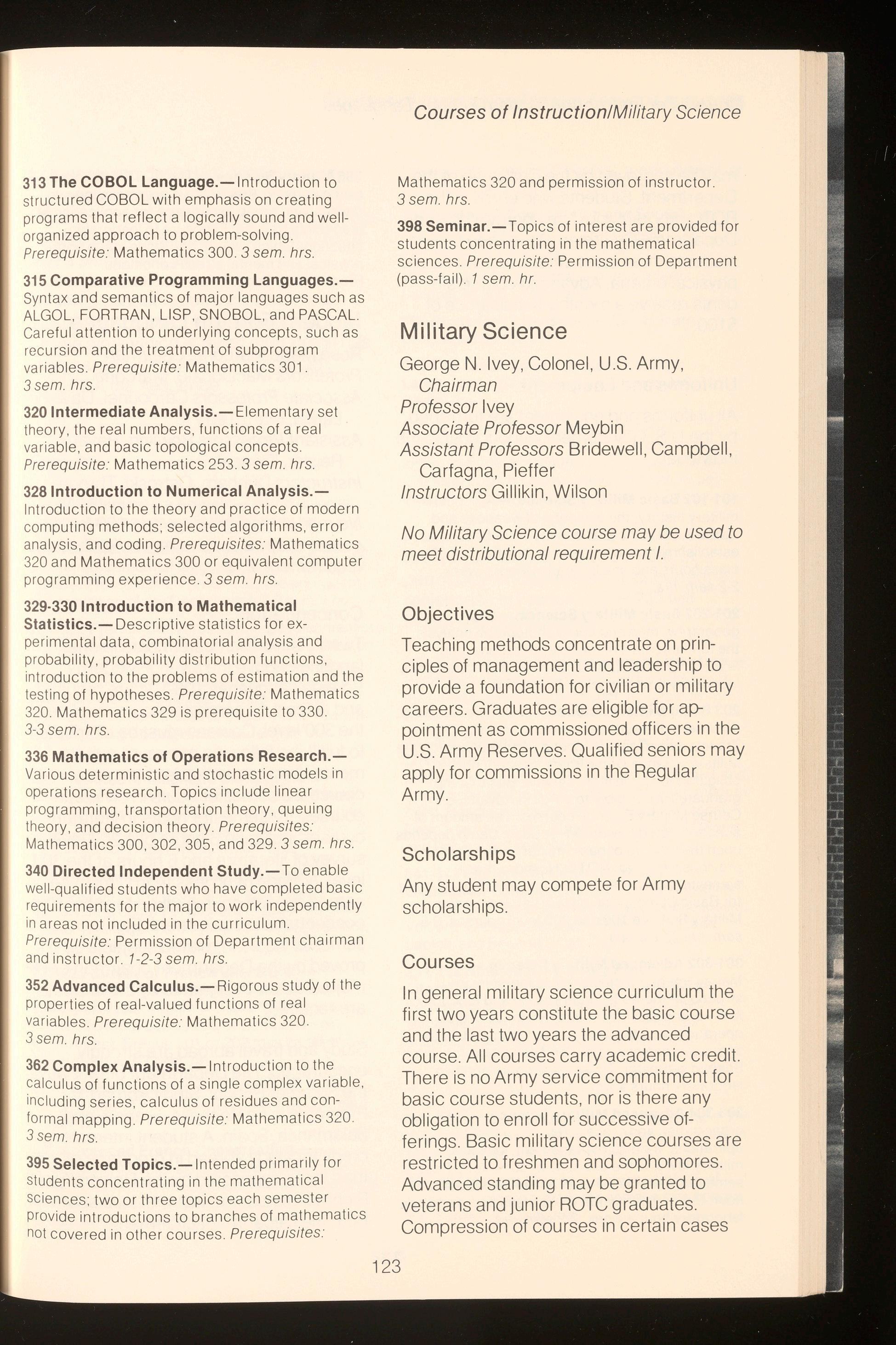
313 The COBOL Language.-lntrodu ction to structured COBOL with emphasis on creating programs that reflect a logically sound and wellorganize d approach to problem-solving Prerequisite: Mathematic s 300. 3 sem. hrs.
315 Comparative Programming Languages.Syntax and semantics of major languages such as ALGOL, FORTRAN, LISP, SNOBOL, and PASCAL. Careful attention to underlying concepts, such as recursio n and the tr eatment of subprogram variables. Prerequisite: Mathematics 301. 3 sem. hrs.
320 Intermediate Analysis.-El ementary set theory, the real numbers, functions of a real variable, and basic topological concepts. Prerequisite Math ematics 253. 3 sem. hrs.
328 Introduction to Numerical AnalysisIntroduction to the theory and practice of modern computing methods; selected algorithms, error analysis, and coding. Prerequisites: Mathematics 320 and Mathematics 300 or equivalent computer programm ing experience. 3 sem. hrs.
329-330 Introduction to Mathematical Statistics.-Descriptive statistics for experimental data, combinatorial analysis and probabi lity , probability distribution functions, introduction to the problems of estimation and the testing of hypotheses. Prerequisite. Mathematics 320. Mathematics 329 is prerequisite to 330. 3-3 sem. hrs.
336 Mathematics of Operations Research .Various deterministic and stochastic models in operations research. Topics includ e linear programming, transportation theory, queuing theory, and decision theory. Prerequisites: Mathema tics 300, 302, 305, and 329. 3 sem. hrs.
340 Directed Independent Study.- To enable well-qualified students who have completed basic requirements for the major to work independently in areas not included in the curriculum. Prerequisite: Permission of Department chairman and instructor 1-2-3 sem. hrs.
352 Advanced Calculus.-Rigorou s study of the properties of real-valued functions of real variables. Prerequisite: Mathematics 320. 3sem. hrs.
362 Complex Analysis.-lntroduction to the calculus of functions of a s ingle complex variable, including series, calculus of residues and conformal mapping. Prerequisite. Mathematics 320. 3sem. hrs.
395 Selected Topics.- Intended primarily for studen t s concentrating in the mathematical sciences; two or three topic s each semester provide introductions to branches of mathematics not covered in other courses. Prerequisites:
Courses of Instruction/Military Science
Mathematics 320 and permission of instructor. 3 sem. hrs.
398 Seminar.-Topics of intere s t are provided for s tudents concentrating in the mathematical sciences. Prerequisite: Permission of Department (pass-fail) 1 sem. hr.
Military Science
George N. Ivey, Colonel, U.S. Army, Chairman
Professor Ivey
Associate Professor Meybin
Assistant Professors Bridewell , Campbell, Carfagna, Pieffer
Instructors Gillikin, Wilson
No Military Science course may be used to meet distributional requirement I.
Objectives
Teaching methods concentrate on principles of management and leadership to provide a foundation for civilian or military careers. Graduates are e ligible for appointment as commissioned officers in the U.S Army Reserves. Qualified seniors may apply for commissions in the Regular Army.
Scholarships
Any student may compete for Army scholarships.
Courses
In general military science curriculum the first two years constitute the basic course and the last two years the advanced course. All courses carry academic credit. There is no Army service commitment for basic course students, nor is there any obligation to enroll for successive offerings Basic military science courses are restricted to freshmen and sophomores. Advanced standing may be granted to veterans and junior ROTC graduates. Compression of courses in certain cases

Courses of Instruction/Modern Foreign Languages
may be approved by the Chairman of the Department. Students who enroll in the ROTC program must be approved by the Department Chairman. Advanced course students must meet certain academic and physical criteria. Advanced course students receive a monthly subsistence of $100.
Uniforms and Equipment
All uniforms and equipment are furnished by the U.S. Government without cost to the individual.
101-102 Basic Military Science.-American military history, the evolution of weapons and warfare, the principles of war, the U .S. defense establishment and leadership development. Two class hours and one laboratory hour a week. 2-2 sem. hrs.
201-202 Basic Military Science.-Military geography, map and aerial photograph analysis, the fundamentals of military operations, and leadership development Two class hours and one laboratory hour a week. 2-2 sem. hrs.
203 Basic Military Science.- ROTC Basic Camp Six weeks of training at a military installation. Travel pay and salary stipend provided through the Military Science Department Student not obligated to any military service. Basic Camp graduates are eligible to enroll in Advanced Course Military Science courses. The amount of academic credit awarded for Basic Camp depends upon the amount of basic military science credit previously earned. NOTE: No more than 8 semester hours may be applied toward graduation for Basic Camp, prior military service, and/or Military Science 100 and 200-level courses. 0-6 sem. hrs. (pass-fail)
301-302 Advanced Military Science.Management principles and leadership; instructional methods; organization and function of Army branches; theory and dynamics of unit operations and the exercise of command. First semester: one class hour and one laboratory hour. Second semester: Thre e class hours and two laboratory hours a week.1-2 sem. hrs.
303-304 Advanced Military Science.-Staff organization and procedures, orders and operations, training management, logi stics, military law and the exercise of command. First semester: Two class hours and one laboratory hour Second semester: three class hours and one laboratory hour a week. 2-2 sem. hrs.
306 Military Science.- The ROTC Advanced Camp Summer Practicum is six weeks long Individual and group experience for application of leadership training. Exposure to leadership situ:::tions which require decisions made under phy sical and mental stress conditions. Prerequi si te: Completion of MS Ill. 2 sem. hrs.
Modern Foreign Languages
Rose Marie Marcone, Chairman
Professors MacDonald, Marcone
Associate Professors Cardounel, Dawson , Larkin , Marr, Terry
Assistant Professors Bowling, Ravaux, Reisler, Troncale
Instructors Dunham, Ostroski, Throne
No modern foreign language 1GO-level course may be used to meet distributional requirement Ill. 8.
Concentration
Twenty-seven semester hours in one language above the level of Modern Foreign Languages 103-104 are required, and at least 12 semester hours must be at the 300 level. Courses must be distributed to fulfill the following minimum requirements: 6 semester hours in language courses; 3 semester hours in civilization courses ; 12 semester hours in literature courses including 6 hours of a 200-level survey of literature and 6 hours at the 300 level. A grade of no less than C must be earned in each course taken to satisfy the concentration requirement. Eighteen semester hours in related subjects approved by the Department chairman or the major adviser designated by the chairman are required.
Study and travel abroad are strongly encouraged. The Department offers, within the Summer School, Study Abroad Programs in La Rochelle, France, and Salamanca, Spain. A student interested in credit for study abroad in programs other than those sponsored by the University of Richmond must request previous approval from the Department chairman.
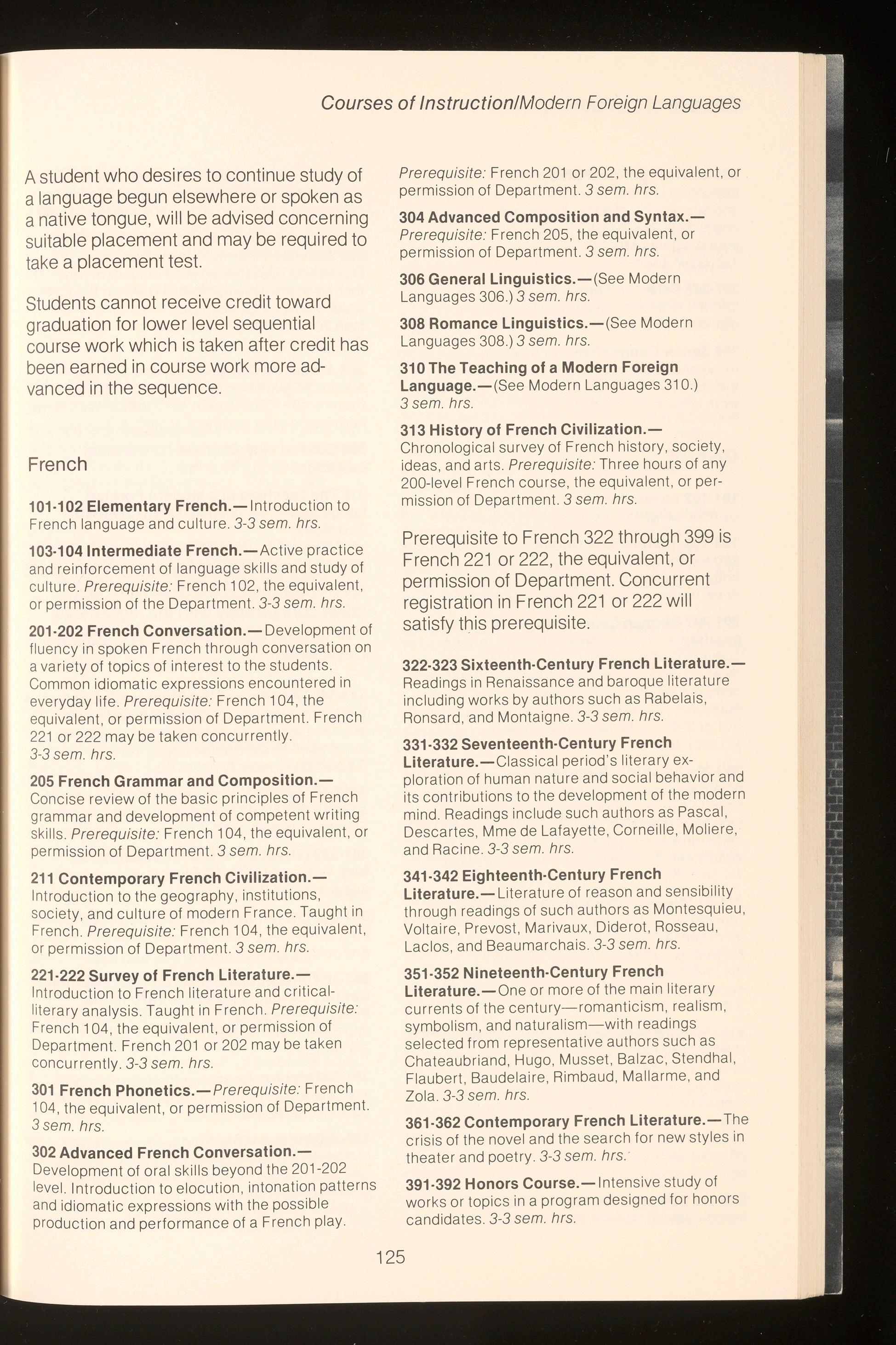
Courses of lnstruction/fvlodern Foreign Languages
A student who desires to continue study of a language begun elsewhere or spoken as a native tongue, will be advised concerning suitable placement and may be required to take a placement test.
Students cannot receive credit toward graduation for lower level sequential co urse work which is taken after credit has been earned in course work more advanced in the sequence.
French
101-102 Elementary French.-lntroduction to French language and culture. 3-3 sem. hrs.
103-104 Intermediate French.-Active practice and reinforcement of language sk ills and st udy of cult ure. Prerequisite: French 102 , the equ ivalent, or permission of the Department. 3-3 sem. hrs.
201-202 French Conversation.- Development of fluency in spoken French through conversation on a var iety of topics of inter est to the students. Common idiomatic expressions encountered in everyday life. Prerequisite· French 104, the equivalent , or permission of Department. French 221 or 222 may be taken concurrently. 3-3 sem. hrs.
205 French Grammar and Composition.-
Concise review of the basic principles of French gram mar and development of competent writing skills. Prerequisite· French 104 , the equivalent, or perm iss ion of Department. 3 sem. hrs.
211 Contemporary French Civilization.-
Introduction to the geography, institutions, society, and culture of modern France Taught in French. Prerequisite: French 104 , the equivalent, or permission of Department. 3 sem. hrs.
221-222 Survey of French Literature . -
Introduction to French literature and criticalliterary ana lysis. Taught in French. Prerequisite: French 104 , the equivalent, or permission of Department. French 201 or 202 may be taken concurrently. 3-3 sem. hrs.
301 French Phonetics.-Prerequisite: French 104, the equivalent, or permission of Department. 3 sem. hrs.
302 Advanced French Conversation.Development of ora l skills beyond the 201-202 level. Introduction to elocution, intonation patterns and idiomatic expressions with the possible production and performance of a French play.
Prerequisite: French 20 1 or 202, the equ ivalent, or permission of Department. 3 sem. hrs.
304 Advanced Composition and Syntax.Prerequisite. French 205, the equivalent, or permission of Department. 3 sem. hrs.
306 General Linguistics.-(See Modern Languages 306 ) 3 sem. hrs.
308 Romance Linguistics.-(See Modern Languages 308.) 3 sem. hrs.
310 The Teaching of a Modern Foreign Language.-(See Modern Languages 310.) 3 sem. hrs.
313 History of French Civilization.Chronological survey of French history, society, ideas, and arts. Prerequisite: Three hours of any 200-level French course , the equivalent, or permission of Department. 3 sem. hrs.
Prerequisite to French 322 through 399 is French 221 or 222, the equivalent, or permission of Department. Concurrent registration in French 221 or 222 will satisfy this prerequisite.
322-323 Sixteenth-Century French Literature.Readings in Renaissance and baroque literature including works by authors such as Rabelais, Ronsard , and Montaigne. 3-3 sem. hrs.
331-332 Seventeenth-Century French Literature.-Classical period's literary exploration of human nature and social behavior and its contributions to the development of the modern mind. Readings include such authors as Pascal, Descartes , Mme de Lafayette , Corneille, Moliere , and Racine . 3-3 sem. hrs.
341-342 Eighteenth-Century French Literature.-Literature of reason and sensi bility through readings of such authors as Montesquieu, Voltaire, Prevost, Marivaux, Diderot , Rosseau , Laclos , and Beaumarchais. 3-3 sem. hrs.
351-352 Nineteenth-Century French Literature.-One or more of the main literary currents of the century-romanticism, realism, symbolism, and naturalism-with readings selected from representative authors suc h as Chateaubriand, Hugo , Mussel , Balzac , Stendhal, Flaubert , Baudelaire , Rimbaud, Mallarme , and Zola. 3-3 sem. hrs.
361-362 Contemporary French Literature.- The crisis of the novel and the search for new styles in theater and poetry. 3-3 sem. hrs.
391-392 Honors Course.-lntensive study of works or topics in a program designed for honors candidates. 3-3 sem. hrs.

Courses of Instruction/Modern Foreign Languages
395-396 Independent Study.- Individual projects chosen by interested students with the approval a nd superv ision of a faculty member Variable cred it ava ilab le through the Department. (See a lso courses under Modern Languages.)
1-2-311-2-3 sem. hrs.
397-398 Selected Topics - Topics of specia l interest to be ar ranged a t th e Department's discretion. 3-3 sem. hrs.
399 Senior Comprehensive Studies.- Designed to expand upon and synthesize the knowledge that the indi v idu a l s tu dent has gained fr om course work in the major. 3 sem. hrs.
German
101-102 Elementary German.-lnt roductionto German language and culture. 3-3 sem. hrs.
103-104 Intermediate German.- Active prac ti ce and reinforcement of language ski lls and study of culture. Prerequisite: German 102, the equivalent , or perm ission of Department. 3-3 sem. hrs.
201-202 German Conversation and Composition.-D evelopment of fluency through conversat ion on topics designed for learning the most common idiomatic expressions. Practice in compos iti on Prerequisite: German 104, the eq ui valent, or permission of Department. German 22 1 or 222 may be taken concurrently. 3-3 sem. hrs.
203-204 Scientific German . -D esigned for science majors G roup readings of edited scient if ic texts, supplemented by supervised individual reading in the field of the student's concentration. Prerequisite. German 104, the equivale nt , or permission of the Department. 1-1 sem. hrs.
211-212 German Civilization.-R eadings and reports on the geography , history, arts and literature o f German-speaking peoples Ta ught in English; no previous German required. For e lective credit only , except for students in the concentration who may do readings in German 3-3 sem. hrs.
215 Folklore, Folk Song, and Fairy Tale.-
Primary emphasis on stories. tales and folk songs of Germany Texts fairy tale co llect ions of the G ri mm brothers and Hans Christian Andersen. Emphasis on the paralle ls between the fo lk beliefs and motifs of the Germanic peoples and the thoughts and feelings of modern Americans. No previous German required German majors must do th e readings in German. 3 sem. hrs.
221-222 Survey of German Literature.Int roduction to German literature and critical-
lit erary ana lys is. Ta ught in Ge rman. Prerequisite German 104, the equiva lent, or permission o f Department. German 20 1 or 202 may be taken concurrently 3-3 sem. hrs.
302 Advanced German Conversation.-
Discussion a t advanced level of fund amental themes in the development of Ge rm an thought or production of a Ge rman play. Prerequisite. German 201-202, the equ ivalent, or permission of Department. 3 sem. hrs.
304 Advanced Composition and Syntax.Advanced g ramm ar, sy nt ax, a nd s t y lis ti cs. Prerequisite German 201-202, th e eq ui va le nt , or permission of Department. 3 sem . hrs.
306 General Linguistics - (See Modern Languages 306.) 3 sem. hrs.
310 The Teaching of a Modern Foreign Language - (See Modern Languages 310 ) 3 sem. hrs.
Prer eq uis ite to litera ture courses at the 300 lev e l is German 201-202 (which may be taken concurrently with the higher leve l course), the eq uivalent , or permi ss ion of Departm e nt.
341-342 Literature of the Eighteenth Century.First semester: the Enlightenment, w ith spec ial attention to Lessing and the Storm and Stress movement. Second semester: Schiller. 3-3 sem hrs.
345-346 Goethe.-Fi rst semeste r Th e lif e and selected works of the author . Second semester Faust. 3 -3 sem. hrs
351-352 Literature of the Nineteenth Century.- Gene ral study emphasiz in g romanticism and rea lism. 3-3 sem. hrs
361-362 Literature of the Twentieth Century.First semester: Drama. Second semes t er: Fiction and poetry. 3-3 sem. hrs.
363-364 Intellectual Background of Twentieth· Century German Literature. 1870 to the Present-R eadings from di ar ies , essays, letters, and other material. fiction and nonfiction. 3-3 sem. hrs.
391-392 Honors Course.-l ntens iv e study of works or topics in a program designed for honors candidates. 3-3 sem hrs.
395-396 Independent Study -l ndividua l project s chosen by interested studen t s with the app roval and supervision of a faculty member. Variable credit available through the Department. (See al so courses under Modern Languages.) 1-2-311-2-3 sem. hrs.
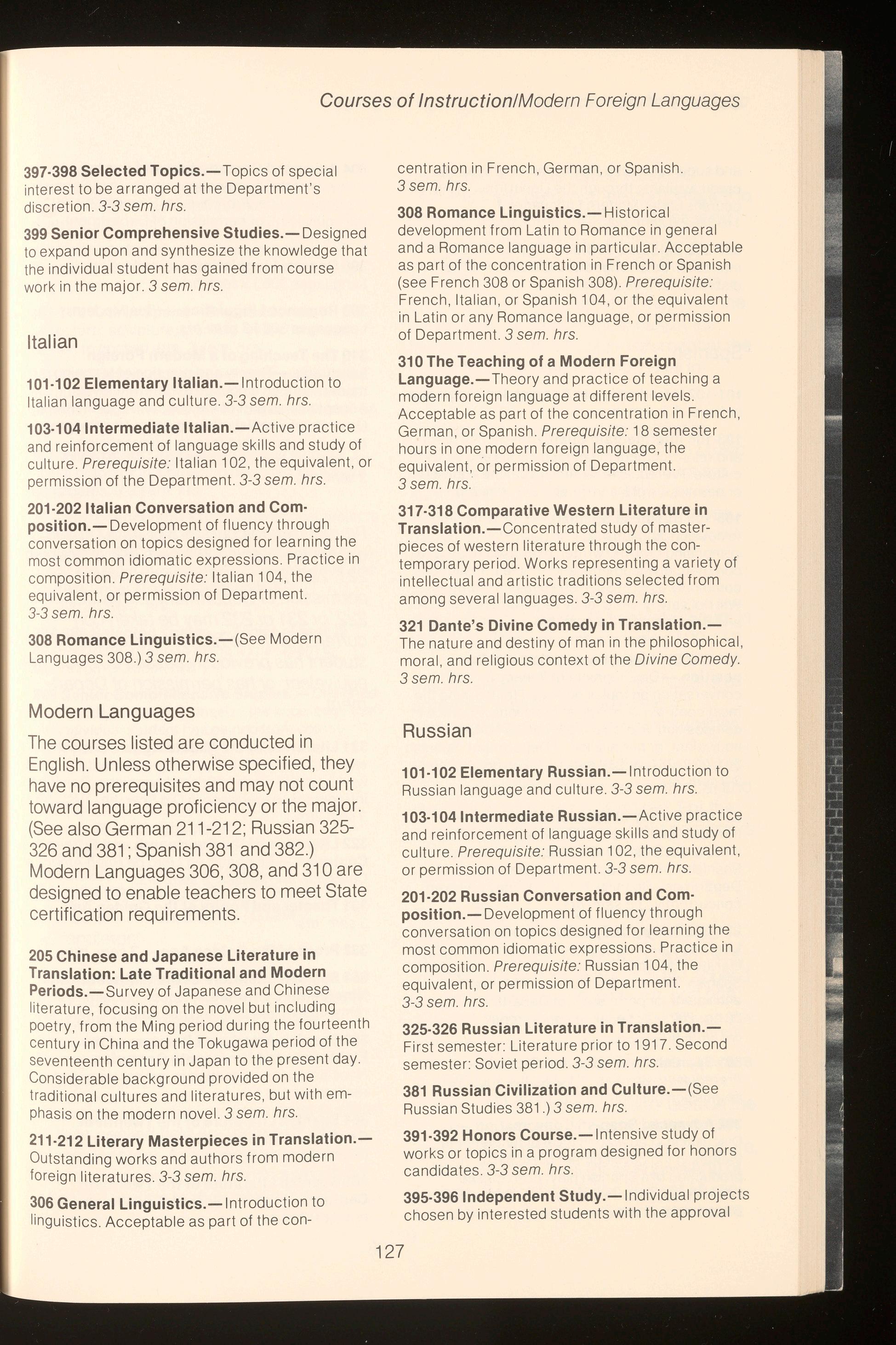
Courses of Instruction/Modern Foreign Languages
397-398 Selected Topics.- Topic s of s pecial inte re s t to be arranged at the Department 's disc retion 3-3 sem. hrs.
399 Senior Comprehensive Studies.- Designed to ex pand upon and synthesize the knowledge that the individual student has gained from course work in the major 3 sem. hrs.
Italian
101-102 Elementary ltalian.-lntroduction to Ita lian language and culture. 3-3 sem hrs .
103-104 Intermediate ltalian.-Active practice a nd reinforcement of language skills and study of culture. Prerequisite: Italian 102, the equivalent , or pe rmission of the Department. 3-3 sem. hrs
201-202 Italian Conversation and Composition.-Development of fluency through c onversation on topics designed for learning the mos t common idiomatic expressions Practice in co mposition Prerequisite : Italian 104 , the eq u ivalent , or permission of Department. 3-3 s em. hrs
308 Romance Linguistics.-(See Modern Languages 308 ) 3 sem . hrs
Modern Languages
The courses listed are conducted in English. Unless otherwise specified, they have no prerequisites and may not count toward language proficiency or the major.
(See also German 211-212; Russian 325326 and 381; Spanish 381 and 382.)
Modern Languages 306, 308, and 310 are designed to enable teachers to meet State certification requirements.
205 Chinese and Japanese Literature in Translation: Late Traditional and Modern Periods.-Survey of Japanese and Chinese lite rature , focusing on the novel but including poetry, from the Ming period during the fourteenth ce n t ury in China and the Tokugawa period of the sev enteenth century in Japan to the present day Considerable background provided on the t raditional cultures and literatures , but with emphasis on the modern novel. 3 sem. hrs.
211-212 Literary Masterpieces in Translation.Outstanding works and authors from modern foreign literatures. 3-3 sem. hrs.
306 General Linguistics.-lntroduction to linguistics Acceptable as part of the con-
cent ration in French , German , or Spanish. 3 sem. hrs.
308 Romance Linguistics.- Historical development from Latin to Romance in general and a Romance language in particular. Acceptable as part of the concentration in French or Spanish (see French 308 or Spanish 308) Prerequisite: French , Italian , or Spanish 104 , or the equivalent in Latin or any Romance language , or permission of Department. 3 sem hrs
310 The Teaching of a Modern Foreign Language.- Theory and practice of teaching a modern foreign language at different levels. Acceptable as part of the concentration in French , German , or Spanish. Prerequisite : 18 semester hours in one modern foreign language , the equivalent, or permission of Department. 3 sem. hrs.
317-318 Comparative Western Literature in Translation.-Concentrated study of masterpieces of western literature through the contemporary period. Works representing a variety of intellectual and artistic traditions selected from among several languages 3-3 sem hrs
321 Dante's Divine Comedy in Translation.The nature and destiny of man in the philosophical , moral , and religious context of the Divine Comedy 3 sem. hrs.
Russian
101-102 Elementary Russian.-lntroduction to Russian language and culture 3-3 sem hrs.
103-104 Intermediate Russian.-Active practice and reinforcement of language skills and study of culture. Prerequisite: Russian 102, the equivalent , or permission of Department. 3-3 sem. hrs.
201-202 Russian Conversation and Composition.-Development of fluency through conversation on topics designed for learning the most common idiomatic expressions. Practice in composition Prerequisite : Russian 104 , the equivalent, or permission of Department. 3-3 sem. hrs.
325-326 Russian Literature in Translation.First semester : Literature prior to 1917 Second semester : Soviet period 3 -3 sem. hrs
381 Russian Civilization and Culture.-(See Russian Studies 381.) 3 sem. hrs
391-392 Honors Course.- Intensive study of works or topics in a program designed for honors candidates. 3-3 sem. hrs
395-396 Independent Study.-lndividual projects chosen by interested students with the approval
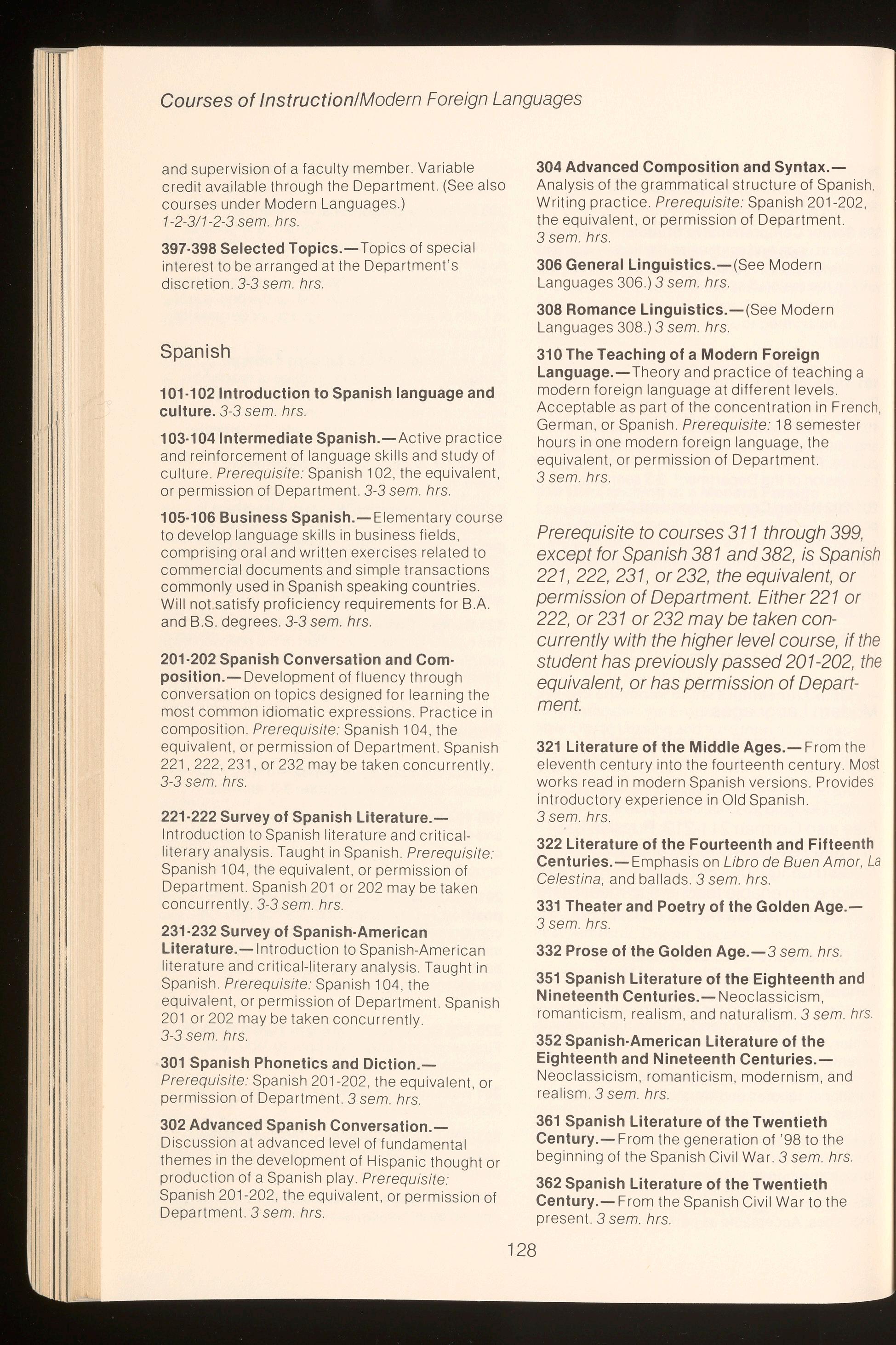
Courses of Instruction/Modern Foreign Languages
and superv ision of a faculty member. Variable credit available through the Department. (See also courses under Modern Langu ages.) 1-2-311-2-3sem. hrs.
397-398 Selected Topics.-Topics of special interest to be arranged at th e Department's discretion. 3-3 sem. hrs.
Spanish
101-102 Introduction to Spanish language and culture. 3-3 sem. hrs.
103-104 Intermediate Spanish.-Active practice and reinforcement of language s kill s and study of culture. Prerequisite Spanish 102, the equivalent, or permission of Departme nt. 3-3 sem. hrs.
105-106 Business Spanish.-El ementary course to develop language skil ls in business fields , comprising oral and written exercises related to commercial documents and simple transactions commonly used in Spanish speaking countries. Will not satisfy proficiency requirements for BA and B.S. degrees. 3-3 sem. hrs.
201-202 Spanish Conversation and Composition.-Development of fluency through conversation on topics designed for learning the most common idiomatic express ion s. Practice in composition Prerequisite: Spanish 104, the equivalent, or permission of Department. Spanish 221,222,231, or 232 may be taken concur rently. 3-3 sem. hrs.
221-222 Survey of Spanish Literature.-
Introduction to Spanish literature and criticalliterary analysis. Taught in Spanish. Prerequisite: Spanish 104, the equivalent, or permission of Department. Spanish 201 or 202 may be taken concurrently. 3-3 sem. hrs.
231-232 Survey of Spanish-American Literature.-lntrodu ction to Spanish-American literature and critical-literary analysis. Taught in Spanish Prerequisite : Spanish 104, th e equivalent, or permission of Department. Spanish 20 1 or 202 may be taken concurrently. 3-3 sem. hrs.
301 Spanish Phonetics and Diction.-
Prerequisite: Spanish 201-202, the equivalent, or permission of Department. 3 sem. hrs.
302 Advanced Spanish Conversation.-
Discussion at advanced level of fundamental themes in the development of Hispan ic thought or production of a Spanish play. Prerequisite: Spanish 201-202, the equivalent, or permission of Department. 3 sem. hrs.
304 Advanced Composition and Syntax.-
Analysis of the grammatical st ructure of Spanish Writing practice. Prerequisite: Spanish 201-202 , the equivalent, or permission of Department. 3 sem. hrs.
306 General Linguistics.-(See Modern Languages 306.) 3 sem. hrs.
308 Romance Linguistics.-(Se e Modern Languages 308 ) 3 sem. hrs.
310 The Teaching of a Modern Foreign Language.- Th eory and practice of teaching a modern foreign language at different leve ls. Acceptable as part of the concentration in French , German, or Spanish. Prerequi site: 18 semes t er hours in one modern foreign language , th e equivalent, or permission of Departm ent. 3 sem. hrs.
Prerequisite to courses 311 through 399, except for Spanish 381 and 382, is Spanish 221 , 222, 231, or 232 , the equivalent, or permission of Department. Either 221 or 222, or 231 or 232 may be taken concurrently with the higher level course , if the student has previously passed 201-202, the equivalent, or has permission of Department.
321 Literature of the Middle Ages.- From the eleventh centu ry into the fourte enth century. Most works read in modern Spanish versions. Provid es introductory experience in Old Spanish. 3 sem. hrs.
322 Literature of the Fourteenth and Fifteenth Centuries.-Empha sis on Libro de Buen Amor , La Celestina, and ballads. 3 sem. hrs.
331 Theater and Poetry of the Golden Age.3 sem. hrs.
332 Prose of the Golden Age.-3 sem. hrs.
351 Spanish Literature of the Eighteenth and Nineteenth Centuries.-Neocla ssicism, romanticism, realism , and naturalism. 3 sem. hrs
352 Spanish-American Literature of the Eighteenth and Nineteenth Centuries.Neoclassicism, romanticism , modernism , and realism 3 sem. hrs.
361 Spanish Literature of the Twentieth Century.- From the generation of '98 to the beginning of the Spanish Civil War. 3 sem. hrs.
362 Spanish Literature of the Twentieth Century.-From the Spanish Civil War to the present. 3 sem. hrs.
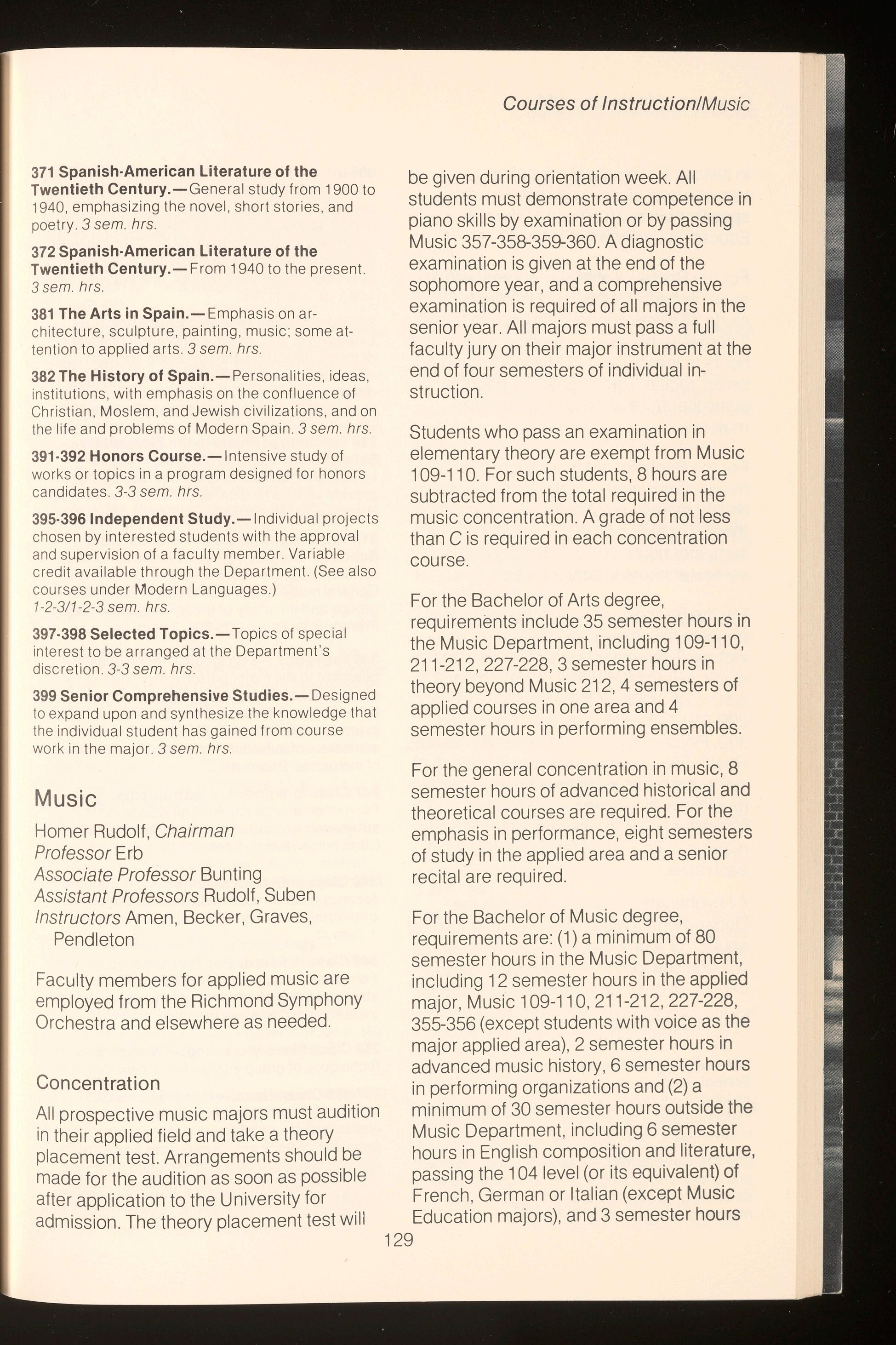
371 Spanish-American Literature of the Twentieth Century.-General study from 1900 to 1940, emphasizing the novel, short stories, and poetry. 3 sem. hrs.
372 Spanish-American Literature of the Twentieth Century.- From 1940 to the present. 3sem. hrs.
381 The Arts in Spain.-Emphasis on architecture, sculpture, painting, music; some attention to applied arts. 3 sem. hrs.
382 The History of Spain.-Personalities, ideas, inst itutions , with emphasis on the confluence of Christia n , Moslem , and Jewish civilizations, and on the life and problems of Modern Spain. 3 sem. hrs.
391-392 Honors Course.-lntensive study of works or topics in a program designed for honors candidates. 3-3 sem. hrs.
395-396 Independent Study.-lndividual projects chosen by interested students with the approval and supe rvision of a faculty member. Variable credit available through the Department. (See also courses under Modern Languages.) 1-2-311-2-3sem. hrs.
397-398 Selected Topics.-Topic s of special interest to be arranged at the Department 's discretion. 3-3 sem. hrs.
399 Senior Comprehensive Studies.- Designed to expand upon and synthesize the knowledge that the individual student has gained from course work in the major 3 sem. hrs.
Music
Homer Rudolf, Chairman
Professor Erb
Associate Professor Bunting
Assistant Professors Rudolf, Suben Instructors Amen, Becker, Graves, Pendleton
Faculty members for applied music are employed from the Richmond Symphony Orchestra and elsewhere as needed.
Concentration
All prospective music majors must audition in their applied field and take a theory placement test. Arrangements should be made for the audition as soon as possible after application to the University for admission . The theory placement test will
Courses of Instruction/Music
be given during orientation week. All students must demonstrate competence in piano skills by examination or by passing Music 357-358-359-360. A diagnostic examination is given at the end of the sophomore year , and a comprehensive examination is required of all majors in the senior year. All majors must pass a full faculty jury on their major instrument at the end of four semesters of individual instruction.
Students who pass an examination in elementary theory are exempt from Music 109-110. For such students, 8 hours are subtracted from the total required in the music concentration. A grade of not less than C is required in each concentration course.
For the Bachelor of Arts degree, requirements include 35 semester hours in the Music Department, including 109-110, 211-212, 227-228, 3 semester hours in theory beyond Music 212, 4 semesters of applied courses in one area and 4 semester hours in performing ensembles.
For the general concentration in music, 8 semester hours of advanced historical and theoretical courses are required. For the emphasis in performance, eight semesters of study in the applied area and a senior recital are required.
For the Bachelor of Music degree, requirements are: (1) a minimum of 80 semester hours in the Music Department, including 12 semester hours in the applied major, Music 109-110, 211-212, 227-228, 355-356 (except students with voice as the major applied area), 2 semester hours in advanced music history, 6 semester hours in performing organizations and (2) a minimum of 30 semester hours outside the Music Department, including 6 semester hours in English composition and literature, passing the 104 level (or its equivalent) of French, German or Italian (except Music Education majors), and 3 semester hours 129
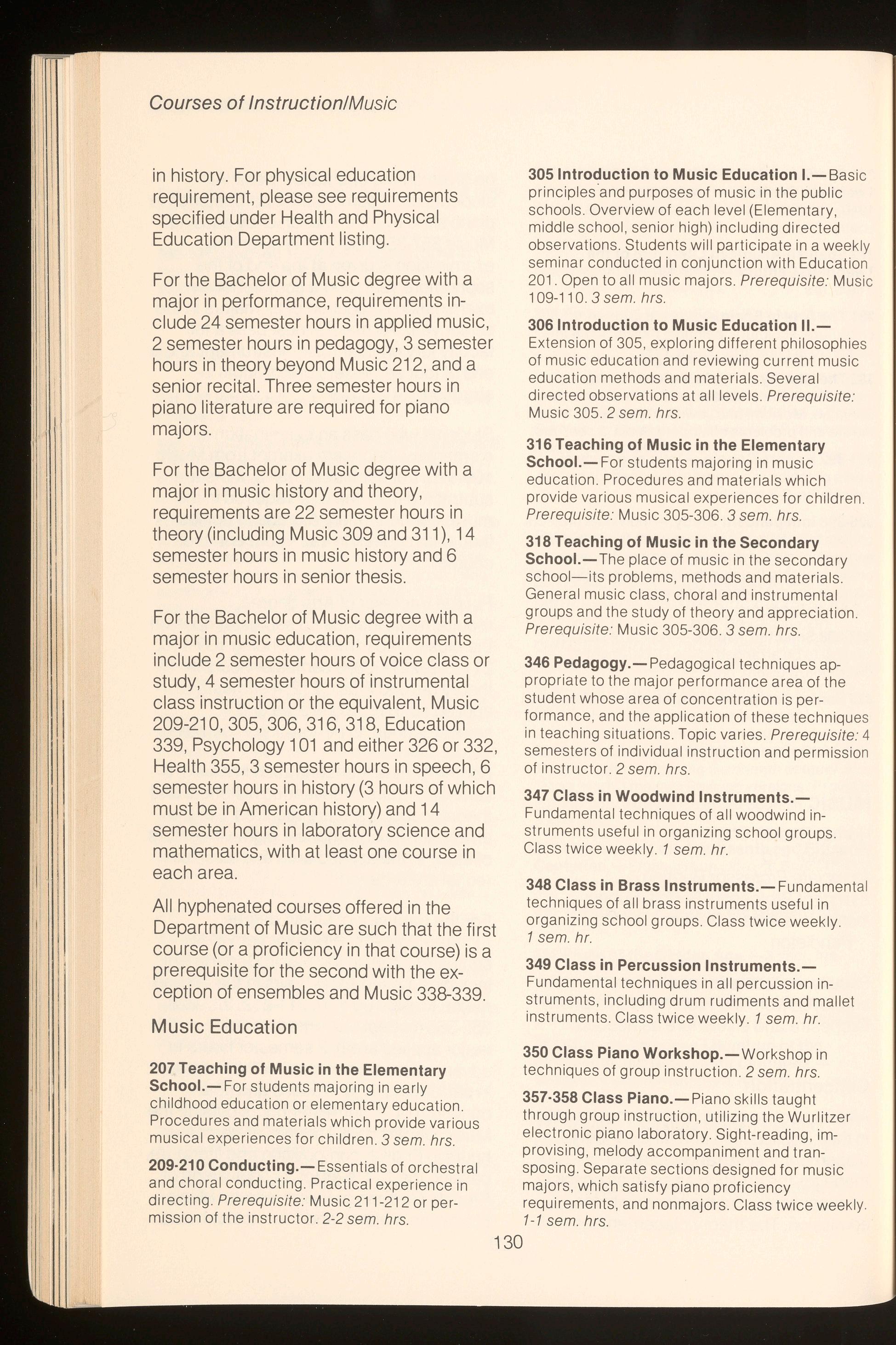
in history. For physical education requirement, please see requirements specified under Health and Physical Education Department listing.
For the Bachelor of Music degree with a major in performance, requirements include 24 semester hours in applied music, 2 semester hours in pedagogy, 3 semester hours in theory beyond Music 212, and a senior recital. Three semester hours in piano literature are required for piano majors.
For the Bachelor of Music degree with a major in music history and theory , requirements are 22 semester hours in theory (including Music 309 and 311), 14 semester hours in music history and 6 semester hours in senior thesis .
For the Bachelor of Music degree with a major in music education, requirements include 2 semester hours of voice class or study, 4 semester hours of instrumental class instruction or the equivalent, Music 209-210, 305, 306, 316, 318, Education 339, Psychology 101 and either 326 or 332, Health 355, 3 semester hours in speech , 6 semester hours in history (3 hours of which must be in American history) and 14 semester hours in laboratory science and mathematics, with at least one course in each area.
All hyphenated courses offered in the Department of Music are such that the first course (or a proficiency in that course) is a prerequisite for the second with the exception of ensembles and Music 338-339.
Music Education
207 Teaching of Music in the Elementary School.-For students majoring in early childhood education or elementary education. Procedures and materials which provide various musical experiences for children. 3 sem. hrs.
209-210 Conducting.-Essentials of orchestral and choral conducting. Practical experience in directing Prerequisite: Music 211-212 or permission of the instructor. 2-2 sem. hrs.
305 Introduction to Music Education 1.-Basic principles .and purposes of music in the public schools. Overview of each level (Elementary, middle school, senior high) including directed observations. Students will participate in a weekly seminar conducted in conjunction with Education 201. Open to all music majors Prerequi site: Mu sic 109-110. 3 sem. hrs.
306 Introduction to Music Education II.Extension of 305 , exploring different philosophies of music education and reviewing current music education methods and materials. Several directed observations at all levels Prerequisite : Music 305. 2 sem. hrs.
316 Teaching of Music in the Elementary School.-For students majoring in music education. Procedures and materials which provide various musical experiences for children Prerequisite: Music 305-306. 3 sem. hrs.
318 Teaching of Music in the Secondary School.- The place of music in the secondary school-its problems, methods and material s. General music class, choral and instrumental groups and the study of theory and appreciation. Prerequisite : Music 305-306. 3 sem. hrs
346 Pedagogy.-Pedagogical techniques appropriate to the major performance area of the student whose area of concentration is performance , and the application of these technique s in teaching situations. Topic varies. Prerequisite : 4 semesters of individual instruction and permission of instructor. 2 sem. hrs.
347 Class in Woodwind Instruments.Fundamental techniques of all woodwind instruments useful in organizing school groups. Class twice weekly. 1 sem. hr.
348 Class in Brass Instruments.- Fundamental techniques of all brass instruments useful in organizing school groups. Class twice weekly. 1 sem. hr.
349 Class in Percussion Instruments.Fundamental techniques in all percussion instruments, including drum rudiments and mallet instruments. Class twice weekly. 1 sem. hr
350 Class Piano Workshop.-Workshop in techniques of group instruction. 2 sem. hrs.
357-358 Class Piano.- Piano skills taught through group instruction , utilizing the Wurlitzer electronic piano laboratory. Sight-reading , improvising , melody accompaniment and transposing. Separate sections designed for music majors , which satisfy piano proficiency requirements , and nonmajors. Class twice weekly 1-1 sem. hrs.
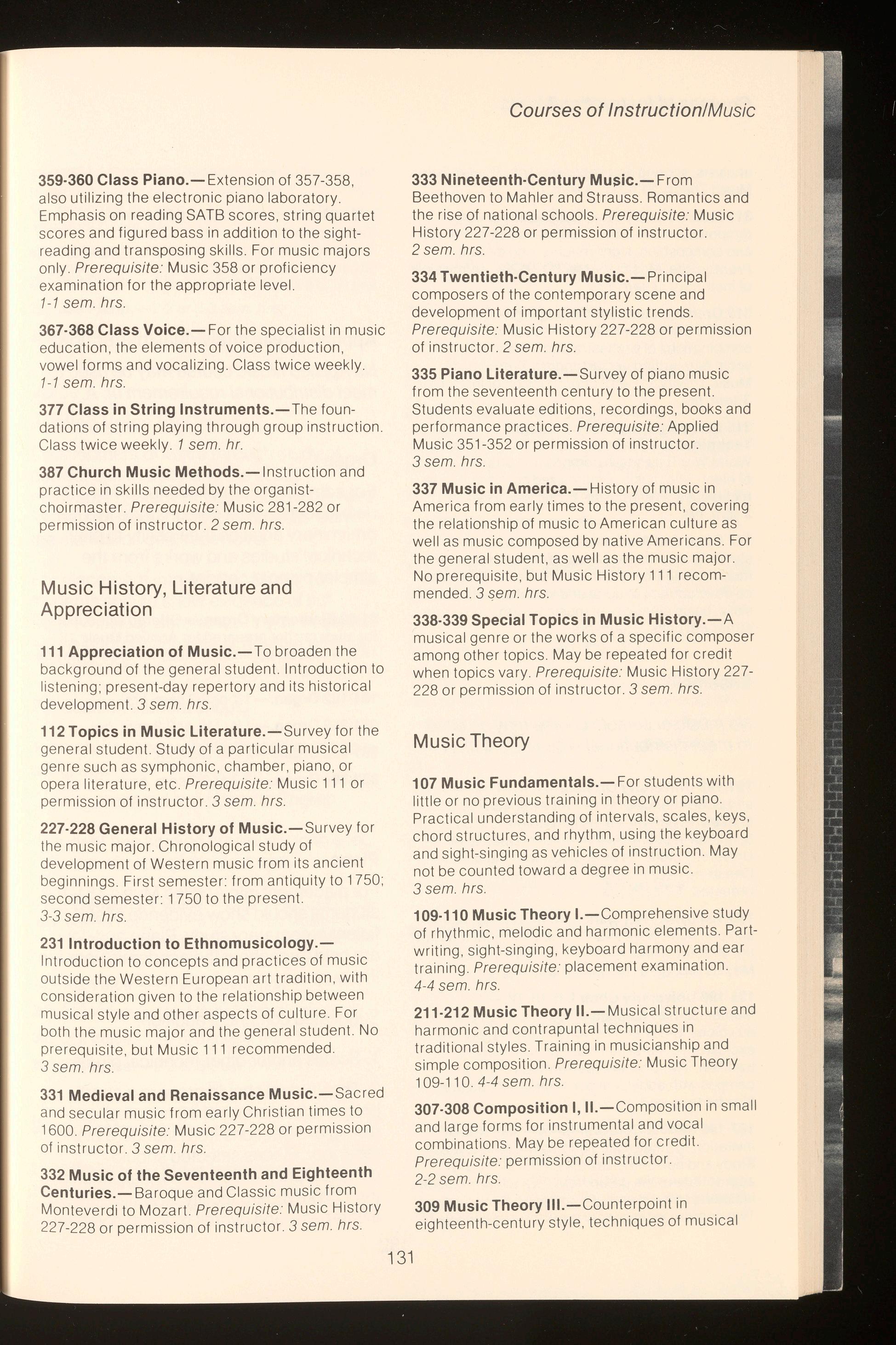
359-360 Class Piano.-Extension of 357-358, al s o utilizing the electronic piano laboratory. Emphasis on reading SATB scores, string quartet scores and figured bass in addition to the sightreading and transposing skills. For music majors only. Prerequisite. Music 358 or proficiency examination for the appropriate level 1-1 s em hrs.
367-368 Class Voice.-For the speciali s t in music edu c ation, the elements of voice production , vowel forms and vocalizing. Class twice weekly 1-1 sem. hrs
377 Class in String Instruments.- The found a tion s of string playing through group instruction Class twice weekly 1 sem. hr.
387 Church Music Methods.-lnstruction and practice in skills needed by the organistc ho irma s ter Prerequisite.· Music 281-282 or pe rmi ss ion of in s tructor 2 sem. hrs.
Music History, Literature and Appreciation
111 Appreciation of Music.- To broaden the background of the general student. Introduction to lis te ning; present-day repertory and its historical development. 3 sem. hrs.
112 Topics in Music Literature.-Survey for the ge neral s tudent. Study of a particular musical ge nre s uch a s s ymphonic , chamber , piano , or o pe ra literature , etc Prerequisite: Music 111 or pe rmi ss ion of ins tructor 3 sem. hrs
227-228 General History of Music.-Survey for t he mu s ic major Chronological study of d ev e lopment of Western music from it s ancient beginning s. Fir s t s emester from antiquity to 1750 ; se cond s emester: 1750 to the present. 3-3 sem. hrs
231 Introduction to Ethnomusicology.lntroduction to concepts and practices of music o ut s ide th e We s tern European art tradition , with c on s ideration given to the relationship between mus ical s tyle and other aspects of culture For both th e mu s ic major and the general s tudent. No p re re qui s ite , but Music 111 recommended 3 se m. hr s.
331 Medieval and Renaissance Music.-Sacred a nd s ecular music from early Christian times to 1600. Prerequisite. Music 227-228 or p e rmis s ion o f ins tructor 3 sem. hrs.
332 Music of the Seventeenth and Eighteenth Centuries.-Baroque and Classic music from Monteverdi to Mozart. Prerequisite: Music History 227-2 28 or permission of instructor 3 sem . hrs .
Courses of Instruction/Music
333 Nineteenth-Century Music.- From Beethoven to Mahler and Strauss. Romantics and the rise of national schools. Prerequisite. Music History 227-228 or permission of instructor. 2 sem. hrs.
334 Twentieth-Century Music.- Principal composers of the contemporary scene and development of important stylistic trends. Prerequisite. Music History 227-228 or permission of instructor. 2 sem. hrs.
335 Piano Literature.-Survey of piano music from the seventeenth century to the present. Students evaluate editions , recordings, books and performance practices. Prerequisite· Applied Music 351-352 or permission of instructor.
3 sem. hrs.
337 Music in America.-History of music in America from early times to the present, covering the relationship of music to American culture as well as music composed by native Americans. For the general student, as well as the music major. No prerequisite, but Music History 111 recommended. 3 sem. hrs
338-339 Special Topics in Music History.-A musical genre or the works of a specific composer among other topics May be repeated for credit when topics vary Prerequisite: Music History 227228 or permission of instructor. 3 sem. hrs.
Music Theory
107 Music Fundamentals.- For students with little or no previous training in theory or piano Practical understanding of intervals , scales , keys , chord structures , and rhythm , using the keyboard and sight-singing as vehicles of instruction. May not be counted toward a degree in music. 3 sem. hrs.
109-110 Music Theory L-Comprehensive study of rhythmic, melodic and harmonic elements. Partwriting, sight-singing , keyboard harmony and ear training. Prerequisite: placement examination. 4-4 sem. hrs
211-212 Music Theory IL-Musical structure and harmonic and contrapuntal techniques in traditional styles Training in musicianship and simple composition Prerequisite : Music Theory 109-110 4-4 sem hrs .
307-308 Composition I, IL-Composition in small and large forms for ins trumental and vocal combinations May be repeated for credit. Prerequisite. permission of instructor 2 -2 sem. hrs.
309 Music Theory !IL-Counterpoint in eighteenth-century style , techniques of musical

Courses of Instruction/Music
analysis, ?coring and score-reading. Prerequisite: Music Theory 211-212. 3 sem. hrs.
311 Music Theory IV.- Techniques of contemporary music, advanced exercises in analysis and composition, sight-reading , and dictation. Prerequisite: Music Theory 211-212 or permission of instructor. 3 sem. hrs.
313 Orchestration and Arranging.-Score analysis and transpositions , arranging for varied combinations of orchestra and band instruments , vocal part-writing and arranging Prerequisite: Music Theory 211-212 or permission of instructo r 3 sem. hrs.
315 Contemporary Compositional Techniques.-Practical applications of postWorld War II trends in composition offering a study of electronic music, synthesized sound and tape techniques Prerequisite: Music Theory 211-212. 2 sem. hrs.
317 Form and Analysis.- To acquaint music students with traditional concepts of design in art music dating from 1600 to the present. Emphasis on development of aural and vi s ual analytical skills , basic elements of musical form, and larger structural units. 3 sem hrs.
Ensembles
No music-ensemble course may be used to meet distributional requirement Ill A.
191-192 University Orchestra I, II, 111,IV.-Study and performance of works for symphony orchestra ; experience in sight reading , and participation in choral performance s. Open to all University students by audition with the director. One three-hour rehearsal weekly. May be repeated 1-1 sem. hrs.
193-194 University Band I, II, 111,IV.-Concert and pep band open to all students by audition with the director. Three one-hour rehearsals weekly May be repeated 1-1 sem. hrs
195-196 University Choir I, II, 111,IV.Membership by audition in mixed chorus of 60 to 80 voices. Study and perform primarily, but not ex clusively , choral literature of We s tern art tradition. Two concerts performed yearly on campus with additional performance s and tours. May be repeated 1-1 sem. hrs
197-198 Schola Cantorum.-Membership by invitation to small mixed chorus of 16-20 voices. Study and perform classical choral literature appropriate to the group from AD. to the present including some music of popular or exotic origin. Two or more local concerts performed each year ,
with periodic trips on special assignment. May be repeated. 1- 1 sem. hrs.
355-356 Accompanying and Ensemble.Keyboard accompanying for voice and instruments. Techniques in sonatas. trios, and larger chamber music groups for pianists. string , and wind players. 2-2 sem. hrs.
Applied Music (IndividualInstruction)
No Applied Music course may be used to meet distributional requirement Ill. A.
Organ
For admission to Applied Music 181-182 new students must demonstrate in a preliminary audition their ability to play technical studies and works from the simpler piano repertory.
81-82 Elementary Organ.-Offered without cr ed it for students not prepared for Applied Music 181182 , or who do not wish to study for credit. May be repeated. 0 sem. hrs.
181-182Organ.-1-1 or3-3sem. hrs.
281-282 Organ.-1 ½ -1 ½ or 3-3 sem. hrs. 381-382 Organ.-2-2 or 3-3 sem. hrs.
383-384 Organ.-2-2 or 3-3 sem. hrs.
Piano
For placement into Applied Music 151-152, students should show evidence of sufficient preparatory study. Piano auditions are held throughout the academic year for this purpose.
Suggested content of audition:
1. Scales and/or other technical studies.
2. The student should prepare a short program (maximum of 15 minutes) consisting of selections from standard piano repertory Pieces selected should demonstrate the student's musicianship through keyboard facility, stylistic awareness, and overall musical potential. 132
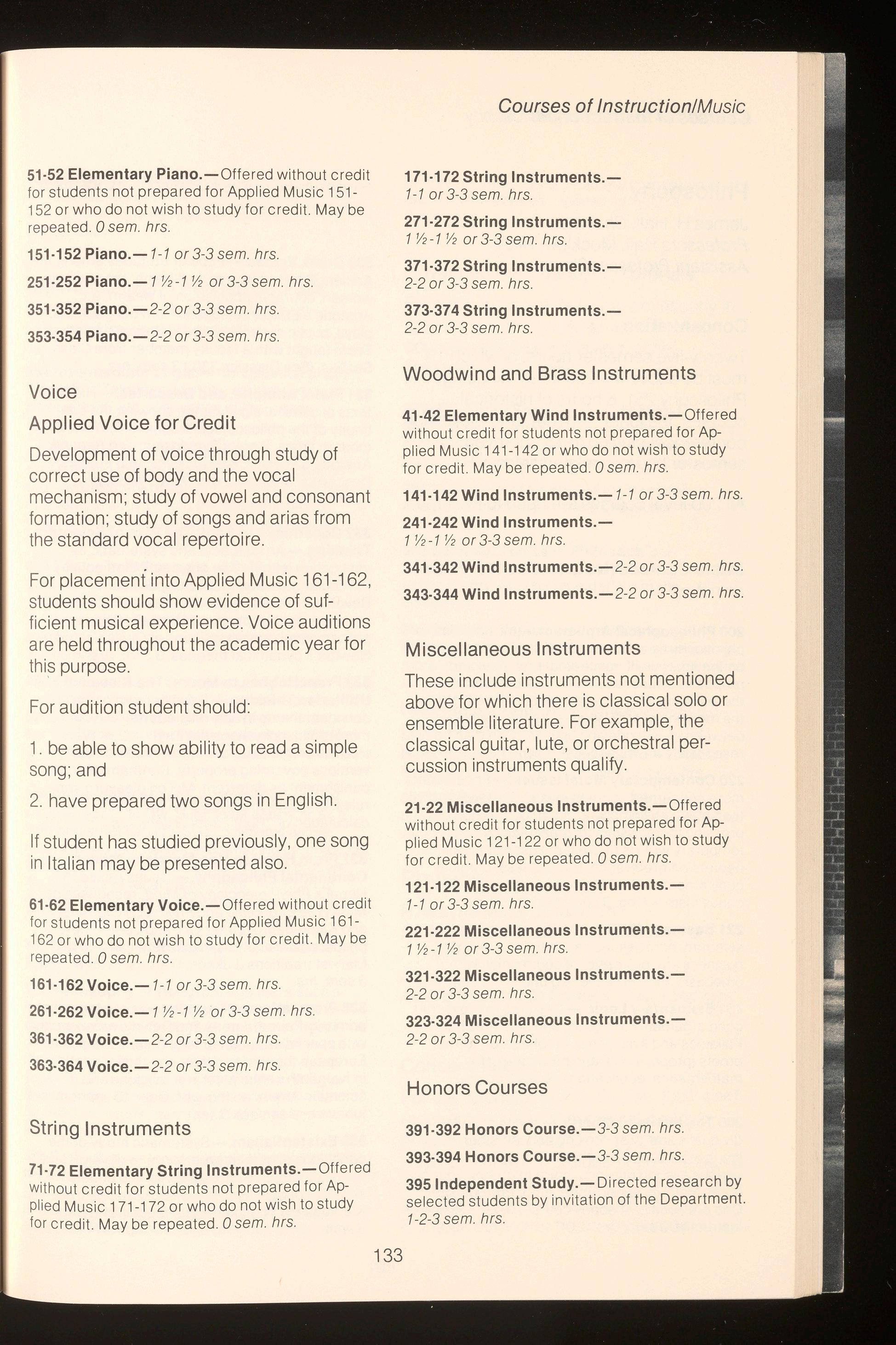
51-52 Elementary Piano.-Offered without credit for students not prepared for Applied Music 151152 or who do not wish to study for credit. May be repeate d. 0 sem. hrs.
151-152 Piano.- I-/ or 3-3 sem. hrs.
251-252 Piano.-/ ½-1 ½ or 3-3 sem. hrs.
351-352 Piano.-2-2 or 3-3 sem. hrs.
353-354 Piano.-2-2 or 3-3 sem. hrs.
Voice
Applied Voice for Credit
Development of voice through study of correct use of body and the vocal mechanism; study of vowel and consonant formation; study of songs and arias from the standard vocal repertoire.
For placement into Applied Music 161-162, students should show evidence of sufficient musical experience. Voice auditions are held throughout the academic year for this purpose.
For aud ition student shou ld:
1. be able to show ability to read a simple song; and
2. have prepared two songs in English.
If student has studied previously , one song in Italian may be presented also.
61-62 Elementary Voice.-Offered without credit for stude nts not prepared for Applied Mu sic 161162 or who do not wish to study for credit. May be repeated O sem. hrs.
161-162Voice.-1-1 or3-3sem. hrs.
261-262Voice.-1 ½-1 ½ or3-3sem. hrs
361-362 Voice.-2 -2 or 3-3 sem. hrs.
363-364 Voice.-2-2 or 3-3 sem. hrs.
StringInstruments
71-72 Elementary String lnstruments.-Offered withou t credit for students not prepared for Applied Music 171-172 or who do not wish to study for credit. May be repeated. 0 sem. hrs. 133
Courses of Instruction/Music
171-172 String Instruments./-/ or 3-3 sem. hrs.
271-272 String Instruments./ ½-1 ½ or3-3sem. hrs.
371-372 String lnstruments.2-2 or 3-3 sem. hrs.
373-374 String lnstruments.2-2 or 3-3 sem. hrs.
Woodwind and Brass Instruments
41-42 Elementary Wind lnstruments.-Offered without credit for students not prepared for Applied Music 141-142 or who do not wish to study for credit. May be repeated. 0 sem. hrs.
141-142 Wind Instruments.-/-/ or 3-3 sem. hrs
241-242 Wind Instruments./ ½-1 ½ or 3-3 sem. hrs.
341-342 Wind lnstruments.-2-2 or 3-3 sem. hrs
343-344 Wind lnstruments.-2-2 or 3-3 sem. hrs.
MiscellaneousInstruments
These include instruments not mentioned above for which there is classical solo or ensemble literature. For example , the classical guitar , lute , or orchestral percussion instruments qualify.
21-22 Miscellaneous lnstruments.-Offered without credit for students not prepared for Applied Music 121-122 or who do not wish to study for credit. May be repeated. 0 sem. hrs.
121-122 Miscellaneous Instruments./-/ or 3-3 sem. hrs.
221-222 Miscellaneous Instruments./ ½- 1 ½ or3-3sem. hrs.
321-322 Miscellaneous lnstruments.2-2 o r 3-3 sem. hrs.
323-324 Miscellaneous lnstruments.2-2 or 3-3 sem. hrs.
Honors Courses
391-392 Honors Course.-3-3 sem. hrs.
393-394 Honors Course.-3 -3 sem. hrs.
395 Independent Study.-Directed research by selected students by invitation of the Department. 1-2-3 sem. hrs.
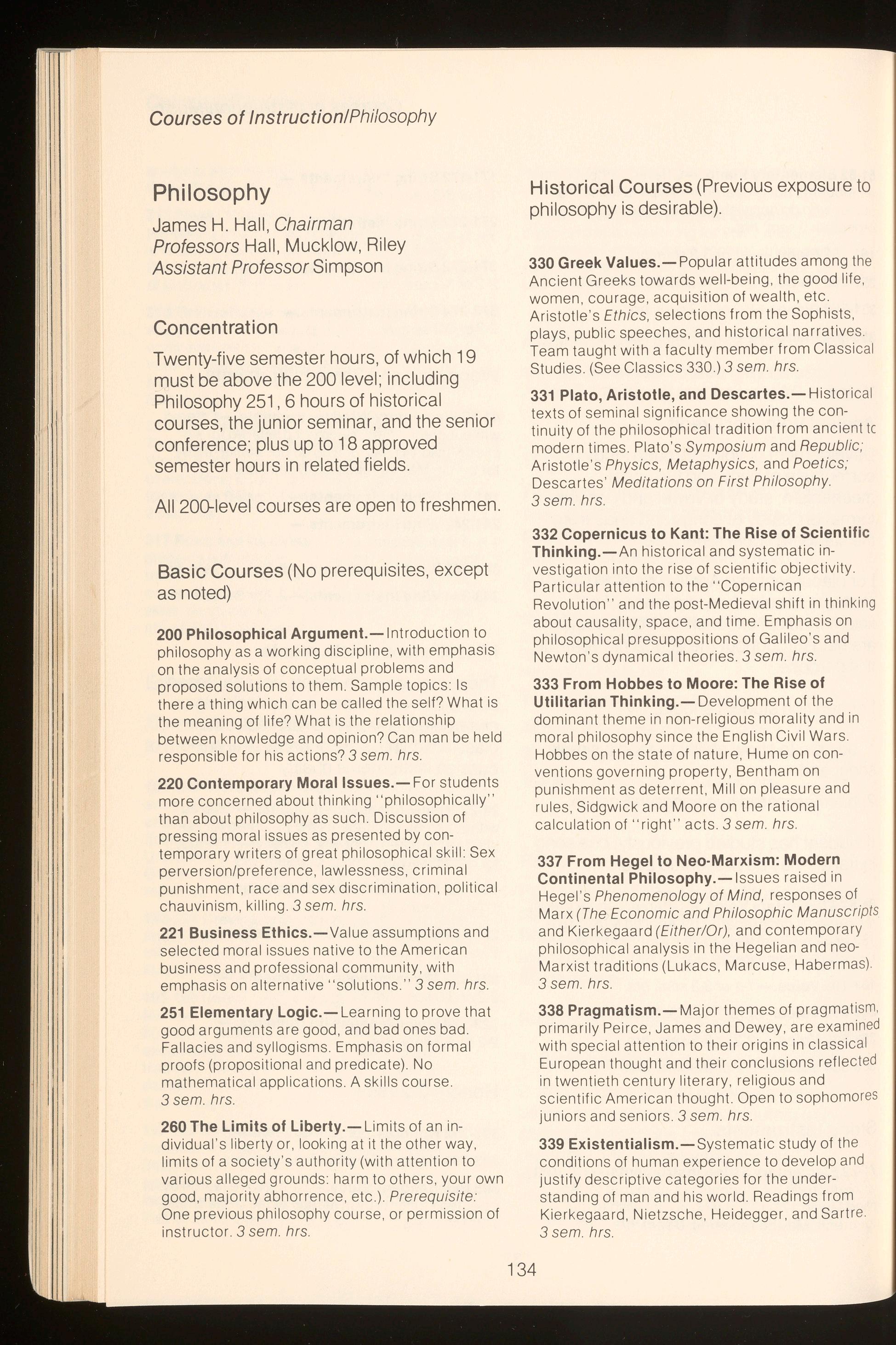
Courses of Instruction/Philosophy
Philosophy
James H. Hall, Chairman
Professors Hall, Mucklow, Riley
Assistant Professor Simpson
Concentration
Twenty-five semester hours, of which 19 must be above the 200 level; including Philosophy 251 , 6 hours of historical courses, the junior seminar, and the senior conference; plus up to 18 approved semester hours in related fields.
All 200-level courses are open to freshmen.
Basic Courses(No prerequisites, except as noted)
200 Philosophical Argument-Introduction to philosophy as a working discipline , with emphasis on the analysis of conceptual problems and proposed solutions to them. Sample topics: Is there a thing which can be called the self? What is the meaning of life? What is the relationship between knowledge and opinion? Can man be held responsible for his actions? 3 sem. hrs.
220 Contemporary Moral Issues.- For students more concerned about thinking "philosophically " than about philosophy as such. Discussion of pressing moral issues as presented by contemporary writers of great philosophical skill: Sex perversion/preference , lawlessness , criminal punishment , race and sex discrimination , political chauvinism , killing 3 sem hrs.
221 Business Ethics.-Value assumptions and selected moral issues native to the American business and profes s ional community , with emphasis on alternative " solutions. " 3 sem. hrs.
251 Elementary Logic.-Learning to prove that good arguments are good , and bad ones bad. Fallacies and syllogisms Emphasis on formal proofs (propositional and predicate). No mathematical applications. A skills course. 3 sem. hrs.
260 The Limits of Liberty.-Limits of an individual ' s liberty or, looking at it the other way , limits of a society ' s authority (with attention to various alleged grounds: harm to others, your own good, majority abhorrence , etc) Prerequisite· One previous philosophy course , or permission of instructor. 3 sem hrs
Historical Courses(Previous exposure to philosophy is desirable).
330 Greek Values.-Popular attitudes among the Ancient Greeks towards well-being , the good life , women , courage , acquisition of wealth , etc. Aristotle ' s Ethics , selections from the Sophists , plays, public speeches, and historical narrative s. Team taught with a faculty member from Classic al Studies. (See Classics 330.) 3 sem . hrs.
331 Plato, Aristotle, and Descartes.- Histori cal texts of seminal s ignificance showing the continuity of the philosophical tradition from ancient tc modern times Plato's Symposium and Republ i c ; Aristotle's Physics, Metaphysics, and Poetics; Descartes ' Meditations on First Philosophy. 3 sem . hrs
332 Copernicus to Kant: The Rise of Scientific Thinking.-An historical and systematic investigation into the rise of scientific objectivity. Particular attention to the "Copernican Revolution" and the post-Medieval shift in thinkin g about causality , space , and time. Emphasis on philosophical presuppositions of Galileo ' s and Newton ' s dynamical theories 3 sem hrs.
333 From Hobbes to Moore: The Rise of Utilitarian Thinking.- Development of the dominant theme in non-religious morality and in moral philosophy s ince the English Civil Wars Hobbes on the s tate of nature , Hume on conv e ntions governing property , Bentham on punishment a s deterrent , Mill on pleasure and rules , Sidgwick and Moore on the rational calculation of" right" acts. 3 sem. hrs.
337 From Hegel to Neo-Marxism: Modern Continental Philosophy.- Issues raised in Hegel ' s Phenomenology of Mind , responses of Marx (The Economic and Philosophic Manuscri pts and Kierkegaard (Either/Or), and contemporar y philosophical analysis in the Hegelian and neoMarxist traditions (Lukacs , Marcuse, Haberma s). 3 sem. hrs.
338 Pragmatism.- Major themes of pragmati sm, primarily Peirce, James and Dewey, are examin ed with special attention to their origins in classical European thought and their conclusions reflect ed in twentieth century literary , religious and s cientific American thought. Open to sophomo res juniors and seniors 3 sem. hrs
339 Existentialism.-Systematic study of th e conditions of human experience to develop and justify descriptive categories for the understanding of man and his world Readings from Kierkegaard , Nietzsche , Heidegger, and Sartr e 3 sem. hrs.
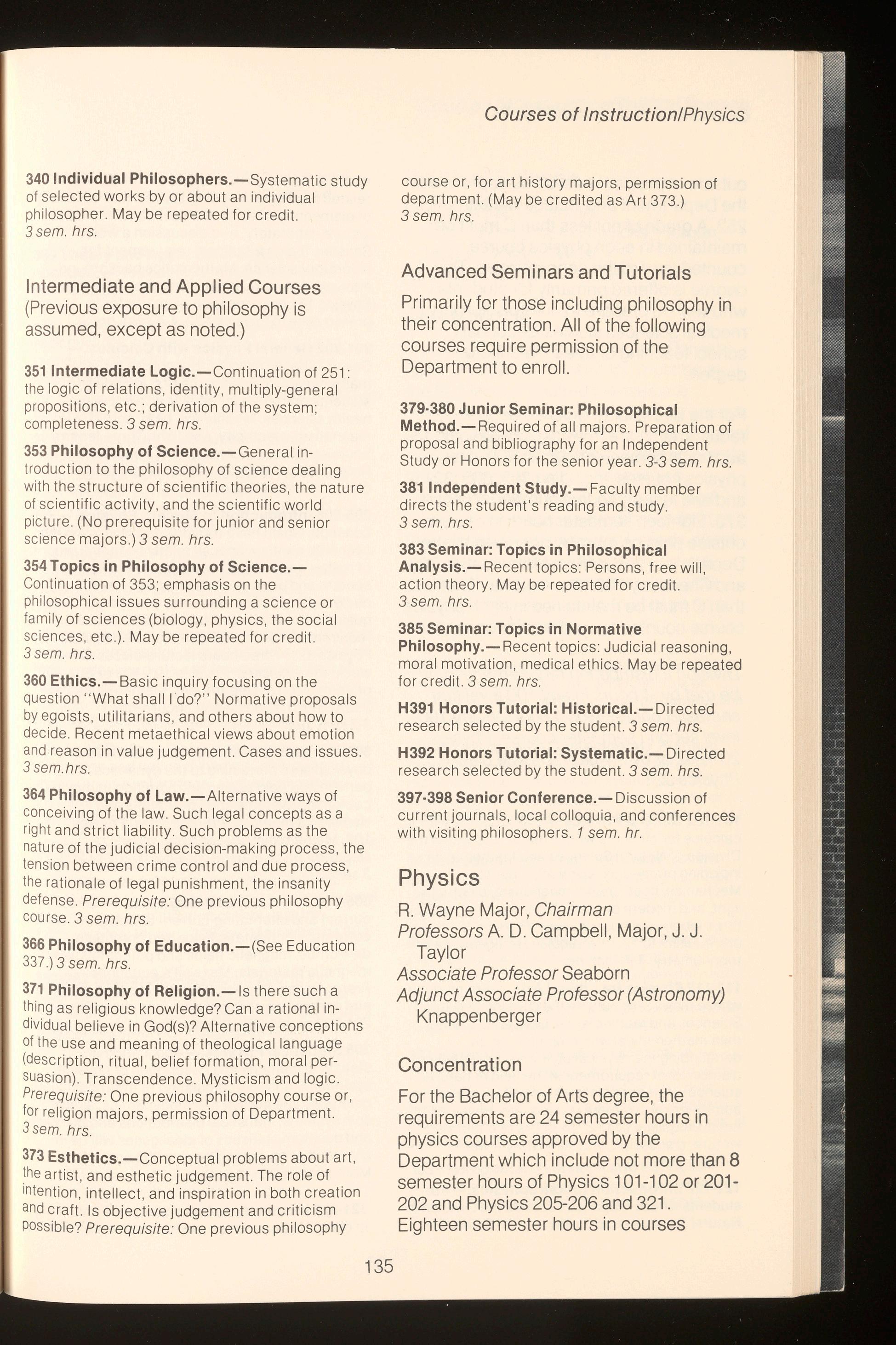
340 Individual Philosophers.-Sy stematic study of selected works by or about an individual philosopher May be repeated for credit. 3 sem. hrs.
Intermediate and Applied Courses (Previous exposure to philosophy is assumed, except as noted.)
351 Intermediate Logic.-Continuation of 251: the logic of relations , identity , multiply-general propositions , etc.; derivation of the system; completenes s. 3 sem hrs.
353 Philosophy of Science.-General introduction to the philosophy of science dealing wit h the structure of scientific theories , the nature of sc ientific activity , and the scientific world pictu re (No prerequisite for junior and senior science majors.) 3 sem. hrs.
354 Topics in Philosophy of Science.Continuation of 353 ; emphasis on the philosophical issues surrounding a science or family of sciences (biology , physics, the social sciences , etc ) May be repeated for credit. 3s em. hrs.
360 Ethics.-Basic inquiry focusing on the question "What shall I do?" Normative proposals by egoists , utilitarians , and others about how to decide. Recent metaethical views about emotion and reason in value judgement. Cases and issues. 3 se m.hrs.
364 Philosophy of Law.-Alternative ways of conceiving of the law Such legal concepts as a right and strict liability Such problems as the nature of the judicial decision-making process, the tension between crime control and due process, the rationale of legal punishment , the insanity def ense. Prerequisite: One previous philosophy course. 3 sem hrs.
366 Philosophy of Education.-(See Education 337 ) 3 sem. hrs.
371 Philosophy of Religion.- ls there such a thing as religious knowledge? Can a rational individual believe in God(s)? Alternative conceptions of t he use and meaning of theological language (description , ritual , belief formation, moral persuasion). Transcendence. Mysticism and logic. Prerequisite: One previous philosophy course or, for religion majors, permission of Department. 3se m hrs.
373Esthetics.-Conceptual problems about art , the artist, and esthetic judgement. The role of intention, intellect, and inspiration in both creation and craft. Is objective judgement and criticism Possible? Prerequisite: One previous philosophy
Courses of Instruction/Physics
course or , for art history majors, permission of department. (May be credited as Art 373 ) 3 sem. hrs.
AdvancedSeminarsand Tutorials
Primarily for those including philosophy in their concentration. All of the following courses require permission of the Department to enroll.
379-380 Junior Seminar: Philosophical Method.-Required of all majors. Preparation of proposal and bibliography for an Independent Study or Honors for the senior year. 3-3 sem. hrs.
381 Independent Study.-Faculty member directs the student's reading and study. 3 sem. hrs.
383 Seminar: Topics in Philosophical Analysis.-Recent topics: Persons, free will, action theory. May be repeated for credit. 3 sem. hrs.
385 Seminar: Topics in Normative Philosophy.-Recent topics: Judicial reasoning, moral motivation, medical ethics. May be repeated for credit. 3 sem. hrs.
H391 Honors Tutorial: Historical.-Directed research selected by the student. 3 sem. hrs.
H392 Honors Tutorial: Systematic.-Directed research selected by the student. 3 sem. hrs.
397-398 Senior Conference.-Discussion of current journals , local colloquia, and conferences with visiting philosophers. 1 sem. hr.
Physics
R. Wayne Major, Chairman Professors A. D. Campbell, Major, J J. Taylor
Associate Professor Seaborn Adjunct Associate Professor (Astronomy) Knappenberger
Concentration
For the Bachelor of Arts degree, the requirements are 24 semester hours in physics courses approved by the Department which include not more than 8 semester hours of Physics 101-102 or 201202 and Physics 205-206 and 321 Eighteen semester hours in courses
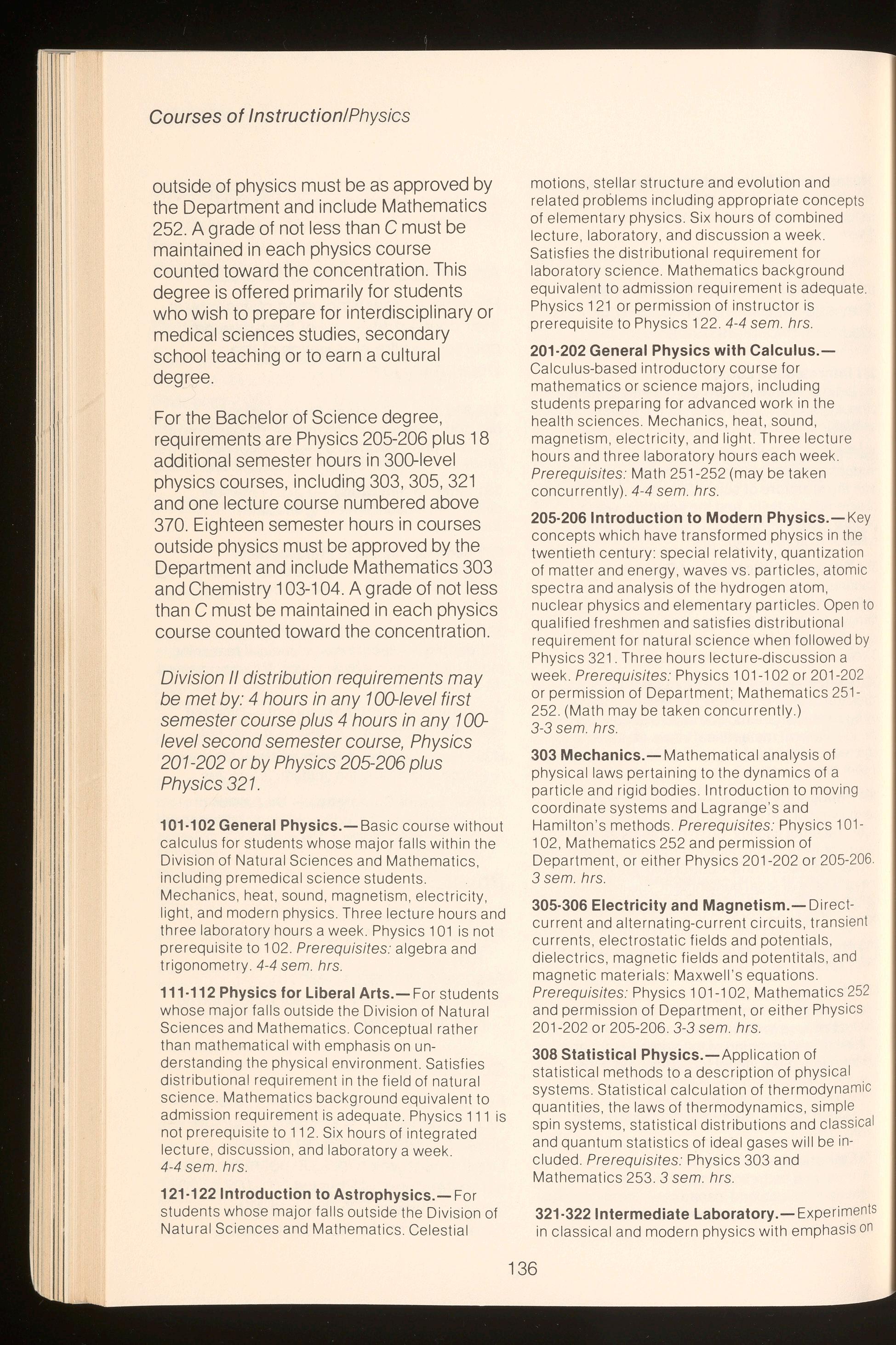
Courses of Instruction/Physics
outside of physics must be as approved by the Department and include Mathematics 252. A grade of not less than C must be maintained in each physics course counted toward the concentration. This degree is offered primarily for students who wish to prepare for interdisciplinary or medical sciences studies, secondary school teaching or to earn a cultural degree.
For the Bachelor of Science degree, requirements are Physics 205-206 plus 18 additional semester hours in 300-level physics courses, including 303, 305, 321 and one lecture course numbered above 370. Eighteen semester hours in courses outside physics must be approved by the Department and includ e Mathematics 303 and Chemistry 103-104. A grade of not less than C must be maintained in each physics course counted toward the concentration.
Division II distribution requirements may be met by: 4 hours in any 1GO-levelfirst semester course plus 4 hours in any 1GOlevel second semester course, Physics 201-202 or by Physics 205-206plus Physics 321.
101-102 General Physics.-Basic course without calculus for students whose major falls within the Division of Natural Sciences and Mathematics , including premedical science students. Mechanics , heat, sound, magnetism, electricity, light, and modern physics. Three lecture hours and three laboratory hours a week. Physics 101 is not prerequisite to 102. Prerequisites: algebra and trigonometry 4-4 sem. hrs.
111-112 Physics for Liberal Arts.-For students whose major falls outside the Division of Natural Sciences and Mathematic s. Conceptual rather than mathematical with emphasis on understanding the physical env ironment. Satisfies distributional requirement in the field of natural science. Mathematics background equivalent to admission requirement is adequate. Physics 111 is not prerequisite to 112. Six hours of integrated lecture , discussion, and laboratory a week. 4-4 sem. hrs.
121-122 Introduction to Astrophysics.- For students whose major falls outside the Division of Natural Sciences and Mathematics. Celestial
motions , stellar structure and evo l ution and related problems including appropriate concepts of elementary physics. Six hours of combined lecture , laborato ry , and discussion a week. Satisfies the distributional requirement for laboratory science. Mathematics background equivalent to admission requirement is adequate Physics 121 or permission of instructor is prerequisite to Physics 122. 4-4 sem. hrs.
201-202 General Physics with Calculus.Calculus-based introductory course for mathematics or science majors , including students preparing for advanced work in the health sciences. Mechanics , heat, sound, magnetism , electricity, and light. Three lectur e hours and three laboratory hours each week. Prerequisites. Math 25 1-25 2 (may be taken concurrently). 4-4 sem. hrs.
205-206 Introduction to Modern Physics.-K ey concepts which have transformed physics in the twentieth century: special relativity, quantization of matter and energy, waves vs. particles, atomic spectra and analysis of the hydrogen atom, nuclear physics and elementary particles Open to qualified freshmen and satisfies distributional requirement for natural science when followed by Phy s ics 321. Three hours lecture-di scussion a week. Prerequisites· Physics 101-102 or 201-202 or permission of Department; Mathematic s 251252. (Math may be taken concurrently.) 3-3 sem. hrs.
303 Mechanics.-Mathematical analysis of phy s ical laws pertaining to the dynamics of a particle and rigid bodies. Introduction to moving coordinate systems and Lagrange 's and Hamilton 's methods. Prerequisites : Physi cs 101· 102 , Mathematic s 252 and permission of Department , or either Physics 201-202 or 205-206. 3 sem. hrs.
305-306 Electricity and Magnetism.-Dire ctcurrent and alternating -current c ir cuits, tran sient currents, electrostatic field s and potentials, dielectrics , magnetic field s and potentita ls, and magnetic materials: Maxwell's equations. Prerequisites. Physics 101-102 , Mathematic s 252 and permission of Department , or either Physics 201-202 or 205-206. 3-3 sem. hrs.
308 Statistical Physics.-Application of statistical methods to a description of physical systems Statistical calculation of thermodynamic quantities , the laws of thermodynamics , simple spin systems, statistical distributions and classical and quantum statistics of ideal gases will be included. Prerequisites· Physics 303 and Mathematics 253. 3 sem. hrs.
321-322 Intermediate Laboratory.-Experim ents in classical and modern physics with emphasis on
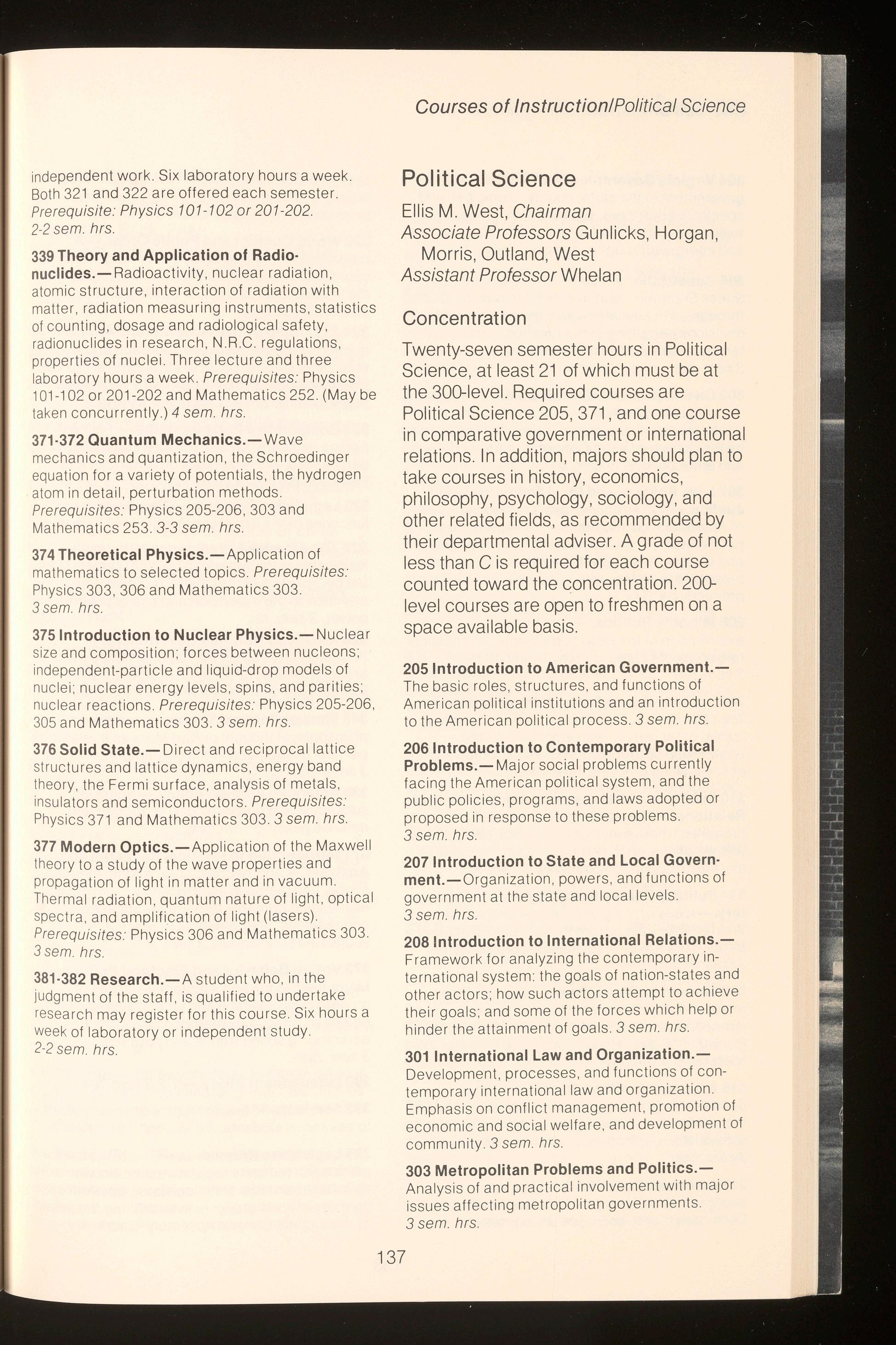
independent work. Six laborato ry hou rs a week. Both 321 and 322 a re o f fered eac h semester. Prerequisite: Physics 101-102 or 201-202. 2-2 sem. hrs.
339 T heory and Application of Radionuclides.-R adioactivity, nuclear radiation, atomic struct u re, interaction o f radia t ion w ith matter, radiatio n measu ri ng instrume nt s, s t atist ics of counting, dosage a nd rad iolog ica l safety, radionuclides in research, N. R.C. regulations, properties o f nuc le i Three lec t ure and t h ree laboratory hours a week. Prerequisites· Physics 101-102 or 20 1-202 a nd Mathe m a ti cs 252. (May b e taken concurrently.) 4 sem. hrs.
371-372 Quantum Mechanics.- Wave mechanics and qu a n tiza ti on , the Sc hr oe d inger equation for a va ri e t y of potentia ls, t he hydroge n atom in detail, pertu rbation methods. Prerequisites: Phys ics 205-206, 303 and Mathematics 253. 3-3 sem. hrs.
374 Theoretical Physics.-A pplica ti o n o f mathematics to se lected top ics Prerequisites: Physics 303, 306 and Mathematics 303. 3 sem. hrs.
375 Introduction to Nuclear Physics.- Nuc lear size and composition; fo rces between nucleons; independent-particle and liqu id-drop models of nuclei; nuclear ene rgy levels, spins, and pari ti es; nuclear react io ns. Prerequisites: Physics 205-206, 305 and Mathema ti cs 303. 3 sem. hrs.
376 Solid State . - Direct and reciprocal lattice structures and lattice dynam ics, energy b and theory, the Fer mi sur f ace, a nalysis o f me t a ls, insulators and semicond u ctors. Prerequisites: Physics 371 and Mathematics 303. 3 sem. hrs.
377 Modern Optics - Applica ti on of the Maxwell theory to a stu d y o f the wave properties and propagation o f light in matte r and in vacuum. Thermal radiation, quantum nature o f light, optical spectra, and amplif ication of light (lasers). Prerequisites. Physics 306 a nd Mathematics 303 3 sem hrs.
381-382 Research.- A student who, in the judgment of the staff, is qua lif ied to unde r take research may reg ister for this course. Six ho u rs a week of laboratory or independent study. 2-2 sem. hrs.
Courses of Instruction/Politic al Scienc e
Political Science
Ellis M. West. Chairman Ass ociate Professors Gunlicks , Horgan , Morris , Outland , We s t Ass is tant Professor Whelan
Concentration
Twenty-seven s emest e r hours in Political Science , at least 21 of which mu st be at the 3 00-level. Required courses are Political Sci e nce 205 , 3 71 , and one cour se in c ompar a tive governm e nt or inte rnational re la tions. In addition , majors should plan to tak e course s in history , economics , philo sophy , psychology , sociology , and oth e r related fields, a s recommended by their departmental advi ser. A grad e of not less than C is required for each course co u nted towa rd the concentr a tion 200leve l c our ses are open to fre s hm e n on a s pace available basi s
205 Introduction to American Government.The basic roles, structures, an d f unct ions of A m er ican po liti cal insti t ut ions a nd an int rod uctio n to the A m erica n poli ti cal process. 3 sem. hrs.
206 Introduction to Contemporary Political Problems. - Major social problems cur re nt ly f acing t he Amer ican po lit ica l system, and t he public pol icies, progra m s, and laws adopted or proposed in response to these problems. 3 sem. hrs.
207 Introduction to State and Local Government- Organization, powers, a nd f u nctio ns of government at the state and local leve ls. 3 sem. hrs.
208 Introduction to International Relations.F ramework f o r ana lyzing the contemporary internationa l system: the goals of nation -states and othe r actors; how such actors attemp t to achieve their goals; and some of the forces which he lp or hi nde r t he atta in m ent of goa ls. 3 sem. hrs.
301 Internat ional Law and Organization.Deve lopment, processes, and functions of contempo ra ry international law and o rganiza ti on. Emphasis on conf lict management, promotion o f economic and social welfare, a nd development of community. 3 sem. hrs.
303 Metropolitan Problems and Politics.A na lysis of and practical involvement with major issues a ff ecting met ropolitan governments. 3 sem. hrs.
137
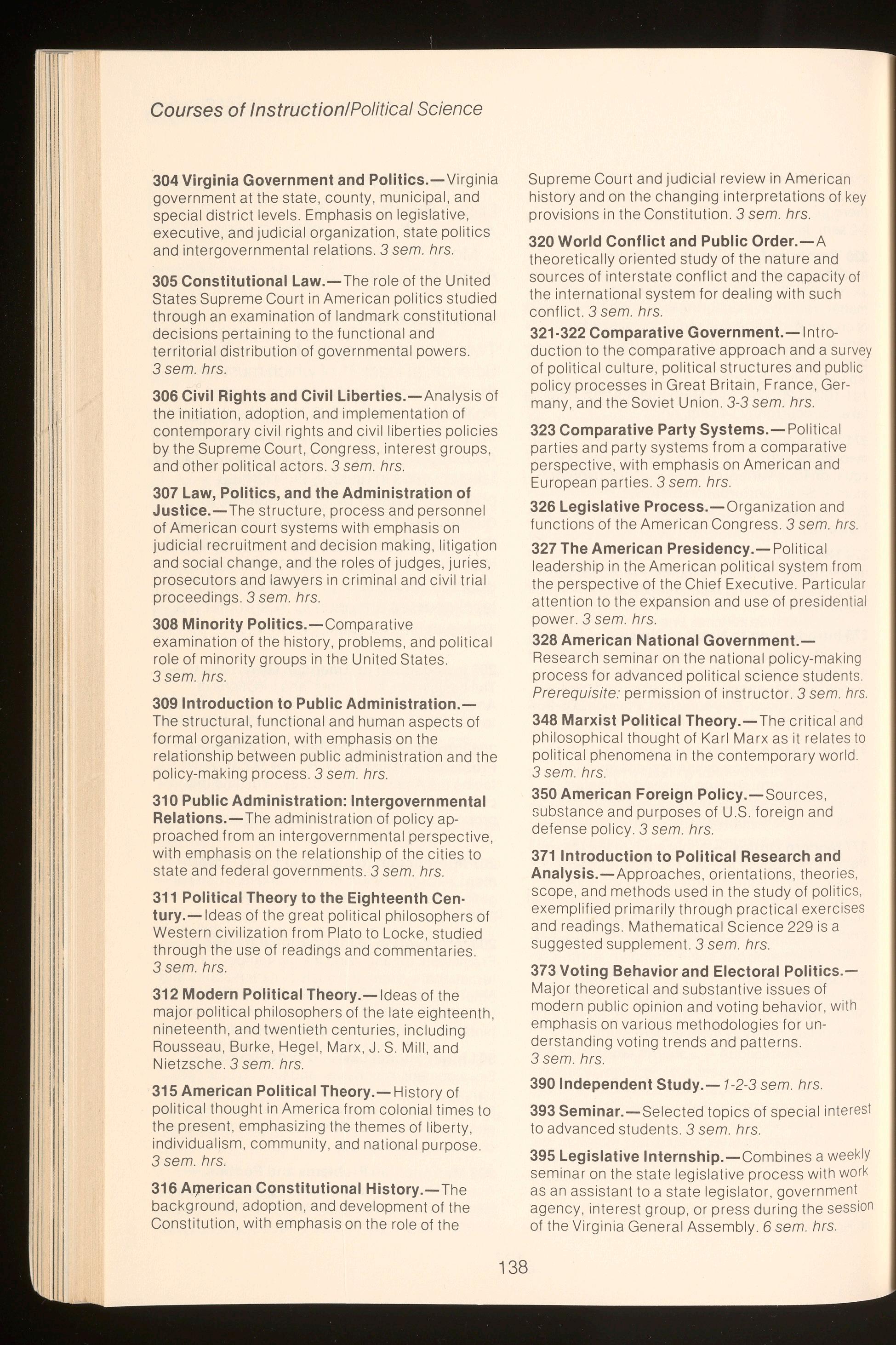
Courses of Instruction/Political Science
304 Virginia Government and Politics.-Virginia government at the state, county, municipal, and special district levels. Emphasis on legislative , executive, and judicial organization, state politics and intergovernmental relations. 3 sem. hrs.
305 Constitutional Law.- The role of the United States Supreme Court in American politics studied through an examination of landmark constitutional decisions pertaining to the functional and territorial distribution of governmental powers. 3 sem. hrs.
306 Civil Rights and Civil Liberties.-Analysis of the initiation, adoption, and implementation of contemporary civil rights and civil liberties policies by the Supreme Court, Congress, interest groups, and other politica l actors. 3 sem. hrs.
307 Law, Politics, and the Administration of Justice - The structure, process and personnel of American court systems with emphasis on judicial recruitment and decision making, litigation and social change, and the roles of judges, juries, prosecutors and lawyer s in criminal and civil trial proceedings. 3 sem. hrs.
308 Minority Politics.-Comparative examination of the history , problems, and political role of minority groups in the United States. 3 sem. hrs.
309 Introduction to Public Administration.The structural, functional and human aspects of formal organization, with emphasis on the relationship between public administration and the policy-making process. 3 sem. hrs.
310 Public Administration : Intergovernmental Relations.- The administration of policy approached from an intergovernmental perspective, with emphasis on the relationship of the cities to state and federal governments. 3 sem. hrs.
311 Political Theory to the Eighteenth Century.- Ideas of the great political philosophers of Western civilization from Plato to Locke , studied through the use of readings and commentaries. 3 sem. hrs.
312 Modern Political Theory.- Ideas of the major political philosophers of the late eighteenth, nineteenth, and twentieth centuries, including Rou sseau, Burke , Hegel, Marx, J. S. Mill, and Nietzsche. 3 sem. hrs.
315 American Political Theory.-Hi story of political thought in America from colonia l times to the present, emphasizing the themes of liberty, individualism , community, and national purpose. 3 sem. hrs.
316 Ar,nericanConstitutional History.-The background , adoption, and development of the Constitution, with emphasis on the role of the
Supreme Court and judicial review in American history and on the changing interpretations of key provisions in the Constitution. 3 sem. hrs.
320 World Conflict and Public Order.-A theoretically oriented study of the nature and sources of interstate conflict and the capacity of the international syste m for dealing with such conflict. 3 sem. hrs.
321-322 Comparative Government-Intr oduction to the comparative approach and a survey of political culture, political structures and public policy processes in Great Britain, France , Germany, and the Soviet Union. 3-3 sem. hrs.
323 Comparative Party Systems.-Political parties and party systems from a comparative perspective, with emphasis on American and European parties. 3 sem. hrs.
326 Legislative Process.-Organization and functions of the American Congress. 3 sem. hrs.
327 The American Presidency.-Politica l leadership in the American political system from the perspective of the Chief Executive. Particular attention to the expansion and use of presidential power. 3 sem. hrs.
328 American National Government.Research sem inar on the national policy-making process for advanced political science students. Prerequisite: permission of instructor. 3 sem. hrs.
348 Marxist Political Theory.- The critical and philosophical thought of Karl Marx as it relates to political phenomena in the contemporary world. 3 sem. hrs.
350 American Foreign Policy.-Sourc es, substance and purposes of U .S. foreign and defense policy. 3 sem. hrs.
371 Introduction to Political Research and Analysis.-Approaches , orientations, theories , scope, and methods used in the study of politics , exemplified primarily through practical exercises and readings Mathematical Science 229 is a suggested supplement. 3 sem. hrs.
373 Voting Behavior and Electoral Politics .Major theoretical and substantive issues of modern public opinion and voting behavior, with emphasis on various methodologies for understanding voting trends and patterns. 3 sem. hrs.
390 Independent Study.-1-2-3 sem. hrs.
393 Seminar.-Selected topics of special interest to advanced students. 3 sem. hrs.
395 Legislative lnternship.-Combines a weekly sem inar on the state legislative process with work as an assistant to a state legislator, government agency, interest group, or press during the session of the Virginia General Assembly. 6 sem. hrs.
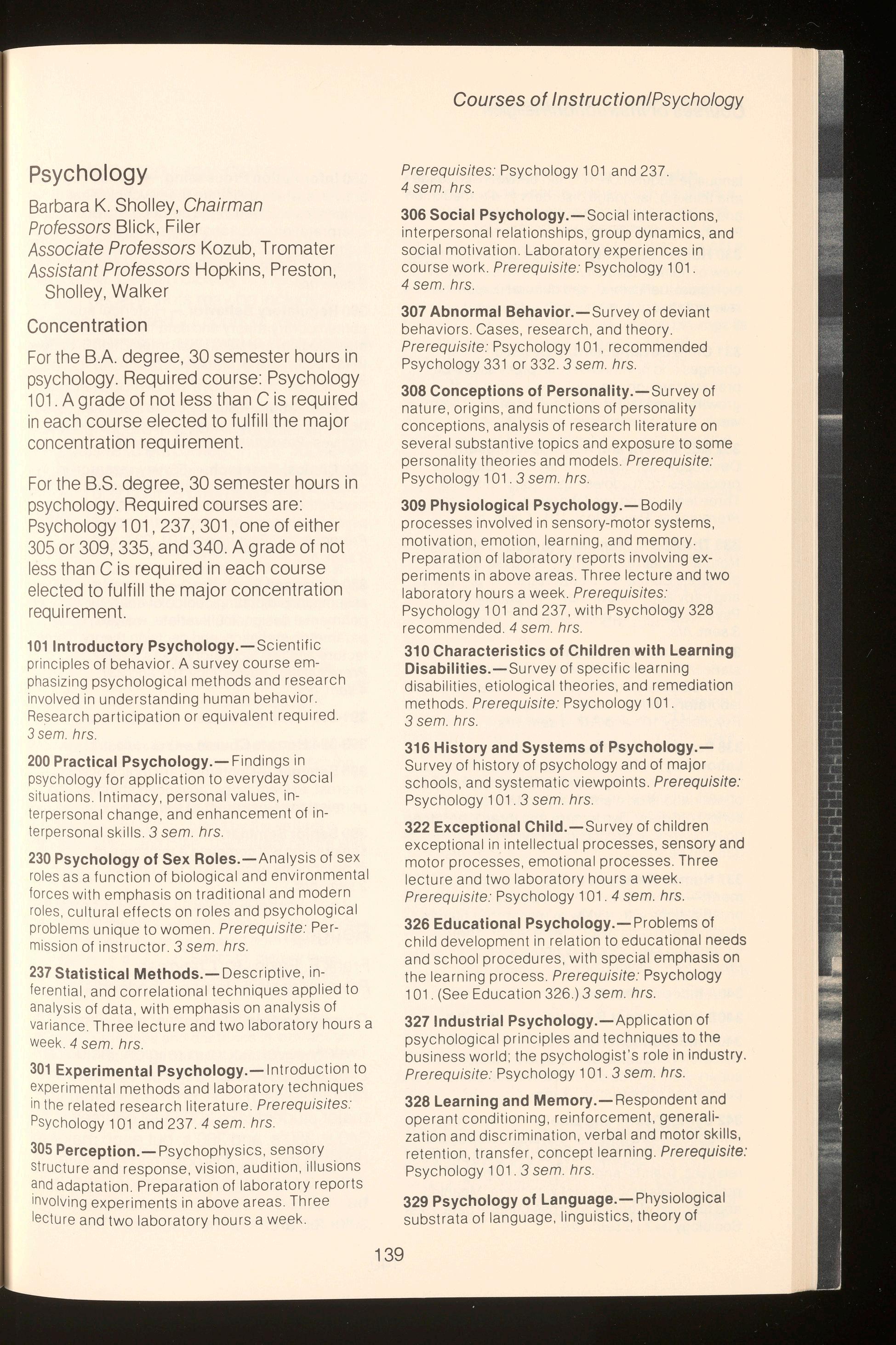
Courses of Instruction/Psychology
Psychology
Barbara K. Sholley, Chairman
ProfessorsBlick, Filer
AssociateProfessors Kozub, Tromater
AssistantProfessors Hopkins , Preston, Sholley,Walker
Concentration
For the BA degree, 30 semester hours in psychology. Required course: Psychology 101. A grade of not less than C is required in each course elected to fulfill the major concentra tion requirement.
For the B.S degree, 30 semester hours in psychology. Required courses are: Psychology 101, 237, 301, one of either 305 or 309, 335, and 340. A grade of not less than C is required in each course elected to fulfill the major concentration requireme nt.
101Introductory Psychology.-S cientific principles of behavior. A survey course emphasizing psychological methods and research involved in understanding human behavior. Research participation or equivalent required . 3sem. hrs.
200 Practical Psychology.-Finding s in psychology for application to everyday social situations. Intimacy , personal values, interpersona l change, and e nhancement of interpersonal skills. 3 sem. hrs.
230 Psychology of Sex Roles.-Analy sis of sex roles as a function of biological and environmental forces with emphasis on traditional and modern roles, cultural effects on roles and psychological problems unique to women. Prerequisite.· Permission of instructor. 3 sem. hrs.
237 Statistical Methods.-Descripti ve, inferential, and correlational techniques applied to analysis of data, with emphasis on analysis of variance. Three lecture and two laboratory hours a week. 4 sem. hrs.
301 Experimental Psychology.- Introduction to experimental methods and laboratory techniques in the related research literature. Prerequisites: Psychology 101 and 237. 4 sem. hrs.
305 Perception.-Psychophysics, sensory structure and response, vision, audition, illusions and adaptation Preparation of laboratory reports involving experiments in above areas. Three lecture and two laboratory hours a week.
Prerequisites: Psychology 101 and 237. 4 sem. hrs.
306 Social Psychology.-Social interactions, interpersonal relationships, group dynamics, and social motivation. Laboratory experiences in course work. Prerequisite. Psychology 101. 4 sem. hrs.
307 Abnormal Behavior.-Survey of deviant behaviors. Cases, research, and theory. Prerequisite· Psychology 101, recommended Psycho logy 331 or 332. 3 sem. hrs.
308 Conceptions of Personality.-Survey of nature, origins, and functions of personality conceptions, analysis of research literature on several substantive topics and exposure to some personality theories and models Prerequisite: Psychology 101. 3 sem. hrs.
309 Physiological Psychology.-Bodily processes involved in sensory-motor systems, motivation, emotion, learning, and memory. Preparation of laboratory reports involving experiments in above areas. Three lecture and two laboratory hours a week. Prerequisites· Psychology 101 and 237, with Psychology 328 recommended. 4 sem. hrs.
310 Characteristics of Children with Learning Disabilities.-Survey of specific learning disabilities, etiological theories, and remediation methods. Prerequi site.· Psychology 101. 3 sem. hrs.
316 History and Systems of Psychology.Survey of history of psychology and of major schools, and systematic viewpoints. Prerequisite : Psychology 101. 3 sem. hrs.
322 Exceptional Child.-Survey of children exceptional in intellectual processes, sensory and motor processes, emotional processes. Three lecture and two laboratory hours a week. Prerequisite. Psychology 101. 4 sem. hrs.
326 Educational Psychology.-Problems of child development in relation to educational needs and school procedures, with special emphasis on the learning process. Prerequisite. Psychology 101 (See Education 326) 3 sem. hrs.
327 Industrial Psychology.-Application of psychological principles and techniques to the business world; the psychologist's role in industry. Prerequisite. Psychology 101. 3 sem. hrs.
328 Learning and Memory.-Respondent and operant conditioning, reinforcement, generalization and discrimination, verbal and motor skills, retention, transfer, concept learning Prerequisite: Psychology 101. 3 sem. hrs.
329 Psychology of Language.-Physiological substrata of language, linguistics , theory of
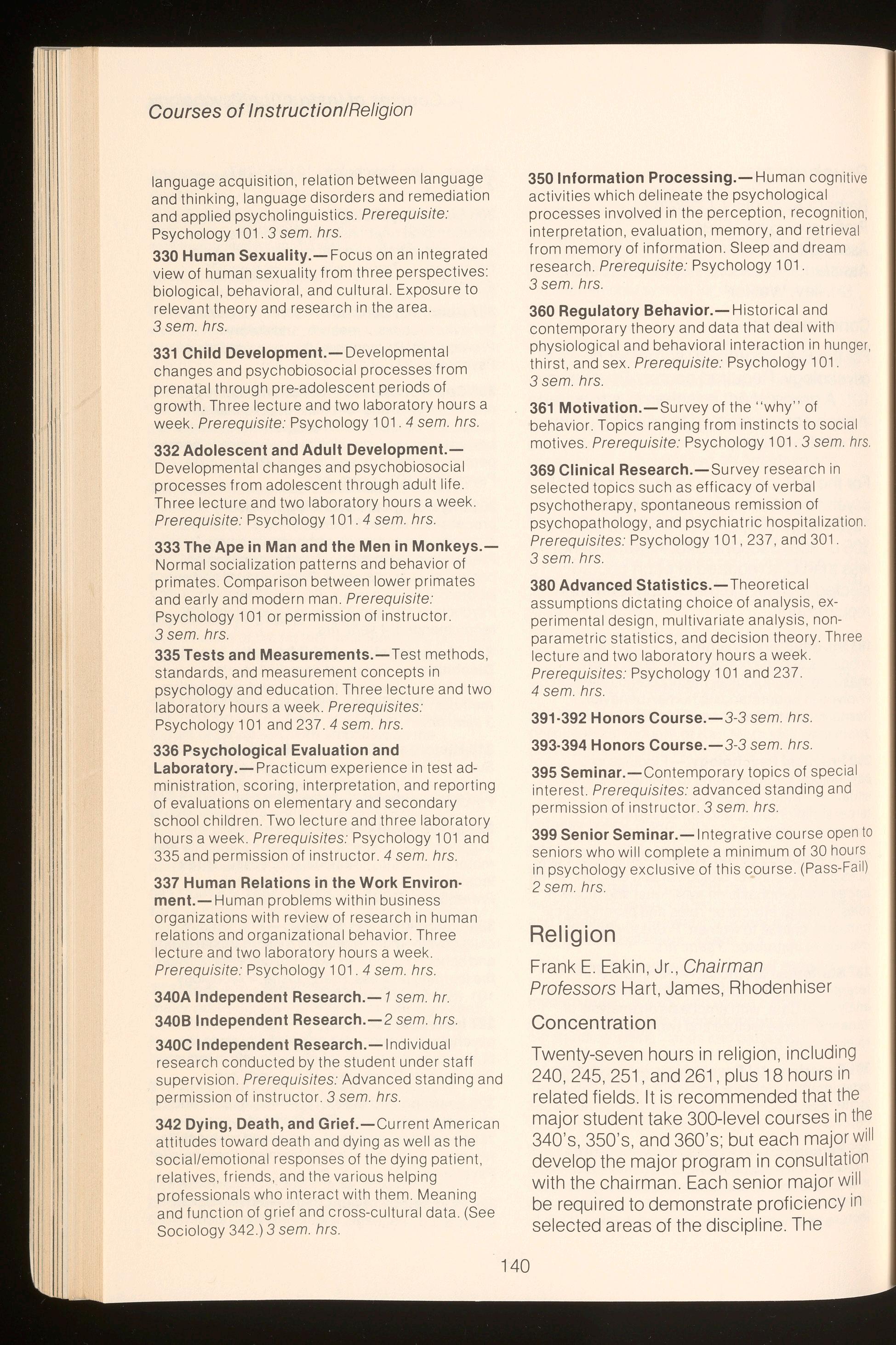
Courses of Instruction/Religion
language acquisition, relation between language and thinking, language disorders and remediation and applied psycholinguistics. Prerequisite: Psycho logy 101. 3 sem. hrs.
330 Human Sexuality.-Focu s on an integrated view of human sexuality from three perspectives: biological, behavioral , and cultural. Exposure to relevant theory and research in the area. 3 sem. hrs.
331 Child Development.- Deve lopmental changes and psychobiosocial processes from prenatal through pre-adolescent periods of growth. Three lect ure and two laboratory hours a week. Prerequisite : Psychology 101 4 sem. hrs.
332 Adolescent and Adult Development.Developmental changes and psychobiosocial processes from adolescent through adult life. Three lecture and two laboratory hours a week. Prerequisite: Psychology 101. 4 sem. hrs.
333 The Ape in Man and the Men in Monkeys.Normal socialization patterns and behavior of primates. Comparison between lower primates and early and modern man Prerequi site: Psychology 101 or permission of instructor. 3 sem. hrs.
335 Tests and Measurements.- Test methods, standards, and measurement concepts in psychology and education. Three lecture and two laboratory hours a week. Prerequisites· Psychology 101 and 237. 4 sem. hrs.
336 Psychological Evaluation and Laboratory.-Pra cticum experience in test administration, scoring , interpretation, and reporting of evaluations on elementary and seconda ry school children. Two lecture and three laboratory hours a week. Prerequi sites. Psychology 101 and 335 and permis sion of instructor 4 sem. hrs.
337 Human Relations in the Work Environment.- Human problems within business organizations with review of research in human relations and organizational behavior. Three lecture and two laboratory hours a week. Prerequisite: Psycho logy 101. 4 sem. hrs.
340A Independent Research.- I sem. hr.
340B Independent Research.- 2 sem. hrs.
340C Independent Research.-lndi vidual re sea rch conducted by the student under staff supervision. Prerequisites: Advanced standing and permission of instructor. 3 sem. hrs
342 Dying, Death, and Grief.-Current American attitudes toward death and dying as well as the social/emotional responses of the dying patient, relatives , friend s, and the various helping professionals who interact with them. Meaning and function of grief and cross-cultural data. (See Sociology 342 .) 3 sem. hrs
350 Information Processing.-Human cognitive activities which delineate the psychological processes involved in the perception, recogniti on, interpretat ion , eva luation, memory , and retriev al from memory of information. Sleep and dream research. Prerequisite: Psychology 101. 3 sem. hrs.
360 Regulatory Behavior.-Hi storical and contemporary theory and data that deal with physiological and behavioral interaction in hunger, thirst , and sex. Prerequisite: Psychology 101. 3 sem. hrs.
361 Motivation.-Survey of the "why" of behavior. Topics ranging from instincts to social motives. Prerequisite: Psychology 101. 3 sem. hrs.
369 Clinical Research.-Survey research in se lected topics such as efficacy of verbal psychotherapy , spontan eous remi ssio n of psychopathology , and psychiatr ic hospitalization Prerequisites: Psychology 101, 237, and 301. 3 sem. hrs.
380 Advanced Statistics.- Theoretical assumptions dictating choice of analysis, experimental design, multivariate analysis, nonparametric statistics, and deci sion theory. Three lecture and two laboratory hours a week. Prerequi sites: Psychology 101 and 237. 4 sem. hrs.
391-392 Honors Course.-3-3 sem. hrs.
393-394 Honors Course.-3-3 sem. hrs.
395 Seminar.- Contemporary topics of special interest. Prerequisites: advanced standing and permission of instructor. 3 sem. hrs.
399 Senior Seminar.- Integrativ e course open to seniors who will complete a minimum of 30 hours in psychology exc lusive of this course (Pass-Fail) 2 sem. hrs
Religion
Frank E. Eakin, Jr. , Chairman
Professors Hart , James , Rhodenhiser
Concentration
Twenty-seven hours in religion, including 240, 245, 251, and 261, plus 18 hours in related fields. It is recommended that the major student take 300-level courses in the 340 ' s, 350's, and 360's; but each major will develop the major program in consultation with the chairman. Each senior major will be required to demonstrate proficiency in selected areas of the discipline The
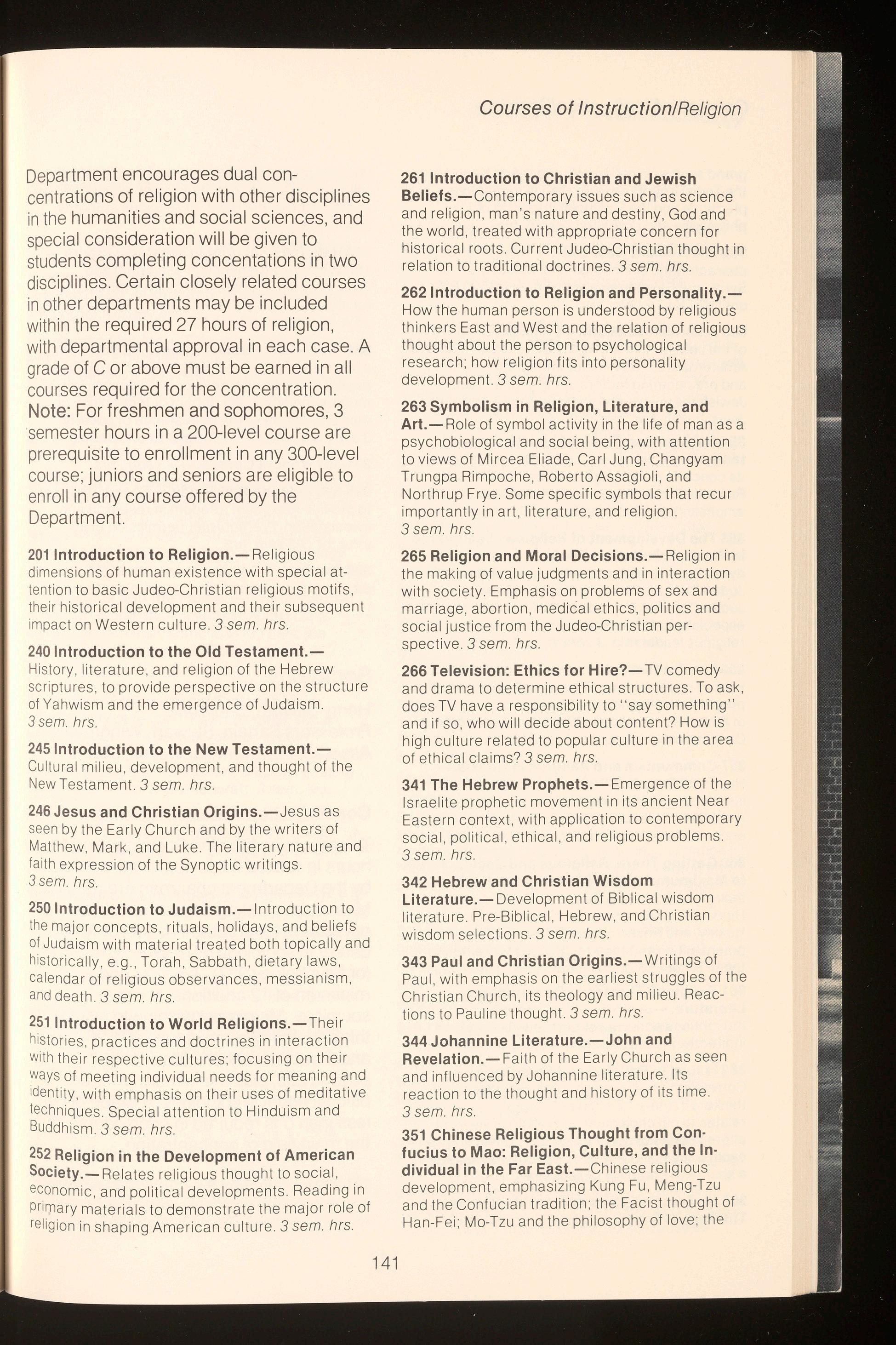
Department encourages dual concentrations of religion with other disciplines in the humanities and social sciences, and special consideration will be given to students completing concentations in two disciplines . Certain closely related courses in other departments may be included within the required 27 hours of religion , with departmental approval in each case. A grade of C or above must be earned in all courses required for the concentration. Note:For freshmen and sophomores, 3 semester hours in a 200-leve l course are prerequisite to enrollment in any 300-level course; juniors and seniors are e ligible to enroll in any course offered by the Department.
201 Introduction to Religion.-Religiou s dimensions of human existence with special attention to basic Judea-Christian religious motifs, their historical development and their subsequent impact on Western culture. 3 sem. hrs.
240 Introduction to the Old Testament.History, literatu re , and religion of the Hebrew scriptures, to provide perspective on the structure of Yahwism and the emergence of Judaism. 3sem. hrs.
245 Introduction to the New Testament.Cultural milieu. development, and thought of the NewTestament. 3 sem. hrs.
246Jesus and Christian Origins.-Je sus as seen by the Early Church and by the writers of Matthew, Mark, and Luke. The literary nature and faith expression of the Synoptic writings. 3 sem. hrs.
250 Introduction to Judaism.- Introduction to the major concepts, rituals , holidays, and beliefs of Judaism with material treated both topically and historical ly , e.g., Torah, Sabbath, dietary laws, calendar of rel igiou s observances, messianism, and death. 3 sem. hrs.
251 Introduction to World Religions.- Their histories, practices and doctrines in interaction with their respective cultures; focusing on their ways of meeting individual needs for meaning and identity, with emphasis on their uses of meditative techniques. Special attention to Hinduism and Buddhism 3 sem. hrs.
252Religion in the Development of American Society.-Relates religious thought to social, economic, and political developments. Reading in Primary materials to demonstrate the major role of religion in shaping American culture 3 sem. hrs.
Courses of Instruction/Religion
261 Introduction to Christian and Jewish Beliefs.-Contemporary issues such as science and religion, man's nature and destiny, God and the world, treated with appropria te concern for historical roots. Current Judea-Christian thought in relation to traditional doctrines. 3 sem. hrs.
262 Introduction to Religion and Personality.How the human person is understood by religious thinkers East and West and the relation of religious thought about the person to psychological research; how religion fits into personality development. 3 sem. hrs.
263 Symbolism in Religion, Literature, and Art.- Role of symbol activity in the life of man as a psychobiological and social being , with attention to views of Mircea Eliade, Carl Jung, Changyam Trungpa Rimpoche, Roberto Assagioli, and Northrup Frye. Some specific symbols that recur importantly in art , literature, and religion. 3 sem. hrs.
265 Religion and Moral Decisions.- Religion in the making of value judgments and in interaction with society Emphasis on problems of sex and marriage, abortion, medical ethics, politics and social justice from the Judea-Christian perspective. 3 sem. hrs.
266 Television: Ethics for Hire?- TV comedy and drama to determine eth ical structures. To ask, does TV have a responsibility to "say something" and if so, who will decide about content? How is high culture related to popular culture in the area of ethical claims? 3 sem. hrs.
341 The Hebrew Prophets.-Emergence of the Israelite prophetic movement in its ancient Near Eastern context, with application to contemporary social, political, ethical, and religious problems. 3 sem. hrs.
342 Hebrew and Christian Wisdom Literature.-Development of Biblical wisdom literature. Pre-Biblical , Hebrew , and Christian wisdom selections. 3 sem. hrs.
343 Paul and Christian Origins.-Writings of Paul, with emphasis on the earliest struggles of the Christian Church, its theology and milieu. Reactions to Pauline thought. 3 sem. hrs.
344 Johannine Literature.-John and Revelation.- Faith of the Early Church as seen and influenced by Johannine literature Its reaction to the thought and history of its time. 3 sem. hrs.
351 Chinese Religious Thought from Confucius to Mao: Religion, Culture, and the In• dividual in the Far East-Chinese religious development, emphasizing Kung Fu , Meng-Tzu and the Confucian tradition; the Faci st thought of Han-Fei; Mo-Tzu and the philosophy of love; the
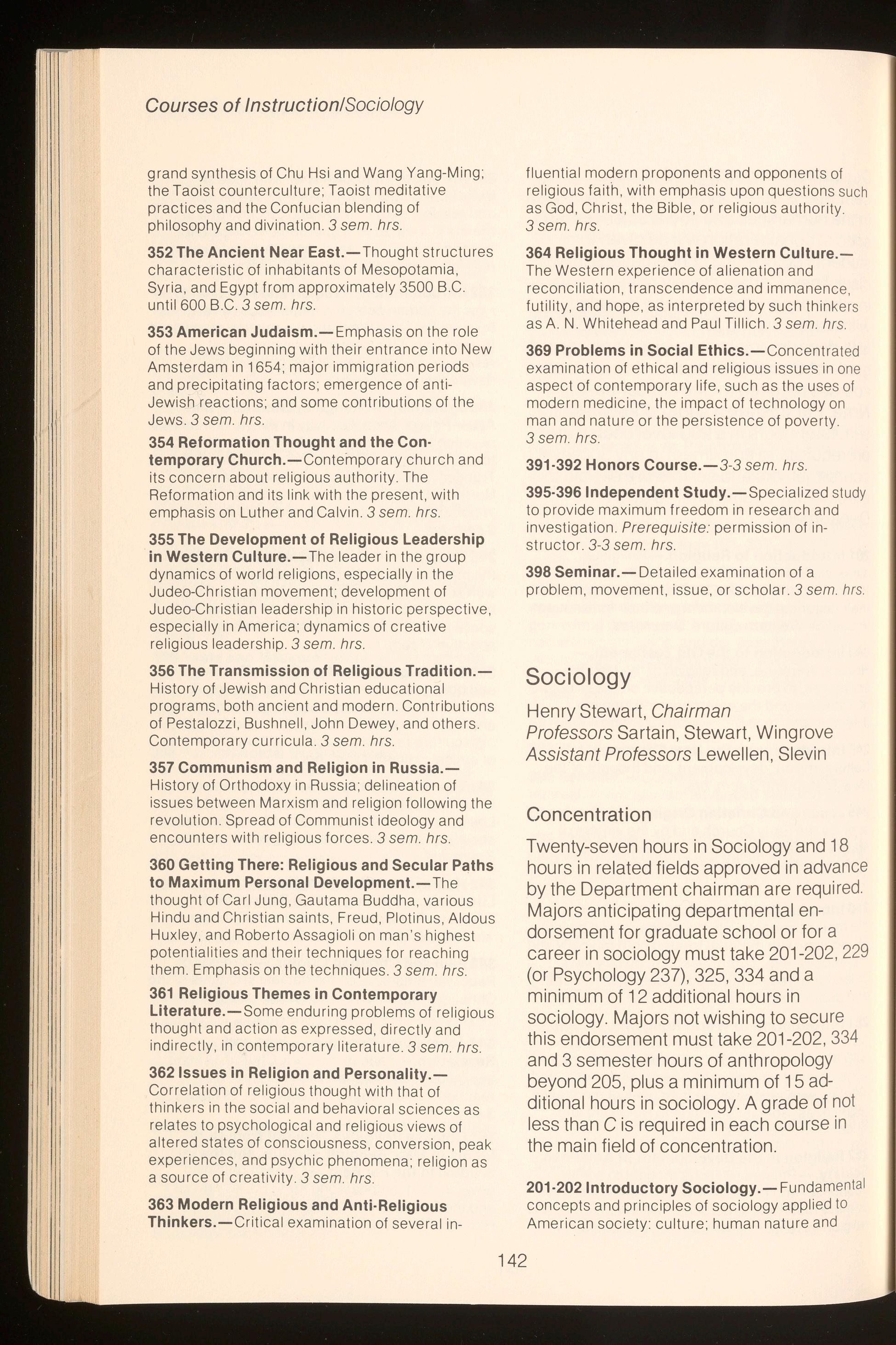
Courses of Instruction/Sociology
grand synthesis of Chu Hs i and Wang Yang-Ming; the Taoist counterculture; Taoi st meditative practices and the Confucian blending of philosophy and divination. 3 sem. hrs.
352 The Ancient Near East.- Thought structures characteristic of inhabitant s of Mesopotamia, Syria, and Egypt from approximately 3500 B.C. until 600 B.C. 3 sem. hrs.
353 American Judaism_-Empha sis on the role of the Jews beginning with their entrance into New Amsterdam in 1654 ; major immigration periods and precipitating factors; emergence of antiJewi sh reactions; and some contributions of the Jews. 3 sem. hrs.
354 Reformation Thought and the Contemporary Church.-Contemporary church and its concern about religious authority. The Reformation and its link with the present, with emphasis on Luther and Calvin. 3 sem. hrs.
355 The Development of Religious Leadership in Western Culture - The leader in the group dynamics of world religions , especially in the Judea-Christian movement; development of Judea-Christian leader ship in historic perspective , especially in America ; dynamics of creative religious leadership. 3 sem. hrs.
356 The Transmission of Religious Tradition.History of Jewish and Christian educational programs, both ancient and modern. Contributions of Pesta Iozzi, Bushn e ll , John Dewey, and others. Contemporary curricula. 3 sem. hrs.
357 Communism and Religion in Russia.History of Orthodoxy in Russ ia ; delineation of issues between Marxism and religion following the revolution. Spread of Communist ideology and encounters with religious forces. 3 sem. hrs.
360 Getting There: Religious and Secular Paths to Maximum Personal Development.- The thought of Carl Jung , Gautama Buddha, various Hindu and Christian saints, Freud , Plotinus, Aldous Huxley, and Roberto Assagioli on man 's highest potentialities and their technique s for reaching them. Emphasis on the techniques. 3 sem. hrs.
361 Religious Themes in Contemporary Literature.-Some enduring problems of religious thought and action as expressed, directly and indirectly, in contemporary literature. 3 sem. hrs.
362 Issues in Religion and Personality.-
Correlation of religious thought with that of thinkers in the social and behavioral sc iences as relates to psychological and religiou s views of altered states of consciousness, conversion, peak experiences, and psychic phenomena; religion as a source of creativity. 3 sem. hrs.
363 Modern Religious and Anti-Religious Thinkers.-Critical examination of several in-
fluential modern proponents and opponents of religious faith, with emphasis upon questions such as God, Christ, the Bible, or religiou s authority 3 sem. hrs.
364 Religious Thought in Western Culture.The Western experience of alienation and reconciliation, transcendence and imman ence, futility, and hope , as interpreted by such thinker s as A. N. Whitehead and Paul Tillich 3 sem. hr s.
369 Problems in Social Ethics.-Concentr ated examination of ethical and religious issues in one aspect of contemporary life , such as the uses of modern medicine, the impact of technology on man and nature or the persistence of poverty 3 sem. hrs.
391-392 Honors Course.-3-3 sem. hrs.
395-396 Independent Study.-Specializ ed study to provide maximum freedom in re search and investigation. Prerequisite. permission of instructor. 3-3 sem. hrs.
398 Seminar.-Detailed examination of a problem, movement , issue, or scholar. 3 sem. hrs.
Sociology
Henry Stewart, Chairman Professors Sartain, Stewart , Wingrove Assistant Professors Lewellen, Slevin
Concentration
Twenty-seven hours in Sociology and 18 hours in related fields approved in advance by the Department chairman are required. Majors anticipating departmental endorsement for graduate school or for a career in sociology must take 201-202, 229 (or Psychology 237), 325, 334 and a minimum of 12 additional hours in sociology. Majors not wishing to secure this endorsement must take 201-202 , 334 and 3 semester hours of anthropology beyond 205, plus a minimum of 15 additional hours in sociology. A grade of not less than C is required in each course in the main field of concentration.
201-202 Introductory Sociology.-Fundam ental concepts and principles of sociology applied to American soc iety: culture; human nature and
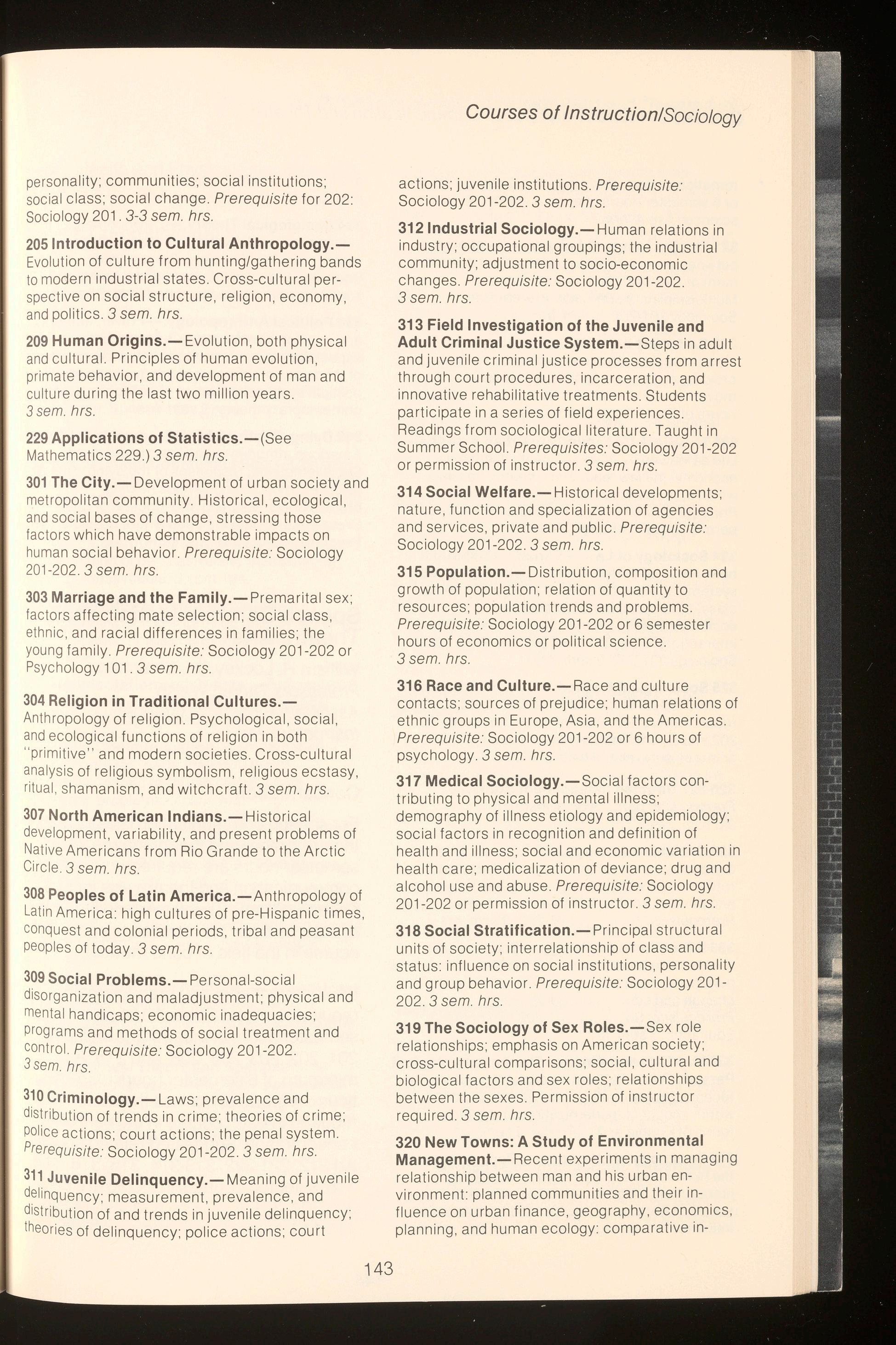
personality; communities; social institutions; social class; social change. Prerequisite tor 202: Sociology 201. 3-3 sem. hrs.
205 Introduction to Cultural Anthropology.Evolution of culture from hunting/gathering bands to modern industrial states. Cross-cultural perspective on social structure, religion, economy, and politics. 3 sem. hrs.
209 Human Origins.-Evolution , both physical and cultural. Principles of human evolution, primate behavior, and development of man and culture during the last two million years. 3sem. hrs.
229 Applications of Statistics.-(S ee Mathematics 229.) 3 sem. hrs.
301The City.-Development of urban socie ty and metropolitan community. Historical , ecological, and social bases of change, stressing those factors which have demonstrable impacts on human socia l behavior. Prerequisite: Sociology 201-202.3 sem. hrs.
303 Marriage and the Family.-Premarital sex; factors affecting mate selection; social class, ethnic, and racial differences in families; the young family. Prerequisite: Sociology 201-202 or Psychology 101. 3 sem. hrs.
304Religion in Traditional Cultures.Anthropology of religion. Psychological, social, andecological functions of religion in both "primitive" and modern societies. Cross-cultural analysis of religious symbolism, religious ecstasy, ritual, shamanism, and witchcraft. 3 sem. hrs.
307North American lndians.-Historic al development, variability, and present problems of NativeAmer ican s from Rio Grande to the Arctic Circle. 3 sem. hrs.
308Peoples of Latin America.-Anthropology of LatinAmerica: high cultures of pre-Hispanic times, conquest and colonial periods, tribal and peasant peoplesof today. 3 sem. hrs.
309Social Problems.-Personal- social disorganization and maladjustment; physical and mentalhandicaps; economic inadequacies; programs and methods of social treatment and control. Prerequisite. Sociology 201-202. 3sem. hrs.
310Criminology.-Laws; prevalence and distribution of trends in crime; theories of crime; Policeactions; court actions; the penal system. Prerequisite. Sociology 201-202. 3 sem. hrs.
311Juvenile Delinquency.-Meaning of juvenile delinquency; measurement, prevalence, and distribution of and trends in juvenile delinquency; theoriesof delinquency; police actions; court
Courses of Instruction/Sociology
actions; juvenile institutions. Prerequisite: Sociology 201-202. 3 sem. hrs.
312 Industrial Sociology.-Human relations in industry ; occupational groupings; the industrial community; adjustment to socio-economic changes. Prerequisite : Sociology 201-202. 3 sem. hrs.
313 Field Investigation of the Juvenile and Adult Criminal Justice System.-Steps in adult and juvenile criminal justice processes from arrest through court procedures, incarceration, and innovative rehabilitative treatments. Students participate in a series of field experiences. Readings from sociologica l literature. Taught in Summer School. Prerequisites: Sociology 201-202 or permission of instructor. 3 sem. hrs.
314 Social Welfare.-Historical developments; nature, function and specialization of agencies and services, private and public. Prerequisite: Sociology 201-202. 3 sem. hrs.
315 Population.-Distribution , composition and growth of population; relation of quantity to resources; population trends and problems. Prerequisite: Sociology 201-202 or 6 semester hours of economics or political science. 3 sem. hrs.
316 Race and Culture.-Race and culture contacts; sources of prejudice; human relations of ethnic groups in Europe , Asia, and the Americas. Prerequisite: Sociology 201-202 or 6 hours of psychology. 3 sem. hrs.
317 Medical Sociology.-Social factors contributing to physical and mental illness; demography of illness etiology and epidemiology; soc ial factors in recognition and definition of health and illness; soc ial and economic variation in health care; medicalization of deviance; drug and alcohol use and abuse. Prerequisite: Sociology 201-202 or permission of instructor. 3 sem. hrs.
318 Social Stratification.-Principal structural units of society; interrelationship of class and status: influence on social institutions, personality and group behavior. Prerequisite: Sociology 201202. 3 sem. hrs.
319 The Sociology of Sex Roles.-S ex role relationships; emphasis on American soc iety ; cross-cultural comparisons; social, cultural and biological factor s and sex roles; relationships between the sexes. Permission of instructor required. 3 sem. hrs.
320 New Towns: A Study of Environmental Management-Recent experiments in managing relationship between man and his urban environment: planned communities and their influence on urban finance, geography, economics, planning, and human ecology: comparative in-
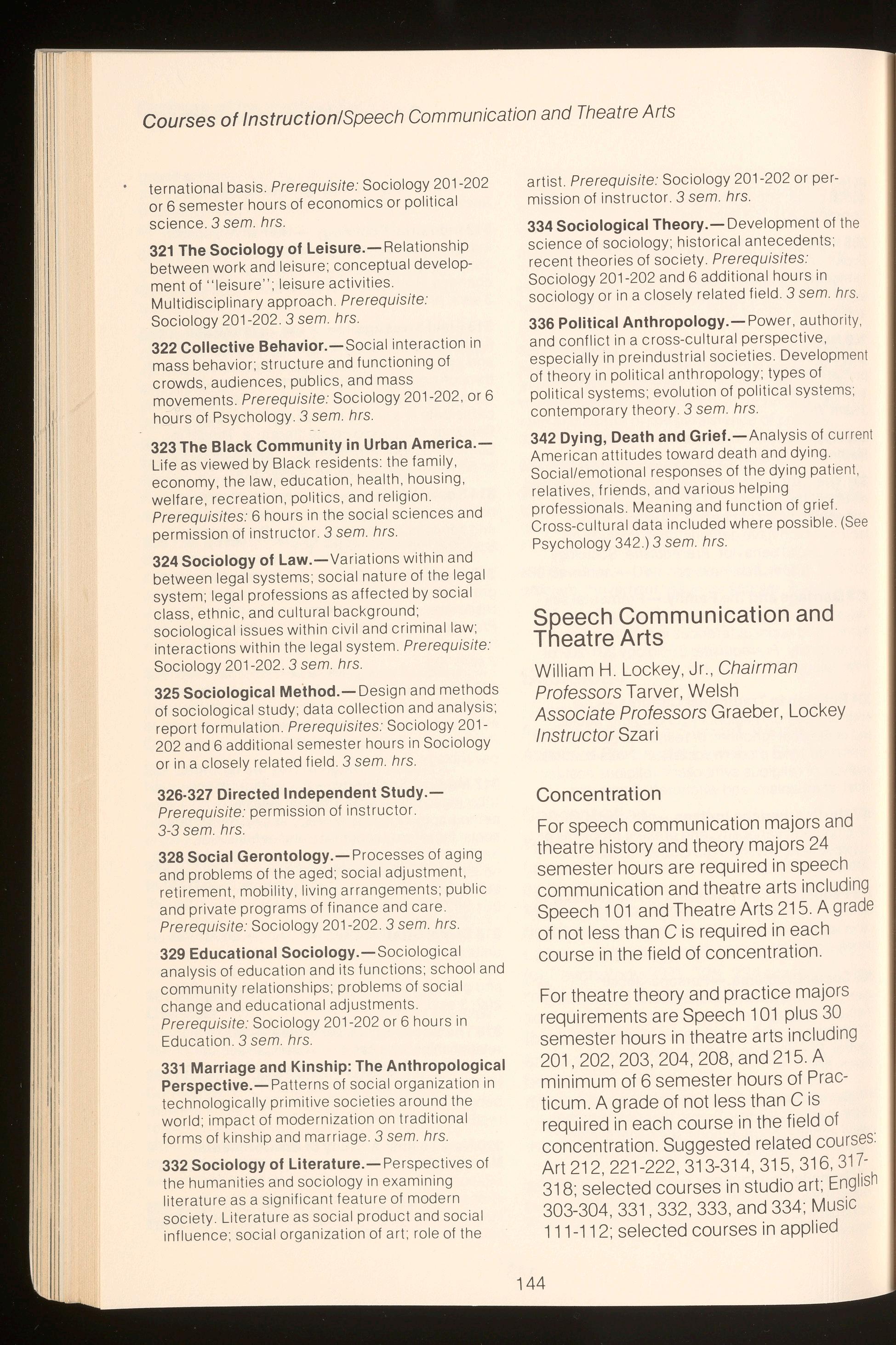
Courses of Instruction/ Speech Communication and Theatre Art s
ternational basis Prerequisite: Sociology 201-202 or 6 semester hour s of economics or political science. 3 sem. hrs.
321 The Sociology of Leisure.-R elationship between work and leisure; conceptual development of "leisure" ; leisure activities. Multidisciplinary approach Prerequisite: Sociology 201-202. 3 sem hrs
322 Collective Behavior - Social interaction in mass behavior; structure and functioning of crowds , audiences , publics , and mass movements. Prerequisite: Sociology 201 -202, or 6 hours of Psychology. 3 sem hrs
323 The Black Community in Urban America.Life as viewed by Black residents: the family, economy, the law , educat ion , health , housing, welfare, recreation, politics, and religion. Prerequisites: 6 hours in the social sciences and permission of instructor. 3 sem. hrs.
324 Sociology of Law.-Variations within and between legal systems ; social nature of the legal system ; legal professions as affected by social class, ethnic , and cultural background ; sociological issues within civil and criminal law ; interactions within the legal system Prerequisite: Sociology 201-202. 3 sem. hrs.
325 Sociological Method.-D esignand methods of socio logi cal s tu dy; data collection and analys is; report formu lation. Prerequisites : Sociology 201202 and 6 add itional semester hours in Socio logy or in a closely related field 3 sem hrs
326-327 Directed Independent Study .Prerequisite· permission of instructor 3-3 sem. hrs.
328 Social Gerontology - Processesof aging and problems of the aged ; social adjustment, retirement, mobility, living arrangements ; public and private programs o f finance and care. Prerequisite: Sociology 201-202 3 sem. hrs.
329 Educational Sociology - Sociological analysis of education and its functions; school and community relationships ; problems of social change and educational adjustments. Prerequisite : Sociology 201-202 or 6 hours in Education. 3 sem hrs
331 Marriage and Kinship: The Anthropological Perspective.- Patternsof social organization in technologically primitive societies around the world ; impact of modernization on traditional f orms of kinship and marriage. 3 sem. hrs.
332 Sociology of Literature.-P erspectivesof the human ities and sociology in examin ing literature as a significant feature of modern society Literature as social product and social influence; social organization of art: role of the
artist. Prerequisite: Socio logy 20 1-202 or permission of ins tru ctor. 3 sem. hrs.
334 Sociological Theory.-D evelopment of the science of socio logy; historical antece d en t s ; recent theories of socie ty Prerequisites: Sociology 201-202 and 6 additional hours in sociology or in a closely related field 3 sem. hr s.
336 Political Anthropology.-P ower, authori ty, and conflict in a cross-cu ltur al perspective, especially in preindustrial societies Developm ent of theory in political anthropo logy; types of political systems ; evolution of political system s; contemporary theory 3 sem. hrs.
342 Dying, Death and Grief.-An a lysis of current American attitudes toward death and dying. Socia l/emotional responses of th e dying patient , relatives, friends , and various helping professionals. Meaning and function of grief. Cross-cultural data included where possible (See Psychology 342 ) 3 sem. hrs.
Speech Communication and Theatre Arts
William H Lockey , Jr, Chairman Professors Tarver , Welsh Associate Professors Graeber, Lock ey Instructor Szari
Concentration
For speech communication majors and theatre history and theory major s 24 semeste r hours are requir ed in speech communication and theatre arts including Speech 101 and Theatre Arts 2 15 . A grade of not less than C is required in each course in the field of concentration.
For theatre theory and practice majors requirements are Speech 101 plus 30 semester hour s in theatre arts including 201, 202, 203, 204, 208, and 215. A minimum of 6 semes ter hour s of Practicum. A grade of not less than C is required in each course in the field of concentration. Suggested relat ed courses Art 212, 22 1-222 , 3 13-314 , 315, 316, 3173 18; se lected courses in studio art; English 303 -304, 33 1 , 332, 333, and 334; Mu sic 111-112; se lected courses in applied
music; H ea lth and Phys ica l Educa ti o n 3 13, 314, an d 302.
i Speec h Communication
101 Principles of Speech Communication.Theory and practice in organization , compos ition and delivery. 3 sem. hrs.
102 General Speech Communication .Semantics , freedom of speech , ethics in communic ation , parliamentary procedu re, group method , and speeches for special occasions. Prerequisite. Speech 101. 3 sem. hrs.
202t Oral lnterpretation - 3 sem. hrs.
205 Interpe rsonal Commun ication . - Complex and interacting factors that contribute to effective transmission of ideas ; emphasis on understanding unde rlying principles 3 sem. hrs.
221 Mass Communication.- Awareness and unde rs tand ing o f persuasive and man ipulating nature of mass media 3 sem hrs
225 Cross-Cultural Communi c at ionUnde rs t anding of and improving proficiency i n commun ication ac ross cultu ral barriers. 3 sem. hrs.
301 Argumentation and Debate - Principlesof argumentatio n and formal deba t ing. Practical application through student pro j ects. 3 sem. hrs.
305 Group Communication - Modern theory and methodology ; participation in group discuss ion re lating t heo ry to specif ic communication problems. 3 sem. hrs.
306 Persuasion.- Applicationto specific speech situations. Especially recomme nded for debaters, prelega l and mi n is t e r ial stude n ts. Prerequisite · Speech 101-102 3 sem. hrs.
321* Development of Speech Communication Theory.-Princip les of communication developed f rom the precep t s of major classical rhetoricians. 3sem hrs.
325* American Public Address.- Colonialtimes to the present Critica l study of resources of selected speakers, content of s p eeches a nd effect onsig nificant issues. 3 sem. hrs.
331t Phonetics: Theory and Application to Speechl mprovement.- Phonemesof American Englis h Standard pron un ciation Fo rmation of sounds, acquisition of speech, problems of diction , andac oustic variables. 3 sem. hrs.
Theatre Arts
201t Production I: Stagecraft.- Technical
aspec t s of scenery; theory and practical app l ications. Laboratory hours required 3 sem hrs.
202* Production II: Stage Lighting.- The mechanics and artis t ic aspects of s t age l igh t ing in theory and in practice; designing and executing light plots. Laboratory hours required. 3 sem. hrs.
203 * Production Ill : Stage Design.- Artistic as p ects of stage setting bo t h in theory and in practice ; cons ideration of mechan ical perspective, watercolor sketching , color schemes , and h istory of period design. Prerequisites.· Theatre Arts 201 or permissio n of instructo r 3 sem. hrs.
204t Production IV: Stage Sound and Special Effects - Tech n ical and artistic consideration of mechanical and electronic so u nd for the t hea t re; new develop ments in the thea t re. 3 sem. hrs.
205 * Histo ry of Costume.- Developmentof clothing sty les from the Egyptians to the present day with emphasis on t he civ i l dress of ma j or historic periods 3 sem. hrs.
208 Production and Direction.-P roblems of play selection , casting, backstage organization ; study of style in d irec t ion and p roduction; scene work. Laboratory assignments with major productions Prerequisite: Permiss ion of inst ructor. 3 sem. hrs.
209-210 Televis ion and Radio News - (See J o u rnalism 209-210.) 3-3 sem. hrs.
212t Theories and Styles of Acting - From Ar istotle to G rotowski , emphasizing basic acting tech n iques and the role of characterization in the play 3 sem. hrs.
213 Fundamentals of Stage Makeup .-History and aesthetics ; emphas is on techniques in creating and unde rstanding characterizatio n ; laboratory assignments in con jun ct ion w ith all major produc t ions. Makeup kit required 2 sem. hrs.
215 Introduction to the TheatreContempo rary theatre in relation to i ts historical development , dramatic literature and aesthetics. 3 sem. hrs.
303t Advanced Directing.- Periodsand styles in direction, with scene work and one-act plays prepared for product ion by each student. Prerequisite: Permission of instructor. 3 sem. hrs.
307 -30Bt History of the Theatre . - Major forms and per iods in the theatre. Se lected playwrights, theatre companies and theatre movements. 3-3sem. hrs.
310* Costume Construction and Patterning.Tec h nical aspects o f costume; includes techniques of construction , tailoring , f lat patterning , draping, and the basic elements of tex-
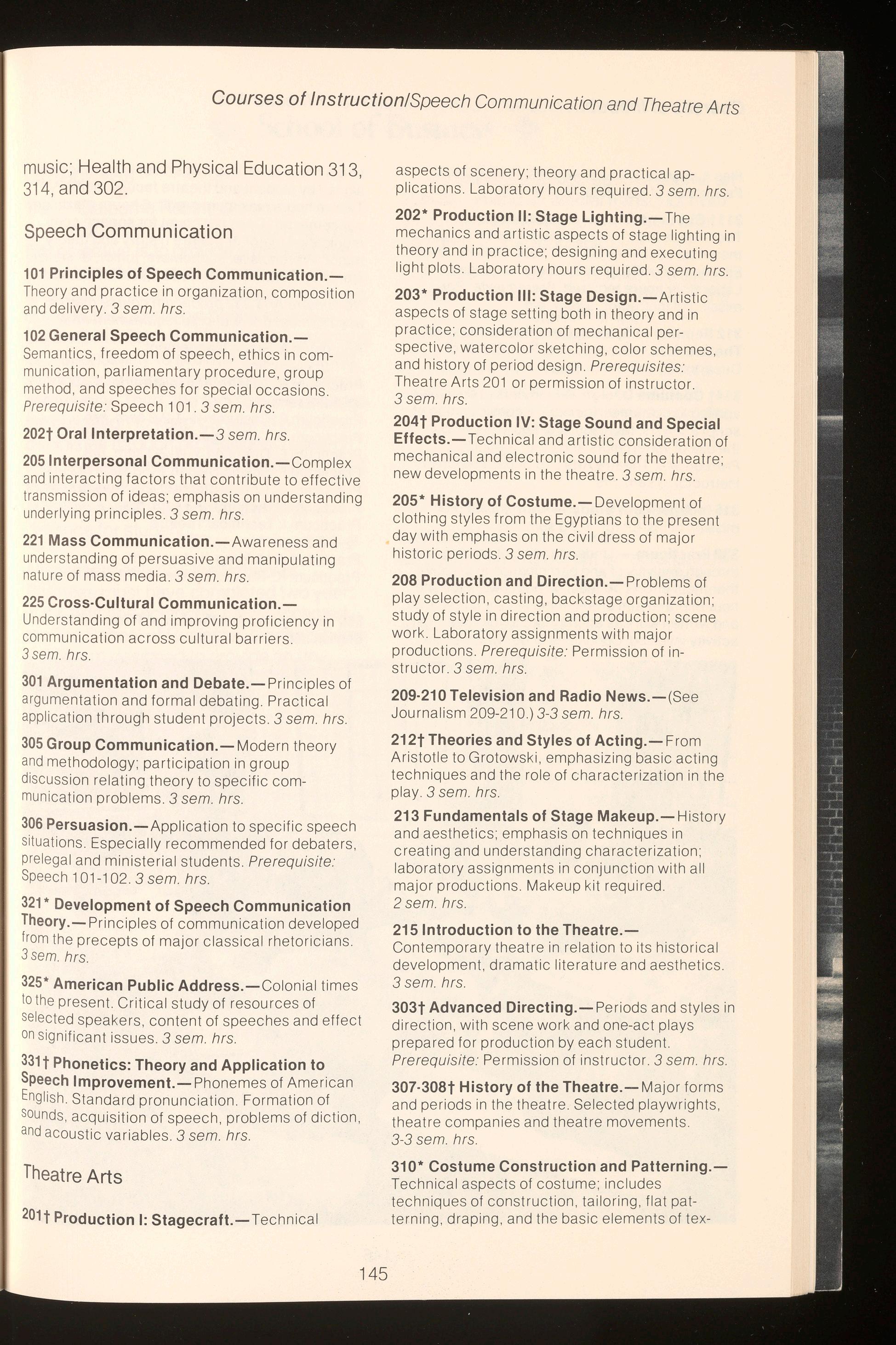
Courses of Instruction/SpeechCommunication and Theatre Arts
tiles. Laboratory hours required. Prerequisite. Permission of instructor. 3 sem. hrs.
311 t Costume Crafts-AccessoriesTech n iqu es in the construc ti on of accessor ies to theatrica l costumes such as hats, corsets, armor , Elizabethian ruffs , jewelry, footwear, crowns. Laboratory hours required. Prerequisite: Permission of instructor. 3 sem. hrs.
312 Sem i nar in Speech Communication and Theatre Arts.- Prerequisite: Permission of Department chairman. 3 sem. hrs.
314t Costume Design - Elements of design as applied to costumes; includes a consideration of script analysis , techniques of figure drawing, and the use of waterco lors and other medium. Prerequisite. Theat re Arts 205 o r permission of instructor. 3 sem. hrs.
315 Independent Study.- Prerequisite: Permission o f instructor. 1-2-3 sem. hrs.
332 Practicum.- Understandingof theatre arts through analysis of and participation in creative theatrical efforts. At least 50 hours work for one hour of practicum credit. Includes such research a nd w r itten work as appropriate to the theatrical activity involved. Conditions under which prac -
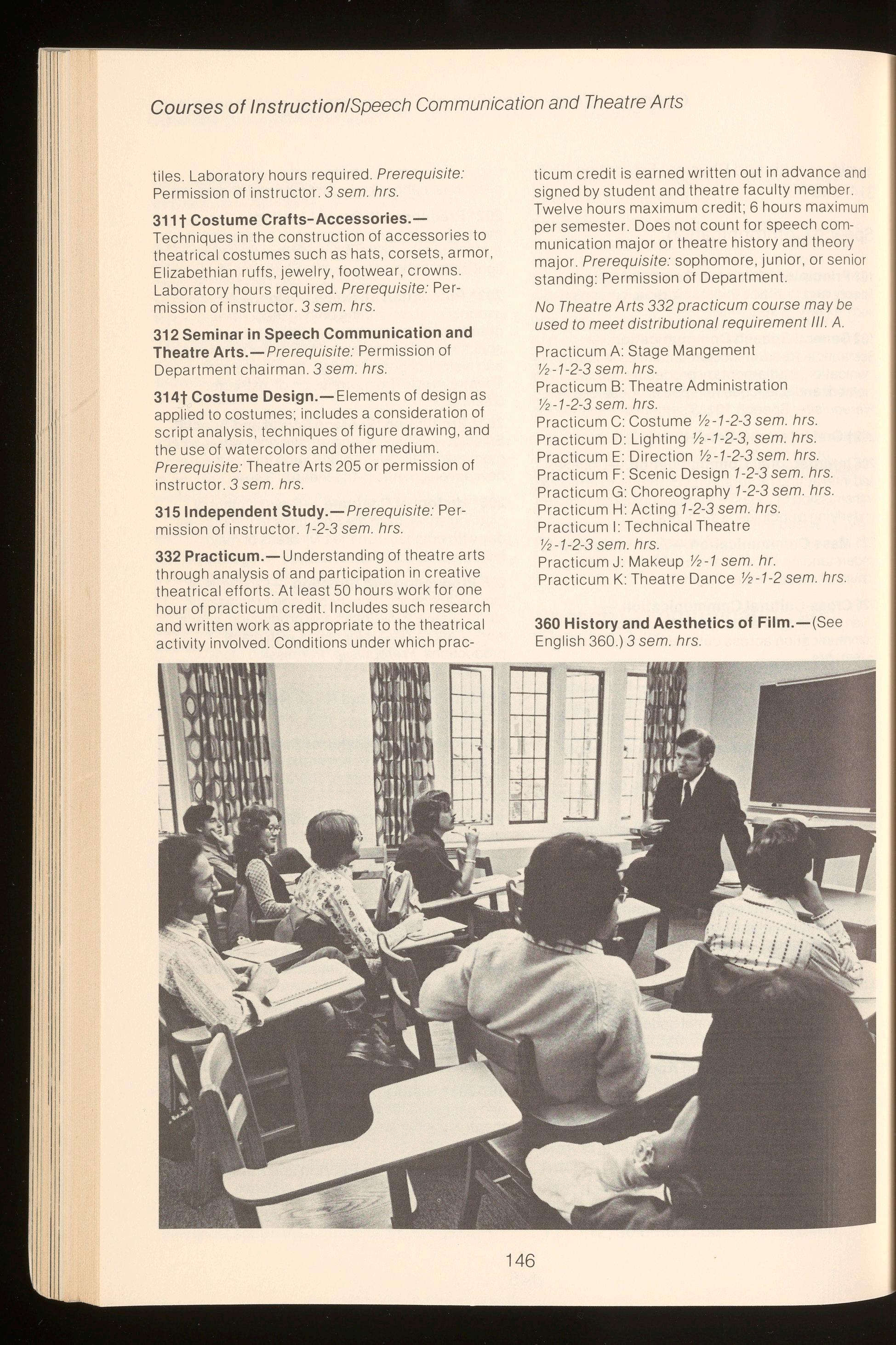
ticum credit is earned written out in advance and signed by student and theatre faculty member. Twelve hours maximum c red it; 6 hours maximum per semester. Does no t coun t f or speech comm unication maj or or t heat re histo ry and theory major. Prerequisite: sophomore, junior, or senior standing: Permission o f Depa rtment.
No Theatre Arts 332 practicum course may be used to meet distributional requirement Ill. A.
Practicum A: Stage Mangement
½-1-2-3 sem. hrs.
Practicum B: Theatre Administration
½-1-2-3 sem. hrs.
Practicum C: Costume ½-1-2-3 sem. hrs.
Practicum D: Lighting ½-1-2-3, sem. hrs.
Pract icum E: Direc ti o n ½-1-2-3 sem. hrs.
Practicum F: Sce nic Design 1-2-3 sem. hrs.
Practicum G: Choreog raphy 1-2-3 sem. hrs.
Practicum H: Acting 1-2-3 sem. hrs.
Practicum I: Technical T heatre
½-1-2-3 sem. hrs.
Practicum J: Makeup ½-1 sem. hr.
Practicum K: Theatre Dance ½-1-2 sem. hrs
360 History and Aesthet ics of Film - (See English 360 ) 3 sem. hrs.
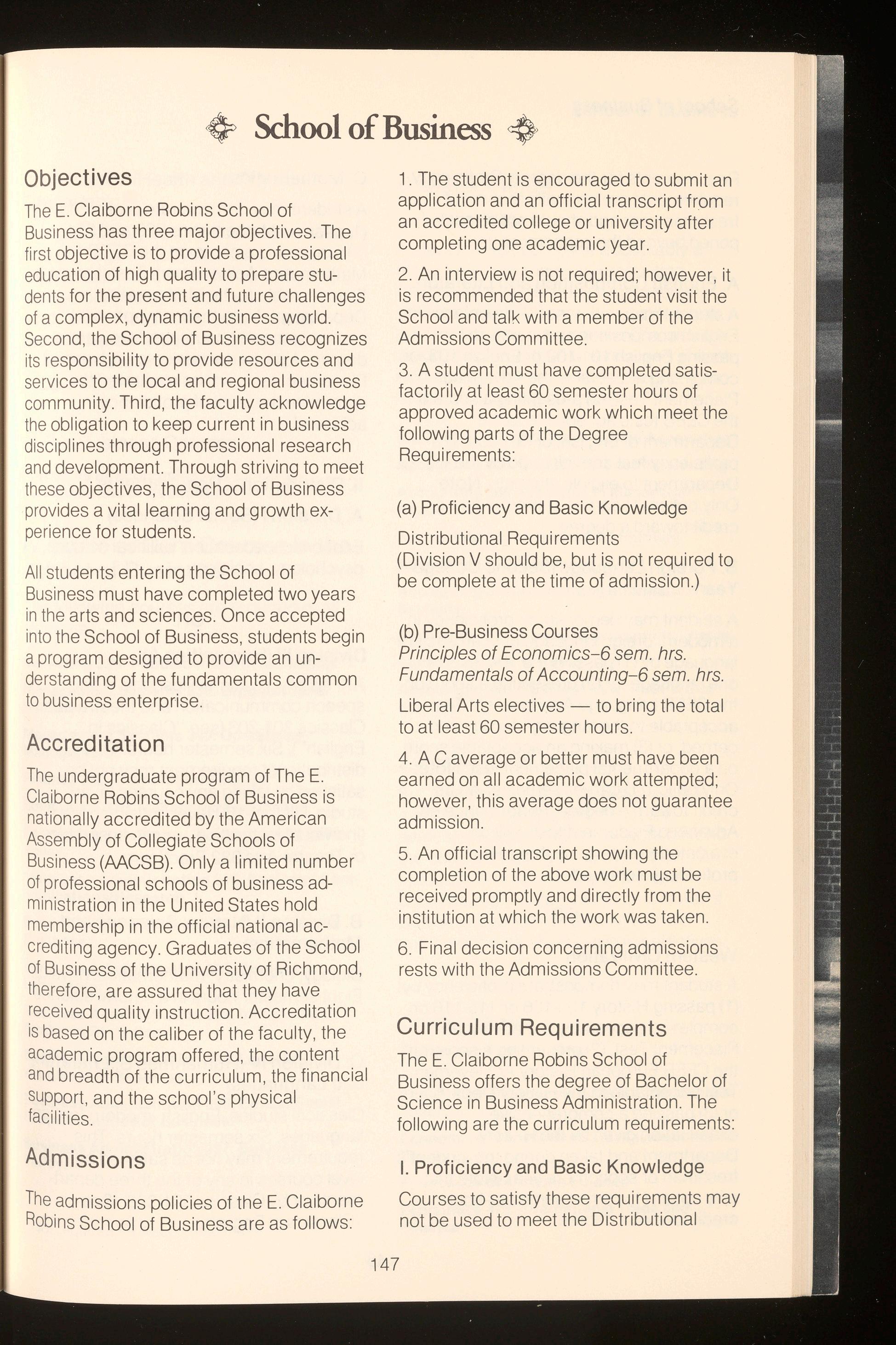
SchoolofBusiness~ ,
Objectives
The E. Claiborne Robins School of Business has three major objectives. The first o bjective is to provide a professional education of high quality to prepare students for the present and future challenges of a c omplex, dynamic business world Second , the School of Business recognizes its responsibility to provide resources and servic es to the local and regional business community. Third, the faculty acknowledge the o bligation to keep current in business disc ip lines through professional research and development. Through striving to meet these objectives , the School of Business provides a vital learning and growth experience for students.
All students entering the School of Business must have completed two years in the a rts and sciences. Once accepted into t he School of Business , students begin a prog ram designed to provide an understa nding of the fundamentals common to bus iness enterprise.
Accreditation
The undergraduate program of The E. Claiborne Robins School of Business is nationally accredited by the American Assembly of Collegiate Schools of Busine ss (AACSB). Only a limited number of profes sional schools of business administration in the United States hold memb e rship in the official national accrediting agency. Graduates of the School of Bus iness of the University of Richmond , therefore, are assured that they have receive d quality instruction. Accreditation is based on the caliber of the faculty , the acade mic program offered , the content and b readth of the curriculum , the financial support , and the school 's physical facilities
Admissions
The admissions policies of the E. Claiborne Robins School of Business are as follows :
1. The student is encouraged to submit an application and an official transcript from an accredited college or university after completing one academic year.
2 An interview is not required ; however , it is recommended that the student visit the School and talk with a member of the Admissions Committee.
3. A student must have completed satisfactorily at least 60 semester hours of approved academic work which meet the following parts of the Degree Requirements:
(a) Proficiency and Basic Knowledge
Distributional Requirements
(Division V should be , but is not required to be complete at the time of admission.)
(b) Pre-Business Courses
Principles of Economics-6 sem. hrs. Fundamentals of Accounting-6 sem. hrs.
Liberal Arts electives -to bring the total to at least 60 semester hours.
4. AC average or better must have been earned on all academic work attempted ; however , this average does not guarantee admission.
5. An official transcript showing the completion of the above work must be received promptly and directly from the institution at which the work was taken.
6. Final decision concerning admissions rests with the Admission s Committee.
Curriculum Requirements
The E. Claiborne Robins School of Business offers the degree of Bachelor of Science in Business Administration. The following are the curriculum requirements:
I. Proficiencyand Basic Knowledge
Courses to satisfy these requirements may not be used to meet the Distributional
147
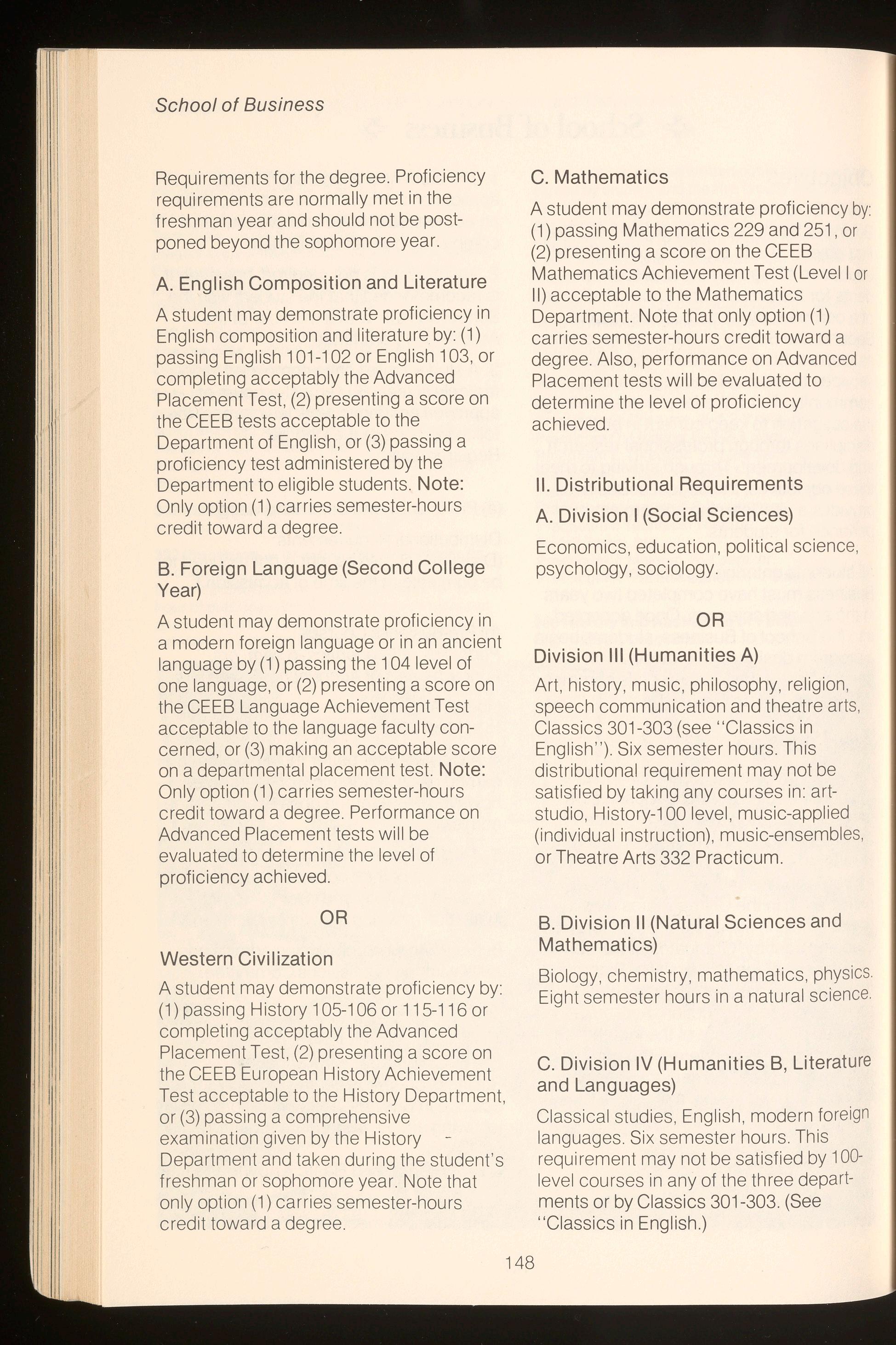
Requirements for the degree. Proficiency requirements are normally met in the freshman year and should not be postponed beyond the sophomore year.
A. English Composition and Literature
A student may demonstrate proficiency in English composition and literature by : (1) passing English 101-102 or English 103, or completing acceptably the Advanced Placement Test, (2) presenting a score on the CEEB tests acceptable to the Department of English, or (3) passing a proficiency test administered by the Department to eligible students. Note: Only option (1) carries semester-hours credit toward a degree.
B. Foreign Language (Second College Year)
A student may demonstrate proficiency in a modern foreign language or in an ancient language by (1) passing the 104 level of one language , or (2) presenting a score on the CEEB Language Achievement Test acceptable to the language faculty concerned, or (3) making an acceptable score on a departmental placement test Note: Only option (1) carries semester-hours credit toward a degree. Performance on Advanced Placement tests will be evaluated to determine the level of proficiency achieved.
OR
Western Civilization
A student may demonstrate proficiency by (1) passing History 105-106 or 115-116 or completing acceptably the Advanced Placement Test , (2) presenting a score on the CEEB European History Achievement Test acceptable to the History Department, or (3) passing a comprehensive examination given by the HistoryDepartment and taken during the student's freshman or sophomore year Note that only option (1) carries semester-hours credit toward a degree.
C. Mathematics
A student may demonstrate proficiency by (1) passing Mathematics 229 and 251 , or (2) presenting a score on the CEEB Mathematics Achievement Test (Level I or II) acceptable to the Mathematics Department. Note that only option (1) carries semester-hours credit toward a degree. Also, performance on Advanced Placement tests will be evaluated to determine the level of proficiency achieved.
II. Distributional Requirements
A. Division I (Social Sciences)
Economics, education , political scienc e, psychology, sociology.
OR Division Ill (Humanities A)
Art , history, music, philosophy , religion , speech communication and theatre arts, Classics 301-303 (see "Classics in English " ). Six semester hours. This distributional requirement may not be satisfied by taking any courses in: artstudio , History-100 level , music-applied (individual instruction) , music-ensembl es, or Theatre Arts 332 Practicum.
B. Division II (Natural Sciences and Mathematics)
Biology, chemistry, mathematics , phy sics Eight semester hours in a natural scien ce
C . Division IV (Humanities B, Literature and Languages)
Classical studies , English, modern for e ign languages. Six semester hours. This requirement may not be satisfied by 100level courses in any of the three departments or by Classics 301-303. (See "Classics in English.)
School of Business
D Division V (Health and Physical Education)
Thesatisfactory completion of 4 semester hoursof required physical education (usuallytaken in the freshman and sophomoreyears) is required for graduation.Please see requirements specified under Health and Physical EducationDepartment listing. (Nonacademic credit).
Ill Pre-Business Courses
Principles of Economics.-6 sem. hrs.
Fundamentals of Accounting.-6 sem. hrs.
IV.Basic or Core Courses in the School of Business
Thefollowing courses are required of all students.
Marketing 320. Fundamentals of Marketing.
Management Systems 330. Organizational Behavior.
Management Systems 340. Operations Management.
Finance 360. Corporation Finance.
Economics 370. Managerial Economics.
Economics 371. Money, Banking, and Public Policy.
*Business Administration 390. Business Communications/Research. ·
BusinessAdministration 391 . Computers in Business.
BusinessAdministration 392. Computer Laboratory.
BusinessAdministration 393. Intermediate BusinessStatistics.
B_usinessAdministration 394. Legal Environment of Business.
BusinessAdministration 395. Ethical/Social Responsibilities of Business.•
BusinessAdministration 397. Business Policy.
'Not required for Accounting major.
V. Major Fields
1. Accounting
A student must complete acceptably a major field. The major in Accounting requires at least 30 hours in accounting courses at the 300 level or substitutes as approved by the Department chairman. A grade of not less than C is required in each Accounting course in order to register for further accounting courses.
Accounting 301-302. Intermediate Accounting
Accounting 305 Managerial Cost Accounting
Accounting 306. Problems in Managerial Accounting
Accounting 311 Advanced Accounting
Accounting 312. Tax Accounting
Accounting 313 Accounting Information Systems
Accounting 314. Financial Accounting Theory
Accounting 315 . Auditing
Accounting 316. Business Law for CPA Candidates
2 Business Administration
For a student majoring in Business Administration, the requirement is 24 semester-hours of 300-level work beyond the core, consisting of no more than 12 required semester-hours in any one concentration area, 6 semester-hours of Business/Economics electives and 6 semester-hours of junior/senior electives.
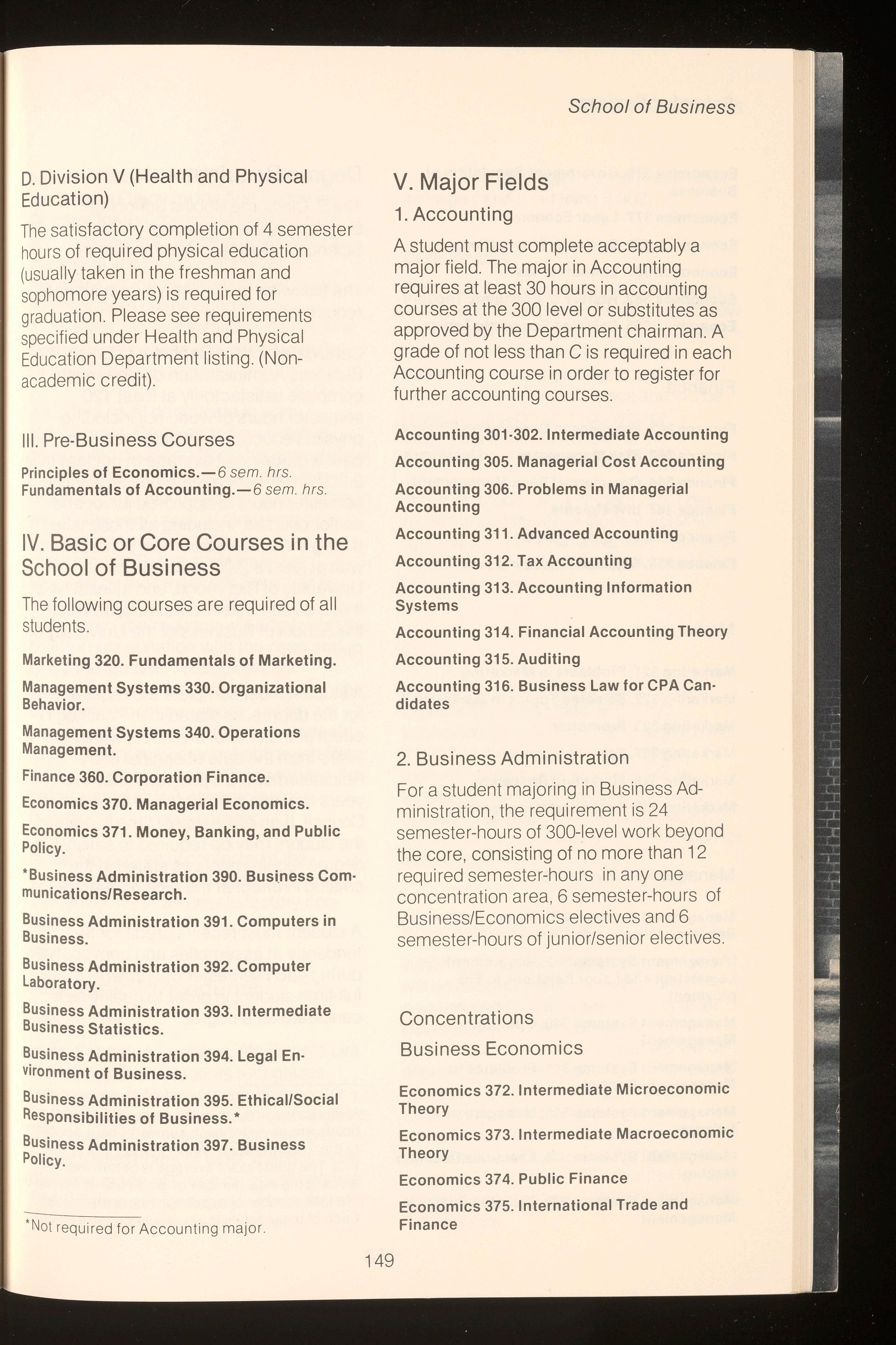
Concentrations
Business Economics
Economics 372. Intermediate Microeconomic Theory
Economics 373. Intermediate Macroeconomic Theory
Economics 374. Public Finance
Economics 375. International Trade and Finance
School of Business
Economics 376. Government Regulation of
Business
Economics 377. Labor Economics
Economics 378. Business Fluctuations
Economics 381. Econometrics
Economics 382. History of Economic Thought
Economics 385. Selected Economic Topics
Finance
Finance 361. Problems in Corporation Finance
Finance 363. Risk Management and Insurance
Finance 364. Commercial Bank Management
Finance 367. Investments
Finance 368. Security Analysis
Finance 369 Selected Topics in Finance
Marketing
Marketing 321. Problems in Marketing
Marketing 322. Selected Topics in Marketing
Marketing 323. Promotion
Marketing 327. Sales Management
Marketing 328. Marketing Research
Marketing 329. Marketing Management
Management Systems
Management Systems 331. Personnel/Human Resource Management
Management Systems 332. Government
Legislation and Labor Relations in Employment
Management Systems 340 . Operations
Management
Management Systems 341. Problems in Management Control
Management Systems 345. Management
Science
Management Systems 346. Executive Decision
Making
Management Systems 349 Selected Topics in Management
Degree Requirements
The E Claiborne Robins School of Business offers the degree of Bachelor of Science in Business Administration.
The following are the non-curricular d egree requirements:
Candidates for the Bachelor of Scien ce in Business Administration degree mu s t complete satisfactorily at least 120 semester hours of work, not including physical education activities courses , a nd earn a grade-point average of not less than 2.000 on all work attempted. 1 At least 60 semester hours of approved junior and senior courses , including all those tak en during the senior year , must be passed with at least a 2.000 average at the Univer s ity of Richmond ; and at lea st 54 of these 60 semester hours must be taken in the School of Business of the Univer s ity of Richmond.
A student must complete the requirem ents for the degree, as stated in the catalog in effect at the time of entrance , within fiv e years from the date of original entry. Reinstatement to a program after five years requires permission of the Acad emic Council. If an extension of time is gr a nted, the student may be required to satisfy the degree requirements as stated in th e catalog in effect at the time of re-entr a nce
A student must receive credit for attendance at assemblies and convocati ons during each semester of enrollment as a full-time student in order to qualify as a candidate for a degree.

1 A se m ester hour is the v alu e of on e class hour o f w ork a wee k thr o ugh the se m es t e r. G rade point s a re gi ve n for each s eme s t e r hou r according to th e foll owing s c a le A(4) , 8(3) , C(2) , D(1), and F(O) Th e gr ad e-point average is d e t e rmin ed by dividin g th e total number of grad e point s earned by th e t ota l numb e r of academic hour s a tt e mpted Eac h of th es e tot a ls is accumulat ed t e rm by term
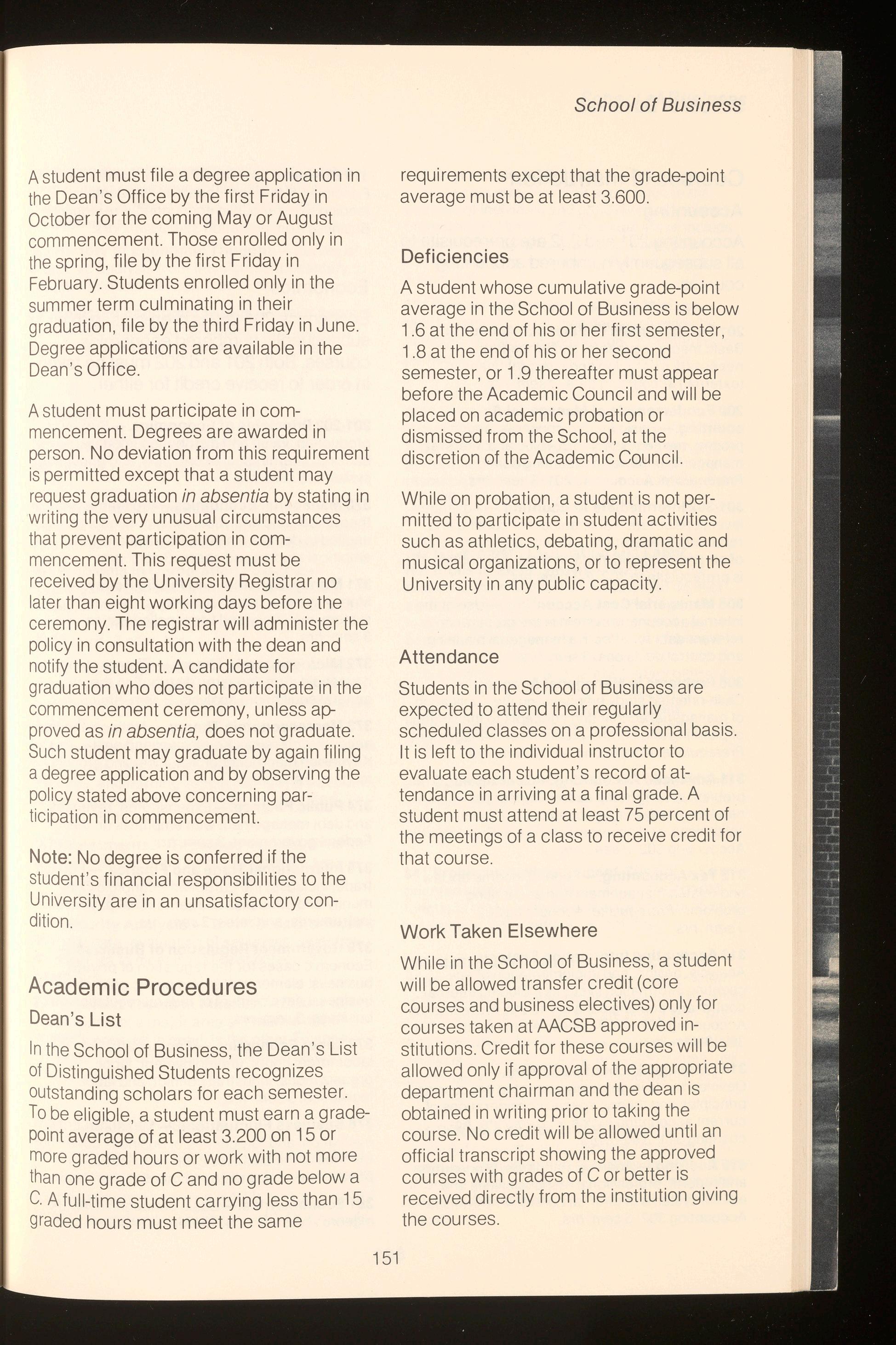
A student must file a degree application in the Dean ' s Office by the first Friday in October for the coming May or August com mencement. Those enrolled only in the spring , file by the first Friday in February. Students enrolled only in the summer term culminating in their graduation , file by the third Friday in June. Degre e applications are available in the Dean ' s Office.
A st udent must participate in commencement. Degrees are awarded in person. No deviation from this requirement is pe rmitted except that a student may request graduation in absentia by stating in writ ing the very unusual circumstances that prevent participation in commenc ement. This request must be rece iv ed by the University Registrar no later than eight working days before the ceremony. The registrar will administer the polic y in consultation with the dean and notify the student. A candidate for graduation who does not participate in the com mencement ceremony , unless approved as in absentia , does not graduate . Such student may graduate by again filing a deg ree application and by observing the policy stated above concerning participation in commencement
Note: No degree is conferred if the student's financial responsibilities to the Unive rs ity are in an unsatisfactory condition.
Academic Procedures
Dean's List
In the Sc hool of Business , the Dean ' s List of D ist inguished Student s recognizes outstanding scholars for each semester. To be e ligible , a student must earn a grad epoint average of at least 3.200 on 15 or more g raded hours or work with not more than o ne grade of C and no grade below a C.A full-time student carrying less than 15 graded hours must meet the same
School of Business
requirements except that the grade-point average must be at least 3.600.
Deficiencies
A student whose cumulative grade-point average in the School of Business is below 1.6 at the end of his or her first semester , 1 .8 at the end of his or her second semester , or 1 .9 thereafter must appear before the Academic Council and will be placed on academic probation or dismissed from the School, at the discretion of the Academic Council.
While on probation , a student is not permitted to participate in student activities such as athletics , debating , dramatic and musical organizations , or to represent the University in any public capacity.
Attendance
Students in the School of Business are expected to attend their regularly scheduled classes on a professional basis. It is left to the individual instructor to evaluate each student ' s record of attendance in arriving at a final grade. A s tudent must attend at least 75 percent of the meetings of a class to receive credit for that course.
Work Taken Elsewhere
While in the School of Business , a student w ill be allowed transfer credit (core course s and bu s iness electives) only for courses taken at AACSB approved institutions. Credit for these courses will be a llowed only if approval of the appropriate dep a rtment chairman and the dean is obtained in writing prior to taking the c ourse. No credit will be allowed until an official transcript showing the appro v ed cour s e s with grades of C or better is received directly from the institution giving the cour s es .
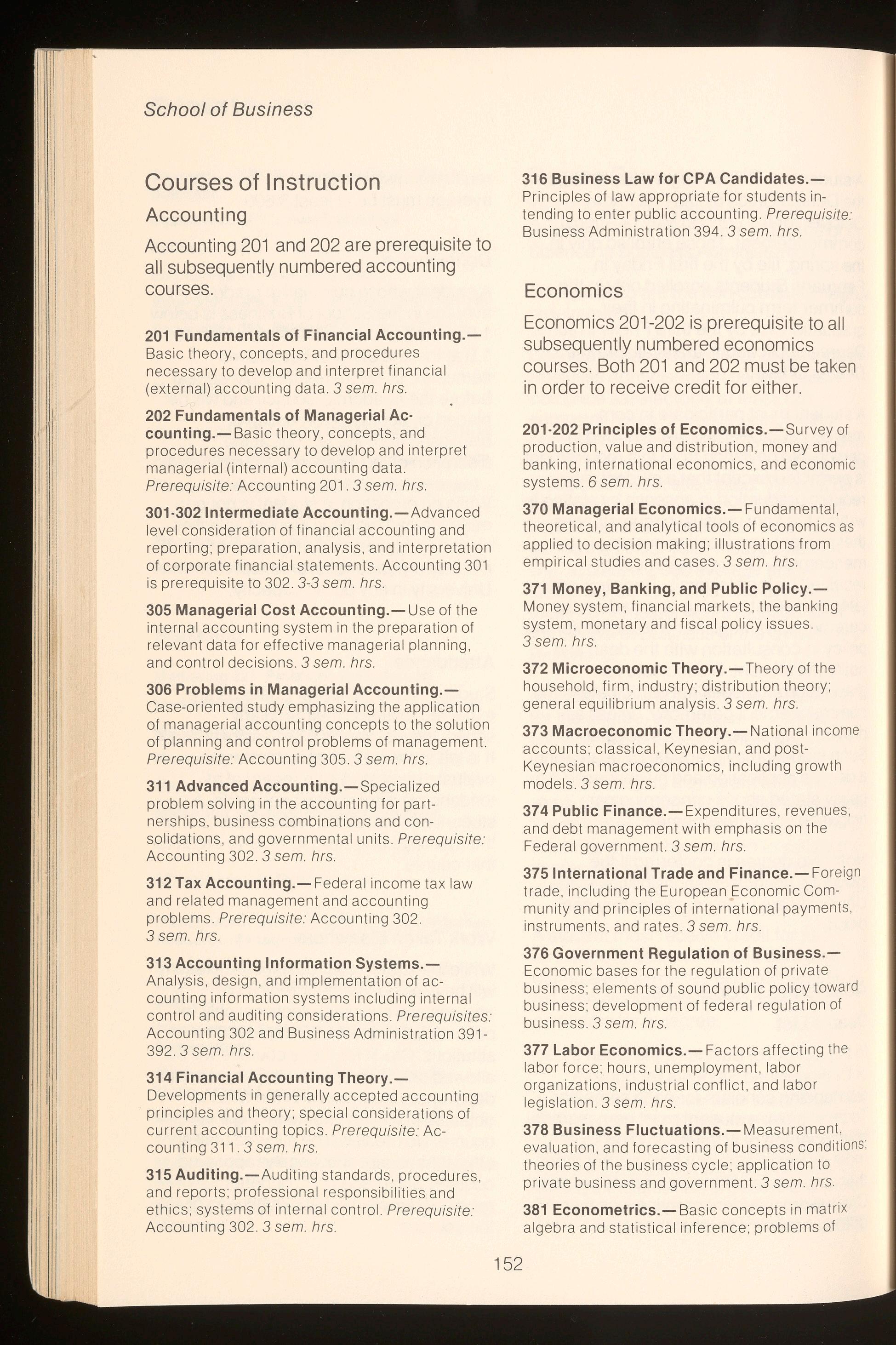
School of Business
Courses of Instruction
Accounting
Accounting 201 and 202 are prerequisite to all subsequently numbered accounting courses.
201 Fundamentals of Financial Accounting.Basic theory, concepts, and procedures necessary to develop and interpret financial (external) accounting data. 3 sem. hrs.
202 Fundamentals of Managerial Accounting.-Basic theory, concepts, and procedures necessary to develop and interpret managerial (internal) accounting data. Prerequisite· Accounting 201. 3 sem. hrs.
301-302 Intermediate Accounting.-Advanced level consideration of financial accounting and reporting: preparation, analysis, and interpretation of corporate financial statements. Accounting 301 is prerequisite to 302. 3-3 sem. hrs.
305 Managerial Cost Accounting.- Use of the internal accounting system in the preparation of relevant data for effective managerial planning, and control decisions. 3 sem. hrs.
306 Problems in Managerial Accounting.Case-oriented study emphasizing the application of managerial accounting concepts to the solution of planning and control problems of management. Prerequisite.· Accounting 305. 3 sem. hrs.
311 Advanced Accounting.-Specialized problem solving in the accounting for partnerships, business combinations and consolidations, and governmental units. Prerequisite: Accounting 302. 3 sem. hrs.
312 Tax Accounting.-Federal income tax law and related management and accounting problems. Prerequisite. Accounting 302. 3 sem. hrs.
313 Accounting Information Systems.Analysis, design, and implementation of accounting information systems including internal control and auditing considerations. Prerequisites. Accounting 302 and Business Administration 391392. 3 sem. hrs.
314 Financial Accounting Theory.Developments in generally accepted accounting principles and theory: special considerations of current accounting topics. Prerequisite: Accounting 311 3 sem. hrs.
315 Auditing.-Auditing standards, procedures, and reports: professional responsibilities and ethics: systems of internal control. Prerequisite· Accounting 302. 3 sem. hrs.
316 Business Law for CPA Candidates.Principles of law appropriate for students intending to enter public accounting. Prerequisite· Business Administration 394. 3 sem. hrs.
Economics
Economics 201-202 is prerequisite to all subsequently numbered economics courses. Both 201 and 202 must be taken in order to receive credit for either.
201-202 Principles of Economics.-Survey of production, value and distribution, money and banking, international economics, and economic systems. 6 sem. hrs.
370 Managerial Economics.-Fundamental , theoretical, and analytical tools of economics as applied to decision making : illustrations from empirical studies and cases. 3 sem. hrs.
371 Money, Banking, and Public Policy.Money system, financial markets, the banking system, monetary and fiscal policy issues. 3 sem. hrs.
372 Microeconomic Theory.- Theory of the household, firm, industry: distribution theory : general equilibrium analysis. 3 sem. hrs.
373 Macroeconomic Theory . - National income accounts: classical, Keynesian , and postKeynesian macroeconomics , including growth models. 3 sem. hrs.
374 Public Finance.-Expenditures, revenues, and debt management with emphasis on the Federal government. 3 sem. hrs.
375 International Trade and Finance.- Foreign trade, including the European Economic Community and principles of international paymen ts, instruments, and rates. 3 sem. hrs.
376 Government Regulation of Business.Economic bases for the regulation of private business: elements of sound public policy toward business: development of federal regulation of business. 3 sem. hrs.
377 Labor Economics.- Factors affecting the labor force: hours, unemployment, labor organizations, industrial conflict, and labor legislation 3 sem. hrs.
378 Business Fluctuations.-Measuremen t, evaluation, and forecasting of business conditions: theories of the business cycle: application to private business and government. 3 sem. hrs
381 Econometrics.-Basic concepts in matrix algebra and statistical inference: problems of
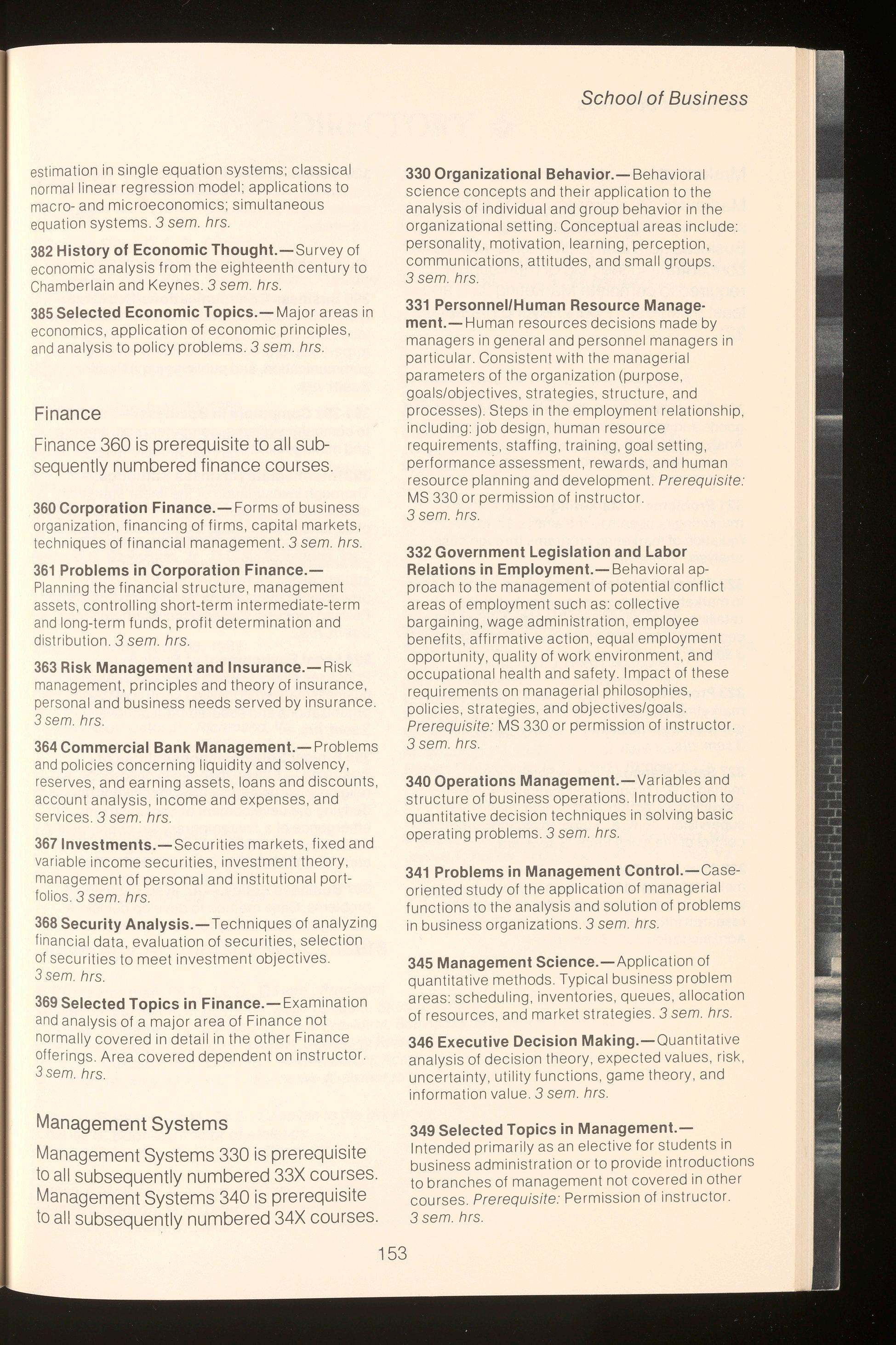
estimation in single equation systems; classical normal linear regression model; applications to macro-and microeconomics; simultaneous equation systems. 3 sem. hrs.
382 History of Economic Thought-Survey of economic analysis from the eighteenth century to Chamberlain and Keynes. 3 sem. hrs.
385 Selected Economic Topics.-Major areas in economics, application of economic principles, and analysis to policy problems. 3 sem. hrs.
Finance
Finance 360 is prerequisite to all subsequently numbered finance courses.
360 Corporation Finance.-Forms of business organization, financing of firms, capital markets, techniques of financial management. 3 sem. hrs.
361 Problems in Corporation Finance.Planning the financial structure, management assets, controlling short-term intermediate-term and long-term funds, profit determination and distribution. 3 sem. hrs.
363 Risk Management and lnsurance.-Risk management, principles and theory of insurance, personal and business needs served by insurance. 3sem. hrs.
364 Commercial Bank Management-Problems and policies concerning liquidity and solvency, reserves, and earning assets, loans and discounts, account analysis, income and expenses, and services. 3 sem. hrs.
367 lnvestments.-Securities markets, fixed and variable income securities, investment theory, management of personal and institutional portfolios. 3 sem. hrs.
368 Security Analysis.- Techniques of analyzing financial data, evaluation of securities, selection of securities to meet investment objectives. 3sem. hrs.
369 Selected Topics in Finance.-Examination and analysis of a major area of Finance not normally covered in detail in the other Finance offerings. Area covered dependent on instructor. 3sem. hrs.
Management
Systems
Management Systems 330 is prerequisite to all subsequently numbered 33X courses. Management Systems 340 is prerequisite to all subsequently numbered 34X courses.
School of Business
330 Organizational Behavior.-Behavioral science concepts and their application to the analysis of individual and group behavior in the organizational setting. Conceptual areas include: personality, motivation, learning, perception, communications, attitudes, and small groups. 3 sem. hrs.
331 Personnel/Human Resource Management.- Human resources decisions made by managers in general and personnel managers in particular. Consistent with the managerial parameters of the organization (purpose, goals/objectives, strategies, structure, and processes). Steps in the employment relationship, including: job design, human resource requirements, staffing, training, goal setting, performance assessment, rewards, and human resource planning and development. Prerequisite: MS 330 or permission of instructor. 3 sem. .'1rs.
332 Government Legislation and Labor Relations in Employment.- Behavioral approach to the management of potential conflict areas of employment such as: collective bargaining, wage administration, employee benefits, affirmative action, equal employment opportunity, quality of work environment, and occupational health and safety. Impact of these requirements on managerial philosophies, policies, strategies, and objectives/goals. Prerequisite. MS 330 or permission of instructor. 3 sem. hrs.
340 Operations Management-Variables and structure of business operations. Introduction to quantitative decision techniques in solving basic operating problems. 3 sem. hrs.
341 Problems in Management Control.-Caseoriented study of the application of managerial functions to the analysis and solution of problems in business organizations. 3 sem. hrs.
345 Management Science.-Application of quantitative methods. Typical business problem areas: scheduling, inventories, queues, allocation of resources, and market strategies. 3 sem. hrs.
346 Executive Decision Making.-Quantitative analysis of decision theory, expected values, risk, uncertainty, utility functions, game th eo ry , and information value. 3 sem. hrs.
349 Selected Topics in Management.Intended primarily as an elective for students in business administration or to provide introductions to branches of management not covered in other courses. Prerequisite: Permission of instructor. 3 sem. hrs.
School of Business
Marketing
Marketing 320 is prerequisite to all subsequent ly numbered marketing courses. Business administration majors wishing to concentrate in the field of marketing are required to complete Marketing 321, and at least 9 semester hours beyond Marketing 321.

320 Fundamentals of Marketing.- Mo vement of goods and services from producer to consumer. Ana lysis of markets and their environment, deve lopment of a marketing strategy, evaluation and control of marketing program s. 3 sem. hrs.
321 Problems in Marketing.-Application of marketing concepts to the a nalysi s and formulation of marketing programs through case analysis 3 sem. hrs.
322 Selected Topics in Marketing.-Major area in marketing, such as: consumer behavior, retailing, personal selling. Specific area varies by semester. Prerequisite: Permiss ion of instructor. 3 sem. hrs.
323 Promotion.-Role of promotion in the marketing mix; forms of promotion; promotional st rategy ; communications theory; buyer behavior. 3 sem. hrs.
327 Sales Management-Sale s force management program , allocatio n of sales effort; recruiting; selection and training; motivation, superv ision , compensation, evaluation, and control of the sales force. 3 sem. hrs.
328 Marketing Research.-Concept s, methodology, and techniques. Research design and statistical analysis. Validity and reliability of research information. Prerequisite: Business Administration 393. 3 sem. hrs.
329 Marketing Management-Marketing opportunities, marketing organization, planning marketing programs, controlling marketing effort. 3 sem. hrs.
Business
Administration
390 Business Communications/Research.Res earch in business, business correspondence , job-research writing, formal report writing , interpersonal oral communications , small group communication , and public communication. 3 sem. hrs.
391-392 Computers in Business.-lntrodu ction to computer systems, computer programmin g, and management information systems. 4 sem. hrs.
393 Intermediate Business Statistics.Thorough investigation of the linear statistical model, including multiple regression and analysis of variance. Additional statistical methods widely used in business and economic analysis: nonparametric statist ics , survey sampling , and statistical decision theory. Introduction to probabilistic phenomena: Markov chains and the Poisson process. Prerequisite: Mathemati cs 229. 3 sem. hrs.
394 Legal Environment of Business.Principles of law relating to legal problem s of the businessman; emphasis on contracts, business organizations and secured transactions 3 sem. hrs.
395 Ethical/Social Responsibilities of Business.-Ethical theories in philo sophy and religion ; historic ethical presuppositions underlying the development of capitalism and the emergence of a contemporary set of competing values; current ethical cases highlighting value choices and resulting consequences. 3 sem. hrs.
397 Business Policy.-Analysis of business probl ems. Case method to develop decisionmaking ability in policy formulation and administration. 3 sem. hrs.
DIRECTORY ~ ,
Board of Trustees
Officers
F. Carlyle Tiller, D . C. S ., Rector
E. Claiborne Robins, LL D , Vice Rector
E. Bruce Heilman, Ph.D. , LL.D., D. Hum. , President
Carle E Davis, J.D ., LL D ., Secretary
Louis W Moelchert, Jr., M Acctcy. , Trea su rer
Corporate Trustees
Terms Expiring June 30 , 1980
Raymond F. Allen, D.D ., Blacksburg, Va.
Otis L. Brown, Richmond, Va.
Martha A. Carpenter , M D ., Charlottesville, Va.
William V Daniel , Richm ond, Va.
William B. Graham, Richmond , Va.
Robert D. Kilpatrick, D C.S , Hartford , Conn.
Warren M . Pace , Richm ond, Va.
Richard S. Reynolds, Jr., D C.S , Richmond, Va.
E. Claiborne Robins, Jr. , Richmond , Va.
Charles H Ryland , LL B ., LL.D ., Warsaw , Va.
Clinto n Webb , Richmond , Va.
Terms Expiring June 30, 1981
Chester L Brown, D .D., Hampto n, Va.
Paul W Duke, Litt D , Washington, D.C.
Max H Goodloe , Richmond , Va.
Floyd D Gottwald , Jr., Richmond , Va.
L Howard Jenkins, Jr ., Ri chmond, Va.
Joseph A . Jennings , D.C.S., Richmond, Va.
Thomas C Leggett, South Boston, Va.
E. Claibo rne Robins, LL .D., Richmond, Va.
Terms Ex piring June 30, 1982
Lewis T. Booker , J.D., LL.D., Richmond, Va.
Betty Ann Tulloh, Richmond , Va.
Ann Carol Haskell , Richmond, Va.
University Administrative Officers
E. Bruce Heilman, PhD LLD , D.Hum. , President
E. Bruce Heilman, Ph.D. , LL D ., D Hum ., Richmond , Va.
Carl W. Johnson, Richmond , Va.
Ken Mcfarlane Smith , J.D. , Arlington , Va.
Henry F Stern , Richmond , Va.
Luther Joe Thompson, Ph D., D D. , Richmond , Va.
F Carlyle Tiller , D .C S, Richmond , Va.
Terms Expiring June 30, 1983
Louise B. Cochrane, Rockville , Va.
William L. Lumpkin , Ph D , Norfolk, Va.
W . Dortch Oldham , LL D ., Nashville, Tenn
Stanley F Pauley, Richmond, Va.
B. Franklin Skinner, Miami, Fla
Leroy Smith, M .D., D .Sc., Richm ond, Va.
Joseph E. Spruill, Jr ., J.D., Tappahannock , Va.
William B Thalhimer , Jr. , DC S, Rich mon d , Va
Stephen J. Wright, Ph.D., LL D ., L HD , Litt.D ., Hampton, Va.
Elaine J. Yeatts, Richmond, Va.
Trustees Emeritit
Reuben E. Alley , D.D. (1981), Richmond , Va.
William Hugh Bagby (1981), Baltimore , Md
W R Broaddus, Jr., LLB , LLD (1981), Martinsville, Va.
Lynn C. Dickerson, D.D (1981),Roanoke, Va.
John H Garber, D.D. (1981), Hampton , Va.
L. Dudley George (1981), Richmond , Va.
F D. Gottwald, Sr., D.CS. (1982), Richmond, Va.
W Tyler Haynes , D.D S, D.Sc. (1980), Richmond, Va.
M. M. Long , J.D , LL.D. (1981), St. Paul, Va.
Robert T. Marsh , Jr., LLD. (1981), Richmond, Va.
R. Clayton Pitts, Ph.D.(1983),Hampton, Va.
Edward H. Pruden, Ph.D , D.D. (1980), Richmond, Va.
Harold F. Snead, LLB , LL.D (1983),Richmond , Va.
Frances A. Stallard , D.Hum.(1983),Richmond, Va.
James T. Tucker, M.D., D.Sc.(1981),Richmond,Va.
tT erms expire June 30 of the year listed.
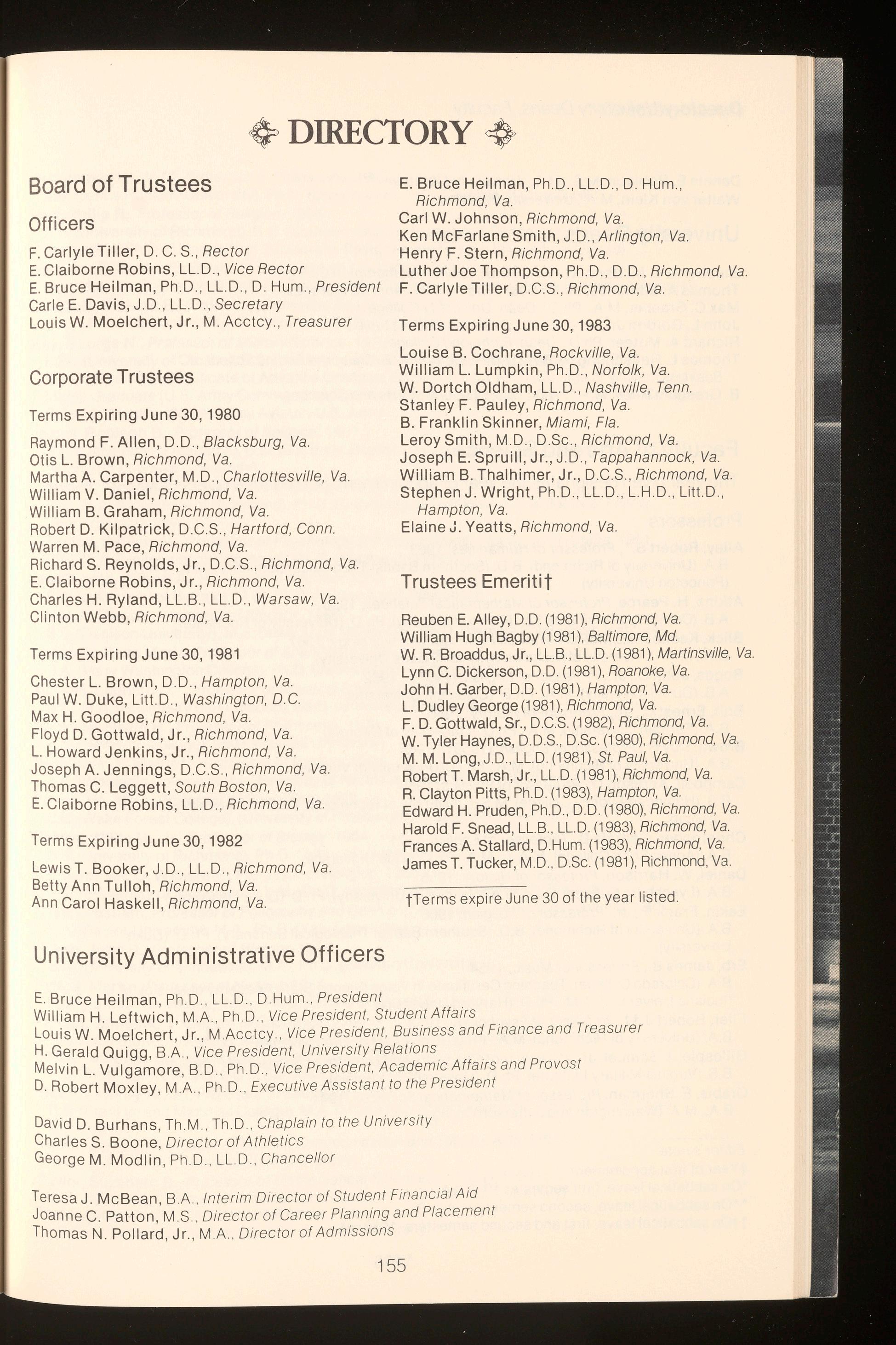
William H. Leftwich, MA , PhD ., Vice President, Student Affairs
Louis W. Moel chert , J r. , M Acctcy., Vice President, Business and Finance and Treasurer
H. Gera ld Quigg , BA, Vice President , University Relations
Melvin L Vulgamore, B.D Ph D , Vice President, Academic Affairs and Provost
D. Robe rt Mo x ley , MA , PhD ., Executive Assistant to the President
David D. Burhans , Th M ., Th D , Chaplain to the University
Charles S. Boone , Director of Athletics
George M. Modlin , PhD , LLD ., Chancellor
Teresa J. Mc Bean, BA Interim Director of Student Financial Aid
Joanne C. Patton , M S , Director of Career Planning and Placement
Thomas N. Pollard , Jr ., MA. Director of Admissions
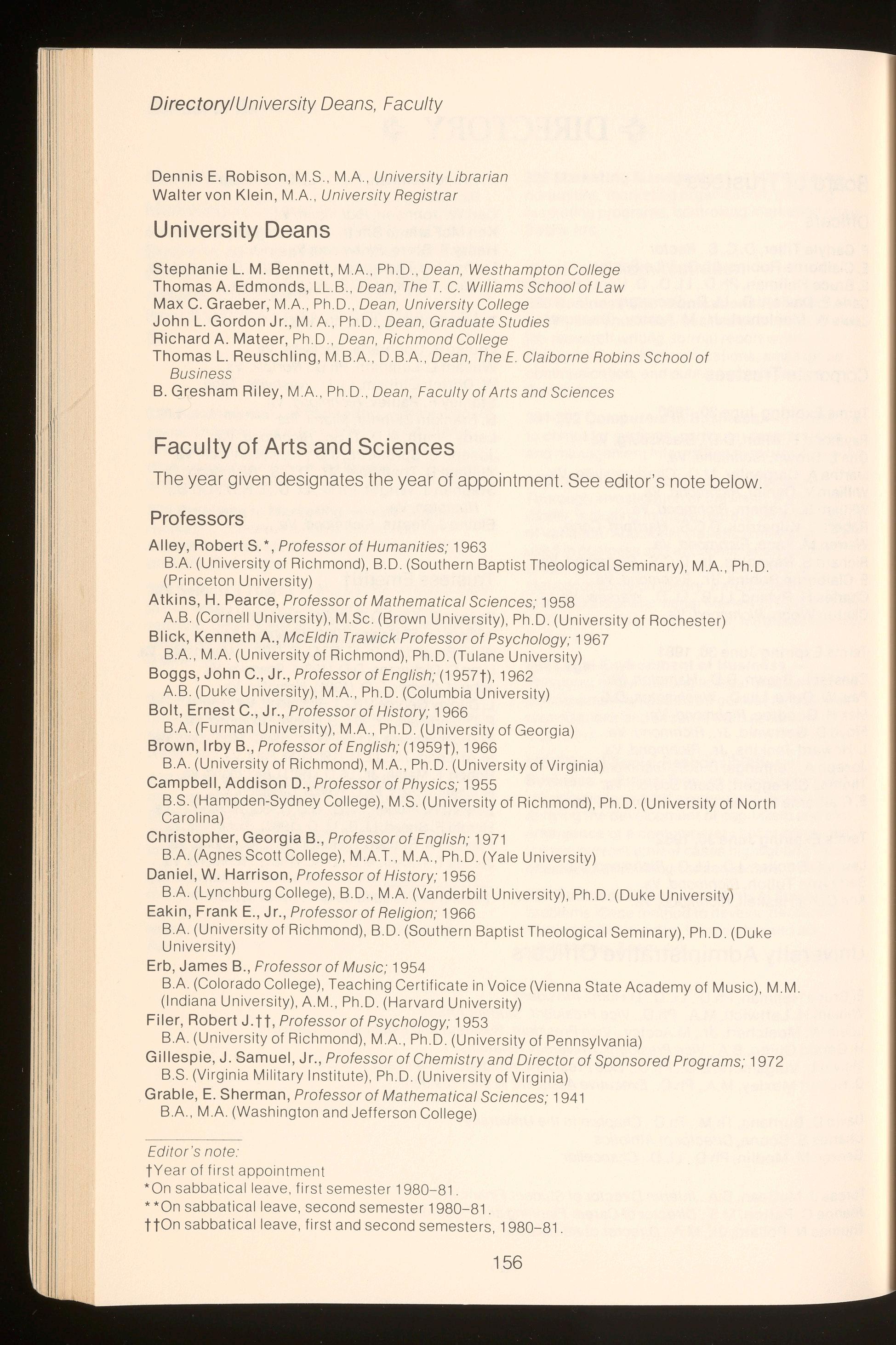
Directory/University Deans, Faculty
Dennis E. Robison, MS, MA, University Librarian
Walter von Klein, MA, University Registrar
University Deans
Stephanie L. M. Bennett, MA, PhD , Dean, Westhampton College
Thomas A. Edmonds, LL.B , Dean, The T. C. Williams School of Law
Max C. Graeber , MA, PhD, Dean, University College
John L. Gordon Jr. , M. A, PhD, Dean, Graduate Studies
Richard A. Mateer , Ph D , Dean, Richmond College
Thomas L. Reusch ling, M.BA, D.BA, Dean, The E. Claiborne Robins School of Business
B. Gresham Riley , MA, PhD, Dean, Faculty of Arts and Sciences
Faculty of Arts and Sciences
The year given designates the year of appointment See editor's note below.
Professors
Alley, Robert S. *, Professor of Humanities, 1963
BA (University of Richmond) , B.D. (Southern Baptist Theological Seminary), MA , Ph.D. (Princeton University)
Atkins, H. Pearce , Professor of Mathematical Sciences, 1958
A.B. (Cornell University), M.Sc. (Brown University), Ph.D. (University of Rochester)
Blick , Kenneth A ., McEldin Trawick Professor of Psychology, 1967
BA, MA (University of Richmond), Ph.D. (Tulane University)
Boggs , John C., Jr. , Professor of English, (1957t), 1962
AB. (Duke University) , MA, Ph.D. (Columbia University)
Bolt, Ernest C., Jr., Professor of History; 1966
BA (Furman University), MA, Ph.D. (University of Georgia)
Brown, Irby B., Professor of English, (1959t), 1966
BA (University of Richmond), MA, Ph.D. (University of Virginia)
Campbell , Addison D., Professor of Physics, 1955
B.S. (Hampden-Sydney College), M.S. (University of Richmond), Ph.D. (University of North Carolina)
Christopher , Georgia B. , Professor of English; 1971
BA (Agnes Scott College), MAT , MA, Ph.D. (Yale University)
Daniel, W. Harrison, Professor of History; 1956
BA (Lynchburg College), B D , MA (Vanderbilt University) , Ph.D. (Duke University)
Eakin , Frank E., Jr., Professor of Religion; 1966
BA (University of Richmond) , B.D. (Southern Baptist Theological Seminary), Ph.D. (Duke University)
Erb, James B., Professor of Music, 1954
BA (Colorado College), Teaching Certificate in Voice (Vienna State Academy of Music), M.M. (Indiana University), A.M., Ph.D. (Harvard University)
Filer , Robert J. tt, Professor of Psychology; 1953
BA (University of Richmond) , MA, Ph.D. (University of Pennsylvania)
Gillespie, J. Samuel, Jr., Professor of Chemistry and Director of Sponsored Programs; 1972
B.S. (Virginia Military Institute), Ph.D (University of Virginia)
Grable, E. Sherman , Professor of Mathematical Sciences; 1941
BA, MA (Washington and Jefferson College)
Editor's note.
tYe ar of first appointment
*On sabbatical leave, first semester 1980-81
* *On sabbatical leave, second semester 1980-81.
ttOn sabbatical leave, first and second semesters, 1980-81
Directory/Faculty

Hall , James H., Jr.•• , Professor of Philo s ophy; 1965
A. B (Johns Hopkins University) , Ph.D. (University of North Carolina at Chapel Hill)
Hart , Philip R., Professor of Religion; 1956
BA (University of Richmond), B.D. (Southern Baptist Theo logical Seminary), M.A. (Columbia University) , Ph.D. (University of Edinburgh), Postgraduate Study (University of Oxford)
Heilman, E. Bruce, Professor of Education and President ; 1971
B S , M.A. , Ph.D. (Peabody College) , LL D. (Wake Forest University) , D Hum. (Campbell College)
Humbert, Richard E., Professor of Physical Education ; 1955
BA , M.A.in Ed. (University of Richmond) , Ed.D. (Coolidge College)
Ivey, George N ., Professor of Military Science; 1976
B Ed (University of Omaha), B.S. (Univers ity of the State of New York at Albany), M.S. (Troy State University), Certificate of Advance Graduate Studies in Education (College of William and Mary) , Graduate (U S Army Command and General Staff College) , Graduate (Naval War College) , Colonel, Infantry , Master Army Aviator , U.S Army
James , Robison B., Professor of Religion; 1962
BA (University of Alabama), 8.D. (Southern Baptist Theological Seminary), (University of Edinburgh) , Ph.D. (Duke University)
Leftwich, Francis 8. ••,Professor of Biology; 1964
BA , M.A. (University of Richmond), Ph D. (University of Tennessee), Postdoctoral Fellow (Rutge rs University)
Leftwich, William H., Professor of Psychology and Vice President for Student Affairs; 1961
BA , M.A. (University of Richmond) , Ph.D. (Purdue University)
MacDonald, Robert A., Professor of Spanish, 1955
BA (University of Buffalo), M.A., Ph.D. (University of Wisconsin)
Major, R. Wayne, Professor of Physics ; 1966
B S. (Denison University) , M.S. (Iowa State University) , Ph.D. (Virginia Polytechnic Institute)
Marcone, Rose Marie, Professor of Spanish and Italian ; 1964
BA (Mary Washington College), Ph.D. (Johns Hopkins University)
McNeal, Leonard D. •, Professor of Physical Education; 1953
BS , M.A. (University of Richmond), Ed.D. (University of Virginia)
Mucklow, Neale H., Professor of Philosophy; 1970
A.B (Hamilton College), Ph.D. (Cornell University)
Penninger , F. Elaine••, Professor of English; 1963
A. B (Woman's College of the University of North Carolina). M.A. , Ph.D. (Duke University)
Powell, W. Allan, Professor of Chemistry; 1952
B.S (Wake Forest College), (University of Pittsburgh), Ph.D. (Duke University)
Reams , Willie M., Jr. , Professor of Biology , 1964
B.S (University of Richmond) , Ph.D. (Johns Hopkins University)
Rhodenhiser, 0. William••, Professor of Religion; 1955
BA (University of Richmond) , Th.M ., Ph.D. (Southern Baptist Theological Seminary)
Riley , Gresham, Professor of Philosophy and Dean of the Faculty of Arts and Sciences ; 1975
BA (Baylor University), M.A., Ph.D. (Yale University)
Rilling, John R., Professor of History; 1959
BA (University of Minnesota) , M.A. , Ph.D. (Harvard University)
Ryle, J. Martin, Professor of History ; 1964
A B (Furman University) , M.A. , Ph.D . (Emory University)
Sartain , James A., Professor of Sociology , 1963
B S. (Troy State University) , M.A. (Peabody College), Ph.D. (Vanderbilt University)
Selby, Talbot R., Professor of Classical Studies; 1962
AB , Ph.D. (University of North Carolina)
Stewart, Henry H. , Jr. , Professor of Sociology; 1966
BA. (Franklin and Marshall College) , M.A. (Mississippi State University) , Ph.D. (Florida Stat e Univ ersity)
Tarver, Jerry L., Professor of Speech Communication and Theatre Arts , 1963
BA , M.A., Ph.D. (Louisiana State University)
Taylor, Elizabeth B., Professor of Mathematical Sciences; (1952t), 1957
BA. (Winthrop College), M.A. (Duke University) , Ph D. (Columbia University)
Taylor, Jackson J. •, Professor of Physics; 1948
B.S. (University of Richmond), M.S. (Cornell University)
157
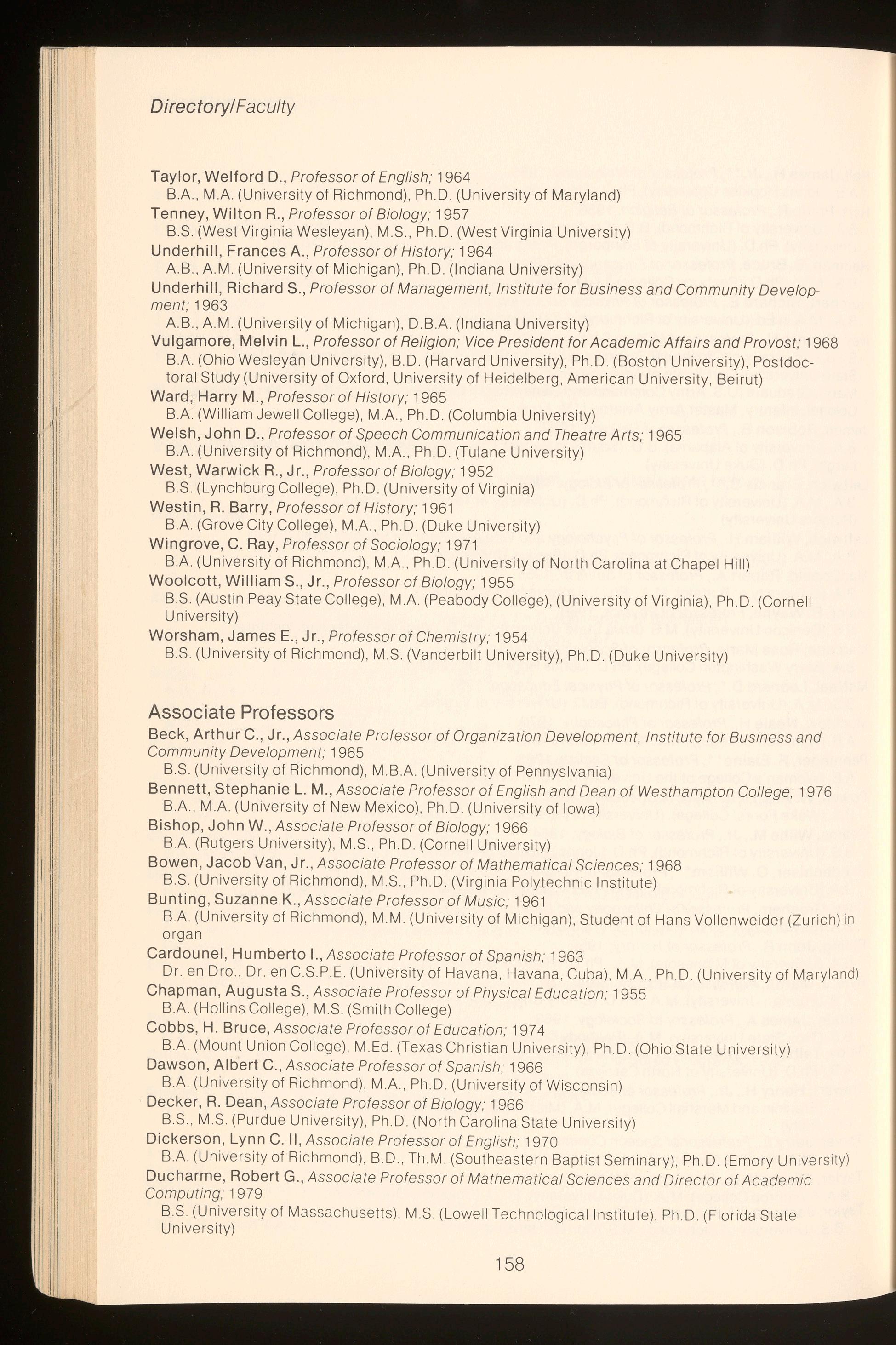
Directory/ Faculty
Taylor , Welford D., Professor of English; 1964
B A, M .A. ( Un ivers ity o f Ric hmo nd), Ph D . ( Uni ve rs ity o f Maryla nd)
Tenney , Wilton R. , Pro fessor o f Biology; 19 57
B S. (We st Virginia Wes leya n), M .S, Ph.D. (We st Vir g inia U n ive rs ity)
Underhill, Frances A ., Pro f essor o f H isto r y; 1964
A.B , A. M ( Un ive rsi t y o f Mich iga n), Ph .D (Ind iana Un ive rsity)
Underhill , Richard S ., Pr ofessor of Manag e m e nt, Institute for Business and Community Developmen t; 1963
AB , A.M. ( University o f Michigan), D .B.A. ( Ind iana University)
Vulgamore , Melvin L., Professo r of Re l ig io n; Vice Pr esident f o r A cademic Aff ai r s and Provost; 1968
BA (Ohio W esleyan U niversity), B. D ( Harvar d University), Ph.D. (Boston University) , Postdoctoral Stu d y (University of Oxford, University of Heidelberg, American University , Beirut)
Ward , Harry M ., Pr ofessor of H istory; 1965
BA (Willia m Jewell Co llege), M.A., Ph.D . (Columb ia U nive rsity)
Welsh , John D., Pro f esso r of Speech Communication and Theatre Arts; 1965
BA (Uni v er s ity of Rich mo nd), M .A., Ph D. (Tulan e Uni versi t y)
West , Warwick R. , Jr. , Pr ofesso r o f Biolo g y; 1952
B .S. ( Ly nchbu rg Co llege), Ph.D . (Univers ity of V ir g in ia)
Westin , R. Barry , Pro fessor of H istory; 1961
B A (G rove City Co llege), M .A., Ph.D ( Duke U niversity)
Wingrove , C Ray , Professor of Sociology; 1971
B A ( University of Richmond), M.A., Ph.D. ( University of North Carolina at Chapel Hill)
Woolcott , William S ., Jr ., Professor of Biology ; 1955
B .S. (Austin Peay State College), M.A. (Peabo d y Colle ge) , (University of Virginia), Ph D. (Cornell University)
Worsham , James E., Jr ., Professor of Chemistry; 1954
B.S. (U niversi t y o f Richmond), M.S. (Vande rbilt U niversity), Ph.D. (Duke University)
Associate Professors
Beck , Arthur C ., Jr ., Associate Professor of Organization Development, Institute for Business and Community D evelopment; 1965
B .S. ( University of Richmond) , M.B.A. (University of Pennyslvania)
Bennett , Stephanie L M ., Associate Professor of English and Dean of Westhampton College ; 1976
BA , M.A. (University of New Mexico), Ph.D. (University of Iowa)
Bishop , John W ., Associate Professor of Biology; 1966
BA (Rutgers University), M.S., Ph.D (Cornell University)
Bowen , Jacob Van , Jr ., Associate Professor of Mathematical Sciences; 1968
B .S. (University of Richmond), M.S. , Ph.D. (Vi rginia Polytechnic Institute)
Bunting , Suzanne K. , Associate Professor of M usic; 196 1
B A ( U niversity of Ric h mond), M M ( Un ive rsity o f M ich igan), Student of Hans Vollenweider (Zurich) in o rga n
Cardounel , Humberto I. , Associate Professor o f Spanish; 1963
Dr. e n Dro, D r. e n C.S.P.E. (U niversi ty of Havana, Havana, Cuba), M .A., Ph.D . ( University of Mary land)
Chapman , Augusta S ., Associate Professor of Physical Education; 1955
BA ( Hollins Co llege), M .S. (Smith College)
Cobbs , H Bruce , Associate Professor of Education ; 1974
BA (Mount Union College) , M Ed. (Texas Christian University) , Ph D (Ohio State University)
Dawson , Albert C. , Associate Professor of Spanish ; 1966
BA (University of Richmond) , M.A. , Ph.D. (University of Wisconsin)
Decker , R Dean , Associate Professor of Biology ; 1966
BS, M.S. (Purdue University) , Ph D. (North Caro lina State University)
Di c kerson , Lynn C II, Associate Professor of English; 1970
BA ( U niversity o f Richmond), B D, Th. M . (Southeastern Baptist Seminary), Ph D. (Emory U niversity)
Ducharme , Robert G ., Associate Professor o f Mathematical Sciences and Director of Academic Computing, 1979
B.S. ( Univers ity of Massachusetts), M.S. (Lowel l Techno logica l I nstitute), Ph.D. ( Florida Stale University)

Duckwort h , James E., Associate Professor of English; 1968
A.8. (Harvard University}, M.A., Ph.D. (University of Connecticut)
Dunsing, Richard J ., Associate Professor of Organization Development and Director , Institute for Business and Community Development; 1967
B.A. (Knox College}, M .B.A. (Northwestern University)
Eastma n , Norris W. , Associate Professor of Physical Education; 1971
BS, M.S. (Spring f ield College}, Ph.D (Florida State University)
Eicher, 8 Keith, Associate Professor of Education; 1971
B.S., M.S. (Southern Illinois University}, Ed D. (Northern Illinoi s University)
Graebe r , Max C ., Associate Professor of Speech Communication and Theatre Arts and Dean of University College; 1967
B.S. (Indiana University}, M .A., Ph.D. (Bowling Green State Univer sity)
Gun licks, Arthur 8. , Associate Professor of Political Science; 1968
B.A. (University of Denver), Ph.D. (Georgetown University}, ( University of Freiburg}, (University of Gottingen)
Gunter, Garland 0 ., Associate Professor of English ; 1966
B.A. (Wake Forest College}, M.A. (Columbia University} , Ph D. (University of Maryland)
Gurney, Georgie A ., Associate Professor of English ; 1964
A.B. (Tufts University} , M.A. (Longwood College}, M .A. (University of North Carolina}, Certificat et Diplome (University of Toulouse, France}, Ph.D. (University of North Carolina)
Hardy, Frederick T. , Associate Professor of Physical Education and Track Coach; 1950
A.B., M.A. in Physical Education (University of North Carolina)
Hillmar, Ellis D ., As sociate Professor of Organization Development, Institute for Business and Community Development; 1969
B. Mus. Ed ., M .S. (University of Colorado)
Horgan, Robert J ., Associate Professor of Political Science, Institute for Business and Community Development; 1967
A.B. M.A. (University of North Dakota}, Ph.D (University of Notre Dame)
Johnson, Charles W ., Jr. , Associate Profe ssor of Art; 1967
B.M.Ed. (Westminister College}, M.S.M. (Union Theological Seminary, New York City}, Ph D (Ohio University)
Jordan, E. Wi 11iamson , Associate Professor of Physical Education ; 1966
B.A. (University of Richmond} , M Ed. (University of North Carolina)
Kent, Joseph F., Ill , Associate Professor of Mathematical Sciences; 1973
B.A., M.A .. Ph D (University of Virginia)
Kozub, Frederick J ., Associate Profes sor of Psychology; 1968
B.A. (State University of New York at Buffa lo}, M.A. ( Ho ll ins College}, Ph.D. (Un iversity of Virginia)
Larkin, Neil M ., Associate Professor of French ; 1970
B.A. (Trinity College}, M.A. , Ph D . (Johns Hopkins University)
Lockey, William H. , Jr ., Associate Professor of Speech Communication and Theatre Arts, 1963
B.F.A. (Carnegie Inst itu te of Technology} , M.A. (Columbia University}, Certificate (University of Birmingham, England)
Marr, Weaver M ., Associate Profe ssor of German; 1965
B.A. (Emory Uni versity}, M.A.. Ph D (Indiana University)
Matee r , Richard A ., Associate Profes so r of Chemistry and Dean of Richmond College; 1966
A.B. (Centre College of Kentucky}, (University of Kentucky} , Ph.D. (Tulane Univer sity)
Mavroud is , Demetrios J. , * As sociate Professor of Art ; 1974
B.A. (Jersey City State College). M .A., Ed.D (Columbia Univ ers ity Teachers College)
McMurtry, Josephine 8 ., Associate Professor of English; 1969
B.A. (Texas Woman's Univer si ty} , Ph D (Rice University)
Meybin, R John Ill , Associate Professor of Military Science; 1977
B.A. (Virgin ia Military In sti tu te). M.A. (Boston University} , Major , Military Police Corps, U.S. Army
Monk, Clarence, Associate Professor of Mathematical Sciences; 1959
B.A., S.S. (Emory and Henry Co llege). M .S, Ph D . (Columbia University)
Morris, Thomas R., Associate Professor of Political Science; 1971
BA (Virginia Military Institute}, M.A., Ph.D (University of Virginia)
Nicho lson , Robert H ., **Associate Profe ssor of Economics , School of Business; 1972
B.S. (University o f Delaware} , M .S., Ph.D (North Carolina State University) 159
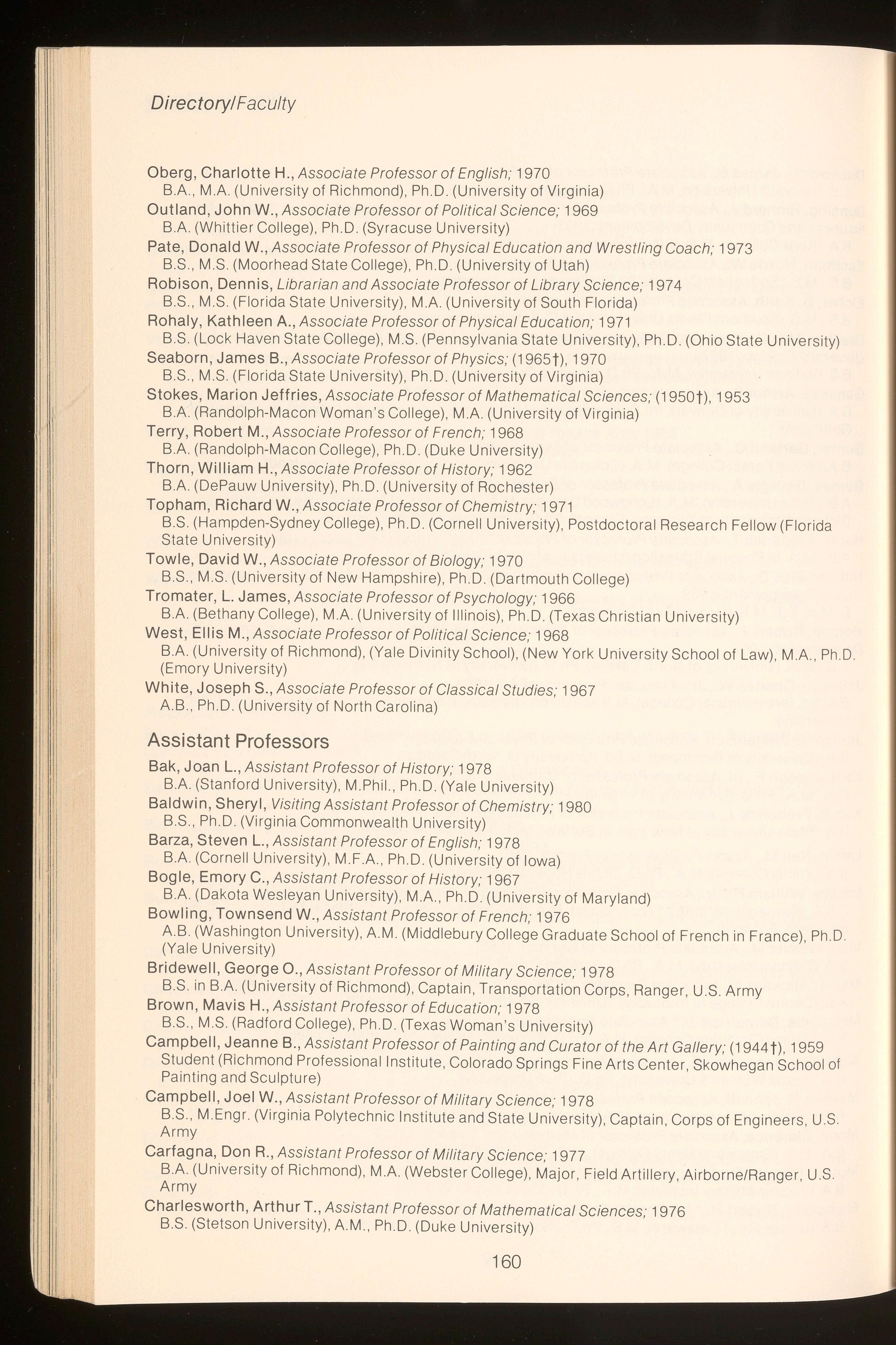
Directory/Faculty
Oberg, Charlotte H., Associate Professor of English; 1970
BA, M.A. (University of Richmond), Ph.D. (University of Virginia)
Outland, John W., Associate Professor of Political Science; 1969
BA (Whittier College), Ph.D. (Syracuse University)
Pate, Donald W., Associate Professor of Physical Education and Wrestling Coach, 1973
B.S., M.S. (Moorhead State College), Ph.D. (University of Utah)
Robison, Denn is, Librarian and Associate Professor of Library Science; 197 4
B.S., M.S. (Florida State University) , M.A. (University of South Florida)
Rohaly, Kathleen A., Associate Professor of Physical Education ; 1971
B.S. (Lock Haven State College) , M.S. (Pennsylvania State University) , Ph.D. (Ohio State Univer s it y)
Seaborn, James B., Associate Professor of Physics ; (1965t) , 1970
BS , M.S. (Florida State University), Ph.D. (University of Virginia)
Stokes, Marion Jeffries, Associate Professor of Mathematical Sciences ; (1950t) , 1953
BA (Randolph-Macon Woman's College) , M.A. (University of Virginia)
Terry, Robert M., Associate Professor of French; 1968
BA (Randolph-Macon College), Ph.D. (Duke University)
Thorn, William H., Associate Professor of History; 1962
BA (DePauw University), Ph.D. (University of Rochester)
Topham, Richard W., Associate Professor of Chemistry; 1971
B.S. (Hampden-Sydney College) , Ph.D. (Cornell University) , Postdoctoral Research Fellow (Florid a State University)
Towle, David W., Associate Professor of Biology , 1970
B.S. , M.S. (University of New Hampshire), Ph.D. (Dartmouth College)
Tromater, L. James, Associate Professor of Psychology ; 1966
BA (Bethany College) , M.A. (University of Illinois) , Ph.D (Texas Christian University)
West, Ellis M., Associate Professor of Political Science; 1968
BA (University of Richmond) , (Yale Divinity School) , (New York University School of Law) , M.A. , Ph D. (Emory University)
White, Joseph S., Associate Professor of Classical Studies; 1967
A.B , Ph.D. (University of North Carolina)
Assistant Professors
Bak, Joan L., Assistant Professor of History; 1978
BA (Stanford University) , M.Phil. , Ph.D. (Yale University)
Baldwin, Sheryl, Visiting Assistant Professor of Chemistry ; 1980
B.S , Ph.D. (Virginia Commonwealth University)
Barza, Steven L., Assistant Professor of English ; 1978
BA (Cornell University) , M.F.A., Ph.D. (University of Iowa)
Bog le, Emory C., Assistant Professor of History; 1967
BA (Dakota Wesleyan University) , M.A. , Ph.D. (University of Maryland)
Bowling, Townsend W , Assistant Professor of French, 1976
A.B. (Washington University), A.M. (Middlebury College Graduate School of French in France), Ph.D (Yale University)
Bridewell, George 0., Assistant Professor of Military Science; 1978
B.S. in BA (University of Richmond) , Captain, Transportation Corps , Ranger , U.S. Army
Brown, Mavis H., Assistant Professor of Education , 1978
B.S. , M.S. (Radford College) , Ph D. (Texas Woman's University)
Campbell, Jeanne B., Assistant Professor of Painting and Curator of the Art Gallery , (1944 t) 1959
Student (Richmond Professional Institute , Colorado Springs Fine Arts Center , Skowhegan School of Painting and Sculpture)
Campbell, Joel W., Assistant Professor of Military Science ; 1978
B S , M.Engr (Virginia Polytechnic Institute and State University), Captain, Corps of Engineers, U .S Army
Carfagna, Don R., Assistant Professor of Military Science; 1977
BA (University of Richmond), M.A. (Webster College), Major, Field Artillery, Airborne/Ranger, U.S Army
Charlesworth, Arthur T. , Assistant Professor of Mathematical Sciences, 1976
B.S. (Stetson University) , A.M , Ph.D. (Duke University)
Directory/Faculty
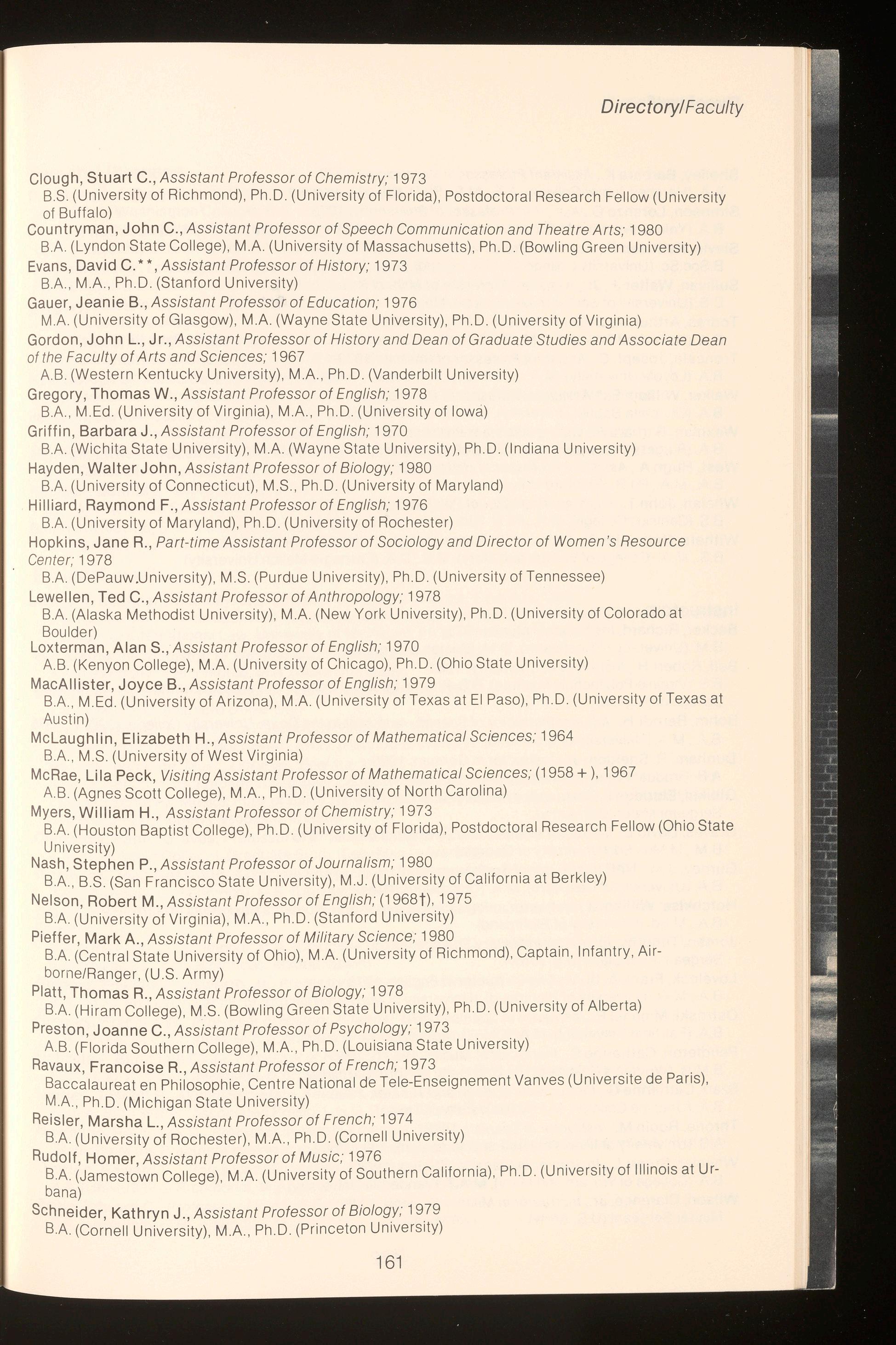
Clough, Stuart C., Assistant Professor of Chemistry; 1973
B.S. (University of Richmond}, Ph.D. (University of Florida} , Postdoctoral Research Fellow (University of Buffalo)
Countryman, John C., Assistant Professor of Speech Communication and Theatre Arts; 1980
B.A. (Lyndon State College}, M.A. (University of Massachusetts}, Ph.D. (Bowling Green University)
Evans, David C. **,Assistant Professor of History; 1973
B.A., M.A., Ph D (Stanford University)
Gauer, Jeanie B., Assistant Professor of Education; 1976
M.A. (University of Glasgow}, M.A. (Wayne State University}, Ph.D (University of Virginia)
Gordon, John L. , Jr., Assistant Professor of History and Dean of Graduate Studies and Associate Dean of the Faculty of Arts and Sciences; 1967
A.B. (Western Kentucky University}, M.A., Ph.D. (Vanderbilt University)
Gregory, Thomas W., Assistant Professor of English; 1978
B.A., M.Ed. (University of Virginia}, M.A., Ph D. (University of Iowa)
Griffin, Barbara J., Assistant Professor of English ; 1970
B.A. (Wichita State University}, M.A. (Wayne State University}, Ph.D. (Indiana University)
Hayden, Walter John, Assistant Professor of Biology; 1980
B.A. (University of Connecticut}, M.S., Ph.D. (University of Maryland)
Hilliard, Raymond F., Assistant Professor of English ; 1976
B.A. (Unive rsity of Maryland} , Ph.D. (University of Rochester)
Hopkins, Jane R., Part-time Assistant Professor of Sociology and Director of Women's Resource Center; 1978
B.A. (DePauw .University}, M.S (Purdue University}, Ph D (University of Tennes see)
Lewellen, Ted C., Assistant Professor of Anthropology; 1978
B.A. (Alaska Methodist University} , M.A. (New York University}, Ph.D (University of Colorado at Boulder)
Loxterman, Alan S., Assistant Professor of English; 1970
AB. (Kenyon College}, M.A. (University of Chicago}, Ph.D. (Ohio State University)
MacAllister, Joyce B., Assistant Professor of English , 1979
B.A., M.Ed. (University of Arizona}, M.A. (University of Texas at El Paso}, Ph.D. (University of Texas at Austin)
McLaughlin, Elizabeth H., Assistant Professor of Mathematical Sciences; 1964
B.A., M.S. (University of West Virginia)
McRae, Li la Peck, Visiting Assistant Professor of Mathematical Sciences; (1958 + }, 1967
AB. (Agnes Scott College}, M.A. , Ph.D. (University of North Carolina)
Myers, William H., Assistant Professor of Chemistry; 1973
B.A. (Houston Bapti st College}, Ph.D. (University of Florida}, Postdoctoral Research Fellow (Ohio State University)
Nash, Stephen P., Assistant Professor of Journalism; 1980
B.A., B.S. (San Francisco State University} , M J (University of California at Berkley)
Nelson, Robert M., Assistant Professor of English ; (1968t}, 1975
B.A. (University of Virginia}, M.A., Ph.D. (Stanford University)
Pieffer, Mark A., Assistant Professor of Military Science; 1980
B.A. (Central State University of Ohio}, M.A. (University of Richmond}, Captain, Infantry, Airborne/Ranger, (U.S. Army)
Platt , Thomas R., Assistant Professor of Biology; 1978
B.A. (Hiram College}, M.S. (Bowling Green State University} , Ph.D. (University of Alberta)
Preston, Joanne C., Assistant Professor of Psychology; 1973
A.B. (Florida Southern College}, M.A. , Ph.D (Louisiana State University)
Ravaux, Francoise R. Assistant Professor of French; 1973
Baccalaureat en Phiiosophie , Centre National de Tele-Enseignement Vanves (Universite de Paris} , M.A., Ph D (Michigan State University)
Reisler , Marsha L., Assistant Professor of French; 1974
B.A. (University of Rochester}, M.A., Ph.D (Cornell University)
Rudolf, Homer, Assistant Professor of Music ; 1976
B.A. (Jamestown College}, M.A. (University of Southern California}, Ph.D. (University of Illinois at Urbana)
Schneider, Kathryn J., Assistant Professor of Biology ; 1979
B.A. (Cornell University), M.A. , Ph.D . (Princeton University)

Directory! Faculty
Sholley, Barbara K., Assistant Professor of Psychology; 1972
AA (Hershey Junior College), AB, MS, Ph.D. (Ohio University)
Simpson, Lorenzo C., Assistant Professor of Philosophy; 1976
BA (Yale University), M.S. (University of Maryland), M Phil., Ph.D. (Yale University)
Slevin, Kathleen F., Assistant Professor of Sociology; 1975
B.Soc.Sc. (University College , Dublin, Ireland), MA , Ph.D. (University of Georgia)
Sul I ivan, Walter J ., Jr., Assistant Professor of Military Science ; 1978
B.S. (University of Southern Mississippi) , Major , Field Artillery (U S Army)
Todras, Arthur, Assistant Professor of English ; 1980
BA (Haverford College), AM , Ph.D. (Indiana University), C . I.E E. (University of Paris Ill , France)
Troncale, Joseph C , Assistant Professor of Russian; 1979
BA (Loyola University) , MA (University of Arizona) , Ph.D (Cornell University)
Walker, William E., • Assistant Professor of Psychology ; 1973
BA (Ouachita Baptist University), MA , Ph.D. (Peabody College)
Waxman, Barbara F., Visiting Assistant Professor of English ; 1977
BA (Rutgers University), MA (City College of N.Y.), Ph.D. (City University of NY Graduate School)
West, Hugh A., Assistant Professor of History; 1978
BA, MA, Ph.D. (Stanford University)
Whelan, John T., Assistant Professor of Political Science ; 1970
B.S. (Canisius College) , MA , Ph.D (University of Pittsburgh)
Withers, Nathaniel R., Assistant Professor of Mathematical Science s; 1970
B.S., MA (College of William and Mary) , M.S. , DA (Carnegie-Mellon University)
Instructors
Becker , Richard, Instructor in Music; 1975
B.M. (University of Rochester), M M. (Boston University)
Bell, Robert H., Instructor in Chemistry; 1961
B.S. (Virginia Polytechnic Institute), B.S. Pharm. (Medical College of Virginia), Graduate Study (M edi cal College of Virginia)
Bohm, Berndt H ., Adiunct Instructor of Speech, Assistant to the Dean, University College; (1972t) , 1976
BA, M.A. (University of Richmond)
Dunham, R. Sheldon, Jr., Instructor in German; 1968
A.B. Graduate Study (University of North Carolina)
Gillikin, Eldridge L., Instructor in Military Science; 1974
Sergeant Major (U S Army)
Graves, David L., Instructor in Music and Director of Bands ; 1975
BM , M.Mus.Ed. (University of Georgia)
Gurney, Joan Neff, Instructor of Sociology; 1980
BA (University of Delaware), MA {Ohio State University)
Hotchkiss, William J., Instructor in Physical Education and Women's Basketball Coach; 1978
BA, M.Ed. (University of Richmond)
Jordan, Timothy, Instructor in Military Science; 1978
Sergeant First Class (U.S. Army)
Lovelock, Frank A. 111,Visiting Instructor in English; 1978
BA, MA (University of Richmond) , (University of Maryland)
Ostroski, Michael E., Instructor in Spanish ; 1978
BA (Fairfield University) , MA (Ohio University)
Pendleton, Catharine C., Instructor in Music; {1963t) , 1966
B.Mus. (Women's College of the University of North Carolina)
Szari, Catherine G., Instructor in Speech and Theater , 1980
BA (Ursuline College), M.F.A . (University of Texas)
Throne, Robin M., Instructor in Spanish; 1978
AB. (University of Illinois at Urbana-Champaign), A.M. (University of Michigan)
Wheeler, Stuart L., Instructor in Classical Studies, 1967
BA (College of William and Mary) , MAT. (Vanderbilt University)
Wilson , Clarence, Jr., Instructor in Military Science; 1978
Master Sergeant (U.S. Army)

Directory/Faculty
Faculty Librarians
DuVa l , Kate , Library/ Faculty Project Coordinator; 1968
BA (Mary Washington College}, B.S. in L .S. (University of North Carolina)
Franc is , Kathleen B ., H umanities Librarian; 194 7
B.S (University of Richmond), B A (College of William and Ma ry)
Goldm an , Terry , Learning Resources Center Di r ector; 19 75
BAE. (University o f Florida), A.M.D. , M.S. L .S. (Florida State University)
Gregor y , Patricia L., H umanities Libra r ian, 1977
BA (Seton Hill College), M L .S. (University of Pittsbu rgh)
Gwin, James , H ead o f Cataloging; 1975
A.B. (Unive rsity o f Chattanooga), M Ln. (Emory University)
Hall, Bo nlyn G ., M usic/Catalog Librarian; 1971
B.S. (University of No rth Carolina), M .L .S. (State U n iversity Col lege at Geneseo, New York)
Jacks on , James, Social Science Lib rarian; 1974
BA (Wake Fo rest U n iversity), M .A. ( U nive rsity of Tennessee), M. Ln. (Emo ry Universi ty)
Maxwe ll , Littleton , Business Librarian for The E Claiborne Robins School of Business; 1971
BA (Randolph -M acon Co llege), M L.S. (U nivers ity of Kentucky)
Robiso n , Dennis E., University Librarian; 1974
BS ., M.S. ( Flor ida State University), M .A. (U niversity of South Florida)
Smith, Katherine , Science Librarian; 197 4
BA (University of Richmond) , M.S. (Drexel University)
Faculty Emeriti
A lbrig ht , Spencer Delancey , Jr ., Professor of Political Science, Emeritus; 1946
BA (University of Arkansas), A.M. (University of Chicago), (University of Minnesota Graduate School) (Institute o f I nternatio nal Law, U niversity of Michigan), Ph. D . (University of Texas)
Bel l , Catherine , Registrar of Westhampton College , Emerita; 1950
BA (University of Richmond), M.A. ( Duke University)
Berry, Th o mas Senior , Professor of Economics, Emeritus; 1953
SB., A.M , Ph.D. ( Harvard University)
Carver, M e rton E., Professor of Psychology, Emeritus; 1935
A.B., M.A. (Univers ity o f Rocheste r), Ph D. (Ha rvard Un iversity)
Coke r , Hannah Lide , Music Librarian, Emerita; 1945
BA (University of Richmond), BA (Coker College), Graduate Student (University of Oklahoma and Eastman School o f M usic), Pupil of Barre Hill, Marguerite Babaian in voice, and F. Flaxington Harker, Cecile Genhart, Robert Casadesus in piano
Crens haw , Fanny Graves , Professor of Physical Education, Emerita; 1914
BA (Bryn Mawr College), Graduate Study (Columbia University)
Dickinso n , Jean Neasmith , Associate Professor of Psychology , Emerita; (1943 t ), 1963
BA (University of Richmond), M S ( University of Rochester)
Gray, Clarence J ., Professor of Modern Foreign Languages, Emeritus, and Dean of Administration, Emeritus, 1946
BA (University of Richmond). M A (Columbia University) , Ed.D. (University of Virginia), Certificate (Centros de Estudios Historicos, Madrid , Spain)
Grego ry, Edward Wadsworth , Jr ., Professor of Sociology , Emeritus; 1946
B.A., M.A., Ph.D. (U niversity o f Virginia)
Gregor y , Fran c es W. , Professor of History , Emerita; 1950
BA (Sweet Briar College), M.A. (Columbia University) , M.A Ph.D. ( Harvard University)
Holtzcl aw , Benjamin Clark , Professor of Philosophy , Emeritus , 1929
A.B., LL D. ( Merce r U niversity), BA, M .A. (Oxford Un iversity), Ph.D . (Cornel l Unive rsity)
Nettles, J o seph E. , Alumni Secretary, Emeritus, and Lecturer in Journalism , Emeritus; 1940
Former Staff Writer (Associated Press), L H.D. (University of Richmond)
Neuma nn , Frederick C ., Professor of Music, Emeritus ; 1955
Graduate of t he Prague Conservatory, Ph.D . ( University of Berlin). M .A.. Ph D (Columbia U niversity)
Overt o n , Edward F ., Professor of Education , Emeritus; 1946
BA (University of Richmond), M.A ., Ph D. (University of Virginia)
Peple, Edward C. , Professor of English, Emeritus; 1937
BA (University of Richmond). AM ., Ph D. (Harvard University)
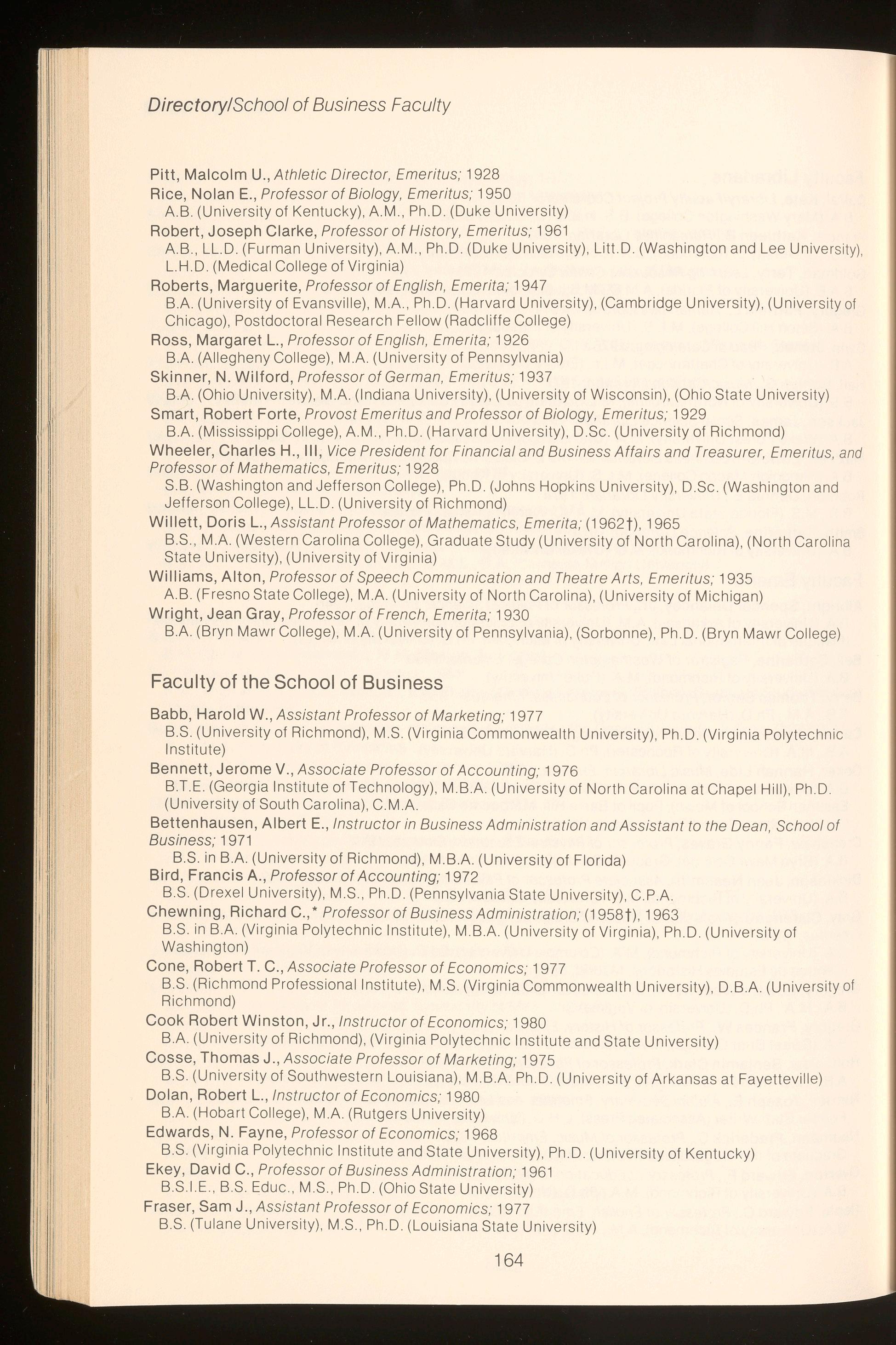
Directory/School of Business Faculty
Pitt, Malcolm U., Athletic Director, Emeritus, 1928
Rice, Nolan E., Professor of Biology, Emeritus, 1950
A.B. (University of Kentucky), AM , Ph.D. (Duke University)
Robert, Joseph Clarke, Professor of History, Emeritus; 1961
A.B, LL.D. (Furman University), A.M., Ph.D. (Duke University), Litt.D. (Washington and Lee Universi ty), L.H.D. (Medical College of Virginia)
Roberts, Marguerite, Professor of English, Emerita; 1947
BA (University of Evansville), MA , Ph.D. (Harvard University), (Cambridge University), (University of Chicago), Postdoctoral Research Fellow (Radcliffe College)
Ross, Margaret L., Professor of English, Emerita; 1926
BA (Allegheny College), MA (University of Pennsylvania)
Skinner, N. Wilford, Professor of German, Emeritus, 1937
BA (Ohio University), MA (Indiana University), (University of Wisconsin), (Ohio State University)
Smart, Robert Forte, Provost Emeritus and Professor of Biology, Emeritus; 1929
BA (Mississippi College), A.M , Ph.D. (Harvard University), D.Sc. (University of Richmond)
Wheeler, Charles H., Ill, Vice President for Financial and Business Affairs and Treasurer, Emeritus, and Professor of Mathematics, Emeritus, 1928
SB. (Washington and Jefferson College), Ph.D. (Johns Hopkins University) , D.Sc. (Washington and Jefferson College), LL.D. (University of Richmond)
Willett, Doris L., Assistant Professor of Mathematics, Emerita; (1962t), 1965
B.S., MA (Western Carolina College), Graduate Study (University of North Carolina), (North Carolina State University), (University of Virginia)
Williams, Alton , Professor of Speech Communication and Theatre Arts, Emeritus, 1935
A.B. (Fresno State College), MA (University of North Carolina), (University of Michigan)
Wright, Jean Gray, Professor of French, Emerita; 1930
BA (Bryn Mawr College), MA (University of Pennsylvania) , (Sorbonne), Ph.D. (Bryn Mawr College)
Faculty of the School of Business
Babb, Harold W., Assistant Professor of Marketing; 1977
S.S. (University of Richmond), M.S. (Virginia Commonwealth University), Ph.D. (Virginia Polytechnic Institute)
Bennett, Jerome V ., Associate Professor of Accounting, 1976
B.TE. (Georgia Institute of Technology) , M.BA (University of North Carolina at Chapel Hill) , Ph.D. (University of South Carolina), C.MA
Bettenhausen, Albert E., Instructor in Business Administration and Assistant to the Dean, School of Business; 1971
B.S. in BA (University of Richmond) , M.BA (University of Florida)
Bird, Francis A., Professor of Accounting; 1972
B.S. (Drexel University), M.S., Ph.D. (Pennsylvania State University) , CPA
Chewning, Richard C., * Professor of Business Administration; (1958t), 1963
B.S. in BA (Virginia Polytechnic Institute) , M.BA (University of Virginia), Ph.D. (University of Washington)
Cone , Robert T. C., Associate Professor of Economics, 1977
B.S. (Richmond Professional Institute), M.S. (Virginia Commonwealth University), D.BA (University of Richmond)
Cook Robert Winston , Jr., Instructor of Economics; 1980
BA (University of Richmond) , (Virginia Polytechnic Institute and State University)
Gosse, Thomas J., Associate Professor of Marketing; 1975
B.S. (University of Southwestern Louisiana) , M.BA Ph.D. (University of Arkansas at Fayetteville)
Dolan , Robert L. , Instructor of Economics, 1980
BA (Hobart College), MA (Rutgers University)
Edwards, N. Fayne, Professor of Economics; 1968
B.S. (Virginia Polytechnic Institute and State University), Ph.D. (University of Kentucky)
Ekey , David C., Professor of Business Administration; 1961
BS I E , B.S. Educ , MS, Ph.D. (Ohio State University)
Fraser, Sam J., Assistant Professor of Economics, 1977
B.S. (Tulane University) , MS, Ph.D. (Louisiana State University)
Directory/ School of Business Faculty
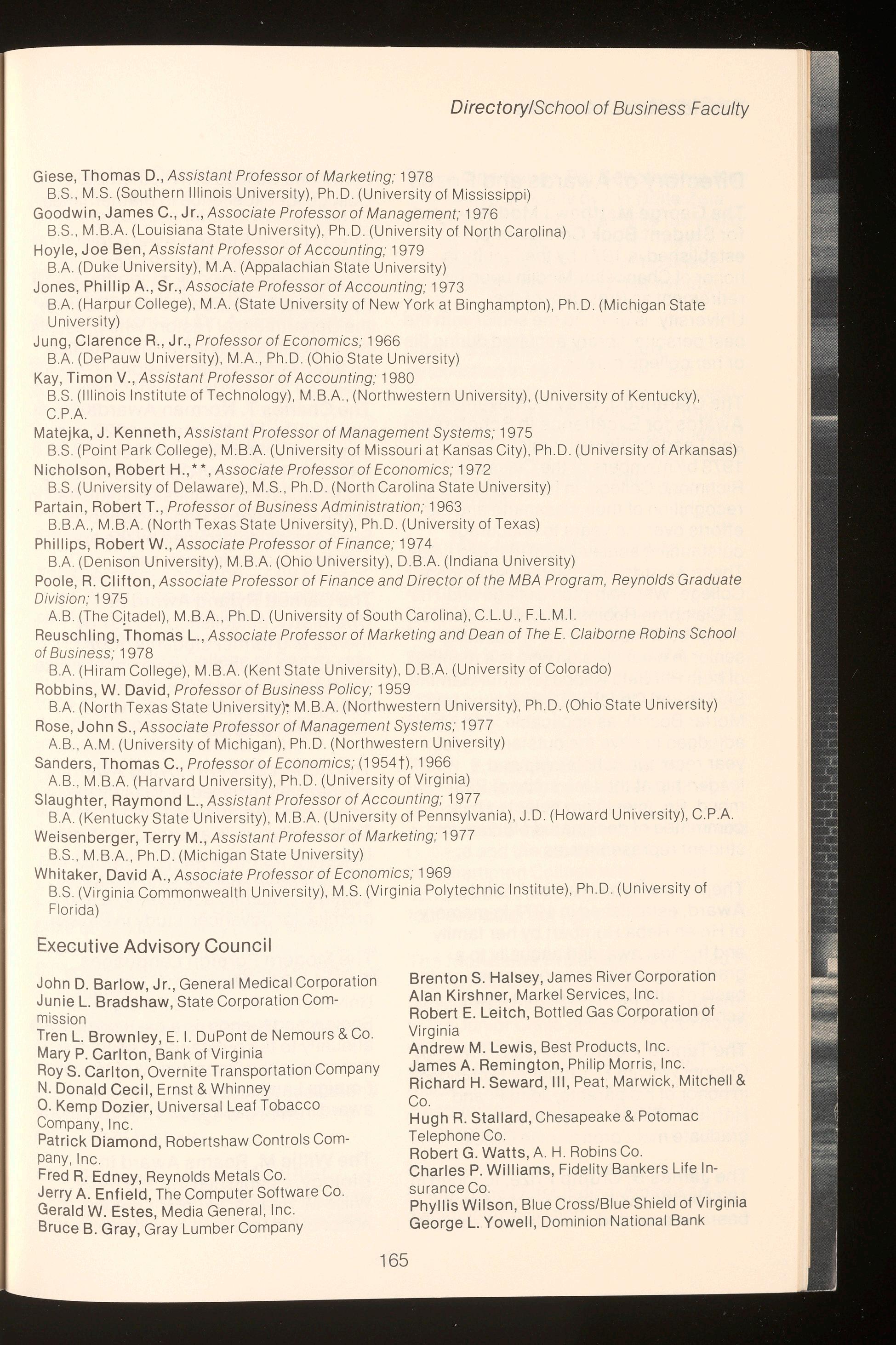
Giese, Thomas D. , Assistant Professor of Marketing ; 1978
S.S., M .S. (Southern I llinois Univer s ity) , Ph.D. (University of Mississippi)
Goodw in, James C. , Jr. , Associate Professor of Management; 1976
BS, M.BA (Louisiana State Un iversity), Ph.D. ( Univ ersity of North Caroli na)
Hoyle, Joe Ben , Assistant Professor of Accounting; 1979
B.A. (Duke University) , M.A. (Appalachian State University)
Jones, Phillip A ., Sr ., Associate Professor of Accounting, 1973
B.A. (Harpur College}, M.A. (State Univer sity of New York at Binghampton) , Ph D . ( Michigan State University)
Jung, Clarence R., Jr. , Professor of Economi cs; 1966
B.A. (DePauw University), MA , Ph.D. (Ohio State University)
Kay, Timon V ., Assistant Professor of Accounting; 1980
S.S. (Illinois Insti tute of Technology) , M.B.A., (Northwestern University) , (University of Kentucky}, C.P.A.
Matejka, J. Kenneth , Assistant Professor of Management Systems, 1975
S.S. (Point Park College), M.BA (Un iversity of Missouri at Kansas City) , Ph.D (University of Arkansas)
Nicholson, Robert H., ••,Associate Professor of Economics, 1972
B.S. (Univers ity o f Delaware), M .S., Ph.D. ( North Caro lina State Univers ity)
Partai n , Robert T. , Professor of Business Administration ; 1963
B B.A. , M .B.A. (North Texas State University) , Ph.D (University of Texas)
Phillips , Rob e rt W ., Associate Profe ssor of Finance; 1974
B.A. (Denison University) , M.BA (Ohio University), D.B.A. (Indiana University)
Poole , R. Clifton, Associate Professor of Finance and Director of the MBA Program, Reynolds Graduate Division ; 1975
A.B (The Cjtadel) , M.BA , Ph.D (University of South Carolina), CL U , F.L.M.I.
Reusch ling, Thomas L., Associate Professor of Marketing and Dean of The E. Claiborne Robins School of Business; 1978
B.A. ( Hiram College), M.B.A. (Kent State University), D.BA (University of Colorado)
Robbins, W David , Professor of Business Policy; 1959
B.A. (No rth Texas State Universi ty): M .BA (Northwestern Univer s ity), Ph.D. (Ohio State University)
Rose, John S. , Associate Professor of Management Systems; 1977
A.B., A.M. (University of Michigan) , Ph D (Northwestern Univers ity)
Sanders, Thomas C. , Professor of Economics; (1954 t) , 1966
A.B., M .BA (Harvard University) , Ph D (University of Virginia)
Slaughter, Raymond L., Assistant Profes sor of Accounting; 1977
BA (Kentucky State University) , M.BA (University of Pennsylvania) , J.D. (Howard University), C.PA
Weisenberge r , Terry M ., Assistant Professor of Marketing; 1977
BS, M.BA, Ph D (Michigan State University)
Whitaker, David A. , Associate Professor of Economics; 1969
S.S. (Virginia Commonwealth Univer s ity) , M.S. (Virginia Polytechnic Institute), Ph D (University of Florida)
Executive Advisory Council
John D Barlow , Jr. , General Medical Corporation
Junie L. Bradshaw, State Corporation Commission
Tren L. Brownley , E I. DuPont de Nemours & Co.
Mary P. Carlton , Bank of Virginia
Roy S Carlton , Overnite Tr ansportation Company
N. Donald Cecil, Ernst & Whinney
0 Kemp Dozier , Universal Leaf Tobacco Company, Inc.
Patrick Diamond , Robertshaw Controls Company, Inc
Fred R. Edney, Reynolds Metals Co.
Jerry A . Enfield, The Computer Software Co.
Gerald W. Estes, Media General, Inc
Bruce B. Gray, Gray Lumber Company
Brenton S Halsey , James River Corporation
Alan Kirshner , Markel Services , Inc.
Robert E Leitch , Bottled Gas Corporation of Virginia
Andrew M. Lewis , Best Products , Inc.
James A Remington, Philip Morris, Inc.
Richard H Seward , Ill , Peat , Marwick, Mitchell & Co.
Hugh R. Stallard, Chesapeake & Potomac Telephone Co.
Robert G Watts , A. H Robins Co.
Charles P Williams , Fidelity Ba nkers Life Insura nce Co.
Phyllis Wilson, Blue Cross/Blue Shield of Virginia
George L. Yowell , Dominion National Bank
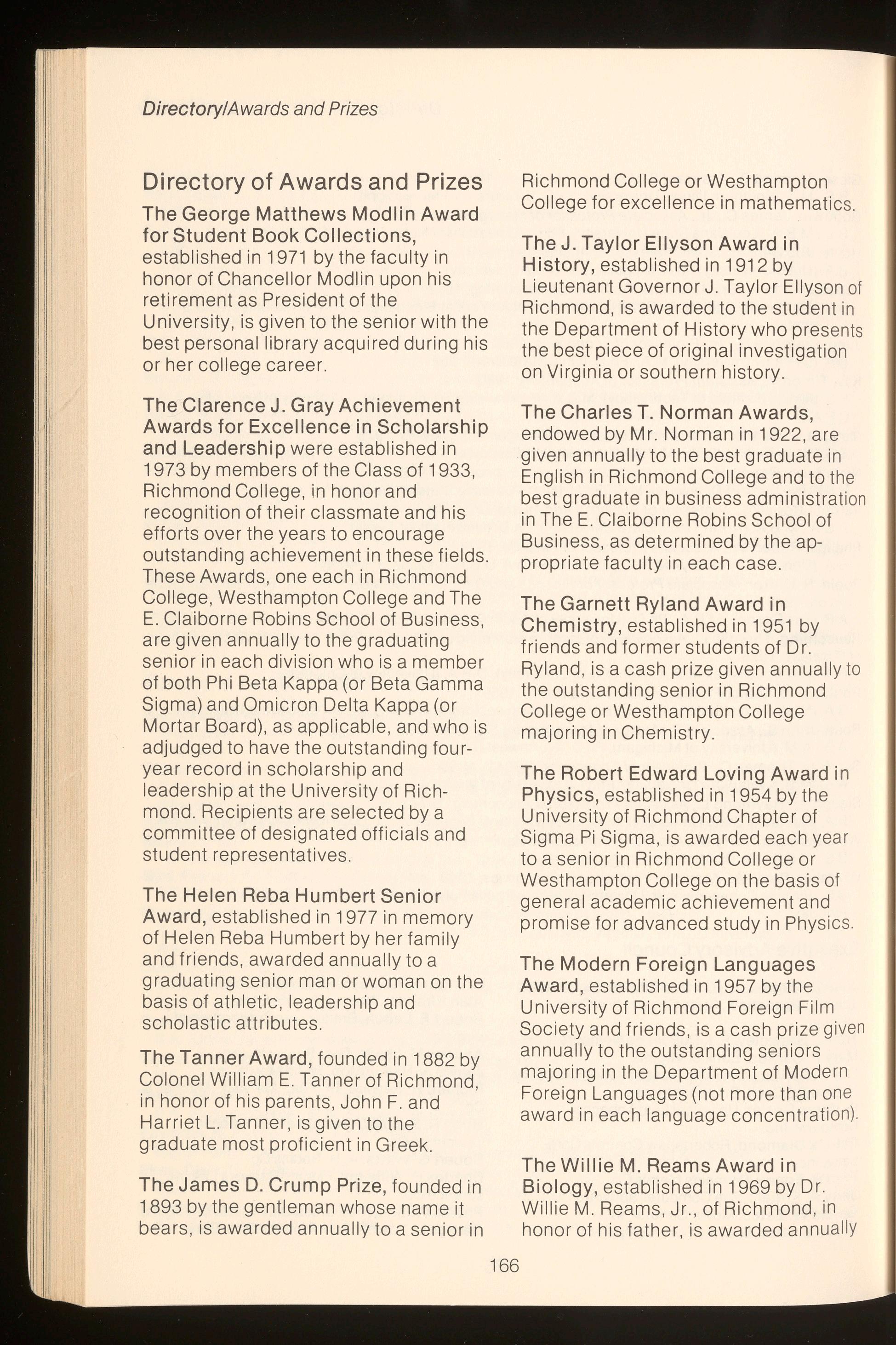
Directory/Awardsand Prizes
Directory of Awards and Prizes
The George Matthews Modlin Award for Student Book Collections, established in 1971 by the faculty in honor of Chancellor Modlin upon his retirement as President of the University, is given to the senior with the best personal library acquired during his or her college career
The Clarence J . Gray Achievement Awards for Excellence in Scholarship and Leadership were established in 1973 by members of the Class of 1933, Richmond College, in honor and recognition of their classmate and his efforts over the years to encourage outstanding achievement in these fields. These Awards, one each in Richmond College , Westhampton College and The E Claiborne Robins School of Business , are given annually to the graduating senior in each division who is a member of both Phi Beta Kappa (or Beta Gamma Sigma) and Omicron Delta Kappa (or Mortar Board) , as applicable , and who is adjudged to have the outstanding fouryear record in scholarship and leadership at the University of Richmond Recipients are selected by a committee of designated officials and student representatives.
The Helen Reba Humbert Senior Award, e stablished in 1977 in memory of Helen Reba Humbert by her family and friends , awarded annually to a graduating senior man or woman on the basis of athletic , leadership and scholastic attributes.
The Tanner Award , founded in 1882 by Colonel William E. Tanner of Richmond , in honor of his parents , John F. and Harriet L. Tanner , is given to the graduate most proficient in Greek.
The James D. Crump Prize, founded in 1893 by the gentleman whose name it bears , is awarded annually to a senior in
Richmond College or Westhampton College for excellence in mathemati cs.
The J. Taylor Ellyson Award in History, established in 1912 by Lieutenant Governor J Taylor Ellyson of Richmond , is awarded to the student in the Department of History who pres ents the best piece of original investigatio n on Virginia or southern history .
The Charles T . Norman Awards, endowed by Mr . Norman in 1922, a re given annually to the best graduate in English in Richmond College and to th e best graduate in business administrat ion in The E. Claiborne Robins School of Business , as determined by the appropriate faculty in each case.
The Garnett Ryland Award in Chemistry, established in 1951 by friends and former students of Dr. Ryland , is a cash prize given annuall y to the outstanding senior in Richmond College or Westhampton College majoring in Chemistry
The Robert Edward Loving Award in Physics, established in 1954 by th e University of Richmond Chapter of Sigma Pi Sigma, is awarded each y ear to a senior in Richmond College or Westhampton College on the basis of general academic achievement and promi s e for advanced study in Physics
The Modern Foreign Languages Award, established in 1957 by the University of Richmond Foreign Film Society and friends , is a cash prize g iven annually to the outstanding seniors majoring in the Department of Mode rn Foreign Languages (not more than one award in each language concentrati on)
The Willie M . Reams Award in Biology, established in 1969 by Dr Willie M. Reams , Jr ., of Richmond , in honor of his father, is awarded annu ally
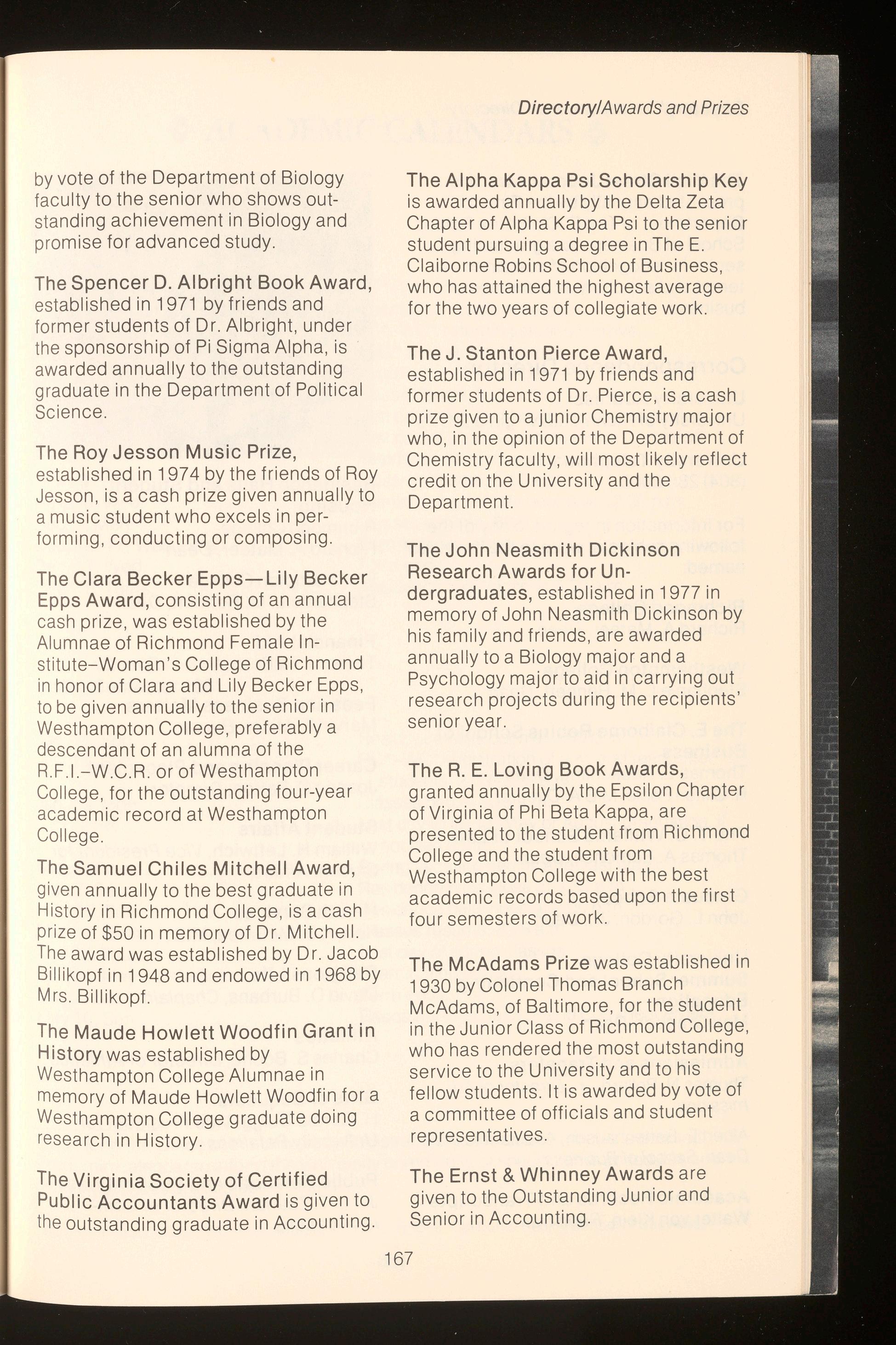
by vote of the Department of Biology faculty to the senior who shows outstanding achievement in Biology and promise for advanced study.
The Spencer D. Albright Book Award, established in 1971 by friends and former students of Dr. Albright, under the sponsorship of Pi Sigma Alpha, is awarded annually to the outstanding graduate in the Department of Political Science.
The Roy Jessen Music Prize, establ ished in 1974 by the friends of Roy Jesson, is a cash prize given annually to a music student who excels in performing, conducting or composing.
The Clara Becker Epps-Lily Becker Epps Award, consisting of an annual cash prize, was established by the Alumnae of Richmond Female Institute-Woman's College of Richmond in honor of Clara and Lily Becker Epps, to be given annually to the senior in Westhampton College, preferably a descendant of an alumna of the R.F.1.-W.C.R. or of Westhampton College, for the outstanding four-year academic record at Westhampton College.
The Samuel Chiles Mitchell Award, given annually to the best graduate in History in Richmond College, is a cash prize of $50 in memory of Dr. Mitchell. The award was established by Dr. Jacob Billikopf in 1948 and endowed in 1968 by Mrs. Billikopf.
The Maude Howlett Woodfin Grant in History was established by Westhampton College Alumnae in memory of Maude Howlett Woodfin for a Westhampton College graduate doing research in History.
The Virginia Society of Certified Public Accountants Award is given to the outstanding graduate in Accounting.
Directory/Awardsand Prizes
The Alpha Kappa Psi Scholarship Key is awarded annually by the Delta Zeta Chapter of Alpha Kappa Psi to the senior student pursuing a degree in The E. Claiborne Robins School of Business, who has attained the highest average for the two years of collegiate work.
The J. Stanton Pierce Award, established in 1971 by friends and former students of Dr. Pierce, is a cash prize given to a junior Chemistry major who, in the opinion of the Department of Chemistry faculty, will most likely reflect credit on the University and the Department.
The John Neasmith Dickinson Research Awards for Undergraduates, established in 1977 in memory of John Neasmith Dickinson by his family and friends, are awarded annually to a Biology major and a Psychology major to aid in carrying out research projects during the recipients' senior year.
The R. E. Loving Book Awards, granted annually by the Epsilon Chapter of Virginia of Phi Beta Kappa, are presented to the student from Richmond College and the student from Westhampton College with the best academic records based upon the first four semesters of work.
The McAdams Prize was established in 1930 by Colonel Thomas Branch McAdams, of Baltimore, for the student in the Junior Class of Richmond College, who has rendered the most outstanding service to the University and to his fellow students. It is awarded by vote of a committee of officials and student representatives.
The Ernst & Whinney Awards are given to the Outstanding Junior and Senior in Accounting.
167
Directory/Correspondence Directory
The Wall Street Journal Award is presented annually by the Finance Department of The E. Claiborne Robins School of Business to a graduating senior in recognition of sustained interest and scholarly achievement in business.
Correspondence Directory
University Address: University of Richmond , Virginia 23173
University Telephone: (804) 285-6000
For information in regard to any of the following subjects , write to the individual named :
Richmond College
Richard A. Mateer , Dean
Westhampton College
Stephanie L. M. Bennett, Dean
The E. Claiborne Robins School of Business
Thomas L. Reuschling , Dean
R Clifton Poole, M.B.A. Di rector
The T. C. Williams School of Law
Thomas A. Edmonds, Dean
Graduate School
John L. Gordon, Jr., Dean
University College Summer School and Continuing Education
Max Graeber , Dean
Admissions and Transfers
Thomas N Pollard, Jr ., Director of Admi ssions
Albert E. Bettenhausen, As sistant to the Dean , School of Business
Academic Records and Transcripts
Walter van Klein, Registrar
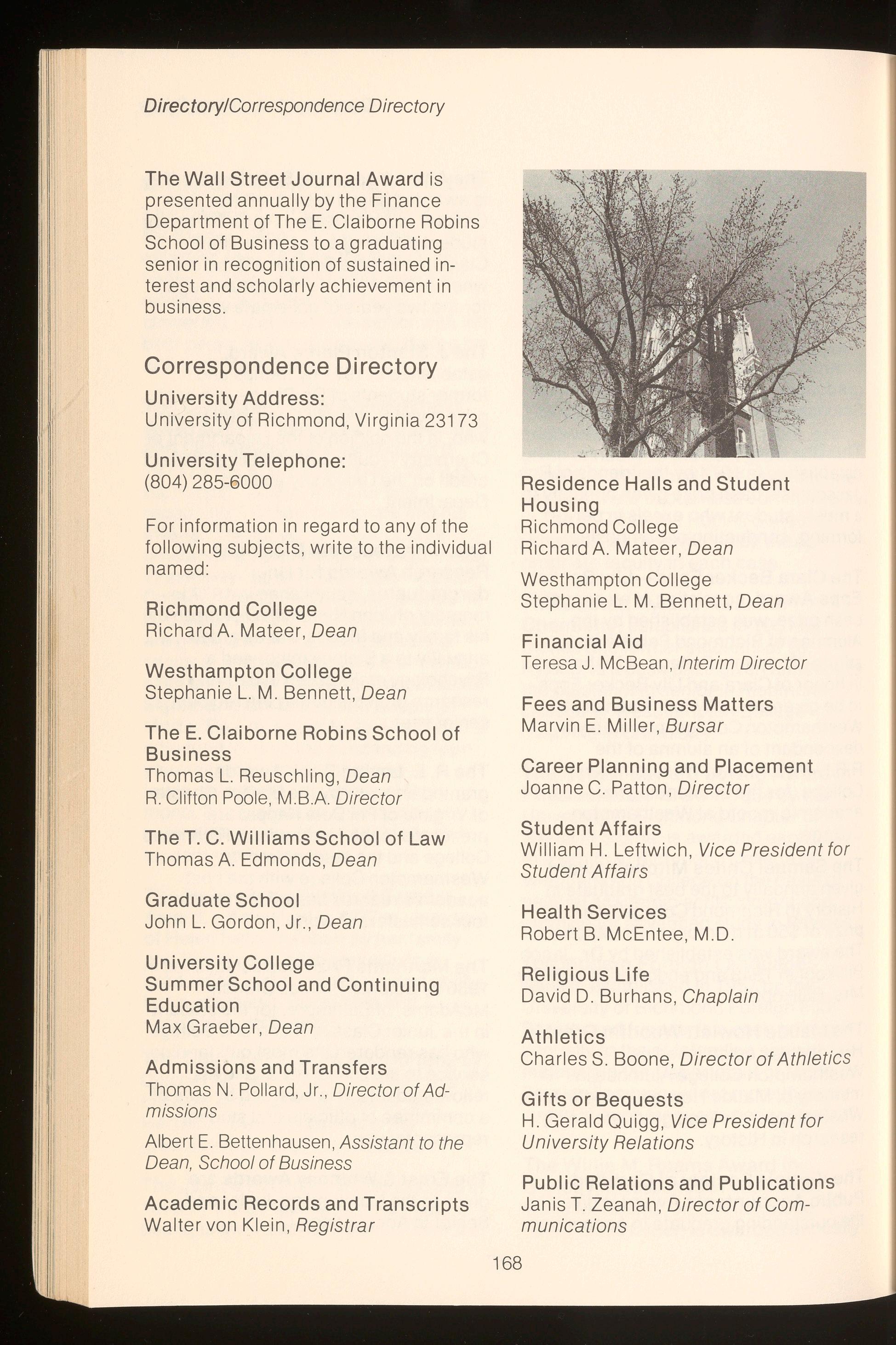
Residence Halls and Student Housing
Richmond College
Richard A Mateer , Dean
Westhampton College
Stephanie L M. Bennett , Dean
Financial Aid
Teresa J McBean , Interim Director
Fees and Business Matters
Marvin E Miller, Bursar
Career Planning and Placement
Joanne C Patton , Director
Student Affairs
William H Leftwich , Vice President fo r Student Affairs
Health Services
Robert B. McEntee, M.D.
Religious Life
David D Burhans , Chaplain
Athletics
Charles S Boone, Director of Athletic s
Gifts or Bequests
H Gerald Quigg , Vice President for University Relations
Public Relations and Publications
Janis T Zeanah, Director of Communications
ACADEMIC
Academic Calendar 1980-81 1
Fall Semester 1980
Aug.23,Sat.
RC*-WC* New students arrive. Orientation program begins . Aug. 26, Tues
Aug. 27, Wed
Aug. 28, Thurs.
Oct. 3, Fri. . . .
Oct. 24, Fri
Oct. 29, Wed ...
Nov. 26 , Wed .........
Dec. 1, Mon
Dec.10-17 , Wed .-Wed.
Dec. 17 , Wed ...
Dec. 18, Thurs.
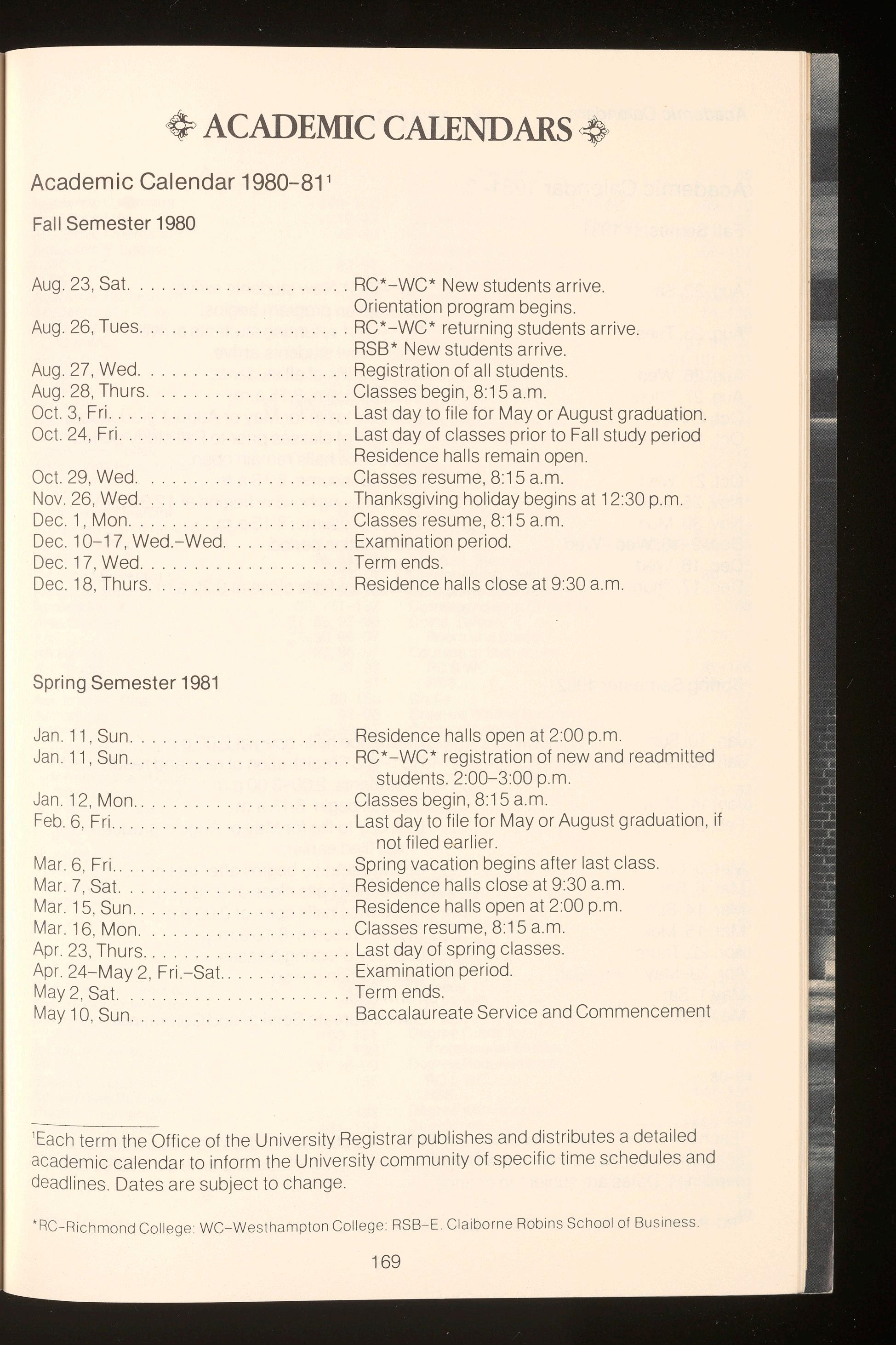
..
RC*-WC* returning students arrive.
RSB* New students arrive. Registration of all students.
Classes begin, 8:15 a.m.
. ..
Last day to file for May or August graduation.
Last day of classes prior to Fall study period
Residence halls remain open.
Classes resume, 8:15 a.m
Thanksgiving holiday begins at 12:30 p.m.
Classes resume, 8:15 a.m.
Examination period.
Term ends .
. Residence halls close at 9:30 a.m.
Spring Semester 1981
Jan. 11 , Sun
Jan. 11, Sun.
Jan. 12 , Mon
Feb. 6, Fri
Mar. 6, Fri
Mar. 7, Sat.
Mar. 15 , Sun
Mar. 16, Mon.
Apr 23 , Thurs
Apr 24-May 2, Fri.-Sat..
May 2, Sat.
May 10, Sun.
. .
Residence halls open at 2 00 p.m.
RC*-WC* registration of new and readmitted students. 2 00-3 00 p.m.
Classes begin, 815 a.m
Last day to file for May or August graduation, if not filed earlier.
Spring vacation begins after last class.
Residence halls close at 9 30 a.m.
Residence halls open at 2:00 p.m.
Classes resume, 8:15 a.m.
Last day of spring classes
Examination period.
Term ends
Baccalaureate Service and Commencement
' Each term the Office of the University Registrar publishes and distributes a detailed academic calendar to inform the University community of specific time schedules and deadlines. Dates are subject to change.
'RC - Richmond College : WC-W es thampton College RSB- E. Claiborne Robin s School of Bus ine ss
Academic Calendars
Academic Calendar 1981-82 1
Fall Semester 1981
Aug. 22 , Sat.
Aug. 25, Tues.

RC*-WC* New students arrive. Orientation program begins . . .
RC*-WC* returning students arrive.
RSB* New students arrive.
Aug. 26 , Wed .... .. Registration of all students.
Aug. 27, Thurs. . Classes begin , 8:15 a.m.
Oct. 2, Fri. . . Last day to file for May or August graduation
Oct. 16, Fri. . . Last day of classes prior to Fall study period Residence halls remain open.
Oct. 21, Wed. . Classes resume, 8:15 a.m.
Nov. 25, Wed. Thanksgiving holiday begins at 12:30 p m.
Nov. 30 , Mon .......... ... Classes resume, 8:15 a.m.
Dec. 9-16, Wed.-Wed. . . . Examination period.
Dec. 16, Wed. . . Term ends.
Dec. 17, Thurs. . . . . Residence halls close at 9:30 a.m.
Spring Semester 1982
Jan. 10, Sun. . . Residence halis open at 2:00 p.m.
Jan. 10, Sun. . . . . . . RC*-WC* registration of new and readmitted students 2:00-3:00 p m.
Jan. 11 , Mon.. . . . . Classes begin, 8:15 a.m.
Feb. 5 , Fri.. . .... Last day to file for May or August graduation , if not filed earlier.
Mar. 5 , Fri.. . . . . .. .... ... Spring vacation begins after last class.
Mar. 6 , Sat. . . . Residence halls close at 9:30 a.m.
Mar. 14 , Sun.. . . . . .. Residence halls open at 2:00 p.m.
Mar. 15 , Mon. . .... ... Classes resume , 8:15 a.m.
Apr. 22, Thurs. . Last day of spring classes.
Apr. 23-May 1, Fri.-Sat. .. .. . . . . . . .. Examination period.
May 1, Sat. .. Term ends.
May 9, Sun.. . . Baccalaureate Service and Commencement
1 Each term the Office of the University Registrar publishes and distributes a detailed academic calendar to inform the University community of specific time schedules and deadlines. Dates are subject to change
* RC- Richm ond Col lege WC- W est ha mpton Co l leg e RSB- E. Claiborn e Robin s School of Bus ine ss
Academic Calendars 169-170
Academic Life 19-43
Academic Orientation 85-86
Academic Probation : RC & WC. . 90-91 RSB. 151
Academic Procedures 87-89
Academic Standing 89-91
Academic Warning: RC& WC.
Academics
RC&WC
RSB.. Accounting . Accreditation Administrative Officers.
Admiss ions Policy
Admiss ions Requirem e nts:
RC& WC.
RSB. . 80-91 . 147-154 42 , 149, 151-152 66,147 . 155 . ....... 61, 69 . ...... 68, 69 146
Admissions Deadline
Advanced Credit for Veterans
Advisors
Alcoholic Beve\ages.
American Studies
Applied Music Area Studies .

Campus, De sc ription of ......... .... 7-17, 65
Campus Visit ......................... 62-63
Calendars, Academic (1980-82) 169-170
Career Planning and Placement ............. 55 Ceramics .............................. 97 Certification of Teachers ............. 106-107
Change of Course or Section 74 Charges, Special ........................ 74 Chem istry 31, 99-101 Choir, Univer si t y. 51, 133 Class Rating of Students ............. 89 Classical Civilization ........... 27, 93-94 Classical Studies ............. 31-32, 101-103 Classics in English .. 102-103 Classwork, Limits of: RC& WC. 89 Clubs and Organizations Co llege-Level Examination Program 50-54 (CLEP). Colloquium for Freshmen. Communications Groups 71-72 ... 20, 103-105 ... 51 . 53-54
Community Service ....... Concentration, Fields of:
RC&WC
RSB
Art.
Advanced Placement 60, 69 70-71 .. 62 ... 26, 54-55 54, 72 27, 92-93 .... 38, 131-132 ... 27, 85, 92-96 . ... 27-30, 96-97
Art History
Art , Studio. . . .. 27,96-97
Art Groups
Assemblies, Requir ed. Astronomy .
Athletics.
Individual physical conditioning .. Intercollegiate Intramural and Club Physical Education Attendance, Class: RC&WC.
RSB.
Auditing Courses: RC& WC. Automobiles . Awards and Prizes
BA , Requirements for B M ., Requirements for B S , Requirements for B S. in Business Administration (RSB)
Bands, University .. Biology ....... .
Board of Trustees
Botany (see Biology)
Brass Instruments
Business Courses .....
Business, School of Graduate Division
Camp Th eater. 27,97 51 . . . 80,150 97-98 . .. 52-53, 67 . 53 . 52, 117 53 .. 53 . 91
Conduct, Standards of Convocations, Required. Coordinate Education. Correspondence Directory. Costs, Tuition , Room and Board Courses of Instruction: RC&WC . RSB. Crafts . Creative Writing Program. Credit by Local Examination. Crenshaw Swimming Pool 19 , 27-42 19 ,42-43, 149-150 72 80,150 . ...... 12 168 57, 73-77 Cultural and Recreational Events ... Curriculum, Division of: 92-146 151-154 97 85 .....
RC&WC
RSB.
Dance. Dean ' s Li st . Debating .. Deferred Payments Deficiencie s: RC&WC
RSB Degrees
RC&WC
RSB ..
Degree Credit for Profes sional Studies
Degree Requirem ents:
RC&WC
RSB ... Degree w ith Honors Directories
Distributional Requirements:
RC&WC
RSB Drug s. DuP ont Fund Dutch Chaos Week. 81-82 147-149 146 ...... 89 ... 145 ............ 75 . 90 151 . 5-11, 65 80-84 .. 147-151 . 84-85 80-84 . 147-151 90 . 155-168 81-82 148-149 . 54-72 17 49
Early Adm ission _ Earl y Decision Plan. Econom ics: RC&WC. RSB Education Employment, Student. English Ensembles, Music Examinations: RC&WC.
Facul ty Advisors. Faculty, Description of. Facult y, Listing of: Active. Eme r iti RSB. Fees.
EF .. 62, 70 60, 70 . 32, 105 42 , 152 . 32-33, 106-110 58-59, 79 .... 33-3 4, 111-113 .. 132 .. 89 .. 26 . 45-47, 66 156-162 162-163 . .. 163- 165 . .. 57
Film (see American Studies , Art, English, Religion) . 77-79
Finance ..... 42-43, 150 , 152-153
Financial Aid, Student ......... 57-59, 68, 77-79 Foreign Languages, Modern . . __37, 124-129 Fraternities , Social. 52, 67 French __ 37, 125-126
GGeneral Informa t ion : (see Profil e of UR).
General Inform ation: RSB Geography_ German Gottwald Science Center Grade Points. Grading Policies RC&WC Graduate Di vision of Business. Graduate School. Grants. Graphic Arts Greek Greek Week.
H
Health and Physical Education. History 65-68 147 114 .... 37, 126-127 14 80 .... 87-88 10 11 57-59, 78-79 ... 97 31,101,102 50
Honor Societies and Organizations _ Honor System, Richmond Co lleg e Honors , Degree . 34, 114-117 34, 117-120 50-51 69 90 89-90
Honor s, Intermediate. Honors Program RC&WC. 20,85
Independent Study

20,85, 120-121
Infirmary .... .. ............ ...... 55
Interdisciplinary Studies ... 20, 35, 85 , 120-121
Int ermediate Honors ....... 89 -90 Italian. .. 37 , 127
Jobs
57, 79 Journalism .... 35 - 36, 121
Late Registration Fee
Latin _ Law , The T C. Williams School of.
Learning Resources Center, Billikopf.
Librarians
Librarie s Limit s of Work: RC&WC.
Loans
Lutz Puppet Collect ion .
Music History , Lit erature and Appreciation.
Music Library
Music Th eory _
Mu sical Organizations
Orchestra, Universi t y.
Organ
Organizations_
Painting
Pass -Fa il Option
Paym ent, Terms of.
Philo sophy
Phy sical Education, Health and _
Phy sics.
Piano
Pitt Ba seball Field
Plac ement, Teach er.
Political Science
Practical Experience, off-campus
Privacy, Right to. Prizes , Awards and Probation Academic Prof essional Studies.
Degr ee Cred it f or
Proficiency Requirements:
RC & WC 81-82
Profile of UR . 65-68
Programs, Special 20-25, 66, 84-87 Psychology 40-41 , 139-140
Psychological Services, Center for 55
Purpose of the University. 7 R
Recreational Organizations . 52
Refund Policy . ..... 75
Registration (see Academic Calendars)
Religion. . 41, 53, 140-142
Religious Activities 52
Religious Organizations ................ 52, 67
Research Program , Und erg raduate .......... 21
Residence Hall s ................... 49, 76- 77
Richmond, C i ty of ........ 17
Richmond College 8-9
Right to Pr ivacy 72
Robins Gallery of Design from Nature , Lora Robins Center.
Room Reservations
Russian Russian Area Studies

Scholarships
School of Business s . .. 13 . ......... 16 76-77 ........ 37, 127-128 ....... 27, 94 57-59, 78
Accreditation... 14 7
Admission Requirement s . 14 7
Areas of Concentration ............ 149-150
Courses of In st ruction .. 151-154
Degree Requirement s 150-151 Description of. 9-10, 42-43
Faculty........... 163-165
General Information 147-151
Schools, Degree s, and Programs . .. 5
Scholars Pro gram. . . . . . . . . . 25
Science Libr ary 13
Sculpture . . 97
Semester Reports 89
Socio logy....... 41-42, 142-144
Span~h. . 37, 128-129
Special Charges. . . 74-75
Special Examinations. 89
Special Programs. . 20-25. 84-87
Speech Communication and Theatre Arts . Standards of Conduct
String Instruments ....
Student Employment
Student Financial Aid
Student Government
Student Life Athletics. ·
Clubs & Org~~izati~ns
Community Service
Government
Honor Societies
Student Services
Student Union. Univ er~ity
Studio Art Study Abroa d •......... 42, 144-146 .. 72 . ..... 133 57-59, 79 . 57-59, 77- 79 ...... 54, 66-67 49-55 ... 52-53 50-54 . 53-54 . ........ 54 . ... 50-51 54-55 12-13 . 27, 97 . 24-25, 86
Teacher Education , Admission to. 107-108
Teacher Placement Service 109
Teacher Preparation ................ 106-107
Teache_rs, Certification of. 106-107 T elev1s1on(see American Studies , English , Re l ig ion)
Terms of Payment .................... 74-77 Th eatre Art s.
Speech Communication and. Transfer Students Travel Experiences Tru stees , Board of Tucker-Boat w right Festival u 42 , 144-146 70 24-25, 86 155 ... 50
Undergraduate Research Program 21-22
Univer si ty Bands . 51, 132 Univer si ty Choir . .................. 51, 132 University College 11 University Commons . 12-13 Univ ersi ty Debate Team 145 Uni versity Orchestra 132 Univ ersi ty of Richmond : Hi sto ry. Profile Purpose Urban Studies.
Veteran, Advanced Credit for Virginia Baptist Historical Society Voice w
Warning, Academic: RC& WC. . . 7-8 65-68 7 .. 27, 95 . 70-71 66 133 .... 90 Westhampton College Withdrawal from College Women's Lifestyles Conference Women's Re sidence Hall s. Women 's Studies. 9 75 50 77 . .. 27, 95-96 .... 133 ............. 57-59,79
Woodwind Instruments. Work-Study Program Work Taken Elsewhere. ............ 86-87 z
Zoology (see Biology)
INDEXTOBUILDINGS

Athletic Field-20
The first metric track built in the United States, an all-weather Chevron 440, surrounds the field and is one of the finest in the country
Boatwright Memorial Library-12
A memorial to Frederic W Boatwright, the third president of the university, 1895-1946, and chancellor, 1946-51 , this library was built in 1955 with funds given by the Baptists of Virginia. The addition, completed in 1976, provides space for over 500,000 volumes and includes an extensive collection of rare books. Multimedia facilities in the Jacob Billikopf Learning Resources Center include a 100-seat auditorium, graphics and photography studios, and individual study carrels wired for film and cassette tape modules. On the lower level, the Lora Robins Gallery of Design from Nature displays shells, fossils, gems and minerals.
Booker Fountain-SO
Hannah Lide Coker, a 1923 graduate of Westhampton College, assistant professor of music, 1945-71 , and music librarian, 1955 - 71, donated this fountain in 1973 to honor Lesli e Sessoms Booker, a 1922 graduate of Westhampton College, who served as executive secretary of the Westhampton College Alumnae Association, 1943-68.
Brunet Memorial Hall-18
One of the original buildings on the campus, with additions completed in 1943 and 1964, this structure houses Unive rsity dining facilities It is named for a University benefactor, Mrs. Sarah A. Brunet of Norfolk.
Bus Terminal-1
Camp Memorial Theater-46
Located in the Modlin Fine Arts Center, this 700-seat theatre is named for James L. Camp, a trustee of the University, 1900-26, and given in his memory by his six children.
Cannon Memorial Chapel-38
Constructed in 1929 , the chapel was donated by the widow of Henry Mansfield Cannon, a Richmond tobacconist. It contains a Baroque tracker-action pipe organ built by Rudolf von Beckerath in 1961, the second to be installed in the United States.
Charles H. Ryland Hall-8
Constructed in 1914 as a companion to Robert Ryland Hall, this building housed the University library from 1914 until 1955, when the Boatwright Memorial Library was constructed. It is named for Charles Hill Ryland, a nephew of Robert Ryland and a trustee of Richmond College, 1873-1914, treasurer of Richmond College, 1874-1911,and librarian of Richmond College, 1883-1914.
Class of 1915 Gateway-3
Classrooms and Offices Westhampton-52
Court Dining Hall Westhampton-54
Crenshaw Swimming Pool-47
Built in 1963, this facility for Westhampton College students honors Fanny G. Crenshaw, the first director of physical education at Westhampton College, 1914-55.
Deanery-44
Dennis Auditorium-6
This 450-seat auditorium, located in The E. Claiborne Robins School
Freeman Hall-31
A men's residence hall built in 1965, it is named for Douglas Southall Freeman, class of 1904 and former editor of the Richmond News Leader , who served as a trustee of the University , 1925-50, and as rector, 1934-50.
Gottwald Science Center-43
Completed in 1977, this $8 million complex houses the biology, chemistry, and physic departments, along with components of the Virginia Institute for Scientific Research (VISR) The facility includes a science library, two small auditoriums, 27 teaching laboratories with adjoining preparation and instrument rooms, 26 student-faculty research laboratories, a radionuclide lab, greenhouse, animal facilities, computer terminal room, seminar rooms, student-faculty lounges and faculty and graduate student offices. In 1979 the center was named in honor of Univer sity trustee emeritus Floyd D. Gottwald, vice chairman of the executive committee, Ethyl Corp.
Gray Court-56
Completed in 197 4, this women's residence hall was given in memory of Agnes Taylor Gray, a 1923 graduate of Westhampton College, by her husband, Virginia Senator Garland Gray, a 1921 graduate of Richmond College and a trustee of the University from 1949 to 1977.
of Business, is named for Overton lnfirmary-27
D. Dennis, a member of the Jenkins Greek Theater-57 Richmond College class of 1910 This amphitheater was built in and a University trustee, 1929 with funds given by Luther 1937-71 H. Jenkins, a prominent RichDennis Memorial Hall-30 mond businessman and Baptist
Completed in 1964, this men's layman
residence hall is the gift of Jeter Memorial Hall-29 Overton D. Dennis. a member of the class of 1910, in memory of his brother, Eugene T. Dennis.
Footbridge to Island and Gazebo-59
Fraternity Lodges-22-23
There are 11 national Greekletter social fraternities, which maintain nonresident lodges.
This residence hall for men is one of the original buildings constructed in 1914. It is a memorial to Jeremiah Bell Jeter , celebrated Baptist minister and a charter trustee of Richmond College, 1840-80.
Keller Hall-49
Constructed in 1937, the building
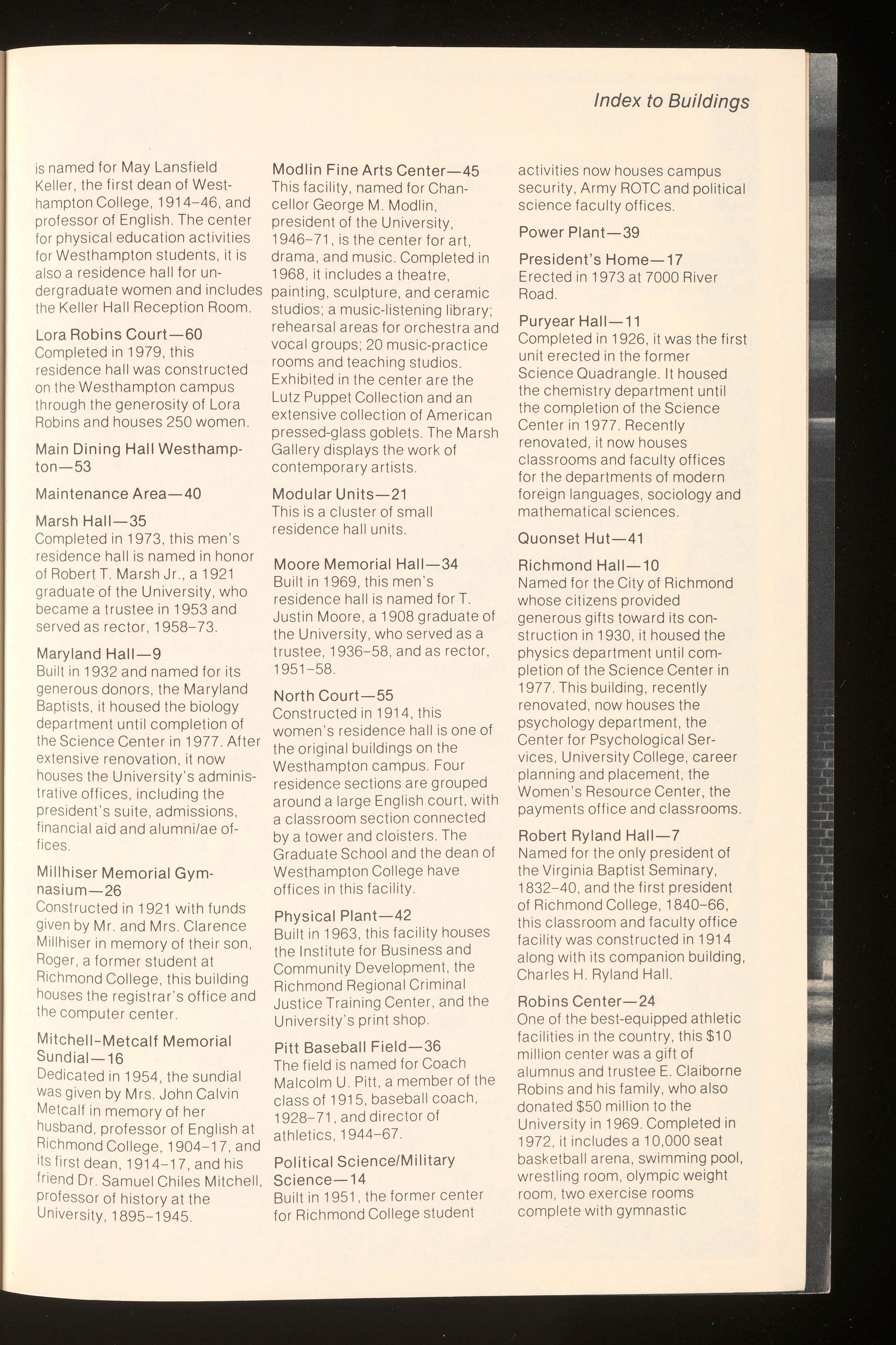
is named for May Lansfield Keller, the first dean of Westhampton College, 1914-46, and professor of English. T he center for physical educat ion activi t ies for Westhampton students, it is also a residence hall for undergraduate women and includes the Keller Hall Reception Room.
Lora Ro bins Court - 60
Completed in 1979, th is residence hall was constructed on the Westhampton campus through the generosity of Lora Robins and houses 250 women.
Main Dining Hall W e sthampton-53
Main t e n a nce Ar e a-40
Mars h Hall -3 5
Completed in 1973, this men's residence hall is named in honor of Robert T. Marsh Jr., a 1921 graduate of the University, who became a trustee in 1953 and served as rector, 1958-73.
Maryla n d Hall - 9
Built in 1932 and named for its generous dono rs, the Mary land Baptists, it housed t he b io logy department until completion of the Science Center in 1977. After extensive renovation, it now houses the University's administrative offices, including the president's suite, admissions, financial aid and alumni/ae offices.
Millhiser M emo rial Gymnasium-26
Constructed in 1921 with funds given by Mr. and Mrs. Clarence Millhiser in memory of t hei r so n , Roger, a former student at Richmond College, this building houses the registrar's office and the computer center.
Mitchell- M e t ca lf M e m o rial Sundia l - 16
Dedicated in 1954, the sundial was given by Mrs. John Calvin Metcalf in memory of her husband, professor of English at Richmond College, 1904-17, and 1tsfirstdean 1914-17 and his friend Dr. sa'mue l Chil~s Mitchell, professor of h istory at t he University, 1895- 1945.
Mo dlin Fine Art s Ce nter-45
This facility, named for Chancello r George M. Modlin, preside n t of t he Uni versity, 1946-71, is the cente r fo r a rt drama, and mus ic. Completed in 1968, it includes a theatre, painting, sculpture, and ceramic studios: a music-listening library: rehearsal areas for orchestra and vocal groups: 20 music-practice rooms and teaching studios. Exhibited in the center are the Lutz Puppet Collection and an extensive collection of American pressed-glass goblets. The Marsh Gal lery displays t he work of con t emporary ar ti s t s.
M o dular Units-21
This is a cluster of small residence hall units.
M oo re Memori a l Hall-34
Built in 1969, this men's residence hall is named for T Justin Moore, a 1908 graduate of the University, who served as a trustee, 1936-58, and as rector, 1951-58.
North C o urt-55
Constructed in 1914, this women's residence hal l is one of the original buildings on the Westhampton campus. Four residence sections are grouped around a large English court, with a classroom section connected by a tower and cloisters The Graduate School and the dean of Westhampton College have offices in this facility.
Phy s i ca l Plant -42
Bu ilt in 1963, this facil ity houses the Insti t ute for Business a nd Community Development, the Richmond Regional Criminal Justice Training Center, and the University's print shop.
Pi tt Base b a ll Fi e l d - 36
The field is named for Coach Malcolm U. Pitt, a member of the class of 1915, baseball coach, 1928-71, and director of athletics, 1944-67.
Po liti ca l Sc ie n ce/ Militar y Sc ie n ce -14
Built in 1951, the former cente r for Richmond College student
Index to Buildings
activities now houses cam p us security, Army ROTC and po litical science f acu lty o f fices.
Power Plant-39
President's Hom e -17
Erected in 1973 at 7000 River Road.
Pury e ar Hall-11
Completed in 1926, it was t he firs t unit erec t ed in the fo rme r Science Quadrangle. It ho used the chemistry department until the completion of the Science Center in 1977. Recently renovated, it now houses classroo m s and facu lty o ffic es for the d epa rt m en t s of mo d e rn foreign languages, sociology an d mathematical sciences.
Quonset Hut-41
Ri c hmond Hall-10
Named fo r the City of Ric hmond whose citizens provided generous gifts toward its construction in 1930, it house d t he physics department until completion of the Science Ce nt er in 1977. T his b u ild ing, rece nt ly renova t ed, now houses th e psychology departme n t, t he Center for Psycho logical Services, University College, career planning and placement, the Women's Resource Center, the payments office and classrooms.
Ro b e rt Ry la nd Hall-7
Named for the only president of the Virginia Baptist Seminary, 1832-40, and the first president of Richmond College, 1840- 66, th is classroom and faculty offi ce faci lity was constr ucted in 19 14 along with its companion b uild ing, Charles H. Ryland Hall.
Ro bin s C e n ter - 24
One of the best-equipped athletic facilities in the country, this $ 1O million center was a gift of alumnus and trustee E. Claiborne Robins and his family, who also donated $50 million to the University in 1969. Completed in 1972. it includes a 10,000 seat basketball arena, swimmi ng pool , wrestling room, olympic w ei g ht room, two exercise rooms complete with gymnastic
Index to Buildings
equipment, seven handball courts, two squash courts, two auxiliary gymnasiums, steam and suana baths, dressing rooms with separate locker area for each varsity sport, classrooms, physiology laboratory, offices, conference rooms, and a 130seat theatre.
Robins Center Swimming Pool-25
This facility includes a six-lane swimming pool with automatic timing system and seating for 500 spectators.
Robins Memorial Hall-28
Built in 1959 , this men's resident hall is the gift of E. Claiborne Robins, class of 1931 , in memory of his mother , Martha Elizabeth Robins. The dean of Richmond College has offices in this building.
School of Business-5
Housing "one of the finest undergraduate business schools in the country," this building was made possible by a substantial bequest of L. U Noland, a Newport News businesman, and was completed in 1961. In 1978 the graduate program in business was named in honor of Richard S.
Reynolds In 1979 the business school was named The E. Claiborne Robins School of Business in honor of the University 's distinguished trustee and benefactor.
School of Law-4
Established in 1870 and named for Thomas C. Williams Sr., trustee of Richmond College from 1881 to 1889, the present building was constructed in 1954 and enlarged in 1972 and 1980.
Shepherd Memorial Garden-48
This garden was given by Sally Gray Shepherd Perkins in 1937 in memory of her mother, Willie Gray Shepherd
South Court-51
This residence hall for women was constructed in 1948.
Tennis Courts-19
Thomas Memorial Hall-32
One of the original buildings, this residence hall for men is named for James Thomas Jr, a Richmond tobacconist and eminent Baptist layman, who was a charter trustee of Richmond College, 1804-82.
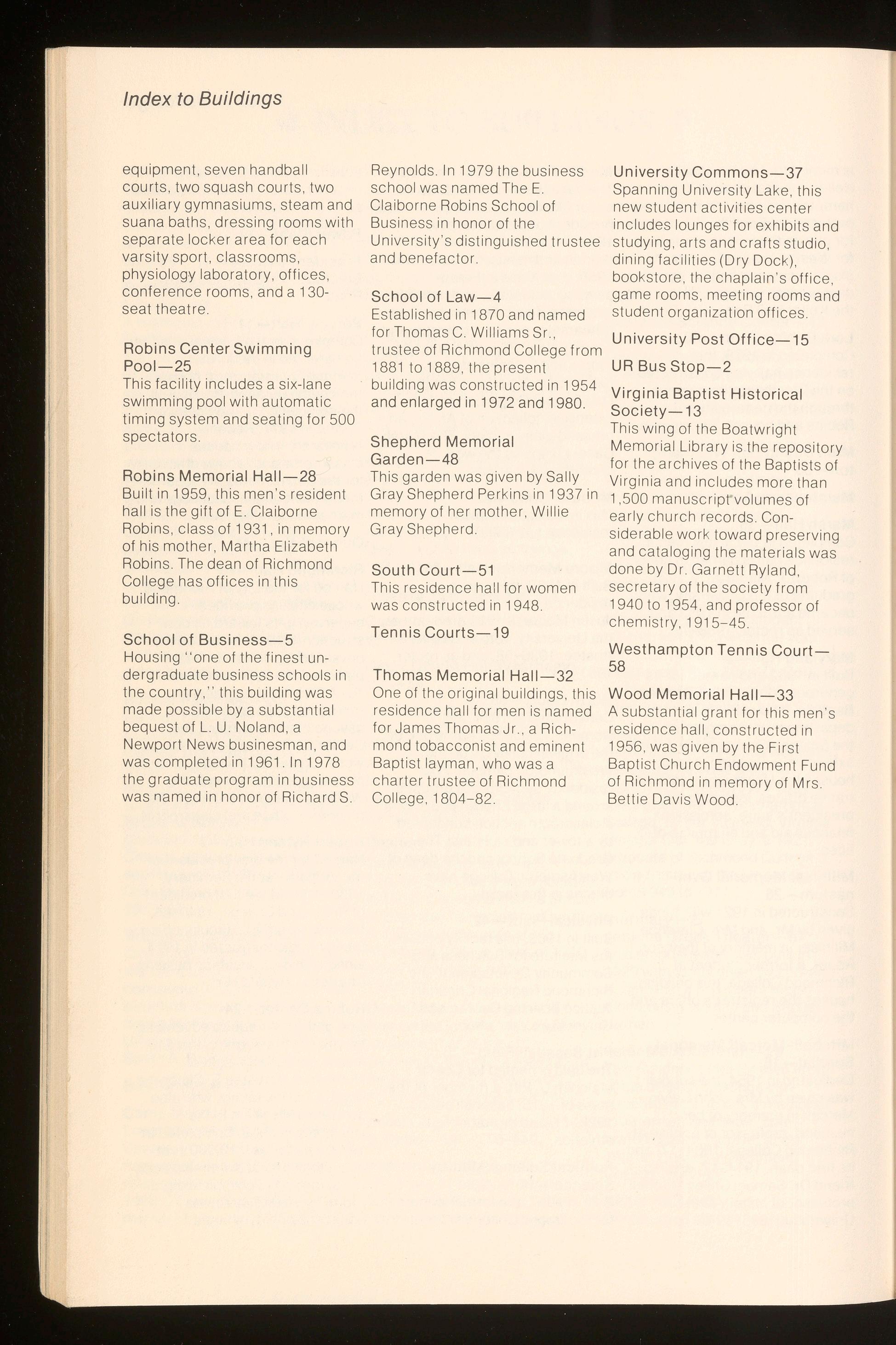
University Commons-37
Spanning University Lake , this new student activities center includes lounges for exhibits and studying, arts and crafts studio, dining facilities (Dry Dock), bookstore, the chaplain's office, game rooms, meeting rooms and student organization offices.
University Post Office-15
UR Bus Stop-2
Virginia Baptist Historical Society-13
This wing of the Boatwright Memorial Library is the repository for the archives of the Baptists of Virginia and includes more than 1,500 manuscriprvolumes of early church records. Considerable work toward preserving and cataloging the materials was done by Dr. Garnett Ryland, secretary of the society from 1940 to 1954, and professor of chemistry, 1915-45.
Westhampton Tennis Court58
Wood Memorial Hall-33
A substantial grant for this men's residence hall, constructed in 1956, was given by the First Bapti st Church Endowment Fund of Richmond in memory of Mrs. Bettie Davis Wood.
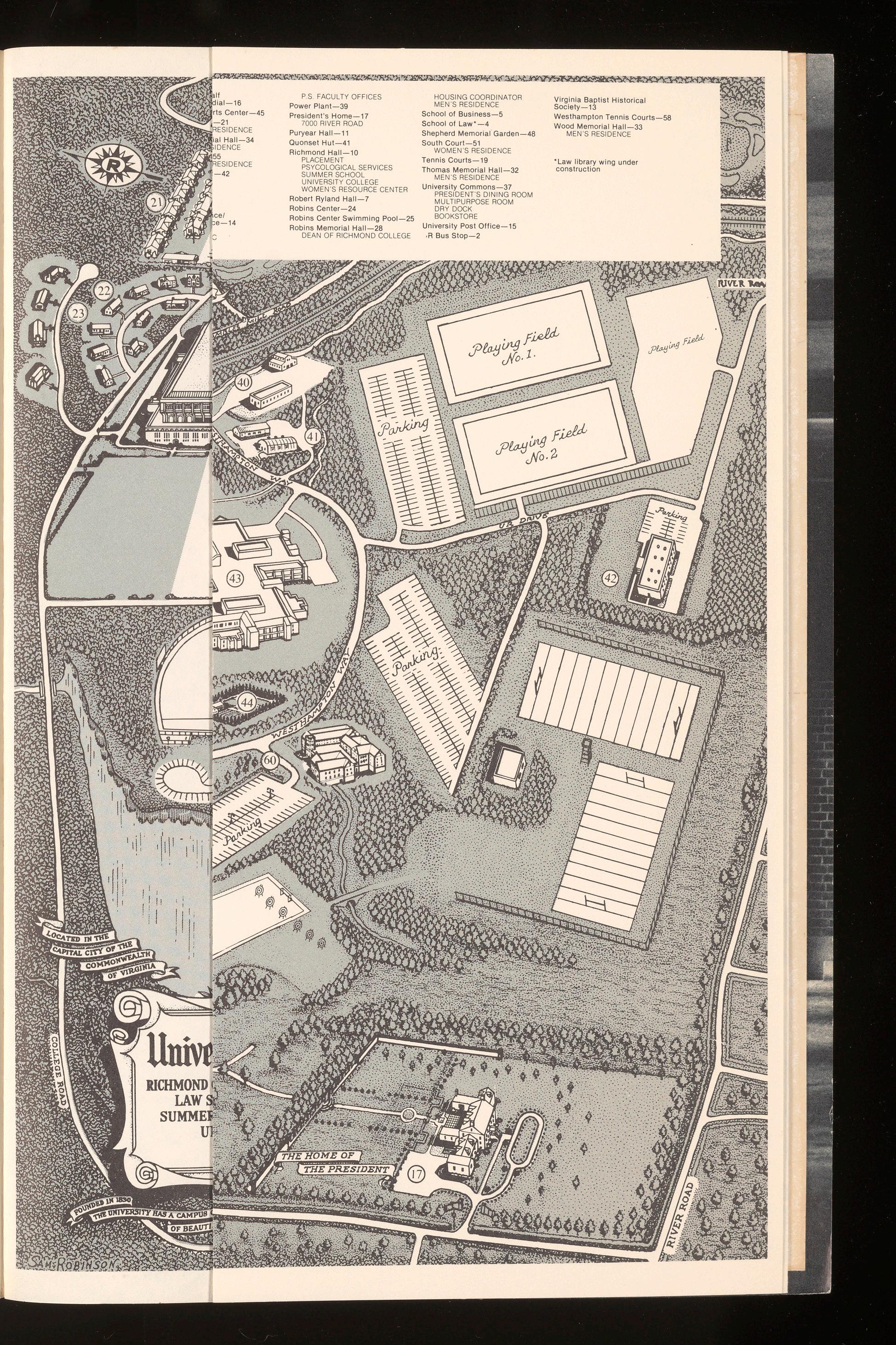
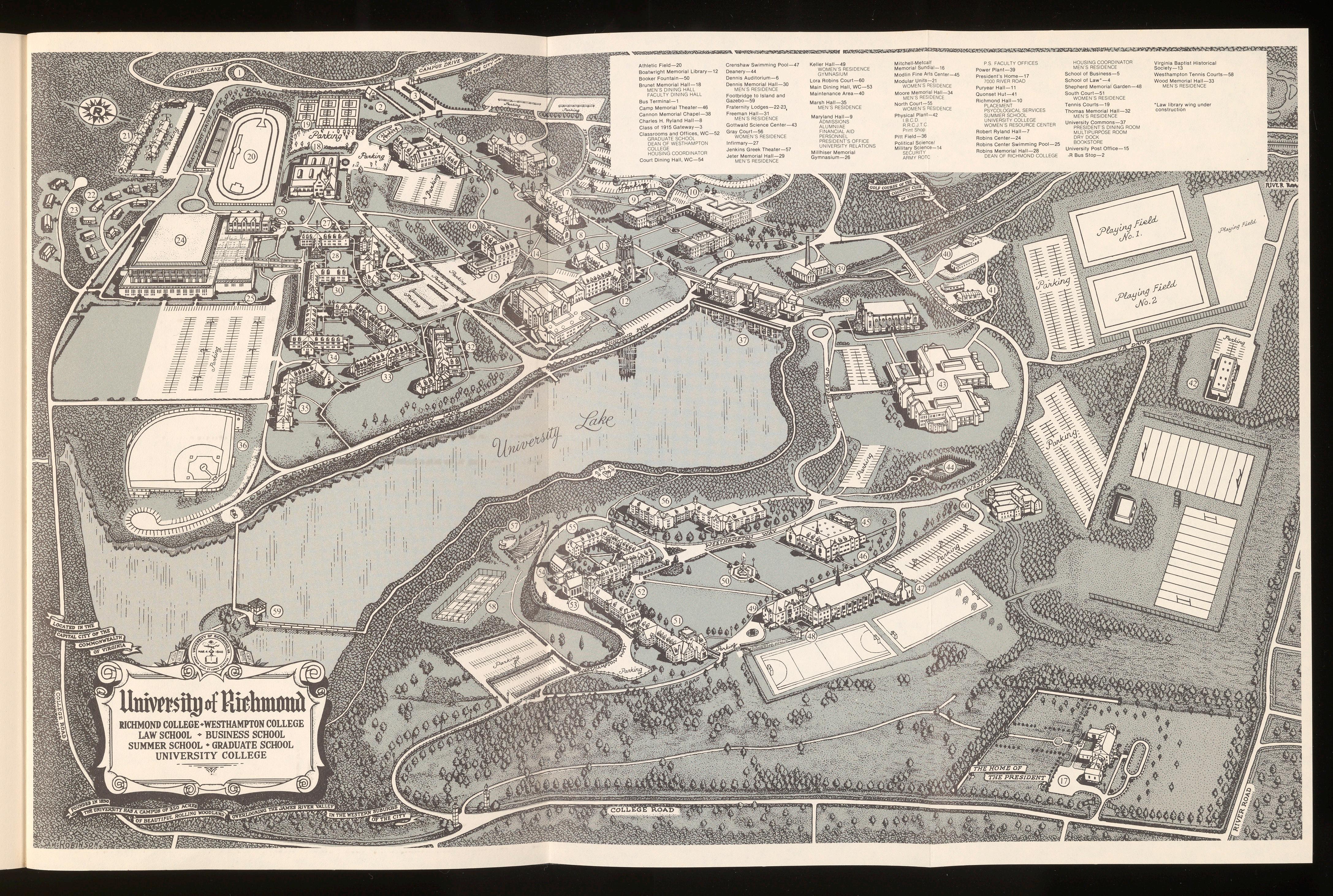
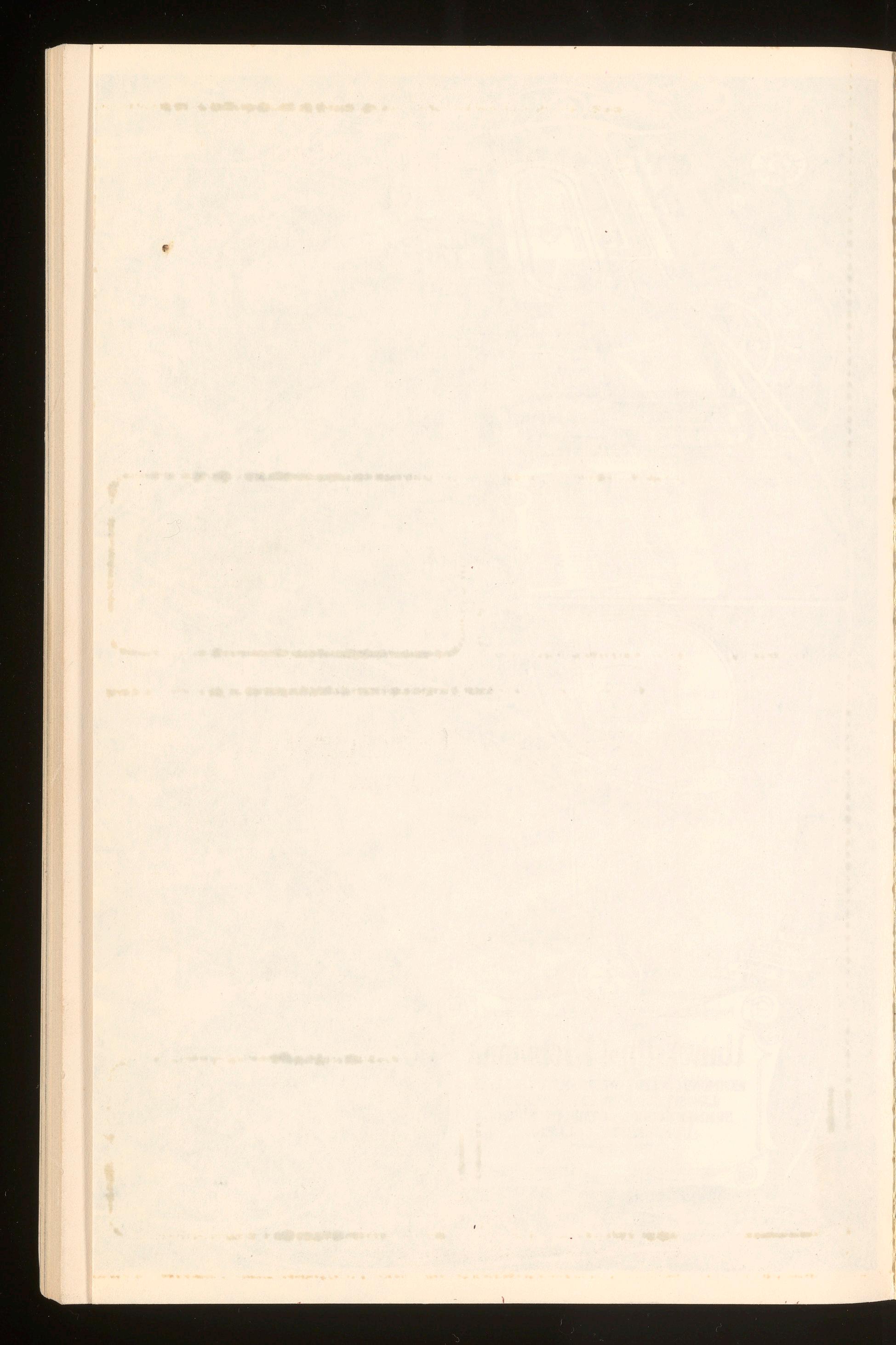
Universityof Richmond
Please type or print carefully
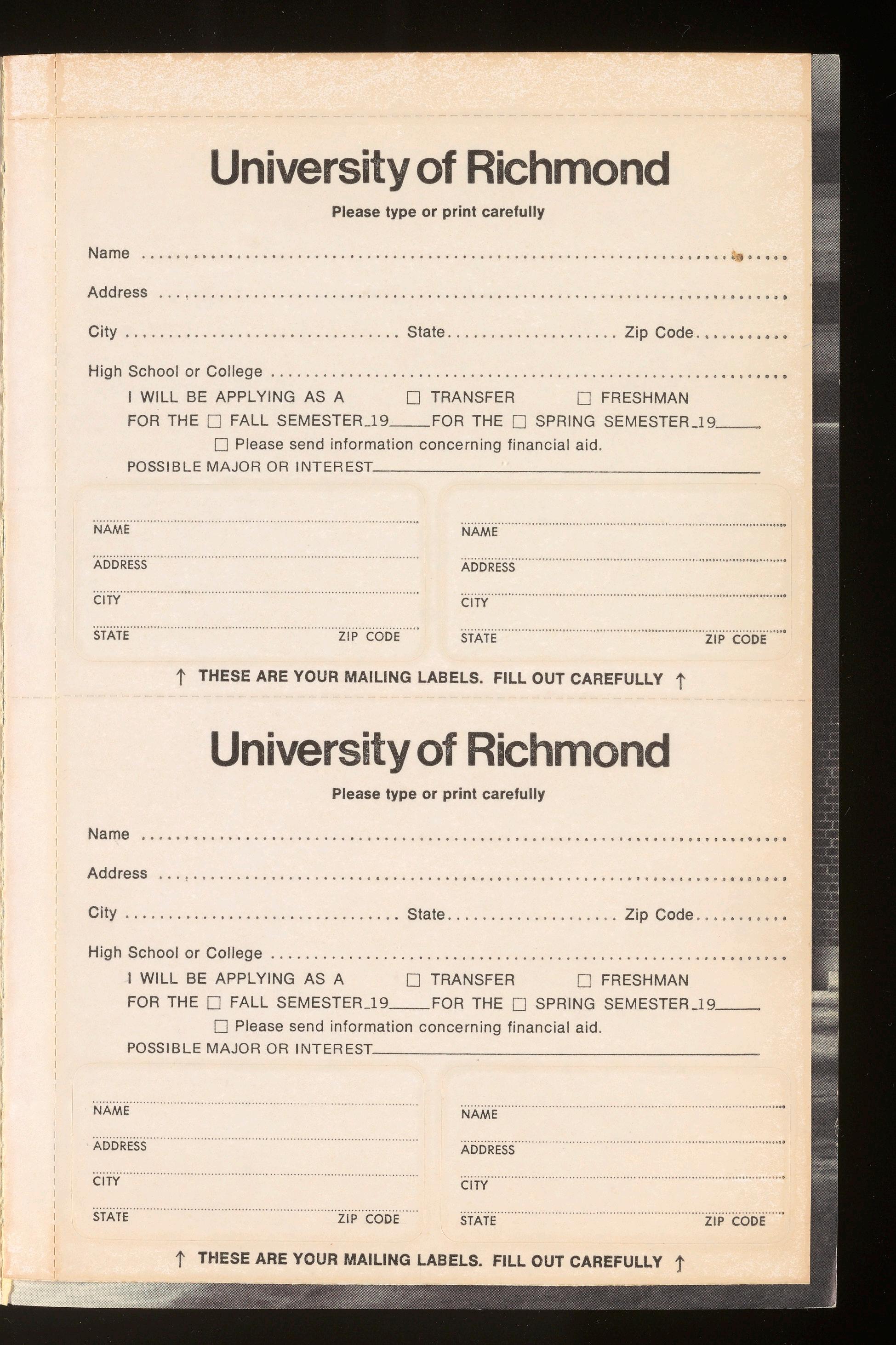
Universityof Richmond
Please
Director
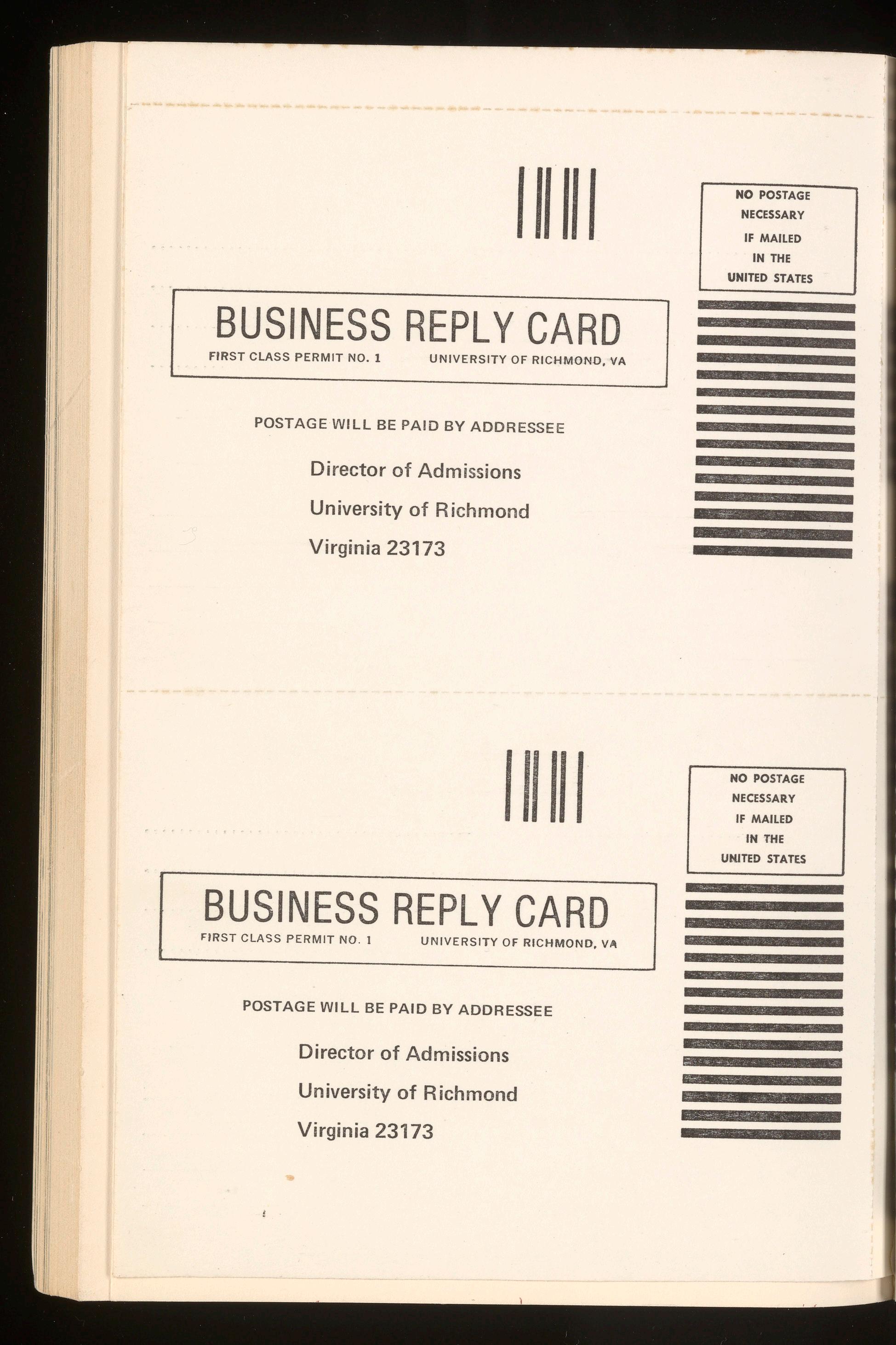
Director

